
Publication of TriQuarterly is made possible in part by the donors of gifts and grants to the magazine. For their recent and continuing support, we are very pleased to thank the Chicago Tribune Foundation, the Illinois Arts Council, the Lannan Foundation, the John D. and Catherine T. MacArthur Foundation, the Robert R. McCormick Charitable Trust and the National Endowment for the Arts.

NOTE: TriQuarterly welcomes financial support in the form of donations, bequests and planned gifts. Please write to Reginald Gibbons, editor. Please see the inside back cover for names of TriQuarterly Council members and Friends of TriQuarterly.
Associate Editor Susan Hahn

Fall 1990
Editor
Reginald Gibbons
Managing Editor Kirstie Felland
Special Projects Editor Fred Shafer
Design Director Gini Kondziolka
Readers
Campbell McGrath, Anne Calcagno
Advisory Editors
Executive Editor Bob Perlongo
Assistant to the Editor Gwenan Wilbur
TriQuarterly Fellow Gerald Majer
Editorial Assistants
Jill Marquis, Shefali Trivedi, Lisa Williams
Hugo Achugar, Robert Alter, Michael Anania, Cyrus Colter, Rita Dove, Gloria Emerson, Richard Ford, George Garrett, Gerald Graff, Francine du Plessix Gray, Michael S. Harper, Bill Henderson, Maxine Kumin, Grace Paley, Michael Ryan, Alan Shapiro, Ellen Bryant Voigt
TRIQUARTERLY IS AN INTERNATIONAL JOURNAL OF WRITING, ART AND CULTURAL INQUIRY PUBLISHED AT NORTHWESTERN UNIVERSITY.
Subscription rates (three issues a year)-Individuals: one year $18; two years $32; life $250. Institutions: one year $26; two years $44; life $300. Foreign subscriptions $4 per year additional. Price of single copies varies. Sample copies $4. Correspondence and subscriptions should be addressed to TriQuarterly, NORTHWESTERN UNIVERSITY, 2020 Ridge Avenue, Evanston, IL 60208. Phone: (708) 491-3490. The editors invite submissions of fiction, poetry and literary essays, which must be received between October 1 and April 30; manuscripts received between May 1 and September 30 will not be read. No manuscripts will be returned unless accompanied by a stamped, self-addressed envelope. All manuscripts accepted for publication become the property of TriQuarterly, unless otherwise indicated. Copyright © 1990 by TriQuarterly. No part of this volume may be reproduced in any manner without written permission. The views expressed in this magazine are to be attributed to the writers, not the editors or sponsors. Printed in the United States of America by Thomson-Shore, typeset by Sans Serif. ISSN: 0041-3097.
National distributor to retail trade: B. DeBoer, 113 East Centre Street-Rear, Nutley, NJ 07110 (201-667-9300). Distributor for West Coast trade: Bookpeople, 2929 Fifth Street, Berkeley, CA 94710 (415-549-3030). Midwest: ILPA, P.O. Box 816, Oak Park, IL 60303 (708-383-7535); and Ingram Periodicals, 1117 Heil Quaker Blvd., La Vergne, TN 37086 (800-759-5000).
Reprints of issues 11-15 of TriQuarterly are available in full format from Kraus Reprint Company, Route 100, Millwood, NY 10546, and all issues in microfilm from University Microfilms International, 300 North Zeeb Road, Ann Arbor, MI 48106.
79

Illinois Arts Council Literary Awards of $1,000 each have been received by the following writers for works published in TriQuarterly: David Michael Kaplan (for "Fireflies," story, TQ 177), Li-Young Lee ("The Cleaving," poem, TQ 177), Arthur Morey ("The Retreat," story, TQ #77), Patricia Smith ("Your Man," poem, TQ #76) and Cornelia Spelman (Introduction to special issue, Writing and Well-Being, creative nonfiction, TQ 175).
Choice Magazine Listening, the periodic audio anthology for the blind, the visually impaired and the physically handicapped, has selected a story from TriQuarterly #48 for inclusion in an upcoming issue-"Walking Out" by David Quammen. The story was reprinted in Fiction of the Eighties (TQ #78).
TriQuarterly welcomes life subscribers to the magazine. Life subscriptions, at $250 each, are a major source of support for TriQuarterly, and are acknowledged in every issue. All present and new life subscribers will also receive at no charge the various TQ special items and supplements planned for the future

Contents FICTION My Father Swims His Horse at Last 7 Robert Day Good Works 37 E. S. Goldman The Government Man Ken Smith Literary License Julia Willis 49 62 POETRY Out of the Cold; The Future of the Past; There; Haunts 85 Theodore Weiss A Voice Speaks in Earnest, but Nobody Listens 96 Pattiann Rogers The Rescue; Flowers .............•....... 98 Christine Garren Of Death by Drowning; Summer Trains; A Spring Heresy; Firebreak. 100 Kenneth Warren The Other World. 106 Dmitry Bobyshev Greek Scene 108 Yannis Ritsos On Hearing the News That Hitler Was Dead 109 Jim Barnes Karloff and the Rock; The Mummers W. S. t» Piero 111 3
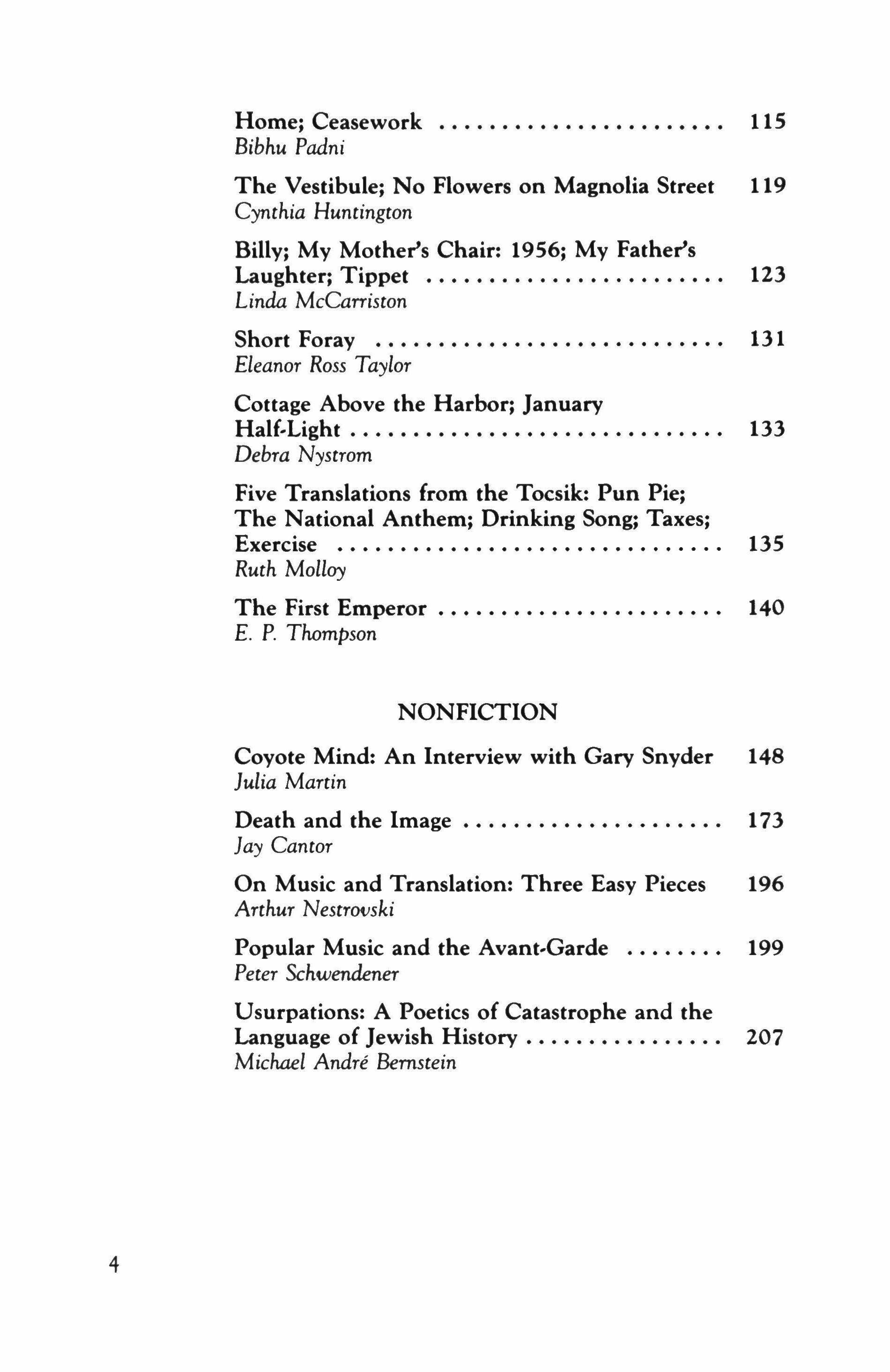
Usurpations:
Home; Ceasework .•..•.•••••.•.•.••.•••• 115 Bibhu Padni The
Flowers on
Street 119 Cynthia Huntington
••••••.......••.•••..•.. 123 Linda
Short Foray •••.•.••••......•••.•.•..... 131 Eleanor Ross Taylor
Above the Harbor; January Half-Light. 133
Nystrom Five Translations from the
Pie; The National Anthem; Drinking Song; Taxes; Exercise ••.....•....................... 135 Ruth Molloy The First Emperor 140 E. P. Thompson NONFICTION Coyote Mind: An Interview with Gary Snyder 148 Julia Martin Death and the Image 173 Jay Cantor On Music and Translation: Three Easy Pieces 196 Arthur Nestrooski Popular Music and the Avant-Garde 199 Peter Schwendener
Vestibule; No
Magnolia
Billy; My Mother's Chair: 1956; My Father's Laughter; Tippet
McCarriston
Cottage
Debra
Tocsik: Pun
and the Language of Jewish History. 207
Andre Bernstein 4
A Poetics of Catastrophe
Michael
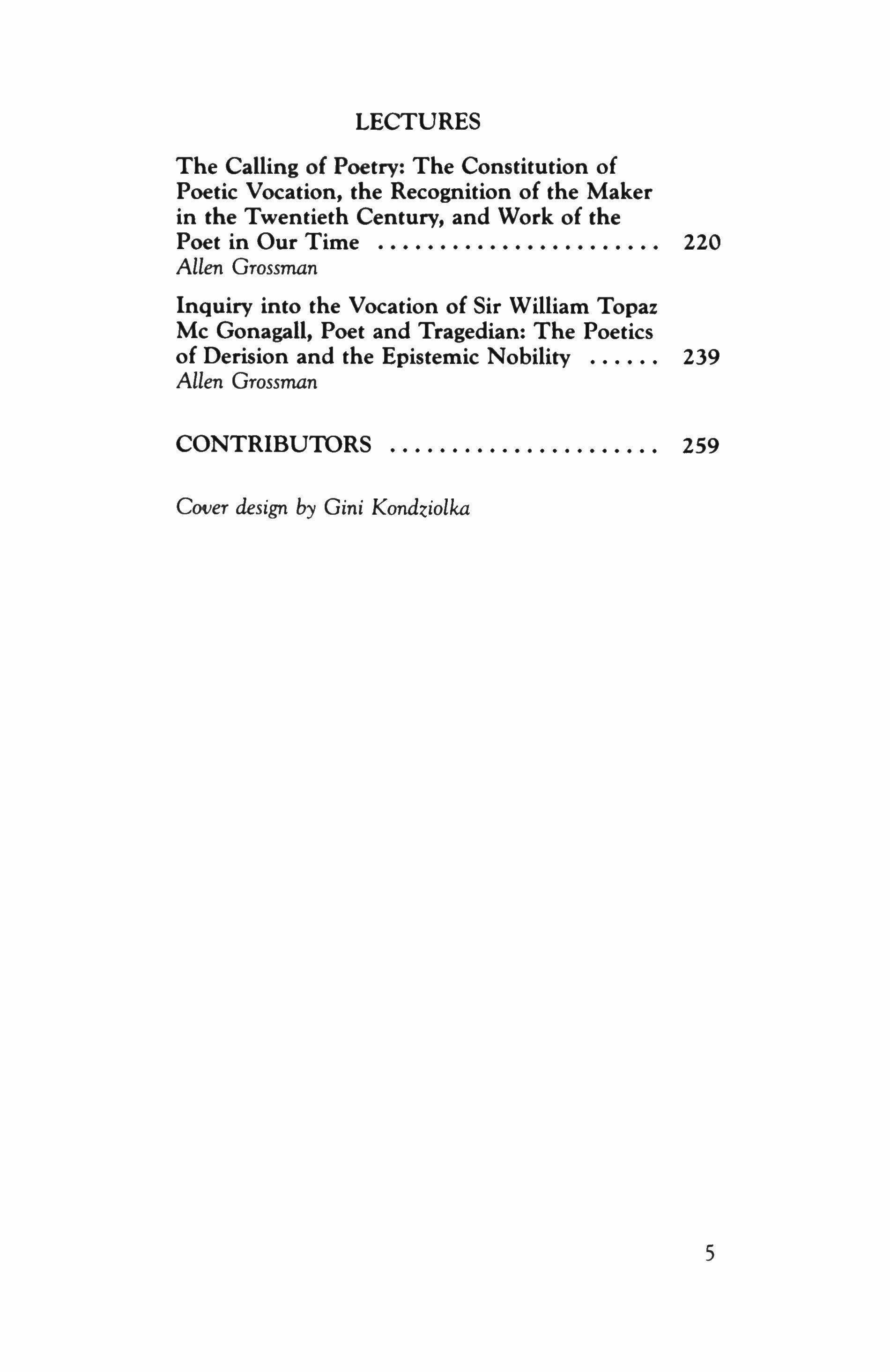
LECTURES
The Calling of Poetry: The Constitution of Poetic Vocation, the Recognition of the Maker in the Twentieth Century, and Work of the Poet in Our Time .•••••••.••••••••...••• 220
Allen Grossman
Inquiry into the Vocation of Sir William Topaz Me Gonagall, Poet and Tragedian: The Poetics of Derision and the Epistemic Nobility ••.••. 239 Allen Grossman
CONTRIBUTORS 259
Cover design by Gini Kondziolka
5

My Father Swims His Horse at Last
Robert Day
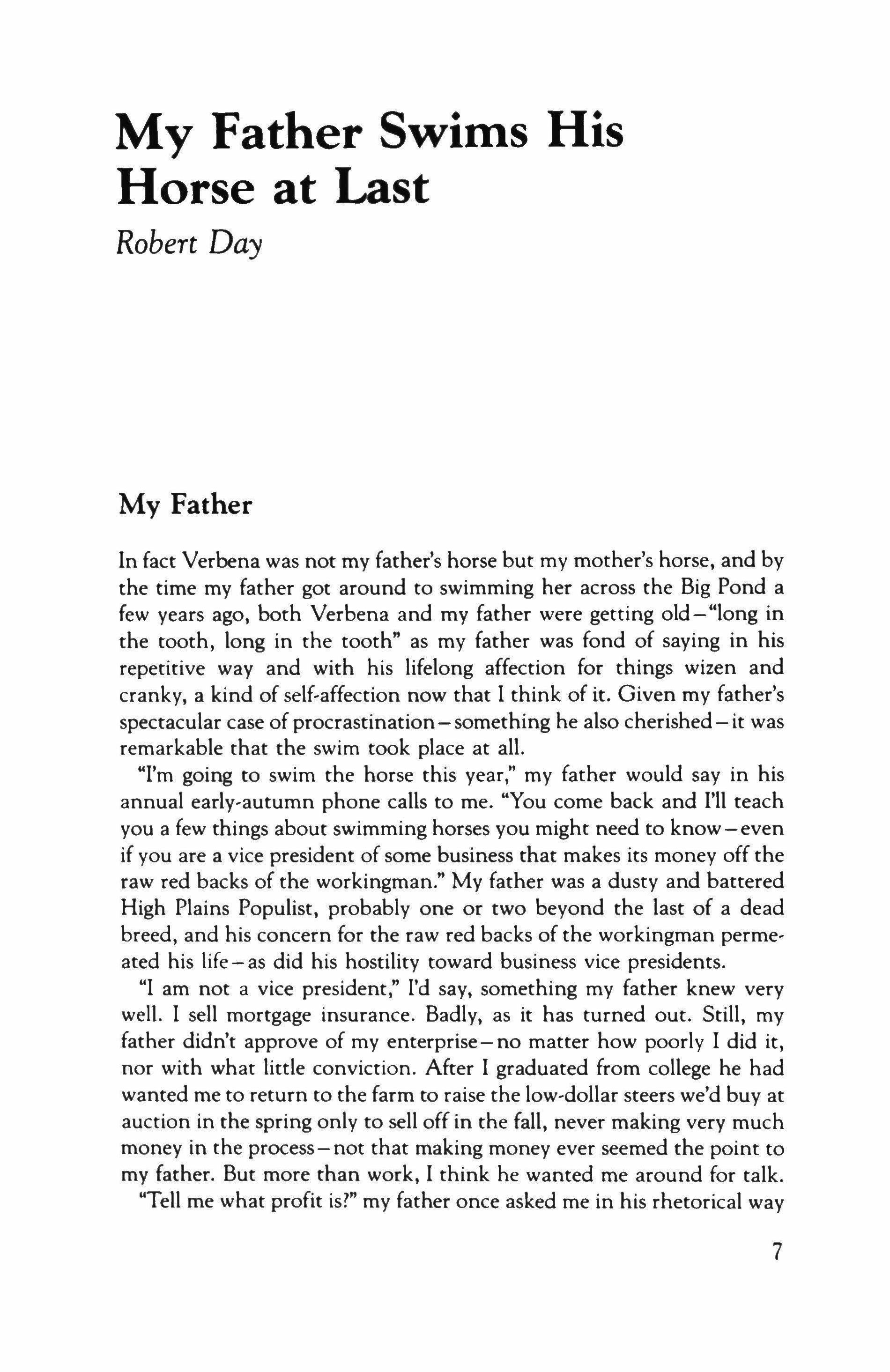
My Father
In fact Verbena was not my father's horse but my mother's horse, and by the time my father got around to swimming her across the Big Pond a few years ago, both Verbena and my father were getting old - "long in the tooth, long in the tooth" as my father was fond of saying in his repetitive way and with his lifelong affection for things wizen and cranky, a kind of self-affection now that 1 think of it. Given my father's spectacular case of procrastination - something he also cherished - it was remarkable that the swim took place at all.
"I'm going to swim the horse this year," my father would say in his annual early-autumn phone calls to me. "You come back and I'll teach you a few things about swimming horses you might need to know-even if you are a vice president of some business that makes its money off the raw red backs of the workingman." My father was a dusty and battered High Plains Populist, probably one or two beyond the last of a dead breed, and his concern for the raw red backs of the workingman permeated his life - as did his hostility toward business vice presidents.
"1 am not a vice president," I'd say, something my father knew very well. 1 sell mortgage insurance. Badly, as it has turned out. Still, my father didn't approve of my enterprise-no matter how poorly 1 did it, nor with what little conviction. After 1 graduated from college he had wanted me to return to the farm to raise the low-dollar steers we'd buy at auction in the spring only to sell off in the fall, never making very much money in the process-not that making money ever seemed the point to my father. But more than work, I think he wanted me around for talk.
"Tell me what profit is?" my father once asked me in his rhetorical way
7
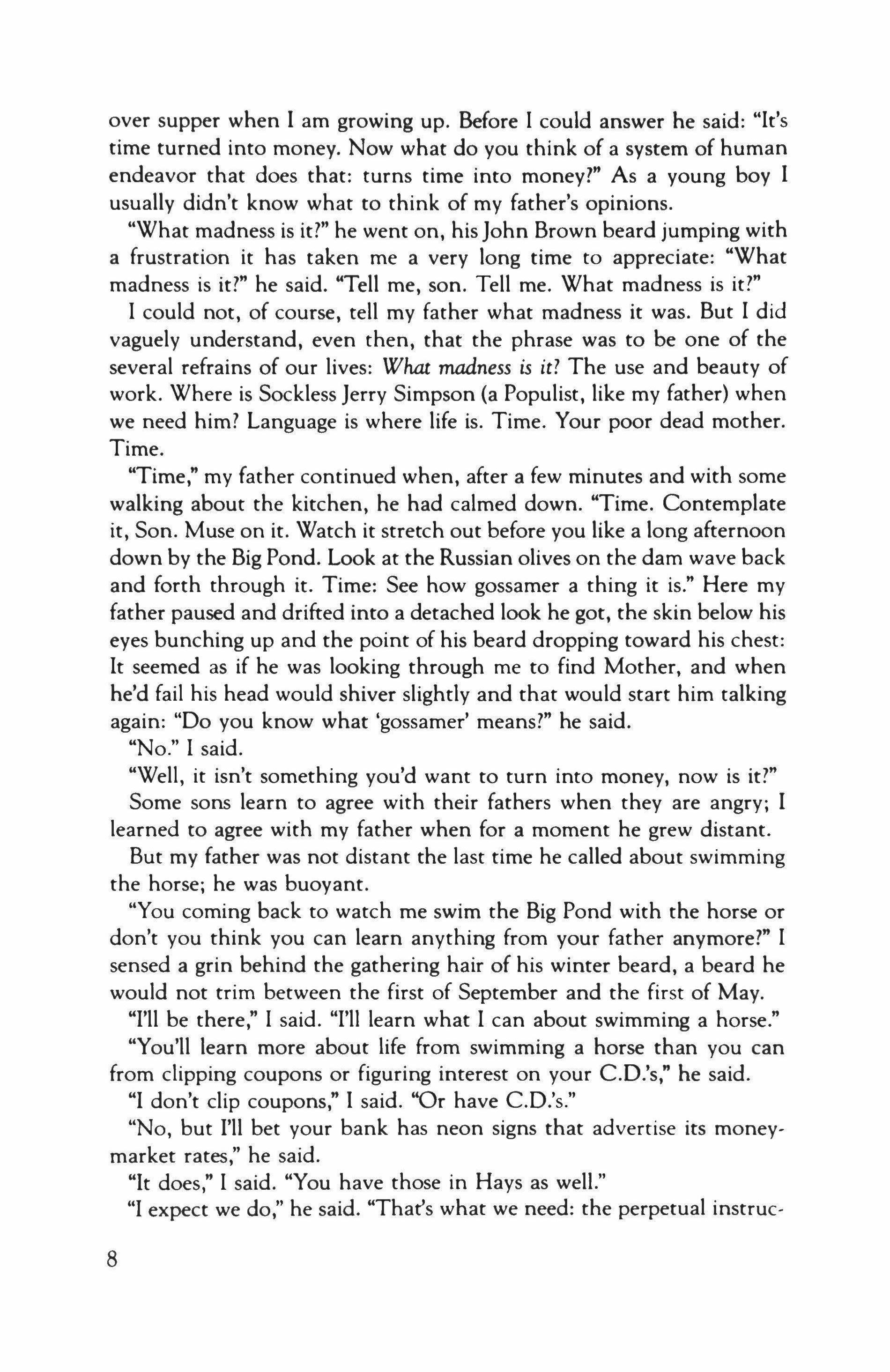
over supper when I am growing up. Before I could answer he said: "It's time turned into money. Now what do you think of a system of human endeavor that does that: turns time into money?" As a young boy I usually didn't know what to think of my father's opinions.
"What madness is it?" he went on, his John Brown beard jumping with a frustration it has taken me a very long time to appreciate: "What madness is it?" he said. "Tell me, son. Tell me. What madness is it?"
I could not, of course, tell my father what madness it was. But I did vaguely understand, even then, that the phrase was to be one of the several refrains of our lives: What madness is it? The use and beauty of work. Where is Sockless Jerry Simpson (a Populist, like my father) when we need him? Language is where life is. Time. Your poor dead mother. Time.
"Time," my father continued when, after a few minutes and with some walking about the kitchen, he had calmed down. "Time. Contemplate it, Son. Muse on it. Watch it stretch out before you like a long afternoon down by the Big Pond. Look at the Russian olives on the dam wave back and forth through it. Time: See how gossamer a thing it is." Here my father paused and drifted into a detached look he got, the skin below his eyes bunching up and the point of his beard dropping toward his chest: It seemed as if he was looking through me to find Mother, and when he'd fail his head would shiver slightly and that would start him talking again: "Do you know what 'gossamer' means?" he said.
"No." I said.
"Well, it isn't something you'd want to turn into money, now is it?"
Some sons learn to agree with their fathers when they are angry; I learned to agree with my father when for a moment he grew distant.
But my father was not distant the last time he called about swimming the horse; he was buoyant.
"You coming back to watch me swim the Big Pond with the horse or don't you think you can learn anything from your father anymore?" I sensed a grin behind the gathering hair of his winter beard, a beard he would not trim between the first of September and the first of May.
"I'll be there," I said. "I'll learn what I can about swimming a horse."
"You'll learn more about life from swimming a horse than you can from clipping coupons or figuring interest on your C.D.'s," he said.
"I don't clip coupons," I said. "Or have C.D.'s."
"No, but I'll bet your bank has neon signs that advertise its moneymarket rates," he said.
"It does," I said. "You have those in Hays as well."
"I expect we do," he said. "That's what we need: the perpetual instruc-
8

tion of the youth about interest rates: 'Six-point-three-nine percent with yield of seven-point-two percent.' Material madness."
"It's pretty harmless given today's youth," I said.
"It's not harmless to rot their minds so nothing of use or beauty can grow," he said; I could tell the grin was going and my father was about to go 'around the bend in the river,' a phrase my mother apparently used to describe my father's quick turns of mood on matters political.
"Better the young should read Jack London," my father went on. "Study The Iron Heel. That's use and beauty in a book. Peruse the U.S. Fann News, 'Peace, Parity and Power to the People.' Let the youth memorize that."
"We live in a capitalist country," I said.
"Don't tell me about it," he said. "The least the robber-barons can do is not afflict the general population with the interest rates some steak-andpotato vice president is getting on his money-belt wad."
"They eat pasta salad these days," I said. "And the banks are just trying to tell the public the facts." My defense was only halfhearted; I am-to a larger extent than I've ever told him-my father's boy.
"I don't want to know anything banks want me to know," he said. "It's pollution of the eyes and the eyes are the portals to the soul. Why cobble up a good soul with dirty money? Do you know what 'portals' means?"
"Yes," I said.
"It's about time," my father said.
It was conversation that reminded me once again that to my father the mortal enemy was the "vice president"-in whatever form he appeared, whatever madness he consecrated. I have a feeling that the printed complaint forms I've spotted these past few weeks on the counters of the business around Hays are a silent, although misguided, tribute to my father's forty-year war against "executive fat," as he was given to calling it then.
"When you see the vice president in his three-piece Du Pont plastic suit," my father said to the manager behind the counter at the Stockman's Supply a few years ago when we had come into town to getamong other items-some feed to lure Verbena into the corral, "tell him for me they waste our money wrapping these salt licks in paper that advertises we ought to buy more salt licks. I know how many salt licks I need. Don't cut down trees in Oregon just to be absurd."
The manager, like most store managers who knew my father, stared at the counter and studied the sales slip.
"And don't quote your horse-feed prices for fifty pounds just to make me think it's a bargain when you've raised it ten cents," my father went
9
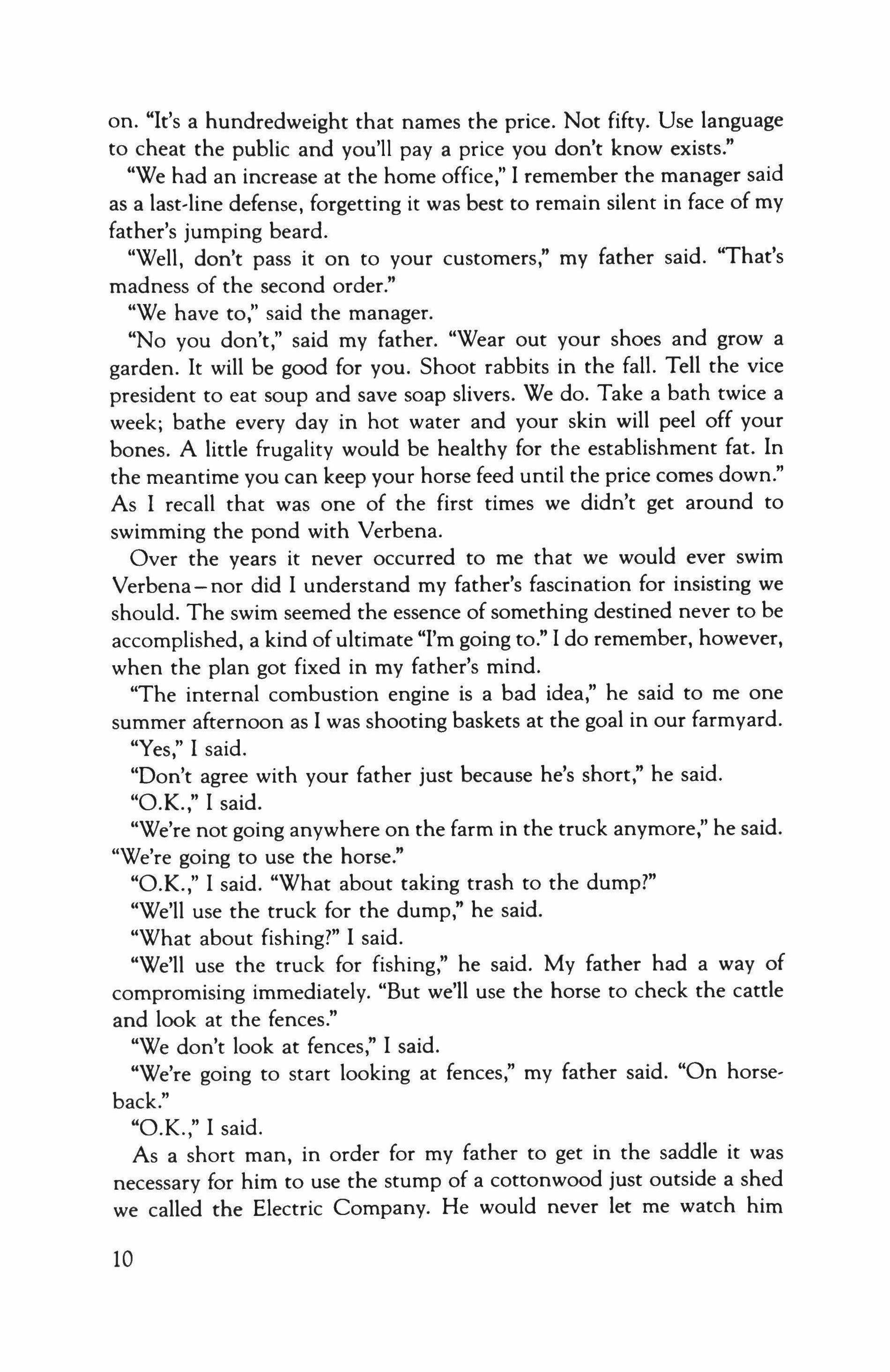
on. "It's a hundredweight that names the price. Not fifty. Use language to cheat the public and you'll pay a price you don't know exists."
"We had an increase at the home office," I remember the manager said as a last-line defense, forgetting it was best to remain silent in face of my father's jumping beard.
"Well, don't pass it on to your customers," my father said. "That's madness of the second order."
"We have to," said the manager.
"No you don't," said my father. "Wear out your shoes and grow a garden. It will be good for you. Shoot rabbits in the fall. Tell the vice president to eat soup and save soap slivers. We do. Take a bath twice a week; bathe every day in hot water and your skin will peel off your bones. A little frugality would be healthy for the establishment fat. In the meantime you can keep your horse feed until the price comes down." As I recall that was one of the first times we didn't get around to swimming the pond with Verbena.
Over the years it never occurred to me that we would ever swim Verbena - nor did I understand my father's fascination for insisting we should. The swim seemed the essence of something destined never to be accomplished, a kind of ultimate "I'm going to." I do remember, however, when the plan got fixed in my father's mind.
"The internal combustion engine is a bad idea," he said to me one summer afternoon as I was shooting baskets at the goal in our farmyard.
"Yes," I said.
"Don't agree with your father just because he's short," he said.
"O.K.," I said.
"We're not going anywhere on the farm in the truck anymore," he said. "We're going to use the horse."
"O.K.," I said. "What about taking trash to the dump?"
"We'll use the truck for the dump," he said.
"What about fishing?" I said.
"We'll use the truck for fishing," he said. My father had a way of compromising immediately. "But we'll use the horse to check the cattle and look at the fences."
"We don't look at fences," I said.
"We're going to start looking at fences," my father said. "On horseback."
"O.K.," I said.
As a short man, in order for my father to get in the saddle it was necessary for him to use the stump of a cottonwood just outside a shed we called the Electric Company. He would never let me watch him
10
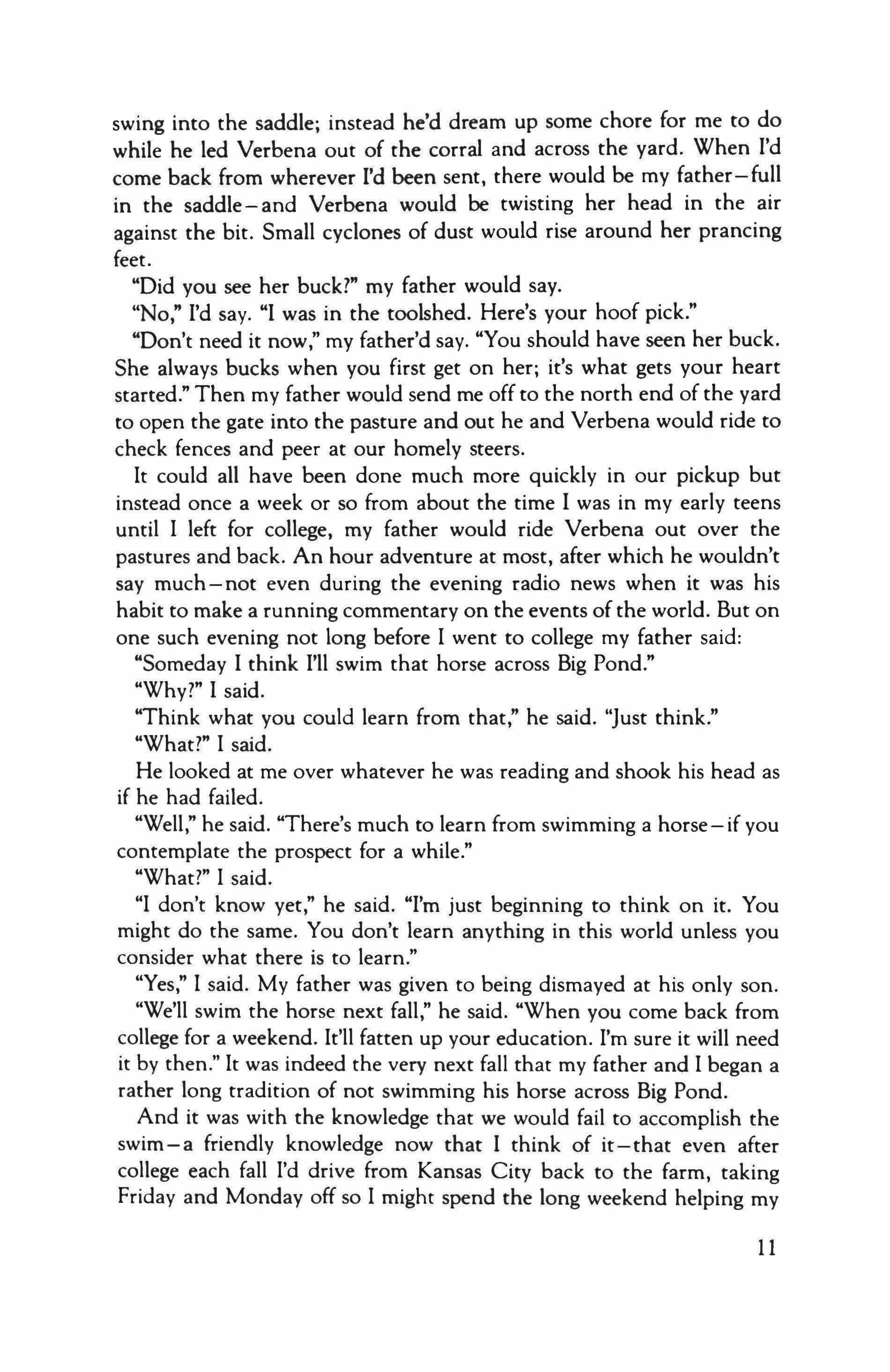
swing into the saddle; instead he'd dream up some chore for me to do while he led Verbena out of the corral and across the yard. When I'd come back from wherever I'd been sent, there would be my father-full in the saddle-and Verbena would be twisting her head in the air against the bit. Small cyclones of dust would rise around her prancing feet.
"Did you see her buck?" my father would say.
"No," I'd say. "I was in the toolshed. Here's your hoof pick."
"Don't need it now," my father'd say. "You should have seen her buck. She always bucks when you first get on her; it's what gets your heart started." Then my father would send me off to the north end of the yard to open the gate into the pasture and out he and Verbena would ride to check fences and peer at our homely steers.
It could all have been done much more quickly in our pickup but instead once a week or so from about the time I was in my early teens until I left for college, my father would ride Verbena out over the pastures and back. An hour adventure at most, after which he wouldn't say much - not even during the evening radio news when it was his habit to make a running commentary on the events of the world. But on one such evening not long before I went to college my father said:
"Someday I think I'll swim that horse across Big Pond."
"Why?" I said.
"Think what you could learn from that," he said. "Just think."
"What?" I said.
He looked at me over whatever he was reading and shook his head as if he had failed.
"Well," he said. "There's much to learn from swimming a horse - if you contemplate the prospect for a while."
"What?" I said.
"I don't know yet," he said. "I'm just beginning to think on it. You might do the same. You don't learn anything in this world unless you consider what there is to learn."
"Yes," I said. My father was given to being dismayed at his only son.
"We'll swim the horse next fall," he said. "When you come back from college for a weekend. It'll fatten up your education. I'm sure it will need it by then." It was indeed the very next fall that my father and I began a rather long tradition of not swimming his horse across Big Pond.
And it was with the knowledge that we would fail to accomplish the swim-a friendly knowledge now that I think of it-that even after college each fall I'd drive from Kansas City back to the farm, taking Friday and Monday off so I might spend the long weekend helping my
11
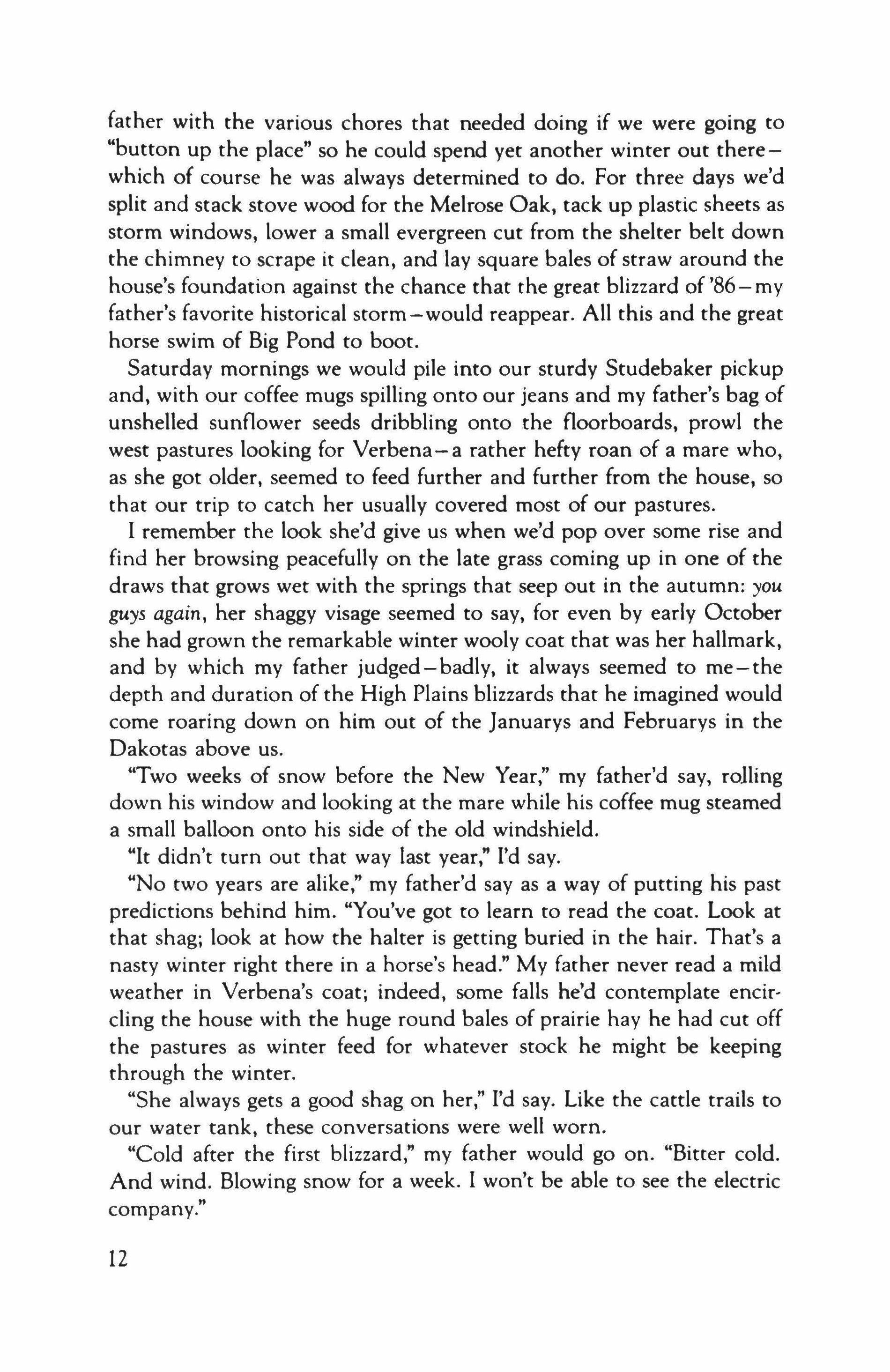
father with the various chores that needed doing if we were going to "button up the place" so he could spend yet another winter out therewhich of course he was always determined to do. For three days we'd split and stack stove wood for the Melrose Oak, tack up plastic sheets as storm windows, lower a small evergreen cut from the shelter belt down the chimney to scrape it clean, and lay square bales of straw around the house's foundation against the chance that the great blizzard of '86my father's favorite historical storm-would reappear. All this and the great horse swim of Big Pond to boot.
Saturday mornings we would pile into our sturdy Studebaker pickup and, with our coffee mugs spilling onto our jeans and my father's bag of unshelled sunflower seeds dribbling onto the floorboards, prowl the west pastures looking for Verbena-a rather hefty roan of a mare who, as she got older, seemed to feed further and further from the house, so that our trip to catch her usually covered most of our pastures.
I remember the look she'd give us when we'd pop over some rise and find her browsing peacefully on the late grass coming up in one of the draws that grows wet with the springs that seep out in the autumn: you guys again, her shaggy visage seemed to say, for even by early October she had grown the remarkable winter wooly coat that was her hallmark, and by which my father judged-badly, it always seemed to me-the depth and duration of the High Plains blizzards that he imagined would come roaring down on him out of the ]anuarys and Februarys in the Dakotas above us.
"Two weeks of snow before the New Year," my father'd say, rolling down his window and looking at the mare while his coffee mug steamed a small balloon onto his side of the old windshield.
"It didn't turn out that way last year," I'd say.
"No two years are alike," my father'd say as a way of putting his past predictions behind him. "You've got to learn to read the coat. Look at that shag: look at how the halter is getting buried in the hair. That's a nasty winter right there in a horse's head." My father never read a mild weather in Verbena's coati indeed, some falls he'd contemplate encircling the house with the huge round bales of prairie hay he had cut off the pastures as winter feed for whatever stock he might be keeping through the winter.
"She always gets a good shag on her," I'd say. Like the cattle trails to our water tank, these conversations were well worn.
"Cold after the first blizzard," my father would go on. "Bitter cold. And wind. Blowing snow for a week. I won't be able to see the electric company."
12

"Maybe it won't be that bad," I'd say.
"Worse," my father'd say, as he'd point his beard defiantly toward the north. "So bad the television will rattle on about 'windchill factors' and tell me not to go to the horse tank in my boxer shorts."
"They're being helpful," I'd say.
"Why doesn't the television tell me about Spain, if they want to be helpful," he'd say. "The radio used to tell me about Spain. The U.S. Farm News told me about Spain. But no, it took the television two days to tell me Franco was dead. Franco! What a scoundrel! Dead for two days and I didn't know to celebrate."
"Nobody cares about Franco in Western Kansas," I'd say.
"Well, they ought to," my father would go on. "You've got to learn something about life besides the price of wheat. Why would the television tell me the windchill factor and not tell me that Franco was dead?"
"I don't know," I'd say. "I don't know." It was my own all-purpose refrain that I'd use-even as a small boy-to change the direction of the conversation, not that in retrospect I give the technique high marks.
"Do you know what Brendan Behan said about Franco?" my father'd say.
"No," I'd say.
About this time Verbena would have edged her way to the truck for the grain we'd put in a bucket in the back; somehow she seemed to know the quality of my father's rant and knew it meant food: that, and a harmless walk back to the yard where she'd be fed again, perhaps saddled, but of course not ridden. On balance it must have seemed a good bargain to the old horse. And as chance would have it, she seemed to always stop my father short of telling me what Brendan Behan had once said about the "Generalissimo Franco."
"Catch that horse and put a lead on her before she bolts over the Saline Breaks," my father would whoop when, in the middle of his diatribe about Franco and television, he'd hear Verbena rattling around in the feed bucket in the back of the truck.
"She's not going anywhere," I'd say.
"She'll be in Nebraska by morning if you don't jump quick." Jumping quick had been my job since boyhood.
What I'd read in the shag of Verbena's head as I snapped a lead to her halter was that the old mare had no intention of bolting any breaks on her way to Nebraska and the blizzards lurking in the depth of her coat.
"Now you'll learn what there is to swimming a horse," my father would say as I'd get back in the truck. "You'll learn something more than the
13

useful in life. You'll learn something to talk about when you're old and long in the tooth like that horse."
"I expect 1 will," I'd say
And talk about it at length," he say. "You're too quiet a boy for the good of the country. You've got to learn to scream bloody-murder when the four-door Cadillac of capitalism is about to make road kill of. your bony hide."
"I'll speak about it at length," I'd say. Good, my father'd say, and put the truck in gear for the ride back to the yard, Verbena trotting behind.
But no matter how easy it might be to catch Verbena, nor with what efficiency my father and I would get together the tack from various sheds and storerooms, year after year we never got around to swimming her. Oh, we'd get close: some Octobers we'd even get as far as the Big Pond itself. And five years ago my father had the idea we should celebrate our impending accomplishment by grilling some steaks in a pit fire on the south point that poked itself out into the pond.
"Ceremony," 1 remember my father saying on this occasion, "is a drama we can all write for ourselves." We were cutting cottonwood logs for the fire. Verbena was tethered to a tree, her saddle cinched tight.
"We've got plenty of wood," I said. We had enough for a high-school bonfire; my father was as excessive as he was frugal.
"Cut some more," my father said. "I'll want to dry off by the blaze when I come out of that pond, and so will you."
"We've got enough for that," I said.
"Not for both a blaze and a bed of coals for the steaks, we don't," he said. "And then we'll want some fire in the hole to talk by. Don't you want to look across the flames and see your father's face when he tells you what you've learned from swimming a horse?"
"Of course," 1 said; we cut more wood.
In fact, looking back on it, I suspect it was all part of my father's dallying dance before the swim, and 1 guess in some dim way I knew that and I was glad for it. Perhaps I sensed we had gotten such a good start on the swim that year, I had half a fear we might pull it off, and what the name of that fear was I have never been quite sure. But in the end we spent our time in a kind of slow-motion puttering: first with the pit, then with the fire, and several times with the horse (my father walked over to Verbena to say something to her and then came away still talking-but to whom I couldn't be sure.) Once, pretty late in the afternoon, he walked around to the dam and through the double line of Russian olives that grew up on each side. I watched him as he looked back at me over the pond. I remember he didn't wave; he just stood
14

there a moment, looking my way. And then he walked back around. In the end evening came on and the muskrats began to etch their V's onto the flat water and my father said:
"It's gotten away from us again, now hasn't it, son? We've run out of daylight."
"I guess we have," I said.
My father went over to Verbena and unsaddled her and tossed the gear into the pickup.
"I can't teach you about swimming horses in the dark," he said. "It's a lesson of life. You need to see it clearly. You should have been shown long ago." My father looked out over the pond to the other side. "Time flies when you're having fun," he said. "I've never known what to do about that."
"We'll swim her next year," I said.
"Probably," said my father.
We cooked our steaks over the cottonwood coals and talked with the flame dancing in the pit. Verbena didn't go far, and as we ate we could hear her moving through the trees, grazing. Once, 1 thought 1 heard her at the pond taking water.
"Your mother never rode Verbena," my father said as the fire got low.
"I didn't know that," I said. It was getting difficult to see his face; I got up to get another log, but he held out his hand, palm down, to indicate he didn't want me to.
"Your mother wasn't political," he said. I didn't say anything; there was a moment of silence between us, and in the distance 1 thought I could hear the night flight of Sand Hill cranes.
"We'll get it done," my father said.
"O.K.," I said.
"Her world was flowers," he said.
"You've never told me that," I said.
"We'll swim her horse," my father said.
"Agreed," I said.
But the truth becomes that in the years after that evening we cooked our steaks on the pond's bank, and listened to the old horse browse among the cottonwoods, we seemed to recede from the swim. The following year we only drove to the pasture and looked at Verbena while my father held forth on the rising cost of electricity-due, he felt (correedy, I suspect), to the new atomic power plant they had installed down the wires from the farm. A few years later we didn't even get out of the yard, and had Verbena not come up to the corrals on her own that
15

weekend I might not have heard my father's dire prediction of yet another bad winter.
"We're not talking the blizzard of '86," he said as we stood by the horse just before I was to drive back down the highway. "But we are looking at the blizzard of 1912. Or '48. Do you remember the one in '48?"
"I was pretty young," I said.
"Couldn't get out for a month," he said. "You, me and your mother. All buttoned up in here with rice and beans and pickles. Jerry Simpson would have been proud."
"Call me if you need help," I said.
"Maybe," he said, looking back at the old white house, "we should have put the big bales around me this year. At least lay them along the north side so I don't get drifted in."
"If you want to," I said. "I've got some time yet. The front-end loader is still on the tractor. It wouldn't take an hour." But he shook his head no, then said:
"You come back next year, and we'll swim that horse first off. Friday afternoon. Make your mother proud of us and teach you something at the same time."
"O.K.," I said.
"Keep track of what you learn," he said.
"What?" I said.
"Keep track of what you learn from swimming that horse so you can tell me what it is in the long run."
"We haven't done it yet," I said.
"We will," he said. "But you've got to get ready by thinking ahead. See the swim in your mind's eye. Watch the water part at her chest. Watch the cottonwood leaves coming down on the pond. Don't think of anything without seeing it in your mind's eye: that's the problem with you vice presidents. You don't watch what you're doing in your head. It's all dry columns and furniture-appliances."
"Furniture-appliances?" I asked. Generally I don't ask.
"Like dishwashing machines," he said. "God help us."
"I'll try to watch what I'm doing in my head," I told him.
"Good thinking," said my father. "Don't watch television, as it will rob you of the ability," he said.
"I know," I said.
As it has turned out the following year my father will swim his horse at last.
16
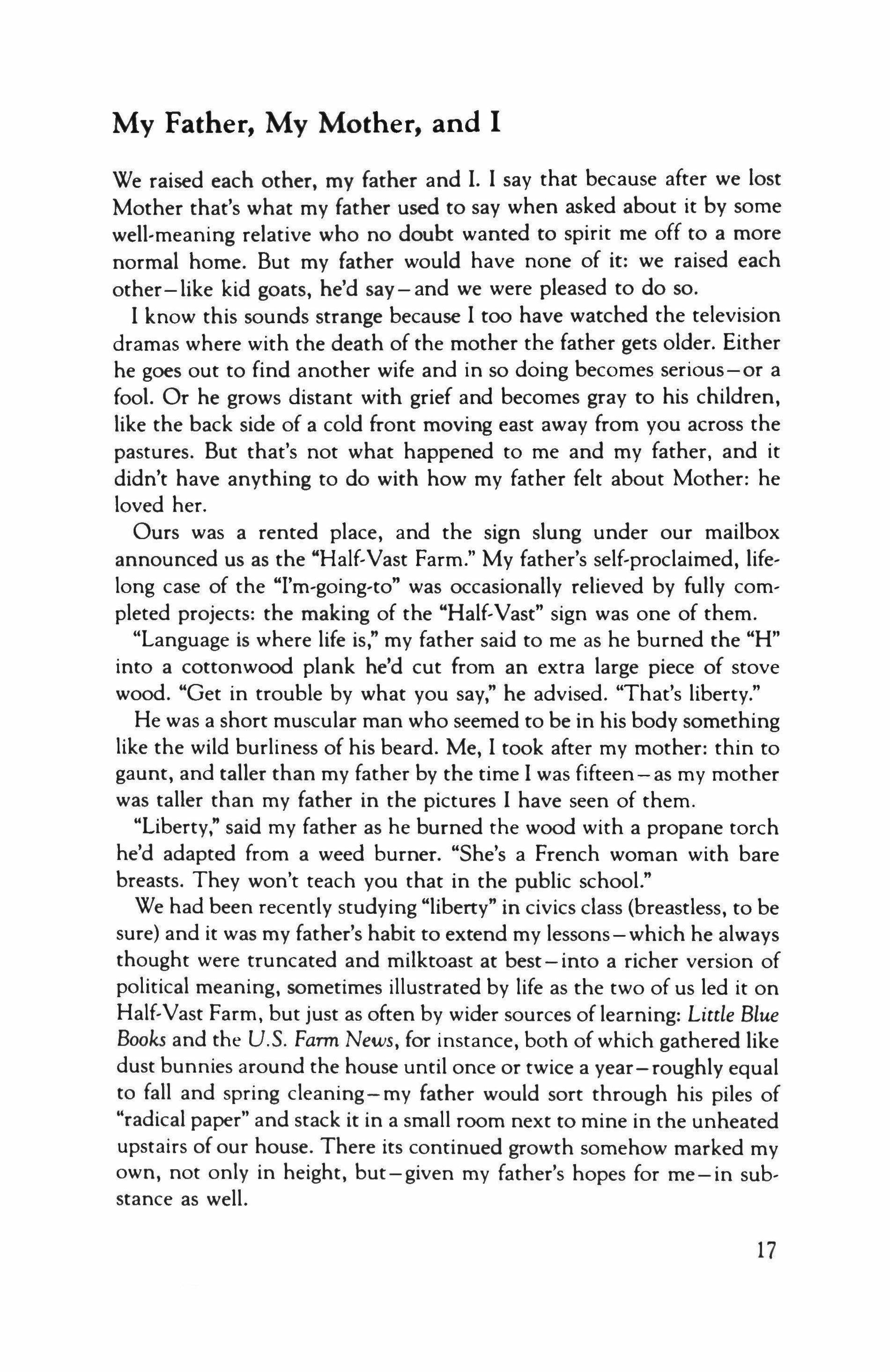
My Father, My Mother, and I
We raised each other, my father and I. I say that because after we lost Mother that's what my father used to say when asked about it by some well-meaning relative who no doubt wanted to spirit me off to a more normal home. But my father would have none of it: we raised each other-like kid goats, he'd say-and we were pleased to do so.
I know this sounds strange because I too have watched the television dramas where with the death of the mother the father gets older. Either he goes out to find another wife and in so doing becomes serious-or a fool. Or he grows distant with grief and becomes gray to his children, like the back side of a cold front moving east away from you across the pastures. But that's not what happened to me and my father, and it didn't have anything to do with how my father felt about Mother: he loved her.
Ours was a rented place, and the sign slung under our mailbox announced us as the "Half-Vast Farm." My father's self-proclaimed, lifelong case of the "I'm-going-to" was occasionally relieved by fully completed projects: the making of the "Half-Vast" sign was one of them.
"Language is where life is," my father said to me as he burned the "H" into a cottonwood plank he'd cut from an extra large piece of stove wood. "Get in trouble by what you say," he advised. "That's liberty."
He was a short muscular man who seemed to be in his body something like the wild burliness of his beard. Me, I took after my mother: thin to gaunt, and taller than my father by the time I was fifteen-as my mother was taller than my father in the pictures I have seen of them.
"Liberty," said my father as he burned the wood with a propane torch he'd adapted from a weed burner. "She's a French woman with bare breasts. They won't teach you that in the public school."
We had been recently studying "liberty" in civics class (breastless, to be sure) and it was my father's habit to extend my lessons-which he always thought were truncated and rnilktoast at best-into a richer version of political meaning, sometimes illustrated by life as the two of us led it on Half-Vast Farm, but just as often by wider sources of learning: Little Blue Books and the U.S. Farm News, for instance, both of which gathered like dust bunnies around the house until once or twice a year-roughly equal to fall and spring cleaning-my father would sort through his piles of "radical paper" and stack it in a small room next to mine in the unheated upstairs of our house. There its continued growth somehow marked my own, not only in height, but-given my father's hopes for me-in substance as well.
17

"What do you know about Bolivia?" my father asked me one winter day after school. I had been out feeding Verbena and my father had taken the chance to browse through my geography book. He was sitting at the kitchen table when I came back in.
"It's where we get our tin," I said.
"And what about South Africa?"
"Gold," I said.
"Madness," my father said. His beard began to twitch as he slowly turned the pages of my textbook.
"Every country you study in this book," he said, "is only represented by a picture of either some mineral that is mined by the enslaved population or a crop harvested with the bent backs of the poor."
"I have a test tomorrow," I said.
"You have a test right now," said my father. "Do you know what South African gold and Costa Rica coffee have in common?"
"No," I said.
"They both get shipped to America so the rich can thicken their money belts. Is that what you learn about the countries of the planet?"
"I have to pass the test tomorrow," I said. I had been through this kind of thing before.
"No you don't," my father said. "What kind of test is this to pass?" Here he waved my book at me. ''Tell your teacher Argentina hides Nazi war criminals. Tell him the Negroes in South Africa are slaves. Tell him about the United Fruit Company. Have a Hissv-Fir. Get Hippa-Canoris for once in your life. With any luck you'll get in enough trouble they'll have call me to school." I knew better than to get in that much trouble. And I had never gotten "Hippa-Canoris," a term my mother had apparently used to describe my father's political rages.
"I have to know what the countries of the world make," I said.
"Oh, really," my father said. His beard twitched. "And what about the countries of the world that don't make anything we use here in capitalist America? I don't see a picture ofTibet in this schoolbook. Did you study Tibet?"
"No," I said.
"How about Goa?" he said "Did you study Goa?"
"Goa?" I said. At least I had heard of Tibet.
"Goa," he said. "Did you study Goa?"
"No," I said. Not even my world-history professor in college knew much about Goa; how my father developed his interest in it I never learned.
"I think not," he said. "Goa doesn't sell us anything we can buy and
18

turn into junk, so Goa doesn't exist to the Board of American Education."
By now the point of my father's beard was shaking in the air over our kitchen table like a fist. When he'd get angry like this the skin on his brow would quiver, and his eyes would widen and narrow as if some hidden camera adjustment was being manipulated to find the light. Anything might happen.
"I am the prince of Goa," he bellowed out just as all his facial contortions seemed to come into concert. "I am the prince of Goa, and I take my oath on this text." He rose to his feet holding my geography book in his left hand and slammed the palm of his right hand into the crease of the open pages:
"First God made idiots," my father recited as if he were hearing someone saying the words for him to repeat: "That was for practice." Here he paused a moment as if to hear the oath-giver. "Then He made school boards." At this point my father peered over my book to see-I suppose-if I was still anywhere in the room, or if I had simply concluded he had gone so Hippa-Canoris that I had left with the horse for town to get the school nurse. When he reassured himself that his son was still in the kitchen he said, directly to me:
"I am quoting Mark Twain in case someone asks you. Pass on what Mr. Twain has said to your school principal and get in trouble for once in your life. If that doesn't do it, tell your principal you heard Mr. Twain's remarks from the Populist Prince of Goa, a short fat man who happens to be your father. At least get me in trouble. It could be a leg up for yourself." Although 1 left for school the next day remembering Mr. Twain's wisdom, much to my father's disappointment 1 never got into my share of trouble.
"We're going to hang the 'Half-Vast Farm' right under the mailbox and see if the United States Post Office objects," my father said to me that day we made our sign. "See if they stop delivering mail. That's what they did when Mollahan put his mailbox back too high after someone from Hays City blew it down with a shotgun. Oh, where is Sockless Jerry Simpson when we need him?
"Do you know what 'Half-Vast' means?" my father continued. He had given me the burner so 1 could burn "Vast" into the wood. We'd split chores like that: in this case my father had outlined our sign in pencil, fired up the torch and told me to watch as he burned in the first word. Next, I'd get to do my part; then my father would finish, showing me what 1 had done right and what 1 had done wrong-only what 1 had done wrong usually came first, and my father would end his lesson with
19

praise of my efforts, even if that was difficult to find. Sometimes, he'd couple his praise with a small speech about the dignity of work and what a privilege it was to have a nature that enjoyed it. Coming from a man who put off most of the chores of life, these talks seemed odd to me, especially as I grew older and began to learn something about the cosmic stresses between body and soul. But then-and even now-what my father had to say about labor never struck me as hypocritical; it was as if he had wanted me to like work more than he himself had: along with getting in trouble, it was his ambition for me.
"'Half-Vast' means we don't have much land," I said. My father looked at me with no little chagrin.
I might have been nine or ten at the time, and even though I went to school in Hays and had heard my share of profane language, the pun didn't occur to me. My poor father must have thought me dense; or worse, bland, like "processed cheese" or "even heat" - two virtues of modern life that were being extolled on the radio in those days and against which my father raved repeatedly. It was probably his great fear that he was going to rear a son with no sense of outrage-much less a sense of humor. Me, I was a literal-minded child: we were "half vast" because from many places in the middle of our section we could see all our fences, whereas at other farms and ranches the land would sprawl over the modest hills and through the draws so you couldn't see the end of it.
"It's a small joke," my father said grimly, looking at the smoking wood. "What kind of joke?" I said. I was watching him burn "Farm" into the cottonwood slab and I noticed how his hand shook slightly, how the wood caught fire for a moment when the blue bullet of the flame was on it, and how "Farm" came out with a ghost of a wobble to it as if it wasn't all that sure it had been truly burned into being.
"It's a half-assed joke," my father said as he turned off the propane. "Don't you see?"
"No," I said. At least I was a frank and forthright boy.
"Do you hear me when I say something's half-assed?" my father said. "Yes," I said. But most every idea I brought home from school in those days was "half-assed," The problem with being a child is that you don't expect your parents-your father in my case-to be more eccentric than your average American historical hero: John Paul Jones, for examplewho, from my landlocked place on the prairie seemed pretty wonderful, at least in the placid biographies we were allowed to check out from the school library. But John Paul was never given to railing on about suburban ethics, robber-baron capitalists, the Revised Standard Edition, or
20
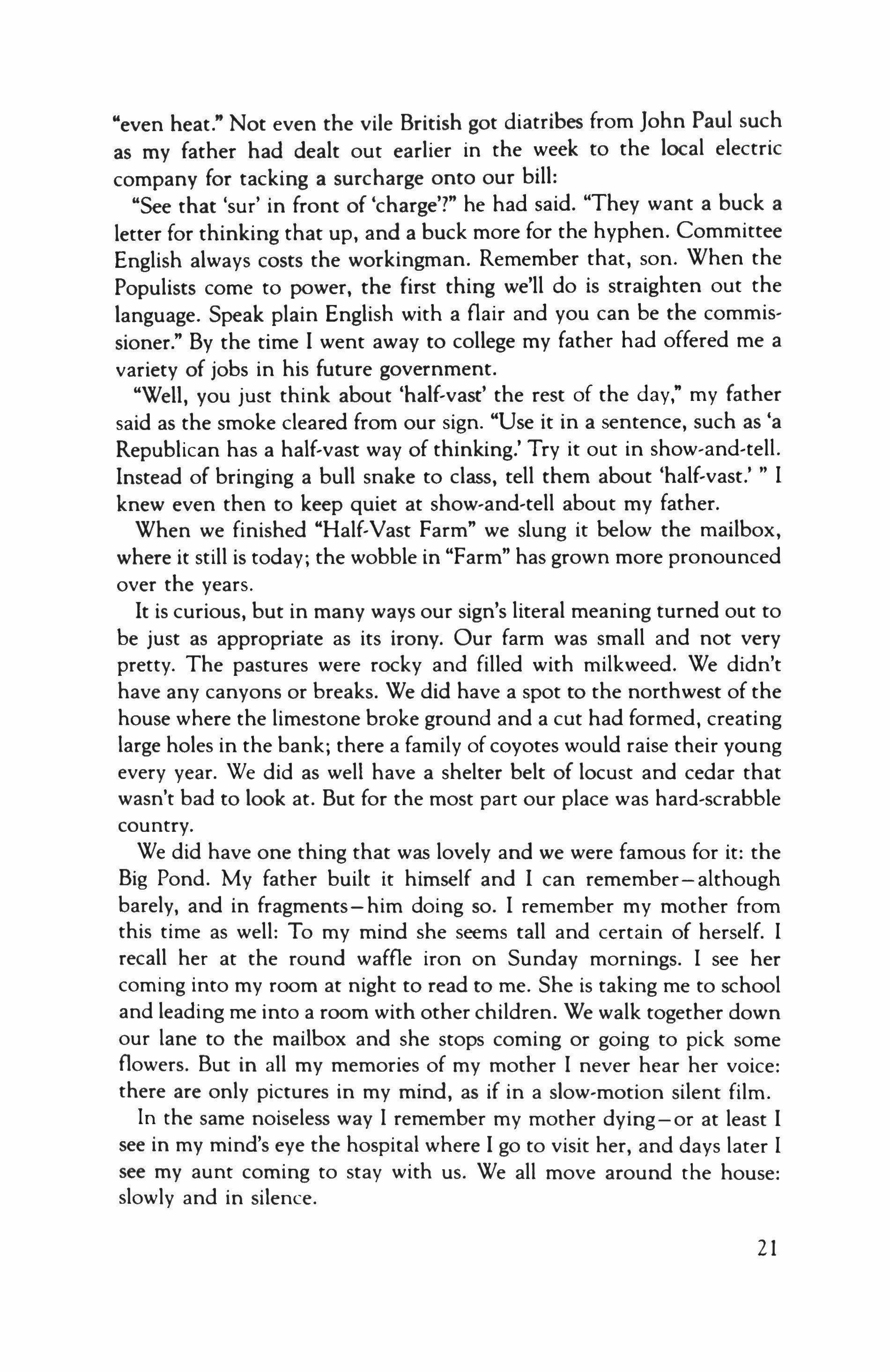
"even heat." Not even the vile British got diatribes from John Paul such as my father had dealt out earlier in the week to the local electric company for tacking a surcharge onto our bill:
"See that 'sur' in front of 'charge'?" he had said. "They want a buck a letter for thinking that up, and a buck more for the hyphen. Committee English always costs the workingman. Remember that, son. When the Populists come to power, the first thing we'll do is straighten out the language. Speak plain English with a flair and you can be the commissioner." By the time I went away to college my father had offered me a variety of jobs in his future government.
"Well, you just think about 'half-vast' the rest of the day," my father said as the smoke cleared from our sign. "Use it in a sentence, such as 'a Republican has a half-vast way of thinking.' Try it out in show-and-tell. Instead of bringing a bull snake to class, tell them about 'half-vast.' I knew even then to keep quiet at show-and-tell about my father.
When we finished "Half-Vast Farm" we slung it below the mailbox, where it still is today; the wobble in "Farm" has grown more pronounced over the years.
It is curious, but in many ways our sign's literal meaning turned out to be just as appropriate as its irony. Our farm was small and not very pretty. The pastures were rocky and filled with milkweed. We didn't have any canyons or breaks. We did have a spot to the northwest of the house where the limestone broke ground and a cut had formed, creating large holes in the bank; there a family of coyotes would raise their young every year. We did as well have a shelter belt of locust and cedar that wasn't bad to look at. But for the most part our place was hard-scrabble country.
We did have one thing that was lovely and we were famous for it: the Big Pond. My father built it himself and 1 can remember-although barely, and in fragments- him doing so. I remember my mother from this time as well: To my mind she seems tall and certain of herself. I recall her at the round waffle iron on Sunday mornings. I see her coming into my room at night to read to me. She is taking me to school and leading me into a room with other children. We walk together down our lane to the mailbox and she stops coming or going to pick some flowers. But in all my memories of my mother I never hear her voice: there are only pictures in my mind, as if in a slow-motion silent film.
In the same noiseless way I remember my mother dying-or at least I see in my mind's eye the hospital where I go to visit her, and days later I see my aunt coming to stay with us. We all move around the house: slowly and in silence.
21

I see as well the night my father does not come home, and the next afternoon when he does, I see that my mother is dead, although in my memory I cannot make anyone speak to me about it, nor can I see that I understand what it means that my mother is dead.
"Do you remember the summer when I built the pond?" my father would ask me now and again when I was growing up.
"Yes," I'd say. But in truth it is not so much a memory as a sense of a memory. Like smoke from a wood stove will stir something in your mind but you can't be sure what. When I'd try to recall my father building the pond it is more through a series of questions about what I see: am I sitting on the tailgate of the Studebaker and is my father on a tractor going down the gully that leads to where the dam is forming? Later, do I walk across the crest of that dam and look down at the film of muddy water that is beginning to gather below it? That summer do I notice frogs along the edge? And does my father show me tadpoles in the shallows? During the first winter do I go down to the pond and see that it is only half full, ice along its edges, with a flock of small ducks huddled in the west slew?
And do I remember for sure the huge wet snow the spring after my mother died and how it melted quickly so that when my father and I went to the pond we discovered it full to the banks, backed up along both sloughs, and edging over the spillway.
"Big Pond," my father claims to have said that day with me standing beside him. "We got ourselves a Big Pond here. I wish your mother could know. She'd feel good about it now."
But although our pond grew to be something lovely, over the years our farmyard became a five-acre circle of rusting trucks and tractors and various cobbled equipment in various stages of decay. My father, as it turned out, was given to farm and ranch auctions where he'd buy "iron" with the idea of converting his purchases to some use he imagined we had. The parts we assembled over the years for a log splitter that never got built covered most of the south side of the stone shed: hydraulic hoses, l-beams, two rear axles and nearly a dozen wheels. We were alsolong before energy conservation came into vogue - going to build an electric windcharger. My father even had a plan to sell the excess electricity back to the power company, which, through a regulation my father claimed to have inspired, was obliged to pay us hard cash-or at least reduce our meager bill. To that end we bought and scavenged assorted rotors and pipes and rusted generators that we stacked in a tin pole shed to the west of the house, the shed which came to be called the Electric Company.
22
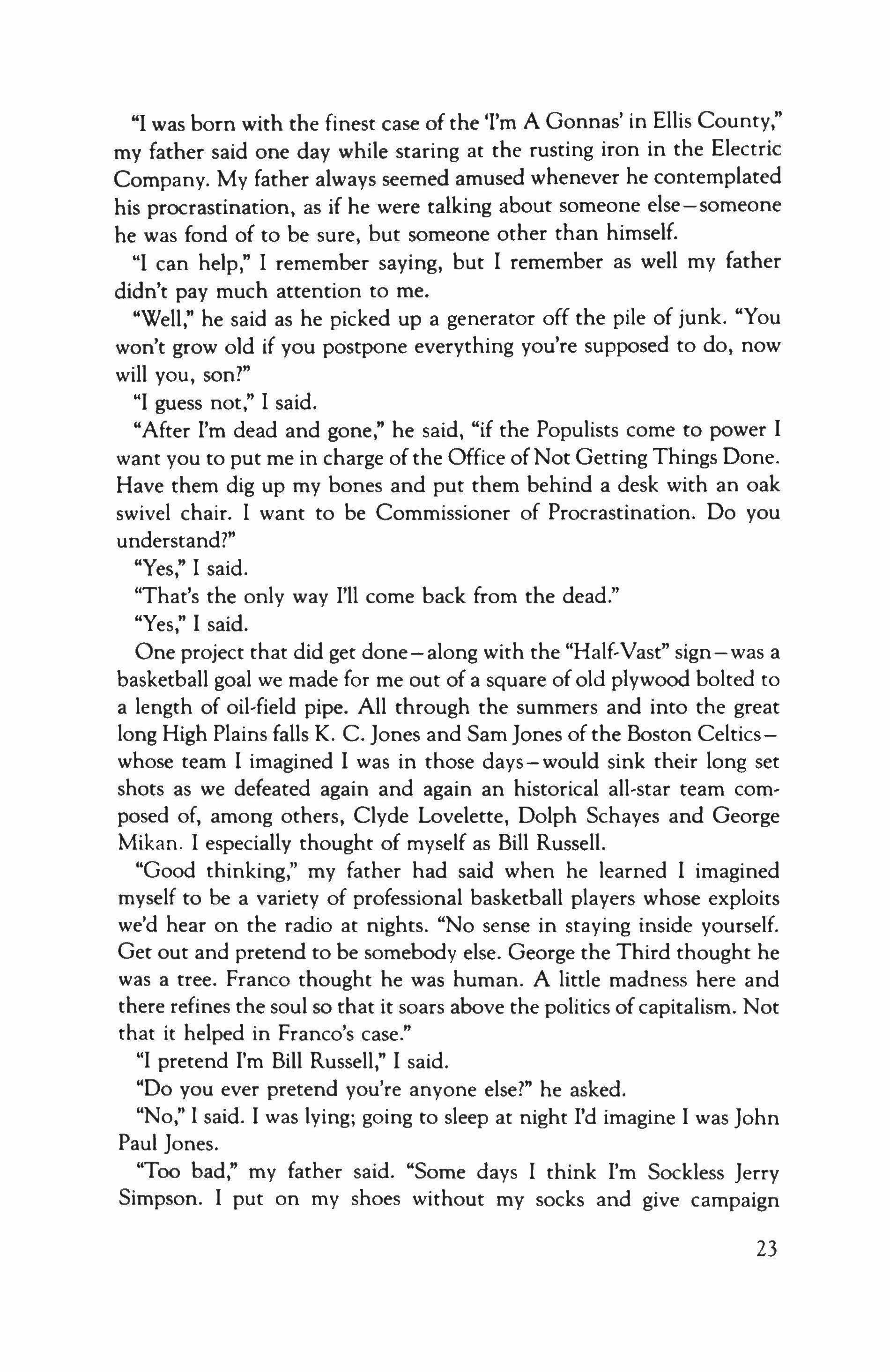
"I was born with the finest case of the 'I'm A Gonnas' in Ellis County," my father said one day while staring at the rusting iron in the Electric Company. My father always seemed amused whenever he contemplated his procrastination, as if he were talking about someone else-someone he was fond of to be sure, but someone other than himself.
"I can help," I remember saying, but I remember as well my father didn't pay much attention to me.
"Well," he said as he picked up a generator off the pile of junk. "You won't grow old if you postpone everything you're supposed to do, now will you, son?"
"I guess not," I said.
"After I'm dead and gone," he said, "if the Populists come to power I want you to put me in charge of the Office ofNot Getting Things Done. Have them dig up my bones and put them behind a desk with an oak swivel chair. I want to be Commissioner of Procrastination. Do you understand?"
"Yes," I said.
"That's the only way I'll come back from the dead."
"Yes," I said.
One project that did get done-along with the "Half-Vast" sign-was a basketball goal we made for me out of a square of old plywood bolted to a length of oil-field pipe. All through the summers and into the great long High Plains falls K. C. Jones and Sam Jones of the Boston Celticswhose team I imagined I was in those days-would sink their long set shots as we defeated again and again an historical all-star team composed of, among others, Clyde Lovelette, Dolph Schayes and George Mikan. I especially thought of myself as Bill Russell.
"Good thinking," my father had said when he learned I imagined myself to be a variety of professional basketball players whose exploits we'd hear on the radio at nights. "No sense in staying inside yourself. Get out and pretend to be somebody else. George the Third thought he was a tree. Franco thought he was human. A little madness here and there refines the soul so that it soars above the politics ofcapitalism. Not that it helped in Franco's case."
"I pretend I'm Bill Russell," I said.
"Do you ever pretend you're anyone else?" he asked.
"No," I said. I was lying; going to sleep at night I'd imagine I was John Paul Jones.
"Too bad," my father said. "Some days I think I'm Sockless Jerry Simpson. I put on my shoes without my socks and give campaign
23

speeches to the mirror in your mother's room." My father's room was always called my mother's room; it was just below mine.
"I don't hear you," I said.
"You're at school," he said. "You wouldn't want to think your father's daft, would you?"
"No," I said.
"Here," he said and tossed me my basketball, "go be Bill Russell. How splendid that in America a short fat white man can have a tall skinny black man for a son. There's hope for the damn country yet."
So, amid the junk and the bindweed of our yard, Sam Jones would flick a pass to Bill Russell, who in turn would sink yet another hook shot to win for the Celtics yet another world championship under the dome of the yellow-blue western sky while the Commissioner of Procrastination (alias Sockless Jerry Simpson) looked on with profound approval.
Probably my father thought such pretenses on the Half-Vast Farm held the seeds for better education than the one I was getting in school. It was not just the school, it was the town itself that bothered him; my father didn't like going to town, as if it tainted him - as if it tainted us. In those days Hays was slowly growing its suburbs into the surrounding pastures.
I remember one fall when I was in high school the tailgate on the pickup dropped as we sat at a stoplight near Scotty Phillips Hardware. The stove wood we'd cut that morning on the Smoky Hill rolled out onto Eighth Street in front of the station wagons and among the Bel Aires and Impalas that began honking at us - some of which were occupied by the June Allyson look-alike girls who led cheers at my school. When I jumped quickly to gather up the wood, my father stayed in the truck, rolled down his window and began to rant at the traffic jam we had caused:
"When the Populists come to power my son's going to be Commissioner of Vehicles and everybody's going to drive a truck," he bellowed. He was not given to yelling in general. His idea was to pick out someone in particular and tell them his story of social injustice; perhaps they'd go tell someone else. It was as if he meant to convert the twentieth-century acquisitive Hays, Kansas, to nineteenth-century Populism by virtue of gossip, a kind of ripples-on-the-pond theory of political activism. In this particular case he had fixed on my math teacher, a tiny young woman who had just come to Hays from Chicago and who was so startled at the pile of stove wood in the middle of Eighth Street that she had stalled her car and couldn't seem to get it going again. All
24
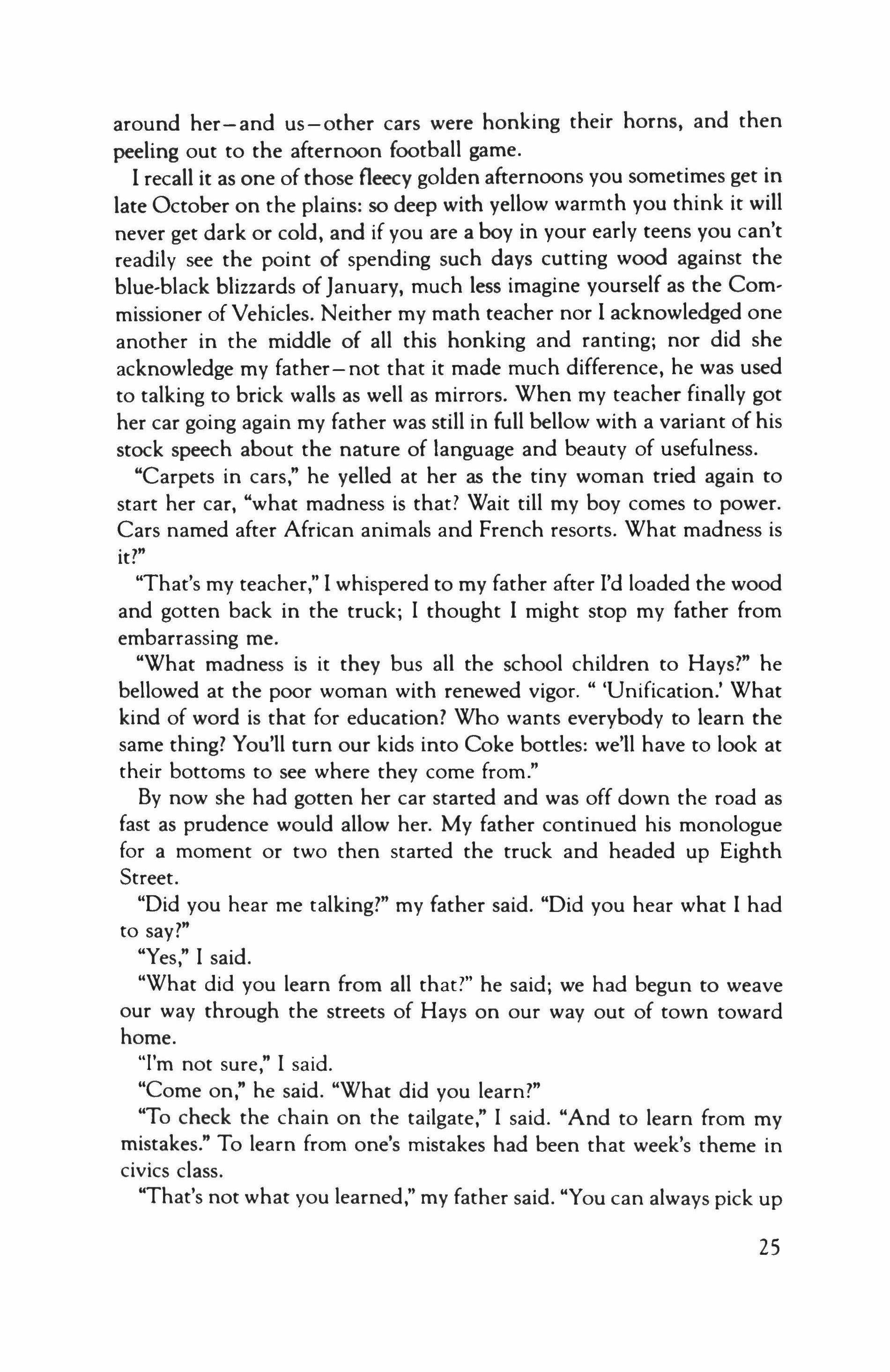
around her-and us-other cars were honking their horns, and then peeling out to the afternoon football game.
1 recall it as one of those fleecy golden afternoons you sometimes get in late October on the plains: so deep with yellow warmth you think it will never get dark or cold, and if you are a boy in your early teens you can't readily see the point of spending such days cutting wood against the blue-black blizzards of January, much less imagine yourself as the Cornmissioner of Vehicles. Neither my math teacher nor 1 acknowledged one another in the middle of all this honking and ranting; nor did she acknowledge my father-not that it made much difference, he was used to talking to brick walls as well as mirrors. When my teacher finally got her car going again my father was still in full bellow with a variant of his stock speech about the nature of language and beauty of usefulness.
"Carpets in cars," he yelled at her as the tiny woman tried again to start her car, "what madness is that? Wait till my boy comes to power. Cars named after African animals and French resorts. What madness is it?"
"That's my teacher," 1 whispered to my father after I'd loaded the wood and gotten back in the truck; I thought 1 might stop my father from embarrassing me.
"What madness is it they bus all the school children to Hays?" he bellowed at the poor woman with renewed vigor. 'Unification.' What kind of word is that for education? Who wants everybody to learn the same thing? You'll turn our kids into Coke bottles: we'll have to look at their bottoms to see where they come from."
By now she had gotten her car started and was off down the road as fast as prudence would allow her. My father continued his monologue for a moment or two then started the truck and headed up Eighth Street.
"Did you hear me talking?" my father said. "Did you hear what I had to say?"
"Yes," I said.
"What did you learn from all that?" he said; we had begun to weave our way through the streets of Hays on our way out of town toward home.
"I'm not sure," I said.
"Come on," he said. "What did you learn?"
"To check the chain on the tailgate," I said. "And to learn from my mistakes." To learn from one's mistakes had been that week's theme in civics class.
"That's not what you learned," my father said. "You can always pick up
25

wood; labor is never a waste. And if the only learning you acquire is from your mistakes, you'll grow up to be a capitalist and live in a place like that." Here my father pointed to a two-storv imitation English Tudor house that was getting built on a treeless lot near the golf course on the edge of Hays. "With matching furniture," he went on. "Carpet over good wood floors so you can't hear the creak of yourself walking. And air conditioning to steal your summers. Do you want that for a life? Do you want never to be hot or cold, and to live in a house with no sounds of its own except little electric motors running all the time? Is that what you want?"
"I wish my clothes didn't smell like wood smoke," I said. "What?" my father said.
"I heard some kids talking about me the other day," I said. "They made fun of me because I smelled like wood smoke."
"What do they smell like?" my father asked.
"They don't smell," I said. "Maybe the girls smell of perfume sometimes," I said.
"Dried and boiled French flowers," said my father, more to himself than to me. Then he was quiet for a moment; his beard was still. I think now he must have been considering whether to have one of those heartto-heart talks fathers and sons have-usually over sex, of course, but in this case it would have been over the differences between the poor and the rich, the country and the town, us and them. He might even have thought to go on at some sympathetic length about the virtues of our life in an effort to console his son. But to my father's credit, he resisted the temptation; he was the same man to me as he was to my mother's mirror: "If you don't smell of your own life you're the living dead," he said. "Which would you rather be: the living dead or stink of cottonwood smoke and cow flops?"
"I'd rather stink," 1 said. 1 wasn't sure that was true, and no doubt my hesitation was reflected in my voice, but my father didn't take me up on it.
"Well," he said, "that's one thing you learned today: Now you think about the rest of what you learned and tell me about it at great length sometime."
"Yes," I said.
"At great length and full of details, as if your mother were listening and needed to catch up," he said.
"I will," 1 said. On the road home 1 remember seeing a long line of snow geese in a ragged V heading south.
"Early blizzards," said my father as he looked at them through the
26

windshield. "We'll check Verbena's coat to see how bad it will be." He grinned through his beard; it was his combination grin: to be free from Hays was added to the thought of toughing it out through a big winter at the farm. "Your mother loved snow at night," he said as we bolted the Studebaker over Seven Hills Road on the way to the Half-Vast Farm. "She would get up in the dark and stand at the window and watch the yard fill up. You were born in a snow; whenever it snowed your mother would say it was just as much you drifting through the universe as it was tiny crystals of ice." These words of my mother's were the only ones I ever heard my father speak.
The Commissioner of Procrastination: 1904-1987
"To swim a horse across water," my father said to me, "you do not have to take off the saddle. Water doesn't hurt the saddle; you'll need to nears-foot oil it of course, but water itself doesn't hurt leather." I nodded.
It was Friday afternoon; I had come home as promised, escapingmy father pointed out in the first minutes after my arrival-the impending crash of various financial markets which in his opinion damn well deserved to tumble down: on top of me if I insisted on living off the backs of the working poor. We were sitting in the kitchen at the table. Outside it was a warm gold-and-blue day. Windless. When I was a boy it had been my job to nears-foot oil all the leather we had between us: boots, saddles, an old rifle scabbard my father had bought at farm auction against the day he was going to get a rifle to shoot a deer.
"O.K.," I said. "Let's put 'oil leather' on the weekend list. I'll do that."
"Good thinking," said my father. He seemed dreamy, as if there were something he was trying to recall but couldn't. He fiddled with his beard; over the years it had grown two tufts to it, a kind of forked beard; and while it had gone gray it had not turned white: my father looked in old age like some wizened satyr, modestly pleased with himself, but a little lost.
"First off," he continued rather abruptly after a moment of silence and with no prompting from me, "you ride your horse directly into the water; don't let him turn away from the swim at hand." I realized my father always called horses "he" or "him" no matter what their sex; in this case Verbena had been a mare for nearly thirty years.
"Yes," I said.
Usually my father took the Friday afternoon of my visit to bring me
27
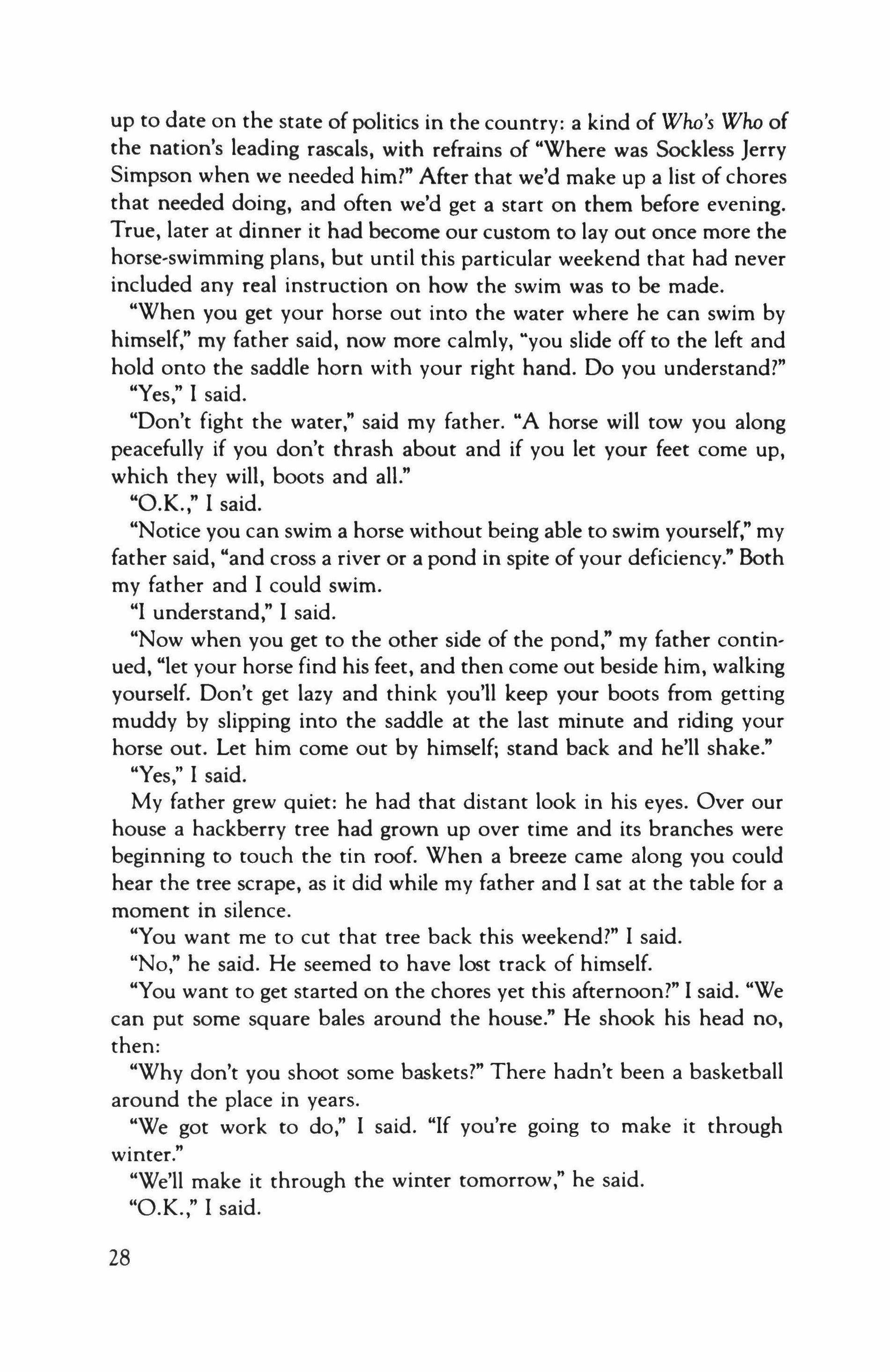
up to date on the state of politics in the country: a kind of Who's Who of the nation's leading rascals. with refrains of "Where was Sockless Jerry Simpson when we needed him?" After that we'd make up a list of chores that needed doing. and often we'd get a start on them before evening. True. later at dinner it had become our custom to layout once more the horse-swimming plans. but until this particular weekend that had never included any real instruction on how the swim was to be made.
"When you get your horse out into the water where he can swim by himself." my father said. now more calmly. "you slide off to the left and hold onto the saddle horn with your right hand. Do you understand?"
"Yes." I said.
"Don't fight the water." said my father. "A horse will tow you along peacefully if you don't thrash about and if you let your feet come up, which they will. boots and all."
"O.K .... I said.
"Notice you can swim a horse without being able to swim yourself." my father said. "and cross a river or a pond in spite of your deficiency." Both my father and I could swim.
"I understand." I said.
"Now when you get to the other side of the pond." my father continued. "let your horse find his feet. and then come out beside him. walking yourself. Don't get lazy and think you'll keep your boots from getting muddy by slipping into the saddle at the last minute and riding your horse out. Let him come out by himself; stand back and he'll shake."
"Yes." I said.
My father grew quiet: he had that distant look in his eyes. Over our house a hackberry tree had grown up over time and its branches were beginning to touch the tin roof. When a breeze came along you could hear the tree scrape. as it did while my father and I sat at the table for a moment in silence.
"You want me to cut that tree back this weekend?" I said.
"No." he said. He seemed to have lost track of himself.
"You want to get started on the chores yet this afternoon?" I said. "We can put some square bales around the house." He shook his head no. then:
"Why don't you shoot some baskets?" There hadn't been a basketball around the place in years.
"We got work to do." I said. "If you're going to make it through winter."
"We'll make it through the winter tomorrow." he said.
"O.K .• I said.
28

"You know why I'm short?" he said.
"No," I said.
"To live a long time," he said. "You don't see very many tall old men, now do you?" he said.
"No, I don't," I said. He pulled at the left fork of his beard.
"The Big Pond was the last project I saw through to the end," he said.
"There were others," I said.
"Not many," he said.
"It wasn't the point," I said.
"Shoot some baskets," he said. "Pretend you're Bill Russell. I want to read some radical paper. We'll eat turkey legs and rice at six."
"I'll cook," I said. "I've brought some things from town." I'd picked up a roast and some potatoes.
"Pizza?" he said.
"What," I said.
"You didn't bring pizza from town?" he said. "I won't have it on the farm. Imagine what it does to your colon. I want turkey legs and rice. They're in the icebox."
"O.K.," I said.
"I'm going to read," he said. He got up and went into Mother's room. I spent the afternoon laying square bales around the base ofthe house; once I went out to the basketball goal and looked at it. The net was gone and the rim was rusted. But the Boston Garden looked much the same even though some bindweed was creeping in on the western edge of the parquet. I took an imaginary shot and made it.
Around sundown I came back to the house. I could smell the cottonwood smoke in the yard and knew that my father had fired up the Melrose Oak to boil his turkey legs. We had a fine dinner at the kitchen table and spent the evening talking about the time we'd lost the load of wood on Eighth Street. I was going to tell my father some of what I'd learned that day, but he put his finger to his lips and shook his head.
"Keep it in," he said as his finger bounced against the shag of his beard and mustache that in winter he'd let close in over his mouth. "Keep it in until it grows wings and talons and flies out of you by itself. It will soar. It will find me. It will have good eyes."
The next morning when I got up my father was out of the house. I poured myself some coffee and read the Farm News: the editorial letters were about the Middle East and parity. The quotations at the bottoms of the columns ran from Gandhi to Reagan. I thought my father might have gone to town.
"I've got the horse," he said as he came in a few minutes later.
29
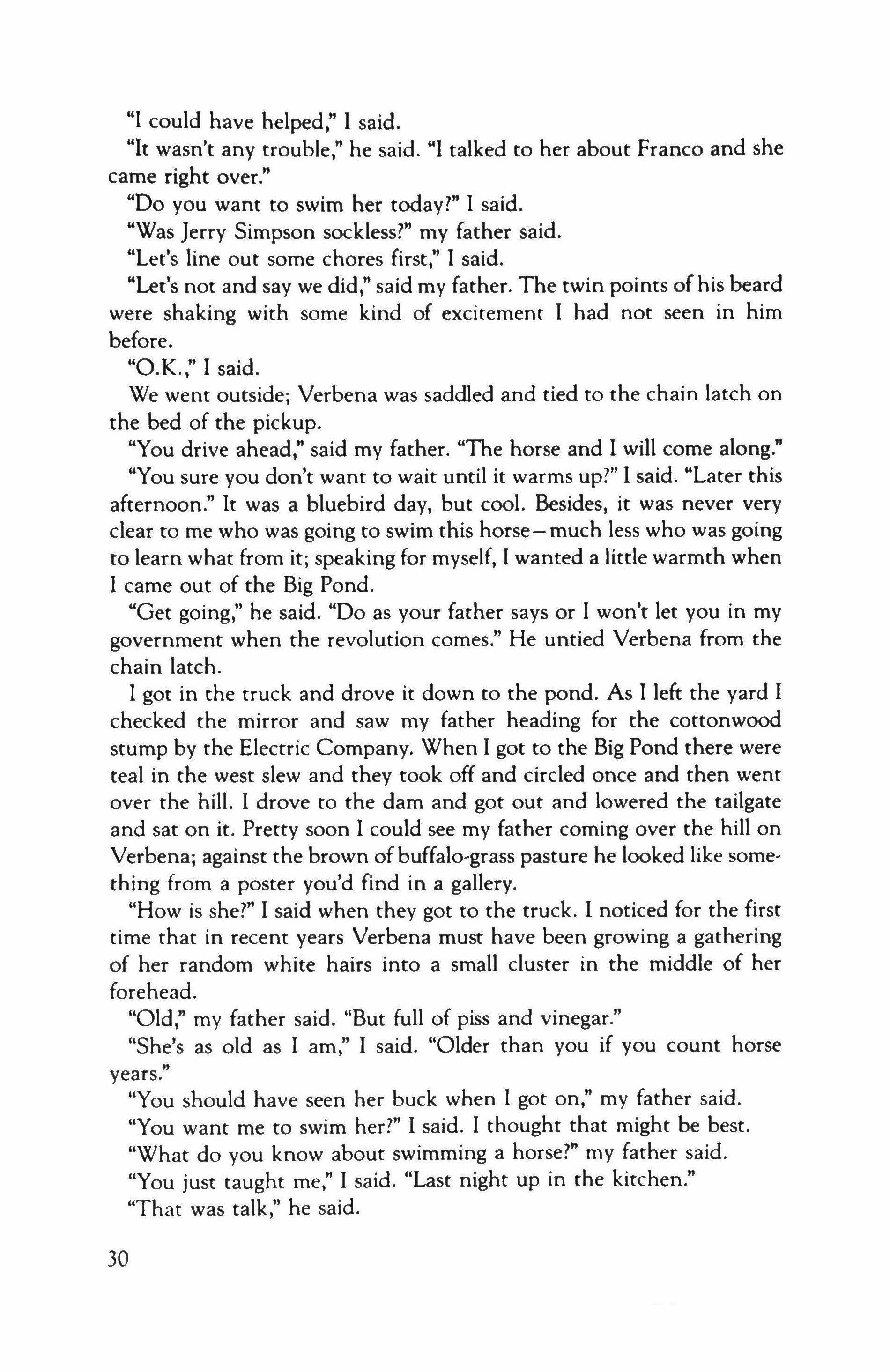
"I could have helped," I said.
"It wasn't any trouble," he said. "I talked to her about Franco and she came right over."
"Do you want to swim her today?" I said.
"Was Jerry Simpson sockless?" my father said.
"Let's line out some chores first," I said.
"Let's not and say we did," said my father. The twin points of his beard were shaking with some kind of excitement I had not seen in him before.
"O.K. ," I said.
We went outside; Verbena was saddled and tied to the chain latch on the bed of the pickup.
"You drive ahead," said my father. "The horse and I will come along."
"You sure you don't want to wait until it warms up?" I said. "Later this afternoon." It was a bluebird day, but cool. Besides, it was never very clear to me who was going to swim this horse-much less who was going to learn what from it; speaking for myself, I wanted a little warmth when I came out of the Big Pond.
"Get going," he said. "Do as your father says or I won't let you in my government when the revolution comes." He untied Verbena from the chain latch.
I got in the truck and drove it down to the pond. As I left the yard I checked the mirror and saw my father heading for the cottonwood stump by the Electric Company. When I got to the Big Pond there were teal in the west slew and they took off and circled once and then went over the hill. I drove to the dam and got out and lowered the tailgate and sat on it. Pretty soon I could see my father coming over the hill on Verbena; against the brown of buffalo-grass pasture he looked like something from a poster you'd find in a gallery.
"How is she?" I said when they got to the truck. I noticed for the first time that in recent years Verbena must have been growing a gathering of her random white hairs into a small cluster in the middle of her forehead.
"Old," my father said. "But full of piss and vinegar."
"She's as old as I am," I said. "Older than you if you count horse years."
"You should have seen her buck when I got on," my father said.
"You want me to swim her?" I said. I thought that might be best.
"What do you know about swimming a horse?" my father said.
"You just taught me," I said. "Last night up in the kitchen."
'That was talk," he said.
30
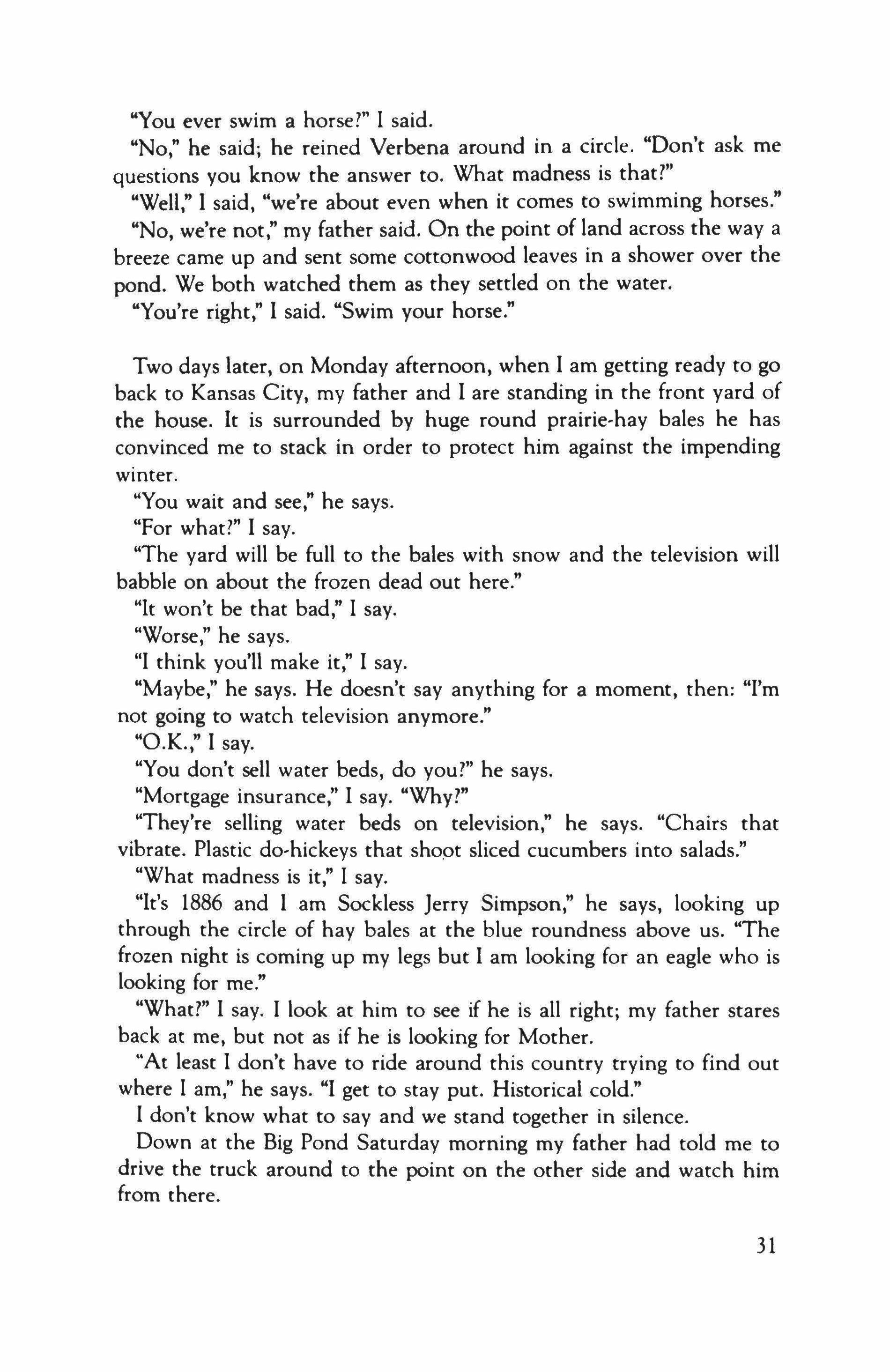
"You ever swim a horse?" I said. "No," he said; he reined Verbena around in a circle. "Don't ask me questions you know the answer to. What madness is that?"
"Well," I said, "we're about even when it comes to swimming horses."
"No, we're not," my father said. On the point of land across the way a breeze came up and sent some cottonwood leaves in a shower over the pond. We both watched them as they settled on the water.
"You're right," I said. "Swim your horse."
Two days later, on Monday afternoon, when I am getting ready to go back to Kansas City, my father and I are standing in the front yard of the house. It is surrounded by huge round prairie-hay bales he has convinced me to stack in order to protect him against the impending winter.
"You wait and see," he says.
"For what?" I say.
"The yard will be full to the bales with snow and the television will babble on about the frozen dead out here."
"It won't be that bad," I say.
"Worse," he says.
"I think you'll make it," I say.
"Maybe," he says. He doesn't say anything for a moment, then: "I'm not going to watch television anymore."
"O.K.," I say.
"You don't sell water beds, do you?" he says.
"Mortgage insurance," I say. "Why?"
"They're selling water beds on television," he says. "Chairs that vibrate. Plastic doohickeys that shoot sliced cucumbers into salads."
"What madness is it," I say.
"It's 1886 and I am Sockless Jerry Simpson," he says, looking up through the circle of hay bales at the blue roundness above us. "The frozen night is coming up my legs but 1 am looking for an eagle who is looking for me."
"What?" 1 say. 1 look at him to see if he is all right; my father stares back at me, but not as if he is looking for Mother.
"At least 1 don't have to ride around this country trying to find out where 1 am," he says. "I get to stay put. Historical cold."
I don't know what to say and we stand together in silence.
Down at the Big Pond Saturday morning my father had told me to drive the truck around to the point on the other side and watch him from there.
31

"You can't learn about swimming a horse without watching me do it head on," he had said.
When I got to the point I could see that my father had dismounted and was patting Verbena on her rump. A small cloud of dust came off when he did that and floated away in the slight breeze. Then he groundtied her and walked along the water's edge toward the dam. I couldn't tell what he was doing. The horse looked after him. In a moment he came back and I wondered how he would get into the saddle without his tree stump, but he seemed to spring onto the horse, jumping his foot into the backward facing stirrup and swinging himself into the saddle in a sure manner like a Western-movie cowboy.
Verbena was startled for a moment; she did a little crow-hop buck. My father made a circle to the left and then came straight at me into the pond. Verbena kept her head up and her nostrils were flared.
"Answer a letter with a letter," my father finally says as we stand in the yard amid the bales. "Not with a phone call. Don't put money in Ma Bell's pocket. Don't call me on Father's Day or New Year's or Easter. Don't send me any of those stupid greeting cards. 'Greeting card.' What kind of language is that? It's nothing but a gimmick so the vice president can slip his hand into your pocket while you're under the spell of the great blue hump of sentimentality. If they don't get rich on the raw red backs of the working people they do it on the sentimentality of the middle class."
"I understand," I say.
"Do you read what I mail you?" he asks. "Have you read your Veblen? Have you read the Little Blue Books? I don't want to be sending this stuff into the void. The post office doesn't censor mail anymore; thank God we won that battle."
"We did," I say.
"Don't eat Velveeta cheese," my father says. "Or Ann Page bread."
"I won't," I say.
"Not even rats will eat white bread," he says. "That's why they made it in the first place, so mice and rats wouldn't poop in the flour."
"I think you're right," I say.
We shake hands and stand there in the circle of huge hay bales and look at the ridge they make around the house. Toward the east I can see the top of my basketball goal.
"You notice that white patch that's coming out on Verbena's head?" my father says after a moment.
"I told you 1 did," I say. He nods.
"Historical cold," my father says.
32
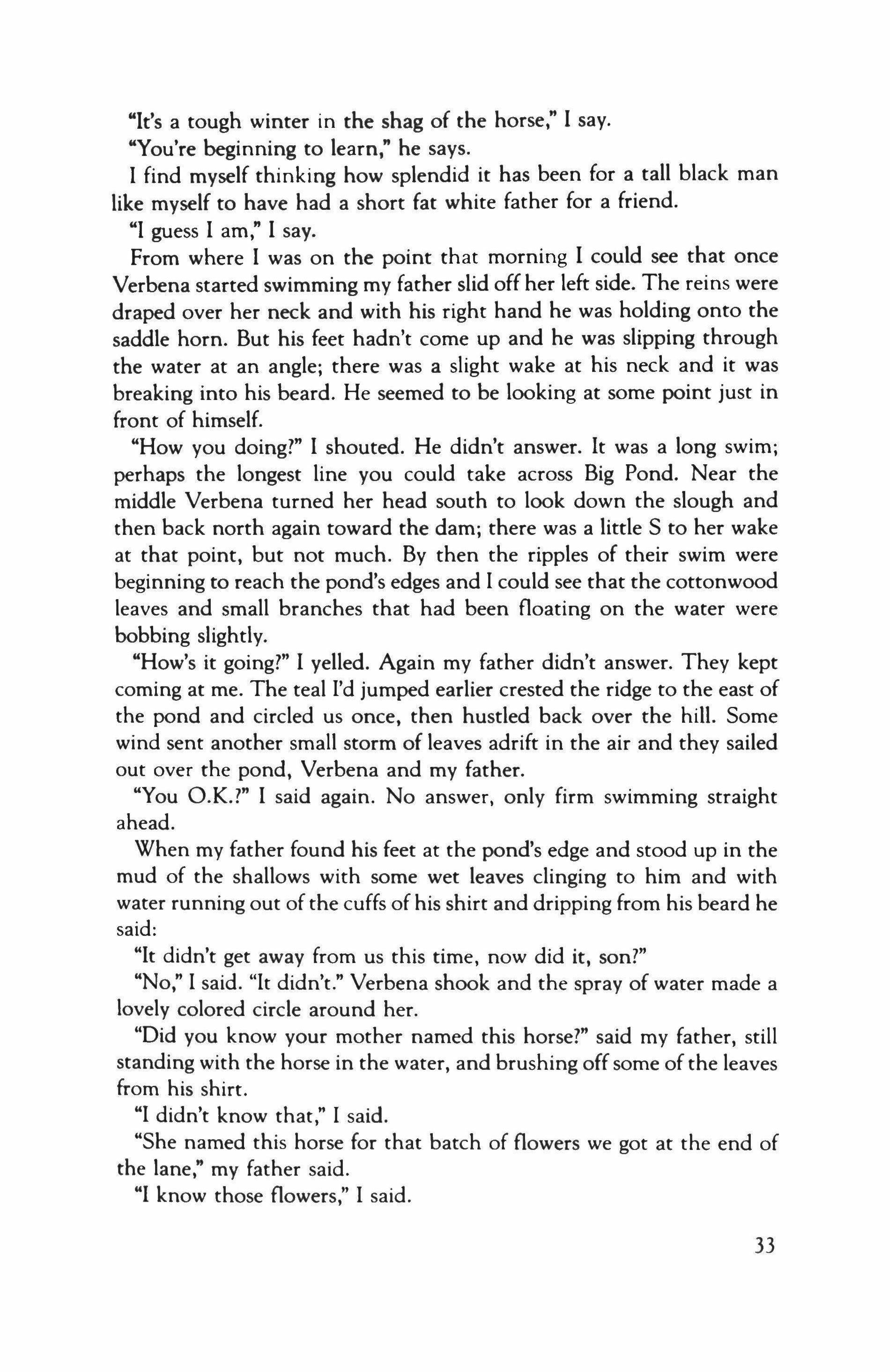
"It's a tough winter in the shag of the horse," I say.
"You're beginning to learn," he says.
I find myself thinking how splendid it has been for a tall black man like myself to have had a short fat white father for a friend.
"I guess I am," I say.
From where I was on the point that morning I could see that once Verbena started swimming my father slid off her left side. The reins were draped over her neck and with his right hand he was holding onto the saddle horn. But his feet hadn't come up and he was slipping through the water at an angle; there was a slight wake at his neck and it was breaking into his beard. He seemed to be looking at some point just in front of himself.
"How you doing?" I shouted. He didn't answer. It was a long swim; perhaps the longest line you could take across Big Pond. Near the middle Verbena turned her head south to look down the slough and then back north again toward the dam; there was a little S to her wake at that point, but not much. By then the ripples of their swim were beginning to reach the pond's edges and I could see that the cottonwood leaves and small branches that had been floating on the water were bobbing slightly.
"How's it going?" I yelled. Again my father didn't answer. They kept coming at me. The teal I'd jumped earlier crested the ridge to the east of the pond and circled us once, then hustled back over the hill. Some wind sent another small storm of leaves adrift in the air and they sailed out over the pond, Verbena and my father.
"You O.K.?" I said again. No answer, only firm swimming straight ahead.
When my father found his feet at the pond's edge and stood up in the mud of the shallows with some wet leaves clinging to him and with water running out of the cuffs of his shirt and dripping from his beard he said:
"It didn't get away from us this time, now did it, son?"
"No," I said. "It didn't." Verbena shook and the spray of water made a lovely colored circle around her.
"Did you know your mother named this horse?" said my father, still standing with the horse in the water, and brushing off some of the leaves from his shirt.
"I didn't know that," I said.
"She named this horse for that batch of flowers we got at the end of the lane," my father said.
"I know those flowers," I said.
33

"So do I," my father said. "I'd pick some for your mother now and then to make up for my madness."
"Do you need help?" I said.
"Who knows?" he said.
In a moment he seemed to gather himself and walked out through the mud and up onto the bank. The horse shook again, and my father stomped his boots and water shot out of the seams at the soles.
"How was it?" I said.
"Your mother would have been proud of you," he said. "That's her in the head of the horse. The white coming out. That's your mother."
"I am snow," I said.
"I wonder where I'll wind up," he said. "I want to be a soaring bird; some great soaring bird with eyes so good he can spot the wobble in 'Farm' on the Half-Vast sign. Did you ever notice that?"
"Yes," I said.
I tried to get my father to let me lead the horse back up to the house, but he wouldn't hear of it.
"Give me a boot lift into the saddle, son," he said. "It's about time I let you do something for me."
I followed them back in the truck. The sun was to the south and warm; it was the kind of warmth that cuts through the coolness and it warmed each one of us and we in turn warmed the surrounding air.
When we got to the house my father gave me the horse and went inside to change his clothes. That afternoon we started doing the chores we usually did to get him ready for winter, and that evening I brought the saddle and other gear in by the Melrose and gave them a good coat of near's-foot oil while we talked. My father seemed subdued.
"What did you learn from swimming a horse?" he said at last.
"That it can be done," I said. After all these years I thought I'd try a little irony on my poor father; it didn't work.
"That's not all there was to learn," he said; there wasn't any rancor in his voice; his beard did not shake itself at me.
"How about you?" I said. "What did you learn?"
"I'd rather not say now that it's over," he said. Perhaps it was the flat way he spoke that made something like Verbena's shake when she came out of the pond go through my body. My father noticed it and his eyes widened for a moment.
"You're O.K.," he said.
"Yes," I said. We listened to the tree scrape on the roof. I felt as if I had come through some historical place and was on the other side: there the light was lively and open, bright as a High Plains summer morning. I
34

could hear my father talking; he was speaking out of the light, and what he had to say was not in words, but in the chunks and particles of our life: boots and generators and language and hoops and straw and trucks and wood and sorry cattle. And me. Standing in the stream of lovely rubble 1 saw myself conceived.
"Do you remember your mother?" my father said.
"I don't remember the sound of her voice," I said.
"Neither do I," said my father. He looked at me as if to test his memory of who I was.
"Tell me about mortgage insurance," he said.
"You don't want to know," I said.
"You don't cheat the working poor, do you?" he said.
"No," I said.
"You don't think time's money, do you?"
"No, I don't," 1 said.
"Do you know what 'gossamer' means?" he said.
"Yes, I do," I said.
"Well, there's some hope in the world yet," he said.
"I may not be it," I said.
"You might be," he said. "I was."
That was Saturday night. We worked together two more days to button up: plastic storm windows, stove-black, wood, square bales, round bales.
It is Monday noon and I am ready to leave and we are standing together in the yard.
"The blizzard of 1886," said my father.
"I think you're right this time," I say.
"Keep me in mind," he says. He taps his head, then lays his hand on mine. I realize we have not touched each other much over the years.
"See your father in your mind's eye," he says with his hand on my head.
"I can't do anything else," I say.
"You're learning," he says.
That winter was mild; but in the spring two blizzards back to back buried the place and my father was stuck for weeks. The phones were dead; the power lines were down. When the neighbors and I got him out by using a tractor to clear the lane, we found him in the yard amid the round bales sitting atop a saddled Verbena in the snowy sunshine.
"I would have made it out," he said to me as I came through the drifts.
"But I didn't know why I should. This horse and I have been riding in circles once a day and talking to keep in practice."
"Keep in practice for what?" I said.
35

"Somebody's got to stay honest," he said. After everyone left and I was alone with him, he told me he'd heard my mother's voice during the second blizzard.
"It's a delicate voice," he said. "With small blue petals in it."
"I know," I said.
36
Good Works
E. S. Goldman

1The ads in the school papers and summer-theater programs and churchbazaar fliers aren't from stores in the mall, they're from Henryot's or The Pharm or Beth's or me. When two high-school girls come in with those big notebooks (they always travel in pairs to sell ads; it's such a, you know, like an awful experience asking strangers for money) I can tell it's an ad as soon as they walk in the door.
If it isn't an ad it's raffle tickets or they want merchandise for an auction. They think we get merchandise free. They talk about sales and profits as if they were the same. They don't know anything. They know what I knew at their age.
I always used to ask their names. I used to think, Do I know her mother? Is her mother a customer? What circulation do I get? I let them know in a polite way it was blackmail. Before I gave in I asked why they didn't go to the mall and ask those big jeans outfits they give all their business to, those mix-and-match tycoons listed on the stock exchange. I got back the kind of S.A.T. 850 look that tells the Japanese they're going to inherit the world. Sometimes they enlightened me, "There's nobody to talk to at those places. It's a big deal. They have to get an okay from Oklahoma."
So they nickel-and-dime the local merchants to death.
I was always aggravated by it until Mahlon Weber said, "Forget it. What does it amount to? Make believe you had to take a couple hundred dollars a year more in markdowns. Dole it out with a big smile as if you enjoyed it. They'll tell their mothers how nice you are."
Fair enough. Mahlon was a real-estate man but he knew more about
37

stores than anybody else. When my husband was killed in the head-on on that damn Route 6 and I had the insurance money, I thought of opening a shop and asked Mahlon for a location. I mentioned the new strip of shops they were building in back of the printing plant.
"Forget it. Not one of those people will be in business in five years. They can't make a living in rooms that small, Eleanor, only jewelers can make a living in three hundred square feet on Cape Cod except in a mall. Work for somebody for a year and find out some things. Then come and see me if you still want to do it." And I did.
That was eighteen years ago. I still don't do anything important without first having coffee with Mahlon Weber.
It was my first year in business and I was still in my grudging mode about ads when a frail little black man wearing a clerical collar came in. I knew as soon as he walked in the door he wanted some kind ofcontribution and I knew I not only was going to give it to him but I wanted to. I was on his side. We didn't see many black people shopping gift stores at my end of the Cape. We see more now, mostly professionals-lawyers and doctors who know their way around. Portuguese people are part of the scene here like everybody else, but that's not black. A few resort areas on the Vineyard and around Bass River and Hyannis have substantial black clientele. They just don't come to this part of the Cape, or they hurdle it and go to Provincetown. I don't know the details. I don't try to save the world. I just open my door.
I can't tell you how simpatico I felt for this little guy before he even opened his mouth. It was as hot an afternoon in August as we ever get. Everybody was at the beach, we had only a couple of elderly nonswimmers poking through the stock, and here comes this little ancestrally black preacher in a big collar he could have entered from the bottom, a Capone-brim black felt hat, winter-weight black suit, black shirt, black police shoes. No gloves? He took off the hat and wiped the sweatband and his face. He excavated sweat inside the collar with a handkerchief that had been folded and padded more than once looking for a dry corner. He wiped the top of his head. He had fine small features and amused eyes. He was I thought quite old but I really couldn't tell as he had no hair to give me a clue. In retrospect, he was probably a wellworn sixty.
"How would you like a Coke?" I offered. I kept a few things with my lunch in a refrigerator in the stockroom. "I never saw anybody who needed it more."
"Oh thank you very much." His voice was breathy and barely audible. His head stuck out of his collar like a head at a carnival to throw a ball
38
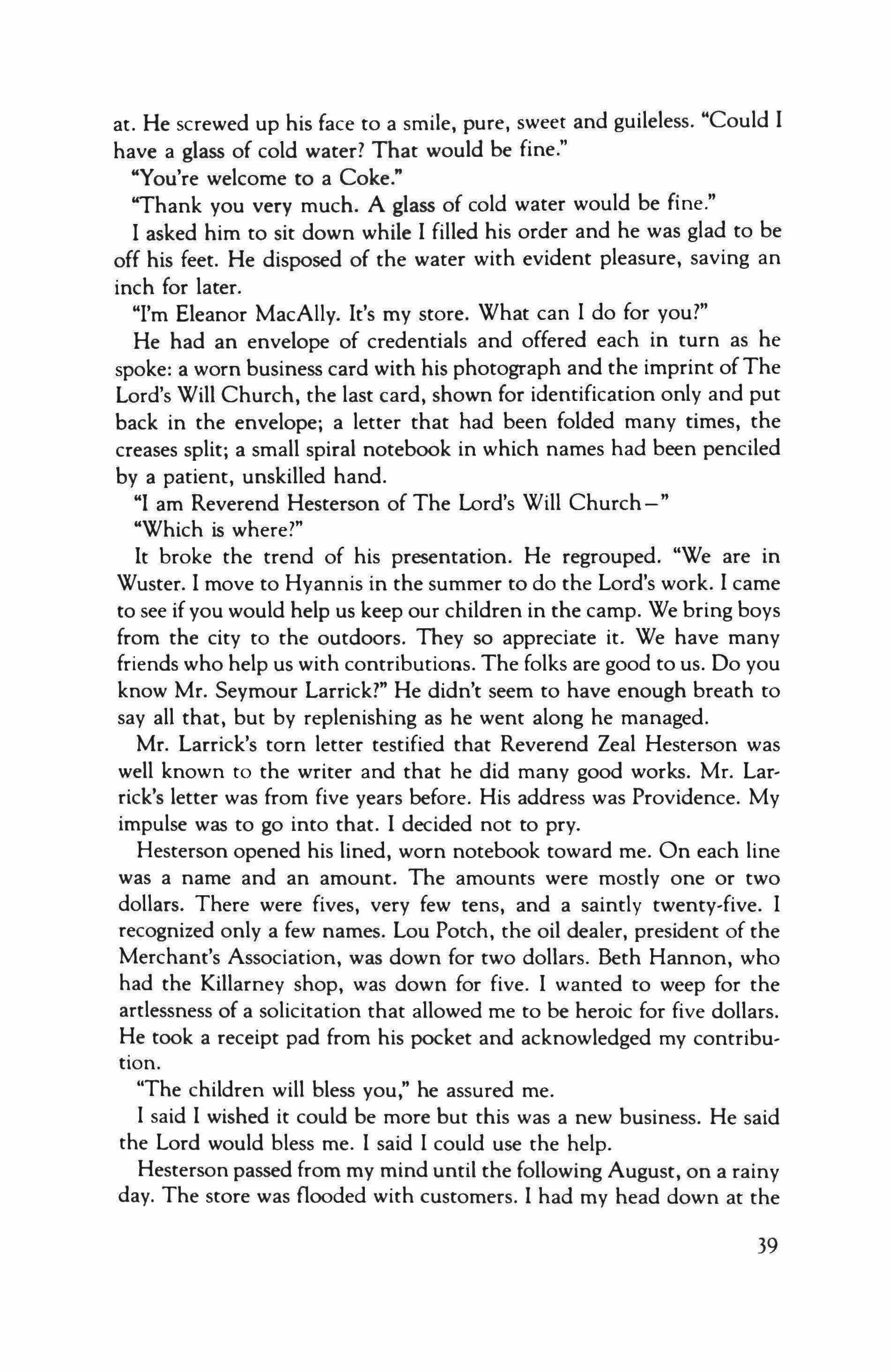
at. He screwed up his face to a smile, pure, sweet and guileless. "Could I have a glass of cold water? That would be fine."
"You're welcome to a Coke."
"Thank you very much. A glass of cold water would be fine."
I asked him to sit down while I filled his order and he was glad to be off his feet. He disposed of the water with evident pleasure, saving an inch for later.
"I'm Eleanor MacAlly. It's my store. What can I do for you?"
He had an envelope of credentials and offered each in turn as he spoke: a worn business card with his photograph and the imprint ofThe Lord's Will Church, the last card, shown for identification only and put back in the envelope; a letter that had been folded many times, the creases split; a small spiral notebook in which names had been penciled by a patient, unskilled hand.
"I am Reverend Hesterson of The Lord's Will ChurchII "Which is where?"
It broke the trend of his presentation. He regrouped. "We are in Wuster. I move to Hyannis in the summer to do the Lord's work. I came to see if you would help us keep our children in the camp. We bring boys from the city to the outdoors. They so appreciate it. We have many friends who help us with contributions. The folks are good to us. Do you know Mr. Seymour Larrick?" He didn't seem to have enough breath to say all that, but by replenishing as he went along he managed.
Mr. Larrick's torn letter testified that Reverend Zeal Hesterson was well known to the writer and that he did many good works. Mr. Larrick's letter was from five years before. His address was Providence. My impulse was to go into that. I decided not to pry.
Hesterson opened his lined, worn notebook toward me. On each line was a name and an amount. The amounts were mostly one or two dollars. There were fives, very few tens, and a saintly twenty-five. I recognized only a few names. Lou Potch, the oil dealer, president of the Merchant's Association, was down for two dollars. Beth Hannon, who had the Killarney shop, was down for five. I wanted to weep for the artlessness of a solicitation that allowed me to be heroic for five dollars. He took a receipt pad from his pocket and acknowledged my contribution.
"The children will bless you," he assured me.
I said I wished it could be more but this was a new business. He said the Lord would bless me. I said I could use the help.
Hesterson passed from my mind until the following August, on a rainy day. The store was flooded with customers. I had my head down at the
39
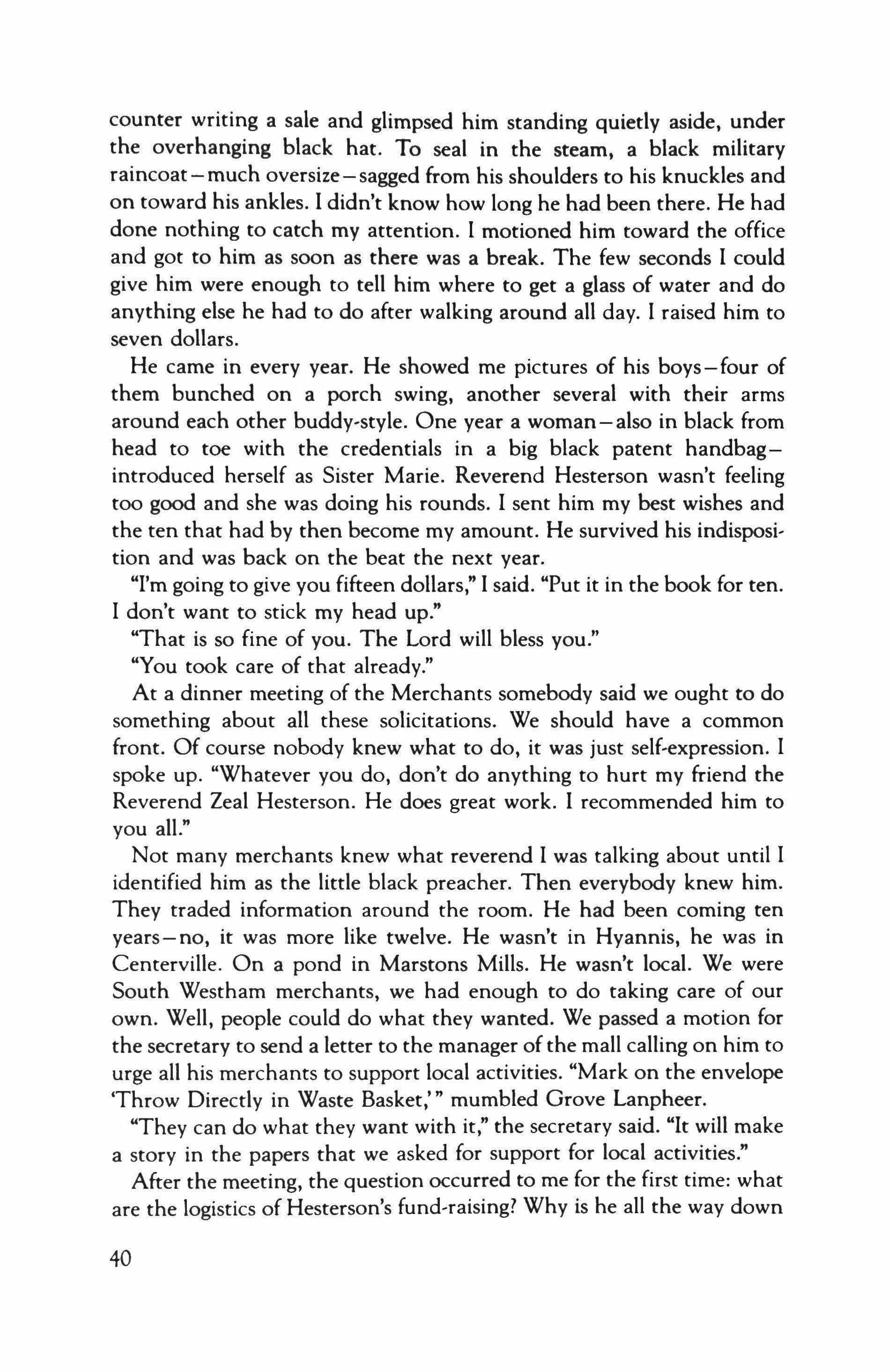
counter writing a sale and glimpsed him standing quietly aside, under the overhanging black hat. To seal in the steam, a black military raincoat-much oversize-sagged from his shoulders to his knuckles and on toward his ankles. I didn't know how long he had been there. He had done nothing to catch my attention. 1 motioned him toward the office and got to him as soon as there was a break. The few seconds I could give him were enough to tell him where to get a glass of water and do anything else he had to do after walking around all day. 1 raised him to seven dollars.
He came in every year. He showed me pictures of his boys-four of them bunched on a porch swing, another several with their arms around each other buddv-stvle. One year a woman - also in black from head to toe with the credentials in a big black patent handbagintroduced herself as Sister Marie. Reverend Hesterson wasn't feeling too good and she was doing his rounds. I sent him my best wishes and the ten that had by then become my amount. He survived his indisposition and was back on the beat the next year.
"I'm going to give you fifteen dollars," 1 said. "Put it in the book for ten. 1 don't want to stick my head up."
"That is so fine of you. The Lord will bless you."
"You took care of that already."
At a dinner meeting of the Merchants somebody said we ought to do something about all these solicitations. We should have a common front. Of course nobody knew what to do, it was just self-expression. 1 spoke up. "Whatever you do, don't do anything to hurt my friend the Reverend Zeal Hesterson. He does great work. 1 recommended him to you all."
Not many merchants knew what reverend 1 was talking about until I identified him as the little black preacher. Then everybody knew him. They traded information around the room. He had been coming ten years-no, it was more like twelve. He wasn't in Hyannis, he was in Centerville. On a pond in Marstons Mills. He wasn't local. We were South Westham merchants, we had enough to do taking care of our own. Well, people could do what they wanted. We passed a motion for the secretary to send a letter to the manager of the mall calling on him to urge all his merchants to support local activities. "Mark on the envelope 'Throw Directly in Waste Basket,'" mumbled Grove Lanpheer.
"They can do what they want with it," the secretary said. "It will make a story in the papers that we asked for support for local activities."
After the meeting, the question occurred to me for the first time: what are the logistics of Hesterson's fund-raising? Why is he all the way down
40

here in South Westham? How does he decide who gets the privilege of a solicitation?
I stopped in to have the motel's continental breakfast with friends staying at Ship Wright's where Center Street comes into town off Route 6. The morning sun hadn't yet come up to speed. We sat on the porch settling world affairs and watching the amazing amount of traffic coming into town that early, a stream of vacationers getting shopping and laundry out of the way so they could go to the beach, a lot of vans and pickups with local workmen headed for jobs; and the Reverend Zeal Hesterson and Sister Marie, parking in the small empty lot next to that important-looking electrical setup; generators or dynamos-a rig of the electric company. Nobody thinks to park there, but it doesn't say No Parking and there is shade all day long.
Sister Marie went into the foreign-car agency on the corner. Hesterson crossed the street and went into the bank. I was still telling my friends about Hesterson, when he came out and went into the oculist's shop next door. In a minute or two Sister Marie finished at the car agency and went next-door to Anthony's Letter Shop. I didn't see them when I drove through town to my store. When I came back to the center for lunch I saw him going into the toy store.
He got to me at the usual time, mid-afternoon. We talked about the logistics. He and Sister Marie began on the main street at one end of every town on Cape Cod from Falmouth to Provincetown and went on to the end of the day. Then they walked back and got their car. In some towns like ours they did more than one street, some towns took two or three days, some like Truro they could do in a morning. All summer, rain or shine, door to door, wearing their credentials of respectability.
"That's some schedule," I said.
"The Lord has in mind to ask no more than we can give."
"It doesn't allow you much time for the boys, does it?"
"I have good helpers."
I gave him twenty-five. "Show me on the list for ten, same as before."
He thanked me and got up to leave. I noticed that the tops of his shoes were wrinkled and slits showed between the uppers and the sales when he walked. He didn't walk easily. He walked as if he didn't want to roll over on his toes. He walked as if his feet hurt. "Get yourself a pair of shoes sometimes." I went to the register again. "This isn't for the camp. This is for shoes."
He gave me his beatific smile. I said, "Remember, that's for you, nobody else. I want to see you in real shoes the next time."
41
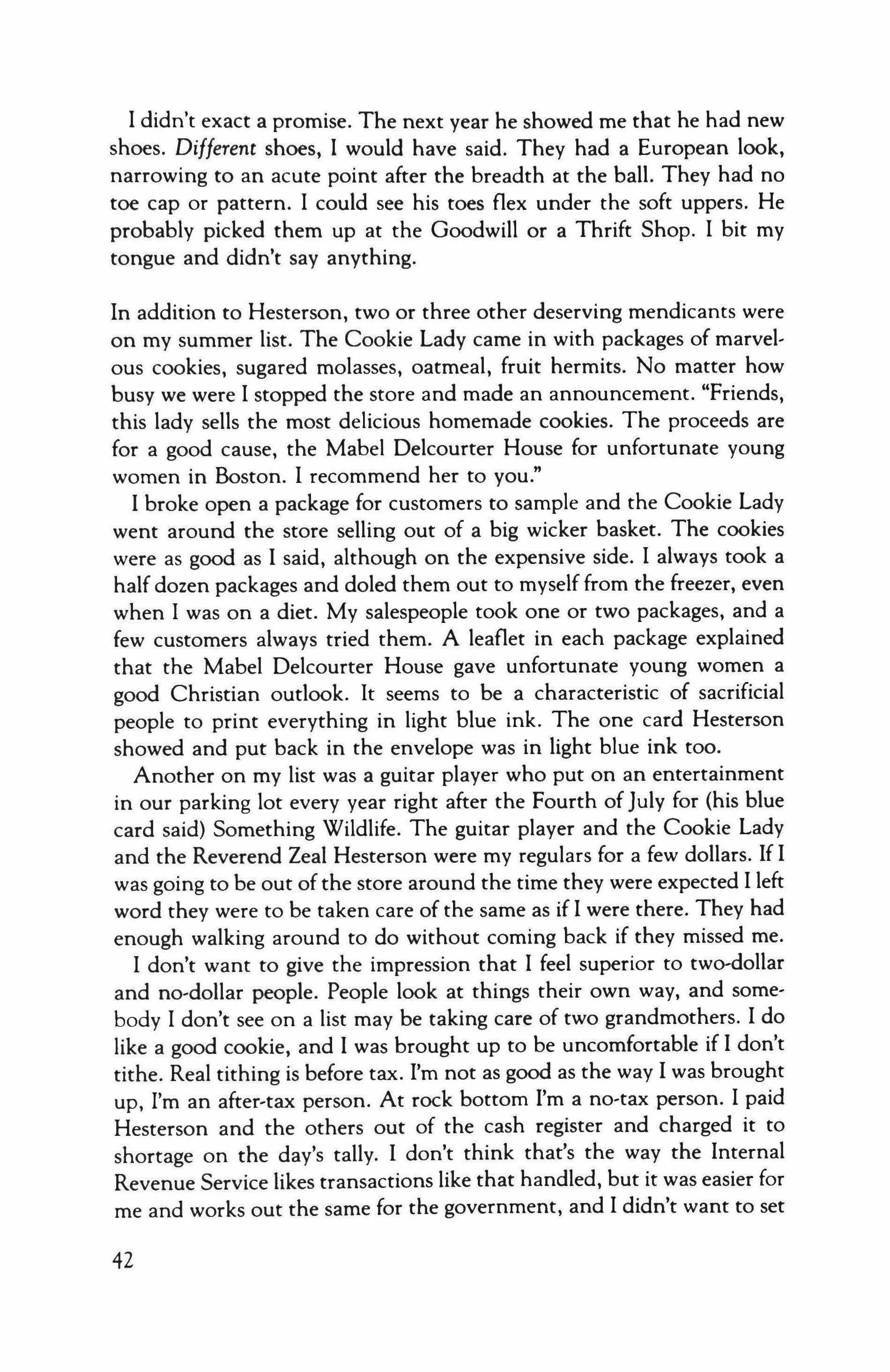
I didn't exact a promise. The next year he showed me that he had new shoes. Different shoes, I would have said. They had a European look, narrowing to an acute point after the breadth at the ball. They had no toe cap or pattern. I could see his toes flex under the soft uppers. He probably picked them up at the Goodwill or a Thrift Shop. I bit my tongue and didn't say anything.
In addition to Hesterson, two or three other deserving mendicants were on my summer list. The Cookie Lady came in with packages of marvelous cookies, sugared molasses, oatmeal, fruit hermits. No matter how busy we were I stopped the store and made an announcement. "Friends, this lady sells the most delicious homemade cookies. The proceeds are for a good cause, the Mabel Delcourter House for unfortunate young women in Boston. I recommend her to you."
I broke open a package for customers to sample and the Cookie Lady went around the store selling out of a big wicker basket. The cookies were as good as I said, although on the expensive side. I always took a half dozen packages and doled them out to myself from the freezer, even when I was on a diet. My salespeople took one or two packages, and a few customers always tried them. A leaflet in each package explained that the Mabel Delcourter House gave unfortunate young women a good Christian outlook. It seems to be a characteristic of sacrificial people to print everything in light blue ink. The one card Hesterson showed and put back in the envelope was in light blue ink too.
Another on my list was a guitar player who put on an entertainment in our parking lot every year right after the Fourth ofJuly for (his blue card said) Something Wildlife. The guitar player and the Cookie Lady and the Reverend Zeal Hesterson were my regulars for a few dollars. If I was going to be out of the store around the time they were expected I left word they were to be taken care of the same as if I were there. They had enough walking around to do without coming back if they missed me.
I don't want to give the impression that I feel superior to two-dollar and no-dollar people. People look at things their own way, and somebody I don't see on a list may be taking care of two grandmothers. I do like a good cookie, and I was brought up to be uncomfortable if I don't tithe. Real tithing is before tax. I'm not as good as the way I was brought up, I'm an after-tax person. At rock bottom I'm a no-tax person. I paid Hesterson and the others out of the cash register and charged it to shortage on the day's tally. I don't think that's the way the Internal Revenue Service likes transactions like that handled, but it was easier for me and works out the same for the government, and I didn't want to set
42
up any of my beneficiaries for an IRS letter by showing their names in my expense ledger.
I see that some billion-dollar companies do everything the IRS way and don't pay any taxes at all. They tithe to tax lawyers. The IRS is comfortable with that. You can make up your own mind which cases are the most deserving.

For only the second time I can remember, Sister Marie came in at the usual time three or four years ago and said the reverend was peaked. When he felt better he might make a special trip to see some of his good friends, maybe in September. I sent my best wishes and a contribution.
Within a few days, a minor crisis came up and I had to be in Hyannis, a horrendous fate in the summer. We had an artist there who painted scenes on tiles and I needed to see with my own eyes how she was doing on a big order we had for a kitchen wall. I arranged to meet her early to beat the traffic and be back in the shop by ten. You can never quite beat the traffic in summer because there are more people beating the traffic than there is traffic. My session with the tile-painter ran long, and before I was ready to drive back to South Westham it was already late morning.
I thought, while I'm here why not drop in on Hesterson? We had been friends for years and I had never visited the camp. The way things were going I would never visit it, as summer was when I had no time to spare and didn't get on the highway unless I had to, and after Labor Day the camp was gone. I phoned the store to be sure the morning flurry of customers was tapering off and told them I would be back later in the afternoon when everybody was coming off the beach. I had a free day.
The phone book didn't have his name. I hadn't expected it to. I looked up The Church of the Lord's Will under all possible variants and didn't find it. I didn't see anything in the Camps listing. Around the corner at the Chamber of Commerce Hesterson was known but no more than as somebody who had been seen and about whom merchants had made inquiries. I began to feel a challenge.
l asked several merchants who had been established for a long time on Main Street and would have been solicited. They all knew the little black preacher with the collar or Sister Marie but didn't know where they lived or where the camp was. Had I tried the post office?
The post office keeps information close to its vest because you may be
2
43

a bill collector, but if you ask for something reasonable like the location of a store you get an obliging answer. I asked for the camp. The clerk didn't know but he threw the question in the air, "Wilbur! The old black reverend who has a box? You know? The one who wears the collar? You know anything about a camp he has? Where it is?"
He heard an answer I didn't and passed it to me. "We don't know about the camp. You can find him on Rascher's Lane. Take 28 west. Watch for Lester Street about a half mile after the rotary. Take a right. Go in to the second left. It's dirt. That's Rascher's. It's only a block or two long and dead ends. He's in there."
My station wagon was in the lot behind the row of stores across the street. I stood between parked cars waiting for a break in three lanes of traffic to coincide, but when it occurred I didn't dart through in the entrepreneurial way that my son warned me would one day put me in the hospital. A feeling that I had left something undone held me back. Was it that-instead of being a pleasant surprise to Hesterson-I might be intruding? Ought I to have let him know with more than "I'll drop in on you someday" said the year before last?
Standing in indecision I realized that I had neglected an obvious source of information. Who would have a better line on a children's camp than the Board of Health? The rule is "When in doubt delay," and a delay to seek knowledge is especially.praiseworthy. Town offices were in the adjoining building.
Bureaucrats may take long coffee breaks, they may disappear early Friday afternoon, they may be set in concrete; but the blessed thing about them is that they know. If you want to know something don't ask the president of the United States or a selectman, ask whoever has been in that department since Day One. The firmly made woman doubtless had. She nodded before I told her all I already knew.
"We hear about that camp. Wherever it is isn't in this county. I know it isn't in my town. I got curious and asked the towns around. It isn't in any town from Harwich to Falmouth."
"The Reverend Mr. Hesterson is on Rascher's Lane, that's right, isn't It.7"
"He's there with his sister. He rents a four-room house on a quarteracre. It abuts watershed land. There's no camp in there."
Others might have begun to smell fraud sooner, but they had not had Zeal Hesterson's lovely smile laid on them, or known that, rain or shine, he walked the length of August days in black sweat-sodden clothes, in shoes with open seams, and preferred a glass of cold water. What crime would such a man commit? Did he keep a chorus girl? Did he bet on
44
horses? I sat in my car deciding whether to go the ten minutes to Rascher's Lane or mind my own business and get back to my shop. I decided I did not wish to pry.
Still, there is something in us that wants it known that we have not been hoodwinked.
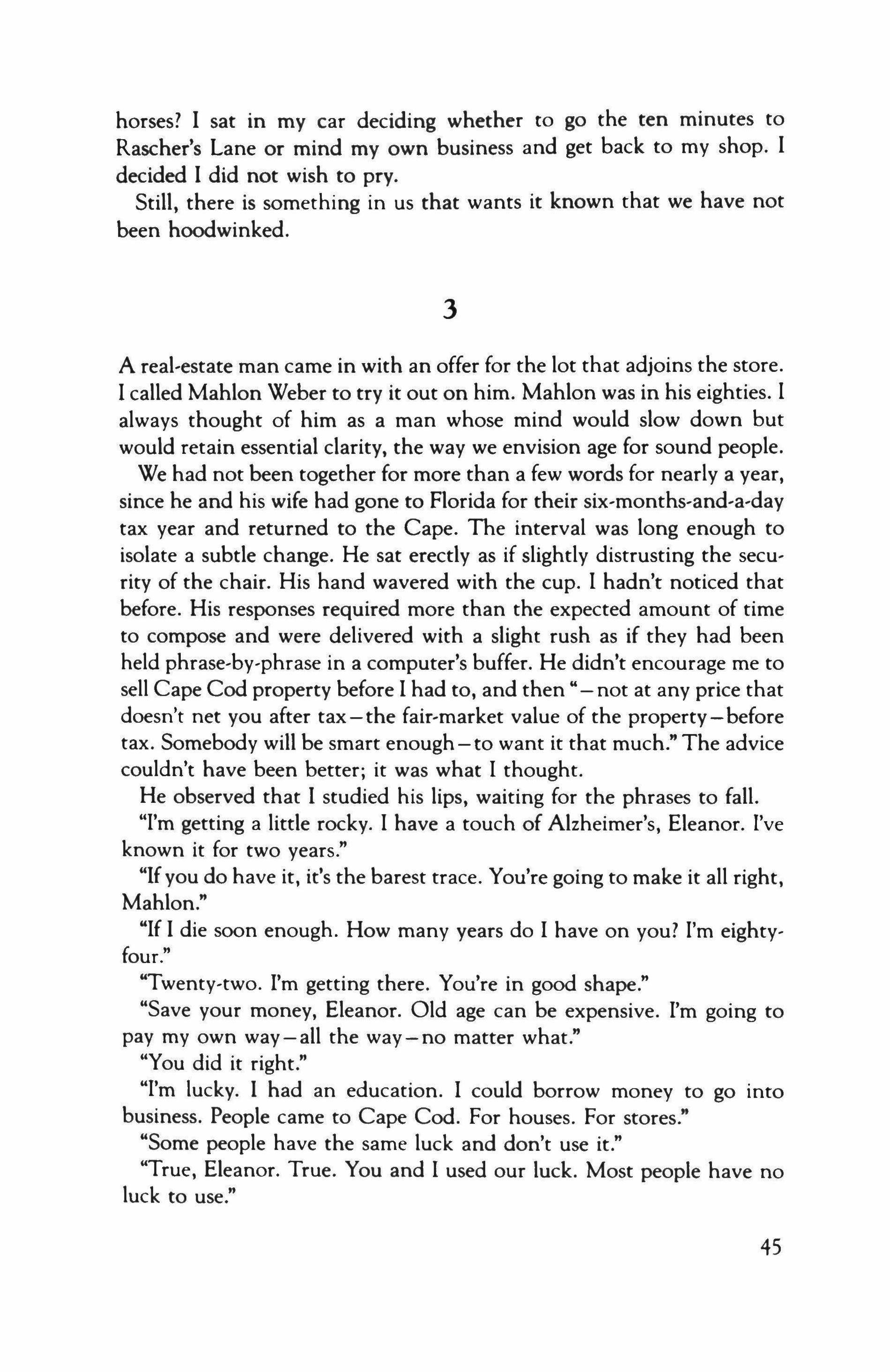
A real-estate man came in with an offer for the lot that adjoins the store. I called Mahlon Weber to try it out on him. Mahlon was in his eighties. I always thought of him as a man whose mind would slow down but would retain essential clarity, the way we envision age for sound people.
We had not been together for more than a few words for nearly a year, since he and his wife had gone to Florida for their six-months-and-a-day tax year and returned to the Cape. The interval was long enough to isolate a subtle change. He sat erectly as if slightly distrusting the security of the chair. His hand wavered with the cup. I hadn't noticed that before. His responses required more than the expected amount of time to compose and were delivered with a slight rush as if they had been held phrase-by-phrase in a computer's buffer. He didn't encourage me to sell Cape Cod property before I had to, and then" - not at any price that doesn't net you after tax-the fair-market value of the property-before tax. Somebody will be smart enough - to want it that much." The advice couldn't have been better; it was what I thought.
He observed that I studied his lips, waiting for the phrases to fall.
"I'm getting a little rocky. I have a touch of Alzheimer's, Eleanor. I've known it for two years."
"If you do have it, it's the barest trace. You're going to make it all right, Mahlon."
"If I die soon enough. How many years do I have on you? I'm eightyfour."
"Twenty-two. I'm getting there. You're in good shape."
"Save your money, Eleanor. Old age can be expensive. I'm going to pay my own way - all the way - no matter what."
"You did it right."
"I'm lucky. I had an education. I could borrow money to go into business. People came to Cape Cod. For houses. For stores."
"Some people have the same luck and don't use it."
"True, Eleanor. True. You and I used our luck. Most people have no luck to use."
3
45

1 told him about the Reverend Zeal Hesterson. 1 told him 1 had sat in the parking lot, making up my mind what to do; and then driving to Rascher's Lane, which surprised Mahlon as much as it had me after 1 had, 1 thought, decided to leave it alone.
"Did you want to have it out with him?"
"I don't know what 1 wanted. 1 wanted at least to see what there was to see with my own eyes. 1 wanted to know. 1 seem to have been born wanting to know."
1 described the neglected street of two short blocks with minimal frame houses on either side and a woods at the end.
"I went to the end of the first block and stopped. There wasn't a soul around. 1 asked myself what 1 was doing there. What satisfaction would I have from walking in on him and saying, 'Aha!'? 1 didn't know if he had ever noticed the station wagon in my lot with the store's card taped to the window. He might be sitting on his porch. 1 was afraid he might see me. 1 turned around in a hurry and got out of there."
"Forget it. You did the right thing. People who have no luck - have to be excused some things."
When Mahlon got up to leave, he tested his balance before his first step. He then went on as confidently as a man twenty years younger whose luck might last a few more years.
The following August, in the expected week, Zeal Hesterson appeared, wiping the leather of his hat, on an oppressive overcast day a merchant is entitled to after a week of nothing but that damn sunshine. Our customers appreciate a day offfrom the beach too. They like a day in the shops-especially mine-before they go home to Worcester, Syracuse, Cleveland, Des Moines. Where else are they going to find Vicki of Patzcuaro's embroidered Mexican robes and Andersen's Danish pewter and Rose Fox's antique jewelry from New York? The other shops have Cape Cod gifte shoppe stuffe.
The Reverend Hesterson found me in what was building up to be the busiest day of the year. Fortunately we were staffed for it, and I wasn't tied down writing sales. My eye was available for customers who needed a word of information. 1 greeted customers who were pleased to be recognized after having been in only once before, two years ago. That's the kind of store 1 have.
I gave Hesterson the keys to the city. After refreshing himself he came to stand beside me in the pottery room, out of the way of the heaviest traffic. I asked him what kind of year it was for the camp.
46
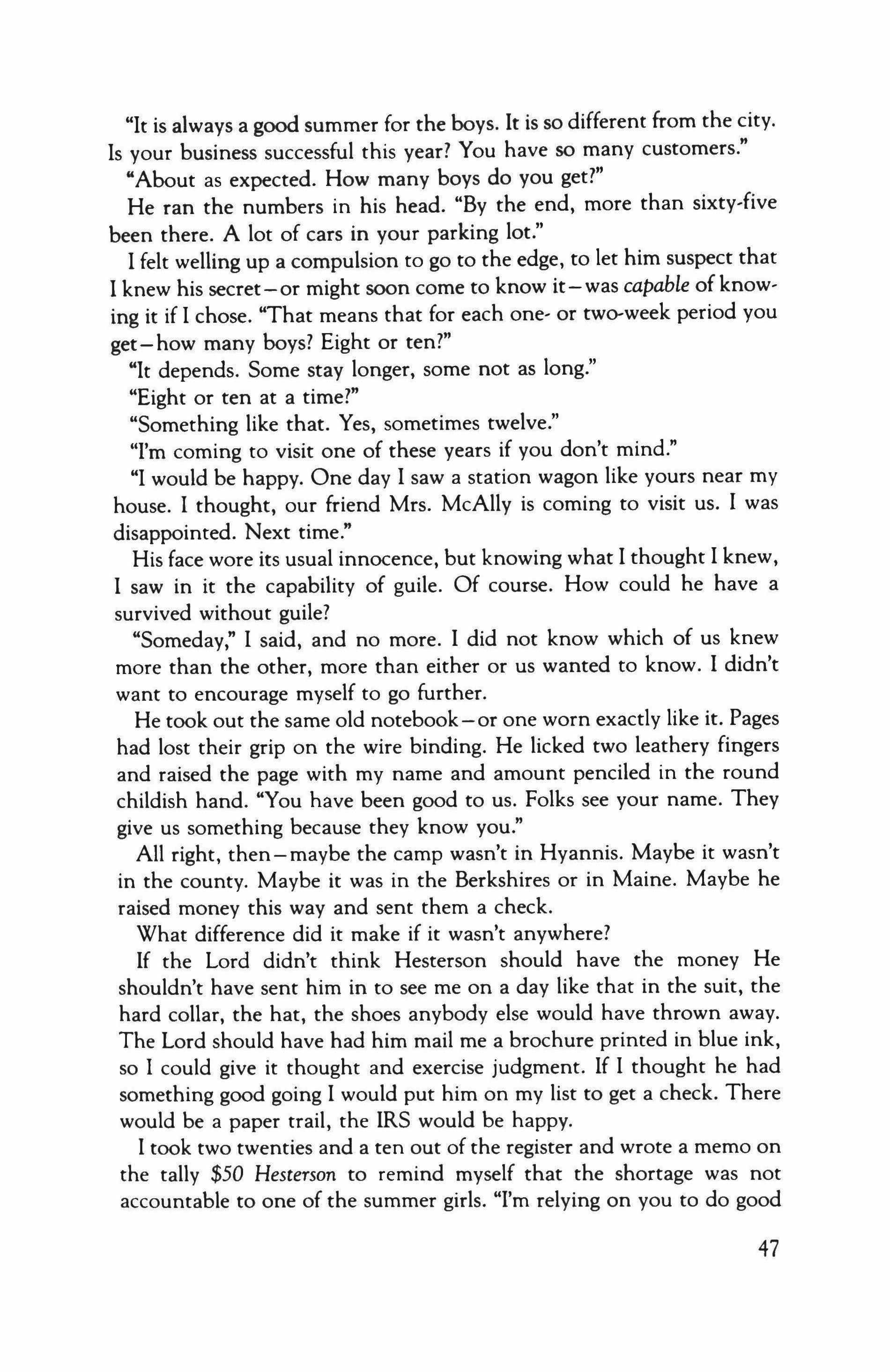
"It is always a good summer for the boys. It is so different from the city. Is your business successful this year? You have so many customers."
"About as expected. How many boys do you get?"
He ran the numbers in his head. "By the end, more than sixty-five been there. A lot of cars in your parking lot."
I felt welling up a compulsion to go to the edge, to let him suspect that I knew his secret - or might soon come to know it - was capable of knowing it if I chose. "That means that for each one- or two-week period you get-how many boys? Eight or ten?"
"It depends. Some stay longer, some not as long."
"Eight or ten at a time?"
"Something like that. Yes, sometimes twelve."
"I'm coming to visit one of these years if you don't mind."
"I would be happy. One day I saw a station wagon like yours near my house. I thought, our friend Mrs. MeAlly is coming to visit us. I was disappointed. Next time."
His face wore its usual innocence, but knowing what I thought I knew, I saw in it the capability of guile. Of course. How could he have a survived without guile?
"Someday," I said, and no more. I did not know which of us knew more than the other, more than either or us wanted to know. I didn't want to encourage myself to go further.
He took out the same old notebook-or one worn exactly like it. Pages had lost their grip on the wire binding. He licked two leathery fingers and raised the page with my name and amount penciled in the round childish hand. "You have been good to us. Folks see your name. They give us something because they know you."
All right, then-maybe the camp wasn't in Hyannis. Maybe it wasn't in the county. Maybe it was in the Berkshires or in Maine. Maybe he raised money this way and sent them a check.
What difference did it make if it wasn't anywhere?
If the Lord didn't think Hesterson should have the money He shouldn't have sent him in to see me on a day like that in the suit, the hard collar, the hat, the shoes anybody else would have thrown away. The Lord should have had him mail me a brochure printed in blue ink, so I could give it thought and exercise judgment. If I thought he had something good going I would put him on my list to get a check. There would be a paper trail, the IRS would be happy.
I took two twenties and a ten out of the register and wrote a memo on the tally $50 Hesterson to remind myself that the shortage was not accountable to one of the summer girls. "I'm relying on you to do good
47

work. You can show in the book that I gave fifty. Maybe somebody else will be inspired."
He laid his benedictory smile on me. "The Lord will bless you."
I thought perhaps not. The Lord knew what fifty dollars amounted to from somebody born lucky. "If He pleases," I said. "Take care of yourself."
Under the leather his toes flexed, trying to help his hand write my name and $50. He folded the ledger and returned it to his breast pocket. "The Lord takes care. He puts us in the way of peril to show He is the One who snatches us back to a safe place."
I thought it roundabout, not the way I would choose; a show-off tithe He would not especially appreciate if I did it. I said I would try to stop by when the boys were there, but it was not easy to get away from the store in the summer.
48
The Government Man
Ken Smith

Sometimes in the cooler months the government men spread lye over the carcasses of the cattle they killed. But in summer, when the cattle moved up higher onto the slopes, they usually just shot them and let them lay. Up high the Pinal Mountains are rough and you can't get a truck up there. I guess they didn't want to use mules to pack the lye, which was unnecessary anyway, the days so hot that it didn't take long for a cow to bloat and spoil. The men who shot the cows tried always to do it in an open spot, in high sun, away from any shade.
Everybody knew what was going on and most thought it shameful, a harebrained scheme by Roosevelt and his cronies to raise the price of beef and give the ranchers some profit. Trouble is, the people around here couldn't afford beef even at the lower prices, and me and some of my friends didn't see that it was anything but wastefulness. The first time Richard Phillips and I came upon a kill, we stomped around that hillside and cussed. It was an awful thing. Those good Hereford cattle bloated and about to bust and only the coyotes and buzzards getting any good out of them.
I spent most all this past summer in an old cabin on the eastern slope of the Pinals, glassing the road far down into EI Capitan Pass, waiting for the green government truck hauling a horse trailer which would pull off and weave its way up to a ranch house. I would watch carefully as the rancher and the government man talked, the rancher sometimes waving his arms and pointing toward the mountains, the government man listening and sometimes stopping to ask a question. When their talking was done, the government man would unload his horse and begin the ride up the mountain. Once I figured the general vicinity he was headed for, I'd climb the little knoll behind the cabin and start my smudge fire.
49
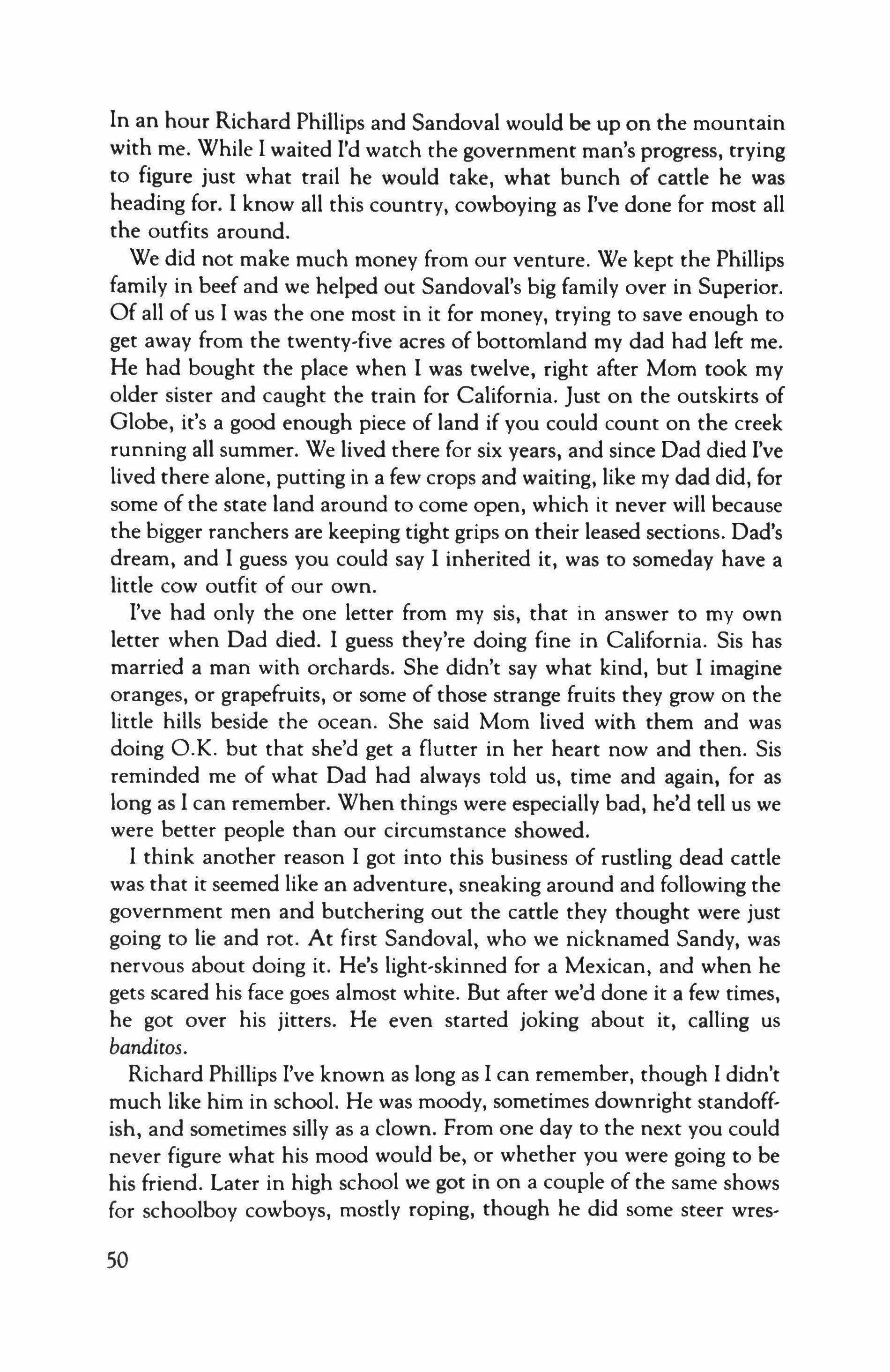
In an hour Richard Phillips and Sandoval would be up on the mountain with me. While I waited I'd watch the government man's progress, trying to figure just what trail he would take, what bunch of cattle he was heading for. I know all this country, cowboying as I've done for most all the outfits around.
We did not make much money from our venture. We kept the Phillips family in beef and we helped out Sandoval's big family over in Superior. Of all of us I was the one most in it for money, trying to save enough to get away from the twenty-five acres of bottomland my dad had left me. He had bought the place when I was twelve, right after Mom took my older sister and caught the train for California. Just on the outskirts of Globe, it's a good enough piece of land if you could count on the creek running all summer. We lived there for six years, and since Dad died I've lived there alone, putting in a few crops and waiting, like my dad did, for some of the state land around to come open, which it never will because the bigger ranchers are keeping tight grips on their leased sections. Dad's dream, and I guess you could say I inherited it, was to someday have a little cow outfit of our own.
I've had only the one letter from my sis, that in answer to my own letter when Dad died. I guess they're doing fine in California. Sis has married a man with orchards. She didn't say what kind, but I imagine oranges, or grapefruits, or some of those strange fruits they grow on the little hills beside the ocean. She said Mom lived with them and was doing O.K. but that she'd get a flutter in her heart now and then. Sis reminded me of what Dad had always told us, time and again, for as long as I can remember. When things were especially bad, he'd tell us we were better people than our circumstance showed.
I think another reason I got into this business of rustling dead cattle was that it seemed like an adventure, sneaking around and following the government men and butchering out the cattle they thought were just going to lie and rot. At first Sandoval, who we nicknamed Sandy, was nervous about doing it. He's light-skinned for a Mexican, and when he gets scared his face goes almost white. But after we'd done it a few times, he got over his jitters. He even started joking about it, calling us banditos.
Richard Phillips I've known as long as I can remember, though I didn't much like him in school. He was moody, sometimes downright standoffish, and sometimes silly as a clown. From one day to the next you could never figure what his mood would be, or whether you were going to be his friend. Later in high school we got in on a couple of the same shows for schoolboy cowboys, mostly roping, though he did some steer wres-
50
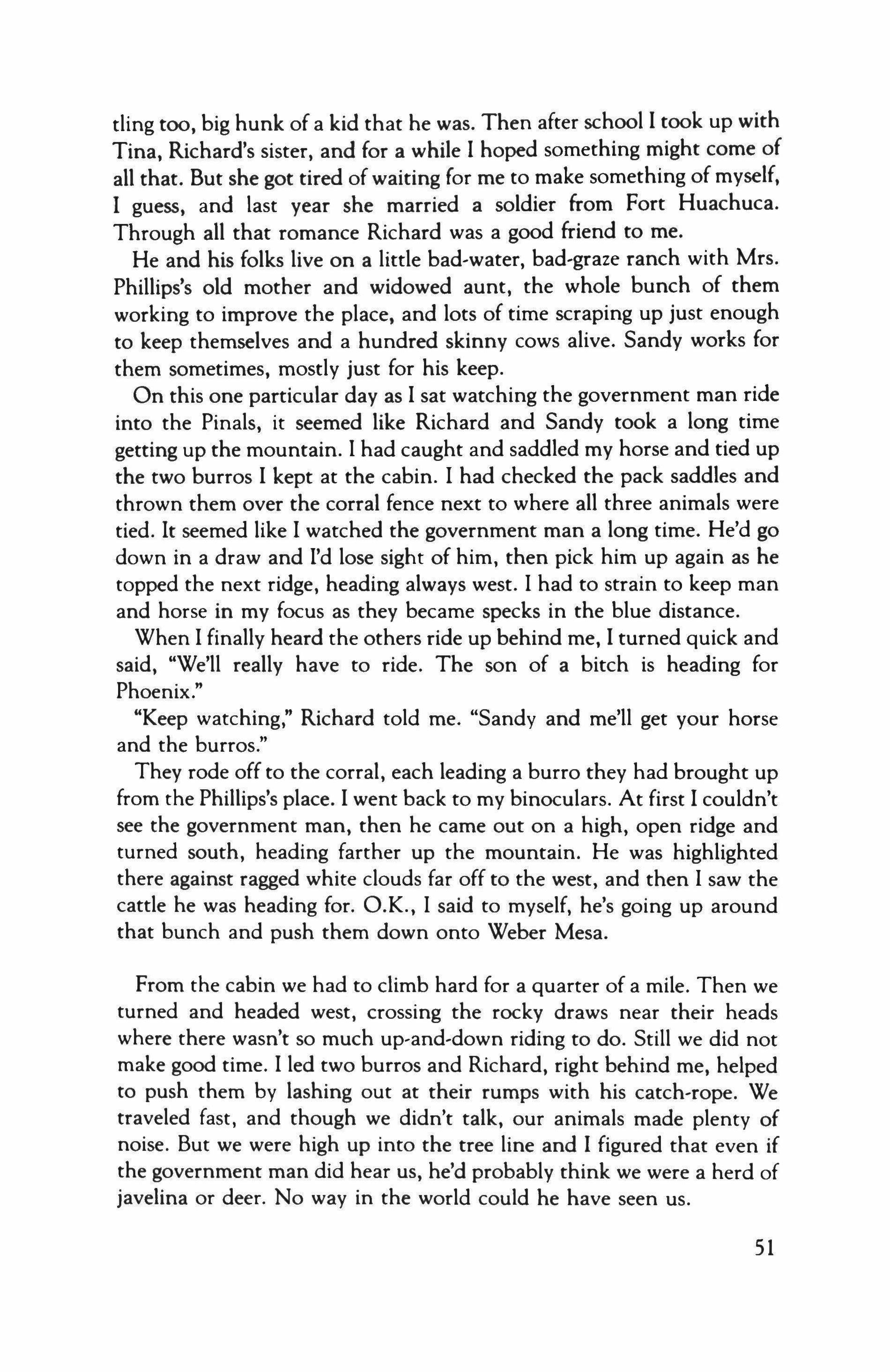
tling too, big hunk of a kid that he was. Then after school I took up with Tina, Richard's sister, and for a while I hoped something might come of all that. But she got tired of waiting for me to make something of myself, I guess, and last year she married a soldier from Fort Huachuca. Through all that romance Richard was a good friend to me.
He and his folks live on a little bad-water, bad-graze ranch with Mrs. Phillips's old mother and widowed aunt, the whole bunch of them working to improve the place, and lots of time scraping up just enough to keep themselves and a hundred skinny cows alive. Sandy works for them sometimes, mostly just for his keep.
On this one particular day as I sat watching the government man ride into the Pinals, it seemed like Richard and Sandy took a long time getting up the mountain. I had caught and saddled my horse and tied up the two burros I kept at the cabin. I had checked the pack saddles and thrown them over the corral fence next to where all three animals were tied. It seemed like I watched the government man a long time. He'd go down in a draw and I'd lose sight of him, then pick him up again as he topped the next ridge, heading always west. I had to strain to keep man and horse in my focus as they became specks in the blue distance. When I finally heard the others ride up behind me, I turned quick and said, "We'll really have to ride. The son of a bitch is heading for Phoenix."
"Keep watching," Richard told me. "Sandy and me'll get your horse and the burros."
They rode off to the corral, each leading a burro they had brought up from the Phillips's place. I went back to my binoculars. At first I couldn't see the government man, then he came out on a high, open ridge and turned south, heading farther up the mountain. He was highlighted there against ragged white clouds far off to the west, and then I saw the cattle he was heading for. O.K., I said to myself, he's going up around that bunch and push them down onto Weber Mesa.
From the cabin we had to climb hard for a quarter of a mile. Then we turned and headed west, crossing the rocky draws near their heads where there wasn't so much up-and-down riding to do. Still we did not make good time. I led two burros and Richard, right behind me, helped to push them by lashing out at their rumps with his catch-rope, We traveled fast, and though we didn't talk, our animals made plenty of noise. But we were high up into the tree line and I figured that even if the government man did hear us, he'd probably think we were a herd of javelina or deer. No way in the world could he have seen us.
51

When we came to a spot which I judged to be just above Weber Mesa, Sandy and I left Richard with the horses and started downhill on foot. Sandy carried myoid pump .22 rifle and I had the binoculars. We went a good ways down, then finally broke out, as I knew we would, atop a little bluff overlooking the flat. At first I thought I'd made a mistake, because we couldn't see anything of the government man nor any of the cows.
Sandy's face was scrunched up with a question, and he was getting ready to whisper something to me when we heard a cow bawl. Then the government man came out into plain sight, riding away from the bluff we were on, his back to us, and his rifle across his lap.
We eased back the least little bit and watched. The government man continued out onto the flat a few yards, then turned his horse. His face was red and we could see how fat he was and how the heat was working on both him and the horse. His shirt was soaked, and as he got down the horse shifted a little against all that weight going to one side.
Once on the ground, the man stood still for a minute, looking back at the base of the bluff where he'd pushed the cows he was going to shoot. He breathed deep and then chambered a shell. I figured the cows were right up against the face of the bluff, not thirty feet below us.
Holding the horse's reins in his left hand, he brought his rifle up. He fired four times, his horse jerking its head with each shot, and the 30.06 sounded like a cannon as the shock waves hit against the rocks of the bluff. He paused, then fired again. After he threw the last spent shell from his rifle, he spat on the ground, climbed back on the horse and turned off toward the edge of the mesa, riding slow and heavy in his saddle.
As soon as he went out of sight, Sandy eased down the side of the bluff to follow him and I climbed up into the trees to get Richard and the animals.
Our plan seemed foolproof. Sandy would follow the government man until he was sure the man would not double back. If he did turn back, Sandy would either run ahead to warn us, or he'd fire a shot from the .22 and we'd quick gather up our gear and the horses and burros and get out of there. On that particular day it did not seem we had anything to worry about. The government man was hot and tired and I figured he'd head straight back for the ranch where maybe he could get a cold glass of tea before he loaded his horse and drove off.
So Richard and I set straight to work. We tussled the two best-looking cows around so that their heads were uphill, then each started in gutting one. We worked fast and it was hot, the sun shining off the white dirt of
52
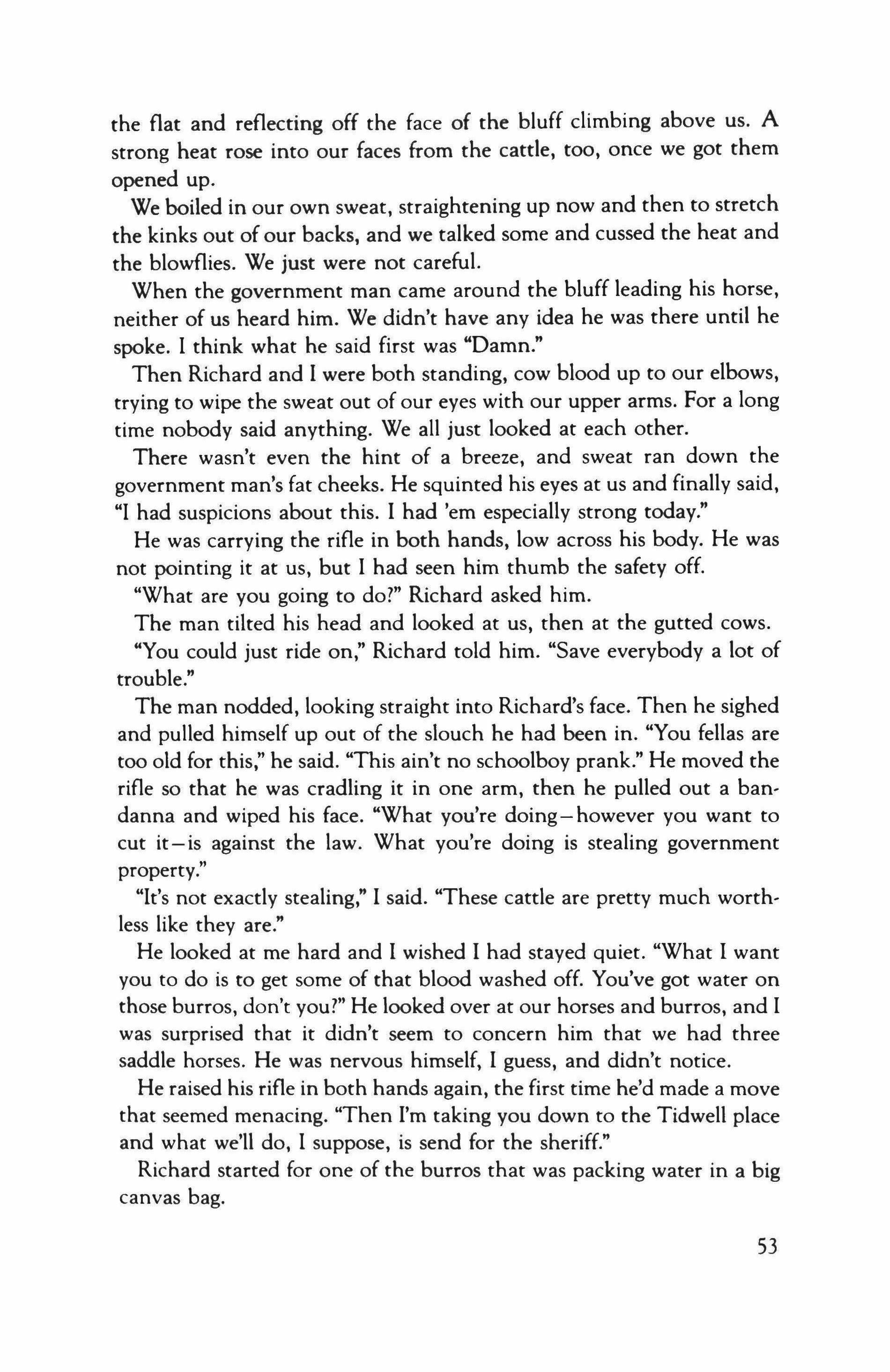
the flat and reflecting off the face of the bluff climbing above us. A strong heat rose into our faces from the cattle, too, once we got them opened up.
We boiled in our own sweat, straightening up now and then to stretch the kinks out of our backs, and we talked some and cussed the heat and the blowflies. We just were not careful.
When the government man came around the bluff leading his horse, neither of us heard him. We didn't have any idea he was there until he spoke. I think what he said first was "Damn."
Then Richard and I were both standing, cow blood up to our elbows, trying to wipe the sweat out of our eyes with our upper arms. For a long time nobody said anything. We all just looked at each other.
There wasn't even the hint of a breeze, and sweat ran down the government man's fat cheeks. He squinted his eyes at us and finally said, "I had suspicions about this. I had 'em especially strong today."
He was carrying the rifle in both hands, low across his body. He was not pointing it at us, but I had seen him thumb the safety off.
"What are you going to do?" Richard asked him.
The man tilted his head and looked at us, then at the gutted cows.
"You could just ride on," Richard told him. "Save everybody a lot of trouble."
The man nodded, looking straight into Richard's face. Then he sighed and pulled himself up out of the slouch he had been in. "You fellas are too old for this," he said. "This ain't no schoolboy prank." He moved the rifle so that he was cradling it in one arm, then he pulled out a bandanna and wiped his face. "What you're doing - however you want to cut it-is against the law. What you're doing is stealing government property."
"It's not exactly stealing," I said. "These cattle are pretty much worthless like they are."
He looked at me hard and I wished I had stayed quiet. "What I want you to do is to get some of that blood washed off. You've got water on those burros, don't you?" He looked over at our horses and burros, and I was surprised that it didn't seem to concern him that we had three saddle horses. He was nervous himself, I guess, and didn't notice.
He raised his rifle in both hands again, the first time he'd made a move that seemed menacing. "Then I'm taking you down to the Tidwell place and what we'll do, I suppose, is send for the sheriff."
Richard started for one of the burros that was packing water in a big canvas bag.
53

"Don't come back with nothing but a canteen," the government man told him.
Richard turned to look at him. His eyes were dark and he chewed on his bottom lip for a second. "Mister," he said, "we ain't got any guns."
The government man smiled, then, and seemed to relax, his big belly pooching out and his shoulders sagging. I was trying to think of something to say that would make him let us go, some good argument that what we were doing was better than just letting the beef go to waste. I was thinking hard when he asked me, "What do you get out of this, anyway?"
"Damn little," I told him.
Richard came over and started pouring water over my hands and arms.
The government man smiled again, but it was cut short with the sharp, whiny snap of Sandy's .22. I remember thinking that his warning shot was coming a little late, and for a minute I felt like laughing at the whole bunch of us. Then another shot came, kicking up dust between where the government man was standing and the dead cows.
He whirled fast, looking off to his left. He saw Sandy out toward the edge of the mesa. We all saw him running, crouched low, and then he disappeared behind some rocks.
"What's that damn fool shooting for," the government man said, but not like a question. Then another bullet hit close to his feet and he jumped a little. "Well, damn," he said, and he raised his rifle and shot two times into the rocks Sandy had jumped behind, the rolling boom of the 30.06 sounding awful loud after the short low snap of Sandy's .22.
He tilted his head to eye us, still keeping the rifle up to his shoulder. "If that fella's a friend of yours, you better tell him to come on in and give himself up."
Then Sandy was running again, out near the edge of the flat, where the brush grew thick, scrub oak and manzanita and deer brush. The government man shot at him again, though it didn't seem he took aim.
When Sandy disappeared into the brush, the man turned back to me and Richard. "Get into your saddles, now. Let's hurry it."
From the brush we heard Sandy yelling. He was cussing in Spanish, taunting, like he thought he could get the man to chase him. In English he shouted, "Ride on, fat man. This is not your business."
The government man took a step toward Sandy's voice. When Sandy yelled again, he fired three shots into the brush. I stood there and shook, sure we'd find Sandy tangled in the manzanita with a big hole in
54

him, and I started shouting for him to give it up, to run away down the mountain.
"You run," Sandy shouted back. "I'll keep this pendejo off you."
I thought about that for a minute, but with the man and his ought-six not twenty feet away and hearing the sound of that thing going off, I wasn't about to move. When I glanced at Richard he didn't seem to have any such ideas either. He just stood there looking out toward the edge of the mesa.
The government man was down on one knee now, shoving more shells into his clip. He said to us, "Why don't one of you fellas go out there and get your friend? Otherwise, I'm afraid I'm going to have to kill him."
He stood up and looked at us both. I was thinking maybe I should go, but somehow I believed that if everyone just stayed still, this whole thing might work out. A good idea would come to somebody.
The man looked off toward the brush. "Goddamn you, throw down and come on out," he yelled. His face was red and the veins in his neck bulged. Every inch of him was wet. "Goddamn you, Mex, can you hear me?"
It was quiet for a minute, then Sandy laughed.
The government man brought his rifle up. It looked like he was having trouble with his sights. "Throw that popper out now and stand up," he said, "before somebody gets hurt."
He stood still for a bit. Then he began to shoot as fast as he could work his bolt. Five, six times, I don't know how many bullets he fired, and all I could hear was that ought-six going off and its echo booming against the rock walls of the bluff.
Suddenly he lowered his rifle and turned to look at Richard and me. His mouth formed the shape of a huge 0, and his eyes were red and watery. "I'll be a son of a bitch," he said. Then he turned and started towards his horse, which in all the shooting had spooked off toward the other horses and burros. He just turned his back to us and walked away, but after a few steps he stumbled and had to use his rifle like a cane. We hadn't been able to hear Sandy shooting over the loud roar of the ought-six, but I knew now that he had been.
The government man stumbled again. Before he got to his horse he came to a stunted oak growing right up against the face of the bluff. He paused there a moment, then worked the few steps up to the tree and sat down, leaning there, breathing fast, his rifle across his lap.
He closed his eyes and breathed in deep a couple of times. Richard and I started to go to him, but he moved his legs around and fiddled with his
55

rifle and eyed us in a way I didn't like, so I stopped and held my arm out behind to tell Richard to do the same. I was wanting real bad to do two things at once. One was to turn and run like hell, the other was to go see if I couldn't do something for him.
He edged around to one side, still leaning his shoulders against the trunk of the oak, and looked right at us. "I wish I had the gumption to shoot you," he said. He closed his eyes again and the rifle slipped out of his hands. His eyes opened slowly, and I could tell he was still seeing us, but I thought for sure he was dying.
I started to go toward him, but what I was seeing suddenly went black around the edges and I was afraid I'd fall. I felt my legs shaking. Richard's hand came to my shoulder. He said something but I couldn't hear. It was like nothing inside me was working and all I could see was the government man slumped against that tree with his eyes shut tight and his teeth clenched and sweat running down out of his hair.
In a minute Richard walked out onto the flat, his back to me and his hands cupped so his voice would carry. "Sandy, come on in. Dammit, get in here. This guy is-no shit-hurt bad."
A few seconds later, I was over under the tree, looking at the government man. Sandy was coming in, he and Richard walking across the flat toward me, and Sandy shaking his head and saying, "I hit him?"
The three of us stood there staring. I glanced off to the west where big, puffy clouds were building over that end of the mountain range.
Sandy looked at me, his eyes big and scared like he was wondering whether I would turn against him. "I only meant to scare him," he said. "Honest to God, I thought after a while he would go away."
"Shit," Richard said. "You can't scare a man carrying an ought-six with a twenty-two."
The government man had quit sweating by now. His face wasn't red anymore. It sagged and it was gray.
"I don't see a mark on him," I said.
I hadn't hardly got the words out when the man sat upright and opened his eyes. He reached a hand toward Sandy, who stepped back quick. "You," the man said. "You done this. And I used to work the mines with your daddy." Then he slumped hard against the tree. He stared at Sandy, like his eyes were stuck open, and then I saw the very beginning of a glassiness start to come, and I knew he was dead.
Sandy said, "I never saw this man before. My dad never worked in a rmne.
Richard reached over easy with his boot and pushed it against the fat
56
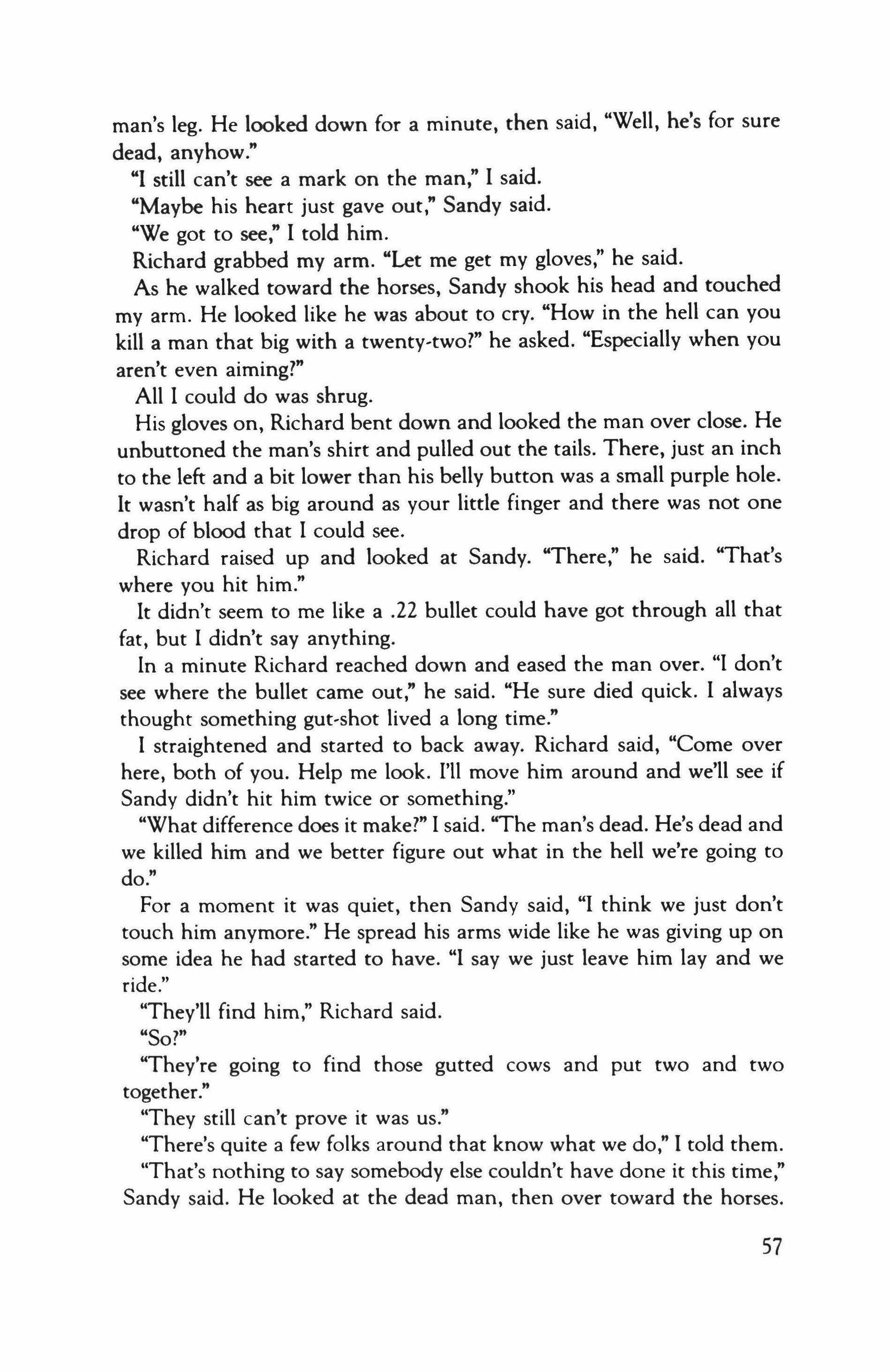
man's leg. He looked down for a minute, then said, "Well, he's for sure dead, anyhow."
"I still can't see a mark on the man," I said.
"Maybe his heart just gave out," Sandy said.
"We got to see," I told him.
Richard grabbed my arm. "Let me get my gloves," he said.
As he walked toward the horses, Sandy shook his head and touched my arm. He looked like he was about to cry. "How in the hell can you kill a man that big with a twenty-two?" he asked. "Especially when you aren't even aiming?"
All 1 could do was shrug.
His gloves on, Richard bent down and looked the man over close. He unbuttoned the man's shirt and pulled out the tails. There, just an inch to the left and a bit lower than his belly button was a small purple hole. It wasn't half as big around as your little finger and there was not one drop of blood that I could see.
Richard raised up and looked at Sandy. "There," he said. "That's where you hit him."
It didn't seem to me like a .22 bullet could have got through all that fat, but I didn't say anything.
In a minute Richard reached down and eased the man over. "I don't see where the bullet came out," he said. "He sure died quick. I always thought something gut-shot lived a long time."
I straightened and started to back away. Richard said, "Come over here, both of you. Help me look. I'll move him around and we'll see if Sandy didn't hit him twice or something."
"What difference does it make?" I said. "The man's dead. He's dead and we killed him and we better figure out what in the hell we're going to do."
For a moment it was quiet, then Sandy said, "I think we just don't touch him anymore." He spread his arms wide like he was giving up on some idea he had started to have. "I say we just leave him lay and we ride."
"They'll find him," Richard said. "So?"
"They're going to find those gutted cows and put two and two together."
"They still can't prove it was us."
"There's quite a few folks around that know what we do," I told them. "That's nothing to say somebody else couldn't have done it this time," Sandy said. He looked at the dead man, then over toward the horses.
57
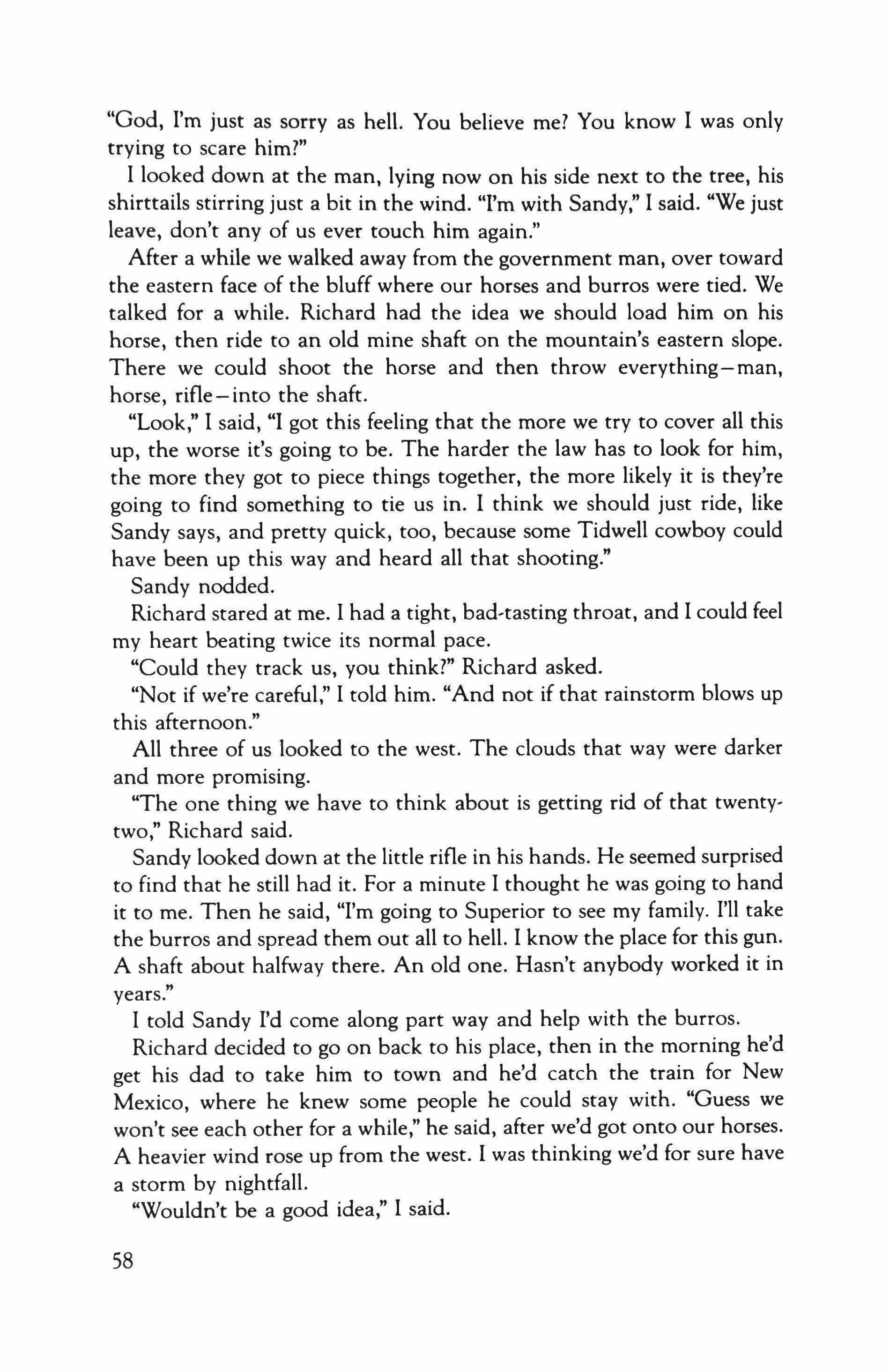
"God, I'm just as sorry as hell. You believe me? You know I was only trying to scare him?"
I looked down at the man, lying now on his side next to the tree, his shirttails stirring just a bit in the wind. "I'm with Sandy," I said. "We just leave, don't any of us ever touch him again."
After a while we walked away from the government man, over toward the eastern face of the bluff where our horses and burros were tied. We talked for a while. Richard had the idea we should load him on his horse, then ride to an old mine shaft on the mountain's eastern slope. There we could shoot the horse and then throw everything-man, horse, rifle-into the shaft.
"Look," I said, "I got this feeling that the more we try to cover all this up, the worse it's going to be. The harder the law has to look for him, the more they got to piece things together, the more likely it is they're going to find something to tie us in. I think we should just ride, like Sandy says, and pretty quick, too, because some Tidwell cowboy could have been up this way and heard all that shooting."
Sandy nodded.
Richard stared at me. I had a tight, bad-tasting throat, and I could feel my heart beating twice its normal pace.
"Could they track us, you think?" Richard asked.
"Not if we're careful," I told him. "And not if that rainstorm blows up this afternoon."
All three of us looked to the west. The clouds that way were darker and more promising.
"The one thing we have to think about is getting rid of that twentytwo," Richard said.
Sandy looked down at the little rifle in his hands. He seemed surprised to find that he still had it. For a minute I thought he was going to hand it to me. Then he said, "I'm going to Superior to see my family. I'll take the burros and spread them out all to hell. I know the place for this gun. A shaft about halfway there. An old one. Hasn't anybody worked it in years."
I told Sandy I'd come along part way and help with the burros. Richard decided to go on back to his place, then in the morning he'd get his dad to take him to town and he'd catch the train for New Mexico, where he knew some people he could stay with. "Guess we won't see each other for a while," he said, after we'd got onto our horses. A heavier wind rose up from the west. I was thinking we'd for sure have a storm by nightfall.
"Wouldn't be a good idea," I said.
58
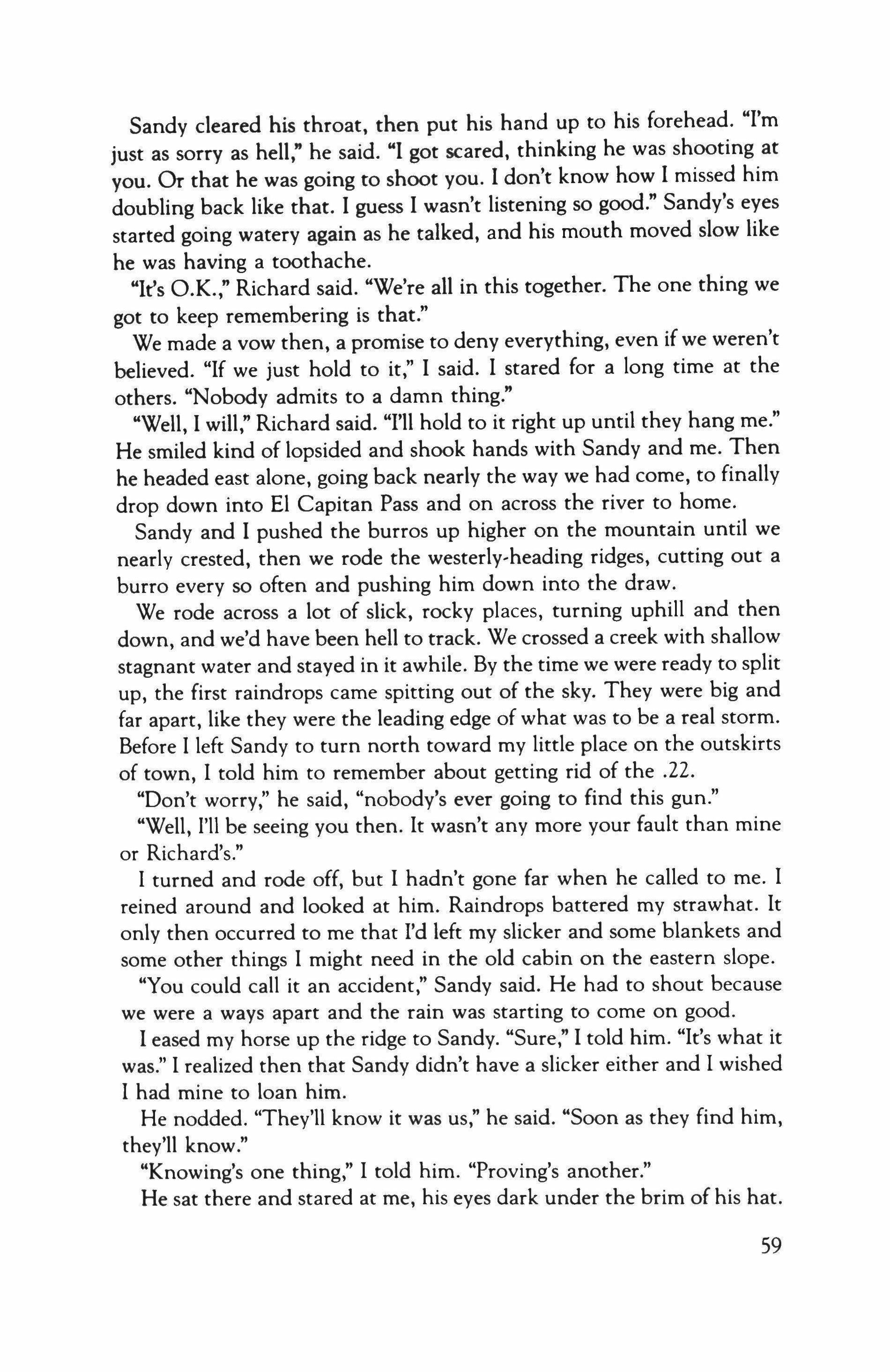
Sandy cleared his throat, then put his hand up to his forehead. "I'm just as sorry as hell," he said. "I got scared, thinking he was shooting at you. Or that he was going to shoot you. I don't know how I missed him doubling back like that. I guess I wasn't listening so good." Sandy's eyes started going watery again as he talked, and his mouth moved slow like he was having a toothache.
"It's O.K.," Richard said. "We're all in this together. The one thing we got to keep remembering is that."
We made a vow then, a promise to deny everything, even if we weren't believed. "If we just hold to it," I said. I stared for a long time at the others. "Nobody admits to a damn thing."
"Well, I will," Richard said. "I'll hold to it right up until they hang me." He smiled kind of lopsided and shook hands with Sandy and me. Then he headed east alone, going back nearly the way we had come, to finally drop down into EI Capitan Pass and on across the river to home.
Sandy and I pushed the burros up higher on the mountain until we nearly crested, then we rode the westerly-heading ridges, cutting out a burro every so often and pushing him down into the draw.
We rode across a lot of slick, rocky places, turning uphill and then down, and we'd have been hell to track. We crossed a creek with shallow stagnant water and stayed in it awhile. By the time we were ready to split up, the first raindrops came spitting out of the sky. They were big and far apart, like they were the leading edge of what was to be a real storm. Before I left Sandy to turn north toward my little place on the outskirts of town, I told him to remember about getting rid of the .22.
"Don't worry," he said, "nobodv's ever going to find this gun."
"Well, l'l1 be seeing you then. It wasn't any more your fault than mine or Richard's."
I turned and rode off, but I hadn't gone far when he called to me. I reined around and looked at him. Raindrops battered my strawhat. It only then occurred to me that I'd left my slicker and some blankets and some other things I might need in the old cabin on the eastern slope.
"You could call it an accident," Sandy said. He had to shout because we were a ways apart and the rain was starting to come on good.
I eased my horse up the ridge to Sandy. "Sure," I told him. "It's what it was." I realized then that Sandy didn't have a slicker either and I wished I had mine to loan him.
He nodded. "They'll know it was us," he said. "Soon as they find him, they'll know."
"Knowing's one thing," I told him. "Proving's another."
He sat there and stared at me, his eyes dark under the brim of his hat.
59
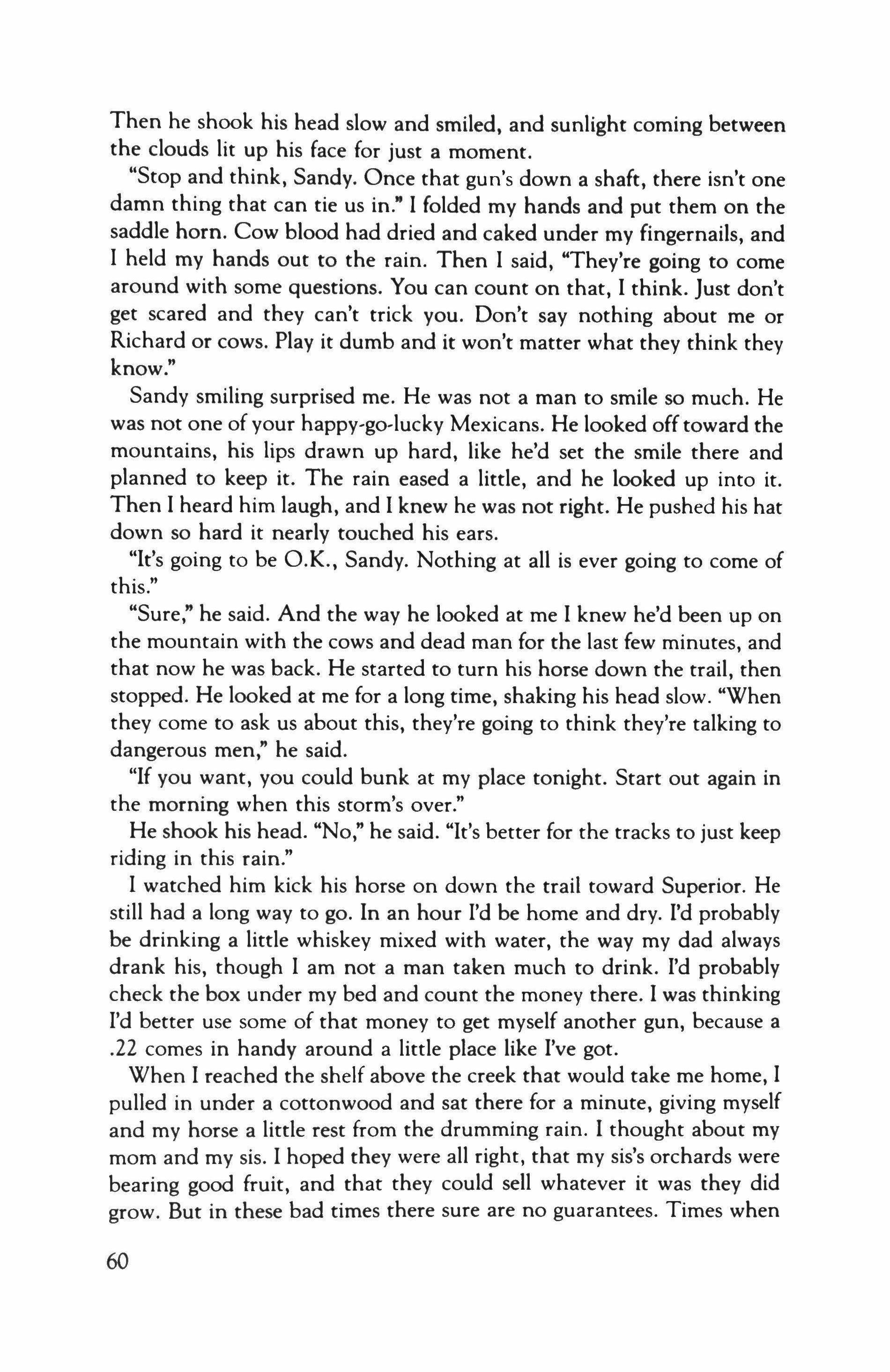
Then he shook his head slow and smiled, and sunlight coming between the clouds lit up his face for just a moment.
"Stop and think, Sandy. Once that gun's down a shaft, there isn't one damn thing that can tie us in." I folded my hands and put them on the saddle horn. Cow blood had dried and caked under my fingernails, and I held my hands out to the rain. Then I said, "They're going to come around with some questions. You can count on that, I think. Just don't get scared and they can't trick you. Don't say nothing about me or Richard or cows. Play it dumb and it won't matter what they think they know."
Sandy smiling surprised me. He was not a man to smile so much. He was not one of your happy-go-lucky Mexicans. He looked off toward the mountains, his lips drawn up hard, like he'd set the smile there and planned to keep it. The rain eased a little, and he looked up into it. Then I heard him laugh, and I knew he was not right. He pushed his hat down so hard it nearly touched his ears.
"It's going to be O.K., Sandy. Nothing at all is ever going to come of this."
"Sure," he said. And the way he looked at me I knew he'd been up on the mountain with the cows and dead man for the last few minutes, and that now he was back. He started to turn his horse down the trail, then stopped. He looked at me for a long time, shaking his head slow. "When they come to ask us about this, they're going to think they're talking to dangerous men," he said.
"If you want, you could bunk at my place tonight. Start out again in the morning when this storm's over."
He shook his head. "No," he said. "It's better for the tracks to just keep riding in this rain."
I watched him kick his horse on down the trail toward Superior. He still had a long way to go. In an hour I'd be home and dry. I'd probably be drinking a little whiskey mixed with water, the way my dad always drank his, though I am not a man taken much to drink. I'd probably check the box under my bed and count the money there. I was thinking I'd better use some of that money to get myself another gun, because a .22 comes in handy around a little place like I've got.
When I reached the shelf above the creek that would take me home, I pulled in under a cottonwood and sat there for a minute, giving myself and my horse a little rest from the drumming rain. I thought about my mom and my sis. I hoped they were all right, that my sis's orchards were bearing good fruit, and that they could sell whatever it was they did grow. But in these bad times there sure are no guarantees. Times when
60

men will jump out of buildings or kill cattle and leave them to the buzzards. Times when men start killing other men. I wondered what my mom and sis would think if they knew I had become a bandito, a forsure outlaw who had helped to kill a man, a government man. I wondered how my life was going to be now that, like Sandy had said, I was dangerous. I thought about that, but I did not feel dangerous, only scared, and it came to me that scared was what he was when he shot the government man, and I got to thinking that maybe scared and dangerous were the same thing.
After a while, lightning flashed too close and I knew that under that cottonwood was not the place to be. As I rode on, the rain beating down so hard it stung, I thought more about buying a gun, and it came to me that with the way all this could turn, I might better be thinking about one of a bigger caliber.
61
Literary License
Julia Willis

No, I am not the Wife in the story. Let me repeat that: I am not now, nor have I ever been, the Wife in Alan's story. I've considered wearing a sign around my neck in the office, something hand-lettered, saying much the same thing (NO, I'M Nor HER; ANY RESEMBLANCE IS PURELY COINCIDENTAL; or a simple DON'T ASK), but Dr. Shapiro might make some reference to the lady who doth protest too much and I would be likely to throw a stapler at his head. Chances are I'd miss, since he has a very small head for a Shakespearean scholar, but such an uncharacteristically wild outburst could be wrongfully interpreted as a sure indication of my "true" identity. "She has to be the Wife," they'd say. "Did you see the way she pitched that stapler at poor Ed Shapiro?" This is why I'm beginning to think of my situation (as a woman who is not the Wife in that story) as rather hopeless. Certainly untenable.
The divorce became final two years ago. And the separation began two years before that. A separation period gives you a chance to adjust to the many things that are going to be different in your life. Then the divorce comes along to reassure you there are some things in life and in people that will never, ever change. This is not necessarily a great comfort.
For instance, I don't think it had been six months since the decree rolled off the courthouse presses before someone showed me a poem in one of the better-known little magazines: a poem by my ex, Alan F. Thorne, about sending the check for his child support to L.L. Bean and the check for the sleeping bags to his ex-wife, actually entitled "Concerning His State of Mind When, In Its Absent Frame of Which, He Happened to Mix the Envelopes and Send to L.L. Bean the Check for Child Support and, Conversely, to His Ex�Wife Post the Check for the Quality
62
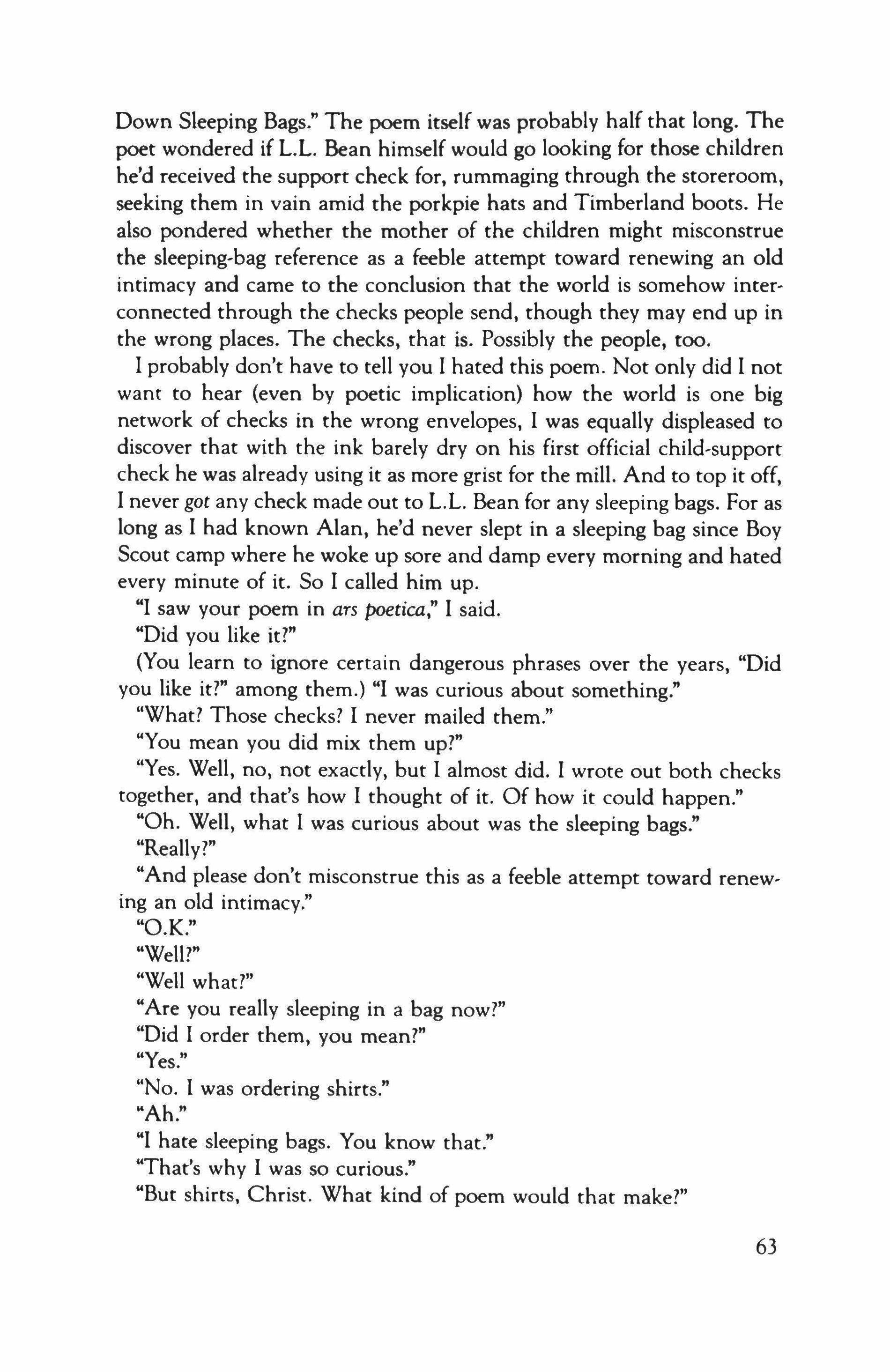
Down Sleeping Bags." The poem itself was probably half that long. The poet wondered if L.L. Bean himself would go looking for those children he'd received the support check for, rummaging through the storeroom, seeking them in vain amid the porkpie hats and Timberland boots. He also pondered whether the mother of the children might misconstrue the sleeping-bag reference as a feeble attempt toward renewing an old intimacy and came to the conclusion that the world is somehow interconnected through the checks people send, though they may end up in the wrong places. The checks, that is. Possibly the people, too.
1 probably don't have to tell you 1 hated this poem. Not only did 1 not want to hear (even by poetic implication) how the world is one big network of checks in the wrong envelopes, I was equally displeased to discover that with the ink barely dry on his first official child-support check he was already using it as more grist for the mill. And to top it off, I never got any check made out to L.L. Bean for any sleeping bags. For as long as I had known Alan, he'd never slept in a sleeping bag since Boy Scout camp where he woke up sore and damp every morning and hated every minute of it. So I called him up.
"I saw your poem in ars poetica," I said.
"Did you like it?"
(You learn to ignore certain dangerous phrases over the years, "Did you like it?" among them.) "I was curious about something."
"What? Those checks? 1 never mailed them."
"You mean you did mix them up?"
"Yes. Well, no, not exactly, but I almost did. I wrote out both checks together, and that's how I thought of it. Of how it could happen."
"Oh. Well, what I was curious about was the sleeping bags."
"Really?"
"And please don't misconstrue this as a feeble attempt toward renewing an old intimacy."
"O.K."
"WeU?"
"Well what?"
"Are you really sleeping in a bag now?"
"Did I order them, you mean?"
"Yes."
"No. I was ordering shirts."
"Ah."
"I hate sleeping bags. You know that."
"That's why I was so curious."
"But shirts, Christ. What kind of poem would that make?"
63

"Right."
"So-did you like it?"
If I worked in a law office or a bakery or sold shoes for a living, I seriously doubt I could be happy, and yet, I might find some measure of satisfaction spending an entire working day in the company of people whose knowledge of minor contemporary writers and their ilk is practically nil. As it is, I am the office administrator (which sounds better than "secretary" and pays exactly the same) for the chairman of the English Department in the ivy-covered antiquated section of the sprawling college campus that has now swallowed a good four-fifths of the quaint little New England town it long ago took root in. So I don't leave these things behind at five o'clock. I see the flyer for the Levertov reading at the dry cleaner's and overhear the results of the Dubus benefit while browsing among the artichokes and stand in line at the post office behind a long row of hopeful literary aspirants, students and professionals alike, their arms full of manila envelopes (SASE's enclosed), waiting to send off their precious manuscripts with heads held high and fingers crossed. There is even a woman in my low-impact aerobics class at the Y who tucks a small notepad into the waistband of her leotards and keeps a pencil on a string around her neck, should inspiration care to knock her to her knees in the middle of a workout.
Well, you say, go home, bolt the door, watch Cosby, read Agatha Christie, forget where you live. But no, this is not feasible. First, there is Cara, my friend and star boarder, another ex-wife of a wordsmiththough luckily for her, he is presently in detox and not publishing. She has gone back to school to get her M.F.A. (in writing, naturally) and has appropriated the dining-room table to that purpose. To find the kitchen I have to wade through a sea of rough drafts and yellow second sheets and trip lightly over a typewriter cord stretched tautly between the table and the only outlet in the room. Of course, by the time Alan left us he had graduated to personal computer, so Cara's paraphernalia reminds me of the days when both boys were in diapers. And I mind it less because the boys are not in diapers and Cara never asks me what's for dinner. She tells me, bless her.
Then there are the boys. Fred is eleven, Justin is nine. You might say my boys are their own people. Smaller people than you or I, but people nonetheless. Now that they've spent almost half their lives adapting to the dissolution of a marriage, and now that they must've abandoned all hope of getting their father and me back together again (oh God, surely they have-haven't they?), nothing we do is ever going to surprise them again. Tres blase. I try not to worry about this, because I happen to know
64
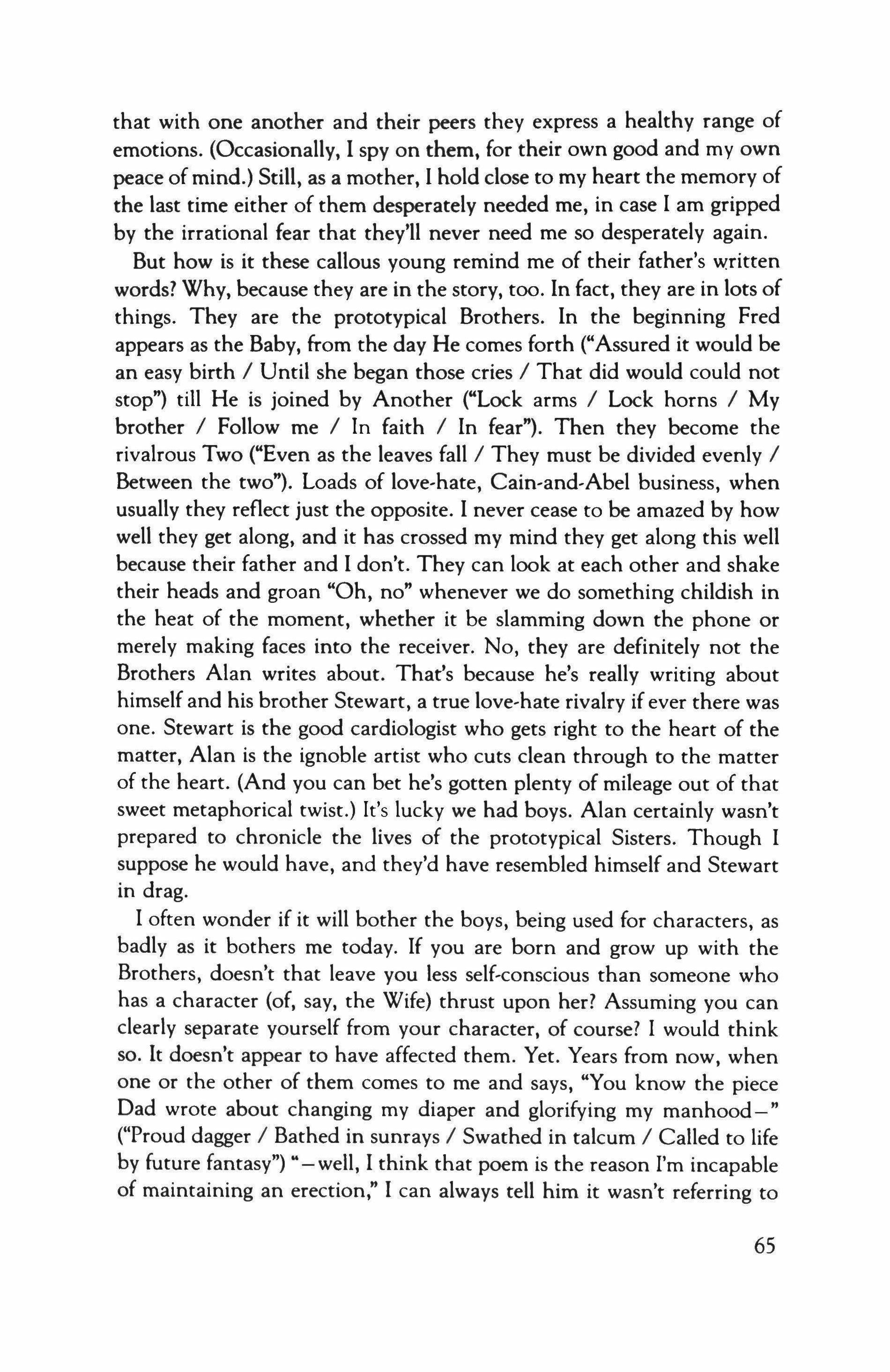
that with one another and their peers they express a healthy range of emotions. (Occasionally, I spy on them, for their own good and my own peace of mind.) Still, as a mother, I hold close to my heart the memory of the last time either of them desperately needed me, in case I am gripped by the irrational fear that they'll never need me so desperately again.
But how is it these callous young remind me of their father's written words? Why, because they are in the story, too. In fact, they are in lots of things. They are the prototypical Brothers. In the beginning Fred appears as the Baby, from the day He comes forth ("Assured it would be an easy birth / Until she began those cries / That did would could not stop") till He is joined by Another ("Lock arms / Lock horns / My brother / Follow me / In faith / In fear"). Then they become the rivalrous Two ("Even as the leaves fall / They must be divided evenly / Between the two"). Loads of love-hate, Cain-and-Abel business, when usually they reflect just the opposite. I never cease to be amazed by how well they get along, and it has crossed my mind they get along this well because their father and I don't. They can look at each other and shake their heads and groan "Oh, no" whenever we do something childish in the heat of the moment, whether it be slamming down the phone or merely making faces into the receiver. No, they are definitely not the Brothers Alan writes about. That's because he's really writing about himself and his brother Stewart, a true love-hate rivalry if ever there was one. Stewart is the good cardiologist who gets right to the heart of the matter, Alan is the ignoble artist who cuts clean through to the matter of the heart. (And you can bet he's gotten plenty of mileage out of that sweet metaphorical twist.) It's lucky we had boys. Alan certainly wasn't prepared to chronicle the lives of the prototypical Sisters. Though I suppose he would have, and they'd have resembled himself and Stewart in drag.
I often wonder if it will bother the boys, being used for characters, as badly as it bothers me today. If you are born and grow up with the Brothers, doesn't that leave you less self-conscious than someone who has a character (of, say, the Wife) thrust upon her? Assuming you can clearly separate yourself from your character, of course? I would think so. It doesn't appear to have affected them. Yet. Years from now, when one or the other of them comes to me and says, "You know the piece Dad wrote about changing my diaper and glorifying my manhood -" ("Proud dagger / Bathed in sunrays / Swathed in talcum / Called to life by future fantasy") - well, I think that poem is the reason I'm incapable of maintaining an erection," I can always tell him it wasn't referring to
65
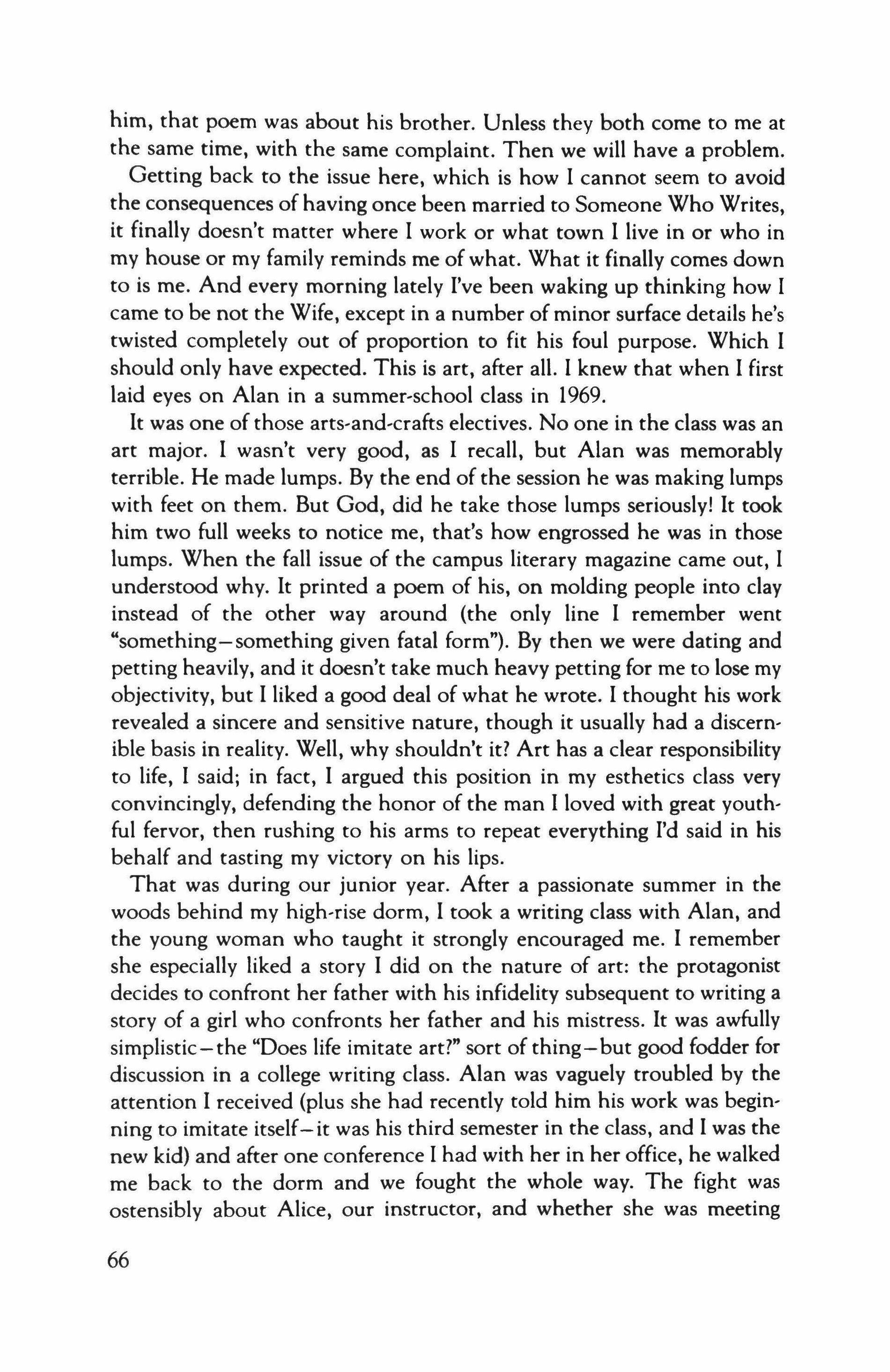
him, that poem was about his brother. Unless they both come to me at the same time, with the same complaint. Then we will have a problem. Getting back to the issue here, which is how I cannot seem to avoid the consequences of having once been married to Someone Who Writes, it finally doesn't matter where I work or what town I live in or who in my house or my family reminds me of what. What it finally comes down to is me. And every morning lately I've been waking up thinking how I came to be not the Wife, except in a number of minor surface details he's twisted completely out of proportion to fit his foul purpose. Which I should only have expected. This is art, after all. I knew that when I first laid eyes on Alan in a summer-school class in 1969.
It was one of those arts-and-crafts electives. No one in the class was an art major. I wasn't very good, as I recall, but Alan was memorably terrible. He made lumps. By the end of the session he was making lumps with feet on them. But God, did he take those lumps seriously! It took him two full weeks to notice me, that's how engrossed he was in those lumps. When the fall issue of the campus literary magazine came out, I understood why. It printed a poem of his, on molding people into clay instead of the other way around (the only line I remember went "something-something given fatal form"). By then we were dating and petting heavily, and it doesn't take much heavy petting for me to lose my objectivity, but I liked a good deal of what he wrote. I thought his work revealed a sincere and sensitive nature, though it usually had a discernible basis in reality. Well, why shouldn't it? Art has a clear responsibility to life, I said; in fact, I argued this position in my esthetics class very convincingly, defending the honor of the man I loved with great youthful fervor, then rushing to his arms to repeat everything I'd said in his behalf and tasting my victory on his lips.
That was during our junior year. After a passionate summer in the woods behind my high-rise dorm, I took a writing class with Alan, and the young woman who taught it strongly encouraged me. I remember she especially liked a story I did on the nature of art: the protagonist decides to confront her father with his infidelity subsequent to writing a story of a girl who confronts her father and his mistress. It was awfully simplistic-the "Does life imitate art?" sort of thing-but good fodder for discussion in a college writing class. Alan was vaguely troubled by the attention I received (plus she had recently told him his work was beginning to imitate itself-it was his third semester in the class, and I was the new kid) and after one conference I had with her in her office, he walked me back to the dorm and we fought the whole way. The fight was ostensibly about Alice, our instructor, and whether she was meeting
66

with me because she was interested in my writing or in me personally. Physically. He brought this up, and I was shocked. She was only a few years older than I, but she was married, and how could anyone who was married and a woman possibly be interested in me? In spite of my naivete, or probably because of it, I saw right through his little game to the jealousy behind it. I was also insulted by his implication that any teacher would be interested in my body before my work (although several in the past had made that very thing abundantly clear-all men, needless to say). I was, in addition, feeling slightly guilty for what had happened during the meeting; she told me there was an originality my stories possessed which Alan's longer work could only aspire to. I didn't think she ought to compare us, but I quietly agreed with her.
So we walked and we fought and we broke up for six long weeks. Alice apologized to me privately for any trouble she might have caused between us. I finally dropped the writing class, and we announced our engagement at Christmas. The original plan was to graduate in January and go to our parents' homes (three hundred miles apart) to work and save money until the wedding in June, but we eloped to South Carolina right after graduation and drove out West to see the Grand Canyon and Alan's Uncle Fred in Tucson, sleeping in a VW bug by the side of the road and eating peanut butter out of the jar. With a big spoon. Alan bought a second,hand leather jacket, "to get the feel of the road," he said, but a freak spell of warm weather made it too hot to wear in the desert except in the middle of the night, when we fought over it. We stayed with Uncle Fred and his family for one night. My memory is cloudy on the problem there, but I think the oldest boy ran away because they gave us his room to sleep in and the police had to bring him home. I do know our first marriage bed was a twin in a boy's room that smelled of dirty socks and model-airplane glue. Not very romantic. But that was not the shock. The shock was in realizing Alan didn't mind the smell a bit. He said it was just like his room at home.
On the way back we stayed with friends of his in Kansas and Indiana. Their wives were duller than dishwater, but from a newlywed's perspective I had the feeling they were being precisely as dull as they were meant to be. During the worst Midwestern blizzard in some'odd years, we dropped in on the University of Iowa because Alan had applied to their graduate writing program. We were digging the VW out of a snowbank with our hands when Alan's mother returned his call and said he'd been accepted at Columbia. I immediately stopped digging and began turning cartwheels in the snow. You probably don't remember that poem about the girl turning cartwheels in the snow, but it was one of his best from
67

that period. It was eventually anthologized. I was not the Girl in that poem, either, but once I may have thought I was. It's rather sweetly erotic, with the snowflakes attempting to enter her from above - because she's naked, you see. I was wearing everything warm I had with me, topped off with a borrowed overcoat three sizes too large. I didn't look erotic, I looked very funny, which would have been another poem entirely. But then all the poems Alan wrote out of our honeymoon trip had remarkably little to do with what actually happened. If I hadn't been there myself, I wouldn't have believed it. We lived peanut butter and dirty socks and frozen tundra, and he wrote like Walt Whitman in heat.
I was so relieved to be living on New York's West Side near Columbia rather than off in the wilds of Iowa that I rode buses and subways two hours a day to get to my job on lower Madison Avenue. I even worked (hold onto your hats) for the Phone Company. Aside from that, nearly everything about those days was perfect, and I did bear a striking resemblance to the Girl in his writing then, the Girl in the bay window, or the Girl on the sidewalk corning horne, her arms full of mysterious brownpaper packages, or the Girl pouring the wine into the pot of stew. There was a glowing aura about my head and a faint, moist shine to my upper lip as I bent closer to the pot. On Saturday nights we'd go out to clubs and listen to jazz and pick up the Sunday Times on the way horne. Alan wore his old leather jacket to walk an adorable Irish setter puppy he bought me on my birthday because, he said, our reef hair matched so wonderfully well. He was getting a modicum of recognition, I was bringing home the briskets and sometimes skipping work to have lunch with a friend in the garden of the Museum of Modern Art, next to Picasso's goat. How nearly perfect. (The only genuinely unperfect times I recall had to do with his writer buddies from Columbia or out of town, who sometimes brought their girlfriends and always insisted on making a night of it at the White Horse Tavern, trying to outdrink the legendary capacity of Dylan Thomas. They invariably lost the contest and their charm as well, to say nothing of their evening's consumption of alcohol which after a long ride back to the apartment ended up all over our parquet floor. I don't believe Alan ever wrote a poem regarding this particular literary phenomenon.)
Speaking of curious phenomena: when you don't happen to be indigenous to the New York area, invariably the city either locks its arms tightly around you so you can never escape, so you never feel entirely comfortable anywhere else, even visiting, for the rest of your natural life, or it begins to grate on your nerves, eventually sending you screaming
68

back to where you came from (or at best to a more suburban clime). When our initial infatuation with the city wore off, we both noticed things that hadn't bugged us at first but later began to prey upon our minds. Little things. It was an unusual day when I wasn't pinched on a crowded subway coming home from work. I began noticing how black the water in the kitchen sink turned when I washed my hair, and how the tiny mounds of grit collected around the daisy drain-stopper. Alan became bored with most of his classes-those that weren't canceled in response to various moratoriums-and mugged by an overzealous campus cop who mistook him for a radical. (His hair wasn't really long, so we decided it must've been the leather jacket. We considered ourselves reasonably sympathetic to the revolution but generally disinterested. I was too busy, he was too artistic to be co-opted by politics. Besides, he had served two years in peacetime Germany right out of high school, and I think it embarrassed him-anything actively to do with the War was an intrusive annoyance.) Once we stopped living beyond our means, our nightlife was reduced to free readings and a weekly dinner at the Szechuan Taste Palace. We might as well have been living in New Jersey. And Chelsea, the precious puppy with my shade of hair, had the temerity to grow into an enormous, gangly beast incapable of lumbering through the room without her syncopated tail clearing everything on the coffee table onto the floor. This began to occur a minimum of twice a day. Alan wrote a long diatribe on the city and its "artificial heart" (no relation to the Flannery O'Connor story of the same name), reflecting on the way it "pumped a steady rhythm / Through the souls of walking dead." (An obscure little review out in Colorado gave him ten dollars for it.) It was obviously time to move on, to a slower, simpler way of life. Country living, unfortunately, did not agree with Chelsea. She went off to live with some people on a farm outside Poughkeepsie, quickly ate rat poison, died, and was buried in an unmarked grave on land adjoining the campus of Sarah Lawrence. We fared somewhat better when we made good our escape from the city to a small college town in the woodland hills of Vermont, where someone gave us a cat, a tabby who promptly had kittens in a laundry basket full of Alan's white shirts, the ones he wore to teach. Thus he took to wearing turtleneck sweaters under his jacket and grew a bushy moustache with mutton-chop sideburns so as to appear more like the Black Irish Poet he was not. His position was part-time instructor with one writing class and two sections of freshman English-not ideal, but the best firm offer he received. I took a glorified typing-and-filing job in records at the college to supplement our income. I'd hoped to return to school for my graduate degree
69

once Alan had his, but those things rarely go according to plan. Besides, the closest graduate program was a good hundred miles away, over the river and through the woods. Making the best of things, I made curtains for the windows of our little rented house on a hill overlooking the abandoned shoe factory (which has since been turned into condo units, complete with Nautilus room and Cajun snack bar), and I made two good friends, Jane and Yvonne, who were lovers and both taught at the college. Jane taught sociology, Yvonne taught French. They were my first lesbians. (I never told them that. After all, I'd lived in New York for two years.) We went to movies and sat in their kitchen making Irish soda bread. Once Jane took me ice fishing and I caught only a cold. At first Alan liked them and enjoyed having them over for dinner, then he began to complain I was spending too much time with them. Months later, when we were moved and I bemoaned losing touch, he admitted it had made him uncomfortable to think of me alone with them, and he asked if we talked about sex. "Yes," I said, "constantly," which was a lie, of course, but served its purpose and kept him incredibly horny for weeks. And he wrote a haiku to the effect that I "rode him like a broomstick." I took it as a great compliment.
After only two semesters Alan took a full-time instructorship in a fulltime college town in Massachusetts. I packed the curtains and the cats and off we went. When the subject of my graduate school resurfaced, there was a good one within spitting distance, but there was also a wonderful old house with a sizeable mortgage on the market, full of gingerbread and nooks and crannies and built-in bookshelves, and we couldn't resist it. I say "we," but I suppose I wanted it even more than he did. I must've, because I took the first available opening for an office assistant in Alan's English Department. I did start a graduate course in Chaucer two evenings a week, until one night I fell asleep in the middle of "The Miller's Tale." (The following day I asked for an incomplete and never returned.) Learning had simply ceased to be my first priority; real life reduced it to the level of a mild soporific. The only thing related to Alan which may have swayed my thoughts on the matter was my community standing as the spouse of a budding young poet who was becoming fairly well-known in certain elite writing and publishing circles. There is such a thing as reflected glory, especially when you pretend there isn't. I enjoyed my position, and it may have given me enough of a successful feeling in my life that I lost a certain impetus to drive myself toward a similar goal of writer or teacher or both. I remember discussing this in my consciousness-raising group and agreeing with everyone else that I oughtn't to let Alan's successes be a substitute for mine, but
70
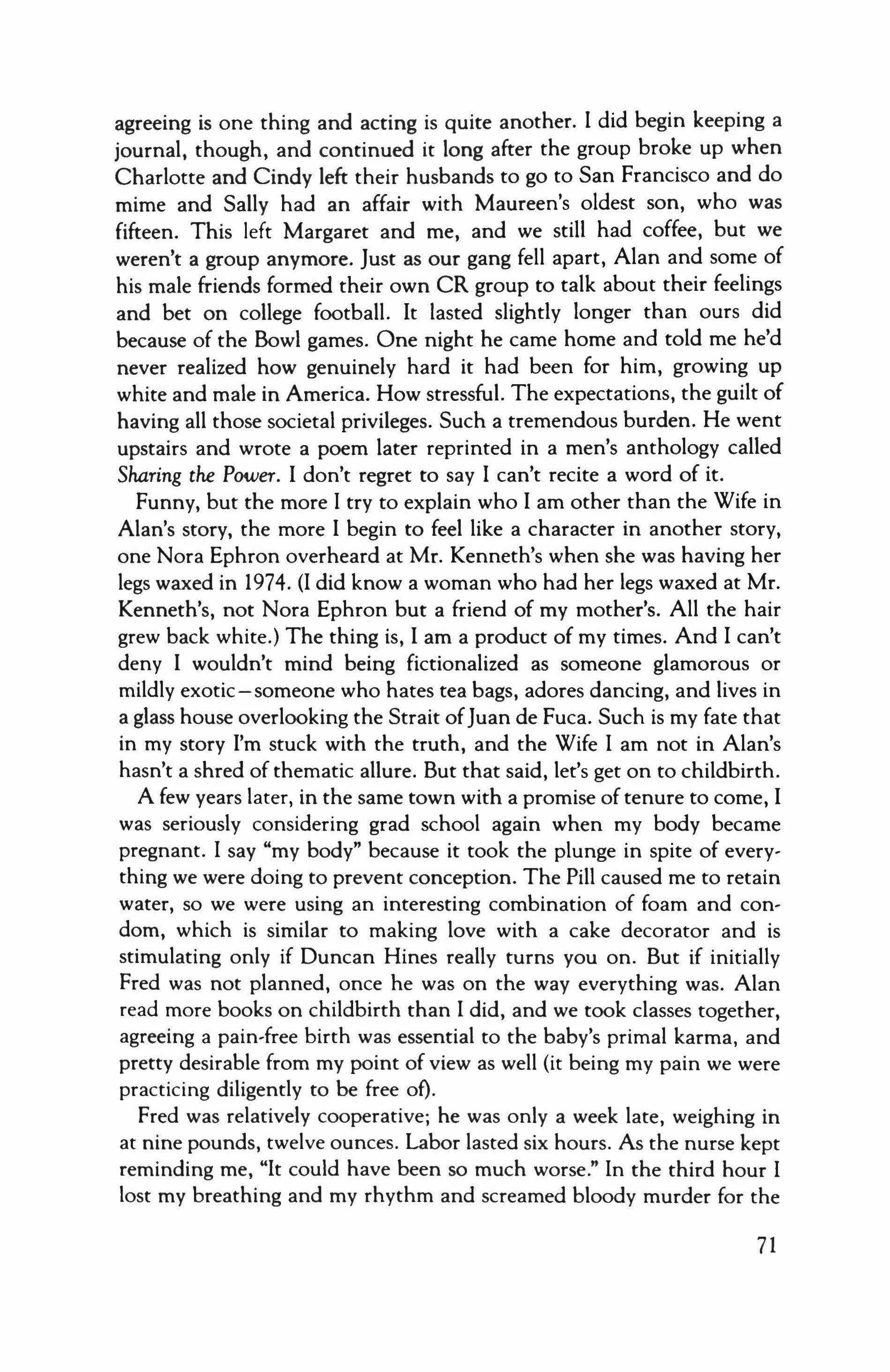
agreeing is one thing and acting is quite another. I did begin keeping a journal, though, and continued it long after the group broke up when Charlotte and Cindy left their husbands to go to San Francisco and do mime and Sally had an affair with Maureen's oldest son, who was fifteen. This left Margaret and me, and we still had coffee, but we weren't a group anymore. Just as our gang fell apart, Alan and some of his male friends formed their own CR group to talk about their feelings and bet on college football. It lasted slightly longer than ours did because of the Bowl games. One night he came home and told me he'd never realized how genuinely hard it had been for him, growing up white and male in America. How stressful. The expectations, the guilt of having all those societal privileges. Such a tremendous burden. He went upstairs and wrote a poem later reprinted in a men's anthology called Sharing the Power. I don't regret to say I can't recite a word of it.
Funny, but the more I try to explain who I am other than the Wife in Alan's story, the more I begin to feel like a character in another story, one Nora Ephron overheard at Mr. Kenneth's when she was having her legs waxed in 1974. (I did know a woman who had her legs waxed at Mr. Kenneth's, not Nora Ephron but a friend of my mother's. All the hair grew back white.) The thing is, I am a product of my times. And I can't deny I wouldn't mind being fictionalized as someone glamorous or mildly exotic-someone who hates tea bags, adores dancing, and lives in a glass house overlooking the Strait ofJuan de Fuca. Such is my fate that in my story I'm stuck with the truth, and the Wife I am not in Alan's hasn't a shred of thematic allure. But that said, let's get on to childbirth.
A few years later, in the same town with a promise of tenure to come, I was seriously considering grad school again when my body became pregnant. I say "my body" because it took the plunge in spite of everything we were doing to prevent conception. The Pill caused me to retain water, so we were using an interesting combination of foam and condom, which is similar to making love with a cake decorator and is stimulating only if Duncan Hines really turns you on. But if initially Fred was not planned, once he was on the way everything was. Alan read more books on childbirth than I did, and we took classes together, agreeing a pain-free birth was essential to the baby's primal karma, and pretty desirable from my point of view as well (it being my pain we were practicing diligently to be free of).
Fred was relatively cooperative; he was only a week late, weighing in at nine pounds, twelve ounces. Labor lasted six hours. As the nurse kept reminding me, "It could have been so much worse." In the third hour I lost my breathing and my rhythm and screamed bloody murder for the
71

rest of it, and then I didn't speak to anyone for two days. Not even my mother. Alan would walk in the room with that "l-wish-l-could-hidehow-terribly-disappointed-I-am-but-you-know-I'm-too-sincere-andhonest-to-do-that" look on his face and I'd close my eyes and pray for nuclear war. It seemed best we should all die suddenly, since I'd ruined Fred's life by upstaging his entrance and traumatizing his little seashell ears with my mother-ocean roar. When I did begin talking again, the first words out of my mouth were "I'm sorry." I'm sorry Fred, I'm sorry Alan, I'm sorry Mother, I'm sorry Doctor. I'm sorry it hurt like hell to push a ten-pound baby through this small opening in my body. Everyone assured me I was forgiven. Alan didn't show me the poem about the "Holy banshee / Screaming my son / Into life" until Fred was a year old. He even hid the magazine it came out in. By then I was pregnant with Justin, who was not an accident. Fred needed a sibling, and I needed one more chance to show the world just how pain-free childbirth could be. Alan got permission to bring in a friend with video equipment, and on camera I gritted my teeth and breathed appreciably better than before. It was still an agonizing experience. Eventually I reconciled myself to the fact that I was one of those rare women destined never to know the full joy of giving birth with a smile on her lips and a song in her heart. Now those of us who were convinced it wasn't supposed to hurt one tiny bit, and sharing such a meaningful moment with our husbands would create a special bond between us, realize discomfort in the delivery room is quite acceptable-and most couples who created that special bond are no longer married. Odd, isn't it?
I stayed home with Justin for his first two years; Fred, on the other hand, was primarily "fathered." Alan decided that to father well he should take Fred everywhere with him-to classes, to his office, to the dentist, to the gym. This did not please the administration one iota, as I heard through the working girls' network on campus, and Alan's students, his dental hygienist, and his handball partner probably weren't too hot on the idea, either (Fred was very vocal; I mean, he never shut up, he was a mynah bird in Pampers), but no one wanted to say anything and be accused of discriminating against fathers. So off Fred would go, and come home tired, hungry, and wet. A fight about toilet training finally put an end to Alan's nurturance. I asked him to pick a special toilet between home and the far side of campus, one Fred could get used to rather than visiting strange toilets every day, and he said that was impossible so never mind, forget it, keep him home, I was jealous of the time they spent together, anyway. This is when the poems on Fred the Baby stopped and those on the Two of them started. This is also
72
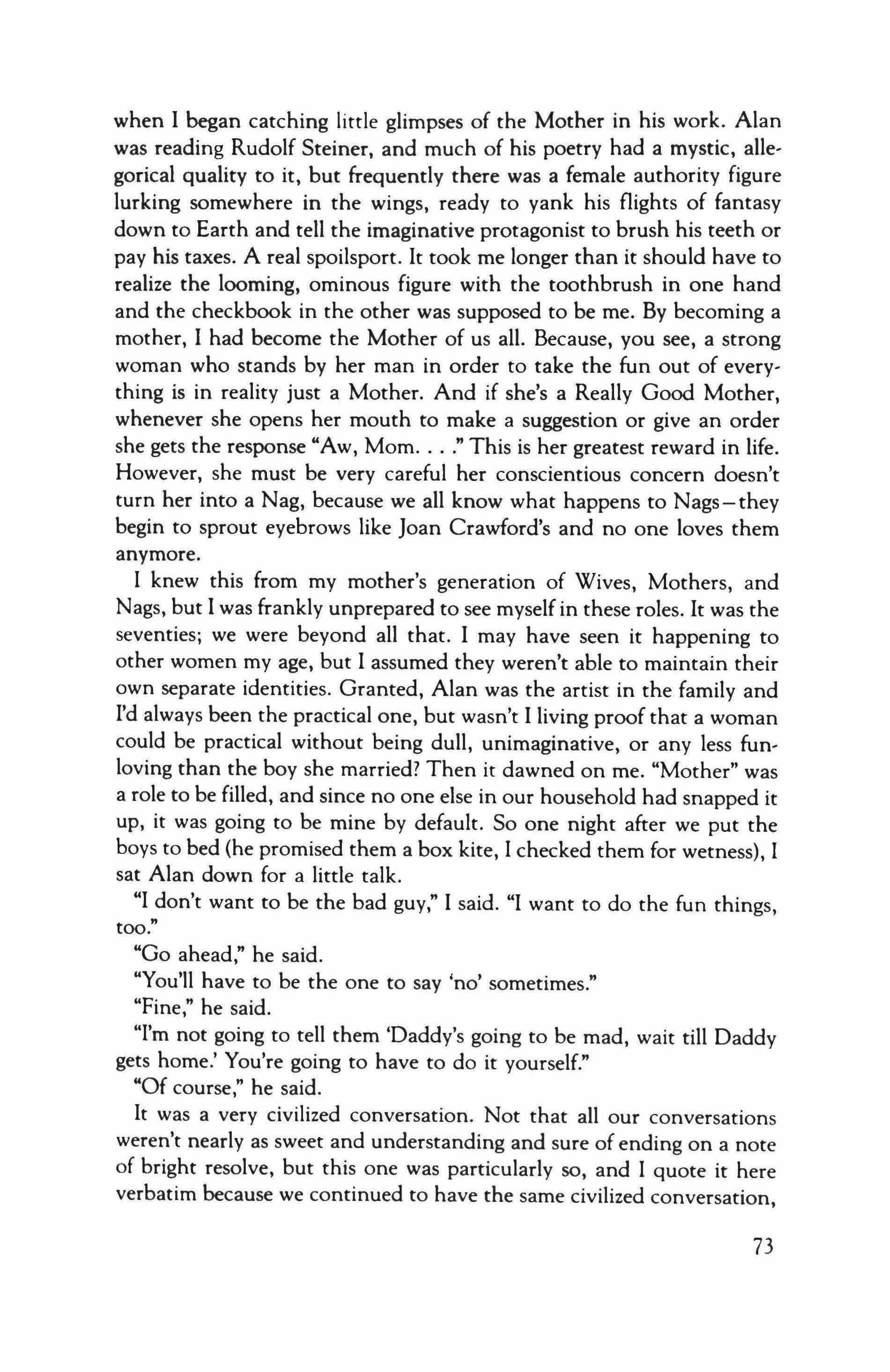
when I began catching little glimpses of the Mother in his work. Alan was reading Rudolf Steiner, and much of his poetry had a mystic, allegorical quality to it, but frequently there was a female authority figure lurking somewhere in the wings, ready to yank his flights of fantasy down to Earth and tell the imaginative protagonist to brush his teeth or pay his taxes. A real spoilsport. It took me longer than it should have to realize the looming, ominous figure with the toothbrush in one hand and the checkbook in the other was supposed to be me. By becoming a mother, I had become the Mother of us all. Because, you see, a strong woman who stands by her man in order to take the fun out of everything is in reality just a Mother. And if she's a Really Good Mother, whenever she opens her mouth to make a suggestion or give an order she gets the response "Aw, Mom This is her greatest reward in life. However, she must be very careful her conscientious concern doesn't turn her into a Nag, because we all know what happens to Nags-they begin to sprout eyebrows like Joan Crawford's and no one loves them anymore.
I knew this from my mother's generation of Wives, Mothers, and Nags, but I was frankly unprepared to see myself in these roles. It was the seventies; we were beyond all that. I may have seen it happening to other women my age, but I assumed they weren't able to maintain their own separate identities. Granted, Alan was the artist in the family and I'd always been the practical one, but wasn't I living proof that a woman could be practical without being dull, unimaginative, or any less funloving than the boy she married? Then it dawned on me. "Mother" was a role to be filled, and since no one else in our household had snapped it up, it was going to be mine by default. So one night after we put the boys to bed (he promised them a box kite, I checked them for wetness), I sat Alan down for a little talk.
"I don't want to be the bad guy," I said. "I want to do the fun things, too."
"Go ahead," he said.
"You'll have to be the one to say 'no' sometimes." "Fine," he said.
"I'm not going to tell them 'Daddy's going to be mad, wait till Daddy gets home.' You're going to have to do it yourself."
"Of course," he said.
It was a very civilized conversation. Not that all our conversations weren't nearly as sweet and understanding and sure of ending on a note of bright resolve, but this one was particularly so, and I quote it here verbatim because we continued to have the same civilized conversation,
73
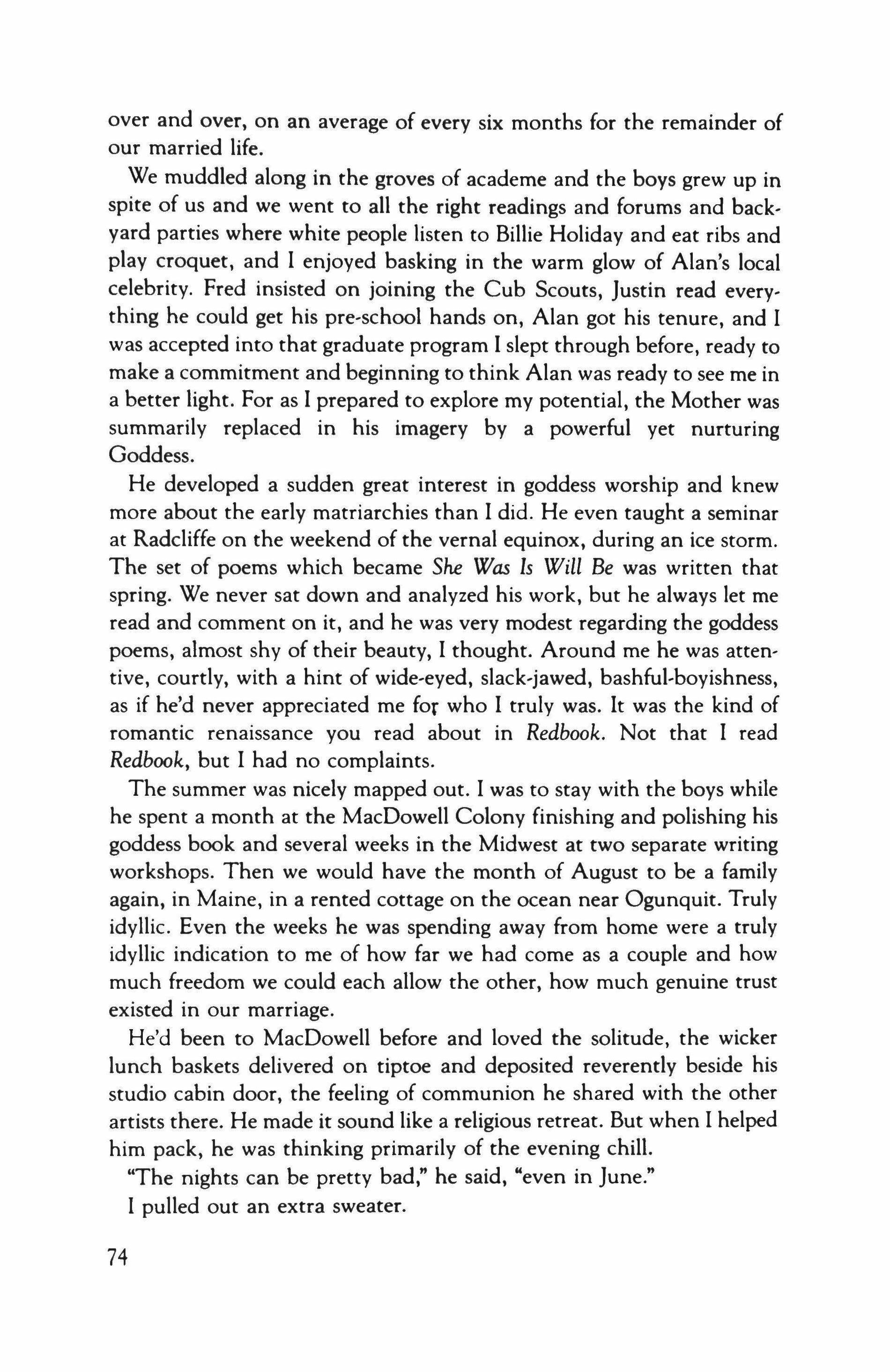
over and over, on an average of every six months for the remainder of our married life.
We muddled along in the groves of academe and the boys grew up in spite of us and we went to all the right readings and forums and backyard parties where white people listen to Billie Holiday and eat ribs and play croquet, and I enjoyed basking in the warm glow of Alan's local celebrity. Fred insisted on joining the Cub Scouts, Justin read everything he could get his pre-school hands on, Alan got his tenure, and I was accepted into that graduate program I slept through before, ready to make a commitment and beginning to think Alan was ready to see me in a better light. For as I prepared to explore my potential, the Mother was summarily replaced in his imagery by a powerful yet nurturing Goddess.
He developed a sudden great interest in goddess worship and knew more about the early matriarchies than I did. He even taught a seminar at Radcliffe on the weekend of the vernal equinox, during an ice storm. The set of poems which became She Was Is Will Be was written that spring. We never sat down and analyzed his work, but he always let me read and comment on it, and he was very modest regarding the goddess poems, almost shy of their beauty, I thought. Around me he was attentive, courtly, with a hint of wide-eyed, slack-jawed, bashful-boyishness, as if he'd never appreciated me for who I truly was. It was the kind of romantic renaissance you read about in Redbook. Not that I read Redbook, but I had no complaints.
The summer was nicely mapped out. I was to stay with the boys while he spent a month at the MacDowell Colony finishing and polishing his goddess book and several weeks in the Midwest at two separate writing workshops. Then we would have the month of August to be a family again, in Maine, in a rented cottage on the ocean near Ogunquit. Truly idyllic. Even the weeks he was spending away from home were a truly idyllic indication to me of how far we had come as a couple and how much freedom we could each allow the other, how much genuine trust existed in our marriage.
He'd been to MacDowell before and loved the solitude, the wicker lunch baskets delivered on tiptoe and deposited reverently beside his studio cabin door, the feeling of communion he shared with the other artists there. He made it sound like a religious retreat. But when I helped him pack, he was thinking primarily of the evening chill.
"The nights can be pretty bad," he said, "even in June."
I pulled out an extra sweater.
74

"You know what I could really use?" he decided. "That old leather jacket. Remember that jacket?"
"How could I forget it?"
"Well, where is it? Isn't it around here somewhere?"
"I think we wrapped your youth in it and boxed it up and stuck it in the attic."
"Could you find it?" he persisted. "It would be just perfect up there." I teased him a little more about searching for his lost innocencecbut I did go through a few boxes in the attic and didn't find it. He took his professorial tweed jacket and a down vest along instead.
The day he left 1 had an idea the leather jacket might be in with some old Army fatigues and work clothes in the cellar, and sure enough, it was. It was also horribly mildewed. I gave him the good and bad news when he called that night.
"Oh," was all he said.
"I can try to clean it, but the smell is probably permanent."
"Oh, don't bother." He seemed distracted. "Guess who's here?"
I couldn't.
"Alice. McKay. The poet. She was Alice Woodward." "Oh, Alice." Our old writing teacher. The one he thought was interested in me. "How is she?"
"Fine-actually, not so fine, she's getting a divorce, but her work is going very well. She asked about you, wondered if you were still writing."
"Oh. Well, give her my best."
"I will."
I didn't try to clean the jacket. I put the soggy box of things it was packed away in on the back porch and hung the jacket in the yard to air out. It hung there on the clothesline, on a rusting coat hanger, for months. By Christmas it was frozen solid.
The second weekend of Alan's month at MacDowell the boys and I were going to drive up and spend Saturday night with him at a country inn that allowed children. But Alan surprised us by coming home on Friday night. He wore a brand-new, stiff and squeaky black leather jacket.
"It was so cold," he explained, "I had to run over to Nashua and pick one up."
"It stinks," said Justin.
"It stinks like the Stevensons' pony," said Fred.
He said he came home because he missed us, but when I suggested we could drive both cars up to the inn the next day, he announced he'd
75

already canceled our reservation. The boys were less thrilled to see him after this pronouncement, and I wasn't thrilled myself that he would cancel the room without even consulting me, losing our deposit in the process.
"I just had to come home," he insisted, like a homesick boy who's left summer camp, so no one argued with him. We all went to bed early. After we made love, Alan buried his head in his pillow and cried. I remember thinking, "Is it possible he could really have missed me this much?" But then he raised up on one elbow and told me about the affair.
"It just happened, I'd always been attracted to Alice, she's very vulnerable right now, maybe I took advantage of that, I don't know-but I feel awful about it, it wasn't love, it'll never happen again, can you ever forgive me?" He was terribly upset. He was so upset I didn't have a chance to be angry. It was all I could do to comfort him, and forgive him. And I did forgive him. One slip in fifteen years and he couldn't even enjoy it for the guilt - who wouldn't forgive him? Still, he was amazed I could forgive so easily; it only made him feel worse. When he finally calmed down and told me how wonderful I was and how much he loved me and would always love me, we fell asleep in one another's arms. Actually, he fell asleep, and I lay awake for a good long while, wondering why he waited until after we made love to tell me.
He stayed the weekend, playing games with the boys, walking across campus holding my hand tightly in his, taking us all out for broccoli pizza and ice cream. A dozen times I caught him looking at me adoringly, and not once did he leave us to go into his study and work. Perhaps I was far too understanding about his indiscretion for my own good, but Alan didn't give me any choice. He said everything I was thinking before I could open my mouth: "I know you must have a multitude of feelings about this, you're hurt and confused, angry and sad, you're not sure if you can ever trust me again. Please go ahead and feel whatever you need to feel, but please don't stop loving me." When your husband is holding your hand and pleading with you this way, it's hard to be less than comforting and generous. I did allow myself plenty of nasty thoughts about Alice, however. It was easy to blame everything on her.
Before he returned to MacDowell, Alan told me we'd talk everything out or go into counseling or whatever I wanted to do, just as soon as he finished his book and his workshops. Or we could go on to Maine the way we planned. It was up to me, my decision. "And it sounds cruel," he said, "but I'm just going to avoid Alice completely."
76
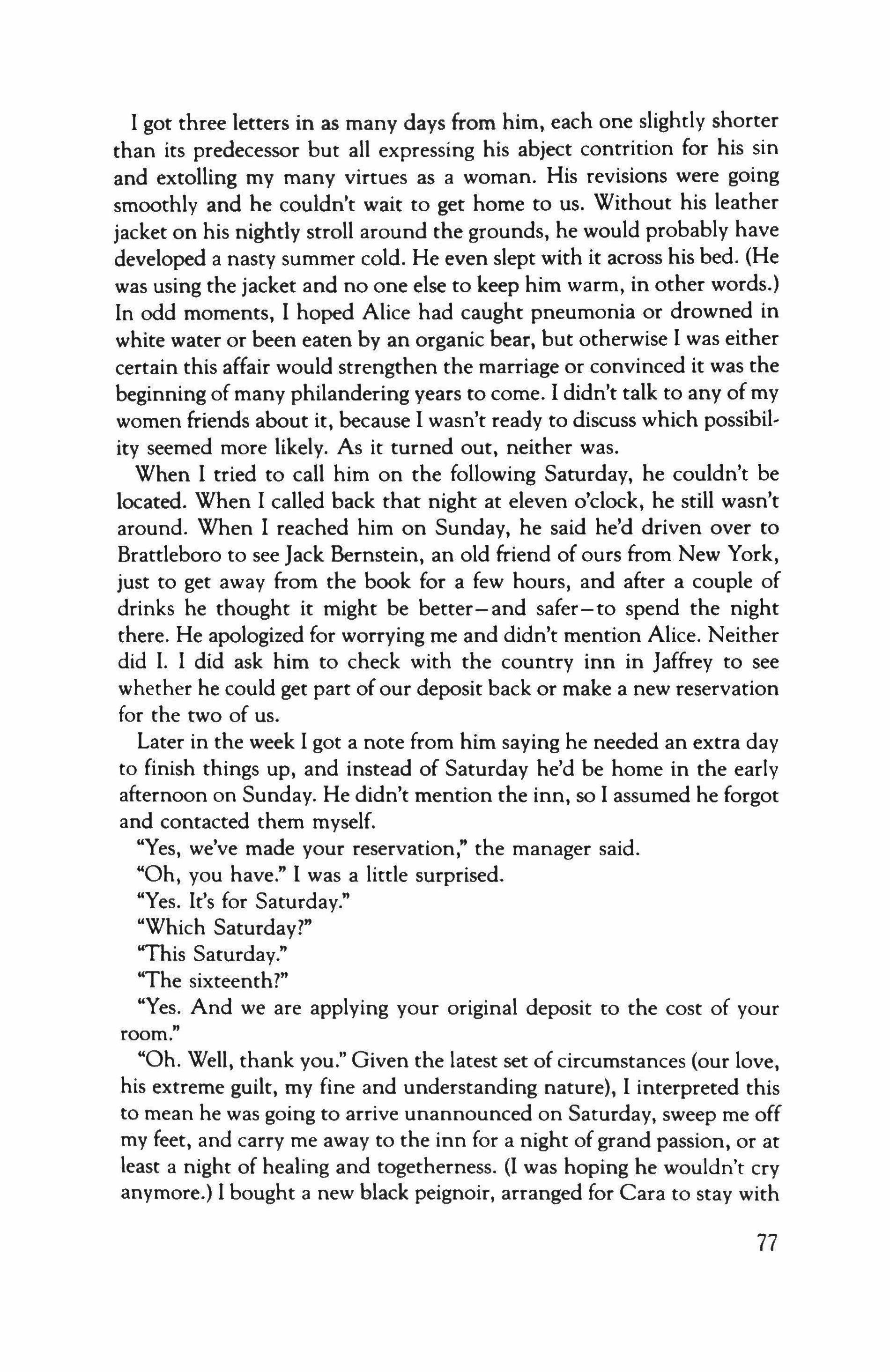
I got three letters in as many days from him, each one slightly shorter than its predecessor but all expressing his abject contrition for his sin and extolling my many virtues as a woman. His revisions were going smoothly and he couldn't wait to get home to us. Without his leather jacket on his nightly stroll around the grounds, he would probably have developed a nasty summer cold. He even slept with it across his bed. (He was using the jacket and no one else to keep him warm, in other words.) In odd moments, I hoped Alice had caught pneumonia or drowned in white water or been eaten by an organic bear, but otherwise I was either certain this affair would strengthen the marriage or convinced it was the beginning of many philandering years to come. I didn't talk to any of my women friends about it, because I wasn't ready to discuss which possibility seemed more likely. As it turned out, neither was.
When I tried to call him on the following Saturday, he couldn't be located. When I called back that night at eleven o'clock, he still wasn't around. When I reached him on Sunday, he said he'd driven over to Brattleboro to see Jack Bernstein, an old friend of ours from New York, just to get away from the book for a few hours, and after a couple of drinks he thought it might be better-and safer-to spend the night there. He apologized for worrying me and didn't mention Alice. Neither did l. I did ask him to check with the country inn in Jaffrey to see whether he could get part of our deposit back or make a new reservation for the two of us.
Later in the week I got a note from him saying he needed an extra day to finish things up, and instead of Saturday he'd be home in the early afternoon on Sunday. He didn't mention the inn, so I assumed he forgot and contacted them myself.
"Yes, we've made your reservation," the manager said.
"Oh, you have." I was a little surprised.
"Yes. It's for Saturday."
"Which Saturday?"
"This Saturday."
"The sixteenth?"
"Yes. And we are applying your original deposit to the cost of your room."
"Oh. Well, thank you." Given the latest set of circumstances (our love, his extreme guilt, my fine and understanding nature), 1 interpreted this to mean he was going to arrive unannounced on Saturday, sweep me off my feet, and carry me away to the inn for a night of grand passion, or at least a night of healing and togetherness. (I was hoping he wouldn't cry anymore.) I bought a new black peignoir, arranged for Cara to stay with
77
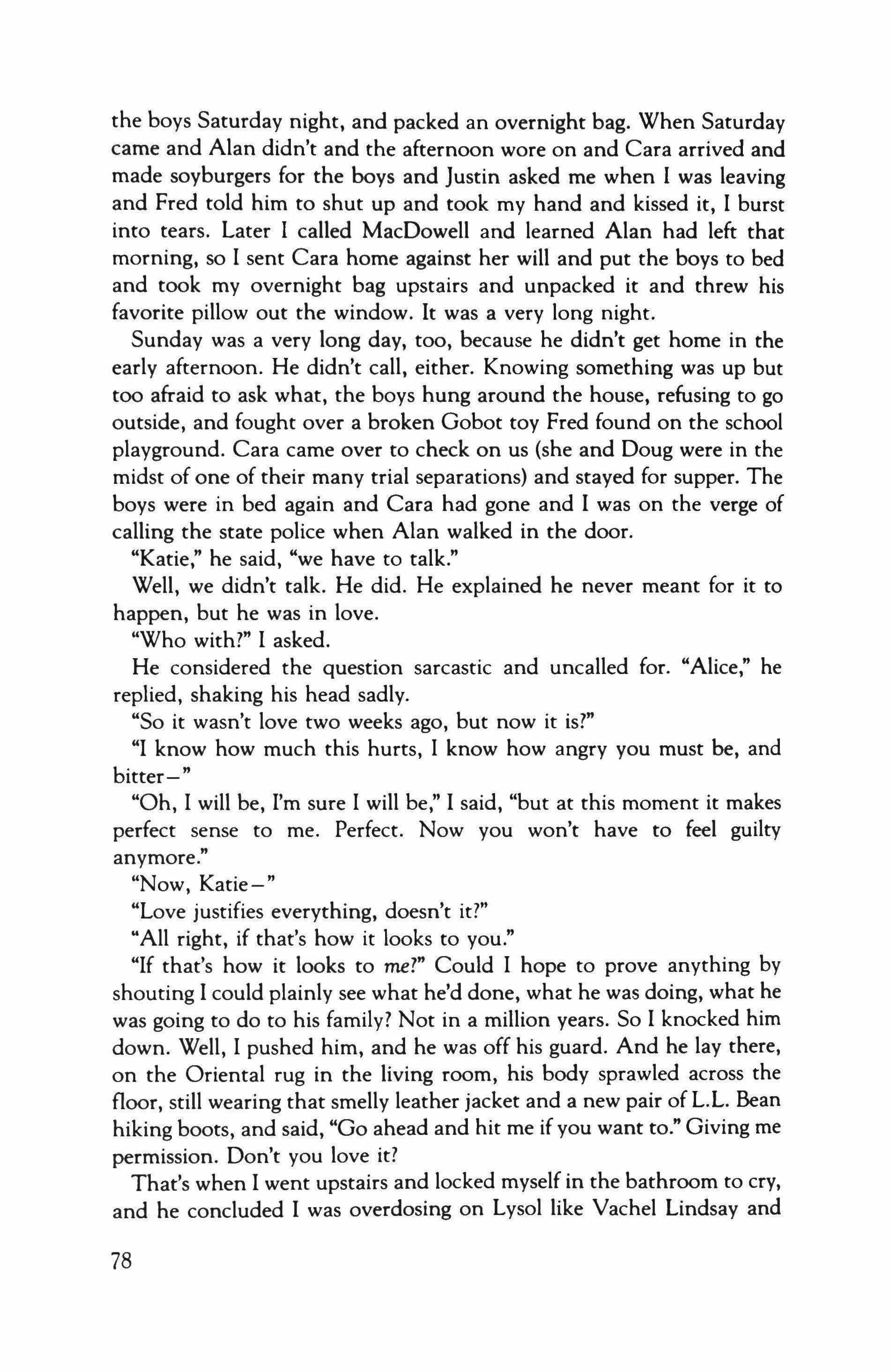
the boys Saturday night, and packed an overnight bag. When Saturday came and Alan didn't and the afternoon wore on and Cara arrived and made soyburgers for the boys and Justin asked me when I was leaving and Fred told him to shut up and took my hand and kissed it, I burst into tears. Later I called MacDowell and learned Alan had left that morning, so I sent Cara home against her will and put the boys to bed and took my overnight bag upstairs and unpacked it and threw his favorite pillow out the window. It was a very long night.
Sunday was a very long day, too, because he didn't get home in the early afternoon. He didn't call, either. Knowing something was up but too afraid to ask what, the boys hung around the house, refusing to go outside, and fought over a broken Gobot toy Fred found on the school playground. Cara came over to check on us (she and Doug were in the midst of one of their many trial separations) and stayed for supper. The boys were in bed again and Cara had gone and I was on the verge of calling the state police when Alan walked in the door.
"Katie," he said, "we have to talk."
Well, we didn't talk. He did. He explained he never meant for it to happen, but he was in love.
"Who with?" 1 asked.
He considered the question sarcastic and uncalled for. "Alice," he replied, shaking his head sadly.
"So it wasn't love two weeks ago, but now it is?"
"I know how much this hurts, I know how angry you must be, and bitter-"
"Oh, 1 will be, I'm sure I will be," 1 said, "but at this moment it makes perfect sense to me. Perfect. Now you won't have to feel guilty anymore."
"Now, Katie-"
"Love justifies everything, doesn't it?"
All right, if that's how it looks to you."
"If that's how it looks to me?" Could I hope to prove anything by shouting I could plainly see what he'd done, what he was doing, what he was going to do to his family? Not in a million years. So I knocked him down. Well, I pushed him, and he was off his guard. And he lay there, on the Oriental rug in the living room, his body sprawled across the floor, still wearing that smelly leather jacket and a new pair of L.L. Bean hiking boots, and said, "Go ahead and hit me if you want to." Giving me permission. Don't you love it?
That's when 1 went upstairs and locked myself in the bathroom to cry, and he concluded 1 was overdosing on Lysollike Vachel Lindsay and
78
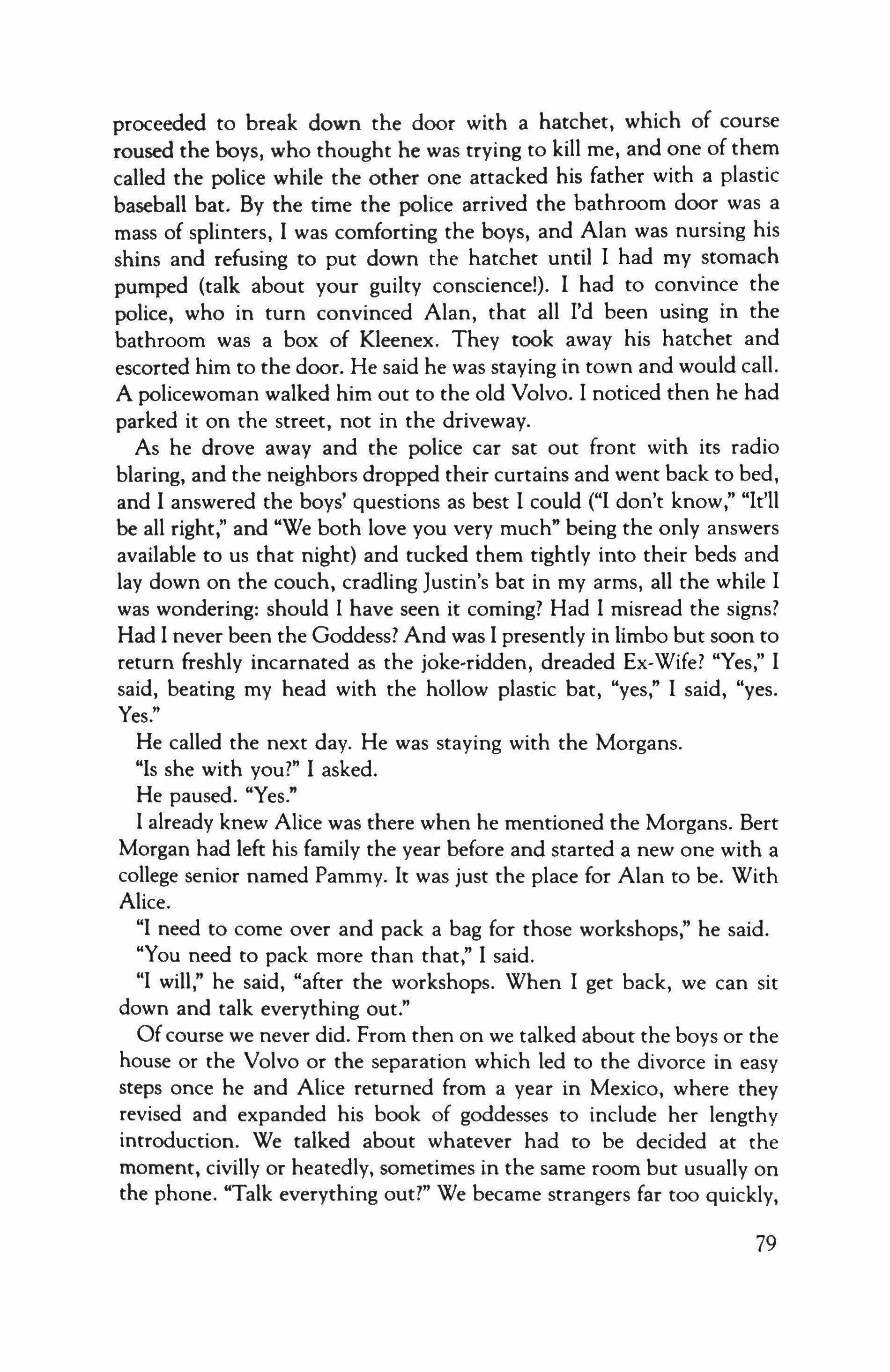
proceeded to break down the door with a hatchet, which of course roused the boys, who thought he was trying to kill me, and one of them called the police while the other one attacked his father with a plastic baseball bat. By the time the police arrived the bathroom door was a mass of splinters, I was comforting the boys, and Alan was nursing his shins and refusing to put down the hatchet until I had my stomach pumped (talk about your guilty conscience!). I had to convince the police, who in turn convinced Alan, that all I'd been using in the bathroom was a box of Kleenex. They took away his hatchet and escorted him to the door. He said he was staying in town and would call. A policewoman walked him out to the old Volvo. I noticed then he had parked it on the street, not in the driveway.
As he drove away and the police car sat out front with its radio blaring, and the neighbors dropped their curtains and went back to bed, and I answered the boys' questions as best I could ("I don't know," "It'll be all right," and "We both love you very much" being the only answers available to us that night) and tucked them tightly into their beds and lay down on the couch, cradling Justin's bat in my arms, all the while I was wondering: should I have seen it coming? Had I misread the signs? Had I never been the Goddess? And was I presently in limbo but soon to return freshly incarnated as the joke-ridden, dreaded Ex-Wife? "Yes," I said, beating my head with the hollow plastic bat, "yes," I said, "yes. Yes."
He called the next day. He was staying with the Morgans. "Is she with you?" I asked.
He paused. "Yes."
I already knew Alice was there when he mentioned the Morgans. Bert Morgan had left his family the year before and started a new one with a college senior named Pammy. It was just the place for Alan to be. With Alice.
"I need to come over and pack a bag for those workshops," he said.
"You need to pack more than that," I said.
"I will," he said, "after the workshops. When I get back, we can sit down and talk everything out."
Of course we never did. From then on we talked about the boys or the house or the Volvo or the separation which led to the divorce in easy steps once he and Alice returned from a year in Mexico, where they revised and expanded his book of goddesses to include her lengthy introduction. We talked about whatever had to be decided at the moment, civilly or heatedly, sometimes in the same room but usually on the phone. "Talk everything out?" We became strangers far too quickly,
79

and the best strangers can manage is a rare "I'm sorry" or an occasional "I hope we can become friends now." Are we becoming friends now? I think we were supposed to be becoming them, until he wrote the story.
Ah, the story. The one I am not the Wife in. Oh-one more thing, to prepare you for the story. Long ago, when we were in Vermont, there was a cemetery within walking distance of our little house, a place with large, ornate headstones of fine New England granite that came from the quarry on the other side of town. One day I was walking there with Jane and Yvonne, and we came to a monument fashioned in the shape of a headboard. A curved, half-moon headboard made of pink granite. Carved out of the headboard, in relief, were a man and a woman sitting up in bed and leaning back against their rock-hard pillows. They were middle-aged, smiling, wearing pajamas and nightgown and holding hands. The wife was buried there; her dates of birth and death were inscribed on the covers below her name. His name was beside hers but lacking the final date, leaving him among the living. It was a remarkable bit of kitsch, made even more bizarre by Jane's postscript to the story. She said after the woman's burial on her side of the bed, the husband found someone else and married her and they bought another double plot down the hill. While the image of a happy couple remained etched in granite, resting in peace, in actuality the wife would lie alone forever, eternally in the shadow of her faithless husband's stony smile.
I was fascinated by this headstone, and brought Alan up to see it, and he insisted we search out the caretaker, who attested to the accuracy of the story. He'd gone to school with the original couple; they were childhood sweethearts. The second wife was a distant cousin of the husband's, from Albany. Before we went home to dinner, Alan kissed me by that strange monument and swore he would never leave me cold and alone on a New England hillside. "Of course you won't," I said. "I'm going to be cremated."
He did write a poem with a woman speaking from her grave, lamenting the loss of everything secular and transitory, including her husband ("This hollowness / That held you tight / Gone cold as stone"), but it simply mentioned their communal headstone in passing without describing it. I thought he left out the best part.
All right. Those are the facts, those pertinent to my case. (I only briefly considered taking this to court, recalling a woman in New York who sued her boyfriend for creating a prostitute in his novel who had her hair, eyes, and given name, spoke fluent French, graduated from college with honors in psychology, lived on Twenty-third Street, went to the Bahamas with an Iranian businessman, plucked her eyebrows every
80

morning-did all this just the way she did. She lost her case on "insufficient grounds" and ended up on the front page of a sleazy rag at the supermarket checkout, so what was the point?) Alan and his new bride rode off into the sunset, taking teaching jobs at another charming Vermont college in another picturesque Vermont town, while the boys and I stayed on in our house and our town, making the necessary adjustments as we went along. Once I went back to work full-time in the English Department office, we rented a room to Cara, and he began to send the child support regularly, we could almost make ends meet (so long as we, the cats, the Volvo, and the plumbing stayed healthy). If Fred, Justin, and I are a little jaded for our years - well, maybe we've learned to cope a little better and care a little less. And now Alan's book comes out.
Short stories, a dozen of them. Many I was familiar with; he'd been working on them for years. They were the stories of a boy growing up in Virginia: wistful recollections of the uncle dying in the Korean War and the polio scare that shut down the swimming pool and the huge blackand-white box of a Sylvania TV set on its spindly legs and the look in the eyes of the first rabbit he shot and the obligatory coach who was a rabid anticommunist and the teacher everyone made fun of who gave him language as a gift and the friend who fell off the town bridge on prom night and the look in the eyes of the first girl he laid. And always, in the foreground or the background, the brother he admired, adored, fought, and despised. Just the sort of stories you'd expect from Alan, and the sort he expected of himself. He'd already published them separately but always intended to do a collection someday and call it The Heart's Field, after something Eudora Welty said about geography as destiny, the idea that your childhood circumstances are the proving ground for your life. Alan loves his roots. He considers them so special, so unique, that nothing short of a red-hot poker will ever convince him otherwise.
Those are the early stories-very rooted, very predictable, but I have no quarrel with them. Then there are four new stories. One is about a soldier in Germany drinking schnapps by the old Berlin Wall and beating up his best friend (I'm guessing this was pure fiction, or someone he knew over there), one concerns a young boy in Mexico (who acts suspiciously like he could be growing up in Virginia), one is about a man and woman who meet at a Radcliffe seminar on goddess worship and renew an auld acquaintance (no comment), and one is about a wife. The very same Wife I am not. It's called "Rainin' All the Time" (which is the title of the collection), as in "keeps rainin' all the time," as in "Stormy Weather," as in Lena Horne.
81

It's the story of a woman who is married to a writer. They have two sons. They live in a New England college town. In point of fact, they met in college. (You're already getting the gist of this, I can tell.) She gives up her own promising (?) career as a writer to be his wife and put him through graduate school and cater to his whims (ah, such a victim!). Well, after fifteen years of penny-pinching drudgery and torturous childbirth, after giving him the best years of her life and then some, she's deserted by the man who ups and runs away with her best friend who never married and has no scars to prove it.
That's the nutshell, of course. More specifically: the woman's husband, the writer, is jealous of her women friends, and a gay male couple she meets early in their marriage makes him particularly uncomfortable (he only wants her associating with his friends and their dull wives, where he can keep an eye on her); he puts her in his poetry as if she were a piece of art, never seeing the woman, only the image; he has her videotaped giving birth and shows the tape to his soccer buddies while they eat handfuls of pretzels and drink beer; he wants his sons to love him and obey her, so he acts like their older brother and treats her like the one who always arrives to spoil their fun - and when she protests, he promises to change, but never does. So he goes on through the years, living life the way he wants it, enjoying his success, making fun of her weaknesses, taking pride in the children who learn from his example how to make fun of her, too, until he falls madly in love with his wife's best friend Amelia (who was her best friend only because he approved of her, not because the wife chose her to confide in), a successful writer who says what she thinks and does what she likes and is godmother to their youngest son. The two of them go off to a writers' colony to get the affair out of their systems, but the plan backfires. When he confesses everything to the wife and attempts to leave her, she goes completely berserk and barricades herself in the bathroom and attempts suicide by slashing her throat with his old razor. He breaks down the door and saves her life and she goes away for a rest, while he and his new love take the boys to Maine for the summer where he admires the way the boys respect Amelia and don't make fun of her the way they did Mom. In the last scene, on the next Easter Sunday, the wife comes out of the sanitarium and goes to the cemetery she and the writer once strolled through together and stops by the grave of a woman buried alone because her faithless husband remarried. She sits and wonders what she did wrong and feels "hollow as the thin-skinned chocolate bunnies with sweet candied air inside them" that she sent her boys. The implication is she's
82
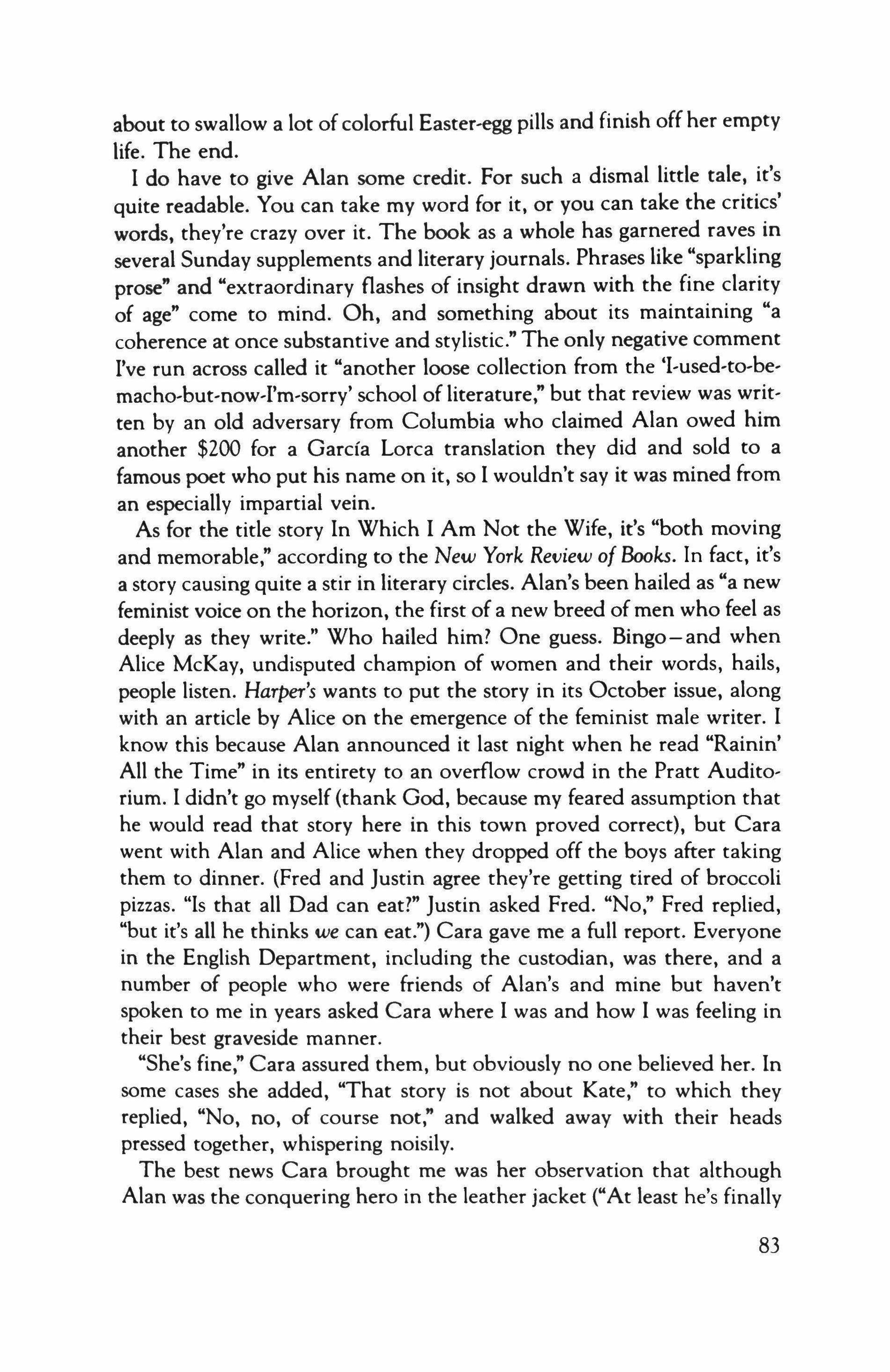
about to swallow a lot of colorful Easter-egg pills and finish off her empty life. The end.
I do have to give Alan some credit. For such a dismal little tale, it's quite readable. You can take my word for it, or you can take the critics' words, they're crazy over it. The book as a whole has garnered raves in several Sunday supplements and literary journals. Phrases like "sparkling prose" and "extraordinary flashes of insight drawn with the fine clarity of age" come to mind. Oh, and something about its maintaining "a coherence at once substantive and stylistic." The only negative comment I've run across called it "another loose collection from the 'l-used-to-bemacho-but-now-I'm-sorrv' school of literature," but that review was written by an old adversary from Columbia who claimed Alan owed him another $200 for a Garcia Lorca translation they did and sold to a famous poet who put his name on it, so I wouldn't say it was mined from an especially impartial vein.
As for the title story In Which I Am Not the Wife, it's "both moving and memorable," according to the New York Review of Books. In fact, it's a story causing quite a stir in literary circles. Alan's been hailed as "a new feminist voice on the horizon, the first of a new breed of men who feel as deeply as they write." Who hailed him? One guess. Bingo-and when Alice McKay, undisputed champion of women and their words, hails, people listen. Harper's wants to put the story in its October issue, along with an article by Alice on the emergence of the feminist male writer. I know this because Alan announced it last night when he read "Rainin' All the Time" in its entirety to an overflow crowd in the Pratt Auditorium. I didn't go myself (thank God, because my feared assumption that he would read that story here in this town proved correct), but Cara went with Alan and Alice when they dropped off the boys after taking them to dinner. (Fred and Justin agree they're getting tired of broccoli pizzas. "Is that all Dad can eat?" Justin asked Fred. "No," Fred replied, "but it's all he thinks we can eat.") Cara gave me a full report. Everyone in the English Department, including the custodian, was there, and a number of people who were friends of Alan's and mine but haven't spoken to me in years asked Cara where I was and how I was feeling in their best graveside manner.
"She's fine," Cara assured them, but obviously no one believed her. In some cases she added, "That story is not about Kate," to which they replied, "No, no, of course not," and walked away with their heads pressed together, whispering noisily.
The best news Cara brought me was her observation that although Alan was the conquering hero in the leather jacket ("At least he's finally
83
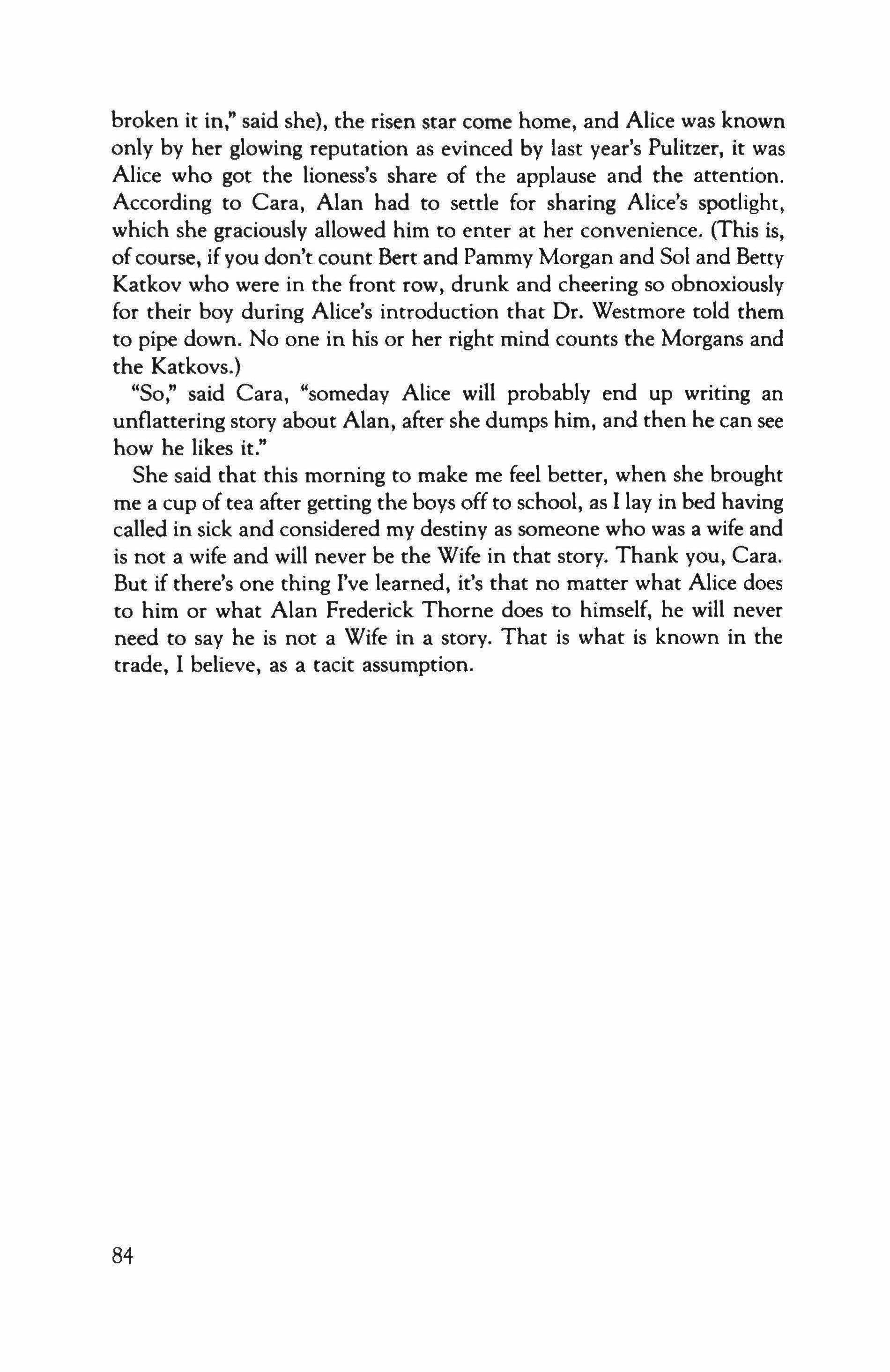
broken it in," said she), the risen star come home, and Alice was known only by her glowing reputation as evinced by last year's Pulitzer, it was Alice who got the lioness's share of the applause and the attention. According to Cara, Alan had to settle for sharing Alice's spotlight, which she graciously allowed him to enter at her convenience. (This is, of course, if you don't count Bert and Pammy Morgan and Sol and Betty Katkov who were in the front row, drunk and cheering so obnoxiously for their boy during Alice's introduction that Dr. Westmore told them to pipe down. No one in his or her right mind counts the Morgans and the Katkovs.)
"So," said Cara, "someday Alice will probably end up writing an unflattering story about Alan, after she dumps him, and then he can see how he likes it."
She said that this morning to make me feel better, when she brought me a cup of tea after getting the boys off to school, as I lay in bed having called in sick and considered my destiny as someone who was a wife and is not a wife and will never be the Wife in that story. Thank you, Cara. But if there's one thing I've learned, it's that no matter what Alice does to him or what Alan Frederick Thorne does to himself, he will never need to say he is not a Wife in a story. That is what is known in the trade, I believe, as a tacit assumption.
84
Four Poems
Theodore Weiss

Out of the Cold
This thing we've had between us almost fifty years, thin it is, like the skin on a drowsing wind. And yet in this bewildered world it has supplied a shelter. Looks your eyes beamed forth in all their openness first struck me as charms, the green cool shade a garden makes shedding bounties on the earth, the tropical, small breezes in your breath remitting fragrance out of flowery trees. Years past, though we cling to that skinthin thing like the caul of a dreaming sea, almost anything can break through, the sea turned into a wind-battering blast.
85

And yet like edelweiss perched on a precipice, a pansy just below a lichened, tottery boulder, as long as it lasts we are in out of the cold.
86
The Future of the Past
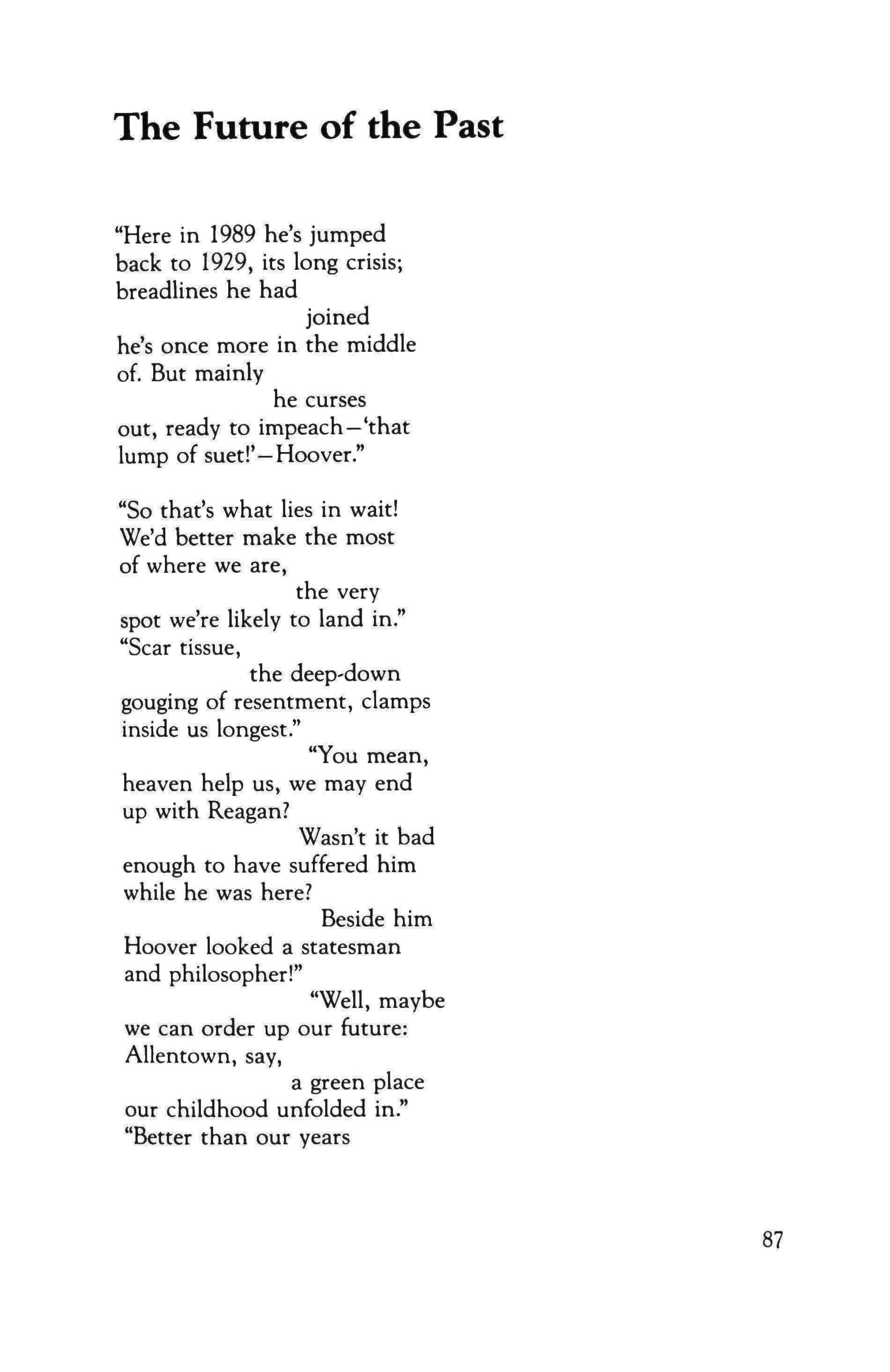
"Here in 1989 he's jumped back to 1929, its long crisis; breadlines he had joined he's once more in the middle of. But mainly he curses out, ready to impeach - 'that lump of suet!' - Hoover."
"So that's what lies in wait! We'd better make the most of where we are, the very spot we're likely to land in."
"Scar tissue, the deep-down gouging of resentment, clamps inside us longest."
"You mean, heaven help us, we may end up with Reagan?
Wasn't it bad
enough to have suffered him while he was here?
Beside him
Hoover looked a statesman and philosopher!"
"Well, maybe we can order up our future: Allentown, say, a green place our childhood unfolded in."
"Better than our years
87

in those dust-bowl cementfactory towns, incredible now as ghostly Petra."
"Allentown is hardly my idea of heaven. But there once more, it may open our eyes to the pleasure missed the first time."
88
There

IWhere does this "there" come from? That is the question that intimidates all answers like looking up in astonishment to see a rain falling as from under your eyelids.
A man here, a woman there, hurrying along, drops' splintered shadows. A tear-drenched covey of cries. Cars slithering by with who knows what daunting ideas sped inside.
At that a lull, a slow, gray, drizzling space in which anything can appear, as easygoing as a ramble down the street, its rumble of humdrum instruments - rain and traffic, the ragged corner musicians playing for themselvesbarely making it into your head.
You turn the corner. The rain stops. And there, where you had strolled many times before, a something blazes out as if awaiting you. And that momentthe traffic light stuck at green, clouds packed with soaring spired scapes dream cannot accommodate, the crumbled red-brick buildings
89

aerial, transparent, daring time its seamless lengthyou have been there. But then the light, changing, closes down into the question you suspect you'll never be able to answer. And the soggy air, once more sagging, sucks your breath.
II
Go ahead, roll around in your life like old cat Hoppy in the dirt. Good for ticks, fleas, itches, an ecstasy of scratching.
As that Greek who knew a thing or two advised, that's how to come clean.
Then for one second at least you stand out in the open, lure to the lightning, singing lustily,
"Here 1 am! I'm here!"
till the doubts collect again, the rain nothing but cold rain, the sky, for dark, driven clouds, as turmoiled as your thoughts, and you have to plunge back into your bath of mud.
90

Haunts I
This night inviting ambush, who's to say the local tribe, able like antlered deer to melt among the multi-shadowed branches, is not lurking here?
The colorcrowded fall, commingled with the richly crested fowl, recalls their headdress.
A glancing, more than sinking sun, shoots from the foliage of eyes caught by a chanting, fluent as a twilit, fish-peaked lake.
Centuries before we came they prized this earth, measured out its secret trails, each sacred in itself as where it went; also its rivers diving, blood-paced, helped enliven.
Seasons winding into dances, they informed the wind with song, intrinsic to birds' dialects could we but understand.
Campfires
flickered under eyelids, horses thunderous between one heartbeat and the next, the shadows quicken, not out of this rustling, moonset night alone.
91

*
"For all the wars scarring this land, the feathers that we decked us in made more than show.
Sprung from out the ambush of your words, on my prize stallion I soar among a flight of eagle arrows, saw-beaked, clawing bird my tomahawk swooped down, glinting with my glance.
Our war-paint dipped from tints exceeding autumn washed across the woods: blood soaking this earth.
The twilight of my race come home to roost, it heaves leaf-thick in the wind, attuning into winter with our cries."
II
For these trees putting on their usual unusual show it's hard to believe the story he'd have told.
Hard too since there is more to it than that: at times, although I'd never lived in Polish villages with relatives, I hear a sudden, dreaded shout upon the wind, a cry that ushers in the clatter, ever closer, of the Cossack-ridden drove.
Wherever I go, a galloping urgent in my blood, I bear them with me, by their blending forces
92
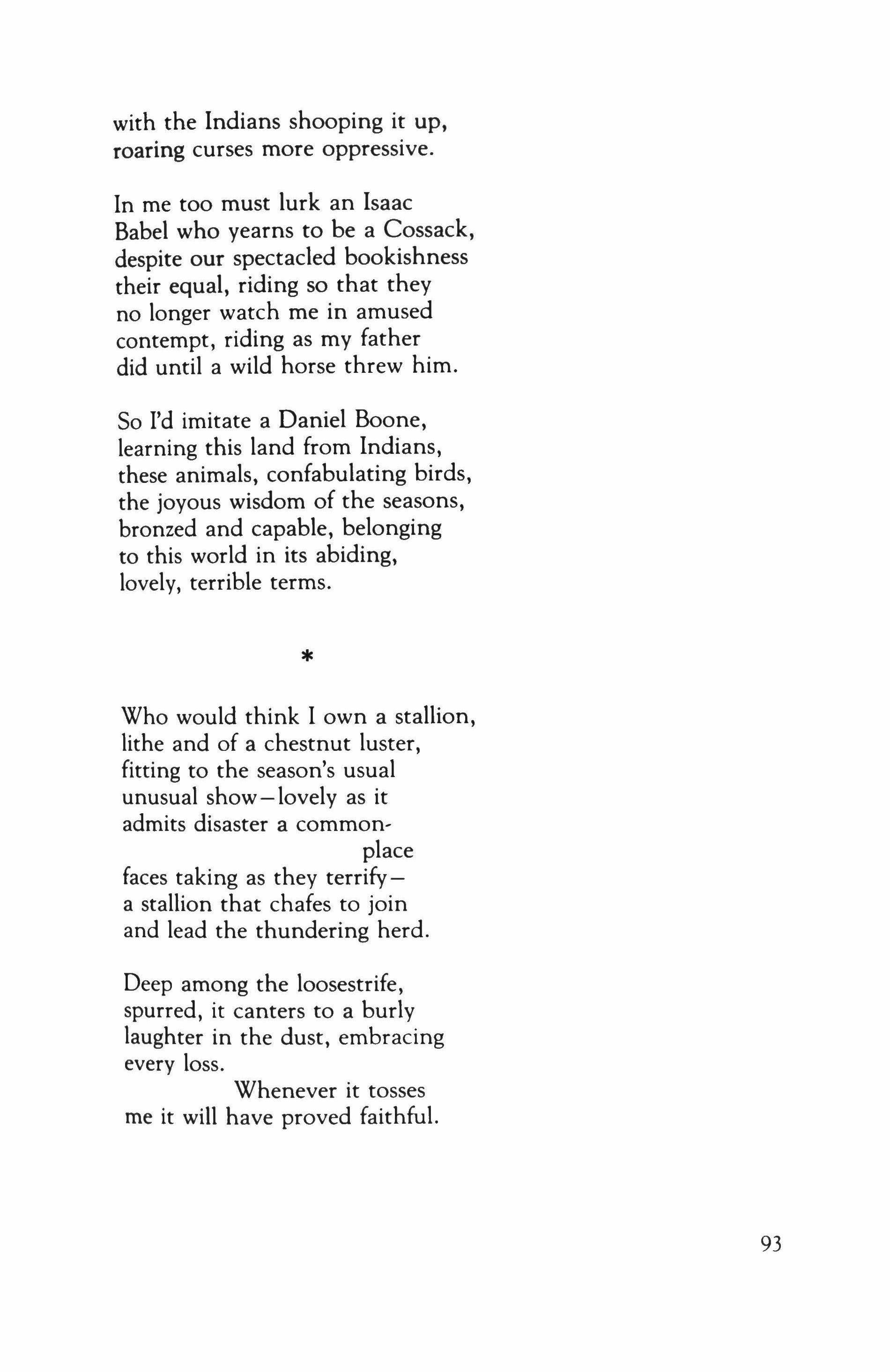
with the Indians shooping it up, roaring curses more oppressive.
In me too must lurk an Isaac Babel who yearns to be a Cossack, despite our spectacled bookishness their equal, riding so that they no longer watch me in amused contempt, riding as my father did until a wild horse threw him.
So I'd imitate a Daniel Boone, learning this land from Indians, these animals, confabulating birds, the joyous wisdom of the seasons, bronzed and capable, belonging to this world in its abiding, lovely, terrible terms.
*
Who would think I own a stallion, lithe and of a chestnut luster, fitting to the season's usual unusual show-lovely as it admits disaster a common, place faces taking as they terrifya stallion that chafes to join and lead the thundering herd.
Deep among the loosestrife, spurred, it canters to a burly laughter in the dust, embracing every loss.
Whenever it tosses me it will have proved faithful.
93
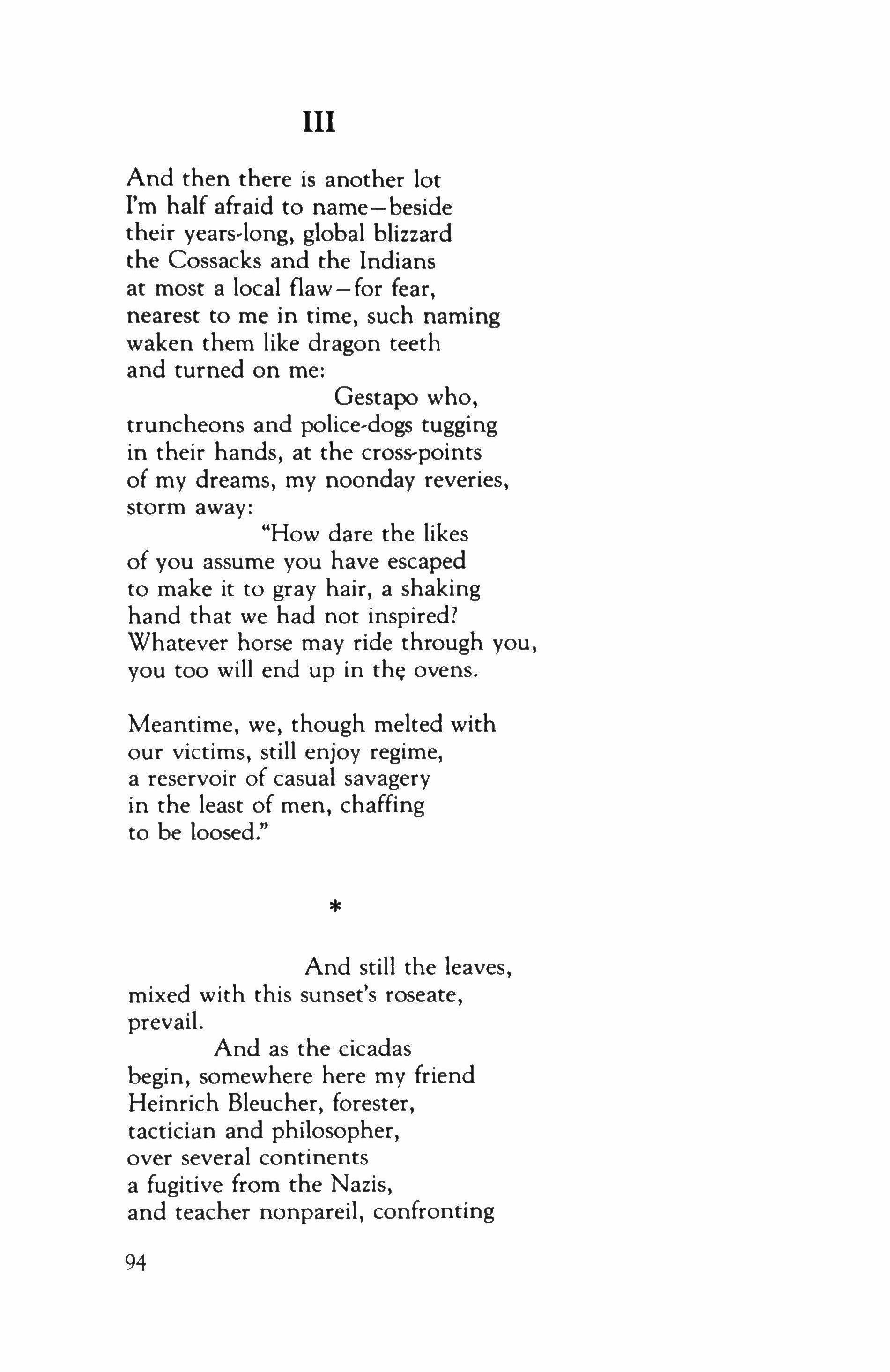
And then there is another lot I'm half afraid to name - beside their years-long, global blizzard the Cossacks and the Indians at most a local flaw - for fear, nearest to me in time, such naming waken them like dragon teeth and turned on me:
Gestapo who, truncheons and police-dogs tugging in their hands, at the cross-points of my dreams, my noonday reveries, storm away:
"How dare the likes of you assume you have escaped to make it to gray hair, a shaking hand that we had not inspired? Whatever horse may ride through you, you too will end up in the ovens.
Meantime, we, though melted with our victims, still enjoy regime, a reservoir of casual savagery in the least of men, chaffing to be loosed." *
And still the leaves, mixed with this sunset's roseate, prevail.
And as the cicadas begin, somewhere here my friend Heinrich Bleucher, forester, tactician and philosopher, over several continents a fugitive from the Nazis, and teacher nonpareil, confronting
III
94
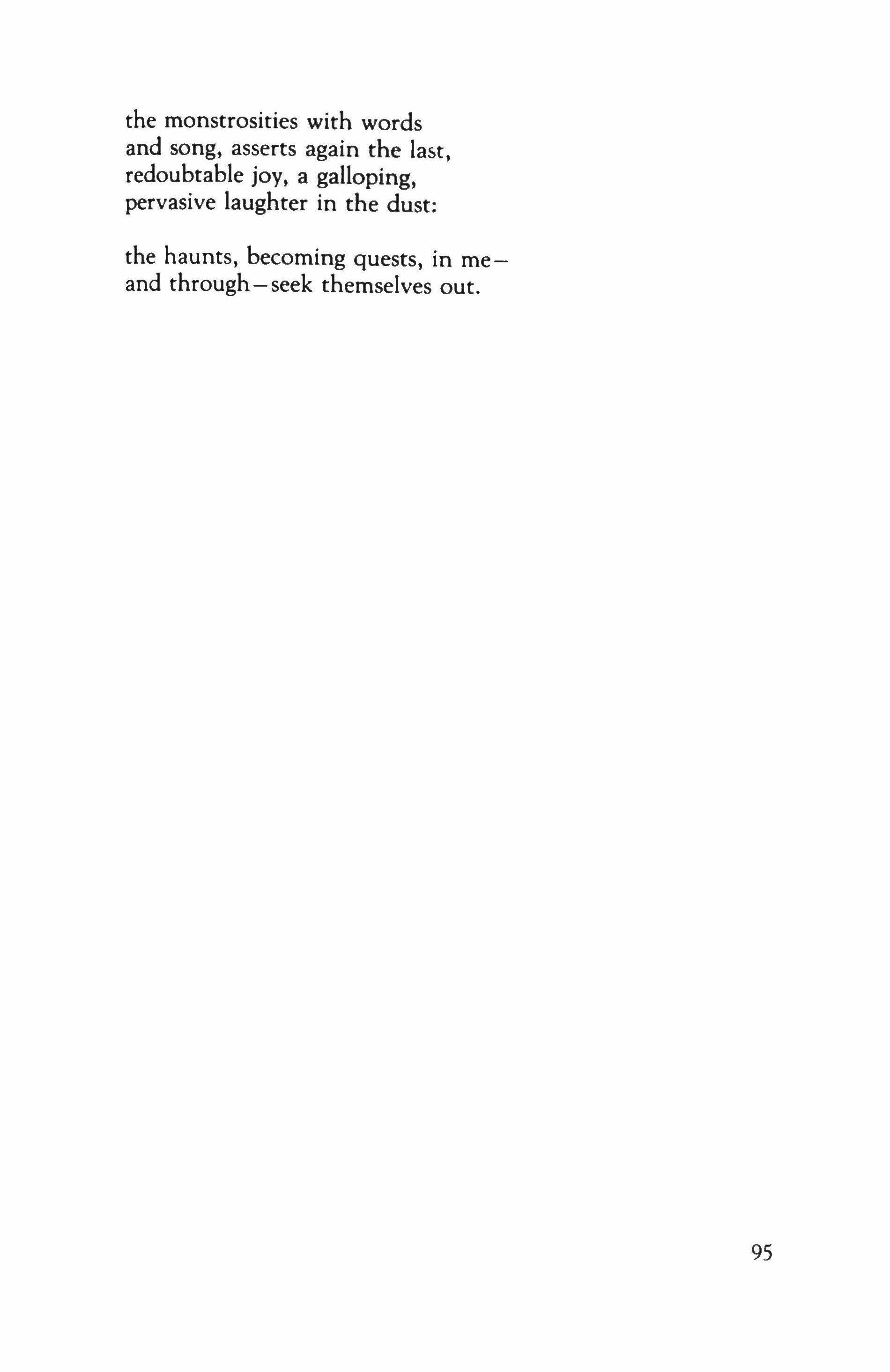
the monstrosities with words and song, asserts again the last, redoubtable joy, a galloping, pervasive laughter in the dust: the haunts, becoming quests, in meand through - seek themselves out.
95
A Voice Speaks in Earnest, but Nobody Listens
Pattiann Rogers
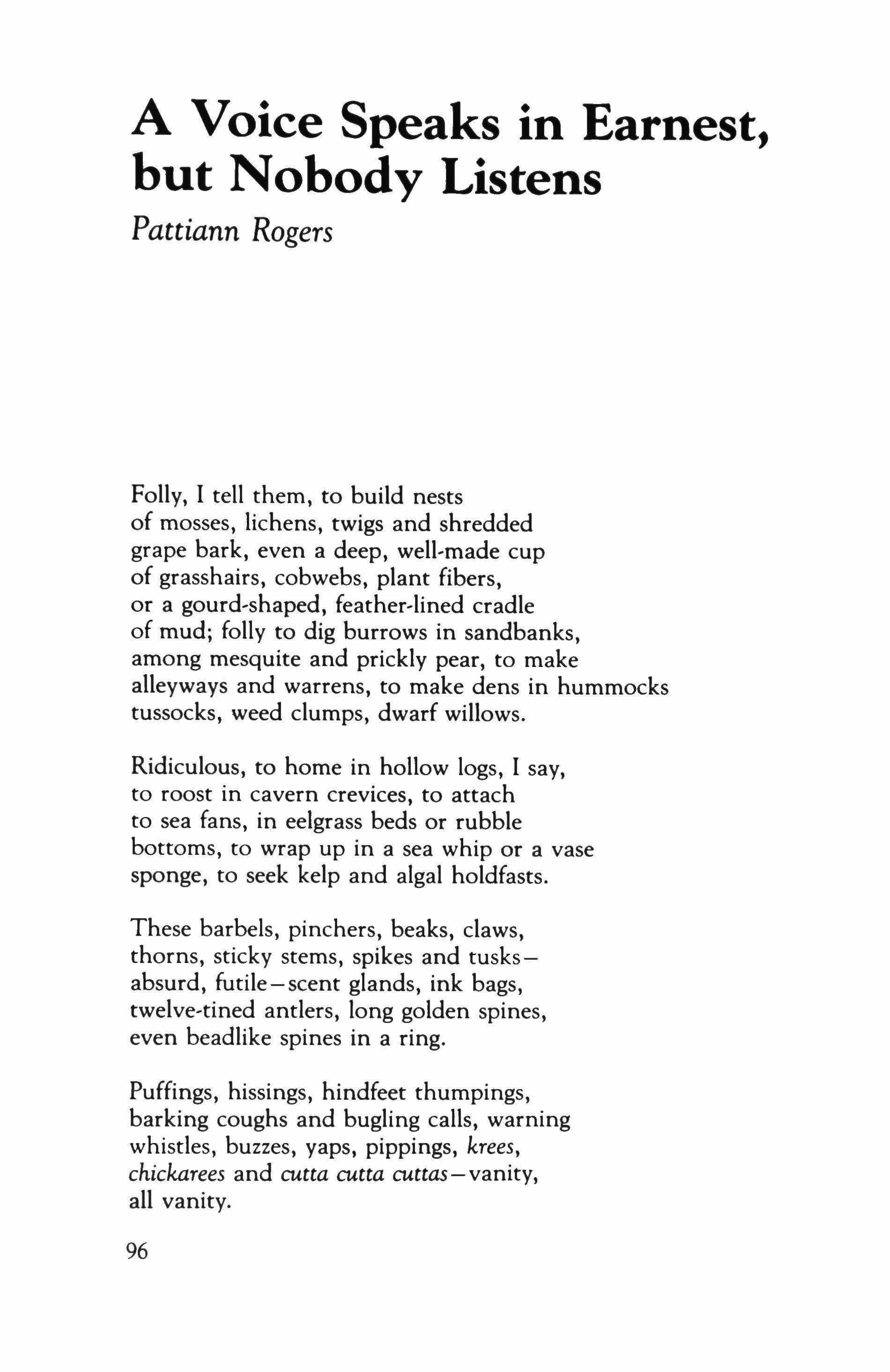
Folly, I tell them, to build nests of mosses, lichens, twigs and shredded grape bark, even a deep, well-made cup of grasshairs, cobwebs, plant fibers, or a gourd-shaped, feather-lined cradle of mud; folly to dig burrows in sandbanks, among mesquite and prickly pear, to make alleyways and warrens, to make dens in hummocks tussocks, weed clumps, dwarf willows.
Ridiculous, to home in hollow logs, I say, to roost in cavern crevices, to attach to sea fans, in eelgrass beds or rubble bottoms, to wrap up in a sea whip or a vase sponge, to seek kelp and algal holdfasts.
These barbels, pinchers, beaks, claws, thorns, sticky stems, spikes and tusksabsurd, futile-scent glands, ink bags, twelve-tined antlers, long golden spines, even beadlike spines in a ring.
Puffings, hissings, hindfeet thumpings, barking coughs and bugling calls, warning whistles, buzzes, yaps, pippings, krees, chickarees and cutta cutta cuttas-vanity, all vanity.
96
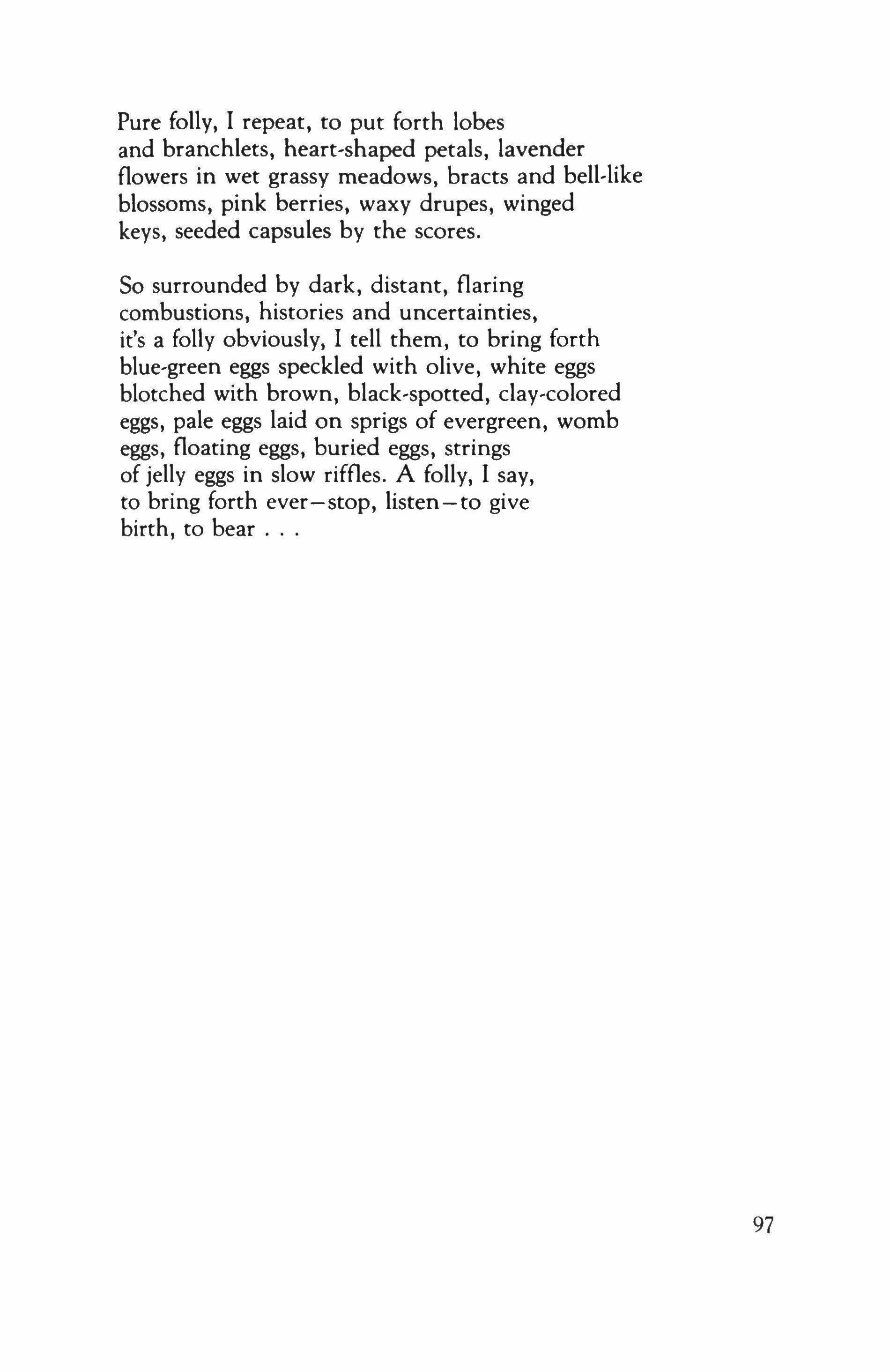
Pure folly, I repeat, to put forth lobes and branchlets, heart-shaped petals, lavender flowers in wet grassy meadows, bracts and bell-like blossoms, pink berries, waxy drupes, winged keys, seeded capsules by the scores.
So surrounded by dark, distant, flaring combustions, histories and uncertainties, it's a folly obviously, I tell them, to bring forth blue-green eggs speckled with olive, white eggs blotched with brown, black-spotted, clay-colored eggs, pale eggs laid on sprigs of evergreen, womb eggs, floating eggs, buried eggs, strings of jelly eggs in slow riffles. A folly, I say, to bring forth ever-stop, listen-to give birth, to bear
97
Two Poems
Christine Garren
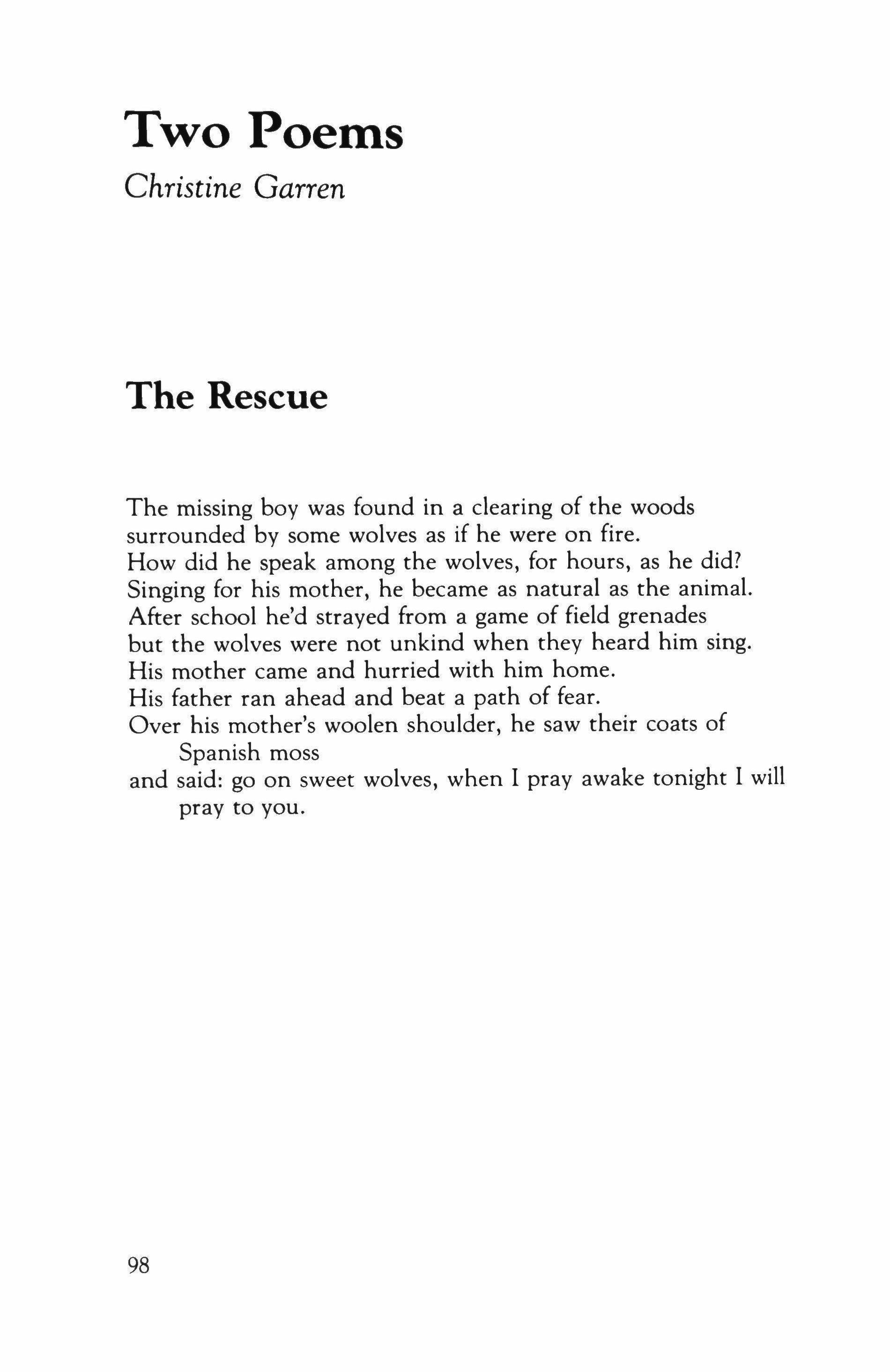
The Rescue
The missing boy was found in a clearing of the woods surrounded by some wolves as if he were on fire. How did he speak among the wolves, for hours, as he did?
Singing for his mother, he became as natural as the animal. After school he'd strayed from a game of field grenades but the wolves were not unkind when they heard him sing. His mother came and hurried with him home. His father ran ahead and beat a path of fear. Over his mother's woolen shoulder, he saw their coats of Spanish moss and said: go on sweet wolves, when I pray awake tonight I will pray to you.
98
Flowers

Gas flames, those dahlias, those and all the crane' and heron-colored flowers blooming on the hill. This house, within the plaster rooms, must be the afterworld where the living have been put away. Because I could not breathe the fragrant air, I almost died last year one day among the flowers' perfumed wreaths. Now I go from room to room dusting the pleats of a vase. Look at life beyond the window's well-cleaned panes. And I believe this is the afterworld until I feel the green of my want for you as you kneel in the garden below, planting the verbena, so fondly I cannot stand it.
99
Four Poems
Kenneth Warren

Of Death by Drowning
It's really sad, Kwame, along these wrinkled waters where swimmers cup their hands to anoint themselves before arching in, that not even your name comes up among those speaking of white sails parting the air above the surface or of bathers lying, almost bare, on the sand, speaking of the bland progress of things: light giving way to light as if we paced the sun (night sealed in the wake of our day-locked ships) unable but to taste the easy brightness on our lips and, thus, no one beseeches your release from a wakeless dark embrace that sunlight's fingers fail to reach
100

but forgive us:
life is here in the shallows near the shore where we can stroll among the creatures shelled and protected, and if we neglect the deeper waters it's only because there no one swims long without sounding those unfathomable depths where words are bent until voices utter silent eloquence
101
Summer Trains
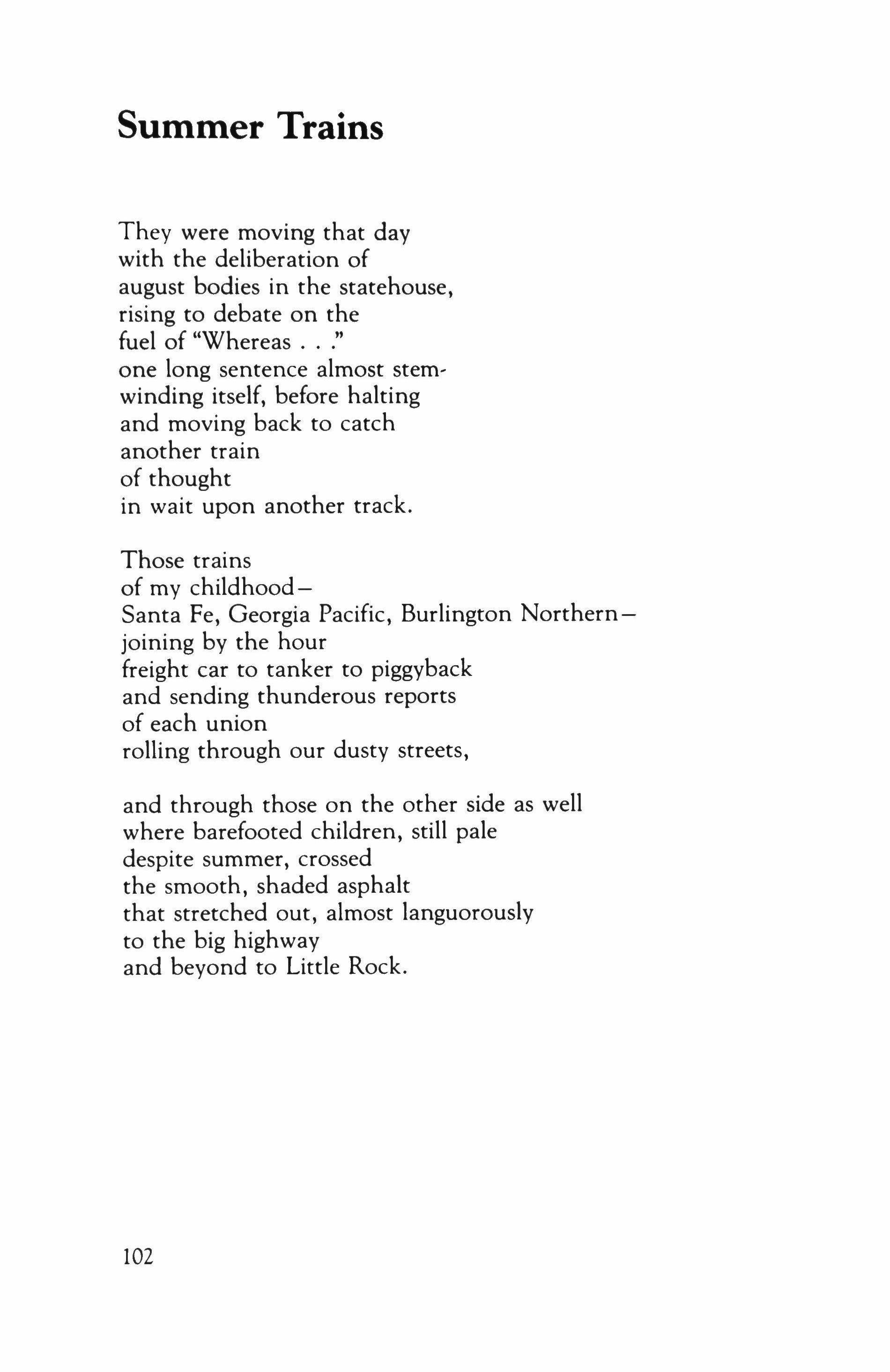
They were moving that day with the deliberation of august bodies in the statehouse, rising to debate on the fuel of "Whereas ." one long sentence almost stemwinding itself, before halting and moving back to catch another train of thought in wait upon another track.
Those trains of my childhoodSanta Fe, Georgia Pacific, Burlington Northernjoining by the hour freight car to tanker to piggyback and sending thunderous reports of each union rolling through our dusty streets, and through those on the other side as well where barefooted children, still pale despite summer, crossed the smooth, shaded asphalt that stretched out, almost languorously to the big highway and beyond to Little Rock.
102
A Spring Heresy

In spring, my eyes are caught by your bare-legged apparition on the lawn near the hedgerows where in your heaven of hair, you could disturb a saint's repose;
see, how the sun's glow off the fountain shimmies and beckons us to sit by the water's edge under no shadow of spirit
so that were a prophet here, like the stiff,hatted man (whose wild eyes roll over you as you near him) handing out printed cards that read "Repent!" even he'd have trouble describing what he meant:
for there are flowers, red flames of roses, birds, blue-winged and black-crested, and then there's winter, bled of all color,
and whether one wears sackcloth and ashes or at daybreak, rests on the delicate rising of breasts, each follows the other-penitent lashes bring the sun no sooner nor stay its course so when the night greedily tongues the evening and blows a husky summons through its lips,
103
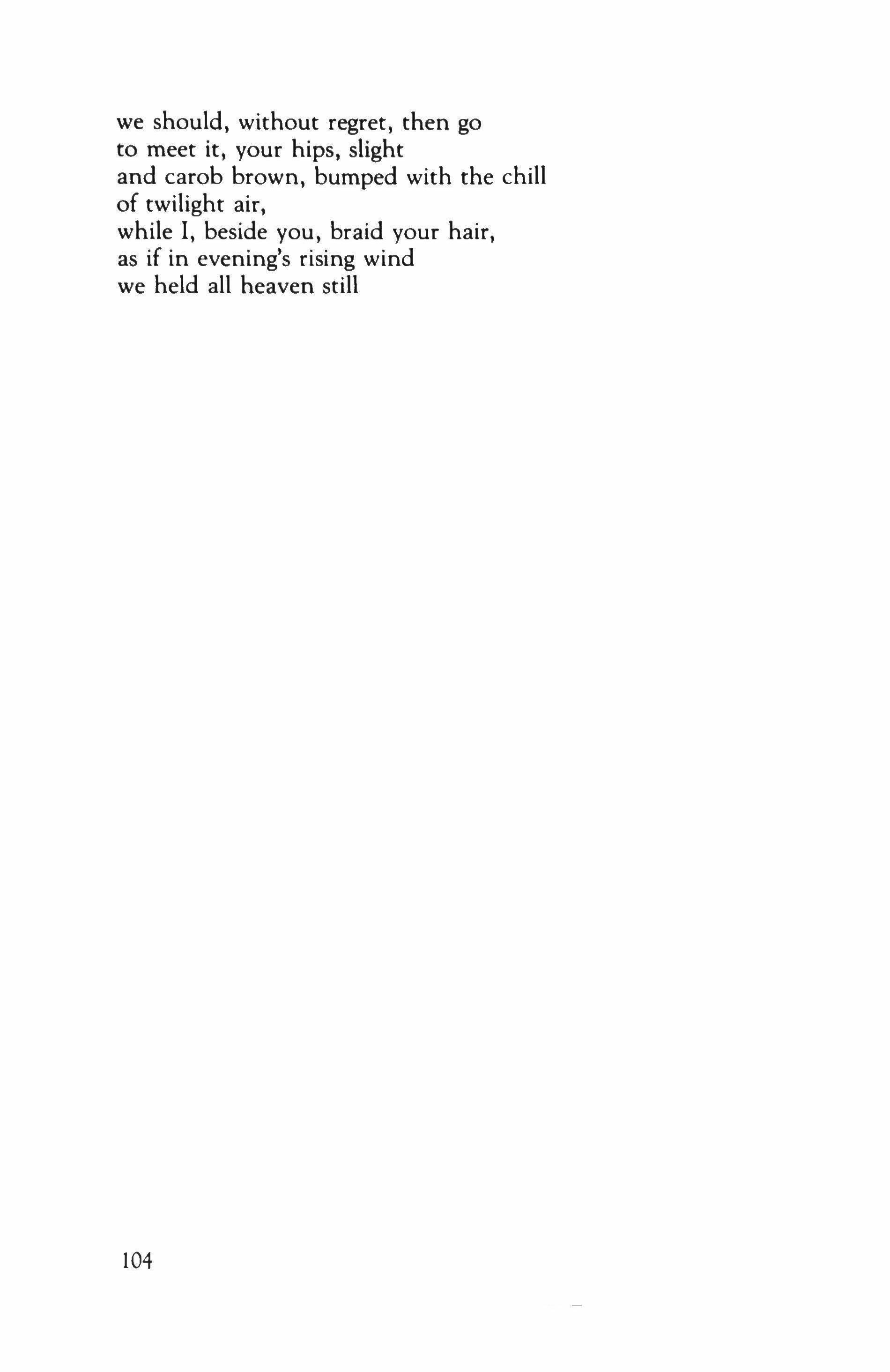
we should, without regret, then go to meet it, your hips, slight and carob brown, bumped with the chill of twilight air, while I, beside you, braid your hair, as if in evening's rising wind we held all heaven still
104
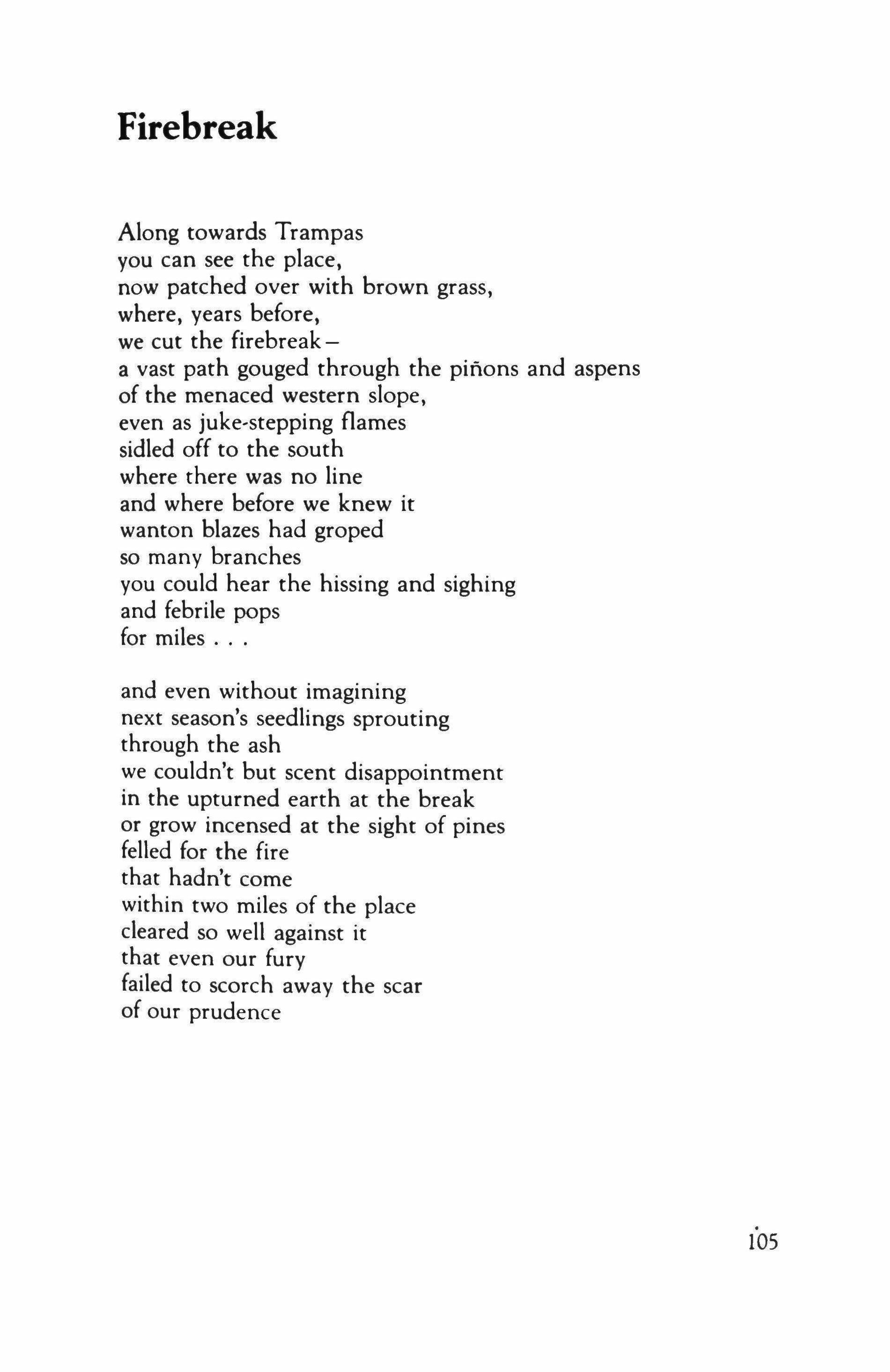
Firebreak
Along towards Trampas
you can see the place, now patched over with brown grass, where, years before, we cut the firebreaka vast path gouged through the pinons and aspens of the menaced western slope, even as juke-stepping flames sidled off to the south where there was no line and where before we knew it wanton blazes had groped so many branches you could hear the hissing and sighing and febrile pops for miles and even without imagining next season's seedlings sprouting through the ash we couldn't but scent disappointment in the upturned earth at the break or grow incensed at the sight of pines felled for the fire that hadn't come within two miles of the place cleared so well against it that even our fury failed to scorch away the scar of our prudence
105
The Other World
Dmitry Bobyshev

for O.S. -B.
From whence no paths return Just stars and stripes forever, the gaudy, catastrophic futureliriodendrons, chipmunks, Hari Krishnas Whole new galaxies in fact complete with mechanical cherubim
And you. Alive amid the alien trash. Otherwise, the funeral went perfectly, right down to the bloodstained bread of last remembrance, yours to offer up in Babylon-your taste and wisdom toowhere everyone is gorged on bread
And forbidden fruit alike. And youyour winked-at "Russian" spirituality reeking of that selfsame bloody breadwhat can you say to these utopians who have resisted at least two dozen "true and apostolic faiths"? And why?
Can you deduce for them a noble motive? Unconditional happiness? Is that it? A one-and-only anything is anathema here. Only variety, change, endless multiplicity
106

have value; and sybaritic comfort is the law. Even their shit is privileged and clean.
Learn from everything. Listen to the shuddering boom of Niagara Falls (a celestial organa mountain of green glass shuddering down) while over the city, lights start coming on, signs offering us even more CONVENIENCES And dusk flares up again like an Aurora Borealis, an icy spray of dazzling, otherworldly color to find us here, my darling. Still alive.
Translated by Michael Van Walleghen
107
Greek Scene
Yannis Ritsos

He dismounted, hitched his horse to the huge mulberry tree, took a leak.
The horse was looking at him. He slapped its neck. "We're young," he said.
The sun was calling out among the osiers. The cicadas were coming on strong.
The fir trees shadow banged against the stones. A huge red sail was flapping above the plane trees.
The horse was twitching its ears, sometimes the one, sometimes the other, while below, two young boatmen were rolling the huge iron barrel along the road.
Translated by Edmund Keeley
108
On Hearing the News That Hitler Was Dead
Jim Barnes
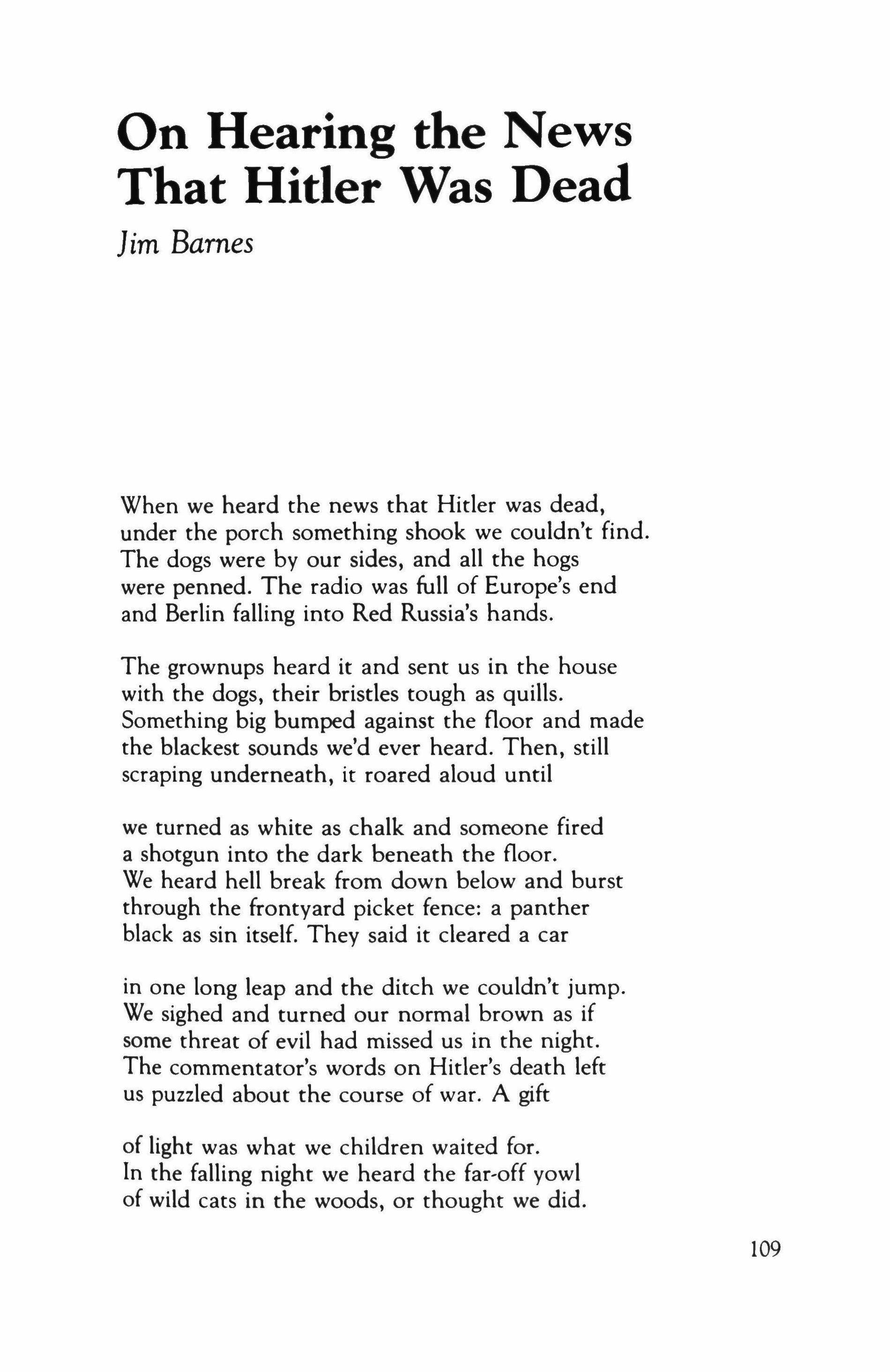
When we heard the news that Hider was dead, under the porch something shook we couldn't find. The dogs were by our sides, and all the hogs were penned. The radio was full of Europe's end and Berlin falling into Red Russia's hands.
The grownups heard it and sent us in the house with the dogs, their bristles tough as quills. Something big bumped against the floor and made the blackest sounds we'd ever heard. Then, still scraping underneath, it roared aloud until
we turned as white as chalk and someone fired a shotgun into the dark beneath the floor. We heard hell break from down below and burst through the frontyard picket fence: a panther black as sin itself. They said it cleared a car
in one long leap and the ditch we couldn't jump. We sighed and turned our normal brown as if some threat of evil had missed us in the night. The commentator's words on Hitler's death left us puzzled about the course of war. A gift of light was what we children waited for. In the falling night we heard the far-off yowl of wild cats in the woods, or thought we did.
109
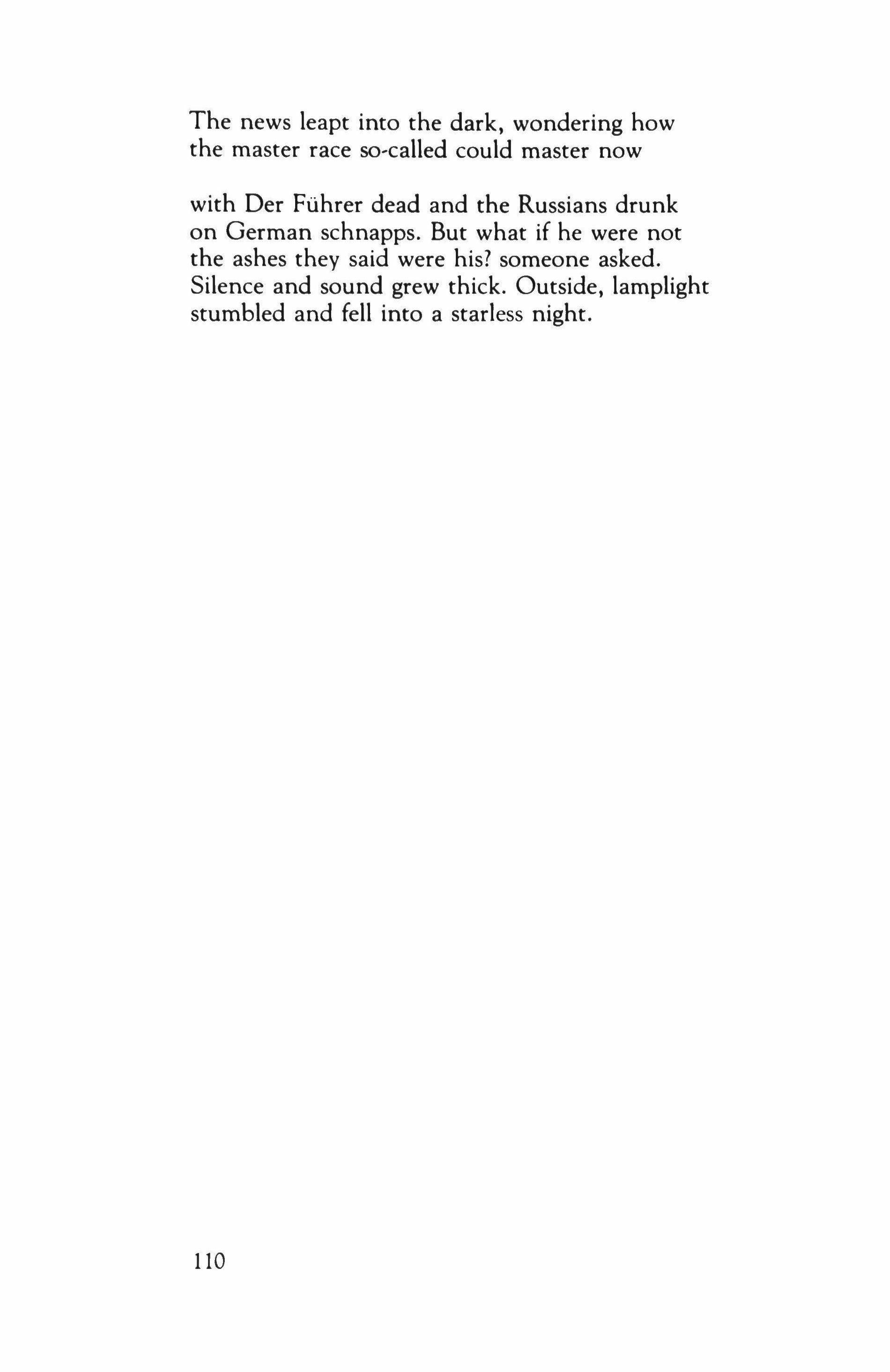
The news leapt into the dark, wondering how the master race so-called could master now
with Der Fuhrer dead and the Russians drunk on German schnapps. But what if he were not the ashes they said were his? someone asked. Silence and sound grew thick. Outside, lamplight stumbled and fell into a starless night.
110
Two Poems
w. s. tx Piero

Karloff and the Rock
for Injun Joe
Weekends, pushed from our living rooms while parents chewed old circumstance, bad luck's rags and rust thrown over a mohair sofa, a gray lampshade, we sat a fitful darkness away. Sandwiches plumbed our coatpockets. The bitter floor sucked at our shoes. You said, Today's a double future, two mummy somethings. A few rows down, girls tucked up their legs in coats; talcum baffled the smell of limes that pulsed unshamed inside their skirts.
We were monkey men. Set loose by love's distress in narrow rooms, we whooped at their white ankle socks, the stiff hair and frowns. You chimp-walked the aisle, fat teeth chittering at the screen, their ankles, yourself. Zinc light twitched above our heads, as it did most nights on low ceilings above all our beds. Khartoum, Karloff, Kekrops, whoever, stirred, cracked cellarway dust from wrappings into a rage of wakefulness.
111
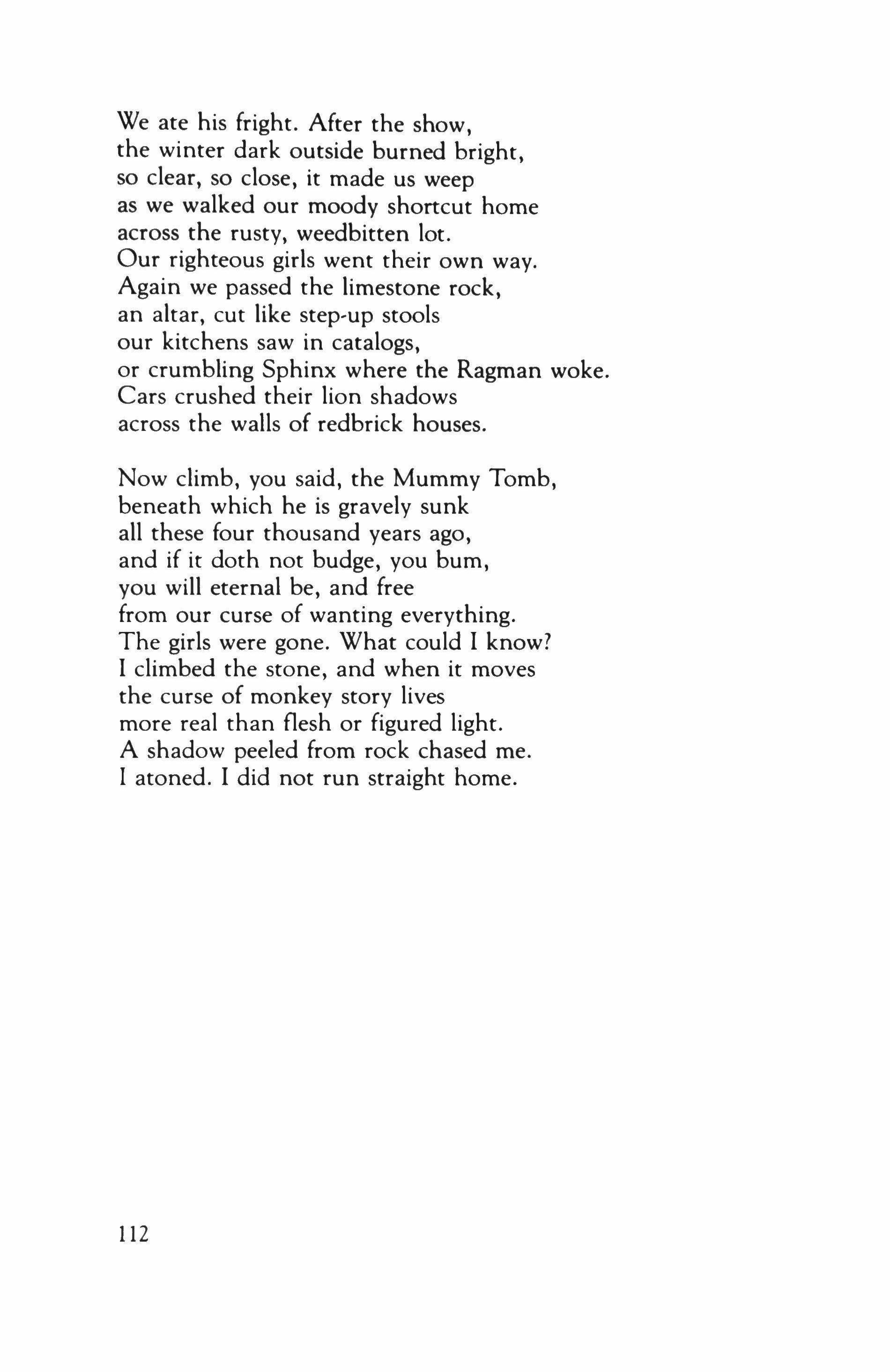
We ate his fright. After the show, the winter dark outside burned bright, so clear, so close, it made us weep as we walked our moody shortcut home across the rusty, weedbitten lot. Our righteous girls went their own way. Again we passed the limestone rock, an altar, cut like step-up stools our kitchens saw in catalogs, or crumbling Sphinx where the Ragman woke. Cars crushed their lion shadows across the walls of redbrick houses.
Now climb, you said, the Mummy Tomb, beneath which he is gravely sunk all these four thousand years ago, and if it doth not budge, you bum, you will eternal be, and free from our curse of wanting everything. The girls were gone. What could I know? I climbed the stone, and when it moves the curse of monkey story lives more real than flesh or figured light. A shadow peeled from rock chased me. I atoned. I did not run straight home.
112
The Mummers

I saw them, two days later, punk parrots strumming banjos on the rooftops, near heaven, glittering ranks stiff in gilt sequins and pancake. They marched off the edge into night-space where phonewires crossed the stars. Sneakers drooped from the starlines.
"Where's the Mayor?" "Who needs him?"
Independence Hall rolls by, buckling in the wind; tassels bang its skirts. Silk tents, weddingcake estates, Betsy Ross's House. No music. "He told his cops to bomb their own town!"
The clowns, ripped and freezing, are strutting down Broad Street. The watchers eating breakfast in high rooms look down. The chickens strut down Broad Street, flasks in their pockets. The high rooms, dreamed up by the dizzy clowns, approve them. The watchers burn cork to daub their children's faces.
The chickens are lilting now from all that cheap rye. The children, in blackface, want fried chicken for lunch. The clowns, ripped, borrowed, correct, saved, dance all the way downtown.
"One club's warehouse went up in flames,
113
costumes, makeup, everything. So they dressed up like Eskimos but that New Year's was the warmest ever."

Saxophones popping frozen spitballs, drowsy double basses, glockenspiels, vapors rising from the scrubboard rant. Below, men sleep in subway tunnels; rats chew their listing cardboard cribs. Where's our new hero of the day?
Someone bangs a Korean into a wall for selling pink carnations on New Year's Day.
When the marchers go off the edge of rooftops, the music doesn't stop inside my head. Winter stops, the subway roars, cracking towers flare behind the roofs. Under me the sidewalk quakes.
114
Two Poems
Bibhu Padhi

Home
Our home is where we are, today, this early morning hour. And we wish it to remain as it is. With white eyes looking at us from every corner; thin legless bodies walking the corridor at night, when we pretend to sleep.
There's always someone else occupying the chair beside mine when I begin to dine, with my children and wife. There're always strange hands, waiting to greet me when I return from outside, graying fingers moving quietly over handwritten pages and sketches, as if to know and rectify my long-past errors.
There're times when we welcome strangers as relations, as if the blood which flowed in their veins spoke to our matching blood in whispers, when we stood or moved among others' companyour bodies as pale and spectral as theirs, eyes nearly lidless, unblinking, staring into things of tomorrow, of next year, into matters that'd end with our century.
115
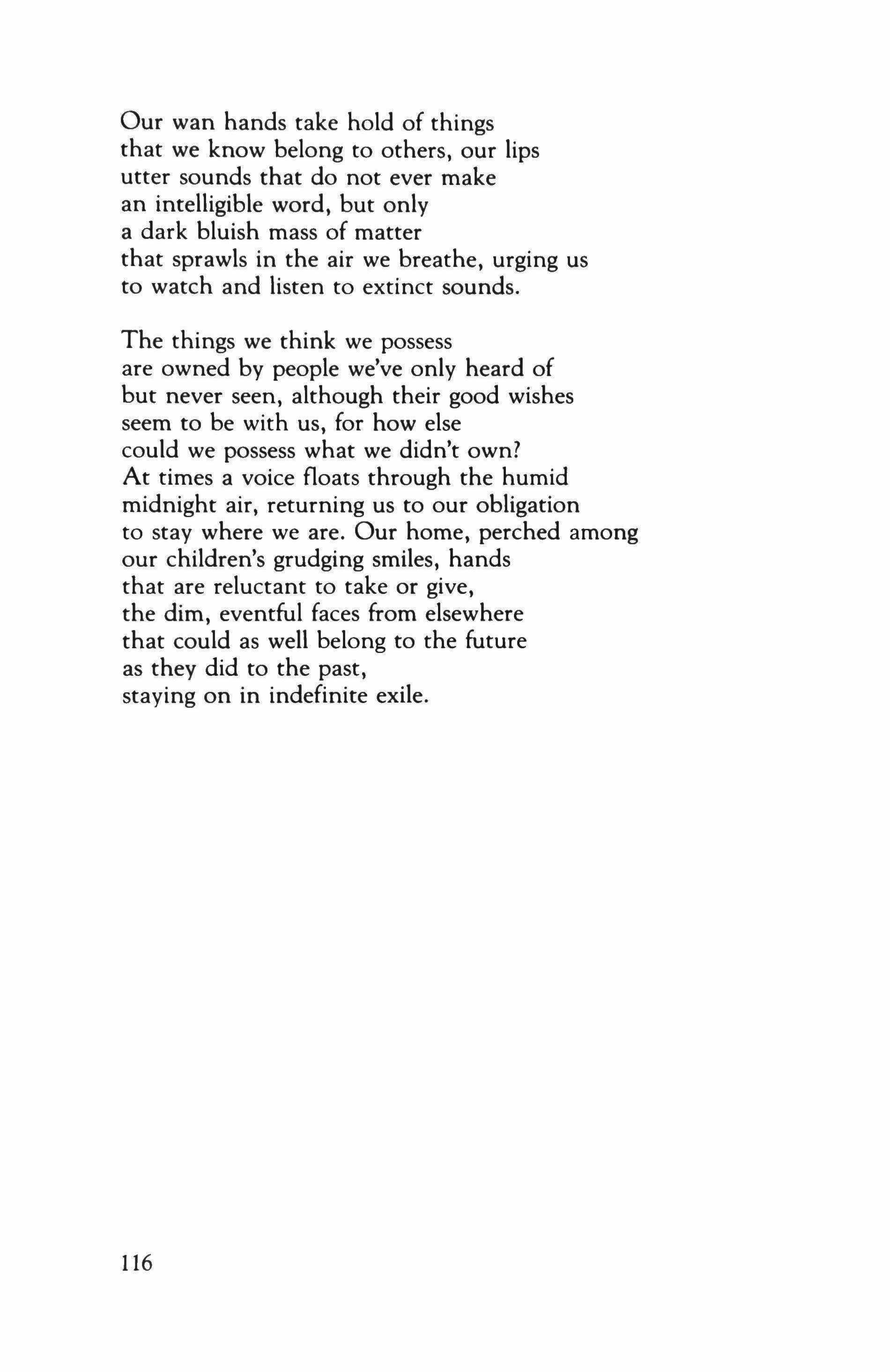
Our wan hands take hold of things that we know belong to others, our lips utter sounds that do not ever make an intelligible word, but only a dark bluish mass of matter that sprawls in the air we breathe, urging us to watch and listen to extinct sounds.
The things we think we possess are owned by people we've only heard of but never seen, although their good wishes seem to be with us, for how else could we possess what we didn't own? At times a voice floats through the humid midnight air, returning us to our obligation to stay where we are. Our home, perched among our children's grudging smiles, hands that are reluctant to take or give, the dim, eventful faces from elsewhere that could as well belong to the future as they did to the past, staying on in indefinite exile.
116
Ceasework

Since it began, the perspectives haven't changed much. The classrooms, quiet as ever, but now empty of their blank faces, show themselves as ideal models of the past.
The blackboards are darker than yesterday, the floors strewn with betel juice, pieces of writing chalk, torn leaflets.
A fear of the present stalks the corridors roughened by intending feet, tempting us to shout with larger voices. But what, in any case, could our words do except claim the mythic peace in the future?
Elsewhere, I imagine, the ministers are discussing the newest ways of raising public taxes, the need of the currency changing hands, among whispers; their words defir:e our needs calculatedly, against the heavy backdrop of industrial development, welfare of the poor.
The poor have remained so since the time our grandfathers dreamt of their homes, land, and wives. I've refused to own any dreams now, having gifted all the dreams away to children with distended stomachs listening to speeches on integration and unity, the country's rich culture.
"Ceasework" is a contemporary Indian word for "to go on strike."
117
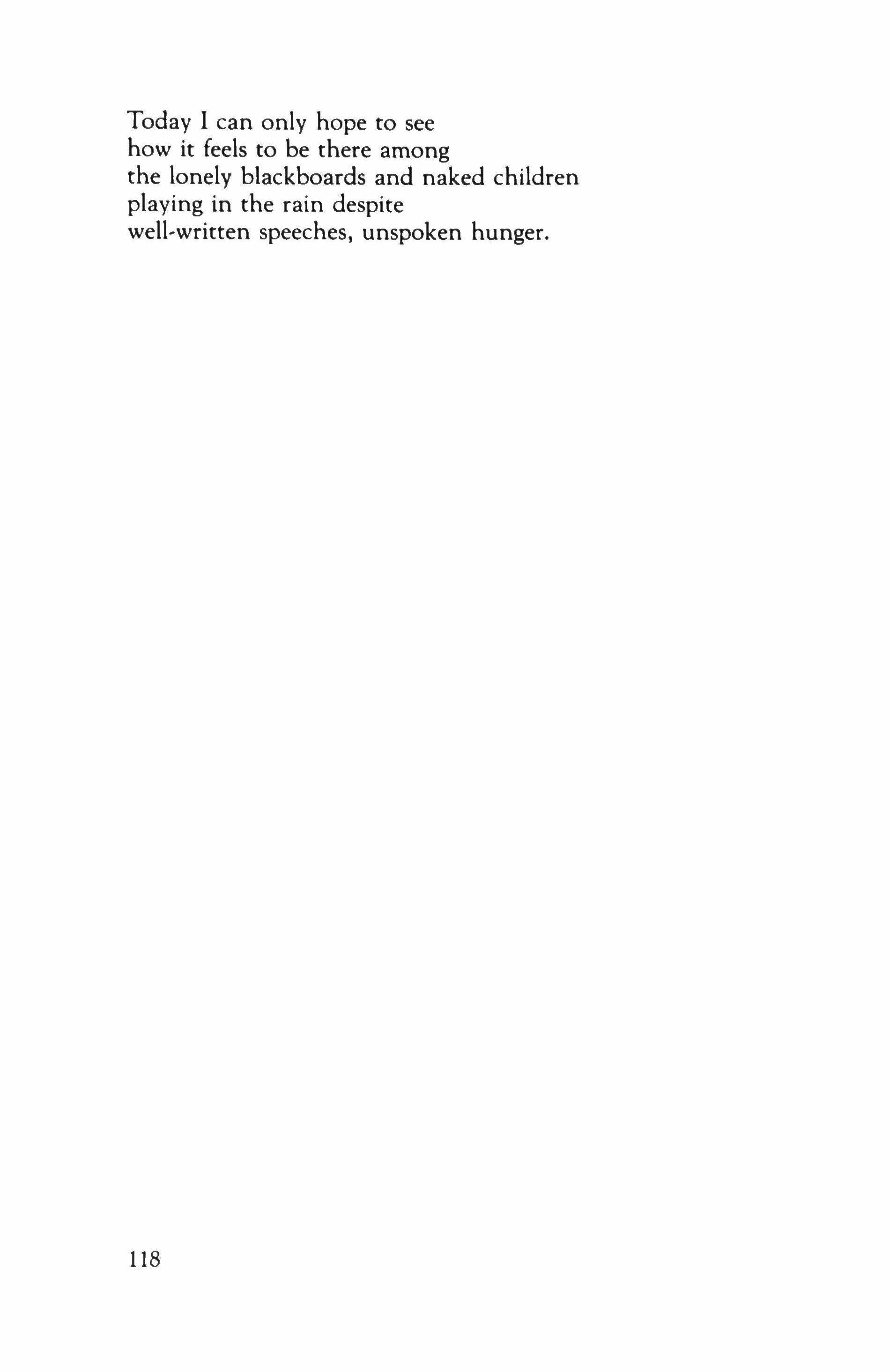
Today I can only hope to see how it feels to be there among the lonely blackboards and naked children playing in the rain despite well,written speeches, unspoken hunger.
118
Two Poems
Cynthia Huntington
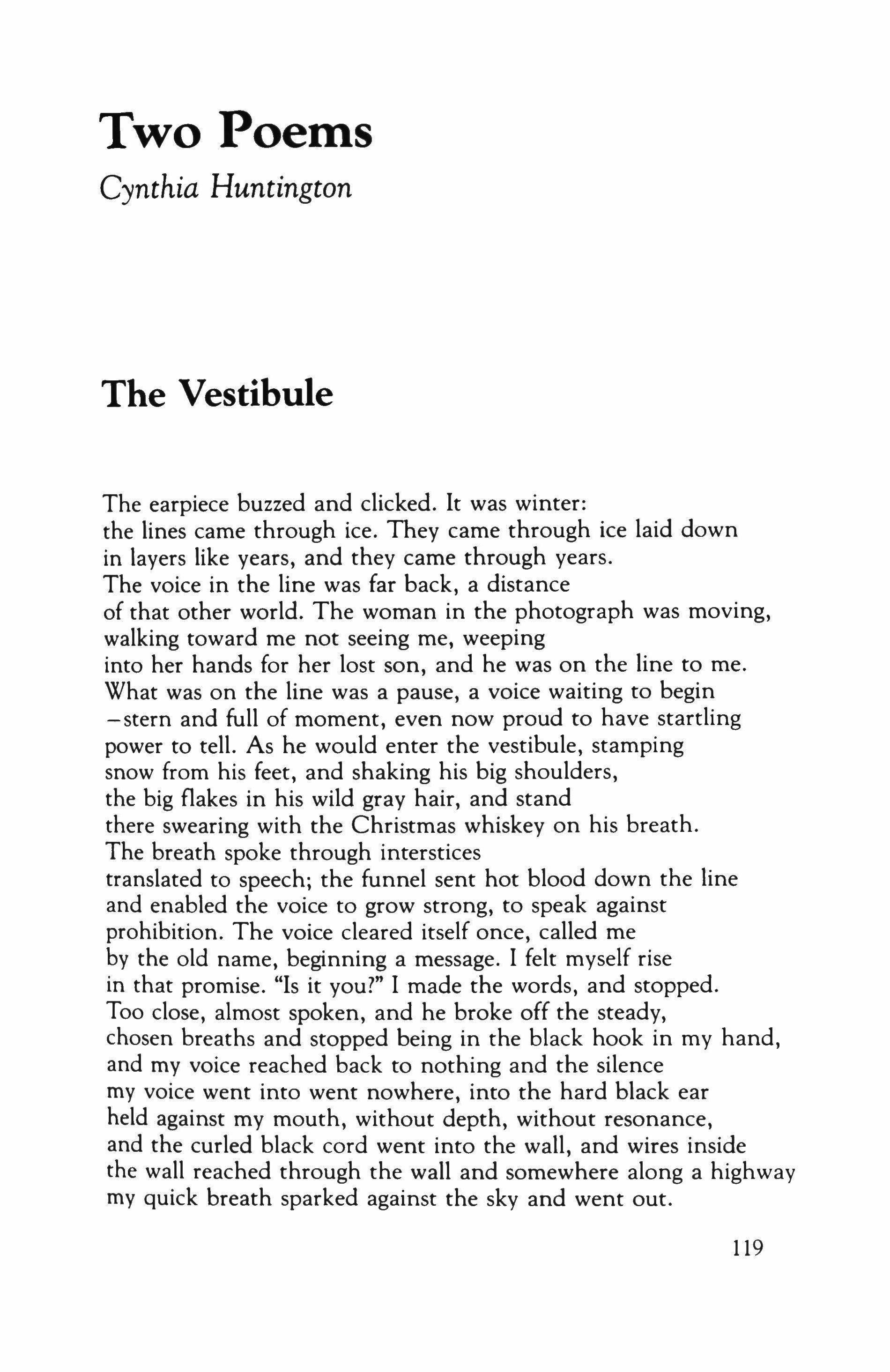
The Vestibule
The earpiece buzzed and clicked. It was winter: the lines came through ice. They came through ice laid down in layers like years, and they came through years. The voice in the line was far back, a distance of that other world. The woman in the photograph was moving, walking toward me not seeing me, weeping into her hands for her lost son, and he was on the line to me. What was on the line was a pause, a voice waiting to begin -stern and full of moment, even now proud to have startling power to tell. As he would enter the vestibule, stamping snow from his feet, and shaking his big shoulders, the big flakes in his wild gray hair, and stand there swearing with the Christmas whiskey on his breath. The breath spoke through interstices translated to speech; the funnel sent hot blood down the line and enabled the voice to grow strong, to speak against prohibition. The voice cleared itself once, called me by the old name, beginning a message. I felt myself rise in that promise. "Is it you?" I made the words, and stopped. Too close, almost spoken, and he broke off the steady, chosen breaths and stopped being in the black hook in my hand, and my voice reached back to nothing and the silence my voice went into went nowhere, into the hard black ear held against my mouth, without depth, without resonance, and the curled black cord went into the wall, and wires inside the wall reached through the wall and somewhere along a highway my quick breath sparked against the sky and went out.
119
No Flowers on Magnolia Street
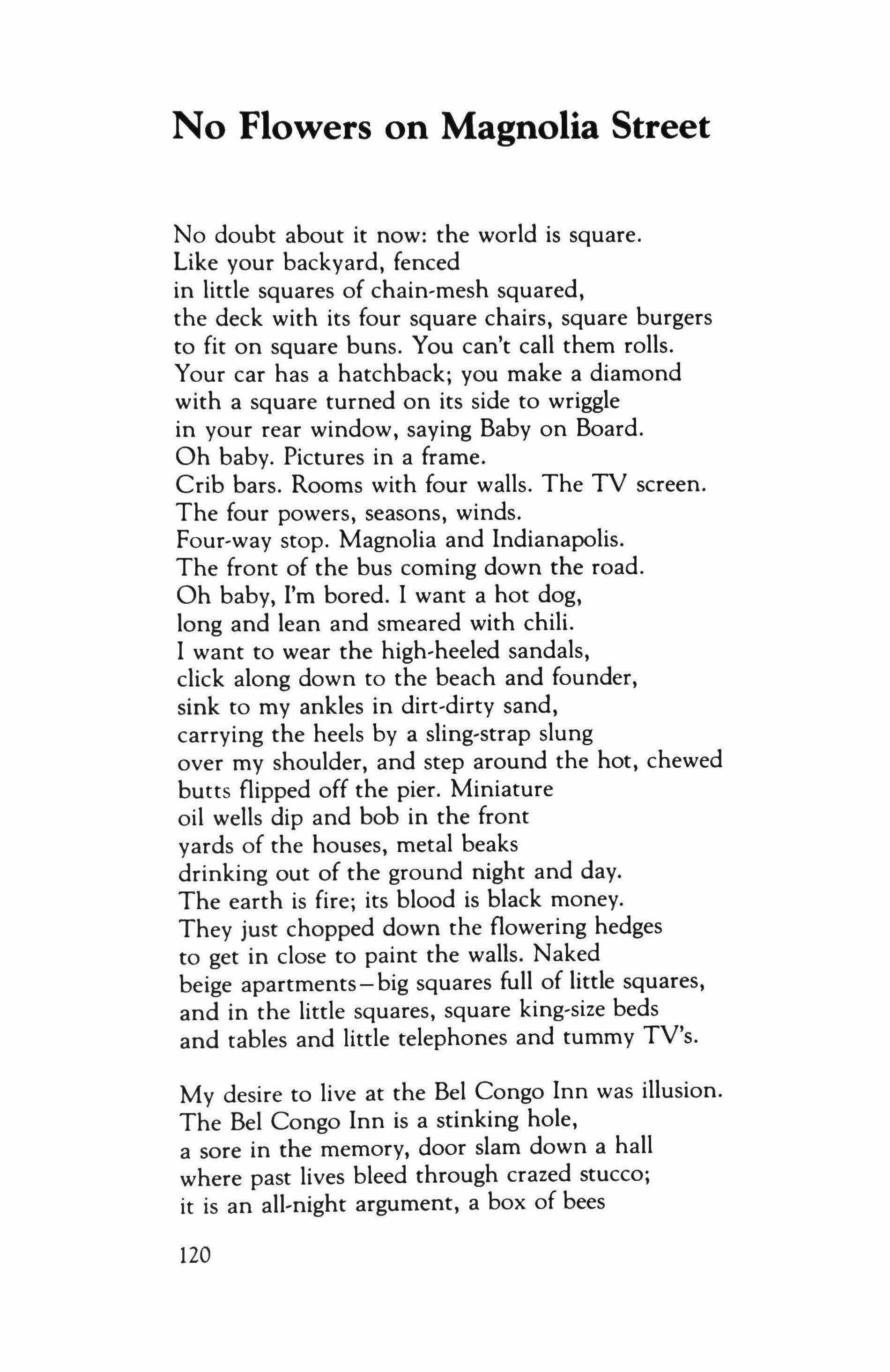
No doubt about it now: the world is square. Like your backyard, fenced in little squares of chain-mesh squared, the deck with its four square chairs, square burgers to fit on square buns. You can't call them rolls. Your car has a hatchback; you make a diamond with a square turned on its side to wriggle in your rear window, saying Baby on Board. Oh baby. Pictures in a frame. Crib bars. Rooms with four walls. The TV screen. The four powers, seasons, winds. Four-way stop. Magnolia and Indianapolis. The front of the bus coming down the road. Oh baby, I'm bored. I want a hot dog, long and lean and smeared with chili. I want to wear the high-heeled sandals, click along down to the beach and founder, sink to my ankles in dirt-dirty sand, carrying the heels by a sling-strap slung over my shoulder, and step around the hot, chewed butts flipped off the pier. Miniature oil wells dip and bob in the front yards of the houses, metal beaks drinking out of the ground night and day. The earth is fire; its blood is black money. They just chopped down the flowering hedges to get in close to paint the walls. Naked beige apartments - big squares full of little squares, and in the little squares, square king-size beds and tables and little telephones and tummy TV's.
My desire to live at the Bel Congo Inn was illusion. The Bel Congo Inn is a stinking hole, a sore in the memory, door slam down a hall where past lives bleed through crazed stucco; it is an all-night argument, a box of bees
120

singing arias inside the air conditioner. The trucks groan past and shake the ice machine, that hums off balance in a painful tone all night. Framed in cane, the jungle prints freeze their manic vegetable scenes and will not overflow with anything like life. I went to the opening; I went to the barbecue; I went to the promotion for medical supplies, the own-your-relationship seminar. The bars on the gates stood up around the pool like steel asparagus. Tiles laid themselves out in rows - how the world loves a cage I thoughtand the water was blue because the tiles were blue, so I helped myself to a work-ethic burger, a hot one, as the Lord helps those who do, and went on.
Down Magnolia where claims of language surround me, facts like hors d'oeuvres, the products of certain small countries displayed on my picnic plate and in plate-glass windows, and voices in overhead wires resounding with gossip of bananas and aerodynamics, voices which do not mean to lie as they repeat: mayonnaise, amnesty, franchise, mission, white russian, forecast, credential, air space. Noon and we stand in the sun looking down into the glass dome at ice skaters circling the cage in little mittens.
Drinking espresso from paper cups, we watch the cars come in, fit themselves between lines at right angles, ease out, other cars replace them, neat and perfectly so
A peacefulness to the passing of bodies through time. Ten minutes to the dime.
A moment it fits, like the photograph from my aunt's vacation when I was ten: it never snows there and the lemon trees grow right in the courtyards by the windows, leaves so shiny as if someone polished them. You can be someone's secretary and it's like paradise,
121

where a woman is single instead of an old maid - and who wants to be double anyway?
You can get a car and your own apartment; you can get a hairdo and have your nails done and buy dividers for your drawers to keep the socks away from the panty hose and the nylon bikini underpants from tangling in the bras. You can buy real estate pretty soon and plant ground cover behind a wall where the sounds of Magnolia Street will be muted. They are the sounds of traffic, they are the language of one hundred thousand lives per hour that idle, beating, burning, turning at Magnolia and Indianapolis at Beach and Atlanta, hesitant at the juncture of Huntington and Hartford, making right turns and left turns, not getting lost, going straight to where they are going and back again.
The most beautiful building in town is the three-story steel engine that is melting down matter to spirit; its fires crack the black molecules of oil to make them yield their force. A block long and three blocks wide, it is green, like the color of rotten lettuce, and has a phosphor glow of bacterial decay, lit up at night by little bulbs along the tank-like walls where the spidery ladders run up and down. It toils night and day to undo this creation.
122
Four Poems
Linda McCarriston
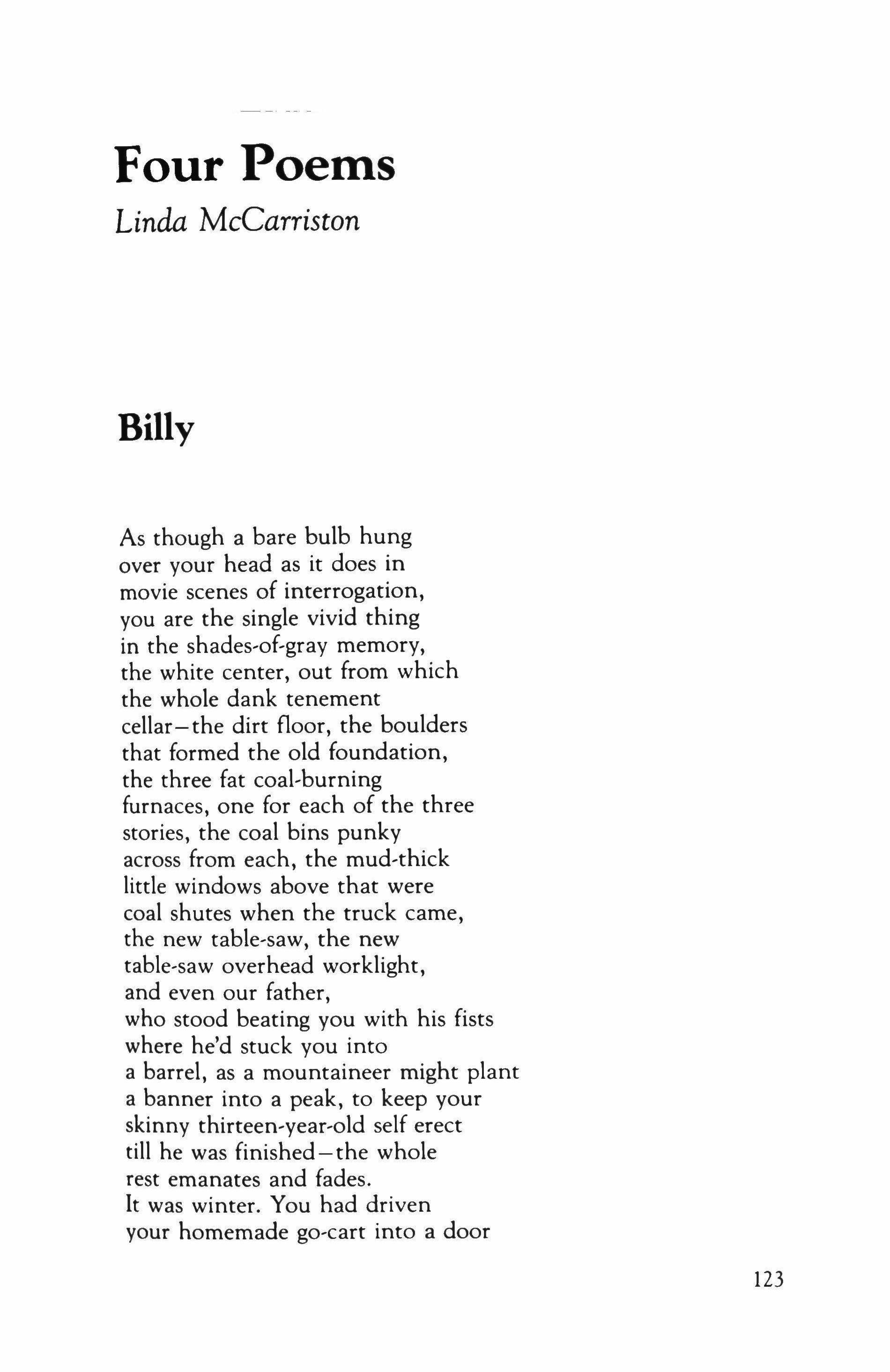
Billy
As though a bare bulb hung over your head as it does in movie scenes of interrogation, you are the single vivid thing in the shades-of-gray memory, the white center, out from which the whole dank tenement cellar-the dirt floor, the boulders that formed the old foundation, the three fat coal-burning furnaces, one for each of the three stories, the coal bins punky across from each, the mud-thick little windows above that were coal shutes when the truck came, the new table-saw, the new table-saw overhead worklight, and even our father, who stood beating you with his fists where he'd stuck you into a barrel, as a mountaineer might plant a banner into a peak, to keep your skinny thirteen-year-old self erect till he was finished-the whole rest emanates and fades. It was winter. You had driven your homemade go-cart into a door
123
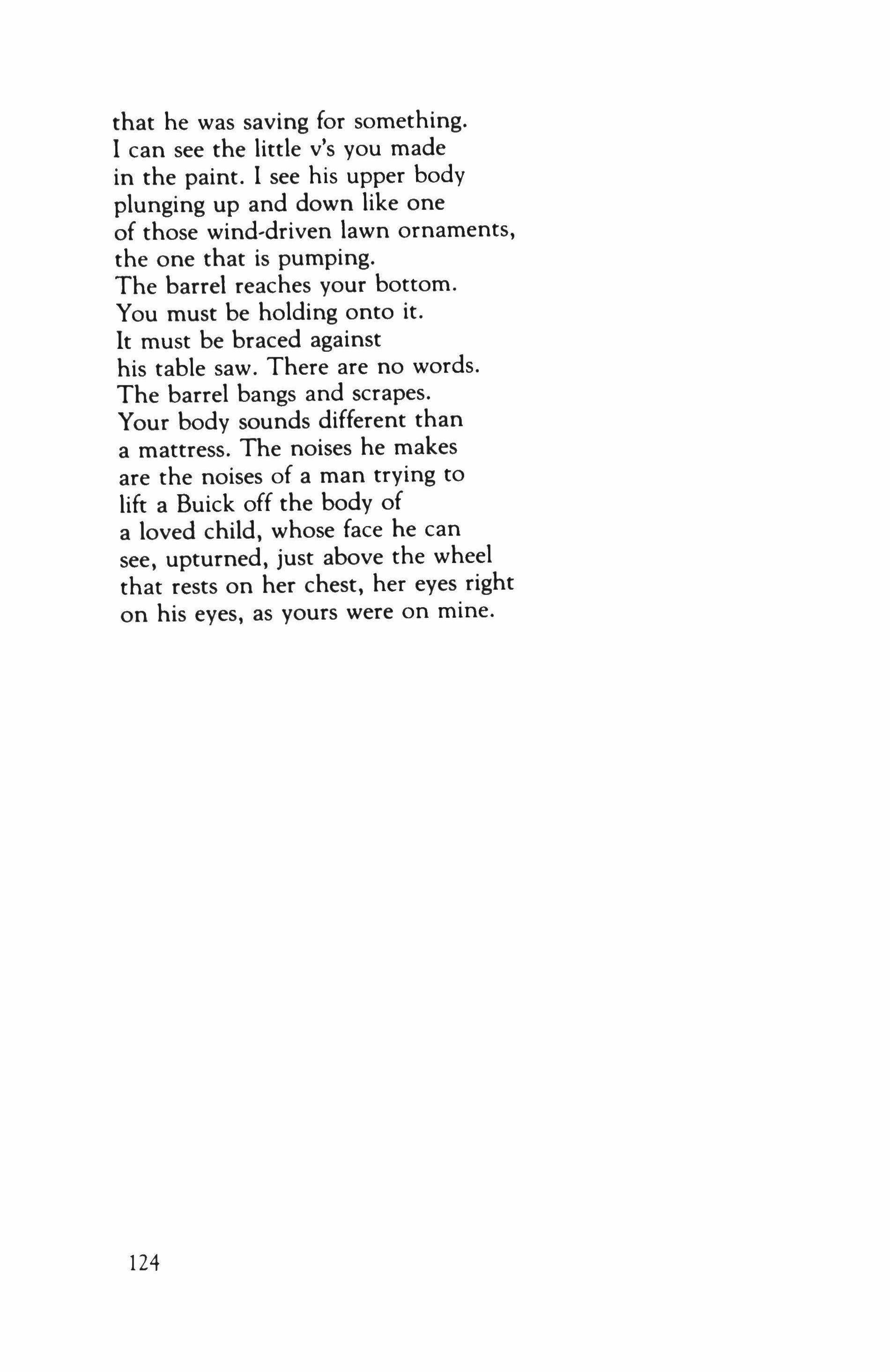
that he was saving for something. 1 can see the little v's you made in the paint. I see his upper body plunging up and down like one of those wind-driven lawn ornaments, the one that is pumping. The barrel reaches your bottom. You must be holding onto it. It must be braced against his table saw. There are no words. The barrel bangs and scrapes. Your body sounds different than a mattress. The noises he makes are the noises of a man trying to lift a Buick off the body of a loved child, whose face he can see, upturned, just above the wheel that rests on her chest, her eyes right on his eyes, as yours were on mine.
124
My Mother's Chair: 1956

One foot tucked under like a nesting bird, night after night she sat in the platform rocker, her eyes on something I could not see -her black, Indian, Scorpio eyeson no object in the air of the material room. She rocked like a man rowing his loved children out of harm's way, out of the path of the ocean tanker that bore down on them out of the fog where he'd drifted by mistake in the little loving rowboat of his life. With the muscles of her arms she rowed she rocked in that chair going nowhere, getting out of nothing's way with the muscles of her thighs, with her jaw, with her shoulders. From the kitchen I could watch her be a piston staying put in the stanchion of her life with the muscles of her back with her hands clamped on the arms of the rocker as though by strength she could turn it to a wheeland steer-or the reins to a wagon that she might take up and slap on the backs of the horses. As a child beats a stick on the cage of an animal, so a certain world was playing on her soul. I stood out of sight who was too small to leave behind who was too big to carry. With the muscles of her neck with the muscles of her chest she plunged against the leg-trap that must have been under her. The black telephone,
125

exquisite as a photo postcard on its own small table, could listen to her rocket, could hear the chair threaten to soar. She never lifted the receiver. She never asked the black wire to take her where it could, having already traveled -a pilgrim, on foot-to that priest, to that judge, to that doctor.
126
My Father's Laughter

When the old fracture aches in my spine after waitressing, after mucking out stalls, when the changed bone throbs-a transmitterI hear my father's laugh, a hearty Irish laugh, laughter that might have been put to good use, might have been one of those loving father-laughs that men make over their daughters, say, when the daughter drops the ball.
The ball in my back sticks out to the naked eye, is a fist when I lie on the cool floor, a stone between me and the wood. It is the place I hang from, like the woman on the hook in the Wax Dungeon of
Madame Tussaud: at the pubis it enters her belly and emerges in the nave of her ribcage. From it
127

she dangles supine, her eyes in yours, alive in that instant. Hourly in my body it is that spot that hooks me
to the past, that pain that looses my father's laughter, my father whose laughter you loved in the ginmills - he brought me along. I sat there, remember?my father who when he took his daughter home would kick her in his wingtips-she was nine and naughtyaround the floor until her eyes closed. So I do not recall how that part of those beatings ended, but I remember curling up as a dog would, cornered by such a man, thinking it through with that part of my nine-year-old mind that thought like a dog and gave him my spine.
128
Tippet
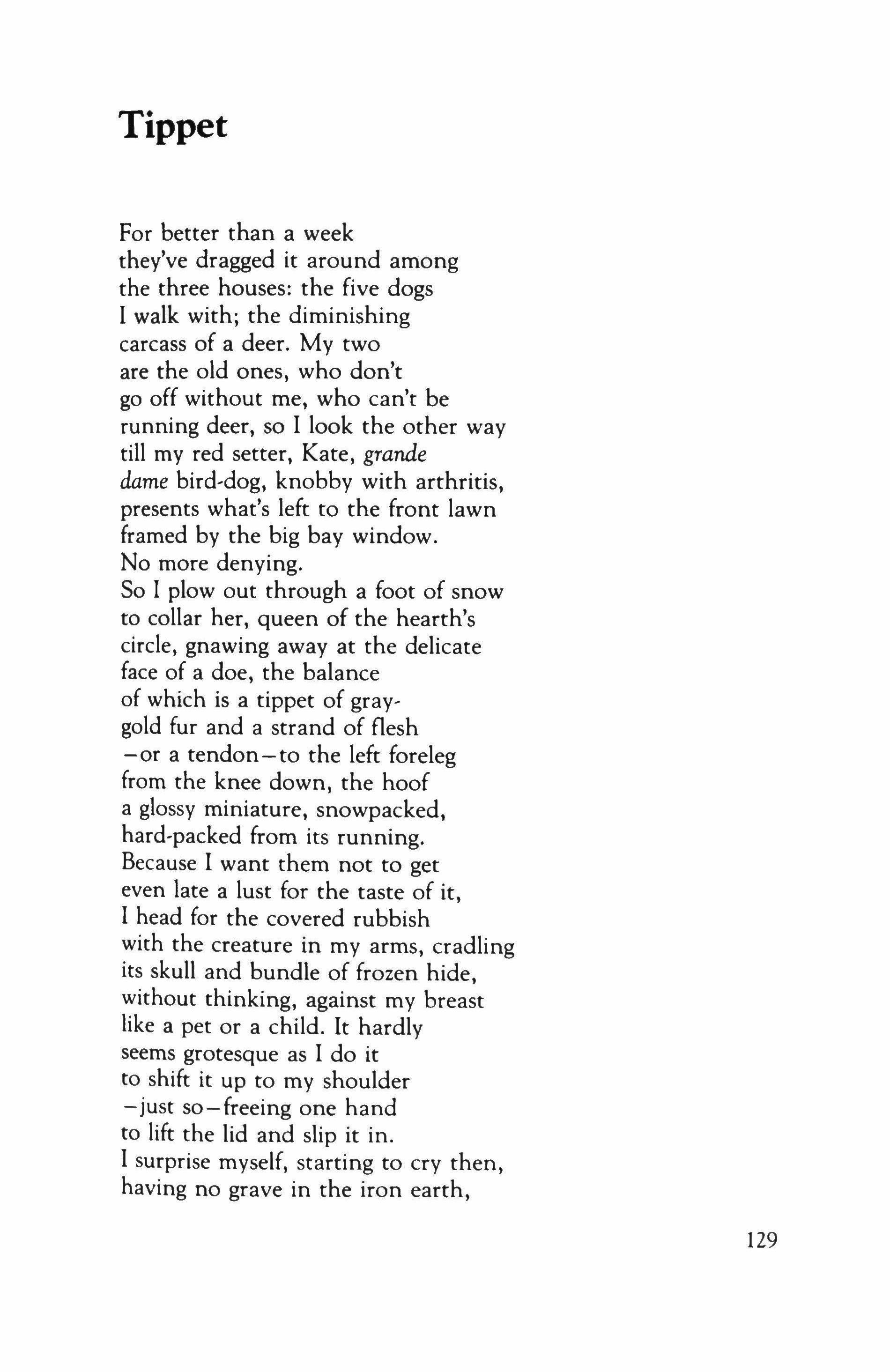
For better than a week they've dragged it around among the three houses: the five dogs I walk with; the diminishing carcass of a deer. My two are the old ones, who don't go off without me, who can't be running deer, so I look the other way till my red setter, Kate, grande dame bird-dog, knobby with arthritis, presents what's left to the front lawn framed by the big bay window. No more denying. So I plow out through a foot of snow to collar her, queen of the hearth's circle, gnawing away at the delicate face of a doe, the balance of which is a tippet of gray, gold fur and a strand of flesh -or a tendon-to the left foreleg from the knee down, the hoof a glossy miniature, snowpacked, hard-packed from its running. Because I want them not to get even late a lust for the taste of it, I head for the covered rubbish with the creature in my arms, cradling its skull and bundle of frozen hide, without thinking, against my breast like a pet or a child. It hardly seems grotesque as I do it to shift it up to my shoulder -just so-freeing one hand to lift the lid and slip it in. I surprise myself, starting to cry then, having no grave in the iron earth,
129
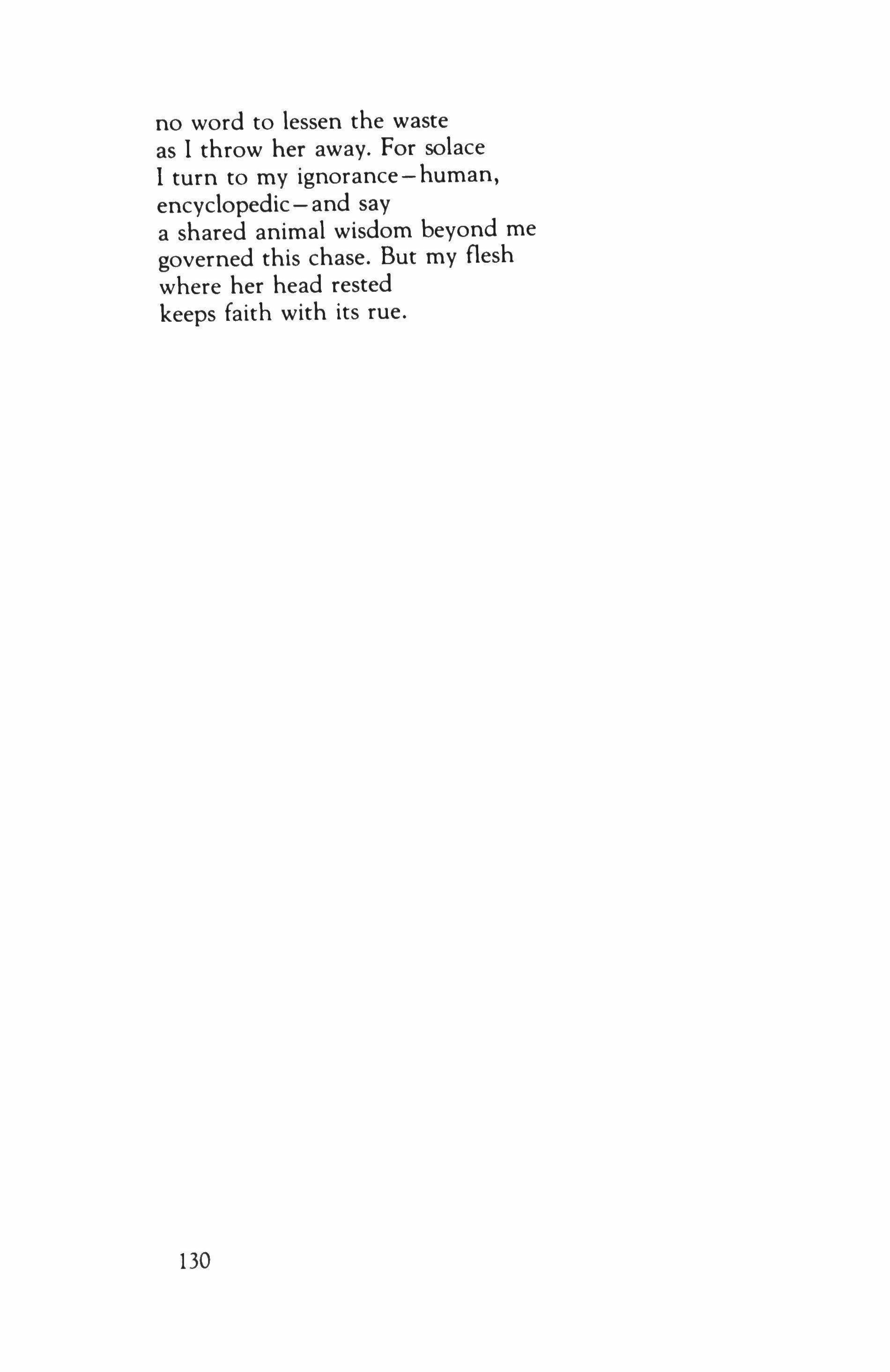
no word to lessen the waste as I throw her away. For solace I turn to my ignorance - human, encyclopedic - and say a shared animal wisdom beyond me governed this chase. But my flesh where her head rested keeps faith with its rue.
130
Short Foray
Eleanor Ross Taylor
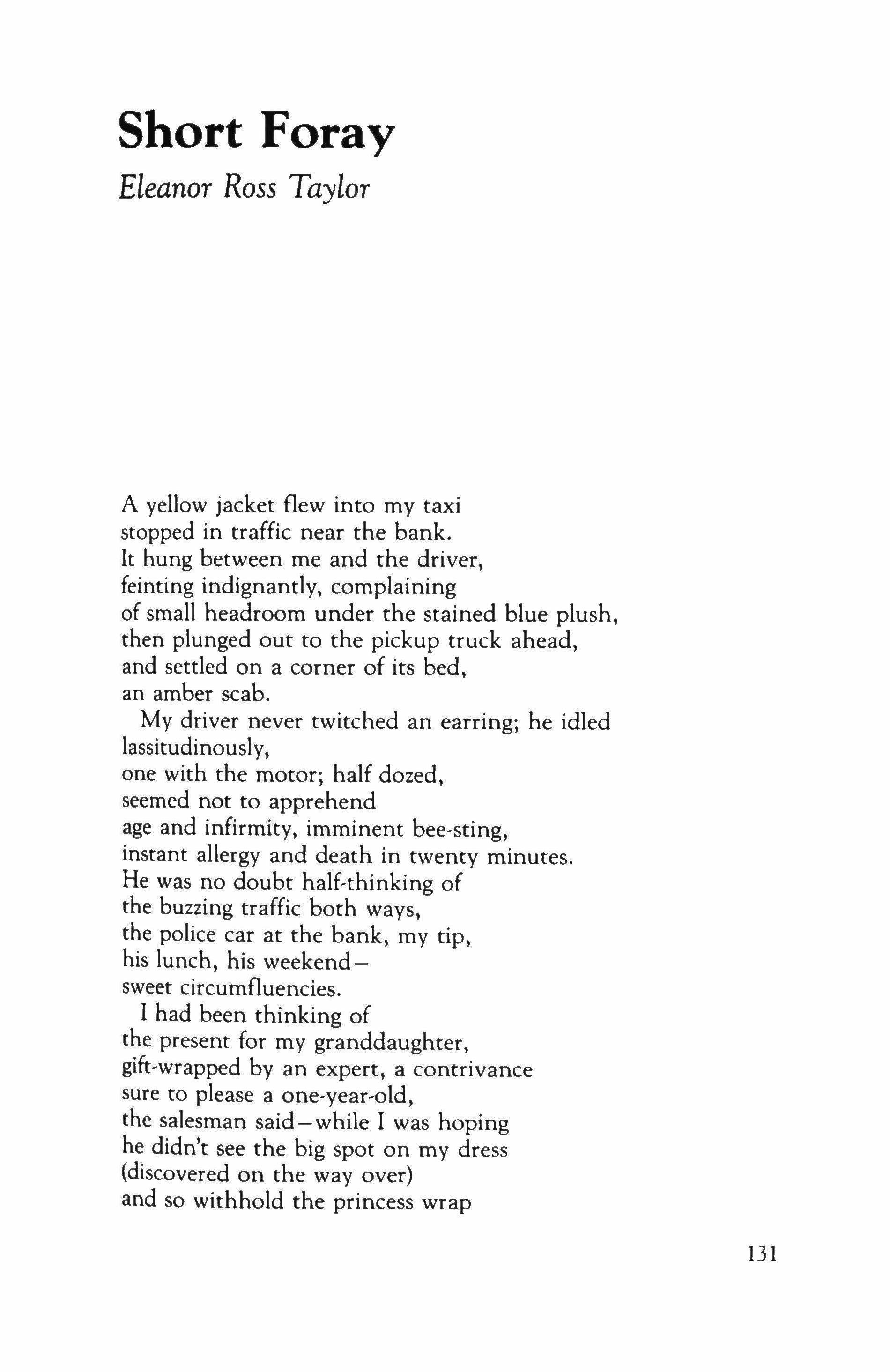
A yellow jacket flew into my taxi stopped in traffic near the bank. It hung between me and the driver, feinting indignantly, complaining of small headroom under the stained blue plush, then plunged out to the pickup truck ahead, and settled on a corner of its bed, an amber scab.
My driver never twitched an earring; he idled lassitudinously, one with the motor; half dozed, seemed not to apprehend age and infirmity, imminent bee-sting, instant allergy and death in twenty minutes. He was no doubt half-thinking of the buzzing traffic both ways, the police car at the bank, my tip, his lunch, his weekendsweet circumfluencies.
I had been thinking of the present for my granddaughter, gift-wrapped by an expert, a contrivance sure to please a one-year-old, the salesman said-while I was hoping he didn't see the big spot on my dress (discovered on the way over) and so withhold the princess wrap
131

from a blind old lady and unknowing baby. Naturally one doesn't remember being onewhat one liked then, if one knew thennot even what one's child likedwas she ever one? - She likes new knaveries: lentil pilaf, home videos, CD recordings. I didn't say a word about the bee, or coffee stain, or what I thought. When we moved on I lost the yellow jacket, lost whether he kept clinging to the truck, went to the bank, or soared off over us. No clue to what he meant, rushing my taxi. Did he know it was October, bees-up time, and take this warm day for a last rich look at the boundaries of things, a day of stinging a boundary or two if he felt like it, playing time bomb? Did he smell wild asters somewhere in a ditch? Or did he just ride in to town on that pickup and mean to go home on it?
132
Two Poems
Debra Nystrom
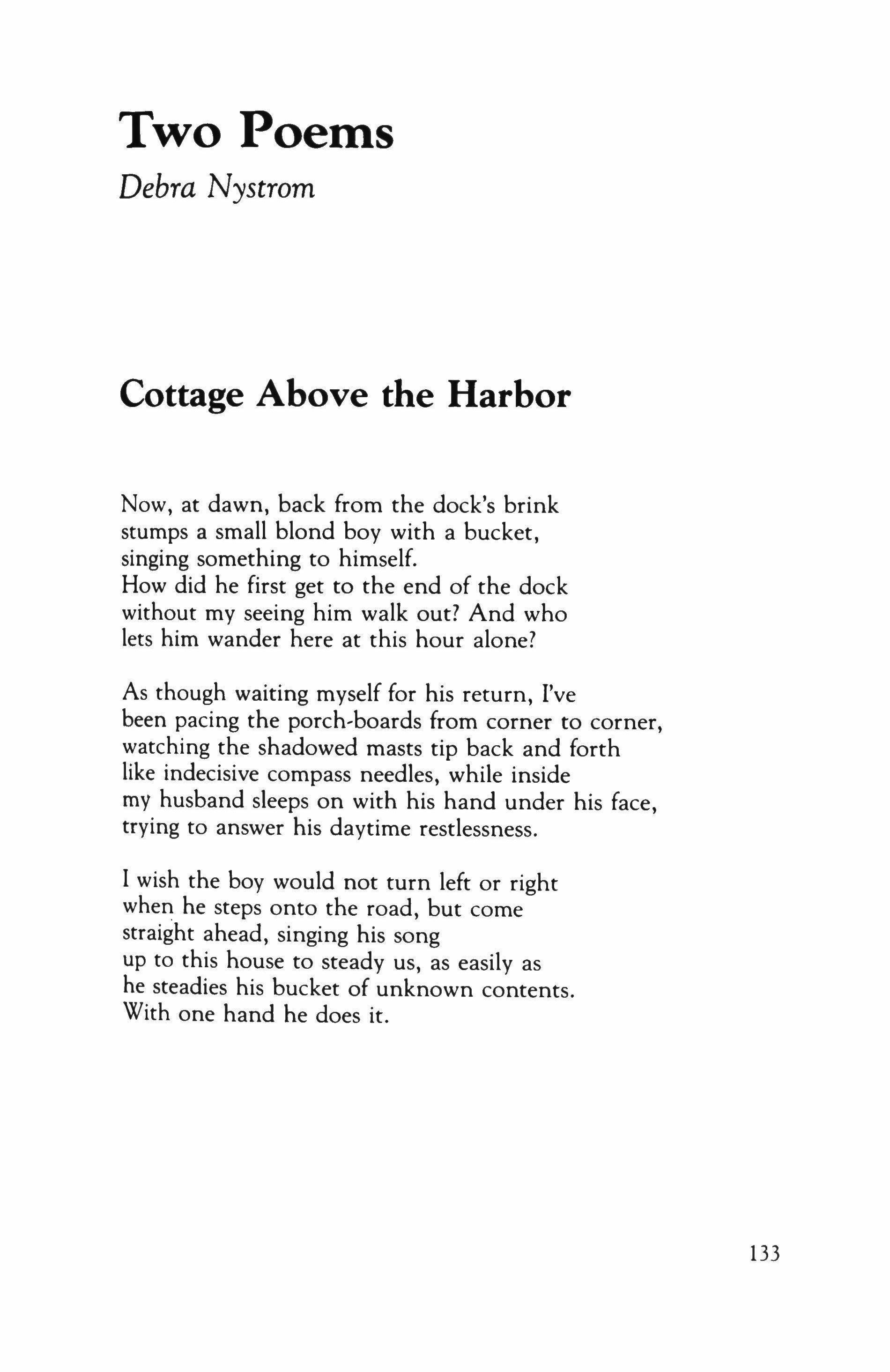
Cottage Above the Harbor
Now, at dawn, back from the dock's brink stumps a small blond boy with a bucket, singing something to himself. How did he first get to the end of the dock without my seeing him walk out? And who lets him wander here at this hour alone?
As though waiting myself for his return, I've been pacing the porch-boards from corner to corner, watching the shadowed masts tip back and forth like indecisive compass needles, while inside my husband sleeps on with his hand under his face, trying to answer his daytime restlessness.
I wish the boy would not turn left or right when he steps onto the road, but come straight ahead, singing his song up to this house to steady us, as easily as he steadies his bucket of unknown contents. With one hand he does it.
133
January Half-Light

Sunless, shadowless dream-time, ironing shirts by the window, listening to the stereo play again
"My Foolish Heart" in Bill Evans's drawn-our, plaintive alteration that makes the notes mean
for once what they always wanted to. Across the valley that I watched you trudge down early in the afternoon
parasol pines sway as if the glassy sky were almost water-density, like half-lit smoke in a jazz club where people across the room seem to move weightlessly, lifted and tipped by old mute wishes
the music returns them to. The piano drifts, dips; the drums tump on their own for a bit; someone
steps in from the forgotten cold and stamps his boots. Steam rises as I lift the iron and set it
on its end in sudden quiet, turning to see if it's you there again, in your damp coat.
134
Five Translations from the Tocsik
Ruth Molloy
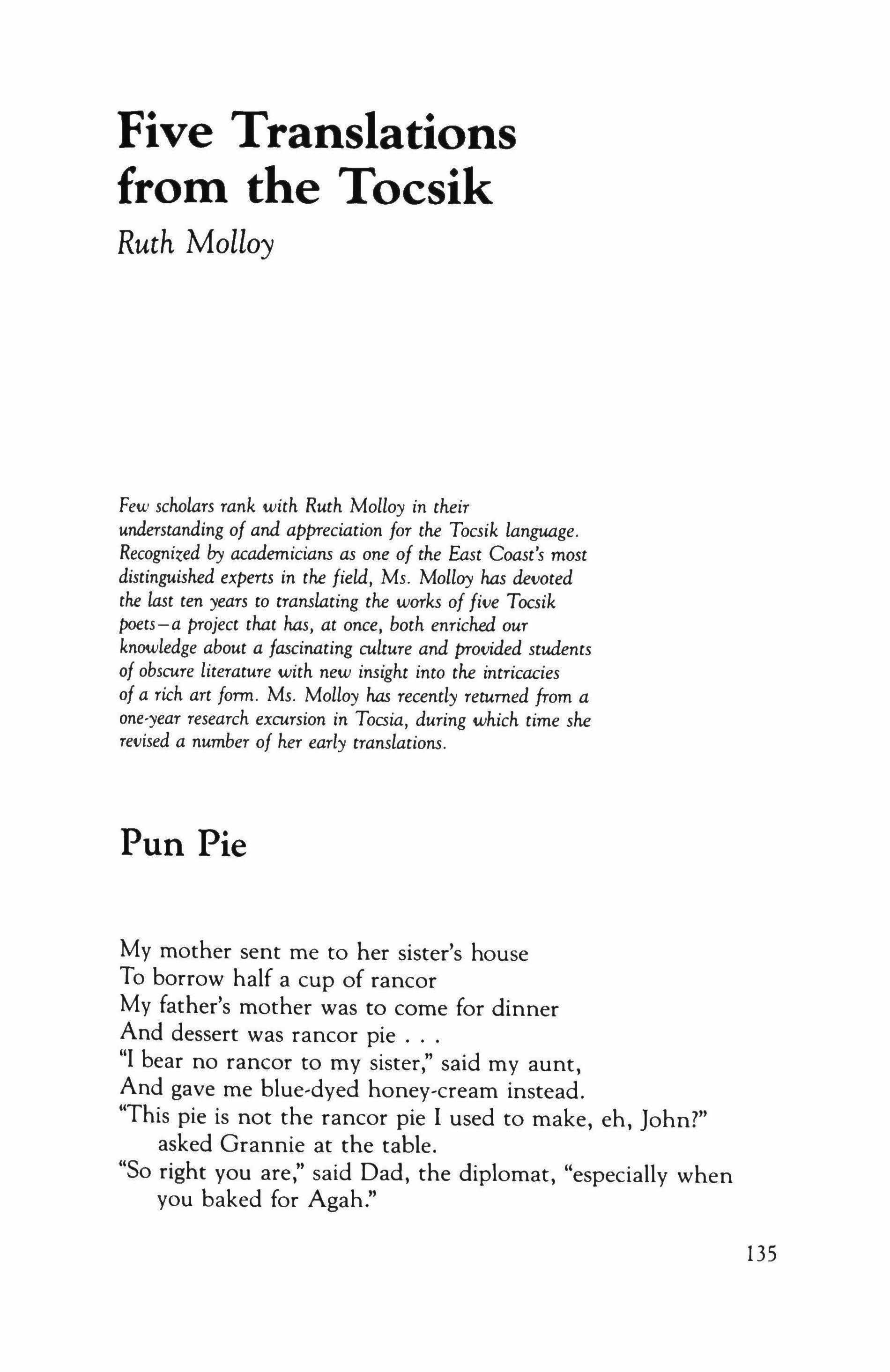
Few scholars rank with Ruth Molloy in their understanding of and appreciation for the Tocsik language. Recognized by academicians as one of the East Coast's most distinguished experts in the field, Ms. Molloy has devoted the last ten years to translating the works of five Tocsik poets-a project that has, at once, both enriched our knowledge about a fascinating culture and provided students of obscure literature with new insight into the intricacies of a rich art form. Ms. Molloy has recently returned from a one-year research excursion in Tocsia, during which time she revised a number of her early translations.
Pun Pie
My mother sent me to her sister's house
To borrow half a cup of rancor
My father's mother was to come for dinner
And dessert was rancor pie
"I bear no rancor to my sister," said my aunt, And gave me blue-dyed honey-cream instead.
"This pie is not the rancor pie 1 used to make, eh, John?" asked Grannie at the table.
"So right you are," said Dad, the diplomat, "especially when you baked for Agah."
135
The National Anthem

O! Tocsia!
My land, my preserve, my acre!
To thee my stint is dedicated, Thy banner, half burnt orange, half cobalt blue With ten silver emanating radii representing thy ten states, I salute!
Hi hoa, Tocsia, let us talk Tocsik, I love thy rills and rocks
Eya! Homage! My home! Tocsia! Boom!
136
Drinking Song
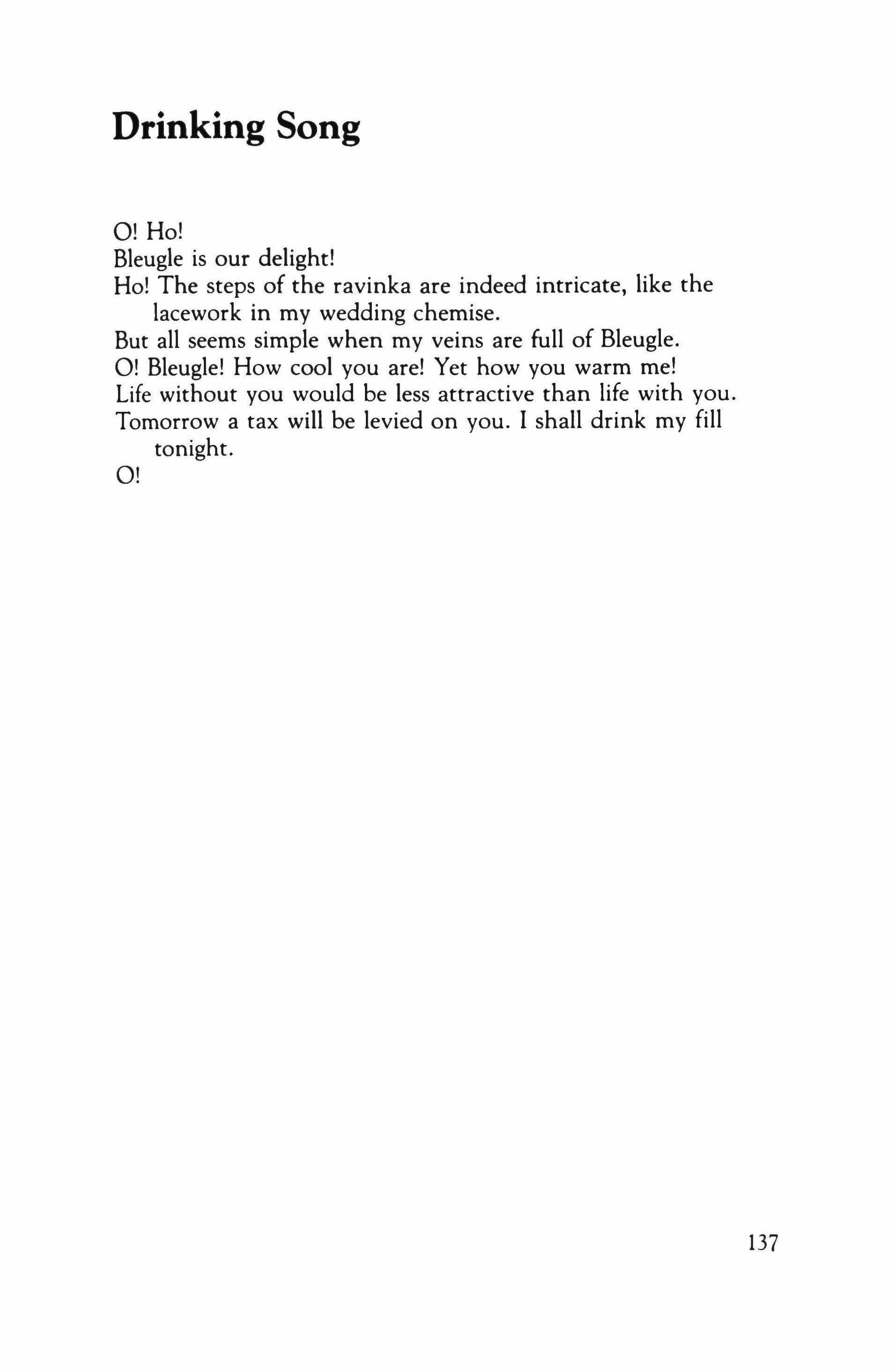
O! Ho!
Bleugle is our delight!
Ho! The steps of the ravinka are indeed intricate, like the lacework in my wedding chemise.
But all seems simple when my veins are full of Bleugle.
O! Bleugle! How cool you are! Yet how you warm me!
Life without you would be less attractive than life with you. Tomorrow a tax will be levied on you. I shall drink my fill tonight.
O!
137
Taxes

Men whose short wispy hair makes them conspicuous
Tellers of boring tales, rude slammers of house doors, Women who throw tantrums for a trifle, These pay taxes on their vagaries.
Yes! Indecorum, eccentricity, and clashing colors
Cost their owners dear.
This is the order in Tocsia.
138
Exercise

There are two roads to Tocsia:
One is paved and has ease of riding on, The other is with holes and mud, But on it walks pretty girl with easy-swinging hair, On good road only enclosed chariots. If I believed I could overtake pretty girl I would that road wend, But she has started her journey long ago, So I shall travel by macadam surface, And hope to meet her formal other where.
Ms. Molloy is working on a new translation of this work.
139
The First Emperor
E. P. Thompson
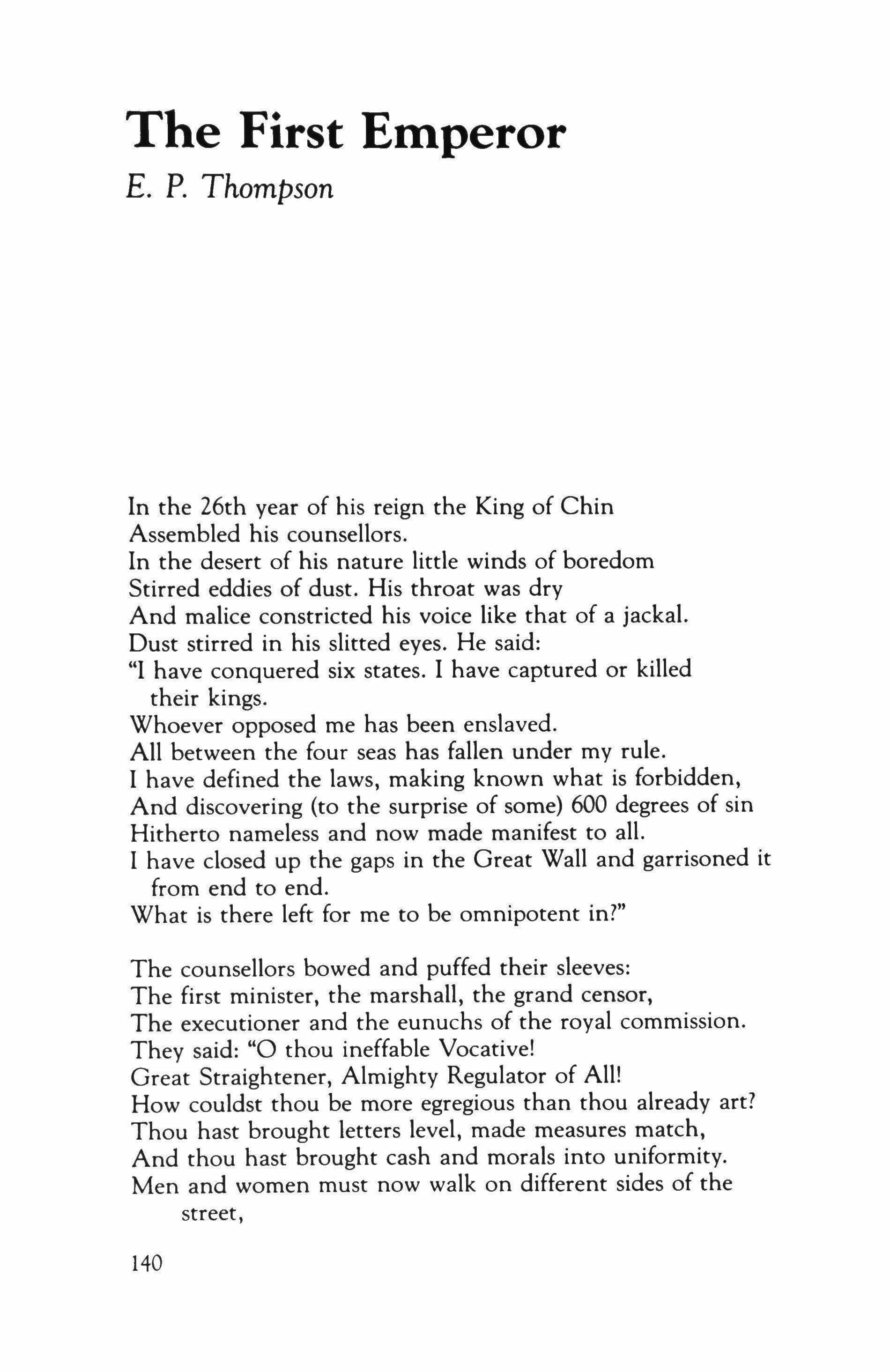
In the 26th year of his reign the King of Chin Assembled his counsellors.
In the desert of his nature little winds of boredom Stirred eddies of dust. His throat was dry And malice constricted his voice like that of a jackal. Dust stirred in his slitted eyes. He said: "I have conquered six states. I have captured or killed their kings.
Whoever opposed me has been enslaved. All between the four seas has fallen under my rule. I have defined the laws, making known what is forbidden, And discovering (to the surprise of some) 600 degrees of sin Hitherto nameless and now made manifest to all.
I have closed up the gaps in the Great Wall and garrisoned it from end to end.
What is there left for me to be omnipotent in?"
The counsellors bowed and puffed their sleeves:
The first minister, the marshall, the grand censor, The executioner and the eunuchs of the royal commission. They said: "0 thou ineffable Vocative!
Great Straightener, Almighty Regulator of All!
How couldst thou be more egregious than thou already art? Thou hast brought letters level, made measures match, And thou hast brought cash and morals into uniformity. Men and women must now walk on different sides of the street,
140
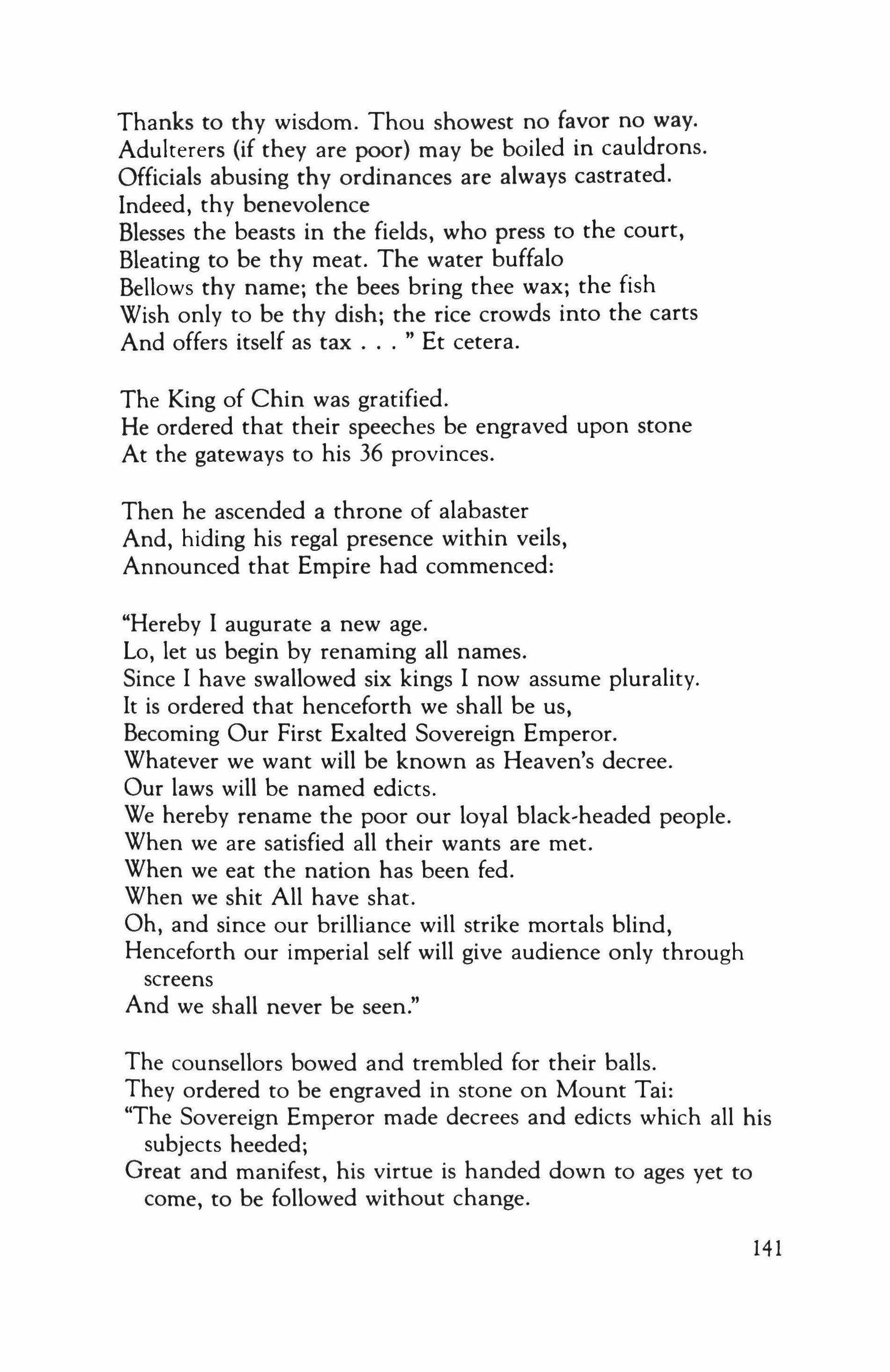
Thanks to thy wisdom. Thou showest no favor no way. Adulterers (if they are poor) may be boiled in cauldrons. Officials abusing thy ordinances are always castrated. Indeed, thy benevolence Blesses the beasts in the fields, who press to the court, Bleating to be thy meat. The water buffalo Bellows thy name; the bees bring thee wax; the fish Wish only to be thy dish; the rice crowds into the carts And offers itself as tax Et cetera.
The King of Chin was gratified. He ordered that their speeches be engraved upon stone At the gateways to his 36 provinces.
Then he ascended a throne of alabaster And, hiding his regal presence within veils, Announced that Empire had commenced:
"Hereby I augurate a new age.
Lo, let us begin by renaming all names. Since I have swallowed six kings I now assume plurality. It is ordered that henceforth we shall be us, Becoming Our First Exalted Sovereign Emperor. Whatever we want will be known as Heaven's decree. Our laws will be named edicts.
We hereby rename the poor our loyal black-headed people. When we are satisfied all their wants are met. When we eat the nation has been fed. When we shit All have shat.
Oh, and since our brilliance will strike mortals blind, Henceforth our imperial self will give audience only through screens
And we shall never be seen."
The counsellors bowed and trembled for their balls. They ordered to be engraved in stone on Mount Tai: "The Sovereign Emperor made decrees and edicts which all his subjects heeded; Great and manifest, his virtue is handed down to ages yet to come, to be followed without change.
141
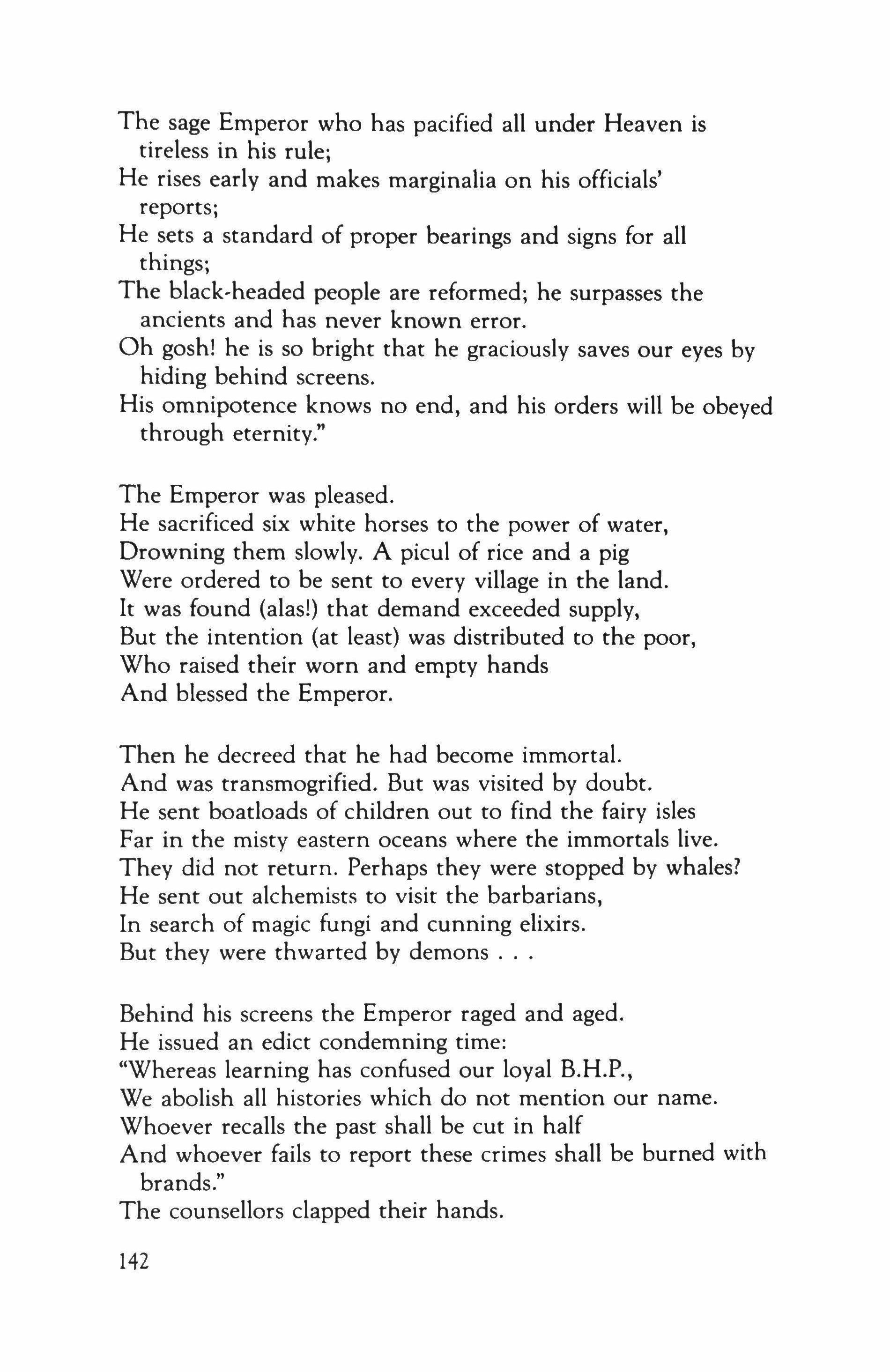
The sage Emperor who has pacified all under Heaven is tireless in his rule; He rises early and makes marginalia on his officials' reports;
He sets a standard of proper bearings and signs for all things;
The black,headed people are reformed; he surpasses the ancients and has never known error.
Oh gosh! he is so bright that he graciously saves our eyes by hiding behind screens.
His omnipotence knows no end, and his orders will be obeyed through eternity."
The Emperor was pleased. He sacrificed six white horses to the power of water, Drowning them slowly. A picul of rice and a pig Were ordered to be sent to every village in the land. It was found (alas!) that demand exceeded supply, But the intention (at least) was distributed to the poor, Who raised their worn and empty hands And blessed the Emperor.
Then he decreed that he had become immortal. And was transmogrified. But was visited by doubt. He sent boatloads of children out to find the fairy isles Far in the misty eastern oceans where the immortals live.
They did not return. Perhaps they were stopped by whales? He sent out alchemists to visit the barbarians, In search of magic fungi and cunning elixirs. But they were thwarted by demons
Behind his screens the Emperor raged and aged. He issued an edict condemning time:
"Whereas learning has confused our loyal B.H.P., We abolish all histories which do not mention our name. Whoever recalls the past shall be cut in half And whoever fails to report these crimes shall be burned with brands."
The counsellors clapped their hands.
142
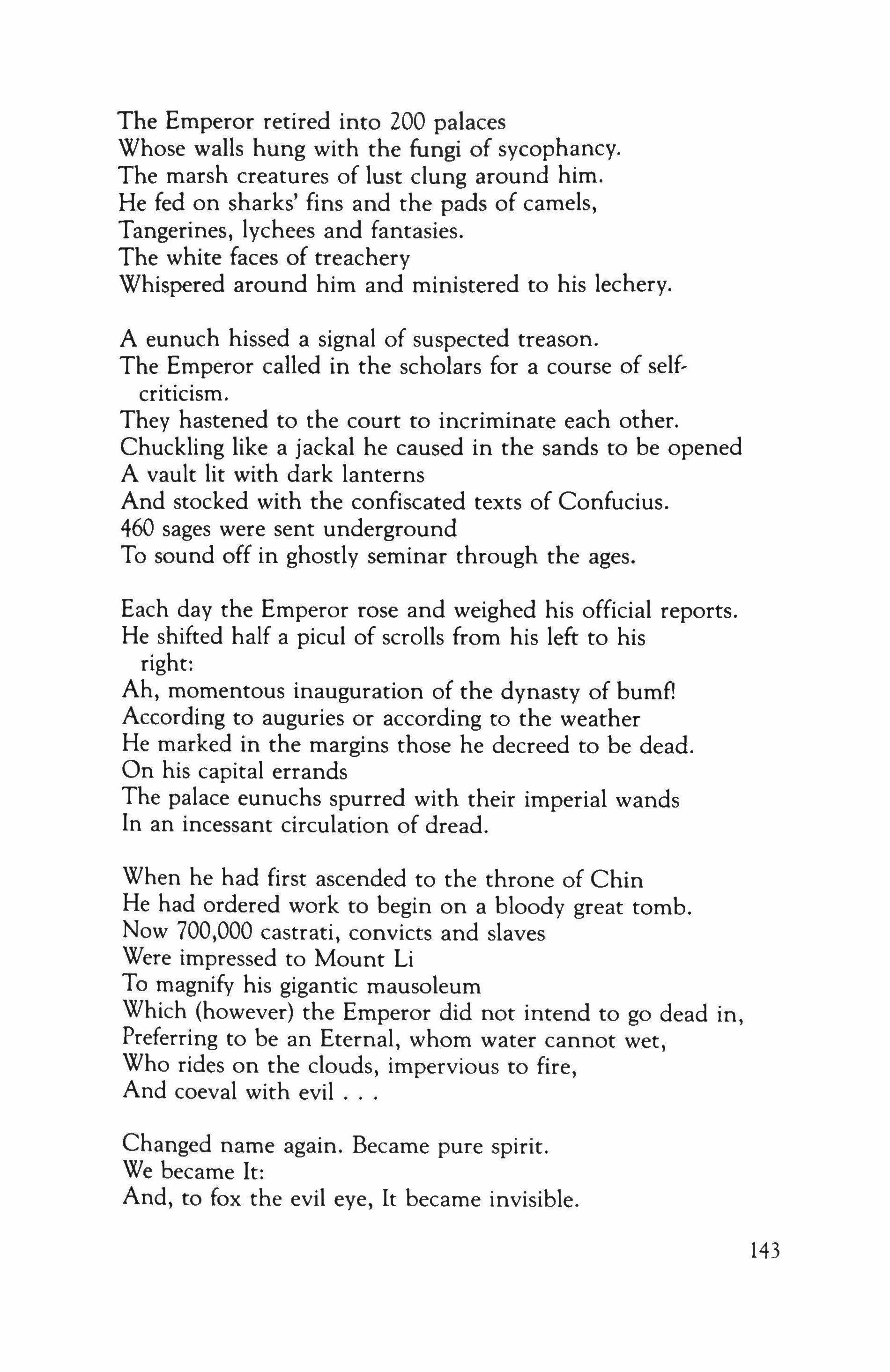
The Emperor retired into 200 palaces
Whose walls hung with the fungi of sycophancy.
The marsh creatures of lust clung around him.
He fed on sharks' fins and the pads of camels, Tangerines, lychees and fantasies.
The white faces of treachery
Whispered around him and ministered to his lechery.
A eunuch hissed a signal of suspected treason.
The Emperor called in the scholars for a course of selfcriticism.
They hastened to the court to incriminate each other.
Chuckling like a jackal he caused in the sands to be opened
A vault lit with dark lanterns
And stocked with the confiscated texts of Confucius.
460 sages were sent underground
To sound off in ghostly seminar through the ages.
Each day the Emperor rose and weighed his official reports. He shifted half a picul of scrolls from his left to his right:
Ah, momentous inauguration of the dynasty of bumf
According to auguries or according to the weather
He marked in the margins those he decreed to be dead.
On his capital errands
The palace eunuchs spurred with their imperial wands
In an incessant circulation of dread.
When he had first ascended to the throne of Chin
He had ordered work to begin on a bloody great tomb.
Now 700,000 castrati, convicts and slaves
Were impressed to Mount Li
To magnify his gigantic mausoleum
Which (however) the Emperor did not intend to go dead in, Preferring to be an Eternal, whom water cannot wet, Who rides on the clouds, impervious to fire, And coeval with evil
Changed name again. Became pure spirit.
We became It:
And, to fox the evil eye, It became invisible.
143
It flitted in secret
In screened arcades between Its 270 palaces. Places of ecstacy, what with golden orioles
Shouting in the flowering cherries, and the lakes stocked With exotic goldfish. Everywhere bells and drums
Exhorted the Eternal to come,
As did the countless beauties attendant on its every will
With which the pavilions and secret chambers were stacked.
Sheathed in green gauze
They back-combed their hair into pyramids like orchids
And languished for Its cock
(It having decreed that each must bear It a son Or else )
But were visited only by flaccid concupiscence
Since It could no longer fuck.
The Eternal flitted from palace to palace and moped.
It raged and aged.
It pawed and groped.
It wittered and moaned.
It decreed death
On any who disclosed where It was or where It might even be It issued an edict that It had ceased to exist
Except as despotic Essence.
You must imagine it now as pure vacancy
Here is Its Name:

300 astrologers
Were abjured to conjure beneficent omens from the stars.
It ordered the spiritual purification of poetry: The elimination of dentals, the utter ending of gutterals.
Musicians were ordered to oil their strings.
Ululation of sibilants and labials
As vowels howled in the shrouded corridors
And the pavilions wailed of immortality
And in the year of ascending to the throne of Chin
Eleven years on from assuming the name of We And two years from the annunciation of spirituality
144
* * *
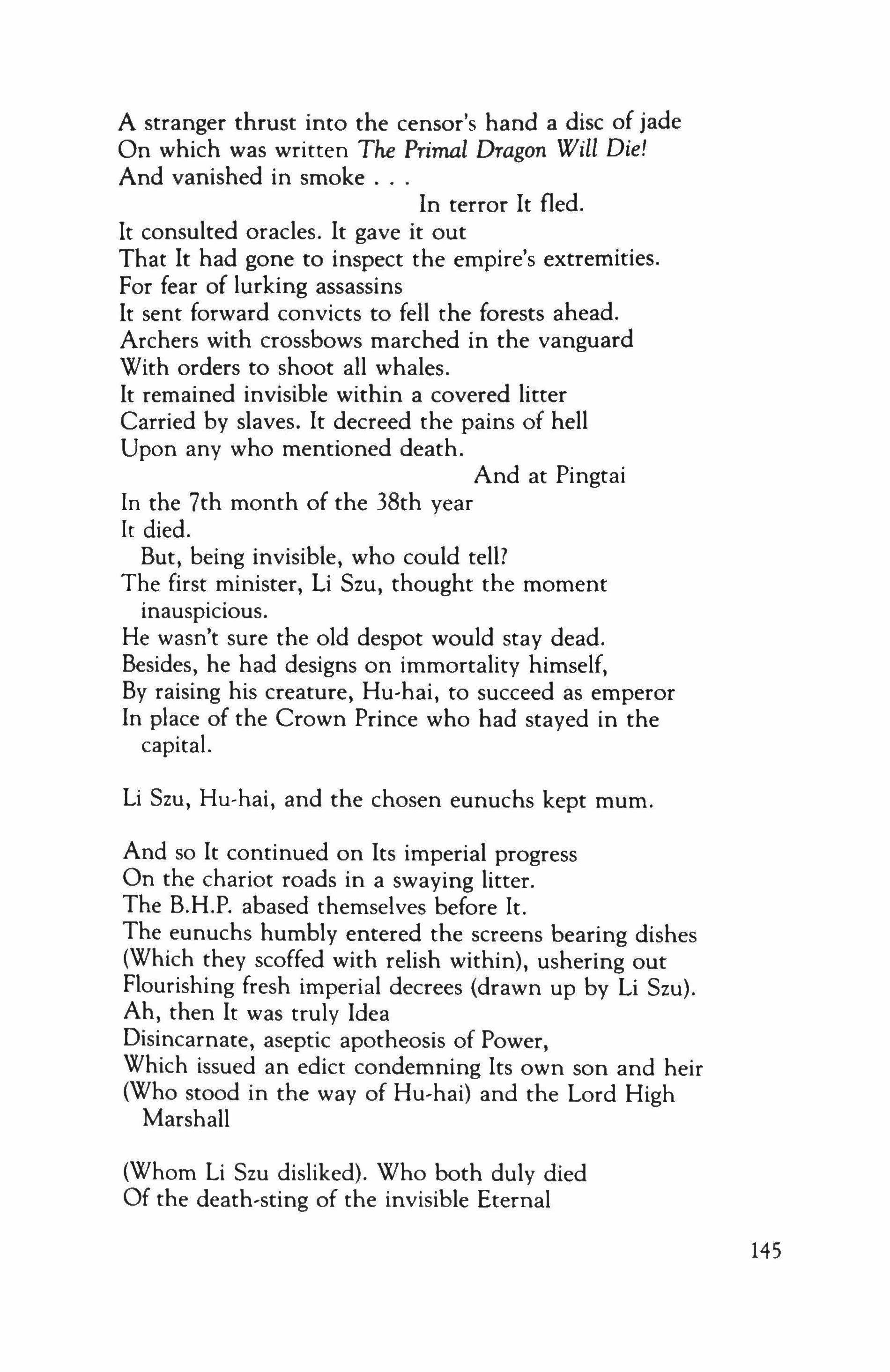
A stranger thrust into the censor's hand a disc of jade
On which was written The Primal Dragon Will Die! And vanished in smoke
In terror It fled.
It consulted oracles. It gave it out
That It had gone to inspect the empire's extremities. For fear of lurking assassins
It sent forward convicts to fell the forests ahead. Archers with crossbows marched in the vanguard With orders to shoot all whales.
It remained invisible within a covered litter
Carried by slaves. It decreed the pains of hell
Upon any who mentioned death.
And at Pingtai
In the 7th month of the 38th year It died.
But, being invisible, who could tell?
The first minister, Li Szu, thought the moment inauspicious.
He wasn't sure the old despot would stay dead. Besides, he had designs on immortality himself, By raising his creature, Hu-hai, to succeed as emperor In place of the Crown Prince who had stayed in the capital.
Li Szu, Hu-hai, and the chosen eunuchs kept mum.
And so It continued on Its imperial progress
On the chariot roads in a swaying litter.
The B.H.P. abased themselves before It.
The eunuchs humbly entered the screens bearing dishes (Which they scoffed with relish within), ushering out
Flourishing fresh imperial decrees (drawn up by Li Szu).
Ah, then It was truly Idea
Disincarnate, aseptic apotheosis of Power, Which issued an edict condemning Its own son and heir (Who stood in the way of Hu-hai) and the Lord High Marshall
(Whom Li Szu disliked). Who both duly died Of the death-sting of the invisible Eternal
145

Who at length began to stink to high heaven.
The stench caused gossip. To cover the matter
A cartload of salted fish was hitched to Its litter.
And in this manner the bizarre procession
Re-entered Hsienyang, capital of the empire,
Where the Prince and Marshall's heads grinned on the gates.
First came the outriders scouring for rice
Convicts with axes
Alchemists wishing for fungi
Augurers fishing for auguries
Archers warily watching for whales
The black imperial banners
Trumpeters, drummers
Then:
10,000 horsemen, 1,000 charioteers
A myriad foot-soldiers sweating in full armor
Hu-hai, Li Szu, and the ministers of rank
The concubines swaying in palanquins
Eunuchs in rich insignia
Then:
The huge unfurled imperial dragon
The dead Eternal stinking in Its litter
And a cartload of salted fish.
A few explanations followed
Followed by exemplary executions.
After which It was borne
To the yawning mausoleum beneath Mount Li.
Laid in a coffin of copper
In a vault over which the constellations turned
And the floor was the world over which It had ruled
With the rivers and oceans sketched in mercury.
All the imperial palaces were modeled in jade:
Miraculous artifice guarded by gins and traps!
Oh, and those of the Eternal's ladies who had fallen down in their function
Of bearing It heirs (viz. male) (i.e. nearly all)
Were given the honor of going in gorgeous weeds
146
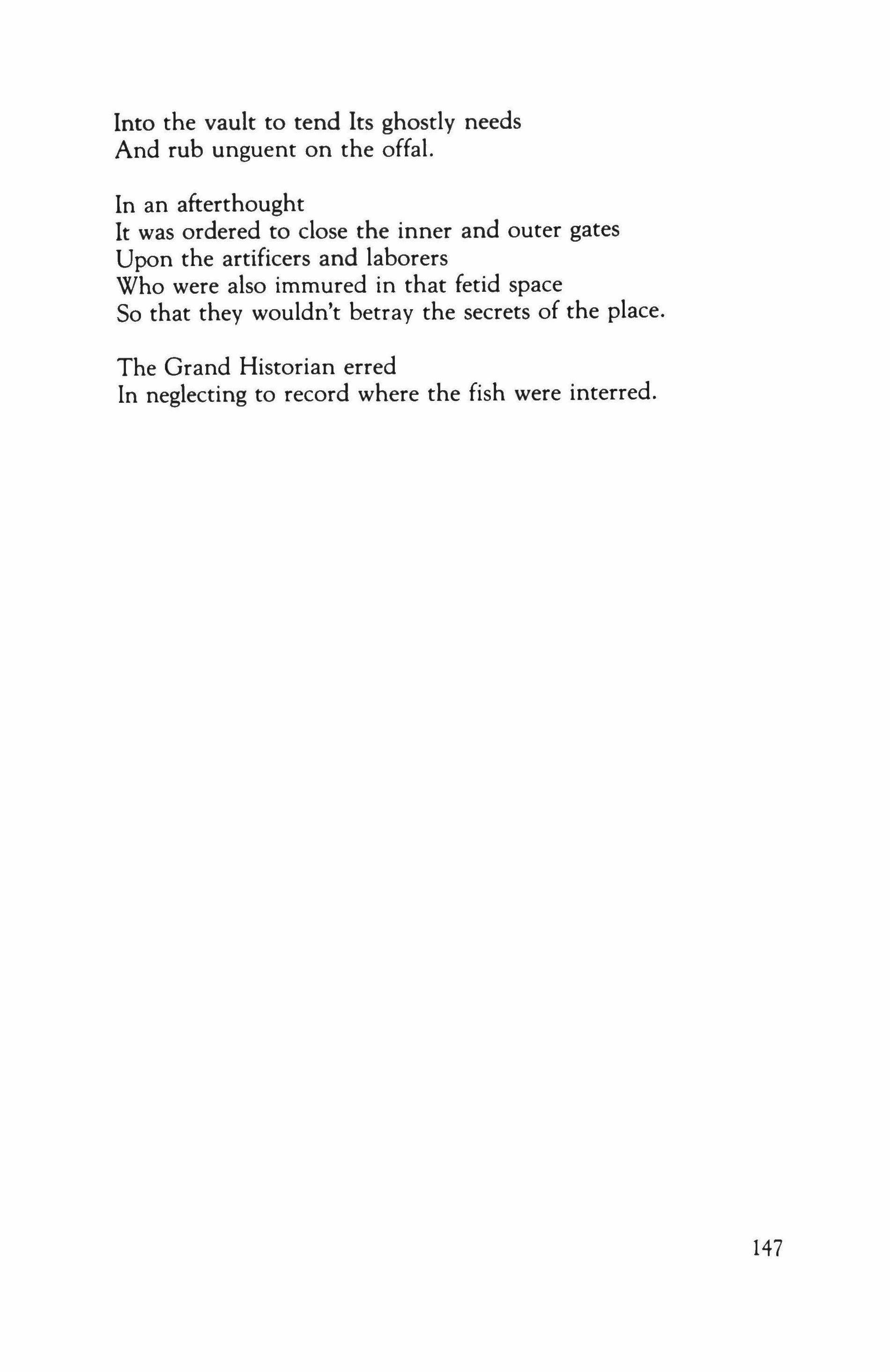
Into the vault to tend Its ghostly needs
And rub unguent on the offal.
In an afterthought
It was ordered to close the inner and outer gates
Upon the artificers and laborers
Who were also immured in that fetid space
So that they wouldn't betray the secrets of the place.
The Grand Historian erred
In neglecting to record where the fish were interred.
147
Coyote-Mind: An Interview with Gary Snyder
Julia Martin
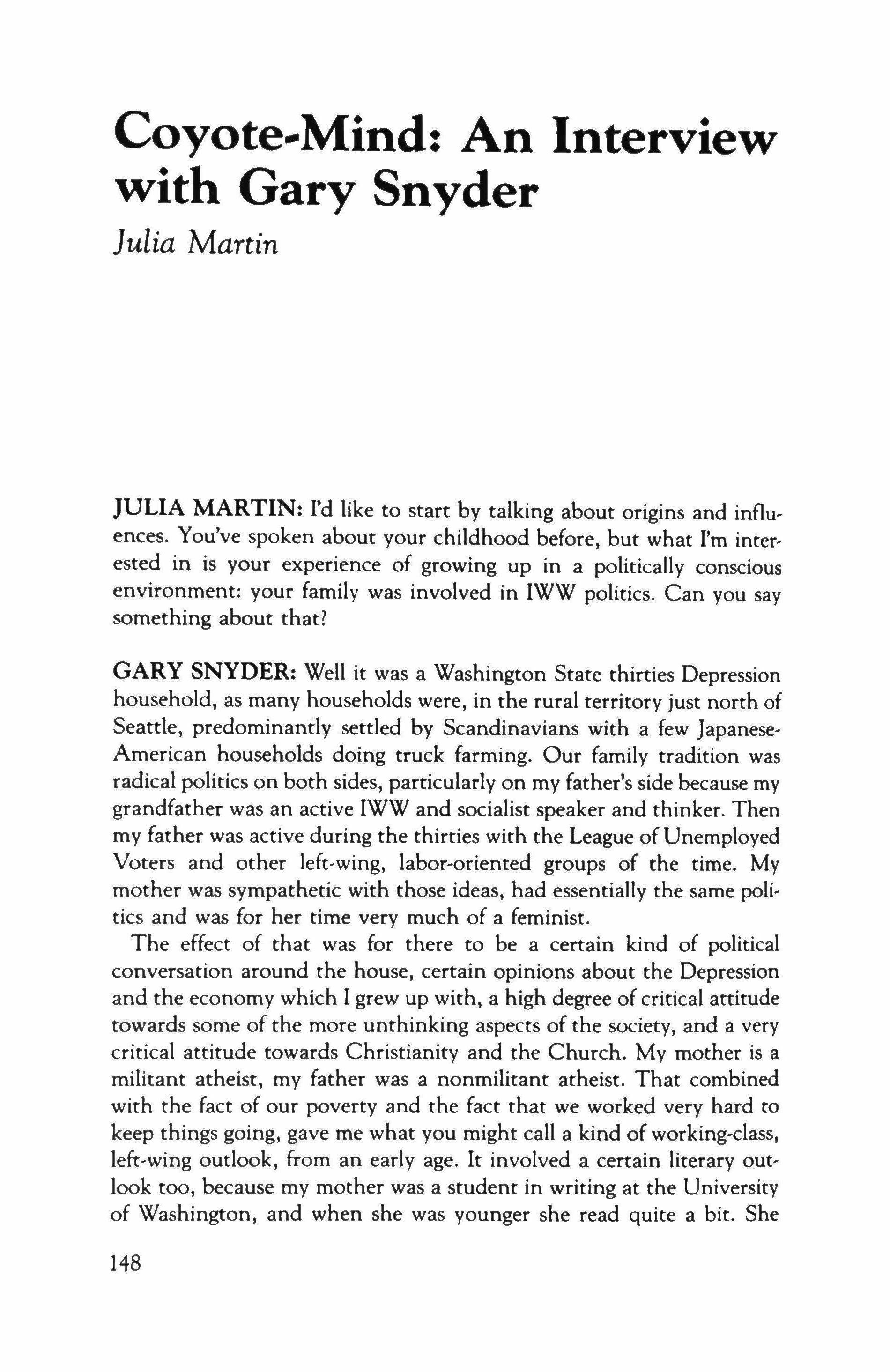
JULIA MARTIN: I'd like to start by talking about origins and influences. You've spoken about your childhood before, but what I'm interested in is your experience of growing up in a politically conscious environment: your family was involved in IWW politics. Can you say something about that?
GARY SNYDER: Well it was a Washington State thirties Depression household, as many households were, in the rural territory just north of Seattle, predominantly settled by Scandinavians with a few JapaneseAmerican households doing truck farming. Our family tradition was radical politics on both sides, particularly on my father's side because my grandfather was an active IWW and socialist speaker and thinker. Then my father was active during the thirties with the League of Unemployed Voters and other left-wing, labor-oriented groups of the time. My mother was sympathetic with those ideas, had essentially the same politics and was for her time very much of a feminist.
The effect of that was for there to be a certain kind of political conversation around the house, certain opinions about the Depression and the economy which I grew up with, a high degree of critical attitude towards some of the more unthinking aspects of the society, and a very critical attitude towards Christianity and the Church. My mother is a militant atheist, my father was a nonmilitant atheist. That combined with the fact of our poverty and the fact that we worked very hard to keep things going, gave me what you might call a kind of working-class, left-wing outlook, from an early age. It involved a certain literary outlook too, because my mother was a student in writing at the University of Washington, and when she was younger she read quite a bit. She
148
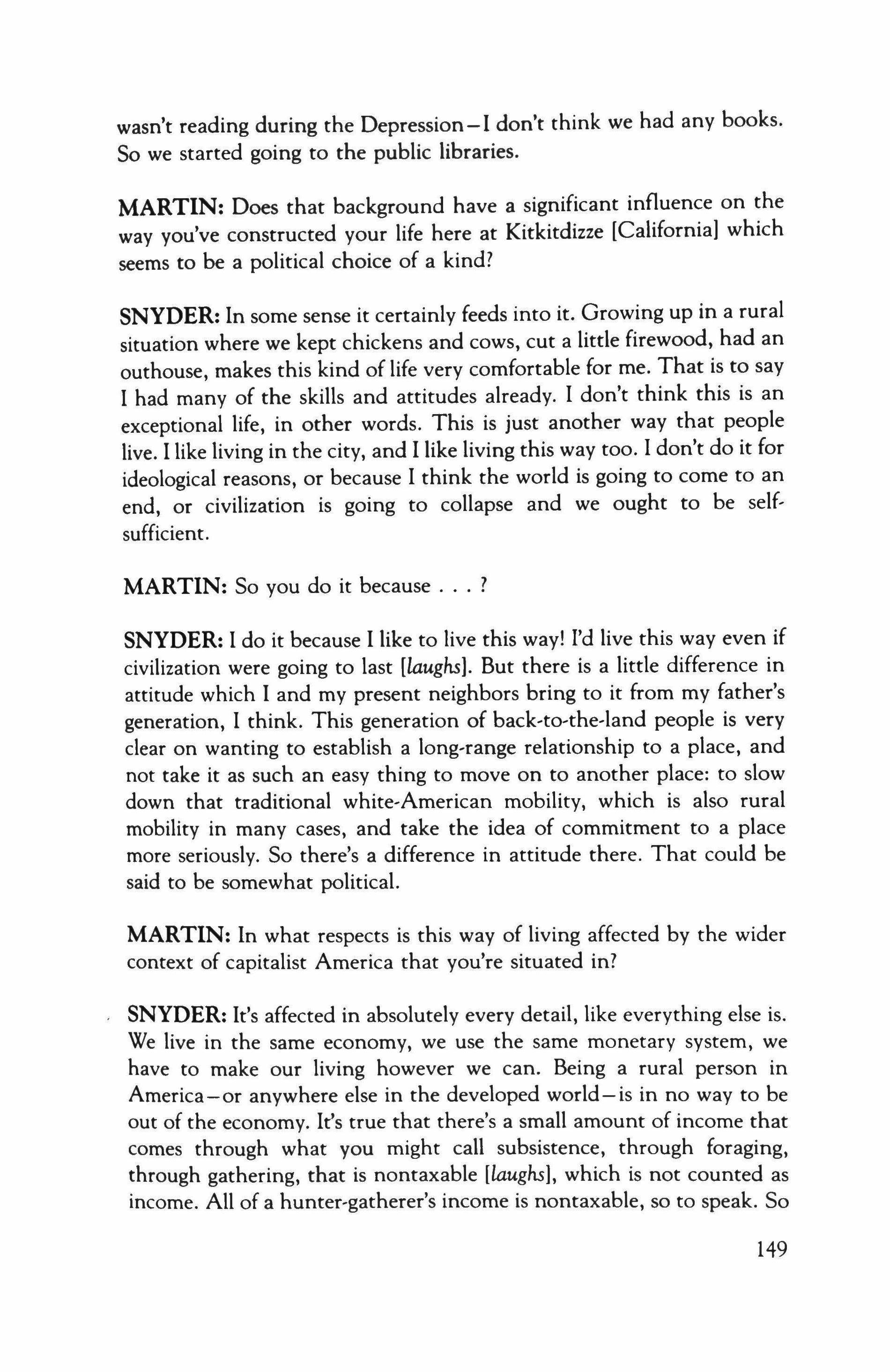
wasn't reading during the Depression-I don't think we had any books. So we started going to the public libraries.
MARTIN: Does that background have a significant influence on the way you've constructed your life here at Kitkitdizze [California) which seems to be a political choice of a kind?
SNYDER: In some sense it certainly feeds into it. Growing up in a rural situation where we kept chickens and cows, cut a little firewood, had an outhouse, makes this kind of life very comfortable for me. That is to say I had many of the skills and attitudes already. I don't think this is an exceptional life, in other words. This is just another way that people live. I like living in the city, and I like living this way too. I don't do it for ideological reasons, or because I think the world is going to corne to an end, or civilization is going to collapse and we ought to be selfsufficient.
MARTIN: So you do it because ?
SNYDER: I do it because I like to live this way! I'd live this way even if civilization were going to last [laughs). But there is a little difference in attitude which I and my present neighbors bring to it from my father's generation, I think. This generation of back-to-the-land people is very clear on wanting to establish a long-range relationship to a place, and not take it as such an easy thing to move on to another place: to slow down that traditional white-American mobility, which is also rural mobility in many cases, and take the idea of commitment to a place more seriously. So there's a difference in attitude there. That could be said to be somewhat political.
MARTIN: In what respects is this way of living affected by the wider context of capitalist America that you're situated in?
SNYDER: It's affected in absolutely every detail, like everything else is. We live in the same economy, we use the same monetary system, we have to make our living however we can. Being a rural person in America-or anywhere else in the developed world-is in no way to be out of the economy. It's true that there's a small amount of income that comes through what you might call subsistence, through foraging, through gathering, that is nontaxable [laughs), which is not counted as income. All of a hunter-gatherer's income is nontaxable, so to speak. So
149

we are to a tiny extent growers and foragers. We could be much more than we are, but it's economically not feasible. There's a higher degree of efficiency to be part of the economy than to opt out of it. In other words, growing food costs you more than buying food at the market. It's a peculiar feature of a more complex economy that there are economic strategies by which you can live in a rural situation without being engaged in rural production. You just happen to do your work in a rural location, rather than an urban location. But there's very little difference from doing your work in a suburb of New York. It's just a matter of where you choose to live.
MARTIN: You are talking about a First World economy, though. Many of the "alternative life-styles" that are possible here in the United States simply aren't an option where I come from [Capetown, South Africa).
SNYDER: I'm sure they are possible where you come from. I'm sure somebody who was skilled in writing and computer programming could live just as well away from town as in town, because of the decentralization of the information economy.
MARTIN: But that presupposes a high degree of skill and privilege
SNYDER: I'm sure there are writers in South Africa who don't live right in the middle of downtown, who live out in the country. It requires a little more ingenuity sometimes, but people all over the developed world are doing it-in Scandinavia, England, Wales, Scotland and many other places. You have to spend more time thinking about tools and maintenance, but it's never accurate to say "You can do this but other people can't." I run into that periodically. That is actually not a sensible way of putting it. The fact is, you can if you want to. Anyone can live like this if they're willing to put out the time and energy. But it's also a matter of what the nature of your work is. There are a lot of people who opt for a lower income to be able to live here. They could make better money if they lived in the city.
MARTIN: Would you say that the way you teach is affected by your attitudes towards authoritarian structures?
150
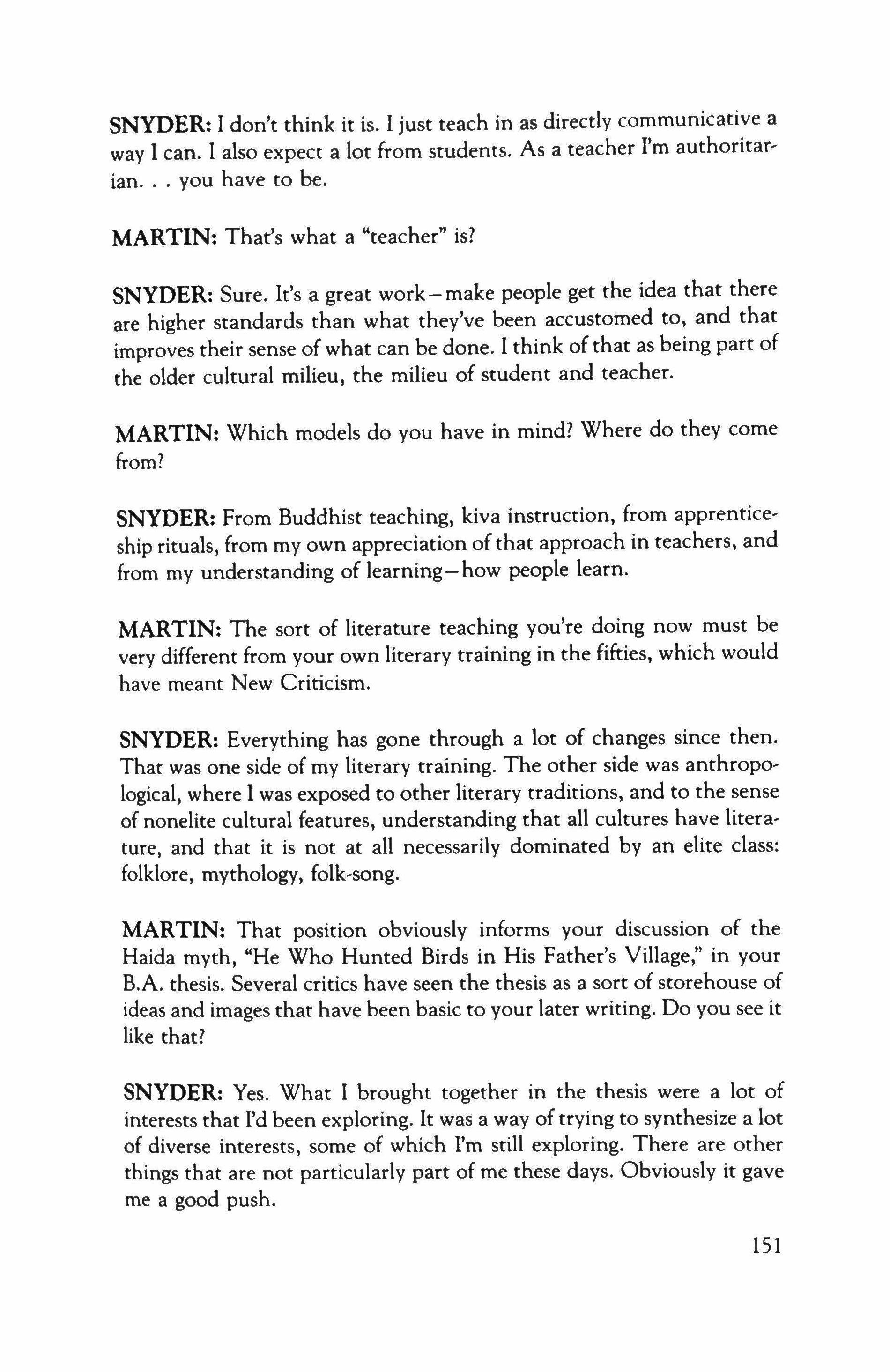
SNYDER: I don't think it is. I just teach in as directly communicative a way I can. I also expect a lot from students. As a teacher I'm authoritarian you have to be.
MARTIN: That's what a "teacher" is?
SNYDER: Sure. It's a great work - make people get the idea that there are higher standards than what they've been accustomed to, and that improves their sense of what can be done. I think of that as being part of the older cultural milieu, the milieu of student and teacher.
MARTIN: Which models do you have in mind? Where do they come from?
SNYDER: From Buddhist teaching, kiva instruction, from apprenticeship rituals, from my own appreciation of that approach in teachers, and from my understanding of learning-how people learn.
MARTIN: The sort of literature teaching you're doing now must be very different from your own literary training in the fifties, which would have meant New Criticism.
SNYDER: Everything has gone through a lot of changes since then. That was one side of my literary training. The other side was anthropological, where I was exposed to other literary traditions, and to the sense of nonelite cultural features, understanding that all cultures have literature, and that it is not at all necessarily dominated by an elite class: folklore, mythology, folk-song.
MARTIN: That position obviously informs your discussion of the Haida myth, "He Who Hunted Birds in His Father's Village," in your B.A. thesis. Several critics have seen the thesis as a sort of storehouse of ideas and images that have been basic to your later writing. Do you see it like that?
SNYDER: Yes. What I brought together in the thesis were a lot of interests that I'd been exploring. It was a way of trying to synthesize a lot of diverse interests, some of which I'm still exploring. There are other things that are not particularly part of me these days. Obviously it gave me a good push.
151

MARTIN: So what stays with you now? Which things are you still exploring?
SNYDER: Well, I'm still interested in the question of the role of myth and nonmyth, the play between direct understanding and perception as against point of view shaped by cultural structures, direct experience as against hearsay, direct experience and any kind of experience mediated by opinion or ideology or preconditions. Unmediated experience - it's an interesting thing. That's what Zen is pointing to: unmediated experience.
MARTIN: So your Zen practice and your interest in anthropology are going in the same direction. On the subject of myth and nonmyth, you wrote at that time that "The function mythology serves in primitive culture is desperately needed in contemporary society." That was the early fifties. Would you still put it like that?
SNYDER: You see you have to say two things at once. This is the interesting part. We have to say that we need myth. And then you also have to say that you need to get to the end of myth. Myth can be understood as a kind of provisional ordering of the situation to get the territory at least clear enough so you can begin to work on it. In a socalled primitive culture, myth works to give a shape and a wholeness to a wide range of behaviors and institutions. Sometimes it's extraordinarily shapely and very well constructed in some way: one symbol informs another symbol, and such a society has tremendous strength. However, the way mythologies work is by no means always benign. And so we have another way of speaking about myth, which is to speak of it as superstition, prejudice, preconceptions, blinders on the eyes, blinders on the mind, views and opinions which trap people. So mythology, images, can be used in more ways than one. We need to be able to discriminate between visions that liberate and visions that enslave, myths that liberate and myths that do not.
MARTIN: In your thesis you emphasized the mytheme of the supernatural wife, and stressed the idea of "Woman" as mythic image of "the totality which can be known." Can you comment on what this view of a mythic Woman has involved in your work?
SNYDER: Yes, there are a number of feminine images that overlap in there. The phenomenal world as female, as illusion, is one.
152
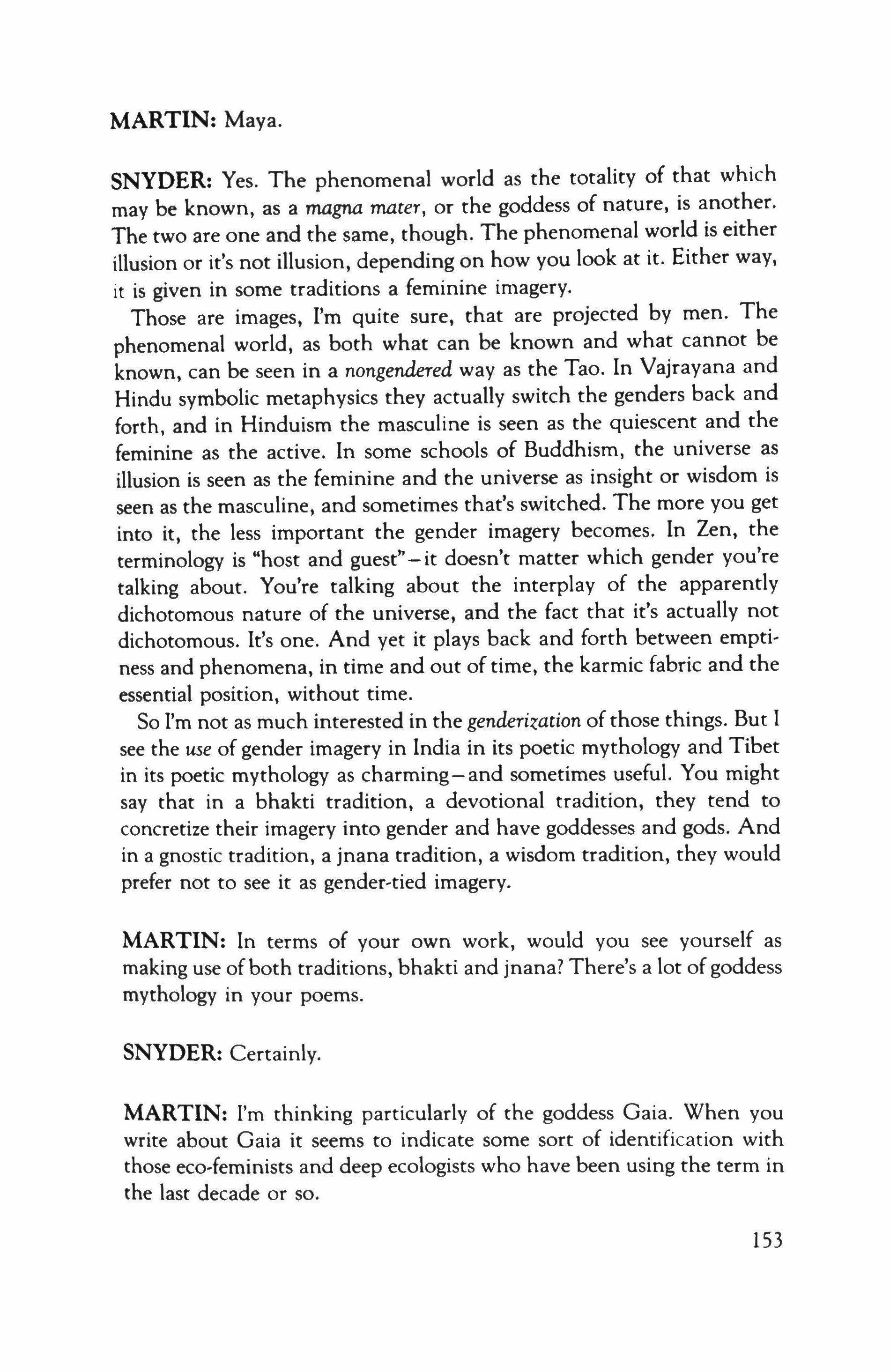
MARTIN: Maya.
SNYDER: Yes. The phenomenal world as the totality of that which may be known, as a magna mater, or the goddess of nature, is another. The two are one and the same, though. The phenomenal world is either illusion or it's not illusion, depending on how you look at it. Either way, it is given in some traditions a feminine imagery.
Those are images, I'm quite sure, that are projected by men. The phenomenal world, as both what can be known and what cannot be known, can be seen in a nongendered way as the Tao. In Vajrayana and Hindu symbolic metaphysics they actually switch the genders back and forth, and in Hinduism the masculine is seen as the quiescent and the feminine as the active. In some schools of Buddhism, the universe as illusion is seen as the feminine and the universe as insight or wisdom is seen as the masculine, and sometimes that's switched. The more you get into it, the less important the gender imagery becomes. In Zen, the terminology is "host and guest" - it doesn't matter which gender you're talking about. You're talking about the interplay of the apparently dichotomous nature of the universe, and the fact that it's actually not dichotomous. It's one. And yet it plays back and forth between emptiness and phenomena, in time and out of time, the karmic fabric and the essential position, without time.
So I'm not as much interested in the genderization of those things. But I see the use of gender imagery in India in its poetic mythology and Tibet in its poetic mythology as charming - and sometimes useful. You might say that in a bhakti tradition, a devotional tradition, they tend to concretize their imagery into gender and have goddesses and gods. And in a gnostic tradition, a jnana tradition, a wisdom tradition, they would prefer not to see it as gender-tied imagery.
MARTIN: In terms of your own work, would you see yourself as making use ofboth traditions, bhakti and jnana? There's a lot of goddess mythology in your poems.
SNYDER: Certainly.
MARTIN: I'm thinking particularly of the goddess Gaia. When you write about Gaia it seems to indicate some sort of identification with those eco-ferninisrs and deep ecologists who have been using the term in the last decade or so.
153
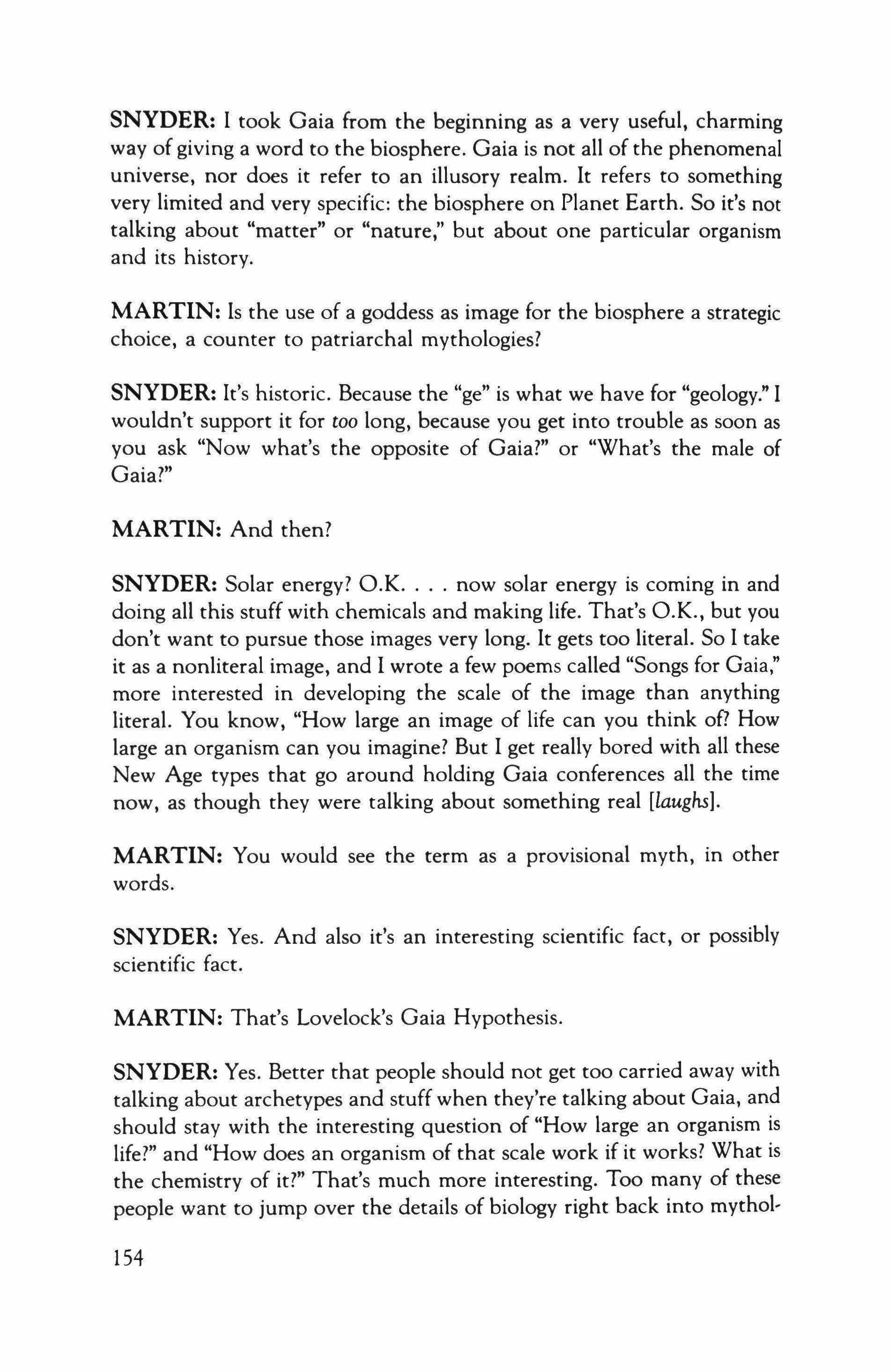
SNYDER: I took Gaia from the beginning as a very useful, charming way of giving a word to the biosphere. Gaia is not all of the phenomenal universe, nor does it refer to an illusory realm. It refers to something very limited and very specific: the biosphere on Planet Earth. So it's not talking about "matter" or "nature," but about one particular organism and its history.
MARTIN: Is the use of a goddess as image for the biosphere a strategic choice, a counter to patriarchal mythologies?
SNYDER: It's historic. Because the "ge" is what we have for "geology." I wouldn't support it for too long, because you get into trouble as soon as you ask "Now what's the opposite of Gaia?" or "What's the male of Gaia?"
MARTIN: And then?
SNYDER: Solar energy? O.K now solar energy is coming in and doing all this stuff with chemicals and making life. That's O.K., but you don't want to pursue those images very long. It gets too literal. So I take it as a nonliteral image, and I wrote a few poems called "Songs for Gaia," more interested in developing the scale of the image than anything literal. You know, "How large an image of life can you think of? How large an organism can you imagine? But I get really bored with all these New Age types that go around holding Gaia conferences all the time now, as though they were talking about something real [laughs].
MARTIN: You would see the term as a provisional myth, in other words.
SNYDER: Yes. And also it's an interesting scientific fact, or possibly scientific fact.
MARTIN: That's Lovelock's Gaia Hypothesis.
SNYDER: Yes. Better that people should not get too carried away with talking about archetypes and stuff when they're talking about Gaia, and should stay with the interesting question of "How large an organism is life?" and "How does an organism of that scale work if it works? What is the chemistry of it?" That's much more interesting. Too many of these people want to jump over the details of biology right back into rnvthol-
154

ogy before they've got themselves grounded in it. So I backed off from the use of the term Gaia, except as an interesting metaphor. I presume the hypothesis to have some use as a hypothesis. But talking about the planet as Gaia per se will not do the planet a lot ofgood though [laughs). You still have to find a course of action, a program. Do 'something active: "Where do we go from here?"
MARTIN: What about the more general connection of "woman" and "nature"?
SNYDER: That's a good question. Carolyn Merchant (who wrote The Death of Nature) and I were talking about that. There are definitely two schools of feminist thought about it. Ynestra King, for example, wants to eliminate all gendered references to nature. She says that doesn't help women. It just makes them look fecund and Great Mothery, and it keeps them in the kitchen. Then there's another imagery which is certainly very deeply established in thought and lore: metaphors drawn from some obvious observations of seeds being planted and sprouting, birth processes in nature, which suggest an analogy with women's bodies and their roles in culture. I don't know if hunter-gathering people ever got so deeply fertility- and goddess-oriented as did agrarian people. In agriculture there is the very clear metaphor of scratching the ground, poking a hole, and then dropping a seed in it, covering it up and watching it sprout. It becomes very easy to see the sun and the sky as some kind of fertilizing force, and the earth as a womb which holds the seed and then brings it out. Hunter-gathering people do not genderize nature in the way that early agrarian cultures do.
MARTIN: How useful can that sort of early agrarian metaphor be for late twentieth-century people?
SNYDER: Well, you can take "woman" to mean "generative force," assigning more of the reproductive role to the female than to the male, which is the way that some people might see it. (There is some biological truth in this. In some animals the female has a more nurturing capacity than the male.) And then you can continue the image and say "our mother Earth," and say "We shouldn't destroy our mother Earth." So it becomes ecological language. To be more precise, "We shouldn't destroy our mother Earth and our father- whatever the father is." If there are forces at work, and there are two ofthem, we need both ofthem [laughs]. So I'm just playing with these things still myself. We should respect
155
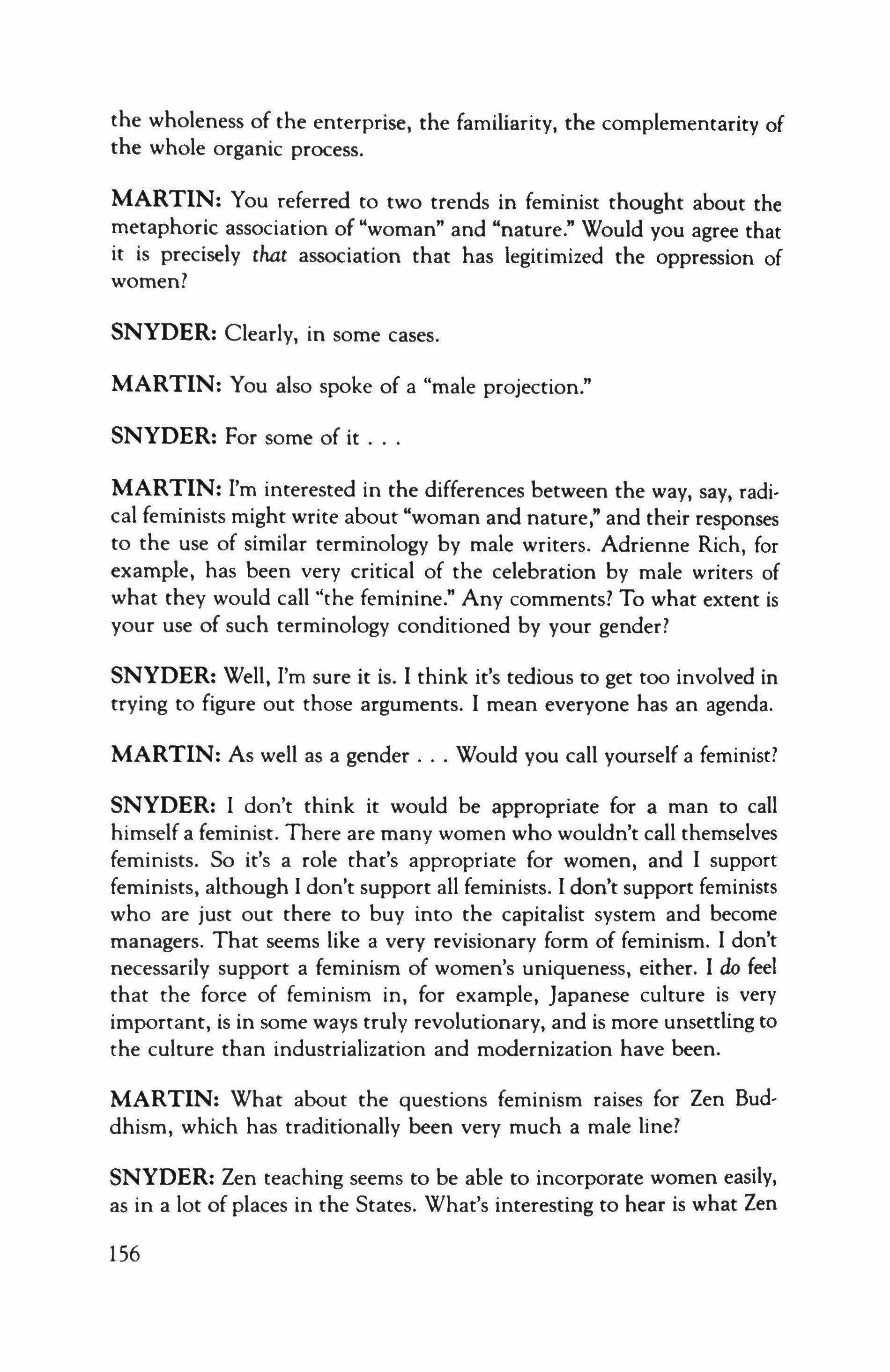
the wholeness of the enterprise, the familiarity, the complementarity of the whole organic process.
MARTIN: You referred to two trends in feminist thought about the metaphoric association of "woman" and "nature." Would you agree that it is precisely that association that has legitimized the oppression of women?
SNYDER: Clearly, in some cases.
MARTIN: You also spoke of a "male projection."
SNYDER: For some of it
MARTIN: I'm interested in the differences between the way, say, radical feminists might write about "woman and nature," and their responses to the use of similar terminology by male writers. Adrienne Rich, for example, has been very critical of the celebration by male writers of what they would call "the feminine." Any comments? To what extent is your use of such terminology conditioned by your gender?
SNYDER: Well, I'm sure it is. I think it's tedious to get too involved in trying to figure out those arguments. I mean everyone has an agenda.
MARTIN: As well as a gender Would you call yourself a feminist?
SNYDER: I don't think it would be appropriate for a man to call himself a feminist. There are many women who wouldn't call themselves feminists. So it's a role that's appropriate for women, and I support feminists, although I don't support all feminists. I don't support feminists who are just out there to buy into the capitalist system and become managers. That seems like a very revisionary form of feminism. I don't necessarily support a feminism of women's uniqueness, either. I do feel that the force of feminism in, for example, Japanese culture is very important, is in some ways truly revolutionary, and is more unsettling to the culture than industrialization and modernization have been.
MARTIN: What about the questions feminism raises for Zen Buddhism, which has traditionally been very much a male line?
SNYDER: Zen teaching seems to be able to incorporate women easily, as in a lot of places in the States. What's interesting to hear is what Zen
156

women who practice Buddhism have to say, their views towards Buddhist practice and towards feminism. There are some women who will say (having come from a feminist background), that they came to Buddhism because they needed a study of who they really were, without preconceptions, without a feminist or an antifeminist agenda. To ask yourself "What is my nature really like?" without the presumption that it's going to be particularly female or male: to go beyond the gender side of the question and just look at what is, to observe what your mind and psyche does. So they found Buddhism very refreshing in its freedom from preconceptions about the way the mind is. Buddhism teaches that the mind is the mind, and that the difference between a woman's mind and a man's mind at deeper levels is absolutely zero. So when Buddhism is doing what it should be doing, it helps us all equally, before race or gender, in establishing an insight into our own nature. And it may be that that insight includes some understanding of this part of me, this component which you might call feminine. That calls for some acknowledgment, and I need not be afraid of it or ashamed of it. And the same for men too- there has to be a place where they can acknowledge what part of their makeup is generated by their gender.
MARTIN: By their socialization into that gender?
SNYDER: Prior to socialization. Well, socialization into the gender, but also, you know, there are forces at work that are prior to socialization. You see it in the difference between different girls and different boys. Some girls will be frilly and feminine from the very beginning. Some won't. And I see it around here, we all see it: we've seen mothers who are handling chain saws and driving trucks, whose daughters won't touch them. They simply won't do that. There is a character that you're born with, and there are tendencies that are prior to what your parents have socialized you into. There are definitely tendencies amongst girls to do certain things in certain ways, and there are tendencies in boys to do certain things, prior to socialization. Then socialization can enforce certain things or play down certain things. But you're not dealing with a totally blank slate.
MARTIN: With regard to gender, Buddhism would seem then to reject the idea that differences such as "male" and "female" indicate fixed essences, fixed givens.
157
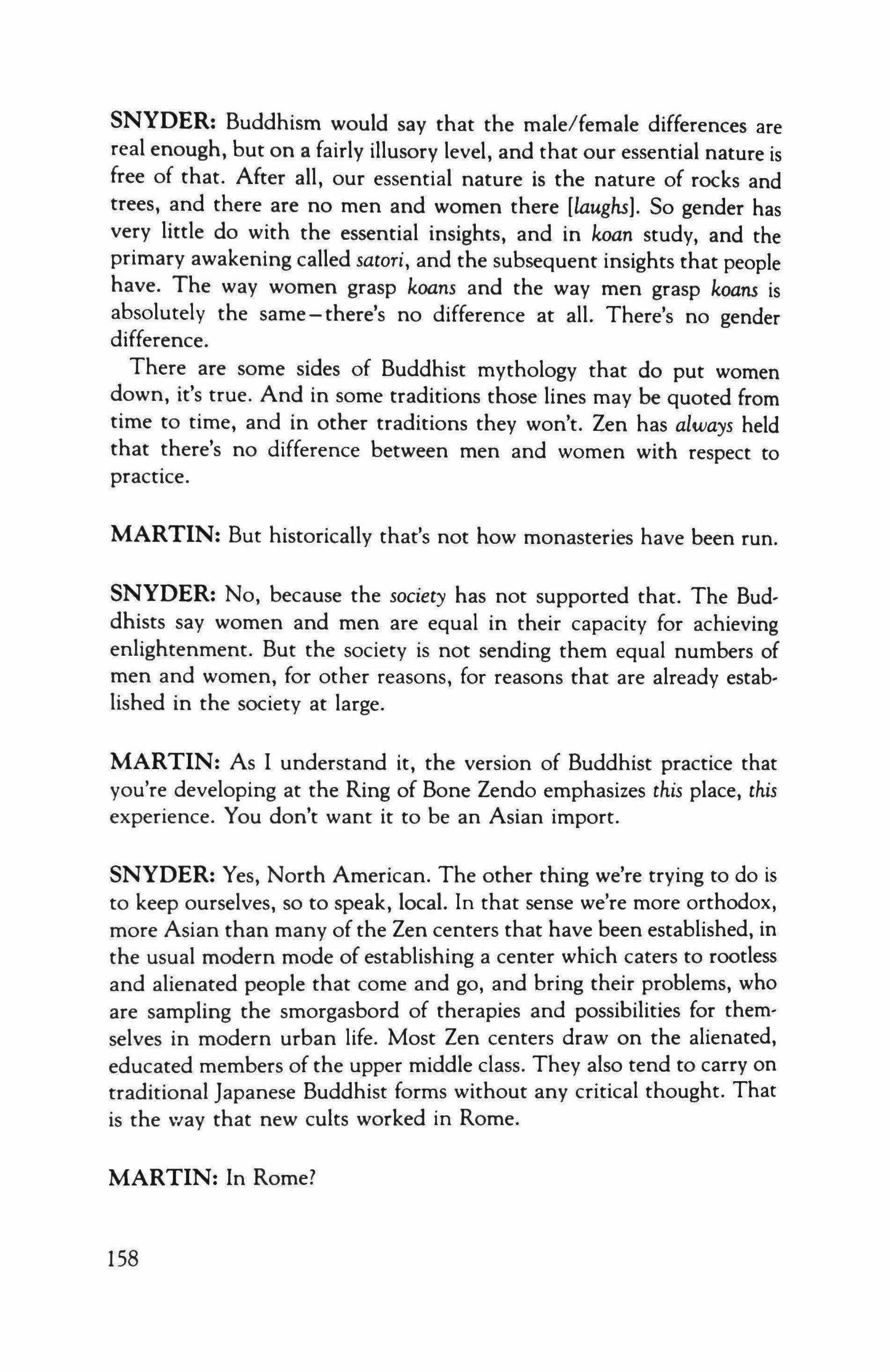
SNYDER: Buddhism would say that the male/female differences are real enough, but on a fairly illusory level, and that our essential nature is free of that. After all, our essential nature is the nature of rocks and trees, and there are no men and women there [laughs]. So gender has very little do with the essential insights, and in koan study, and the primary awakening called satori, and the subsequent insights that people have. The way women grasp koans and the way men grasp koans is absolutely the same-there's no difference at all. There's no gender difference.
There are some sides of Buddhist mythology that do put women down, it's true. And in some traditions those lines may be quoted from time to time, and in other traditions they won't. Zen has always held that there's no difference between men and women with respect to practice.
MARTIN: But historically that's not how monasteries have been run.
SNYDER: No, because the society has not supported that. The Buddhists say women and men are equal in their capacity for achieving enlightenment. But the society is not sending them equal numbers of men and women, for other reasons, for reasons that are already established in the society at large.
MARTIN: As I understand it, the version of Buddhist practice that you're developing at the Ring of Bone Zendo emphasizes this place, this experience. You don't want it to be an Asian import.
SNYDER: Yes, North American. The other thing we're trying to do is to keep ourselves, so to speak, local. In that sense we're more orthodox, more Asian than many of the Zen centers that have been established, in the usual modern mode of establishing a center which caters to rootless and alienated people that come and go, and bring their problems, who are sampling the smorgasbord of therapies and possibilities for themselves in modern urban life. Most Zen centers draw on the alienated, educated members of the upper middle class. They also tend to carryon traditional Japanese Buddhist forms without any critical thought. That is the way that new cults worked in Rome.
MARTIN: In Rome?
158
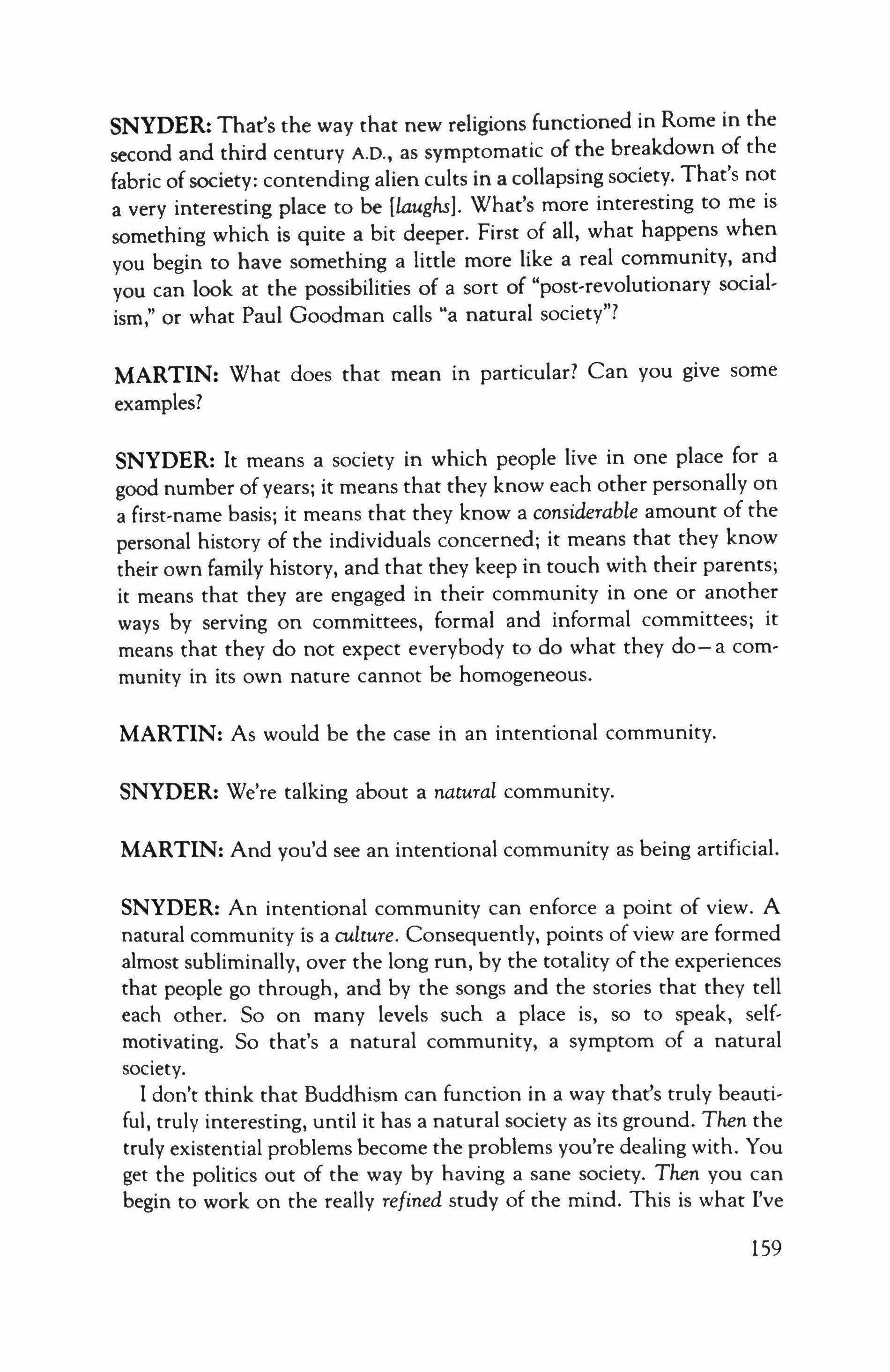
SNYDER: That's the way that new religions functioned in Rome in the second and third century A.D., as symptomatic of the breakdown of the fabric of society: contending alien cults in a collapsing society. That's not a very interesting place to be (laughs]. What's more interesting to me is something which is quite a bit deeper. First of all, what happens when you begin to have something a little more like a real community, and you can look at the possibilities of a sort of "post-revolutionary socialism," or what Paul Goodman calls "a natural society"?
MARTIN: What does that mean in particular? Can you give some examples?
SNYDER: It means a society in which people live in one place for a good number of years; it means that they know each other personally on a first-name basis; it means that they know a considerable amount of the personal history of the individuals concerned; it means that they know their own family history, and that they keep in touch with their parents; it means that they are engaged in their community in one or another ways by serving on committees, formal and informal committees; it means that they do not expect everybody to do what they do-a community in its own nature cannot be homogeneous.
MARTIN: As would be the case in an intentional community.
SNYDER: We're talking about a natural community.
MARTIN: And you'd see an intentional community as being artificial.
SNYDER: An intentional community can enforce a point of view. A natural community is a culture. Consequently, points of view are formed almost subliminally, over the long run, by the totality of the experiences that people go through, and by the songs and the stories that they tell each other. So on many levels such a place is, so to speak, selfmotivating. So that's a natural community, a symptom of a natural society.
I don't think that Buddhism can function in a way that's truly beautiful, truly interesting, until it has a natural society as its ground. Then the truly existential problems become the problems you're dealing with. You get the politics out of the way by having a sane society. Then you can begin to work on the really refined study of the mind. This is what I've
159
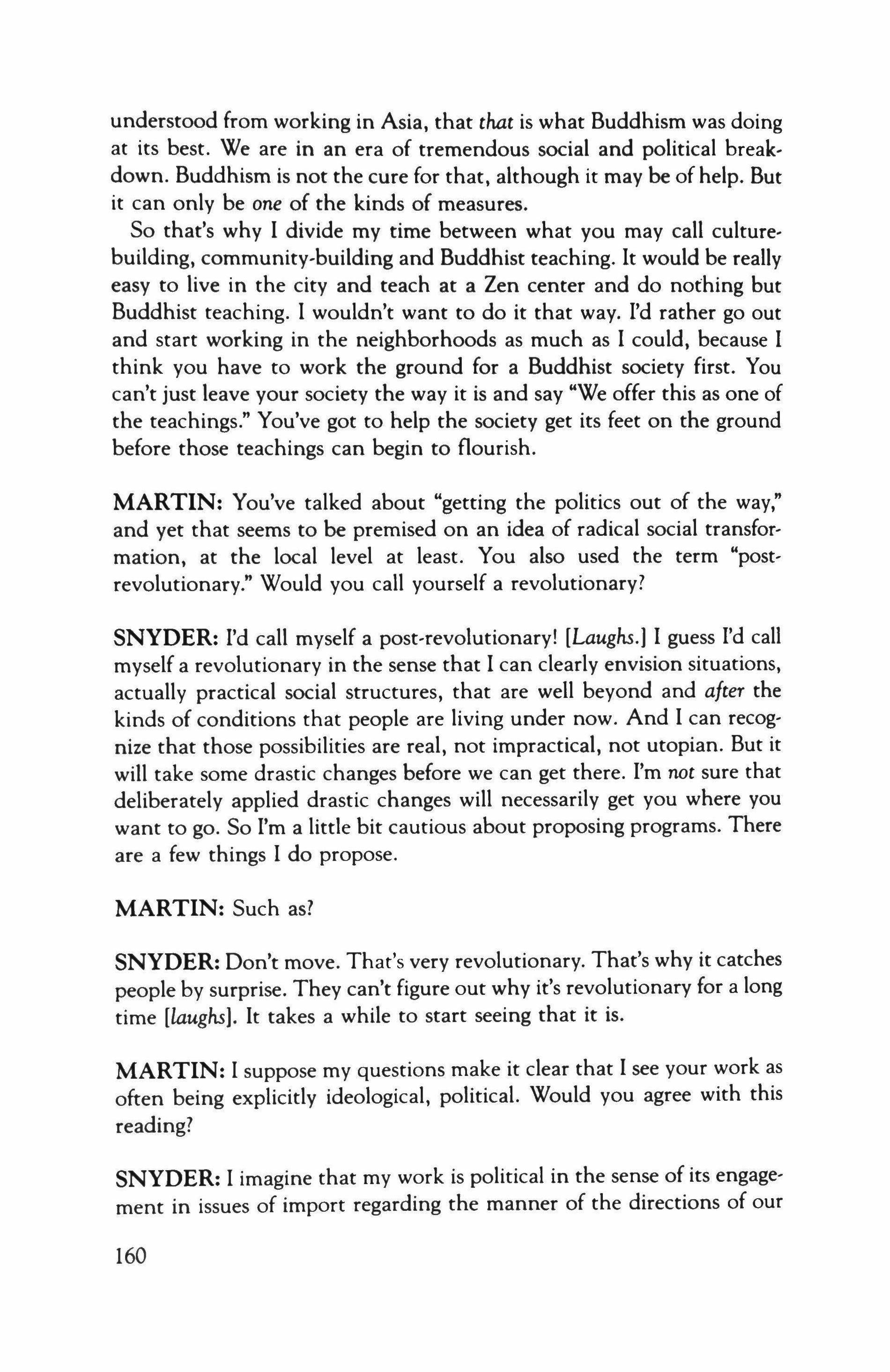
understood from working in Asia, that that is what Buddhism was doing at its best. We are in an era of tremendous social and political breakdown. Buddhism is not the cure for that, although it may be of help. But it can only be one of the kinds of measures.
So that's why I divide my time between what you may call culturebuilding, community-building and Buddhist teaching. It would be really easy to live in the city and teach at a Zen center and do nothing but Buddhist teaching. I wouldn't want to do it that way. I'd rather go out and start working in the neighborhoods as much as I could, because I think you have to work the ground for a Buddhist society first. You can't just leave your society the way it is and say "We offer this as one of the teachings." You've got to help the society get its feet on the ground before those teachings can begin to flourish.
MARTIN: You've talked about "getting the politics out of the way," and yet that seems to be premised on an idea of radical social transformation, at the local level at least. You also used the term "postrevolutionary." Would you call yourself a revolutionary?
SNYDER: I'd call myself a post-revolutionary! [Laughs.] I guess I'd call myself a revolutionary in the sense that I can clearly envision situations, actually practical social structures, that are well beyond and after the kinds of conditions that people are living under now. And I can recognize that those possibilities are real, not impractical, not utopian. But it will take some drastic changes before we can get there. I'm not sure that deliberately applied drastic changes will necessarily get you where you want to go. So I'm a little bit cautious about proposing programs. There are a few things I do propose.
MARTIN: Such as?
SNYDER: Don't move. That's very revolutionary. That's why it catches people by surprise. They can't figure out why it's revolutionary for a long time [laughs). It takes a while to start seeing that it is.
MARTIN: I suppose my questions make it clear that I see your work as often being explicitly ideological, political. Would you agree with this reading?
SNYDER: I imagine that my work is political in the sense of its engagement in issues of import regarding the manner of the directions of our
160
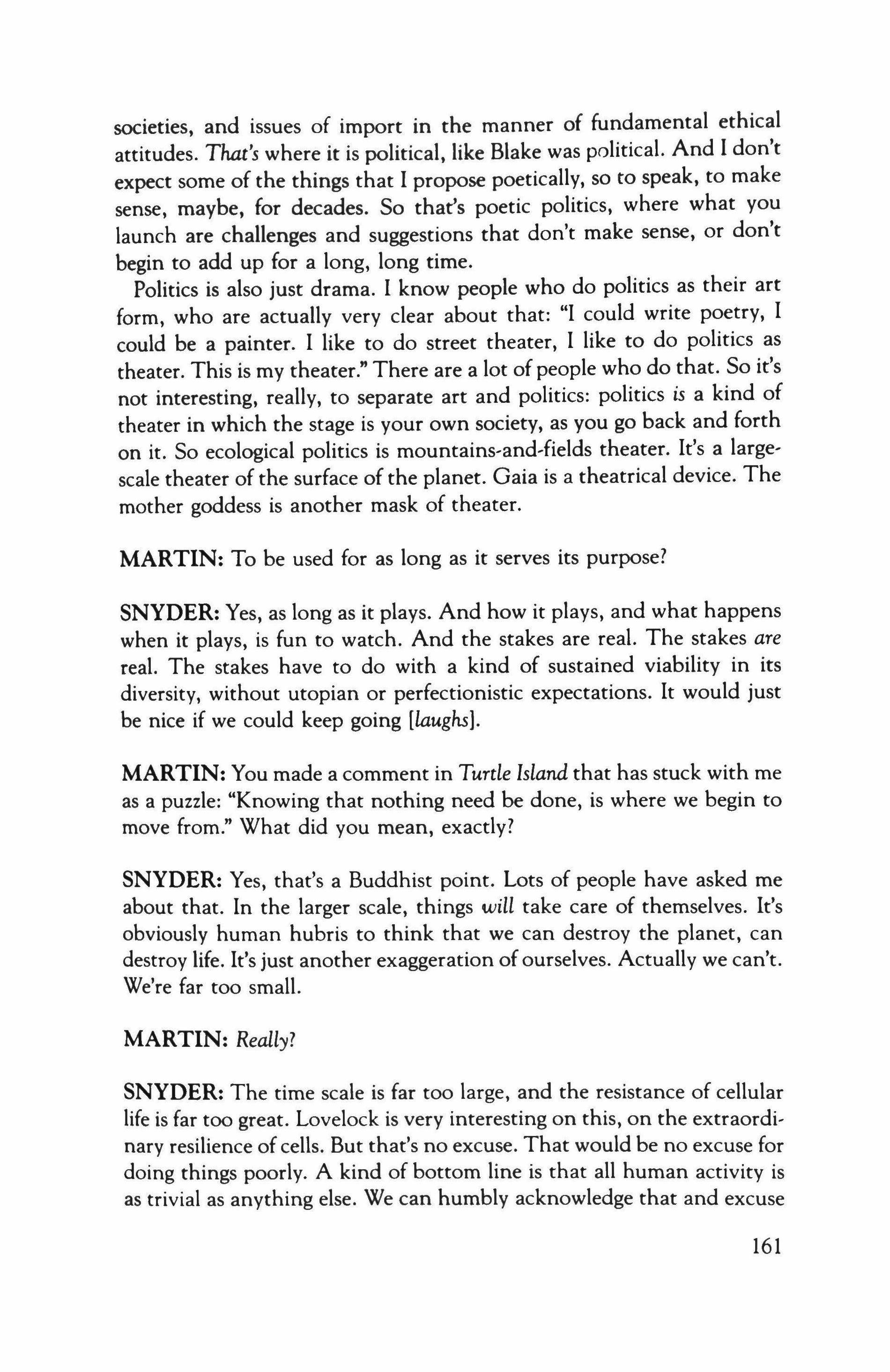
societies, and issues of import in the manner of fundamental ethical attitudes. That's where it is political, like Blake was political. And 1 don't expect some of the things that 1 propose poetically, so to speak, to make sense, maybe, for decades. So that's poetic politics, where what you launch are challenges and suggestions that don't make sense, or don't begin to add up for a long, long time.
Politics is also just drama. 1 know people who do politics as their art form, who are actually very clear about that: "I could write poetry, I could be a painter. 1 like to do street theater, I like to do politics as theater. This is my theater." There are a lot of people who do that. So it's not interesting, really, to separate art and politics: politics is a kind of theater in which the stage is your own society, as you go back and forth on it. So ecological politics is mountains-and-fields theater. It's a largescale theater of the surface of the planet. Gaia is a theatrical device. The mother goddess is another mask of theater.
MARTIN: To be used for as long as it serves its purpose?
SNYDER: Yes, as long as it plays. And how it plays, and what happens when it plays, is fun to watch. And the stakes are real. The stakes are real. The stakes have to do with a kind of sustained viability in its diversity, without utopian or perfectionistic expectations. It would just be nice if we could keep going [laughs].
MARTIN: You made a comment in Turtle Island that has stuck with me as a puzzle: "Knowing that nothing need be done, is where we begin to move from." What did you mean, exactly?
SNYDER: Yes, that's a Buddhist point. Lots of people have asked me about that. In the larger scale, things will take care of themselves. It's obviously human hubris to think that we can destroy the planet, can destroy life. It's just another exaggeration ofourselves. Actually we can't. We're far too small.
MARTIN: Really?
SNYDER: The time scale is far too large, and the resistance of cellular life is far too great. Lovelock is very interesting on this, on the extraordinary resilience ofcells. But that's no excuse. That would be no excuse for doing things poorly. A kind of bottom line is that all human activity is as trivial as anything else. We can humbly acknowledge that and excuse
161
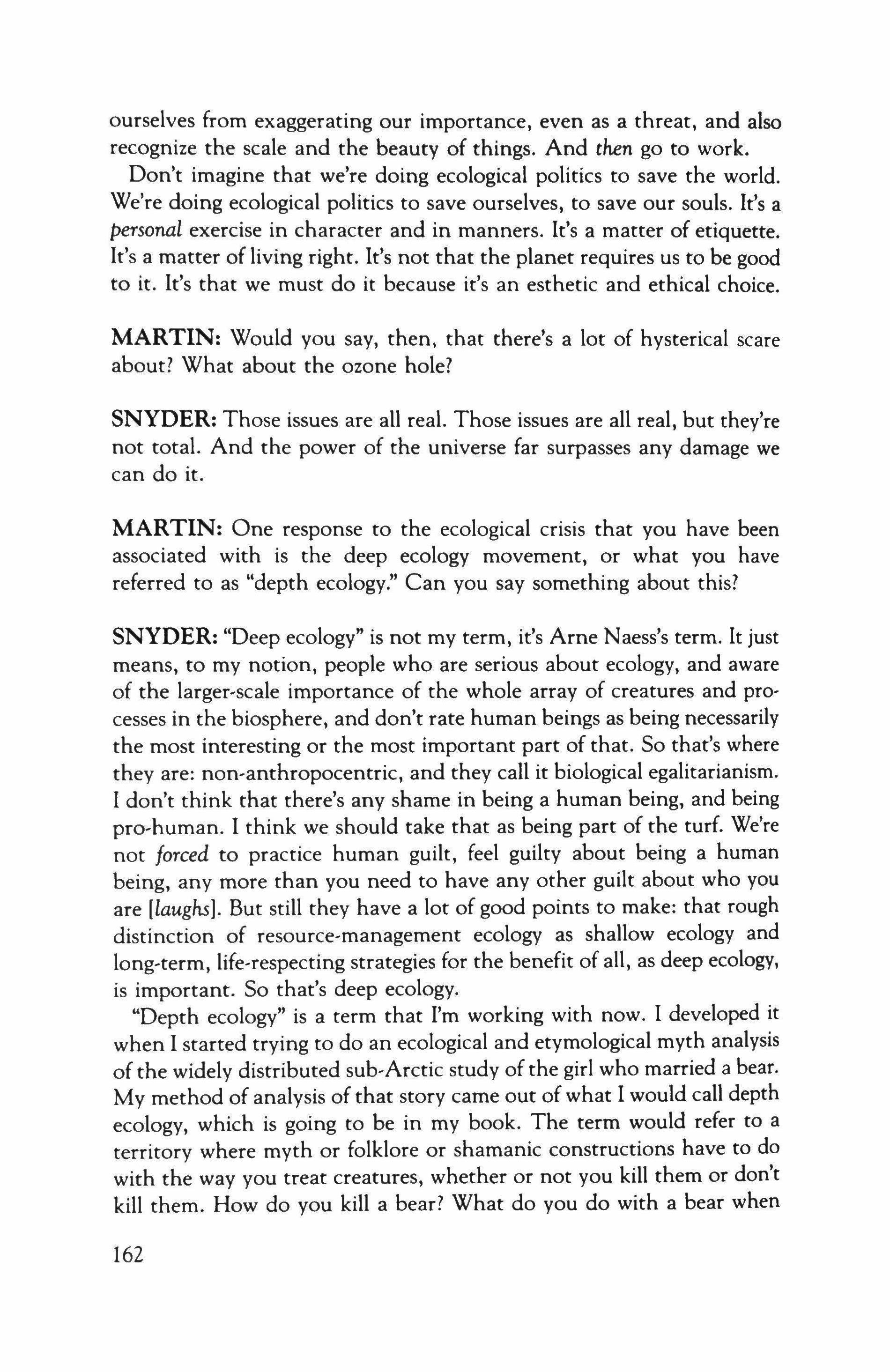
ourselves from exaggerating our importance, even as a threat, and also recognize the scale and the beauty of things. And then go to work. Don't imagine that we're doing ecological politics to save the world. We're doing ecological politics to save ourselves, to save our souls. It's a personal exercise in character and in manners. It's a matter of etiquette. It's a matter of living right. It's not that the planet requires us to be good to it. It's that we must do it because it's an esthetic and ethical choice.
MARTIN: Would you say, then, that there's a lot of hysterical scare about? What about the ozone hole?
SNYDER: Those issues are all real. Those issues are all real, but they're not total. And the power of the universe far surpasses any damage we can do it.
MARTIN: One response to the ecological crisis that you have been associated with is the deep ecology movement, or what you have referred to as "depth ecology." Can you say something about this?
SNYDER: "Deep ecology" is not my term, it's Arne Naess's term. It just means, to my notion, people who are serious about ecology, and aware of the larger-scale importance of the whole array of creatures and processes in the biosphere, and don't rate human beings as being necessarily the most interesting or the most important part of that. So that's where they are: non-anthropocentric, and they call it biological egalitarianism. I don't think that there's any shame in being a human being, and being pro-human. I think we should take that as being part of the turf. We're not forced to practice human guilt, feel guilty about being a human being, any more than you need to have any other guilt about who you are [laughs]. But still they have a lot of good points to make: that rough distinction of resource-management ecology as shallow ecology and long-term, life-respecting strategies for the benefit of all, as deep ecology, is important. So that's deep ecology.
"Depth ecology" is a term that I'm working with now. I developed it when I started trying to do an ecological and etymological myth analysis of the widely distributed sub-Arctic study of the girl who married a bear. My method of analysis of that story came out of what I would call depth ecology, which is going to be in my book. The term would refer to a territory where myth or folklore or shamanic constructions have to do with the way you treat creatures, whether or not you kill them or don't kill them. How do you kill a bear? What do you do with a bear when
162
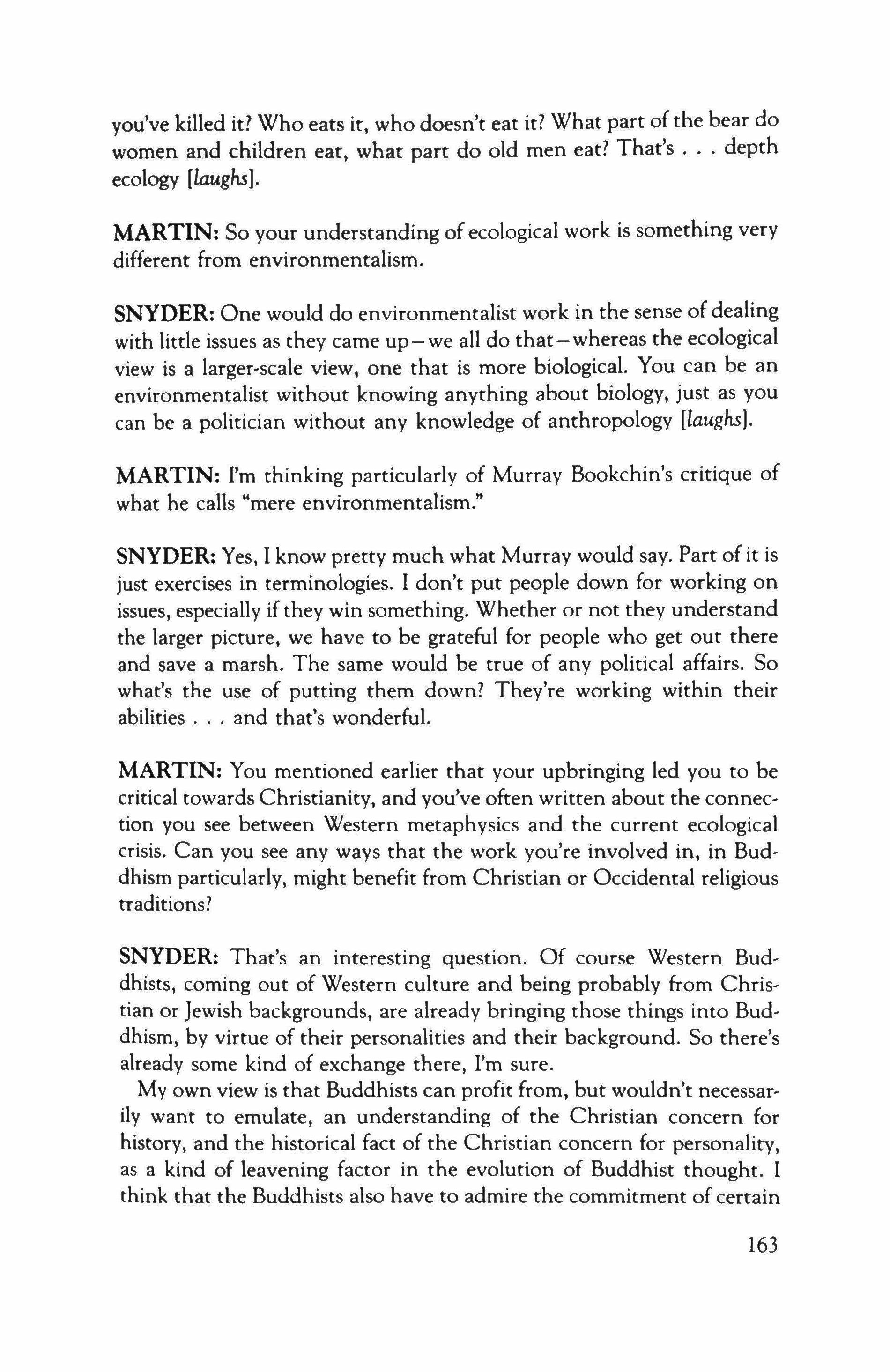
you've killed it? Who eats it, who doesn't eat it? What part of the bear do women and children eat, what part do old men eat? That's depth ecology [laughs).
MARTIN: So your understanding ofecological work is something very different from environmentalism.
SNYDER: One would do environmentalist work in the sense of dealing with little issues as they came up-we all do that-whereas the ecological view is a larger-scale view, one that is more biological. You can be an environmentalist without knowing anything about biology, just as you can be a politician without any knowledge of anthropology [laughs).
MARTIN: I'm thinking particularly of Murray Bookchin's critique of what he calls "mere environmentalism."
SNYDER: Yes, I know pretty much what Murray would say. Part of it is just exercises in terminologies. I don't put people down for working on issues, especially ifthey win something. Whether or not they understand the larger picture, we have to be grateful for people who get out there and save a marsh. The same would be true of any political affairs. So what's the use of putting them down? They're working within their abilities and that's wonderful.
MARTIN: You mentioned earlier that your upbringing led you to be critical towards Christianity, and you've often written about the connection you see between Western metaphysics and the current ecological crisis. Can you see any ways that the work you're involved in, in Buddhism particularly, might benefit from Christian or Occidental religious traditions?
SNYDER: That's an interesting question. Of course Western Buddhists, coming out of Western culture and being probably from Christian or Jewish backgrounds, are already bringing those things into Buddhism, by virtue of their personalities and their background. So there's already some kind of exchange there, I'm sure.
My own view is that Buddhists can profit from, but wouldn't necessarily want to emulate, an understanding of the Christian concern for history, and the historical fact of the Christian concern for personality, as a kind of leavening factor in the evolution of Buddhist thought. I think that the Buddhists also have to admire the commitment of certain
163

Christian sects, such as the Quakers, to peace, and the Christian idea of witness and bearing witness as a matter of conscience. It has its pitfalls from a Buddhist standpoint, pitfalls of over ego-stimulation. But that side of Christian engagement is admirable. It certainly can be learned from. Buddhists can learn from, or at least take note of, the section of the Church that is doing liberation theology. Buddhism has been quiescent, socially, for much of its history, and what and how it becomes more active in the social sphere is going to be very interesting. I'm sure it will, because in the West everybody gets more social. And also the power makes a difference: political action, political involvement, makes a difference in a pluralistic democracy, whereas in a traditional Asian culture there's very little direct political action possible.
MARTIN: Would you see your work as a counter to that traditional quiescence?
SNYDER: Yes, well what I see is an interesting vision proposed by Mahayana Buddhism that hasn't been acted out much, hasn't been actualized much. I think that it may be the destiny for Western Buddhists to try to make the effort of actualizing what Buddhists say they can do in terms of actual life in society.
MARTIN: Can you be more specific?
SNYDER: Part of the actualization of Buddhist ethics is, in a sense, to be a deep ecologist. The actualization of Buddhist insights gives us a Buddhist economics, an economics not based on greed but on need, an ethic of adequacy but simplicity, a valuation of personal insight and personal experience over possessions. What I like most about Buddhism really is its fearlessness. So much of what warps people is fear of death and fear of impermanence. So much of what we do is simply strategies to try and hold back death, trying to buy time with material things. So at its best Buddhism provides people with a way of seeing their own frailty: you need less in the way of material objects and fortresses around yourself.
MARTIN: I'd like to talk about what you meant in Turtle Island by the phrase "bringing a voice from the Wilderness, my constituency." What does this say about your role as Buddhist, ecologist, poet? You've written elsewhere about correspondences between "wilderness" and "the uncon" SCIOUS.
164

SNYDER: I think I'd just like to leave that because as an image it generates enough as it is. It's something that is quite adequate, once suggested.
MARTIN: It finds its own way? O.K. Perhaps we can just talk about "voice." In Regarding Wave the central metaphors, as I see it, derive from images associated with the goddess Yak, or Voice. Is the concept of Yak, or "the voice of the Dharma," still useful to you now?
SNYDER: Yak is just another way for referring to speech. I haven't done anything further with Sanskrit language theory or mantra theory. In Buddhism, though, they say the sense of hearing, the vehicle of sound, is the clearest and easiest and most appropriate vehicle for enlightenment. We proceed to learn from the sense of sound better than from any other sense, in the very specific terms of Zen enlightenment. So that's why Kuan Yin's name means "observe the sounds." That's very clearly stated in Vajrayana mythology. It also says that the present kalpa is presided over by Amitabha, whose color is red and who resides in the West. Amitabha's active compassion emanation in the material universe is Avalokiteshvara, "observe the sound, learn by hearing" [laughs]. And that's exactly what happens: sound is essentially your path in. It's a different point, although it's related, that literature and poetry are fundamentally oral, because language is oral, and writing is secondary. I understand that some of the French intelligentsia don't believe that, but they really have it backwards. In fact one of Derrida's biggest weaknesses is his insistence on theorizing from written texts. A whole lot of what he's trying to say falls apart if you go back to orality. There's a Jesuit teacher who's written on this
MARTIN: Walter Ong, Orality and Literacy? He does mention Deconstruction near the end.
SNYDER: Yes, that's it.
MARTIN: If, as Taoism at least proposes, "The Way which can be spoken is not the Way," how (or why) write poems (or even sing them)? Can you say something about what seems to be the paradox of composing a Zen poem: how to give expression to an experience which is pre-symbolic, pre-verbal?
165
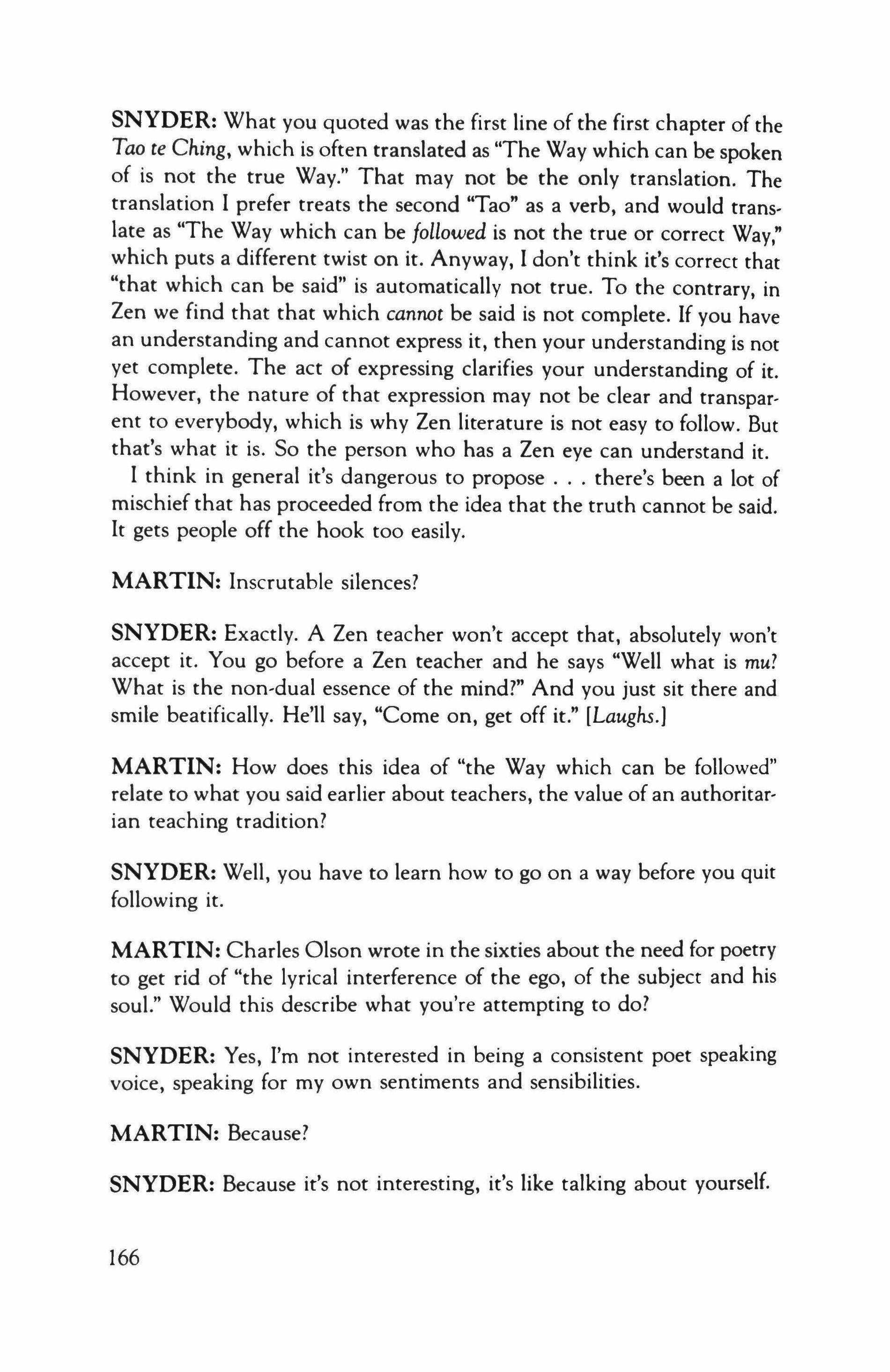
SNYDER: What you quoted was the first line of the first chapter of the Tao re Ching, which is often translated as "The Way which can be spoken of is not the true Way." That may not be the only translation. The translation I prefer treats the second "Tao" as a verb, and would translate as "The Way which can be followed is not the true or correct Way," which puts a different twist on it. Anyway, I don't think it's correct that "that which can be said" is automatically not true. To the contrary, in Zen we find that that which cannot be said is not complete. If you have an understanding and cannot express it, then your understanding is not yet complete. The act of expressing clarifies your understanding of it. However, the nature of that expression may not be clear and transparent to everybody, which is why Zen literature is not easy to follow. But that's what it is. So the person who has a Zen eye can understand it. I think in general it's dangerous to propose there's been a lot of mischief that has proceeded from the idea that the truth cannot be said. It gets people off the hook too easily.
MARTIN: Inscrutable silences?
SNYDER: Exactly. A Zen teacher won't accept that, absolutely won't accept it. You go before a Zen teacher and he says "Well what is mu? What is the non-dual essence of the mind?" And you just sit there and smile beatifically. He'll say, "Come on, get off it." [Laughs.]
MARTIN: How does this idea of "the Way which can be followed" relate to what you said earlier about teachers, the value of an authoritarian teaching tradition?
SNYDER: Well, you have to learn how to go on a way before you quit following it.
MARTIN: Charles Olson wrote in the sixties about the need for poetry to get rid of "the lyrical interference of the ego, of the subject and his soul." Would this describe what you're attempting to do?
SNYDER: Yes, I'm not interested in being a consistent poet speaking voice, speaking for my own sentiments and sensibilities.
MARTIN: Because?
SNYDER: Because it's not interesting, it's like talking about yourself.
166

MARTIN: And what is interesting?
SNYDER: Talking about your non-self! [Laughs.] When a bird flies across from one tree to another tree, you can be the bird flying across from one tree to another tree. You don't have to think about the bird, how you feel about the bird. No difference between self and universe. So just shortcut that illusion.
MARTIN: But "self" informs the way you read the bird.
SNYDER: But you don't have to encourage it. Which isn't to say that sometimes poems aren't written in the first person. The point is not to let yourselfbe the main character of what you're thinking. If the sense of self is too narrowly located, then people sound like they're talking about themselves all the time.
MARTIN: Do you evolve conscious strategies other than your formal Zen practice for developing this sort of attitude?
SNYDER: Zen practice is not limited to sitting on a cushion in a zendo. That becomes a habit of life, that's true.
MARTIN: The poem "What Have I Learned" describes a lifetime's knowledge of how to use certain "tools." It's clear that the term means many things in this context: "What have I learned / but the proper use for several tools " Can you say more about this?
SNYDER: I was thinking of such tools as language, the library
MARTIN: Your word processor?
SNYDER: No, more general: the whole fact of the stored body of information which is accessible to us at any time-you go up to the library-which means all of the referencing and information research skills.
MARTIN: The poem refers to "passing it on." Is that what you see yourself passing on?
SNYDER: Not quite exactly. What one hopes to pass along is the living experience of being in each moment.
167
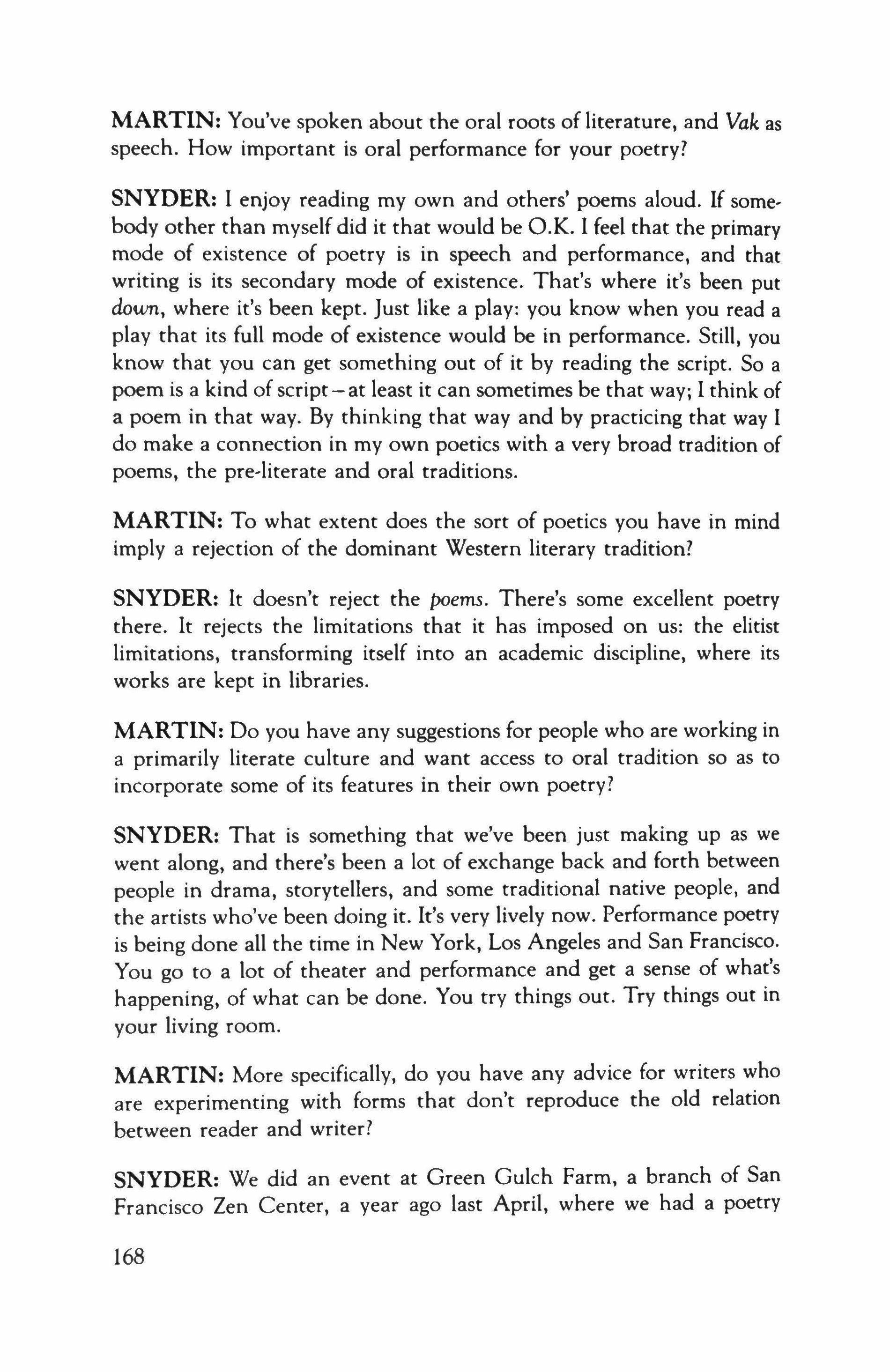
MARTIN: You've spoken about the oral roots of literature, and Yak as speech. How important is oral performance for your poetry?
SNYDER: I enjoy reading my own and others' poems aloud. If somebody other than myself did it that would be O.K. I feel that the primary mode of existence of poetry is in speech and performance, and that writing is its secondary mode of existence. That's where it's been put down, where it's been kept. Just like a play: you know when you read a play that its full mode of existence would be in performance. Still, you know that you can get something out of it by reading the script. So a poem is a kind of script - at least it can sometimes be that way; I think of a poem in that way. By thinking that way and by practicing that way I do make a connection in my own poetics with a very broad tradition of poems, the pre-literate and oral traditions.
MARTIN: To what extent does the sort of poetics you have in mind imply a rejection of the dominant Western literary tradition?
SNYDER: It doesn't reject the poems. There's some excellent poetry there. It rejects the limitations that it has imposed on us: the elitist limitations, transforming itself into an academic discipline, where its works are kept in libraries.
MARTIN: Do you have any suggestions for people who are working in a primarily literate culture and want access to oral tradition so as to incorporate some of its features in their own poetry?
SNYDER: That is something that we've been just making up as we went along, and there's been a lot of exchange back and forth between people in drama, storytellers, and some traditional native people, and the artists who've been doing it. It's very lively now. Performance poetry is being done all the time in New York, Los Angeles and San Francisco. You go to a lot of theater and performance and get a sense of what's happening, of what can be done. You try things out. Try things out in your living room.
MARTIN: More specifically, do you have any advice for writers who are experimenting with forms that don't reproduce the old relation between reader and writer?
SNYDER: We did an event at Green Gulch Farm, a branch of San Francisco Zen Center, a year ago last April, where we had a poetry
168

creation right in the zendo, with a great deal of randomness and unpredictability, it la John Cage. It's fun, but it's not memorable. The writerreader is the singer-hearer relationship. Traditionally you break down the line between the singer and the hearers with responses or choruses where people join in the chorus, sing together. There's a play that goes back and forth between the singer and the hearers, with the singer or singers who occupy the central territory invading the territory of the audience, including the audience in their territory and then backing out again. I have no problem with that. I have no problem with the singerhearer, reader-writer relationship. It's a voluntary association. Nobody is forced to be a reader or a hearer and so I would not call it a model of oppression. You can walk out if you want to. In fact it has a good freemarket analogy. It's the market: pay and enjoy, or don't buy. You go down the alleys and lanes of a fair, and you go in to find which jugglers you want to see. The writer or the artist has no complaint. People either come to hear her wares or they don't.
MARTIN: With the free-market analogy in mind, how would you respond to the criticism that your work tends to be too esoteric, too dependent on allusions that most readers will not get?
SNYDER: Some does, some doesn't. Some of my writing is more esoteric, some is less. I try to put in something for everybody.
MARTIN: And who is your audience?
SNYDER: The primary audience is people born since 1925, living in California, Oregon, Washington, British Columbia and Alaska.
MARTIN: That's pretty regional.
SNYDER: That's primary. That's where the people live who can get a sense of what the inside levels are. People can read it in other places, but they'll miss some.
MARTIN: Why that date?
SNYDER: Because that's when the zeitgeist becomes the zeitgeist of this particular zeit [laughs) that's this zeit, this time frame.
MARTIN: I was recently reading the poem "Front Lines" with some of my students in South Africa, most of whom were born in the sixties. I
169

told them I was going to be seeing you, and asked if I should pass on any questions. [Snyder laughs loudly.) After a highly charged account of ecosocial exploitation, the poem ends with the words"And here we must draw / our line." The students' response was "That's fine. But if we accept your critique, what do we do?"
SNYDER: Well the bio-regional program is very good. That is the one that says "First, don't move, and second, find out what that teaches you." It means you have to learn local history, local economics: not just in the abstract, but as it affects you locally. You're asking "How are we related to the economy exactly, detail by detail?" I know exactly how much gravel is worth. I know how the price of timber has fluctuated over the last fifteen years. There are a lot of instructive things you learn about how you're related to the economy. I can't know what South African students are faced with, but if they feel they have a right to be where they are at all, then they should be there and they should take it on as a serious obligation. They should think up where they want to raise their children, and then they should provide a place for their children. That doesn't necessarily mean in the country. A few things then: one is place, one is your mind. That means meditation in one form or another, as a nonstressful, nonhystericallifetime process, just a habit of life. A third thing is to have a craft, have a skill, have one thing that you can do. If it's something you can do with your hands, all the better. Have a real skill, for the sake of yourself, and for the sake of others. Those are very fundamental. I would say that political sanity and engagement can in part come out of a curriculum like that. Not one hundred percent. If a person as a matter of career has chosen the life of a political warrior, then that involves some other kinds of action.
MARTIN: We were speaking this morning before the interview about pressure on writers to conform to ideological positions that are considered to be "politically correct." Would you mind repeating some of what you said?
SNYDER: It seems to me, by my (by no means thoroughly researched) historical information, that putting a high degree of importance on the fine points of doctrine, and on the idea of the correct line, the correct doctrine, comes into Occidental culture in a big way with the Catholic Church and its various councils in which it declared certain positions heretical or false. The importance that they placed on that, and the inability to accept these poetically different versions, or different aspects
170

of the same truth, and the continual seeking-our, arguing-out of doctrinal points has dominated much of Christian thought. This means that the possession of, or the adherence to, a correct line, now seems to take precedence over action or meditation or prayer, in a big way. I see it continuing right into the old Communist Party's paranoid obsession with the correct line, and you know radical movements today for which there can be no diversity regarding the line. It's what is going on right now with the feminists and deep ecologists and Murray Bookchin, all arguing about what's the vanguard and what's the right line. Murray Bookchin's main complaint is that he's not the vanguard. He wants to be the vanguard and he's mad because Earth First! is the vanguard, and so he has to criticize Earth First! all the time [laughs]. That is elevating the theory over the practice, and it need not be done that way. There are other ways to accomplish clarification of doctrine without being so intellectual or abstract about it. The whole thing is an Occidental neurosis.
MARTIN: At the same time there is surely a place for vigilance. Having grown up in South Africa, I'm aware of the possibilities for unwittingly internalizing the dominant ideology, while attempting to articulate something that is an alternative to it, which is outside it. Are you conscious of that in your work? Do you deliberately work against it?
SNYDER: Yes, I certainly try to watch out for it. It's a danger on the Buddhist level-I mean, that really is on the level of understanding what it is that's affecting you, understanding how you are shaped, under, standing what the deeper levels of your opinions and thoughts and feelings are. Those things are so unconscious. You also have to find out what the dominant ideology is, and how it changes. That's tricky. It isn't just that you set yourself against it, because if you set yourself too totally against it, you can't talk to it. If you don't understand how indoctrinated you are, then there's no communication possible. That takes a certain coyote-mind.
MARTIN: Trickster?
SNYDER: Yes, coyote-mind can understand both sides of a question anytime. Really understand them [laughs].
MARTIN: Is that a way of approaching Zen's non-dualism?
171
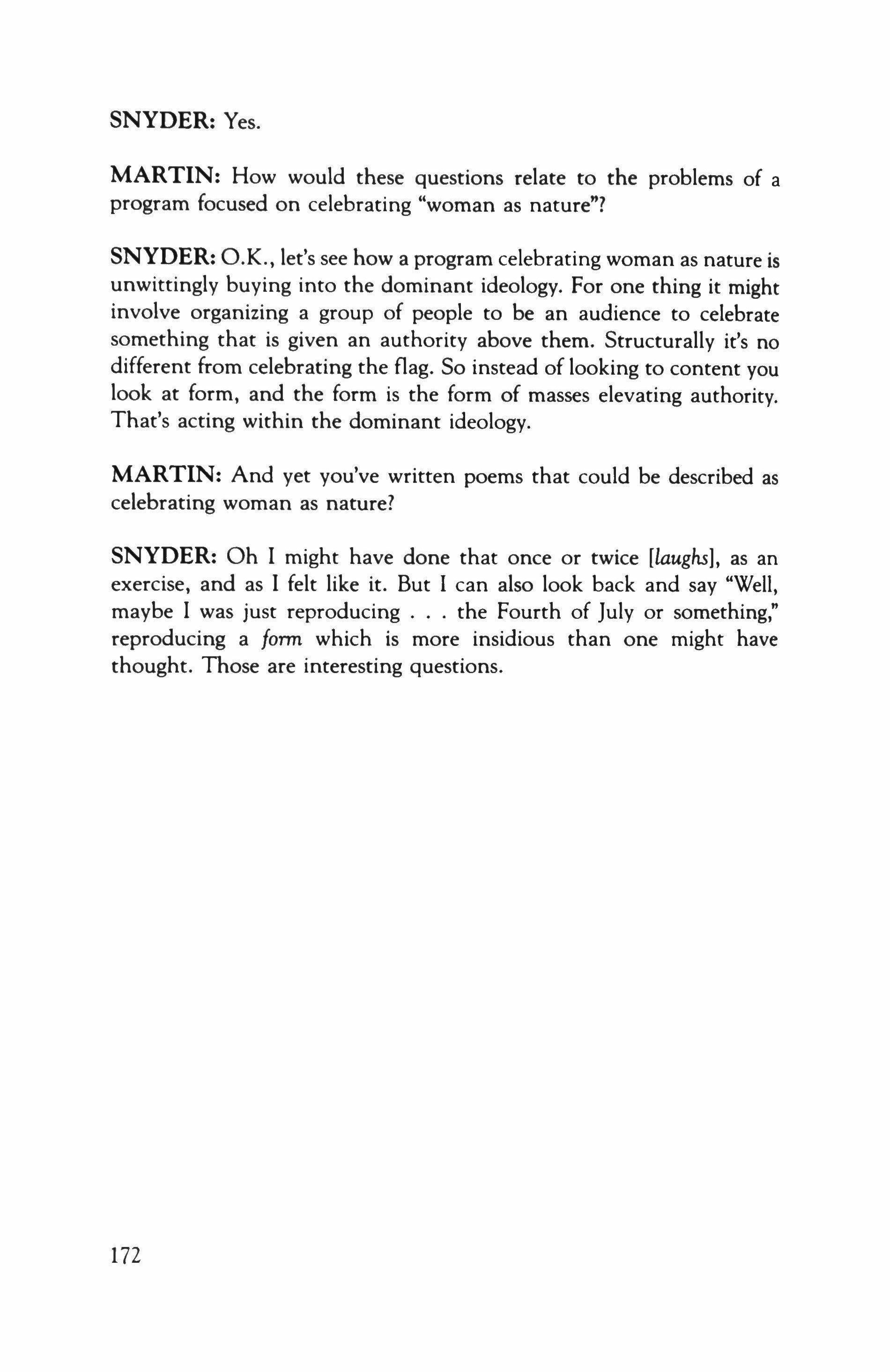
SNYDER: Yes.
MARTIN: How would these questions relate to the problems of a program focused on celebrating "woman as nature"?
SNYDER: O.K., let's see how a program celebrating woman as nature is unwittingly buying into the dominant ideology. For one thing it might involve organizing a group of people to be an audience to celebrate something that is given an authority above them. Structurally it's no different from celebrating the flag. So instead of looking to content you look at form, and the form is the form of masses elevating authority. That's acting within the dominant ideology.
MARTIN: And yet you've written poems that could be described as celebrating woman as nature?
SNYDER: Oh I might have done that once or twice [laughs), as an exercise, and as I felt like it. But I can also look back and say "Well, maybe I was just reproducing the Fourth of July or something," reproducing a form which is more insidious than one might have thought. Those are interesting questions.
172
Death and the Image
Jay Cantor
 for Stanley Cavell
for Stanley Cavell
In The World Viewed, the philosopher Stanley Cavell places Film in the volume marked Memory; for films, like memories, give us a world that is ours, yet that we are barred from entering. Memories, of course, may, on certain remarkable occasions, become vividly re-born as part of one's current telling; they enter us, reincarnated rich with anxiety and the demand that we change our lives, that we continue our narratives, in light of their questions, to a new momentary stopping point. But only some films are such inspired memories; others are that failed sort of memory called nostalgia. Nostalgia: because we think of the time we remember as a time we have survived; and, because we dream we have survived it - its challenges, its interrogations- we think we watch a history that is simply past, incapable of troubling us in the present. We are fond spectators of a calm time, lulling, purged of that constant momentto-moment anxiety for one's survival that edges each present moment with pain. It's as if the nostalgic film (both fiction and documentary) longs to attain the status of the snapshot, the perfect form, Kodak and Polaroid reassure me, for nostalgia, the past not as question, but as possession.
Sometimes I think that the continual consumption of such images become snapshots, in TV news, newspaper photos, magazine photoessays, films and videos, make us feel immortal; not alive as humans once were; and, like gods, not quite capable of death. One figure for this in my thinking is Patty Hearst's demonic kidnappers, who, when their not-so-safe house was surrounded, stayed inside, watching themselves on TV as the police burnt them up. I imagine they felt they couldn't
173
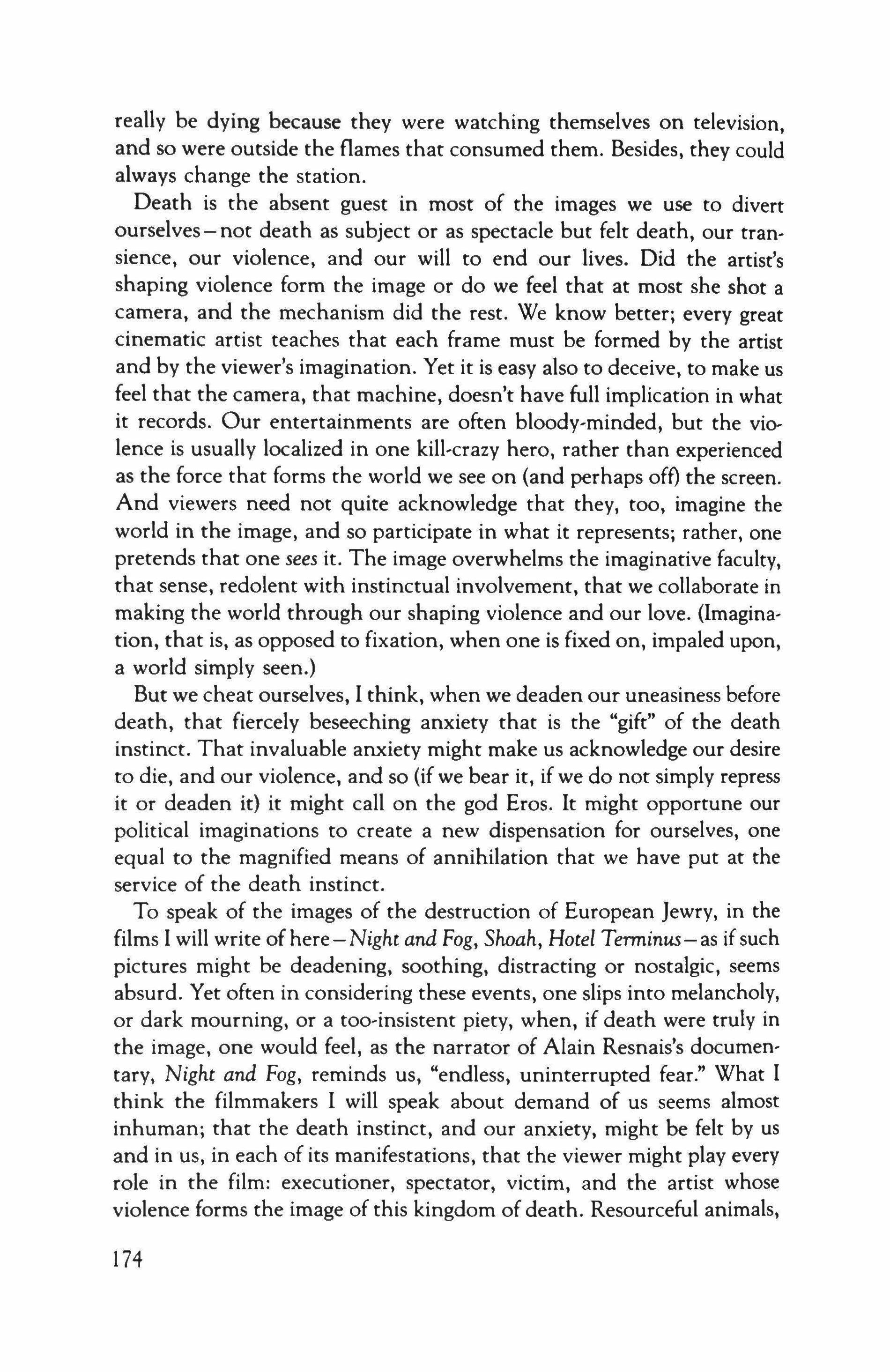
really be dying because they were watching themselves on television, and so were outside the flames that consumed them. Besides, they could always change the station.
Death is the absent guest in most of the images we use to divert ourselves - not death as subject or as spectacle but felt death, our transience, our violence, and our will to end our lives. Did the artist's shaping violence form the image or do we feel that at most she shot a camera, and the mechanism did the rest. We know better; every great cinematic artist teaches that each frame must be formed by the artist and by the viewer's imagination. Yet it is easy also to deceive, to make us feel that the camera, that machine, doesn't have full implication in what it records. Our entertainments are often bloody-minded, but the violence is usually localized in one kill-crazy hero, rather than experienced as the force that forms the world we see on (and perhaps off) the screen. And viewers need not quite acknowledge that they, too, imagine the world in the image, and so participate in what it represents; rather, one pretends that one sees it. The image overwhelms the imaginative faculty, that sense, redolent with instinctual involvement, that we collaborate in making the world through our shaping violence and our love. (Imagination, that is, as opposed to fixation, when one is fixed on, impaled upon, a world simply seen.)
But we cheat ourselves, I think, when we deaden our uneasiness before death, that fiercely beseeching anxiety that is the "gift" of the death instinct. That invaluable anxiety might make us acknowledge our desire to die, and our violence, and so (if we bear it, if we do not simply repress it or deaden it) it might call on the god Eros. It might opportune our political imaginations to create a new dispensation for ourselves, one equal to the magnified means of annihilation that we have put at the service of the death instinct.
To speak of the images of the destruction of European Jewry, in the films I will write of here-Night and Fog, Shoah, Hotel Tenninus-as ifsuch pictures might be deadening, soothing, distracting or nostalgic, seems absurd. Yet often in considering these events, one slips into melancholy, or dark mourning, or a too-insistent piety, when, if death were truly in the image, one would feel, as the narrator of Alain Resnais's documentary, Night and Fog, reminds us, "endless, uninterrupted fear." What I think the filmmakers I will speak about demand of us seems almost inhuman; that the death instinct, and our anxiety, might be felt by us and in us, in each of its manifestations, that the viewer might play every role in the film: executioner, spectator, victim, and the artist whose violence forms the image of this kingdom of death. Resourceful animals,
174
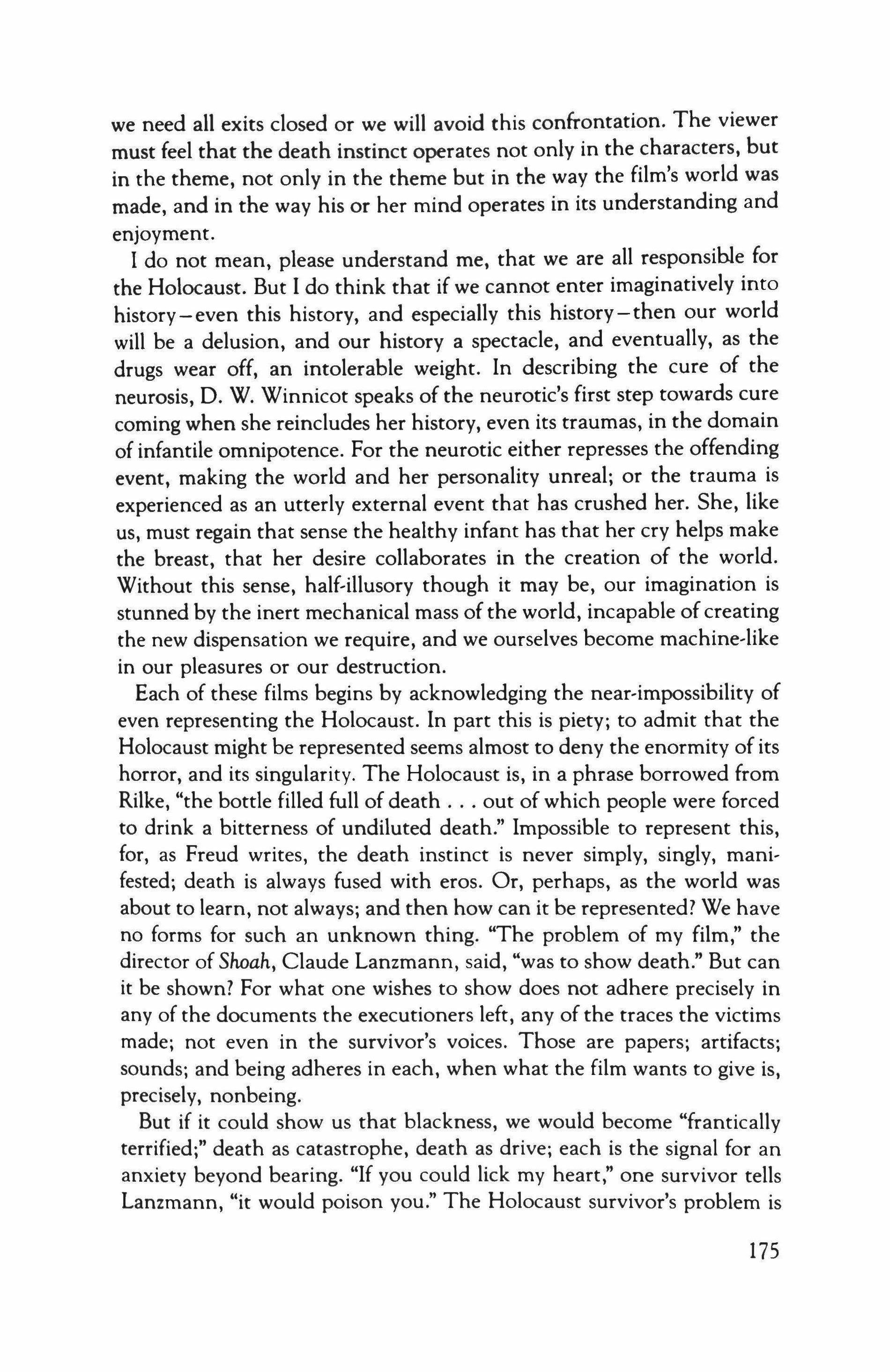
we need all exits closed or we will avoid this confrontation. The viewer must feel that the death instinct operates not only in the characters, but in the theme, not only in the theme but in the way the film's world was made, and in the way his or her mind operates in its understanding and enjoyment.
I do not mean, please understand me, that we are all responsible for the Holocaust. But I do think that if we cannot enter imaginatively into history-even this history, and especially this history-then our world will be a delusion, and our history a spectacle, and eventually, as the drugs wear off, an intolerable weight. In describing the cure of the neurosis, D. W. Winnicot speaks of the neurotic's first step towards cure coming when she reincludes her history, even its traumas, in the domain of infantile omnipotence. For the neurotic either represses the offending event, making the world and her personality unreal; or the trauma is experienced as an utterly external event that has crushed her. She, like us, must regain that sense the healthy infant has that her cry helps make the breast, that her desire collaborates in the creation of the world. Without this sense, half-illusory though it may be, our imagination is stunned by the inert mechanical mass of the world, incapable ofcreating the new dispensation we require, and we ourselves become machine-like in our pleasures or our destruction.
Each of these films begins by acknowledging the near-impossibility of even representing the Holocaust. In part this is piety; to admit that the Holocaust might be represented seems almost to deny the enormity of its horror, and its singularity. The Holocaust is, in a phrase borrowed from Rilke, "the bottle filled full of death out of which people were forced to drink a bitterness of undiluted death." Impossible to represent this, for, as Freud writes, the death instinct is never simply, singly, manifested; death is always fused with eros. Or, perhaps, as the world was about to learn, not always; and then how can it be represented? We have no forms for such an unknown thing. "The problem of my film," the director of Shoah, Claude Lanzmann, said, "was to show death." But can it be shown? For what one wishes to show does not adhere precisely in any of the documents the executioners left, any of the traces the victims made; not even in the survivor's voices. Those are papers; artifacts; sounds; and being adheres in each, when what the film wants to give is, precisely, nonbeing.
But if it could show us that blackness, we would become "frantically terrified;" death as catastrophe, death as drive; each is the signal for an anxiety beyond bearing. "If you could lick my heart," one survivor tells Lanzmann, "it would poison you." The Holocaust survivor's problem is
175
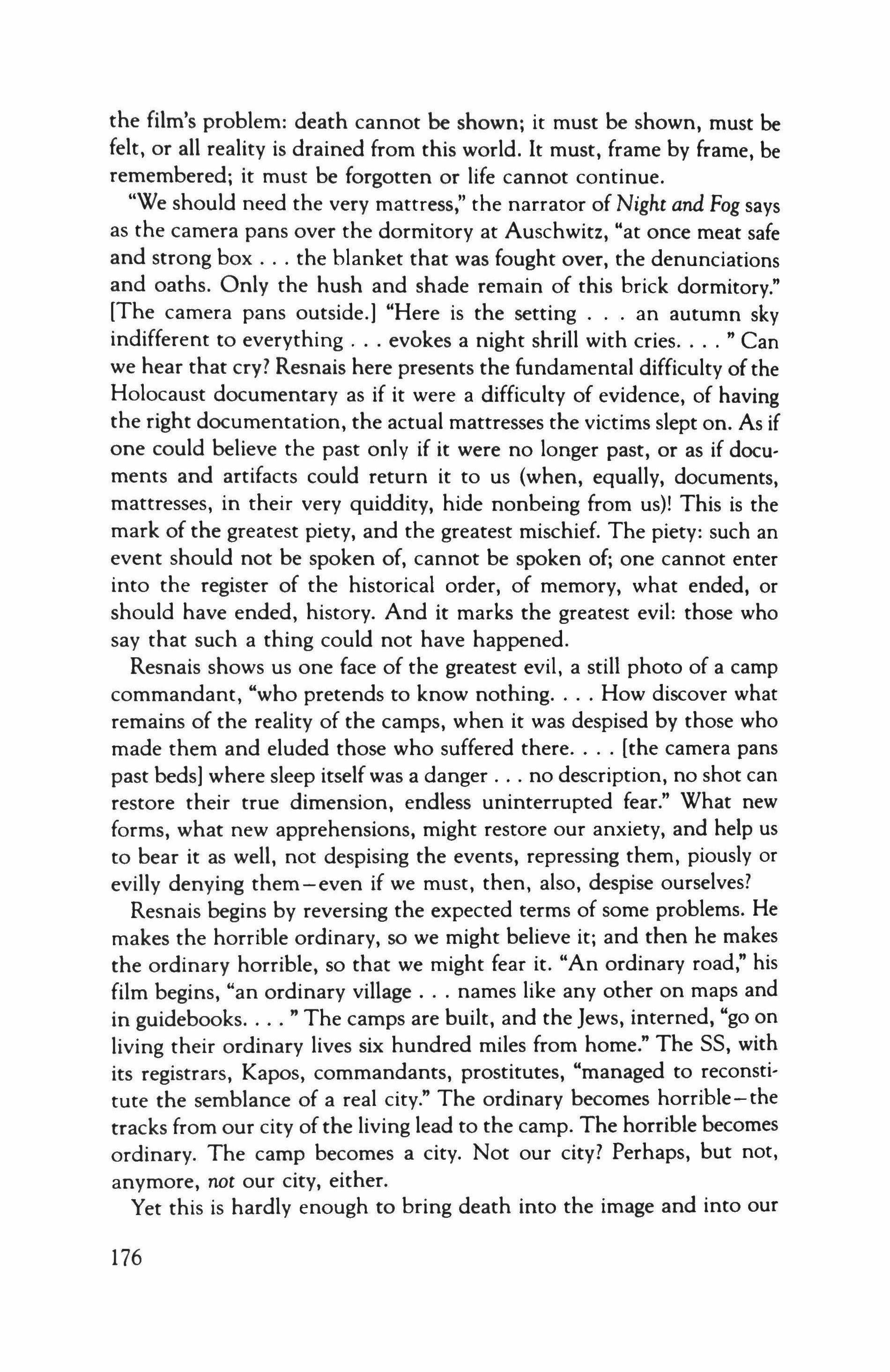
the film's problem: death cannot be shown; it must be shown, must be felt, or all reality is drained from this world. It must, frame by frame, be remembered; it must be forgotten or life cannot continue.
"We should need the very mattress," the narrator of Night and Fog says as the camera pans over the dormitory at Auschwitz, "at once meat safe and strong box the blanket that was fought over, the denunciations and oaths. Only the hush and shade remain of this brick dormitory." [The camera pans outside.) "Here is the setting an autumn sky indifferent to everything evokes a night shrill with cries Can we hear that cry? Resnais here presents the fundamental difficulty ofthe Holocaust documentary as if it were a difficulty of evidence, of having the right documentation, the actual mattresses the victims slept on. As if one could believe the past only if it were no longer past, or as if documents and artifacts could return it to us (when, equally, documents, mattresses, in their very quiddity, hide nonbeing from us)! This is the mark of the greatest piety, and the greatest mischief. The piety: such an event should not be spoken of, cannot be spoken of; one cannot enter into the register of the historical order, of memory, what ended, or should have ended, history. And it marks the greatest evil: those who say that such a thing could not have happened.
Resnais shows us one face of the greatest evil, a still photo of a camp commandant, "who pretends to know nothing How discover what remains of the reality of the camps, when it was despised by those who made them and eluded those who suffered there [the camera pans past beds) where sleep itself was a danger no description, no shot can restore their true dimension, endless uninterrupted fear." What new forms, what new apprehensions, might restore our anxiety, and help us to bear it as well, not despising the events, repressing them, piously or evilly denying them-even if we must, then, also, despise ourselves?
Resnais begins by reversing the expected terms of some problems. He makes the horrible ordinary, so we might believe it; and then he makes the ordinary horrible, so that we might fear it. "An ordinary road," his film begins, "an ordinary village names like any other on maps and in guidebooks The camps are built, and the Jews, interned, "go on living their ordinary lives six hundred miles from home." The SS, with its registrars, Kapos, commandants, prostitutes, "managed to reconstitute the semblance of a real city." The ordinary becomes horrible-the tracks from our city ofthe living lead to the camp. The horrible becomes ordinary. The camp becomes a city. Not our city? Perhaps, but not, anymore, not our city, either.
Yet this is hardly enough to bring death into the image and into our
176
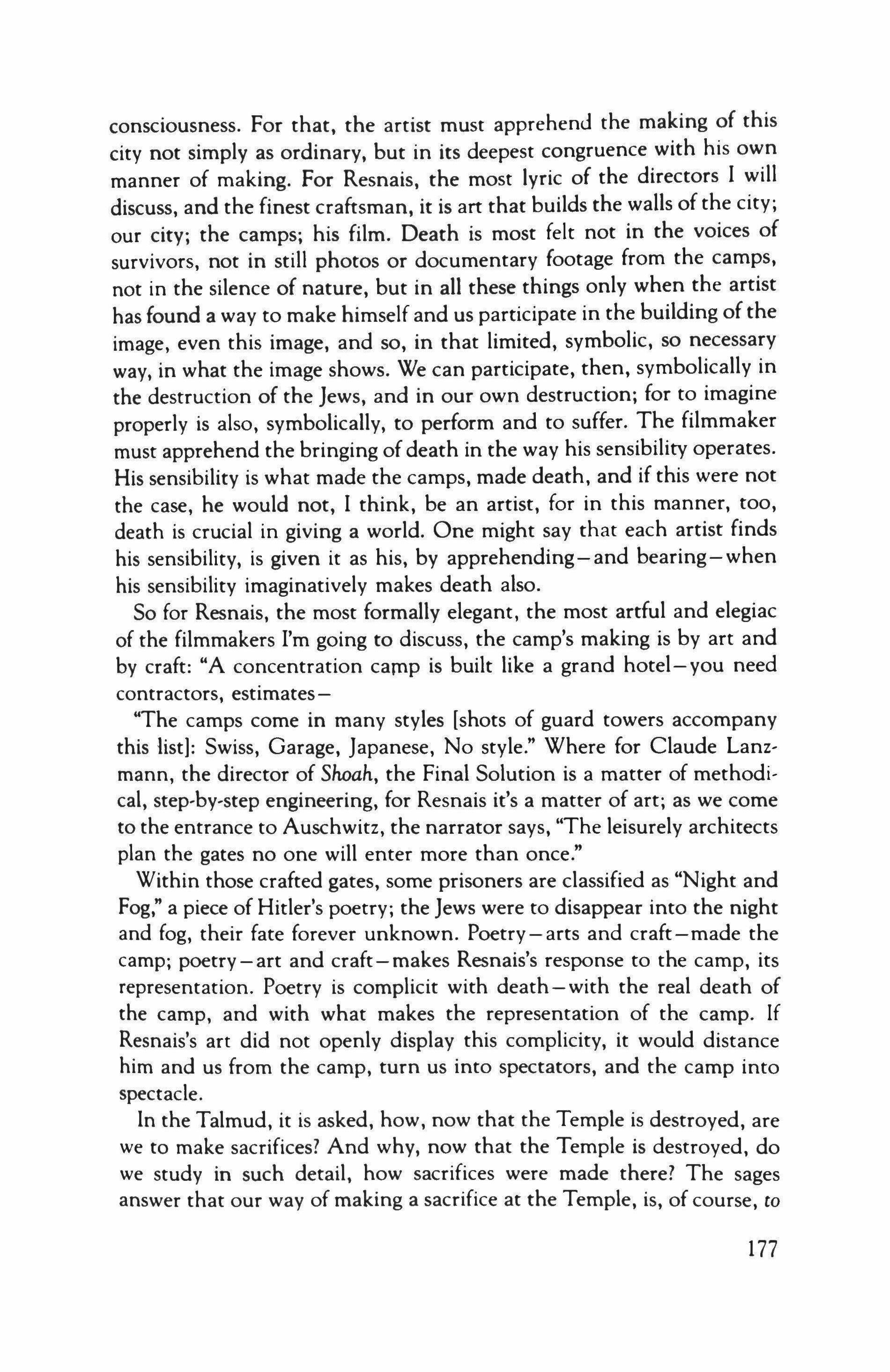
consciousness. For that, the artist must apprehend the making of this city not simply as ordinary, but in its deepest congruence with his own manner of making. For Resnais, the most lyric of the directors I will discuss, and the finest craftsman, it is art that builds the walls of the city; our city; the camps; his film. Death is most felt not in the voices of survivors, not in still photos or documentary footage from the camps, not in the silence of nature, but in all these things only when the artist has found a way to make himself and us participate in the building of the image, even this image, and so, in that limited, symbolic, so necessary way, in what the image shows. We can participate, then, symbolically in the destruction of the Jews, and in our own destruction; for to imagine properly is also, symbolically, to perform and to suffer. The filmmaker must apprehend the bringing ofdeath in the way his sensibility operates. His sensibility is what made the camps, made death, and if this were not the case, he would not, I think, be an artist, for in this manner, too, death is crucial in giving a world. One might say that each artist finds his sensibility, is given it as his, by apprehending-and bearing-when his sensibility imaginatively makes death also.
So for Resnais, the most formally elegant, the most artful and elegiac of the filmmakers I'm going to discuss, the camp's making is by art and by craft: "A concentration camp is built like a grand hotel- you need contractors, estimates-
"The camps come in many styles [shots of guard towers accompany this list): Swiss, Garage, Japanese, No style." Where for Claude Lammann, the director of Shoah, the Final Solution is a matter of methodical, step-by-step engineering, for Resnais it's a matter of art; as we come to the entrance to Auschwitz, the narrator says, "The leisurely architects plan the gates no one will enter more than once."
Within those crafted gates, some prisoners are classified as "Night and Fog," a piece of Hider's poetry; the Jews were to disappear into the night and fog, their fate forever unknown. Poetry-arts and craft-made the camp; poetry - art and craft - makes Resnais's response to the camp, its representation. Poetry is complicit with death - with the real death of the camp, and with what makes the representation of the camp. If Resnais's art did not openly display this complicity, it would distance him and us from the camp, turn us into spectators, and the camp into spectacle.
In the Talmud, it is asked, how, now that the Temple is destroyed, are we to make sacrifices? And why, now that the Temple is destroyed, do we study in such detail, how sacrifices were made there? The sages answer that our way of making a sacrifice at the Temple, is, of course, to
177
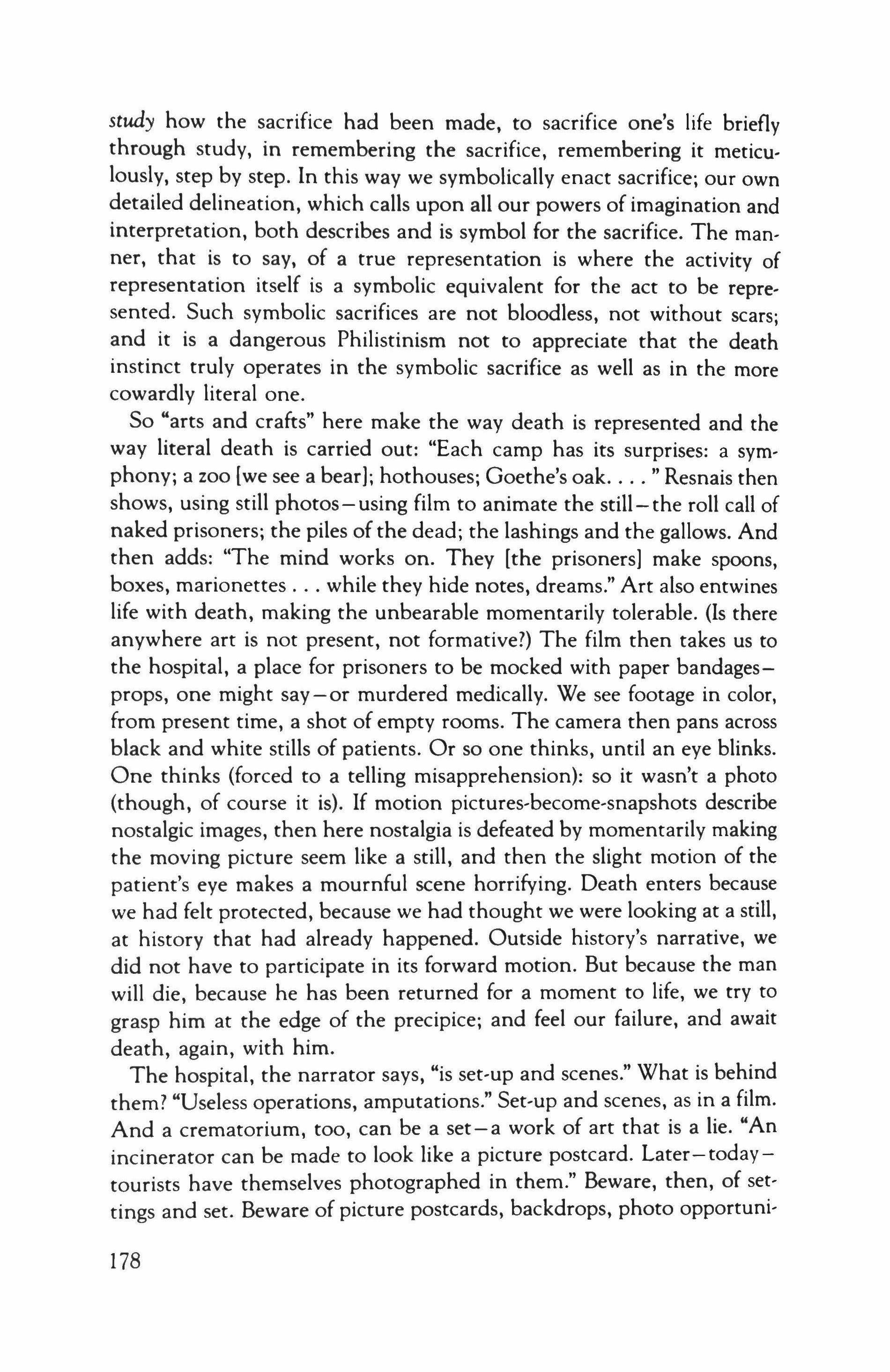
study how the sacrifice had been made, to sacrifice one's life briefly through study, in remembering the sacrifice, remembering it meticulously, step by step. In this way we symbolically enact sacrifice; our own detailed delineation, which calls upon all our powers of imagination and interpretation, both describes and is symbol for the sacrifice. The manner, that is to say, of a true representation is where the activity of representation itself is a symbolic equivalent for the act to be represented. Such symbolic sacrifices are not bloodless, not without scars; and it is a dangerous Philistinism not to appreciate that the death instinct truly operates in the symbolic sacrifice as well as in the more cowardly literal one.
So "arts and crafts" here make the way death is represented and the way literal death is carried out: "Each camp has its surprises: a symphony; a zoo [we see a bear]; hothouses; Goethe's oak "Resnais then shows, using still photos - using film to animate the still- the roll call of naked prisoners; the piles of the dead; the lashings and the gallows. And then adds: "The mind works on. They [the prisoners] make spoons, boxes, marionettes while they hide notes, dreams." Art also entwines life with death, making the unbearable momentarily tolerable. (Is there anywhere art is not present, not formative?) The film then takes us to the hospital, a place for prisoners to be mocked with paper bandagesprops, one might say-or murdered medically. We see footage in color, from present time, a shot of empty rooms. The camera then pans across black and white stills of patients. Or so one thinks, until an eye blinks. One thinks (forced to a telling misapprehension): so it wasn't a photo (though, of course it is). If motion pictures-become-snapshots describe nostalgic images, then here nostalgia is defeated by momentarily making the moving picture seem like a still, and then the slight motion of the patient's eye makes a mournful scene horrifying. Death enters because we had felt protected, because we had thought we were looking at a still, at history that had already happened. Outside history's narrative, we did not have to participate in its forward motion. But because the man will die, because he has been returned for a moment to life, we try to grasp him at the edge of the precipice; and feel our failure, and await death, again, with him.
The hospital, the narrator says, "is set-up and scenes." What is behind them? "Useless operations, amputations." Set-up and scenes, as in a film. And a crematorium, too, can be a set - a work of art that is a lie. "An incinerator can be made to look like a picture postcard. Later-todaytourists have themselves photographed in them." Beware, then, of settings and set. Beware of picture postcards, backdrops, photo opportuni-
178
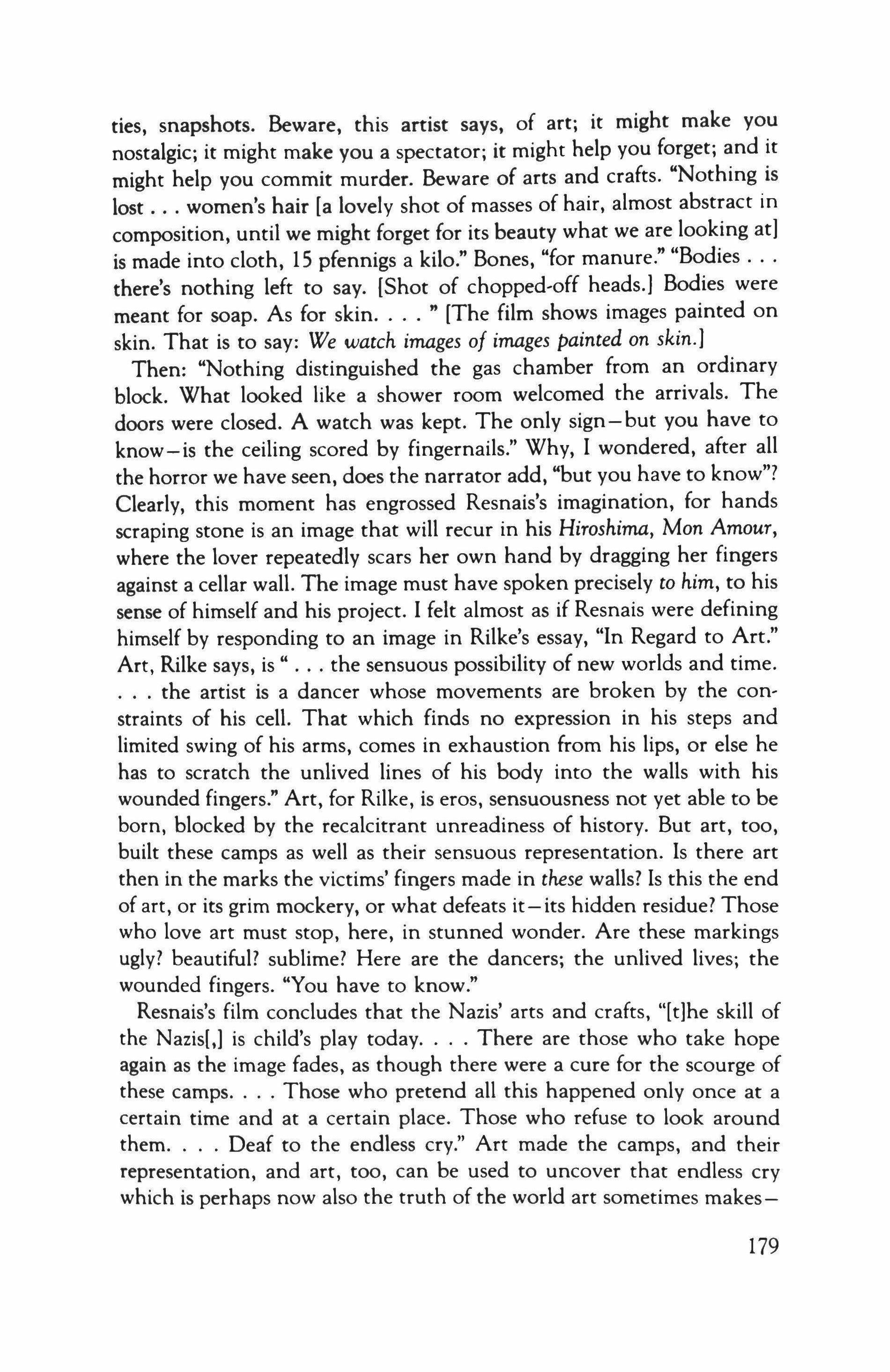
ties, snapshots. Beware, this artist says, of art; it might make you nostalgic; it might make you a spectator; it might help you forget; and it might help you commit murder. Beware of arts and crafts. "Nothing is lost women's hair [a lovely shot of masses of hair, almost abstract in composition, until we might forget for its beauty what we are looking at) is made into cloth, 15 pfennigs a kilo." Bones, "for manure." "Bodies there's nothing left to say. [Shot of chopped-off heads.) Bodies were meant for soap. As for skin [The film shows images painted on skin. That is to say: We watch images of images painted on skin.)
Then: "Nothing distinguished the gas chamber from an ordinary block. What looked like a shower room welcomed the arrivals. The doors were closed. A watch was kept. The only sign - but you have to know-is the ceiling scored by fingernails." Why, I wondered, after all the horror we have seen, does the narrator add, "but you have to know"?
Clearly, this moment has engrossed Resnais's imagination, for hands scraping stone is an image that will recur in his Hiroshima, Mon Amour, where the lover repeatedly scars her own hand by dragging her fingers against a cellar wall. The image must have spoken precisely to him, to his sense of himself and his project. I felt almost as if Resnais were defining himself by responding to an image in Rilke's essay, "In Regard to Art." Art, Rilke says, is" the sensuous possibility of new worlds and time. the artist is a dancer whose movements are broken by the constraints of his cell. That which finds no expression in his steps and limited swing of his arms, comes in exhaustion from his lips, or else he has to scratch the unlived lines of his body into the walls with his wounded fingers." Art, for Rilke, is eros, sensuousness not yet able to be born, blocked by the recalcitrant unreadiness of history. But art, too, built these camps as well as their sensuous representation. Is there art then in the marks the victims' fingers made in these walls? Is this the end of art, or its grim mockery, or what defeats it-its hidden residue? Those who love art must stop, here, in stunned wonder. Are these markings ugly? beautiful? sublime? Here are the dancers; the unlived lives; the wounded fingers. "You have to know."
Resnais's film concludes that the Nazis' arts and crafts, "[tlhe skill of the Nazis[,) is child's play today There are those who take hope again as the image fades, as though there were a cure for the scourge of these camps Those who pretend all this happened only once at a certain time and at a certain place. Those who refuse to look around them Deaf to the endless cry." Art made the camps, and their representation, and art, too, can be used to uncover that endless cry which is perhaps now also the truth of the world art sometimes makes-
179
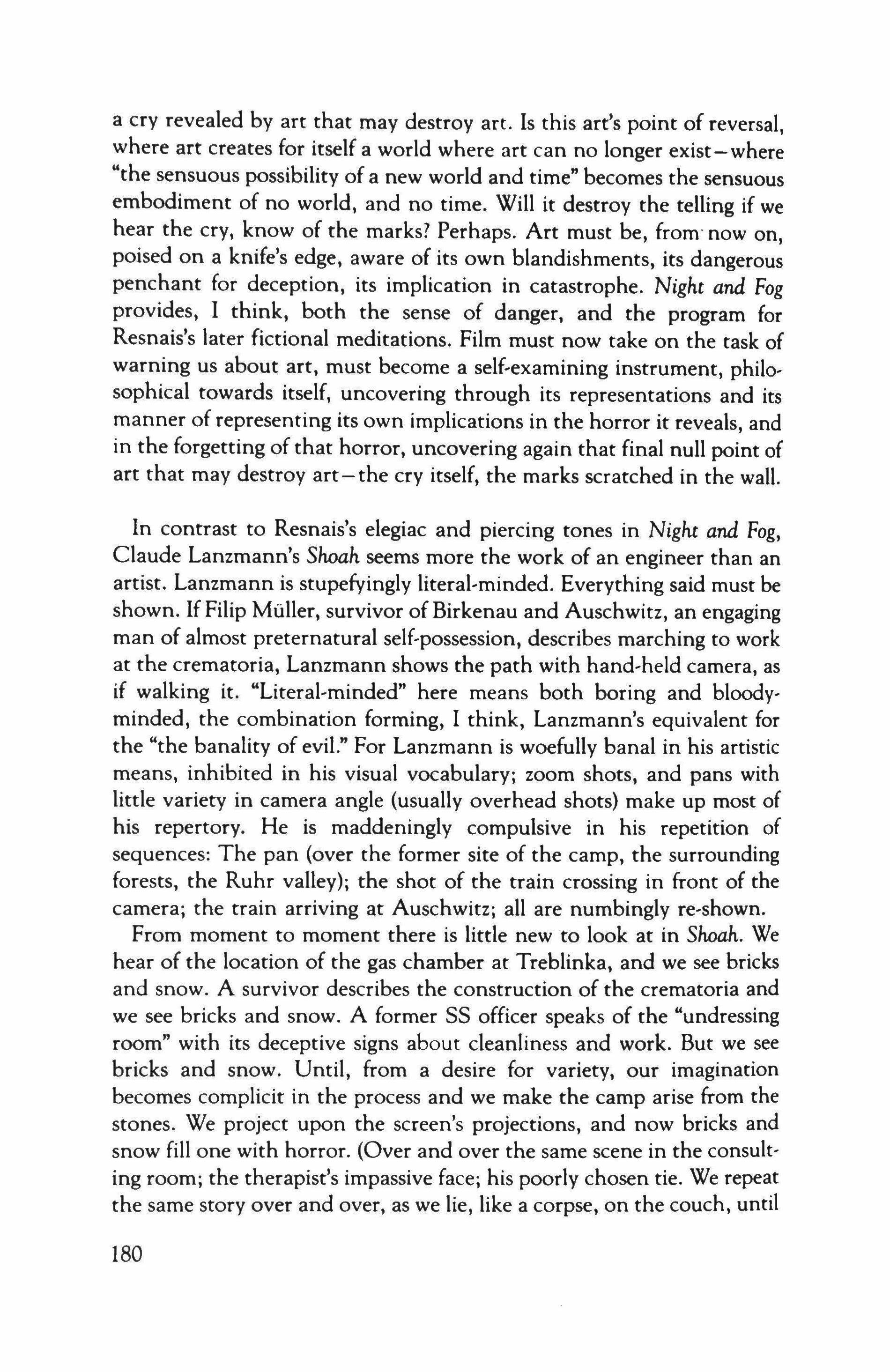
a cry revealed by art that may destroy art. Is this art's point of reversal, where art creates for itself a world where art can no longer exist-where "the sensuous possibility of a new world and time" becomes the sensuous embodiment of no world, and no time. Will it destroy the telling if we hear the cry, know of the marks? Perhaps. Art must be, from now on, poised on a knife's edge, aware of its own blandishments, its dangerous penchant for deception, its implication in catastrophe. Night and Fog provides, I think, both the sense of danger, and the program for Resnais's later fictional meditations. Film must now take on the task of warning us about art, must become a self-examining instrument, philosophical towards itself, uncovering through its representations and its manner of representing its own implications in the horror it reveals, and in the forgetting of that horror, uncovering again that final null point of art that may destroy art - the cry itself, the marks scratched in the wall.
In contrast to Resnais's elegiac and piercing tones in Night and Fog, Claude Lanzrnann's Shoah seems more the work of an engineer than an artist. Lanzrnann is stupefvingly literal-minded. Everything said must be shown. If Filip Muller, survivor of Birkenau and Auschwitz, an engaging man of almost preternatural self-possession, describes marching to work at the crematoria, Lanzrnann shows the path with hand-held camera, as if walking it. "Literal-minded" here means both boring and bloodyminded, the combination forming, I think, Lanzrnann's equivalent for the "the banality of evil." For Lanzrnann is woefully banal in his artistic means, inhibited in his visual vocabulary; zoom shots, and pans with little variety in camera angle (usually overhead shots) make up most of his repertory. He is maddeningly compulsive in his repetition of sequences: The pan (over the former site of the camp, the surrounding forests, the Ruhr valley); the shot of the train crossing in front of the camera; the train arriving at Auschwitz; all are numbingly re-shown. From moment to moment there is little new to look at in Shoah. We hear of the location of the gas chamber at Treblinka, and we see bricks and snow. A survivor describes the construction of the crematoria and we see bricks and snow. A former SS officer speaks of the "undressing room" with its deceptive signs about cleanliness and work. But we see bricks and snow. Until, from a desire for variety, our imagination becomes complicit in the process and we make the camp arise from the stones. We project upon the screen's projections, and now bricks and snow fill one with horror. (Over and over the same scene in the consulting room; the therapist's impassive face; his poorly chosen tie. We repeat the same story over and over, as we lie, like a corpse, on the couch, until
180

our imagination, perhaps in part from boredom, from a desire for variety, projects a past on this meager screen.}
Literal-minded, bloody-minded, Lanzmann asks his informants, Was the path the gas vans went down paved? Or: How did the train get from here to there? Were the trains pushed the last kilometers into the camp? (Literal-minded, bloody-minded, he must walk that part of the way.) Was the train track inside the camp, or outside? He goes over the track with a train engineer. And from here to the camps was how far? "Here," he says, "was the Polish part, and here death." In this concentration on detail, on process, Lanzmann seems very much the obsessive; as if, were the right careful rituals followed, death might be isolated in one part. But his obsession is too profound, too complete, too tireless, and soon death spills over, here and everywhere, for if the tracks go there, then they also can go here.
How were the gas chambers built? we hear Lanzmann's voice asking the SS man Suchomel. Who built them? What was their capacity? (jewish survivors, Suchomel thinks, tend to exaggerate it.) Lanzmann's voice asks for more details on the precise location of the undressing area, the gas, the crematoria. As we listen to these voices we see a van drive up outside Suchomel's house with a large antenna on top. We enter the van and see a technician focusing Suchomel's image on a television screen. On the TV screen, we hear and see Lanzmann lie to Suchomel, telling the SS officer that his face won't be shown, his name won't be used. Reassured, Suchomel, using a long pointer and a wall chart, describes the layout of the camp. "I don't see," Lanzmann said later, to an interviewer, "why I should keep my word to these people. Did they keep their word? I refuse to enter the psychology of the Nazis. I decided to have only technical conversations." But throughout the film this choice pushes Lanzmann farther beyond ordinary probity than such transparently poor self-justification; in fact, what he achieves is a kind of necessary near-identification with the Nazis. He, like them, will lie. He, like them, will, in his way, kill. "How could I stand this, not to jump at [Suchomel] and kill him?" he says to an interviewer. "This was not at all my purpose. My purpose was to kill him with a camera." He, like them, is only interested in technical conversations; he, like them, wishes to make the Final Solution an engineering problem.
"I refuse," Lanzmann says, "to enter the psychology of the Nazis. I decided to have only technical conversations." Instead ofwhy-and what answer will we accept here? - we have how. But in an age when psychology is what makes souls, to substitute (as Lanzmann does) how for
181
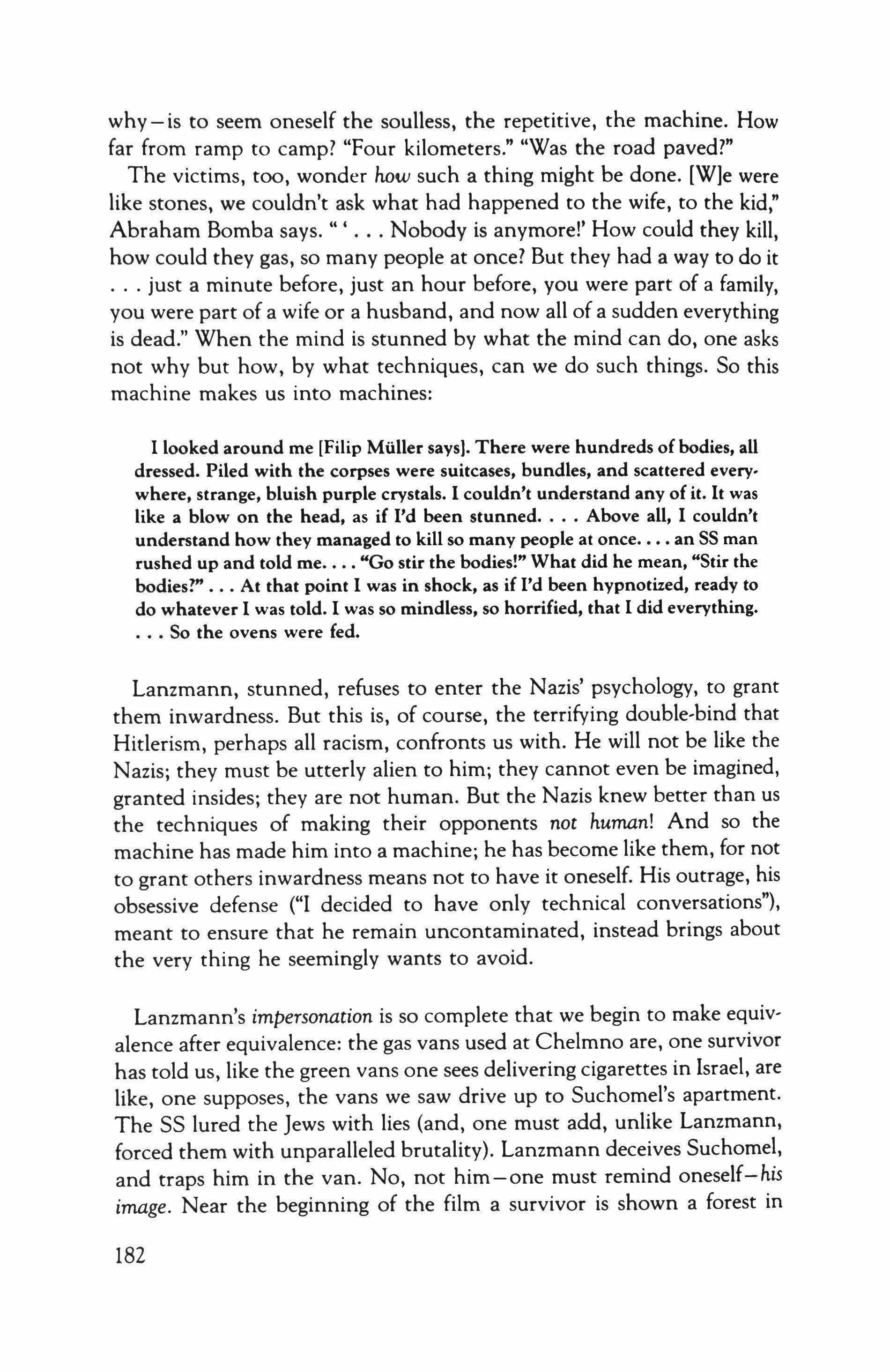
why - is to seem oneself the soulless, the repetitive, the machine. How far from ramp to camp? "Four kilometers." "Was the road paved?"
The victims, too, wonder how such a thing might be done. [W]e were like stones, we couldn't ask what had happened to the wife, to the kid," Abraham Bomba says. Nobody is anymore!' How could they kill, how could they gas, so many people at once? But they had a way to do it just a minute before, just an hour before, you were part of a family, you were part of a wife or a husband, and now all of a sudden everything is dead." When the mind is stunned by what the mind can do, one asks not why but how, by what techniques, can we do such things. So this machine makes us into machines:
llooked around me [Filip Muller says). There were hundreds of bodies, all dressed. Piled with the corpses were suitcases, bundles, and scattered everywhere, strange, bluish purple crystals. I couldn't understand any of it. It was like a blow on the head, as if I'd been stunned Above all, I couldn't understand how they managed to kill so many people at once .••• an SS man rushed up and told me "Go stir the bodies!" What did he mean, "Stir the bodies?" At that point 1 was in shock, as if I'd been hypnotized, ready to do whatever 1 was told. I was so mindless, so horrified, that 1 did everything So the ovens were fed.
Lanzmann, stunned, refuses to enter the Nazis' psychology, to grant them inwardness. But this is, of course, the terrifying double-bind that Hitlerism, perhaps all racism, confronts us with. He will not be like the Nazis; they must be utterly alien to him; they cannot even be imagined, granted insides; they are not human. But the Nazis knew better than us the techniques of making their opponents not human! And so the machine has made him into a machine; he has become like them, for not to grant others inwardness means not to have it oneself. His outrage, his obsessive defense ("I decided to have only technical conversations"), meant to ensure that he remain uncontaminated, instead brings about the very thing he seemingly wants to avoid.
Lanzmann's impersonation is so complete that we begin to make equivalence after equivalence: the gas vans used at Chelmno are, one survivor has told us, like the green vans one sees delivering cigarettes in Israel, are like, one supposes, the vans we saw drive up to Suchomel's apartment. The SS lured the Jews with lies (and, one must add, unlike Lanzmann, forced them with unparalleled brutality). Lanzmann deceives Suchomel, and traps him in the van. No, not him-one must remind oneself-his image. Near the beginning of the film a survivor is shown a forest in
182

Israel-why, one wonders, would Lanzmann bother with this, instead of simply showing him the original forest? It is, the survivor agrees, something like the forest in Ponari where the Jews were burned. We then pan, at high angle, a forest at Sobibor. "Silence and beauty," a Pole, Jan Piwonski, says, "but there was a time when it was full of screams. A time engraved on the mind of those who lived here then." This forest is like that forest these vans are like those vans that deliver cigarettes. Our half-fare railroad tickets for children are like the pricing policies used by the Nazis for the deportations. This train station is like that train station. Here are suitcases, like the suitcases that the dead left after they were "processed." The dead were called puppets; shit; bricks; rags. This is like that: metaphor, the trope which gives value, that makes a world, here destroys it by yoking our present with the kingdom of death. Through metaphor our world is unmade; replaced by another. There is little new to look at in this film because it is not the new that interests Lanzmann but the eruption of the past. Lanzmann's method is the creation of transference, new editions, as Freud called it, of old conflicts; the sudden, almost epiphanic emergence of the spectral past to obliterate or reshape the present in its own image; in this case, to turn the apparent life of the present into the death that was the past; to kill the present, until this forest in Israel is for a moment that forest in Poland. Transference teaches a new lexicon: A river a sewer for ground bones; stones corpses; trees= deceptive propaganda to hide a killing ground; shoes corpses; suitcases corpses; clothing = corpses; rags corpses; a field a sorting place for dead people's clothing; shit corpses; puppets = corpses; bricks corpses; workers=cogs in a killing machine; to process=ro kill people. And, of course, I must add film to this lexicon: when the Nazis rounded up the Jews of Corfu a survivor says that many gentiles came to watch. The subtitle says, "for the show," but the survivor has actually said, "pour le cinema." Lanzmann makes us mad with analogies that annihilate the present: we are silent in the theater, politely not interrupting, as if we were good Germans; afraid to scream, as if we were prisoners, stunned like Muller into stirring the bodies; we look towards the flickering light, as if we were prisoners in the gas vans. And we will emerge at the end, like the survivor of the Warsaw ghetto, the last Jew on earth, stunned now by life as the others had been by death, shocked to find that "Life went on as naturally, as normally as before. The cafes operated normally, the restaurants, buses and streetcars were open."
When Lanzmann's necessary, difficult, arduous, techniques bear their bitter invaluable fruit, all these equivalences, and all the boredom and
183
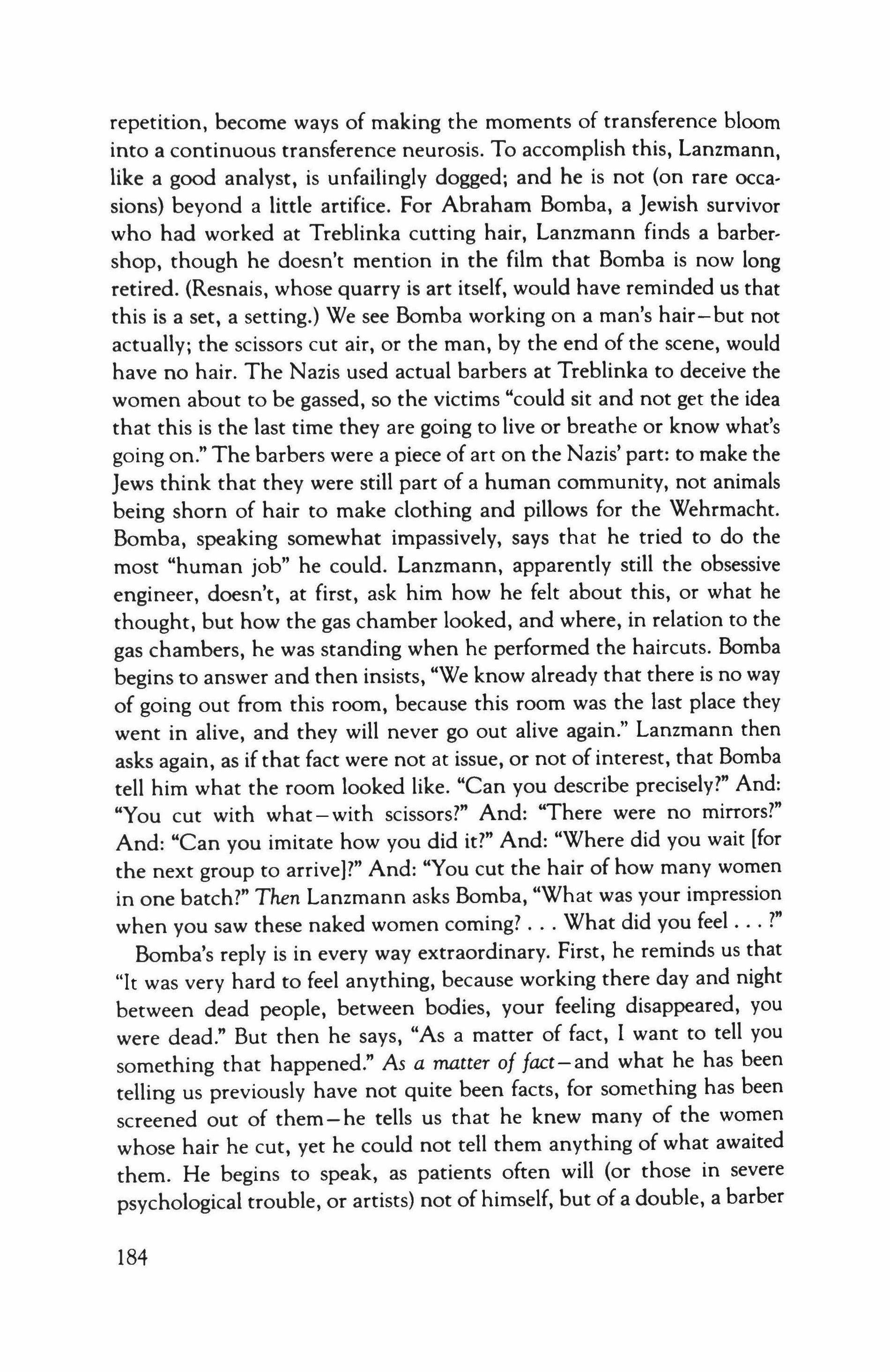
repetition, become ways of making the moments of transference bloom into a continuous transference neurosis. To accomplish this, Lanzmann, like a good analyst, is unfailingly dogged; and he is not (on rare occasions) beyond a little artifice. For Abraham Bomba, a Jewish survivor who had worked at Treblinka cutting hair, Lanzmann finds a barbershop, though he doesn't mention in the film that Bomba is now long retired. (Resnais, whose quarry is art itself, would have reminded us that this is a set, a setting.) We see Bomba working on a man's hair-but not actually; the scissors cut air, or the man, by the end of the scene, would have no hair. The Nazis used actual barbers at Treblinka to deceive the women about to be gassed, so the victims "could sit and not get the idea that this is the last time they are going to live or breathe or know what's going on." The barbers were a piece of art on the Nazis' part: to make the Jews think that they were still part of a human community, not animals being shorn of hair to make clothing and pillows for the Wehrmacht. Bomba, speaking somewhat impassively, says that he tried to do the most "human job" he could. Lanzrnann, apparently still the obsessive engineer, doesn't, at first, ask him how he felt about this, or what he thought, but how the gas chamber looked, and where, in relation to the gas chambers, he was standing when he performed the haircuts. Bomba begins to answer and then insists, "We know already that there is no way of going out from this room, because this room was the last place they went in alive, and they will never go out alive again." Lanzmann then asks again, as if that fact were not at issue, or not of interest, that Bomba tell him what the room looked like. "Can you describe precisely?" And: "You cut with what - with scissors?" And: "There were no mirrors?" And: "Can you imitate how you did it?" And: "Where did you wait [for the next group to arrive]?" And: "You cut the hair of how many women in one batch?" Then Lanzmann asks Bomba, "What was your impression when you saw these naked women coming? What did you feel ?"
Bomba's reply is in every way extraordinary. First, he reminds us that "It was very hard to feel anything, because working there day and night between dead people, between bodies, your feeling disappeared, you were dead." But then he says, "As a matter of fact, I want to tell you something that happened." As a matter of fact-and what he has been telling us previously have not quite been facts, for something has been screened out of them - he tells us that he knew many of the women whose hair he cut, yet he could not tell them anything of what awaited them. He begins to speak, as patients often will (or those in severe psychological trouble, or artists) not of himself, but of a double, a barber
184

who recognizes among his "clients" his wife and sister. Then: "I can't. It's too horrible. Please." Bomba weeps.
The dialogue that follows between Lanzmann (offscreen) and Bomba (in a barber's smock, with a mirror behind him, standing over a man in a barber chair) is reminiscent of Beckett's tramps, or a director and an actor, or of any patient and any therapist:
"We have to do it. You know it."
"1 won't be able to do it."
"You have to do it. 1 know it's very hard, 1 know and 1 apologize."
"Don't make me go on please."
"Please. We must go on."
Bomba, crying, finishes his story. "They could not tell them this was the last time they stay alive, because behind them was the German Nazis, and they knew that if they said a word, not only the wife and the women, who were dead already, but also they would share the same thing with them. In a way they tried to do the best for them with a second longer, a minute longer, just to hug them and kiss them, because they knew they would never see them again."
Bomba is right, of course. In a machine world, stunned, halfhypnotized, it is very hard to have a feeling. Lanzmann has asked us, impelled us, through his incessant repetition of scenes, the film's long silences, the pauses for translations, the obsessive attention to details, to enter boredom, that fake death, like the psychoanalytic patient, that fake corpse on the couch. The boring details have given us the sense that we have the freedom to look away, when really we are hypnotized by the repetition of actions, the familiarity, only to find that the repetition has lulled us, the affectlessness has allowed for an eruption of feeling, and we, along with Bomba, are-to use the Nazis' wordtransported, transported back to the camp. Bomba then incarnates the past. He reads the memory traces inscribed on his body; he enacts the kinetic memories, relives the event. (Poetry, here, is the marks the prison made in the dancer's body.)
One of the SS men interviewed, assistant Nazi head of the Warsaw ghetto, says to Lanzmann, "We're reaching no new conclusions."
Lanzmann says, "I don't think we can."
But Lanzmann doesn't want new conclusions, he wants the old ones revived. And perhaps some resonance of the Holocaust has unknowingly scarred us as well, for sometimes, through identification, or because of something we find in ourselves, we, too, accompany Lanzmann's subjects. To bring about transference, Lanzmann has played the
185
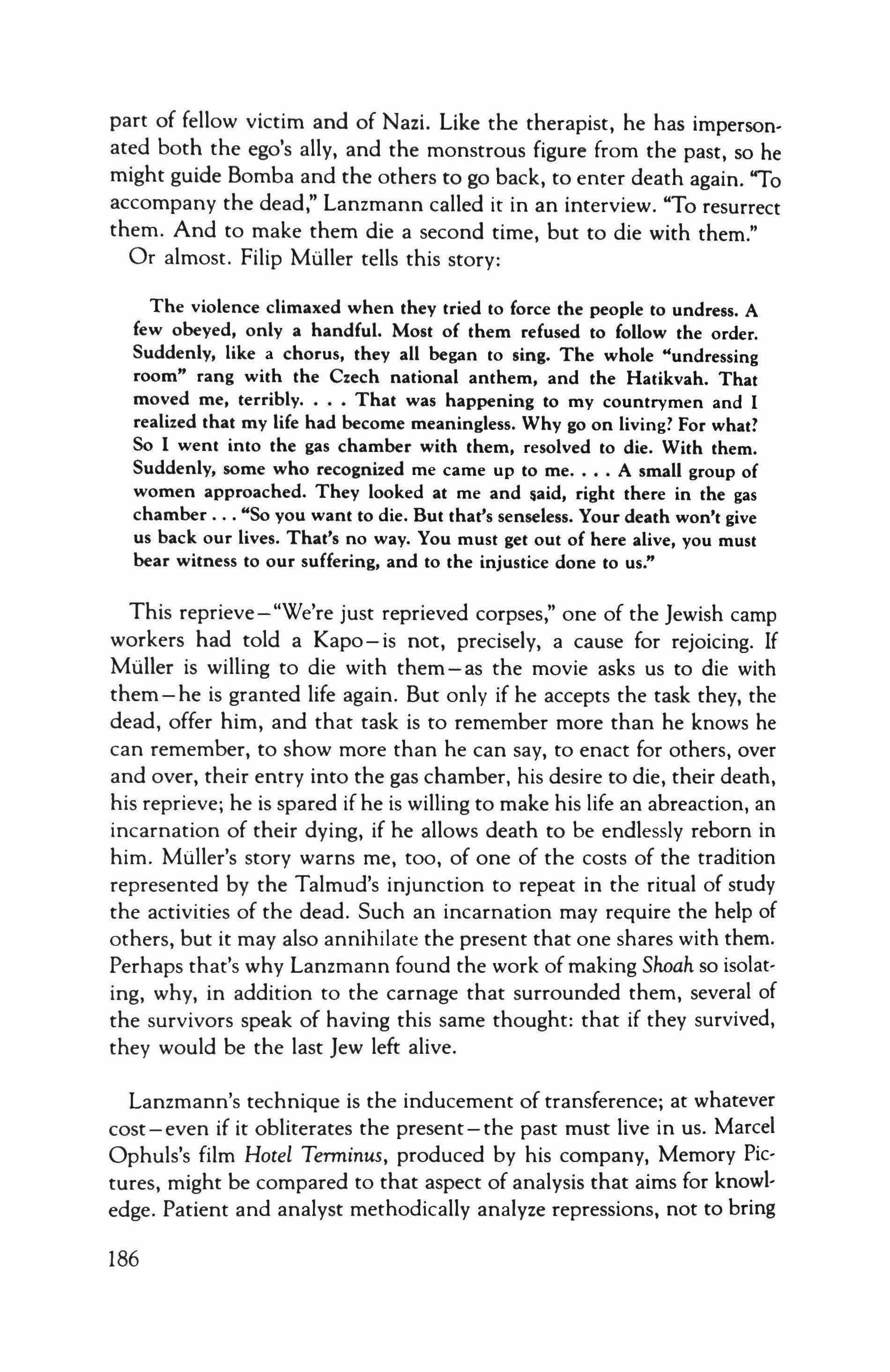
part of fellow victim and of Nazi. Like the therapist, he has impersonated both the ego's ally, and the monstrous figure from the past, so he might guide Bomba and the others to go back, to enter death again. "To accompany the dead," Lanzmann called it in an interview. "To resurrect them. And to make them die a second time, but to die with them." Or almost. Filip Muller tells this story:
The violence climaxed when they tried to force the people to undress. A few obeyed, only a handful. Most of them refused to follow the order. Suddenly, like a chorus, they all began to sing. The whole "undressing room" rang with the Czech national anthem, and the Hatikvah. That moved me, terribly.••• That was happening to my countrymen and I realized that my life had become meaningless. Why go on living? For what? So I went into the gas chamber with them, resolved to die. With them. Suddenly, some who recognized me came up to me .••• A small group of women approached. They looked at me and said, right there in the gas chamber "So you want to die. But that's senseless. Your death won't give us back our lives. That's no way. You must get out of here alive, you must bear witness to our suffering, and to the injustice done to us."
This reprieve-"We're just reprieved corpses," one of the Jewish camp workers had told a Kapo-is not, precisely, a cause for rejoicing. If Muller is willing to die with them - as the movie asks us to die with them - he is granted life again. But only if he accepts the task they, the dead, offer him, and that task is to remember more than he knows he can remember, to show more than he can say, to enact for others, over and over, their entry into the gas chamber, his desire to die, their death, his reprieve; he is spared if he is willing to make his life an abreaction, an incarnation of their dying, if he allows death to be endlessly reborn in him. Muller's story warns me, too, of one of the costs of the tradition represented by the Talmud's injunction to repeat in the ritual of study the activities of the dead. Such an incarnation may require the help of others, but it may also annihilate the present that one shares with them. Perhaps that's why Lanzmann found the work of making Shoah so isolating, why, in addition to the carnage that surrounded them, several of the survivors speak of having this same thought: that if they survived, they would be the last Jew left alive.
Lanzmann's technique is the inducement of transference; at whatever cost - even if it obliterates the present - the past must live in us. Marcel Ophuls's film HoteL Terminus, produced by his company, Memory Pictures, might be compared to that aspect of analysis that aims for knowledge. Patient and analyst methodically analyze repressions, not to bring
186

about a reconnection between the ego and its stores of buried feeling, but so that one might accurately know the past again, and confront a present that, though bitter, is purged of distortions.
Ophuls's film, his analysis, traces the hidden-repressed, one might say -career of Klaus Barbie, the Nazi torturer of Lyon, murderer ofJews and Resistance leaders, who was used and protected by the American government after the war. The neurotic-or historical actors-have, from Ophuls's point of view, disorders of memory. The neurotic tells the story of his life with the parts in the wrong order; or with gaps; or he contradicts himself; and he denies or distorts the reality of anything he sees in the present that might challenge his fantastical past. Eventually he becomes incoherent. The neurotic cannot remember, for example, that, after the war, he recruited the Nazi torturer Klaus Barbie to work for U.S. intelligence. He cannot remember if he knew that Barbie was a torturer, or how he avoided knowing. Or she cannot remember if she collaborated with the Nazis, or made false papers for the Resistance. The neurotic cannot remember if, when he worked as a bellboy at the Hotel Terminus, he saw the SS officers bring suspects through the lobby in handcuffs. He cannot remember if, at the police station where he worked, he heard people scream. He cannot remember if he saw the Jewish children being deported. "Did 1 say that?" the U.S. agent, Kolb, says in this film. "Then 1 was wrong in my memory." Ophuls reads to the U.S. agent Taylor his own memo calling Barbie a Nazi idealist, and asks what "idealist" means, as we look at a picture of Barbie's eyes. "1 don't know. 1 wish 1 could rewrite that today." ("Perhaps," Ophuls says, with mild, characteristic cruelty, "especially today.") Mme. Hammerle, a collaborator, says she saw the death camps in "propaganda films." Such exaggerated, impossible-to-believe events! Ophuls asks, "Propaganda films? Was that Night and Fog?" But Hammerle can't recall that, either. Wolfgang Gustmann, a former SS officer, thought Barbie was a "fantastic guy"; as for talk of Nazi crimes, it's "time to be done with it." The massacre at Oradour? "I'm still not sure what happened If such a thing really happened." The deportation of Jews, the Final Solution? "Maybe we'd like a pact of silence about some things."
Because of what one knows but doesn't want to know, there are soon many related matters one must distort or avoid - without knowing, of course, that one is avoiding them. Kolb didn't know the Resistance leader Jean Moulin had died under Barbie's torture, or even that he had died. Or that he was really a Resistance leader. "1 knew Moulin was a Resistance fighter or something like that," Kolb says. Ophuls, an amiable but tenacious interrogator, presses him, "Why do you say something
187

like that?" "Well, I'm a political scientist, so I like to know what the fellow's orientation is." He means, of course, as neurotics often do, the reverse of what he says: he doesn't want to know what a person's political orientation is, or even that the person existed. The neurotic devises strategies of disingenuous denial. "[Barbie] didn't strike me as the sort of person who would need to torture." Or as Gustmann, the former SS officer says, using a vicious kind of magical thinking, Barbie couldn't have been that sort of person, because dogs liked him. Forced to admit his crimes, Barbie's allies must make torture not matter, because those Barbie murdered were communists, and thus not Resistance fighters but "something like that," and, really, enemies. Besides, the accounts were undoubtedly exaggerated.
Ryan, the State Department lawyer who was forced to confront the charge that the U.S. might have employed Barbie, says "Controlled ignorance is still ignorance." Actually, it's not; it's repression. Such repression requires scrupulous avoidance of knowledge: Kolb denies he knew about Hardy's trial for betraying Moulin, for if he had, he would have learned that Barbie, his prize agent, had tortured Resistance members. Kolb and his superiors say they only read the Army paper, the Stars and Stripes. Like Omercamerim, the Vatican official who collaborated with the u.S. in smuggling Barbie out of Europe, they followed "the Catholic principle, no questions asked." (Besides, he says, there are Jews with immense riches "who are vengeful and fabricate crimes to accuse Barbie of.")
Those collaborating with Barbie, using him and being used by him, must either have known with whom they collaborated, or must have particularly not wanted to know, which is, psychoanalytically, the same-for how do you know what you want to repress unless you know it? So for those engaged in repression, self-deception, and deception of others, the great luxury - reserved for psychotics and those at the pinnacles of power- is to be "out of the loop," to have what one wishes happen, without knowing about it. "Do what you have to do," the head of the u.S. Army intelligence service says, "but keep me out of trouble."
"I've forgotten," Barbie says. "If they haven't, it's their problem." But Barbie, who is not simply a liar, but more disastrously, a cause of lies told by others, is the corrosive principle itself. In this he is reliable: everything he says, as in this last remark, is backwards. Their problem, our problem, is that we have forgotten. What those with power do not want to remember is, of course, what Barbie did at the Hotel Terminus. In Lanzmann's movie we see trains arriving at the death camps, over and over; in Ophuls's film, we see elevator doors closing in front of an
188
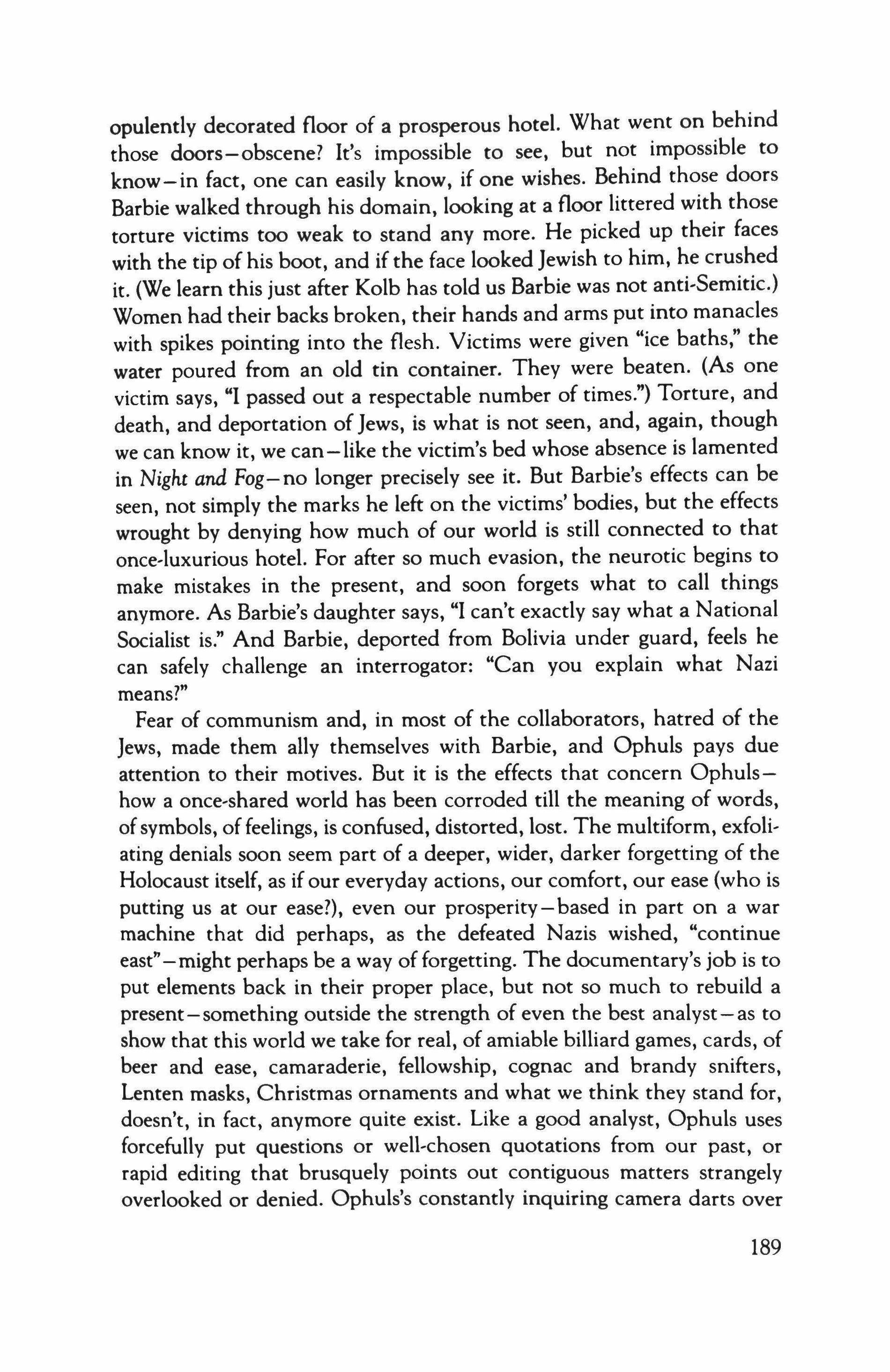
opulently decorated floor of a prosperous hotel. What went on behind those doors-obscene? It's impossible to see, but not impossible to know-in fact, one can easily know, if one wishes. Behind those doors Barbie walked through his domain, looking at a floor littered with those torture victims too weak to stand any more. He picked up their faces with the tip of his boot, and if the face looked Jewish to him, he crushed it. (We learn this just after Kolb has told us Barbie was not anti-Semitic.) Women had their backs broken, their hands and arms put into manacles with spikes pointing into the flesh. Victims were given "ice baths," the water poured from an old tin container. They were beaten. (As one victim says, "I passed out a respectable number of times.") Torture, and death, and deportation of Jews, is what is not seen, and, again, though we can know it, we can -like the victim's bed whose absence is lamented in Night and Fog-no longer precisely see it. But Barbie's effects can be seen, not simply the marks he left on the victims' bodies, but the effects wrought by denying how much of our world is still connected to that once-luxurious hotel. For after so much evasion, the neurotic begins to make mistakes in the present, and soon forgets what to call things anymore. As Barbie's daughter says, "I can't exactly say what a National Socialist is." And Barbie, deported from Bolivia under guard, feels he can safely challenge an interrogator: "Can you explain what Nazi means?"
Fear of communism and, in most of the collaborators, hatred of the Jews, made them ally themselves with Barbie, and Ophuls pays due attention to their motives. But it is the effects that concern Ophulshow a once-shared world has been corroded till the meaning of words, ofsymbols, offeelings, is confused, distorted, lost. The multiform, exfoliating denials soon seem part of a deeper, wider, darker forgetting of the Holocaust itself, as if our everyday actions, our comfort, our ease (who is putting us at our ease?), even our prosperity - based in part on a war machine that did perhaps, as the defeated Nazis wished, "continue east"-might perhaps be a way of forgetting. The documentary's job is to put elements back in their proper place, but not so much to rebuild a present-something outside the strength of even the best analyst-as to show that this world we take for real, of amiable billiard games, cards, of beer and ease, camaraderie, fellowship, cognac and brandy snifters, Lenten masks, Christmas ornaments and what we think they stand for, doesn't, in fact, anymore quite exist. Like a good analyst, Ophuls uses forcefully put questions or well-chosen quotations from our past, or rapid editing that brusquely points out contiguous matters strangely overlooked or denied. Ophuls's constantly inquiring camera darts over
189
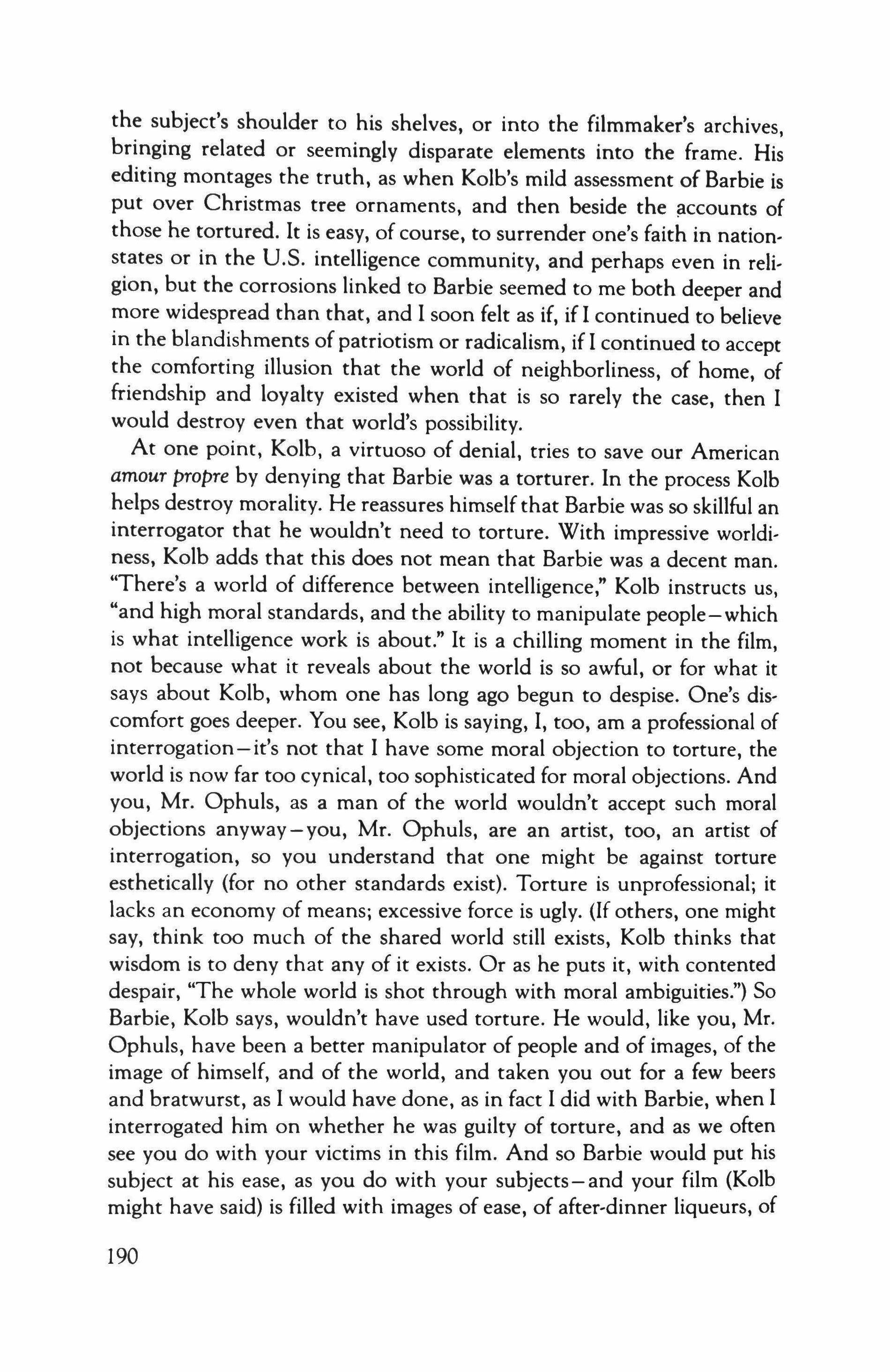
the subject's shoulder to his shelves, or into the filmmaker's archives, bringing related or seemingly disparate elements into the frame. His editing montages the truth, as when Kolb's mild assessment of Barbie is put over Christmas tree ornaments, and then beside the accounts of those he tortured. It is easy, of course, to surrender one's faith in nationstates or in the U.S. intelligence community, and perhaps even in religion, but the corrosions linked to Barbie seemed to me both deeper and more widespread than that, and I soon felt as if, if I continued to believe in the blandishments of patriotism or radicalism, if I continued to accept the comforting illusion that the world of neighborliness, of home, of friendship and loyalty existed when that is so rarely the case, then I would destroy even that world's possibility.
At one point, Kolb, a virtuoso of denial, tries to save our American amour propre by denying that Barbie was a torturer. In the process Kolb helps destroy morality. He reassures himself that Barbie was so skillful an interrogator that he wouldn't need to torture. With impressive worldiness, Kolb adds that this does not mean that Barbie was a decent man. "There's a world of difference between intelligence," Kolb instructs us, "and high moral standards, and the ability to manipulate people-which is what intelligence work is about." It is a chilling moment in the film, not because what it reveals about the world is so awful, or for what it says about Kolb, whom one has long ago begun to despise. One's discomfort goes deeper. You see, Kolb is saying, I, too, am a professional of interrogation - it's not that I have some moral objection to torture, the world is now far too cynical, too sophisticated for moral objections. And you, Mr. Ophuls, as a man of the world wouldn't accept such moral objections anyway-you, Mr. Ophuls, are an artist, too, an artist of interrogation, so you understand that one might be against torture esthetically (for no other standards exist). Torture is unprofessional; it lacks an economy of means; excessive force is ugly. (If others, one might say, think too much of the shared world still exists, Kolb thinks that wisdom is to deny that any of it exists. Or as he puts it, with contented despair, "The whole world is shot through with moral ambiguities.") So Barbie, Kolb says, wouldn't have used torture. He would, like you, Mr. Ophuls, have been a better manipulator of people and of images, of the image of himself, and of the world, and taken you out for a few beers and bratwurst, as I would have done, as in fact I did with Barbie, when I interrogated him on whether he was guilty of torture, and as we often see you do with your victims in this film. And so Barbie would put his subject at his ease, as you do with your subjects-and your film (Kolb might have said) is filled with images of ease, of after-dinner liqueurs, of
190
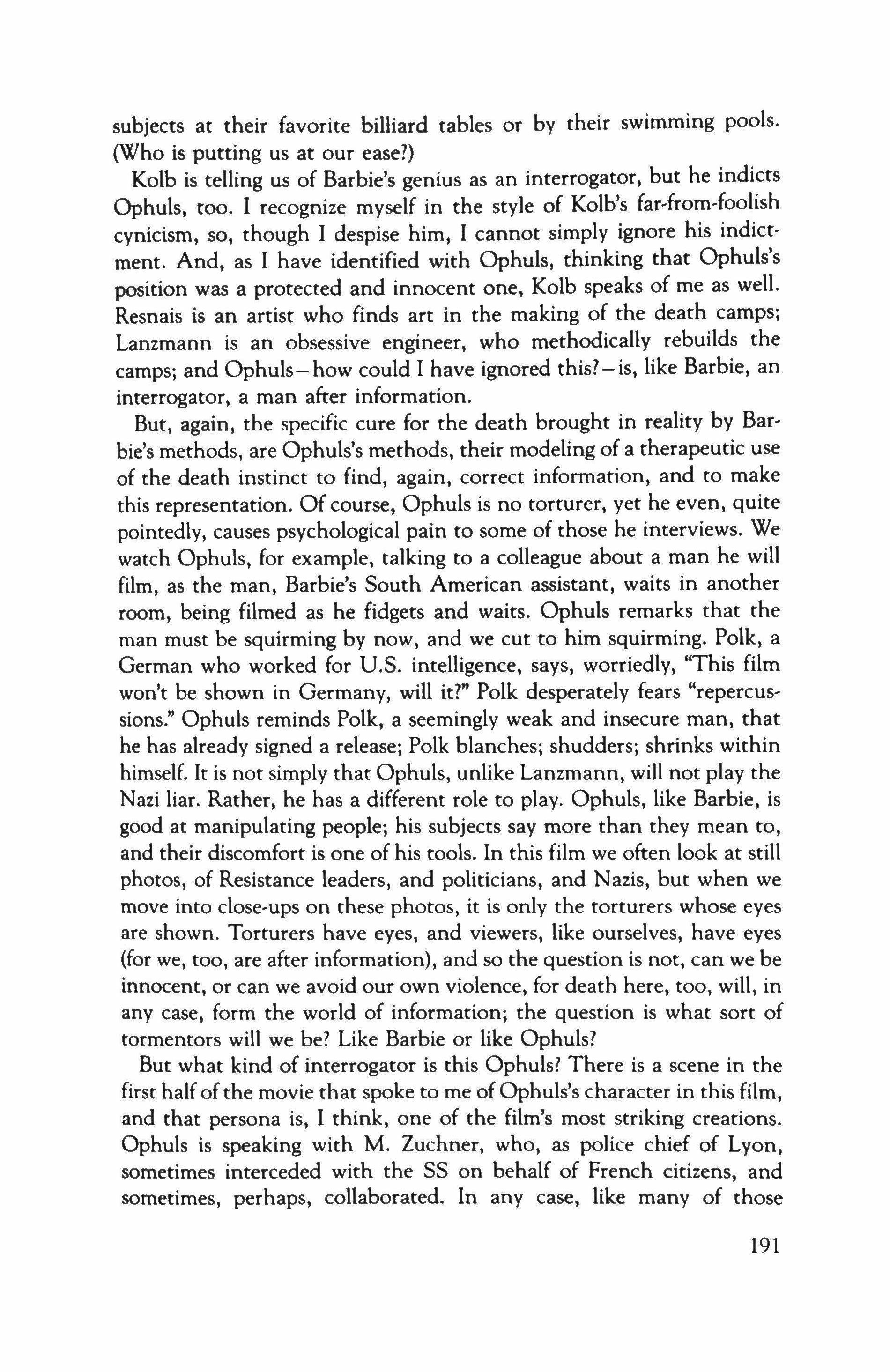
subjects at their favorite billiard tables or by their swimming pools. (Who is putting us at our ease?)
Kolb is telling us of Barbie's genius as an interrogator, but he indicts Ophuls, too. I recognize myself in the style of Kolb's far-from-foolish cynicism, so, though I despise him, I cannot simply ignore his indictment. And, as I have identified with Ophuls, thinking that Ophuls's position was a protected and innocent one, Kolb speaks of me as well. Resnais is an artist who finds art in the making of the death camps; Lanzmann is an obsessive engineer, who methodically rebuilds the camps; and Ophuls-how could I have ignored this?-is, like Barbie, an interrogator, a man after information.
But, again, the specific cure for the death brought in reality by Barbie's methods, are Ophuls's methods, their modeling of a therapeutic use of the death instinct to find, again, correct information, and to make this representation. Of course, Ophuls is no torturer, yet he even, quite pointedly, causes psychological pain to some of those he interviews. We watch Ophuls, for example, talking to a colleague about a man he will film, as the man, Barbie's South American assistant, waits in another room, being filmed as he fidgets and waits. Ophuls remarks that the man must be squirming by now, and we cut to him squirming. Polk, a German who worked for U.S. intelligence, says, worriedly, "This film won't be shown in Germany, will it?" Polk desperately fears "repercussions." Ophuls reminds Polk, a seemingly weak and insecure man, that he has already signed a release; Polk blanches; shudders; shrinks within himself. It is not simply that Ophuls, unlike Lanzmann, will not play the Nazi liar. Rather, he has a different role to play. Ophuls, like Barbie, is good at manipulating people; his subjects say more than they mean to, and their discomfort is one of his tools. In this film we often look at still photos, of Resistance leaders, and politicians, and Nazis, but when we move into close-ups on these photos, it is only the torturers whose eyes are shown. Torturers have eyes, and viewers, like ourselves, have eyes (for we, too, are after information), and so the question is not, can we be innocent, or can we avoid our own violence, for death here, too, will, in any case, form the world of information; the question is what sort of tormentors will we be? Like Barbie or like Ophuls?
But what kind of interrogator is this Ophuls? There is a scene in the first half of the movie that spoke to me ofOphuls's character in this film, and that persona is, I think, one of the film's most striking creations. Ophuls is speaking with M. Zuchner, who, as police chief of Lyon, sometimes interceded with the SS on behalf of French citizens, and sometimes, perhaps, collaborated. In any case, like many of those
191
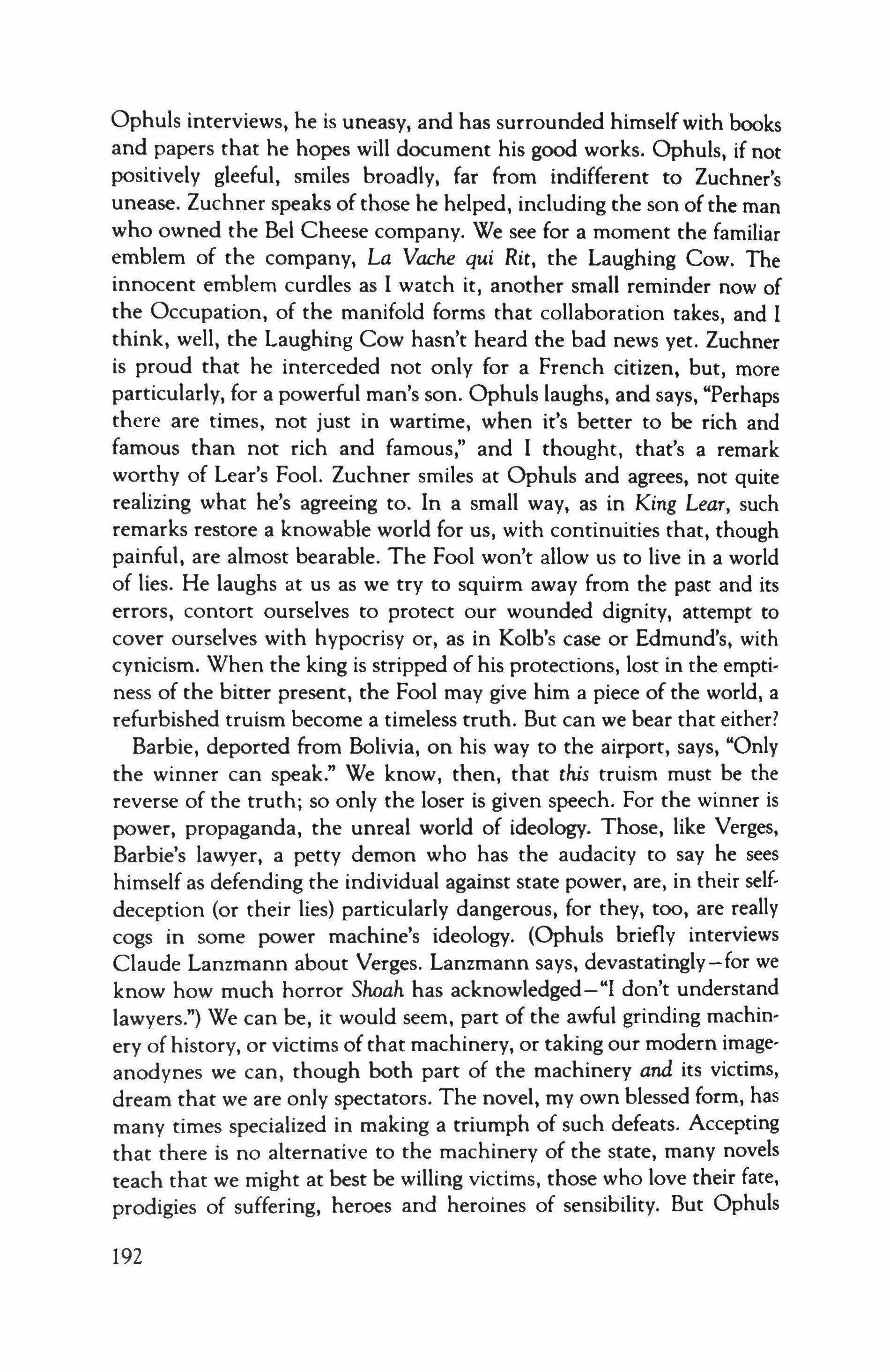
Ophuls interviews, he is uneasy, and has surrounded himself with books and papers that he hopes will document his good works. Ophuls, if not positively gleeful, smiles broadly, far from indifferent to Zuchner's unease. Zuchner speaks of those he helped, including the son of the man who owned the Bel Cheese company. We see for a moment the familiar emblem of the company, La Vache qui Rit, the Laughing Cow. The innocent emblem curdles as I watch it, another small reminder now of the Occupation, of the manifold forms that collaboration takes, and I think, well, the Laughing Cow hasn't heard the bad news yet. Zuchner is proud that he interceded not only for a French citizen, but, more particularly, for a powerful man's son. Ophuls laughs, and says, "Perhaps there are times, not just in wartime, when it's better to be rich and famous than not rich and famous," and I thought, that's a remark worthy of Lear's Fool. Zuchner smiles at Ophuls and agrees, not quite realizing what he's agreeing to. In a small way, as in King Lear, such remarks restore a knowable world for us, with continuities that, though painful, are almost bearable. The Fool won't allow us to live in a world of lies. He laughs at us as we try to squirm away from the past and its errors, contort ourselves to protect our wounded dignity, attempt to cover ourselves with hypocrisy or, as in Kolb's case or Edmund's, with cynicism. When the king is stripped of his protections, lost in the emptiness of the bitter present, the Fool may give him a piece of the world, a refurbished truism become a timeless truth. But can we bear that either?
Barbie, deported from Bolivia, on his way to the airport, says, "Only the winner can speak." We know, then, that this truism must be the reverse of the truth; so only the loser is given speech. For the winner is power, propaganda, the unreal world of ideology. Those, like Verges, Barbie's lawyer, a petty demon who has the audacity to say he sees himself as defending the individual against state power, are, in their selfdeception (or their lies) particularly dangerous, for they, too, are really cogs in some power machine's ideology. (Ophuls briefly interviews Claude Lanzmann about Verges. Lanzmann says, devastatingly-far we know how much horror Slwah has acknowledged-"I don't understand lawyers.") We can be, it would seem, part of the awful grinding machinery of history, or victims of that machinery, or taking our modern imageanodynes we can, though both part of the machinery and its victims, dream that we are only spectators. The novel, my own blessed form, has many times specialized in making a triumph of such defeats. Accepting that there is no alternative to the machinery of the state, many novels teach that we might at best be willing victims, those who love their fate, prodigies of suffering, heroes and heroines of sensibility. But Ophuls
192
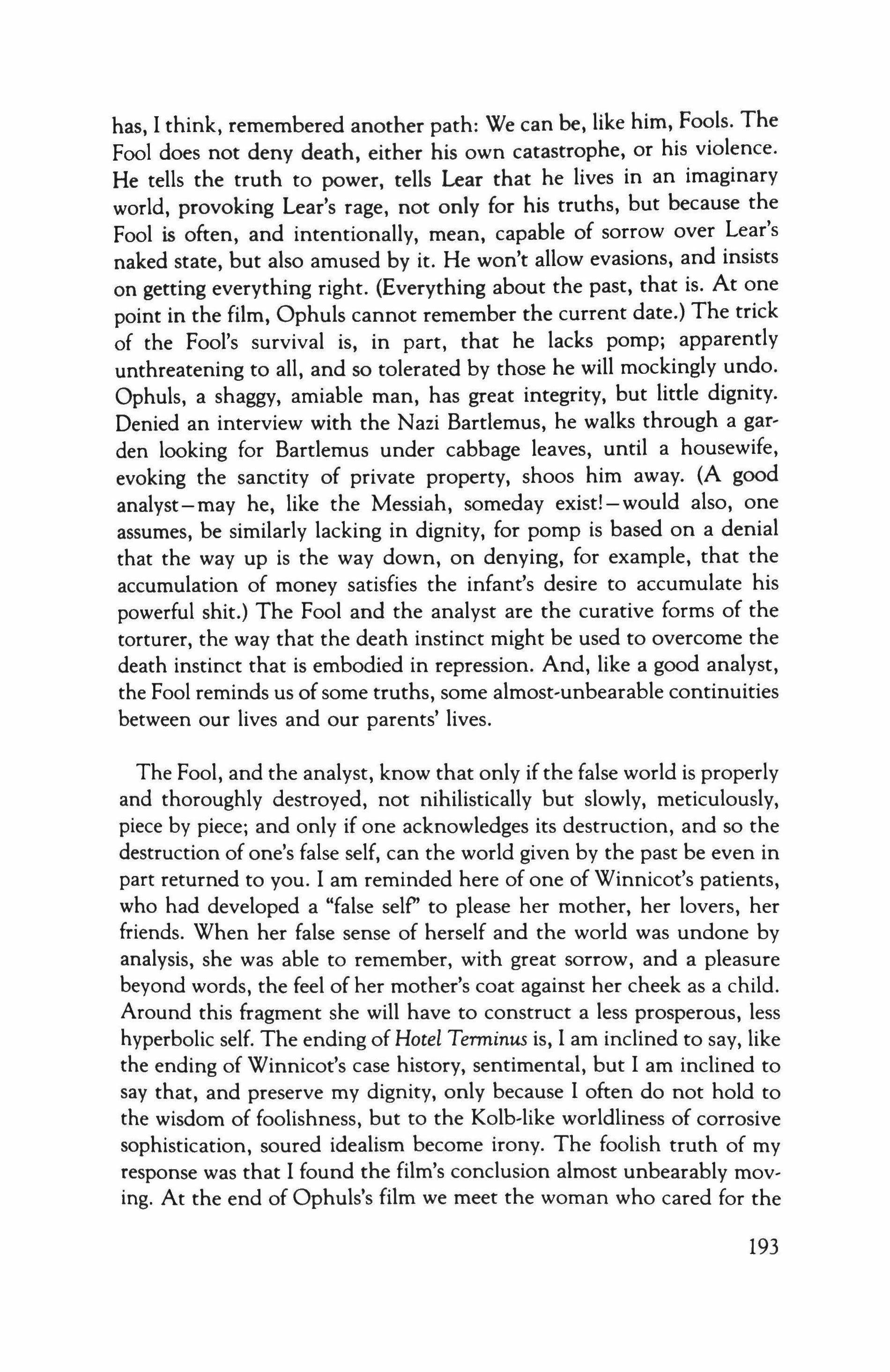
has, I think, remembered another path: We can be, like him, Fools. The Fool does not deny death, either his own catastrophe, or his violence. He tells the truth to power, tells Lear that he lives in an imaginary world, provoking Lear's rage, not only for his truths, but because the Fool is often, and intentionally, mean, capable of sorrow over Lear's naked state, but also amused by it. He won't allow evasions, and insists on getting everything right. (Everything about the past, that is. At one point in the film, Ophuls cannot remember the current date.) The trick of the Fool's survival is, in part, that he lacks pomp; apparently unthreatening to all, and so tolerated by those he will mockingly undo. Ophuls, a shaggy, amiable man, has great integrity, but little dignity. Denied an interview with the Nazi Bartlemus, he walks through a gar' den looking for Bartlemus under cabbage leaves, until a housewife, evoking the sanctity of private property, shoos him away. (A good analyst-may he, like the Messiah, someday exist!-would also, one assumes, be similarly lacking in dignity, for pomp is based on a denial that the way up is the way down, on denying, for example, that the accumulation of money satisfies the infant's desire to accumulate his powerful shit.) The Fool and the analyst are the curative forms of the torturer, the way that the death instinct might be used to overcome the death instinct that is embodied in repression. And, like a good analyst, the Fool reminds us of some truths, some almost,unbearable continuities between our lives and our parents' lives.
The Fool, and the analyst, know that only ifthe false world is properly and thoroughly destroyed, not nihilistically but slowly, meticulously, piece by piece; and only if one acknowledges its destruction, and so the destruction of one's false self, can the world given by the past be even in part returned to you. I am reminded here of one of Winnicot's patients, who had developed a "false self" to please her mother, her lovers, her friends. When her false sense of herself and the world was undone by analysis, she was able to remember, with great sorrow, and a pleasure beyond words, the feel of her mother's coat against her cheek as a child. Around this fragment she will have to construct a less prosperous, less hyperbolic self. The ending of Hotel Terminus is, I am inclined to say, like the ending of Winnicot's case history, sentimental, but I am inclined to say that, and preserve my dignity, only because I often do not hold to the wisdom of foolishness, but to the Kolb-like worldliness of corrosive sophistication, soured idealism become irony. The foolish truth of my response was that I found the film's conclusion almost unbearably moving. At the end of Ophuls's film we meet the woman who cared for the
193

Jewish children of Izieu - a spot on the continent, she calls it -children who were deported by Barbie to be murdered in the camps. The chilo dren, she says, knew that their parents had already been deported, and we see a photo of the wan face of Meyer Bulkha, a little boy depressed by the world he must inhabit, as Ophuls here almost dares us to feel sentimental towards this past, dares us (in J. D. Salinger's brilliant definition of sentimentality) "to love the world more than God does." We see the countryside of Izieu, the snow melting, water dripping from the eaves, and hear a letter of one of the children, a young woman. She speaks of the beauty of the snow. She thanks her parents for sending clogs. "Now my feet will be warm The snow is melting." We see the countryside from a window. "Soon Spring will be here. I will never forget what the South is like." She thanks her parents for a blue check. ered shirt Only the victims can speak, and perhaps only the dead can, if we have been sufficiently harrowed, if we have acknowledged the bitter emptiness of our unreal present, return a few bits of the world to us (clogs, snow, a checkered shirt).
It is hard (because so foolish) to speak of my mingled feelings of pain and relief, when those few objects were handed to me. 1 have spoken previously of the cost of remembering, as it is embodied in Shoah, and perhaps in Jewish ritual, how the constant remembering of the dead can obliterate the present. But there are, apparently, gifts given by the dead as well, the utterly powerless, infinitely greedy, not always innocent dead. (And how foolish they are as well, so silly as to have died!) Perhaps they can, from time to time, grant us, for our service to them, our costly, pious continuity with their tradition, some small fragments of the world (the ritual candle? a cup of wine?).
In the final moments of the film, Mme. Kaddoush, a survivor of Auschwitz, speaks to Ophuls outside the house in Lyon where she and her family once lived. She remembers that her neighbors had shut their doors as her family was led away. I am almost a proper Fool by this time and know (though 1 cannot bear) what "home" means: not nothing and not very much. Ophuls and Mme. Kaddoush climb the stairs she descended with the Nazis, and she speaks of Mme. Bontout who, as the Nazis led her family away, tried to pull the little girl into her apartment. "I feel a fondness for her, not for the others." One of the Germans saw Mme. Bontout try to snatch the child from death. He grabbed the girl back, and slapped Mme. Bontout so hard she fell backwards. The movie, the voice of Jeanne Moreau says, is dedicated to her, a good neighbor. Supposing you are so foolish as to think such people might exist!
194
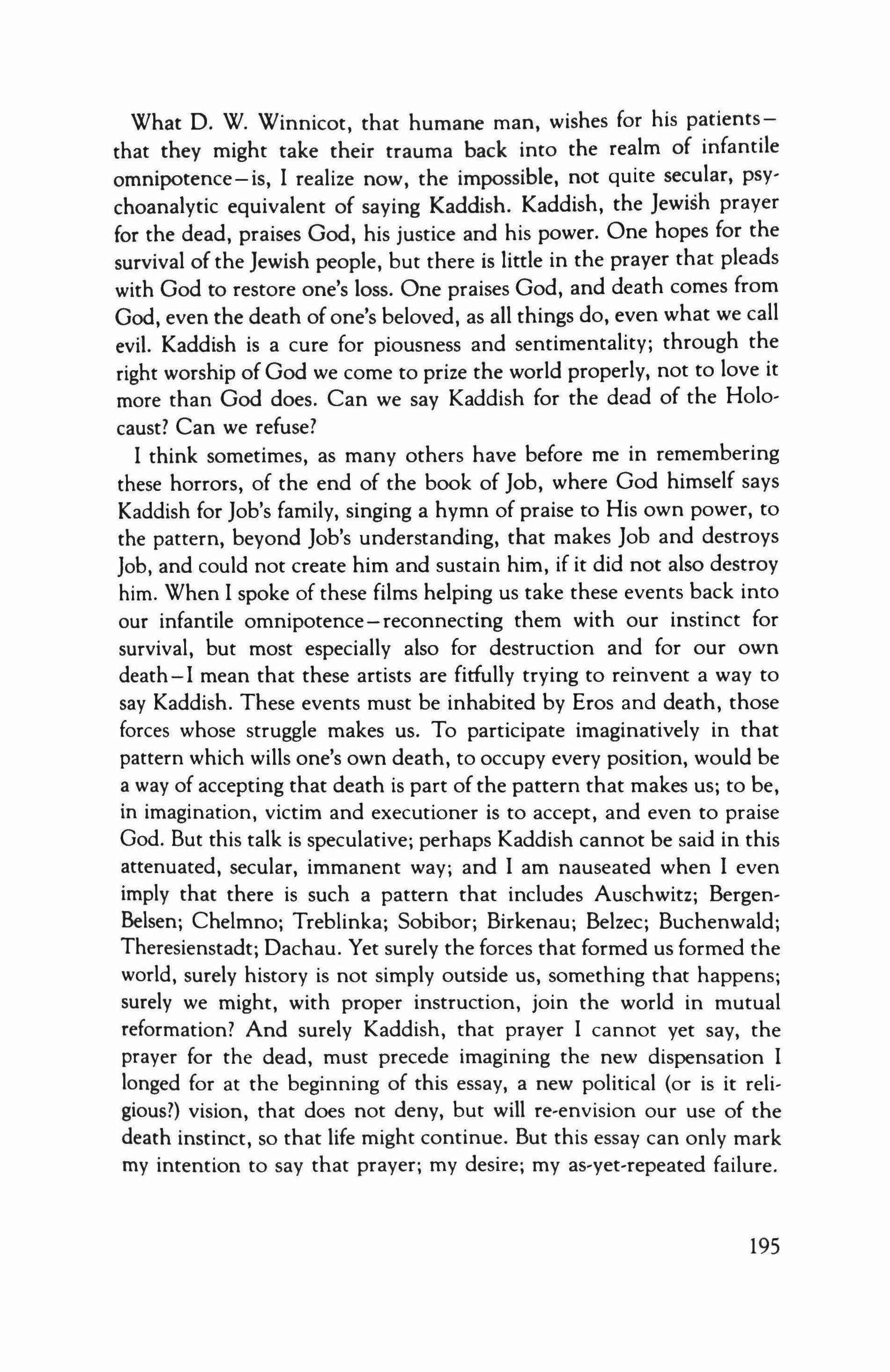
What D. W. Winnicot, that humane man, wishes for his patientsthat they might take their trauma back into the realm of infantile omnipotence-is, I realize now, the impossible, not quite secular, psychoanalytic equivalent of saying Kaddish. Kaddish, the Jewish prayer for the dead, praises God, his justice and his power. One hopes for the survival of the Jewish people, but there is little in the prayer that pleads with God to restore one's loss. One praises God, and death comes from God, even the death of one's beloved, as all things do, even what we call evil. Kaddish is a cure for piousness and sentimentality; through the right worship of God we come to prize the world properly, not to love it more than God does. Can we say Kaddish for the dead of the Holocaust? Can we refuse?
I think sometimes, as many others have before me in remembering these horrors, of the end of the book of Job, where God himself says Kaddish for Job's family, singing a hymn of praise to His own power, to the pattern, beyond Job's understanding, that makes Job and destroys Job, and could not create him and sustain him, if it did not also destroy him. When I spoke of these films helping us take these events back into our infantile omnipotence-reconnecting them with our instinct for survival, but most especially also for destruction and for our own death - I mean that these artists are fitfully trying to reinvent a way to say Kaddish. These events must be inhabited by Eros and death, those forces whose struggle makes us. To participate imaginatively in that pattern which wills one's own death, to occupy every position, would be a way of accepting that death is part ofthe pattern that makes us; to be, in imagination, victim and executioner is to accept, and even to praise God. But this talk is speculative; perhaps Kaddish cannot be said in this attenuated, secular, immanent way; and I am nauseated when I even imply that there is such a pattern that includes Auschwitz; BergenBelsen; Chelmno; Treblinka; Sobibor; Birkenau; Belzec; Buchenwald; Theresienstadt; Dachau. Yet surely the forces that formed us formed the world, surely history is not simply outside us, something that happens; surely we might, with proper instruction, join the world in mutual reformation? And surely Kaddish, that prayer I cannot yet say, the prayer for the dead, must precede imagining the new dispensation I longed for at the beginning of this essay, a new political (or is it religious?) vision, that does not deny, but will re-envision our use of the death instinct, so that life might continue. But this essay can only mark my intention to say that prayer; my desire; my as-yet-repeated failure.
195
On Music and Translation: Three Easy Pieces
Arthur Nestrovski

1. The Unnamable
For thousands of years music has suffered in the hands of poets, philosophers and writers. It has been alternatively rejected or cajoled, abused or disabused, trivialized or idealized beyond all measure. It has been considered bad for the state, bad for the body, bad for the soul; useful for the state, healthful for the body, superexcellently goodly for the soul. Kristeva, for one, says music is oceanic. Her husband says it is the highest mystery. Even Beckett speaks of some good moments listening to the little tune in the mud. And I need not remind you of the ode To Autumn. But sometimes music takes its revenge.
Not long ago I attended a course on Beckett. A few weeks before the beginning of the semester I began perusing the dear old texts again. After some preliminary doodling I came to The Unnamable, translated from the French by the author. It begins, you will remember, with a series of questions-"Where now? Who now? When now?"-followed by the "Keep going, going on, call that going, call that on." I couldn't read it: all I could do was to remember Berio. All I could do was to remember the particular voice of that particular Swingle Singers's tenor repeating the "Keep going, going on, call that going, call that on," with his unnameable French accent. Beckett's text now seems to me like a mere transcript from the tape, from Berio's music. I am happy to proclaim Samuel Beckett the greatest translator of our age, but then what are we going to call Berio? What are you going to call it? Call that going? Going on? So much for that golden song Apollo singeth.
196
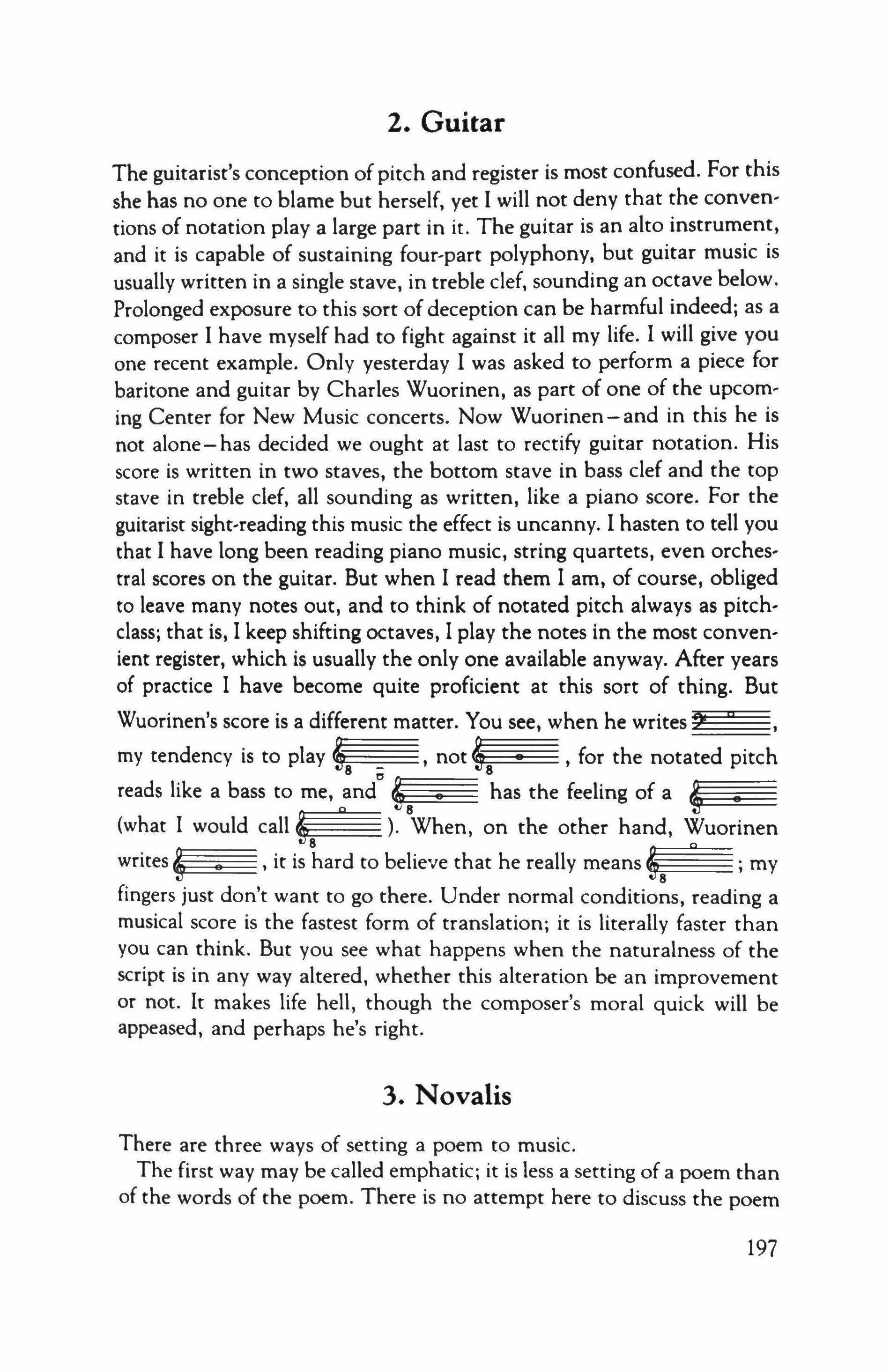
2. Guitar
The guitarist's conception of pitch and register is most confused. For this she has no one to blame but herself, yet I will not deny that the conventions of notation playa large part in it. The guitar is an alto instrument, and it is capable of sustaining four-part polyphony, but guitar music is usually written in a single stave, in treble clef, sounding an octave below. Prolonged exposure to this sort of deception can be harmful indeed; as a composer I have myself had to fight against it all my life. I will give you one recent example. Only yesterday I was asked to perform a piece for baritone and guitar by Charles Wuorinen, as part of one of the upcoming Center for New Music concerts. Now Wuorinen - and in this he is not alone-has decided we ought at last to rectify guitar notation. His score is written in two staves, the bottom stave in bass clef and the top stave in treble clef, all sounding as written, like a piano score. For the guitarist sight-reading this music the effect is uncanny. I hasten to tell you that I have long been reading piano music, string quartets, even orchestral scores on the guitar. But when I read them I am, of course, obliged to leave many notes out, and to think of notated pitch always as pitchclass; that is, I keep shifting octaves, I play the notes in the most convenient register, which is usually the only one available anyway. After years of practice I have become quite proficient at this sort of thing. But Wuorinen's score is a different matter. You see, when he writes��� my tendency is to play � , not , ' for the notated pitch 8 e 8 reads like a bass to me, and i has the feeling of a r.i¥��� o �8 � (what I would call t ). When, on the other hand, Wuorinen writes � , it is hard to believe that he really means *8 0 ; my fingers just don't want to go there. Under normal conditions, reading a musical score is the fastest form of translation; it is literally faster than you can think. But you see what happens when the naturalness of the script is in any way altered, whether this alteration be an improvement or not. It makes life hell, though the composer's moral quick will be appeased, and perhaps he's right.
3. Novalis
There are three ways of setting a poem to music. The first way may be called emphatic; it is less a setting of a poem than of the words of the poem. There is no attempt here to discuss the poem
197
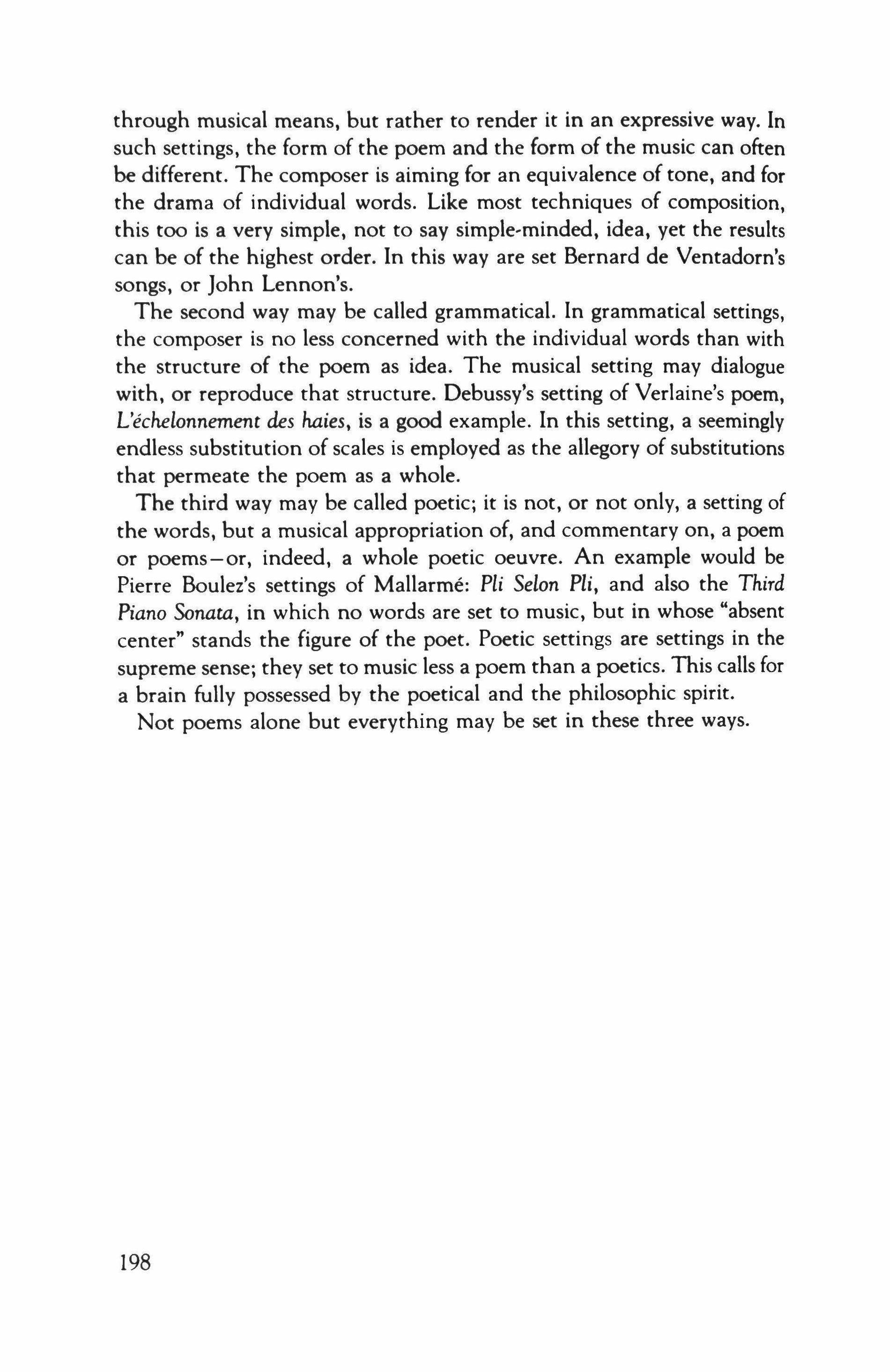
through musical means, but rather to render it in an expressive way. In such settings, the form of the poem and the form of the music can often be different. The composer is aiming for an equivalence of tone, and for the drama of individual words. Like most techniques of composition, this too is a very simple, not to say simple-minded, idea, yet the results can be of the highest order. In this way are set Bernard de Ventadorn's songs, or John Lennon's.
The second way may be called grammatical. In grammatical settings, the composer is no less concerned with the individual words than with the structure of the poem as idea. The musical setting may dialogue with, or reproduce that structure. Debussy's setting of Verlaine's poem, L'echelonnement des haies, is a good example. In this setting, a seemingly endless substitution of scales is employed as the allegory of substitutions that permeate the poem as a whole.
The third way may be called poetic; it is not, or not only, a setting of the words, but a musical appropriation of, and commentary on, a poem or poems-or, indeed, a whole poetic oeuvre. An example would be Pierre Boulez's settings of Mallarme: Pli Selon Pli, and also the Third Piano Sonata, in which no words are set to music, but in whose "absent center" stands the figure of the poet. Poetic settings are settings in the supreme sensei they set to music less a poem than a poetics. This calls for a brain fully possessed by the poetical and the philosophic spirit. Not poems alone but everything may be set in these three ways.
198
Popular Music and the Avant-Garde
Peter Schwendener
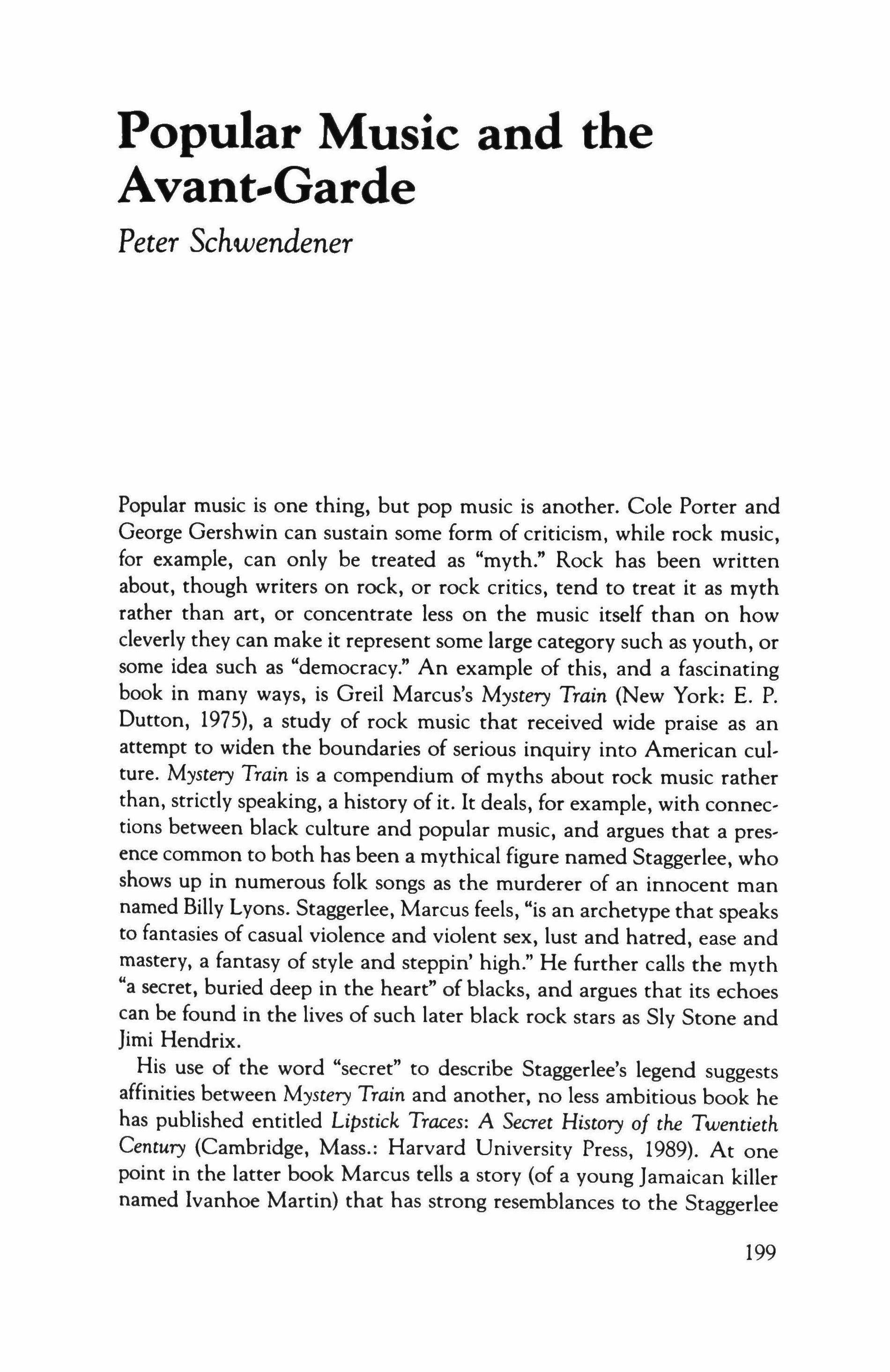
Popular music is one thing, but pop music is another. Cole Porter and George Gershwin can sustain some form of criticism, while rock music, for example, can only be treated as "myth." Rock has been written about, though writers on rock, or rock critics, tend to treat it as myth rather than art, or concentrate less on the music itself than on how cleverly they can make it represent some large category such as youth, or some idea such as "democracy." An example of this, and a fascinating book in many ways, is Greil Marcus's Mystery Train (New York: E. P. Dutton, 1975), a study of rock music that received wide praise as an attempt to widen the boundaries of serious inquiry into American culture. Mystery Train is a compendium of myths about rock music rather than, strictly speaking, a history of it. It deals, for example, with connections between black culture and popular music, and argues that a presence common to both has been a mythical figure named Staggerlee, who shows up in numerous folk songs as the murderer of an innocent man named Billy Lyons. Staggerlee, Marcus feels, "is an archetype that speaks to fantasies of casual violence and violent sex, lust and hatred, ease and mastery, a fantasy of style and steppin' high." He further calls the myth "a secret, buried deep in the heart" of blacks, and argues that its echoes can be found in the lives of such later black rock stars as Sly Stone and [imi Hendrix.
His use of the word "secret" to describe Staggerlee's legend suggests affinities between Mystery Train and another, no less ambitious book he has published entitled Lipstick Traces: A Secret History 0/ the Twentieth Century (Cambridge, Mass.: Harvard University Press, 1989). At one point in the latter book Marcus tells a story (of a young Jamaican killer named Ivanhoe Martin) that has strong resemblances to the Staggerlee
199
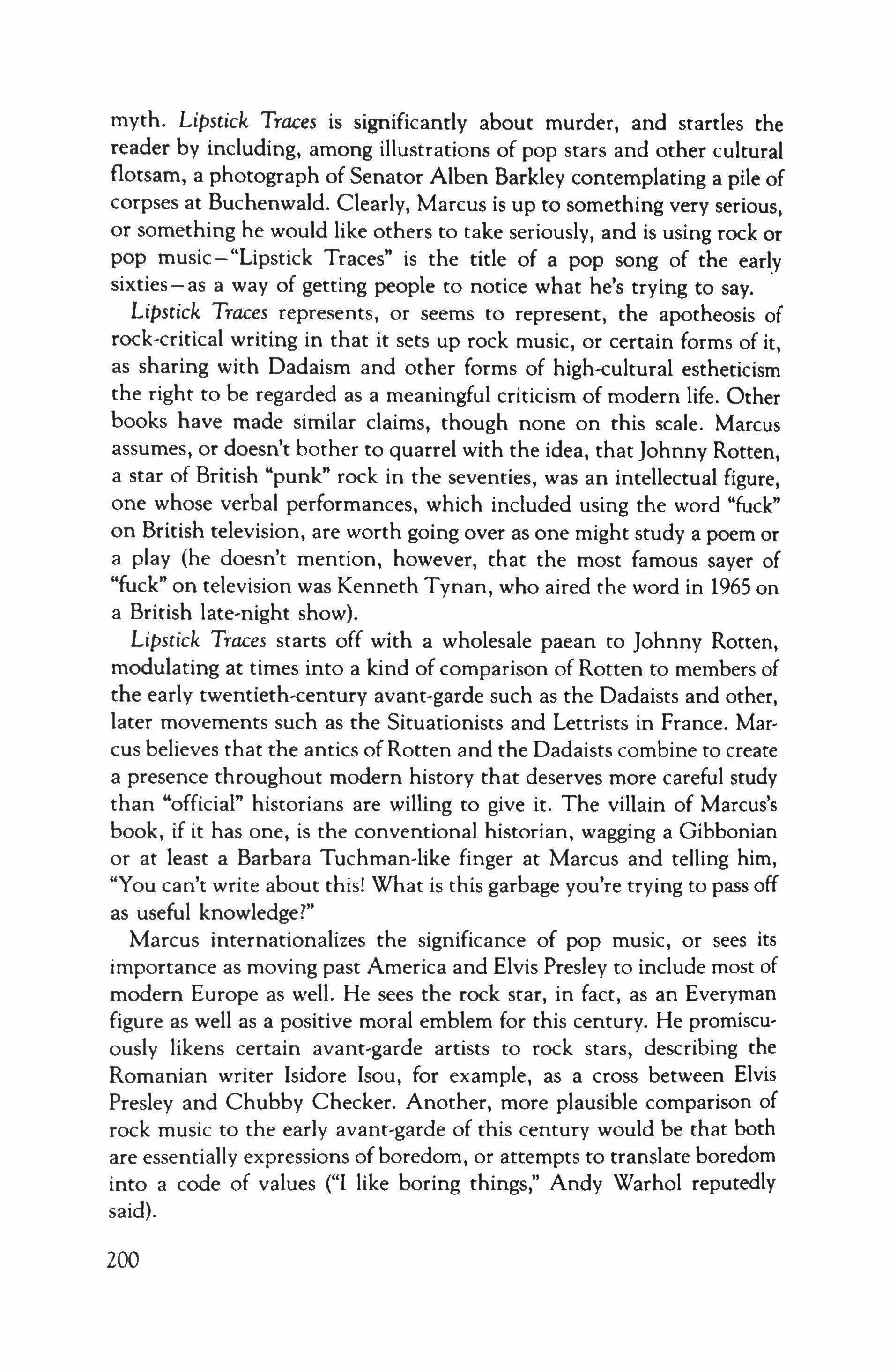
myth. Lipstick Traces is significantly about murder, and startles the reader by including, among illustrations of pop stars and other cultural flotsam, a photograph of Senator Alben Barkley contemplating a pile of corpses at Buchenwald. Clearly, Marcus is up to something very serious, or something he would like others to take seriously, and is using rock or pop music - "Lipstick Traces" is the title of a pop song of the early sixties-as a way of getting people to notice what he's trying to say..
Lipstick Traces represents, or seems to represent, the apotheosis of rock-critical writing in that it sets up rock music, or certain forms of it, as sharing with Dadaism and other forms of high-cultural estheticism the right to be regarded as a meaningful criticism of modern life. Other books have made similar claims, though none on this scale. Marcus assumes, or doesn't bother to quarrel with the idea, that Johnny Rotten, a star of British "punk" rock in the seventies, was an intellectual figure, one whose verbal performances, which included using the word "fuck" on British television, are worth going over as one might study a poem or a play (he doesn't mention, however, that the most famous sayer of "fuck" on television was Kenneth Tynan, who aired the word in 1965 on a British late-night show).
Lipstick Traces starts off with a wholesale paean to Johnny Rotten, modulating at times into a kind of comparison of Rotten to members of the early twentieth-century avant-garde such as the Dadaists and other, later movements such as the Situationists and Lettrists in France. Marcus believes that the antics of Rotten and the Dadaists combine to create a presence throughout modern history that deserves more careful study than "official" historians are willing to give it. The villain of Marcus's book, if it has one, is the conventional historian, wagging a Gibbonian or at least a Barbara Tuchman-like finger at Marcus and telling him, "You can't write about this! What is this garbage you're trying to pass off as useful knowledge?"
Marcus internationalizes the significance of pop music, or sees its importance as moving past America and Elvis Presley to include most of modern Europe as well. He sees the rock star, in fact, as an Everyman figure as well as a positive moral emblem for this century. He promiscuously likens certain avant-garde artists to rock stars, describing the Romanian writer Isidore Isou, for example, as a cross between Elvis Presley and Chubby Checker. Another, more plausible comparison of rock music to the early avant-garde of this century would be that both are essentially expressions of boredom, or attempts to translate boredom into a code of values ("I like boring things," Andy Warhol reputedly said).
200

For the Dadaists, boredom was especially identified with "art" or angrily identified with the cult of the "work of art" or, more scornfully, the "Masterpiece." Like Oscar Wilde, the Dadaists were more interested in "art" as a form of behavior than as a way of making things. As critics of art, which they were in a way, they were apocalyptic or quasireligious, seeing all art as so many graven images that had to be publicly demolished or discredited. Rock or pop music, Marcus feels, adopts the same view, or deserves equally serious notice as a principled attack on art or "technique" as social values. Here, to establish what he means by assailing technique as a social value, is a conversation he had with a rock musician about the impact ofJohnny Rotten's group, the Sex Pistols, in the seventies:
"1 saw the Sex Pistols," said Bernard Sumner of Joy Division (later, after the band's singer killed himself, of New Order). "They were terrible. I thought they were great. I wanted to get up and be terrible too."
Technique is not this easily disposed of. Technique is, in many ways, the conscience of art, or hard element against which attempts to reduce it to a mere theory find their limit. Technique is attacked or dismissed by people like Bernard Sumner as a mere ruse or ploy to keep undesirables away from music, but it's not that simple. Technique is a stay against theory, yet technique, or the factor of technique, prevents music from becoming the effete phenomenon Sumner and Marcus both mistake it for.
Technique is the main thing writers on rock music have to face, or the one thing that makes rock music worth considering as something more than a trend or a "moral" issue. Most writers on rock music lunge straight for what they consider the morality or "message" of the music, as if technique weren't a message, or as if rock were a totally verbal phenomenon. One of the more interesting things about rock criticism is its "lit" (as opposed to literary) quality, or the predilection rock writers show for academic generalities about their subject. The most extreme example of this is The Triumph of Vulgarity: Rock Music in the Mirror of Romanticism (New York: Oxford University Press, 1987), a book by Robert Pattison that varnishes rock music into a manifestation of late-Romantic pantheism.
Books like these are more interesting, in some ways, than the music they aspire to analyze. There is, in other words, an almost too-serious disparity between the idea of writing a book and the idea of rock music. It is generally underrated among rock writers, or seems to be, how hard
201
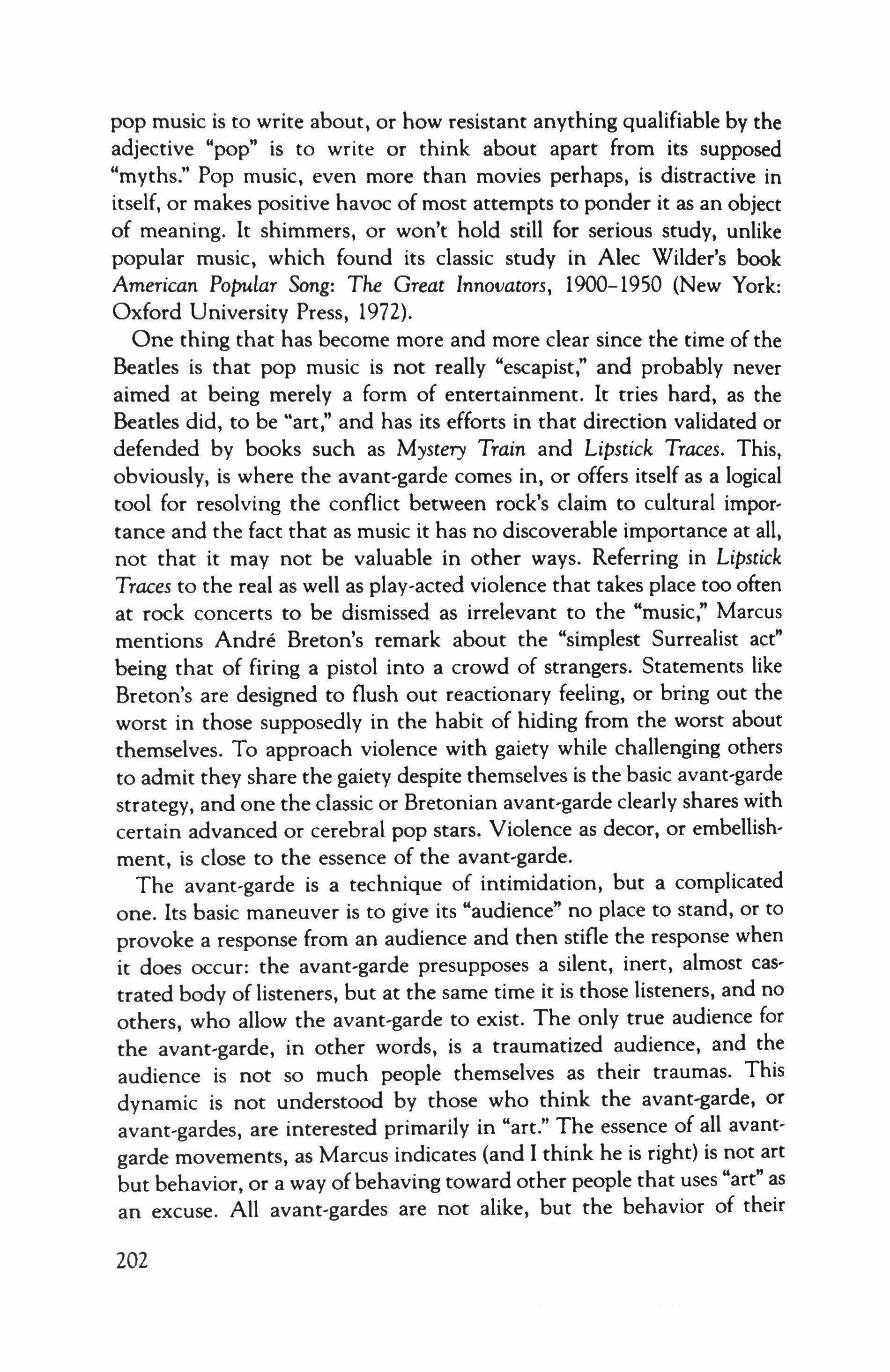
pop music is to write about, or how resistant anything qualifiable by the adjective "pop" is to write or think about apart from its supposed "myths." Pop music, even more than movies perhaps, is distractive in itself, or makes positive havoc of most attempts to ponder it as an object of meaning. It shimmers, or won't hold still for serious study, unlike popular music, which found its classic study in Alec Wilder's book American Popular Song: The Great Innovators, 1900-1950 (New York: Oxford University Press, 1972).
One thing that has become more and more clear since the time of the Beatles is that pop music is not really "escapist," and probably never aimed at being merely a form of entertainment. It tries hard, as the Beatles did, to be "art," and has its efforts in that direction validated or defended by books such as Mystery Train and Lipstick Traces. This, obviously, is where the avant-garde comes in, or offers itself as a logical tool for resolving the conflict between rock's claim to cultural importance and the fact that as music it has no discoverable importance at all, not that it may not be valuable in other ways. Referring in Lipstick Traces to the real as well as play-acted violence that takes place too often at rock concerts to be dismissed as irrelevant to the "music," Marcus mentions Andre Breton's remark about the "simplest Surrealist act" being that of firing a pistol into a crowd of strangers. Statements like Breton's are designed to flush out reactionary feeling, or bring out the worst in those supposedly in the habit of hiding from the worst about themselves. To approach violence with gaiety while challenging others to admit they share the gaiety despite themselves is the basic avant-garde strategy, and one the classic or Bretonian avant-garde clearly shares with certain advanced or cerebral pop stars. Violence as decor, or embellishment, is close to the essence of the avant-garde.
The avant-garde is a technique of intimidation, but a complicated one. Its basic maneuver is to give its "audience" no place to stand, or to provoke a response from an audience and then stifle the response when it does occur: the avant-garde presupposes a silent, inert, almost castrated body of listeners, but at the same time it is those listeners, and no others, who allow the avant-garde to exist. The only true audience for the avant-garde, in other words, is a traumatized audience, and the audience is not so much people themselves as their traumas. This dynamic is not understood by those who think the avant-garde, or avant-gardes, are interested primarily in "art." The essence of all avantgarde movements, as Marcus indicates (and I think he is right) is not art but behavior, or a way ofbehaving toward other people that uses "art" as an excuse. All avant-gardes are not alike, but the behavior of their
202
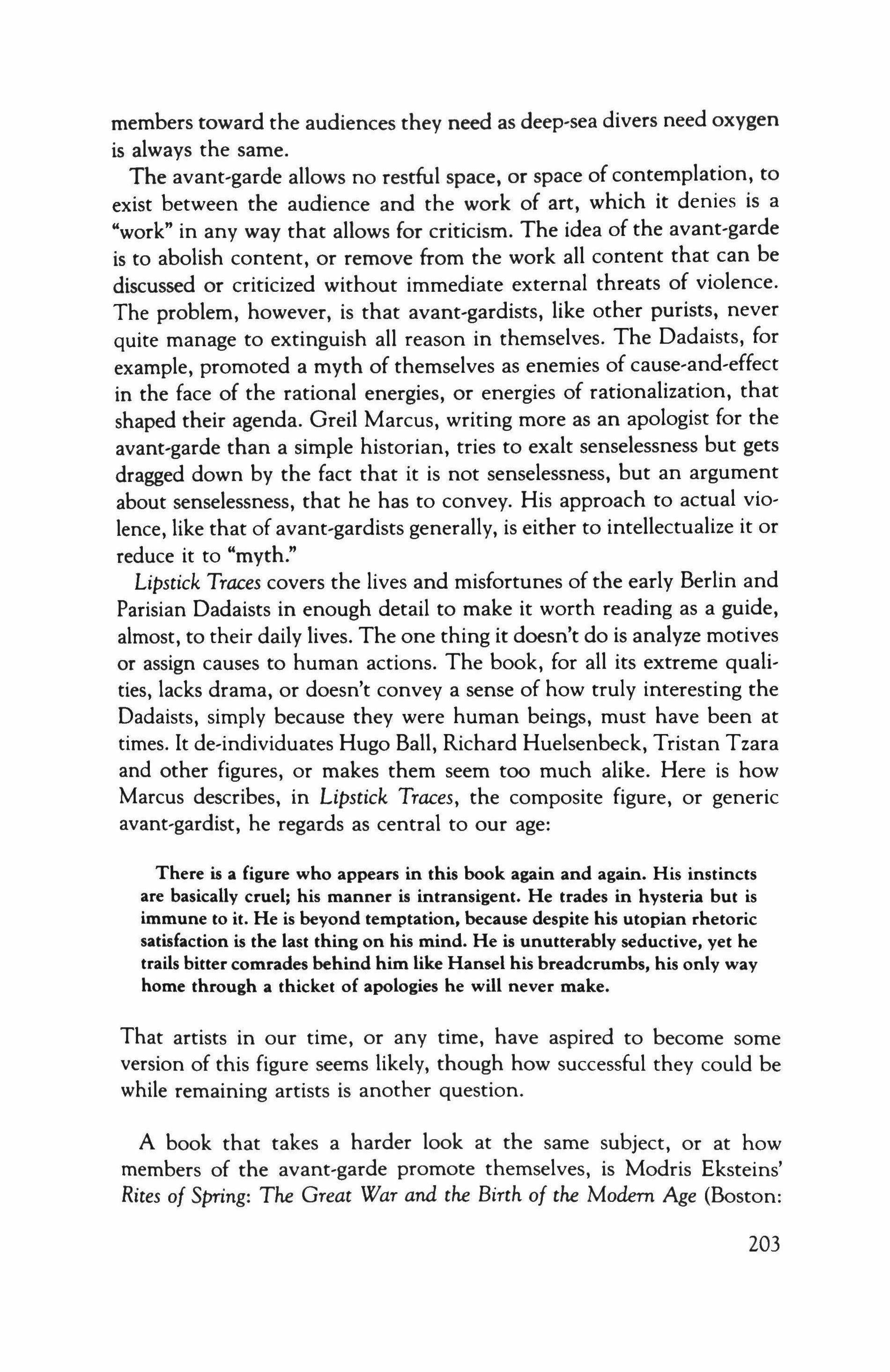
members toward the audiences they need as deep-sea divers need oxygen is always the same.
The avant-garde allows no restful space, or space of contemplation, to exist between the audience and the work of art, which it denies is a "work" in any way that allows for criticism. The idea of the avant-garde is to abolish content, or remove from the work all content that can be discussed or criticized without immediate external threats of violence. The problem, however, is that avant-gardists, like other purists, never quite manage to extinguish all reason in themselves. The Dadaists, for example, promoted a myth of themselves as enemies of cause-and-effect in the face of the rational energies, or energies of rationalization, that shaped their agenda. Greil Marcus, writing more as an apologist for the avant-garde than a simple historian, tries to exalt senselessness but gets dragged down by the fact that it is not senselessness, but an argument about senselessness, that he has to convey. His approach to actual violence, like that of avant-gardists generally, is either to intellectualize it or reduce it to "myth."
Lipstick Traces covers the lives and misfortunes of the early Berlin and Parisian Dadaists in enough detail to make it worth reading as a guide, almost, to their daily lives. The one thing it doesn't do is analyze motives or assign causes to human actions. The book, for all its extreme qualities, lacks drama, or doesn't convey a sense of how truly interesting the Dadaists, simply because they were human beings, must have been at times. It de-individuates Hugo Ball, Richard Huelsenbeck, Tristan Tzara and other figures, or makes them seem too much alike. Here is how Marcus describes, in Lipstick Traces, the composite figure, or generic avant-gardist, he regards as central to our age:
There is a figure who appears in this book again and again. His instincts are basically cruel; his manner is intransigent. He trades in hysteria but is immune to it. He is beyond temptation, because despite his utopian rhetoric satisfaction is the last thing on his mind. He is unutterably seductive, yet he trails bitter comrades behind him like Hansel his breadcrumbs, his only way home through a thicket of apologies he will never make.
That artists in our time, or any time, have aspired to become some version of this figure seems likely, though how successful they could be while remaining artists is another question.
A book that takes a harder look at the same subject, or at how members of the avant-garde promote themselves, is Modris Eksteins' Rites of Spring: The Great War and the Birth of the Modern Age (Boston:
203

Houghton Mifflin, 1989). His approach goes contrary to Marcus's in that he describes Diaghilev, Nijinsky, Stravinsky and other figures in a way that does justice to their work without surrendering all criticism to the charm or force of their personalities. Eksteins' book is principally about the First World War, yet he also considers avant-gardisrn as an ideal and cause of human behavior. Considering the Dadaists in relation to the war, for example, he draws out the ordinary or unremarkable narcissism that lay behind their "protest":
Despite the purported anguish and rage, Dada seemed to revel in the war:
"The war is our brothel," wrote Hugo Ball. Dada's own orgy of denial was a spiritual counterpart to the war itself. In rejecting cause and effect, past and future, and all meaning except the roll of the dice, Dada frolicked in a narcissism that had a German tone and, though vociferously denying meaning, it nonetheless looked on the war as the essence of meaning. Dada's nihilistic games were war games of the mind.
This retrieves, or restores to the Dadaists, the humanity they tried consciously to lose. It undermines their claim to despair or some other attractively deep quality by illustrating the composure, or trick of seeming casually to bestride the chaos others can't handle, that defines the avant-garde.
The avant-garde, like pop music, is a set of attitudes rather than "works." This puts the historian of both things at a disadvantage. Eksteins solves the problem by refusing to ignore the humanity of his subjects, while Marcus uses "secret history" as a means of merging his own humanity, or subjectivity, with his research. The result is mixed, or it's not clear how much he makes the category of "straight," or external, history seem foolish or outmoded. As Eksteins and other writers prove, subjectivity, or the inner life of the historian, is not necessarily overwhelmed by the criterion of objectivity. Historians can and do use events or persons remote from their own lives as means of exploring their lives, or don't have to use autobiography as a way of investing their subjects with emotion, as Marcus does in describing the rock concertlike excitement of going to college in the sixties:
In the fall of 1964, in Berkeley, at the University of California, I was, day after day, for months, part of the crowd that made up the Free Speech Movement. In that event, which began as a small protest over rules and regulations, and which I now understand as a conversation, everything was at stake and, in one way or another, everyone took part It was a period of doubt, chaos, anger, hesitation, confusion, and finally joy-that's the word. Your own history was lying in pieces on the ground, and you had the choice
204
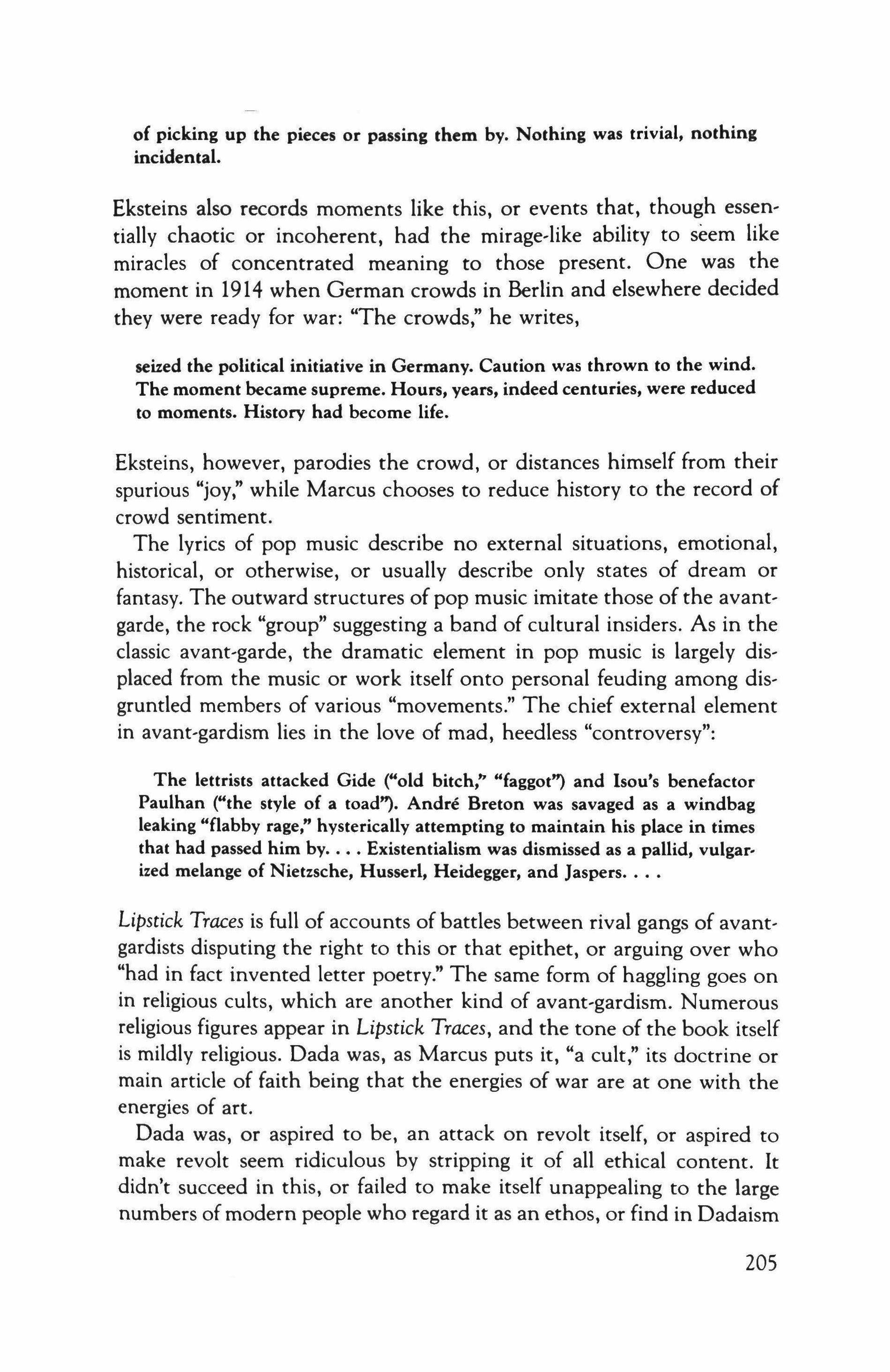
of picking up the pieces or passing them by. Nothing was trivial, nothing incidental.
Eksteins also records moments like this, or events that, though essen' tially chaotic or incoherent, had the mirage'like ability to seem like miracles of concentrated meaning to those present. One was the moment in 1914 when German crowds in Berlin and elsewhere decided they were ready for war: "The crowds," he writes,
seized the political initiative in Germany. Caution was thrown to the wind.
The moment became supreme. Hours, years, indeed centuries, were reduced to moments. History had become life.
Eksteins, however, parodies the crowd, or distances himself from their spurious "joy," while Marcus chooses to reduce history to the record of crowd sentiment.
The lyrics of pop music describe no external situations, emotional, historical, or otherwise, or usually describe only states of dream or fantasy. The outward structures of pop music imitate those of the avant, garde, the rock "group" suggesting a band of cultural insiders. As in the classic avant-garde, the dramatic element in pop music is largely dis, placed from the music or work itself onto personal feuding among dis, gruntled members of various "movements." The chief external element in avant-gardism lies in the love of mad, heedless "controversy":
The lettrists attacked Gide ("old bitch," "faggot") and lsou's benefactor Paulhan ("the style of a toad"). Andre Breton was savaged as a windbag leaking "flabby rage," hysterically attempting to maintain his place in times that had passed him by Existentialism was dismissed as a pallid, vulgarized melange of Nietzsche, Husserl, Heidegger, and Jaspers
Lipstick Traces is full of accounts of battles between rival gangs of avantgardists disputing the right to this or that epithet, or arguing over who "had in fact invented letter poetry." The same form of haggling goes on in religious cults, which are another kind of avant-gardism. Numerous religious figures appear in Lipstick Traces, and the tone of the book itself is mildly religious. Dada was, as Marcus puts it, "a cult," its doctrine or main article of faith being that the energies of war are at one with the energies of art.
Dada was, or aspired to be, an attack on revolt itself, or aspired to make revolt seem ridiculous by stripping it of all ethical content. It didn't succeed in this, or failed to make itself unappealing to the large numbers of modern people who regard it as an ethos, or find in Dadaism
205
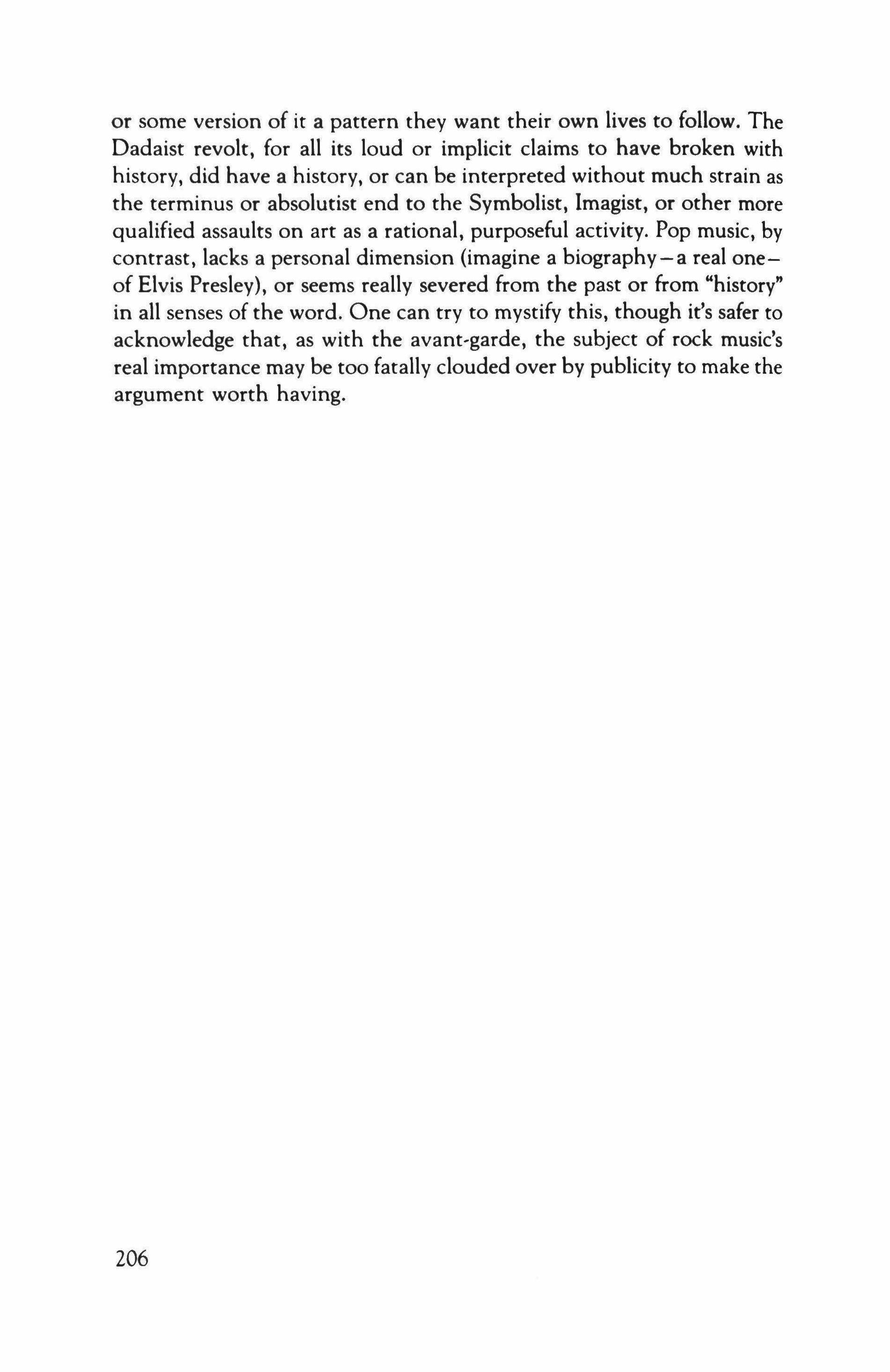
or some version of it a pattern they want their own lives to follow. The Dadaist revolt, for all its loud or implicit claims to have broken with history, did have a history, or can be interpreted without much strain as the terminus or absolutist end to the Symbolist, Imagist, or other more qualified assaults on art as a rational, purposeful activity. Pop music, by contrast, lacks a personal dimension (imagine a biography-a real oneof Elvis Presley), or seems really severed from the past or from "history" in all senses of the word. One can try to mystify this, though it's safer to acknowledge that, as with the avant-garde, the subject of rock music's real importance may be too fatally clouded over by publicity to make the argument worth having.
206
Usurpations: A Poetics of Catastrophe and the Language of Jewish History
Michael Andre Bernstein

I've yoked together my large silence and my small outcry. - Yehuda Amichai And That Is Your Glory
IGive all your nights to the study of Talmud
By day practice shooting from the hip - Irving Layton ("Recipe for a Long and Happy Life")
Initially, one of the most arresting features of many Orthodox settlements erected in the occupied West Bank since 1967 is their large percentage of North American and British-born members. Still more striking, though, is the fact that these late-coming pioneers, often fundamentalist in their religion and far-right in their politics, characteristically arrived in Israel only after, and in part as a response to, the spectacular dangers and victories of the Six-Day War. Yet when we hear their voices, New Jersey or Toronto intonations still unmistakable inand-through the shared Biblical provenance of their affirmations, what emerges is a seamless tale of a people persecuted and hated even in their own land, victims of an unbroken chain of atrocities from the destruction of the Second Temple to the Arab Riots of the late 1930's. And,
207

invoked as a kind of ultimate exemplary warning, there is the still more catastrophic story of European Jewry, hurtled from pogroms to expulsions until a millennial anti-Semitism culminated in the utter horror of the Shoah.
Now, in a fundamental sense, it is true that all of these narratives are a central portion of every Jew's heritage. But their specific historical, psychological and ethical proportion, as one element in the enormously complex and variegated unfolding of post-Exilic Jewish experience, needs to be assessed with tremendous care and with a continuing sense of concrete distinctions, in order to avoid misappropriating their meaning. Too many vital questions are elided when the litany of catastrophes is invoked so regularly and rapidly, whether alone to oneself, to native Israeli writers and political figures on the Left, or to the foreign press and television commentators.
The first question, surely, is as much a poetic-in the deepest meaning of imaginative recreation - as a political puzzle. How and by what psychological or spiritual mechanisms can these children of the prosperous suburbs speak with such total identification-as though they had actually been there-about, for example, the February 1948 Arab attacks on the three settlements of Ein Hanatziv, Sde Eliahu and Tirat Tzvi, let alone about the, in every sense unimaginable, universe of the death camps? The usual "liberal" explanation for this phenomenon is that the invocation of these horrors has a strictly polemical aim: to justify a policy ofNo Retreat from the Territories, No Surrender of an Inch [a! sha'al is one of the official slogans of the ultra-orthodox Gush Emunim movement] of Sacred Land on the grounds that in a world of murderous anti-Semites negotiation is in every case a futile, if not a suicidal, delusion. Each concession, in this view, simply gives renewed hope to men who want only to exterminate all Jews.
Undoubtedly such tactical considerations do play an important part in the way Jewish catastrophes are drawn upon, and political observers are right to underline that Menachem Begin was the first Israeli prime minister to invoke the Holocaust in almost every major address defending his policies both to his critics at home and, more particularly, to the entire American Jewish community. Today, as anyone who hears Begin's successors and disciples soon realizes, there is indeed a depressing trend in which it is primarily the history of anti-Semitic persecution and the fear of constantly new eruptions of the same contagion that justifies and legitimizes the actions of the Jewish state rather than its own positive historical values and traditions. There is a demoralizing sense in which current symptoms of such hatred, whether the Austrian support of Kurt
208

Waldheim or the popular success of a new translation of The Protocols of the Elders of Zion in Japan are emphatically welcomed by many of the younger right-wingers as clear evidence of another impending catastrophe which only the most unyielding Israeli militancy has a chance to stave off. Thus, although I think that his account is more anecdotal than analytic, and his formulations too neat for a problem of such complexity, Thomas L. Friedman's strictures against "the 'Yad Vasheming' of Israel" in his recent book From Beirut to Jerusalem (New York: Farrar, Straus, Giroux, 1989) (e.g., his "Israel today is becoming Yad Vashem [the Holocaust Memorial in Jerusalem] with an airforce") are becoming depressingly more accurate with each year. What is hard for even a sophisticated political journalist like Friedman to recognize, how, ever, is that whether based on historical testimony or contemporary newspapers, the imagination reaches deeper than tactics and comes from more potent roots, and the sincerity of the, strictly speaking, "fictive" testimonies to a horror the speakers never witnessed for themselves belies any purely strategic explanation. Zakhor, the Biblical command, ment to remember, as Yosef Hayim Yerushalmi's brilliant study by that name reminds us (Seattle: University of Washington Press, 1982), has shaped Jewish consciousness throughout history, often providing the imaginative structures through which events were rendered comprehensible by fitting them into the framework of already-familiar narratives. (Thus, for example, Yerushalmi traces how, for all the enormous differ, ences in the situation of the Jews in Eastern Europe during the seventeenth-century pogroms from that of the twelfth-century Rhine, land Jews, "the two were homologized, and the writers depicted the slaughter of 1648 as a repetition of the martyrdom of the Crusades.")
Even more telling, an unsentimental reading of the Passover Haggadah as a narrative of commemoration would intensify our awareness of just how constitutive-and by the same token how historically and psycho, logically problematic-is the impulse in Jewish thought to see present and past as intertwined manifestations of a single pattern. Such considerations ought, perhaps, to temper our critique of the artificiality and tendentiousness of the various recent pronouncements about Jewish victimization that I have been criticizing. But finally, the impulse to qualify one's judgments must give way to the inescapable sense of senti, mentalization, exploitation and personal self,aggrandizement that makes itself heard repeatedly in the cataloging ofJewish persecution as a justifi, cation for new acts of militancy and unyieldingness.
Two immediate and mutually linked differences between the kinds of temperaments Yerushalmi chronicles and the settlers with whom I am
209
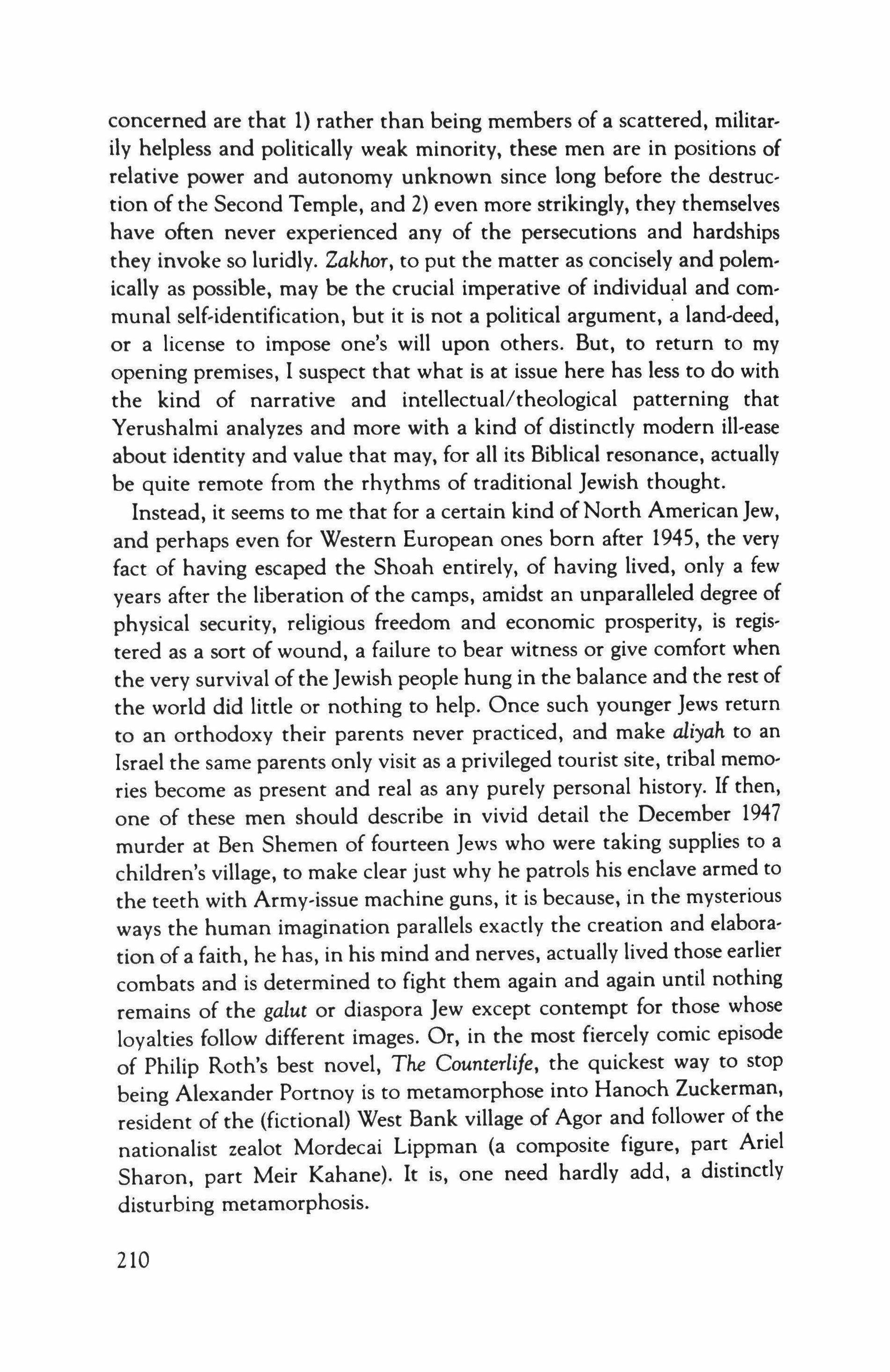
concerned are that 1) rather than being members of a scattered, militarily helpless and politically weak minority, these men are in positions of relative power and autonomy unknown since long before the destruction of the Second Temple, and 2) even more strikingly, they themselves have often never experienced any of the persecutions and hardships they invoke so luridly. Zakhor, to put the matter as concisely and polemically as possible, may be the crucial imperative of individual and communal self-identification, but it is not a political argument, a land-deed, or a license to impose one's will upon others. But, to return to my opening premises, I suspect that what is at issue here has less to do with the kind of narrative and intellectual/theological patterning that Yerushalmi analyzes and more with a kind of distinctly modern ill-ease about identity and value that may, for all its Biblical resonance, actually be quite remote from the rhythms of traditional Jewish thought.
Instead, it seems to me that for a certain kind of North American Jew, and perhaps even for Western European ones born after 1945, the very fact of having escaped the Shoah entirely, of having lived, only a few years after the liberation of the camps, amidst an unparalleled degree of physical security, religious freedom and economic prosperity, is registered as a sort of wound, a failure to bear witness or give comfort when the very survival of the Jewish people hung in the balance and the rest of the world did little or nothing to help. Once such younger Jews return to an orthodoxy their parents never practiced, and make aliyah to an Israel the same parents only visit as a privileged tourist site, tribal memories become as present and real as any purely personal history. If then, one of these men should describe in vivid detail the December 1947 murder at Ben Shemen of fourteen Jews who were taking supplies to a children's village, to make clear just why he patrols his enclave armed to the teeth with Army-issue machine guns, it is because, in the mysterious ways the human imagination parallels exactly the creation and elaboration of a faith, he has, in his mind and nerves, actually lived those earlier combats and is determined to fight them again and again until nothing remains of the galut or diaspora Jew except contempt for those whose loyalties follow different images. Or, in the most fiercely comic episode of Philip Roth's best novel, The Counterli/e, the quickest way to stop being Alexander Portnoy is to metamorphose into Hanoch Zuckerman, resident of the (fictional) West Bank village of Agor and follower of the nationalist zealot Mordecai Lippman (a composite figure, part Ariel Sharon, part Meir Kahane). It is, one need hardly add, a distinctly disturbing metamorphosis.
210
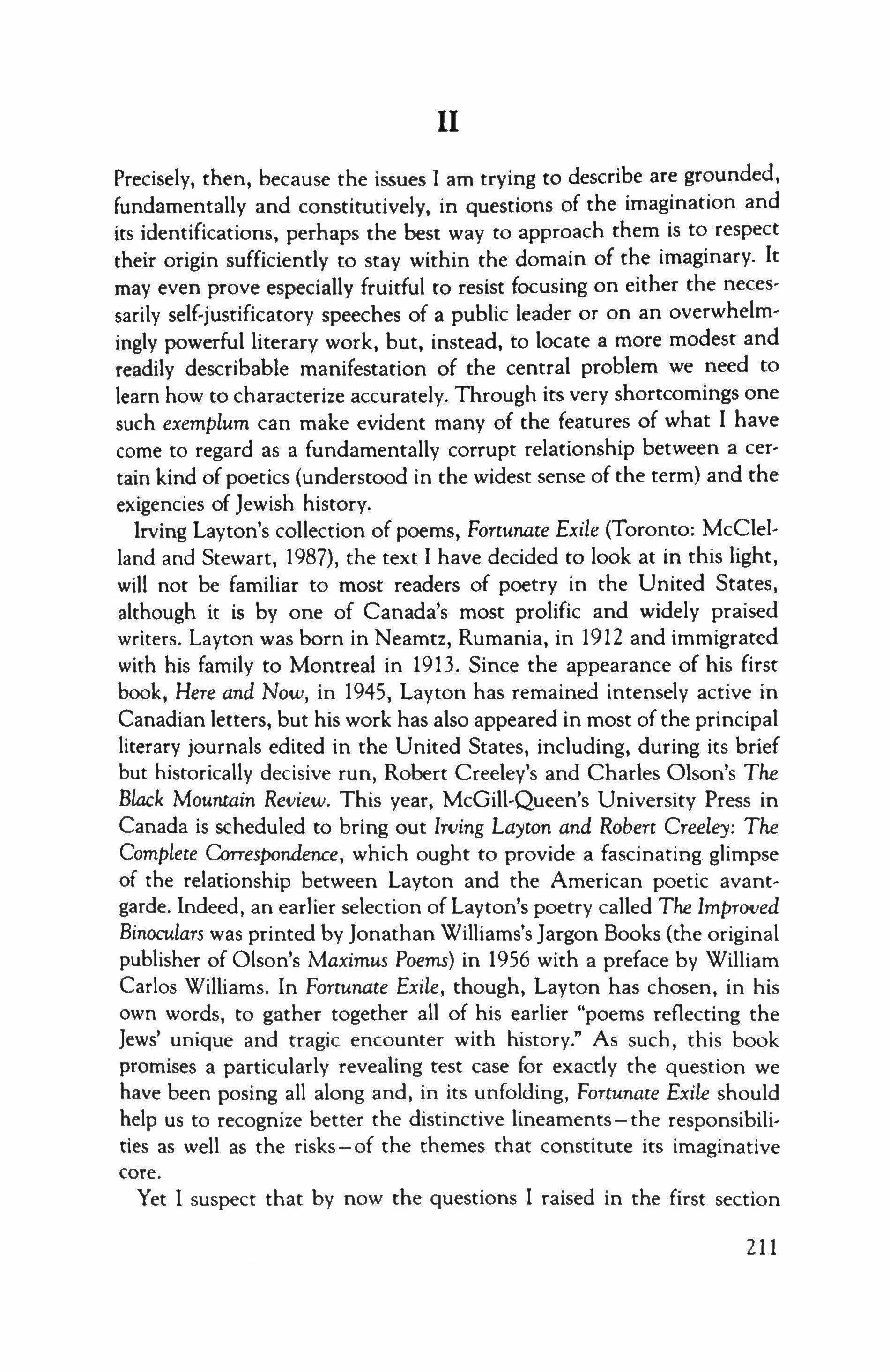
II
Precisely, then, because the issues I am trying to describe are grounded, fundamentally and constitutively, in questions of the imagination and its identifications, perhaps the best way to approach them is to respect their origin sufficiently to stay within the domain of the imaginary. It may even prove especially fruitful to resist focusing on either the necessarily self-justificatory speeches of a public leader or on an overwhelmingly powerful literary work, but, instead, to locate a more modest and readily describable manifestation of the central problem we need to learn how to characterize accurately. Through its very shortcomings one such exemplum can make evident many of the features of what I have come to regard as a fundamentally corrupt relationship between a certain kind of poetics (understood in the widest sense of the term) and the exigencies of Jewish history.
Irving Layton's collection of poems, Fortunate Exile (Toronto: McClelland and Stewart, 1987), the text I have decided to look at in this light, will not be familiar to most readers of poetry in the United States, although it is by one of Canada's most prolific and widely praised writers. Layton was born in Neamtz, Rumania, in 1912 and immigrated with his family to Montreal in 1913. Since the appearance of his first book, Here and Now, in 1945, Layton has remained intensely active in Canadian letters, but his work has also appeared in most of the principal literary journals edited in the United States, including, during its brief but historically decisive run, Robert Creeley's and Charles Olson's The Black Mountain Review. This year, McGill-Queen's University Press in Canada is scheduled to bring out Irving Layton and Robert Creeley: The Complete Correspondence, which ought to provide a fascinating. glimpse of the relationship between Layton and the American poetic avantgarde. Indeed, an earlier selection of Layton's poetry called The Improved Binoculars was printed by Jonathan Williams's Jargon Books (the original publisher of Olson's Maximus Poems) in 1956 with a preface by William Carlos Williams. In Fortunate Exile, though, Layton has chosen, in his own words, to gather together all of his earlier "poems reflecting the Jews' unique and tragic encounter with history." As such, this book promises a particularly revealing test case for exactly the question we have been posing all along and, in its unfolding, Fortunate Exile should help us to recognize better the distinctive lineaments- the responsibilities as well as the risks - of the themes that constitute its imaginative core.
Yet I suspect that by now the questions I raised in the first section
211

about the West Bank settlers and the rhetoric of justification by the Israeli right seem quite remote from any discussion of a book of verse like Fortunate Exile. If so, however, we can begin by considering a poem like "Recipe for a Long and Happy Life," quoted in its entirety at the outset of this essay, or these concluding lines from "For My Sons, Max and David":
The Jew every Christian hates, having shattered his self-esteem and planted the seeds of doubt in his soul
The Jew everyone seeks to destroy, having instilled self-division in the heathen
Be none of these, my sons
My sons, be none of these
Be gunners in the Israeli Air Force.
Layton's vision consists almost exclusively of images of the goyim's unremitting longing to exterminate the Jews (and here the contemptuous term for gentiles is the only appropriate one for his perspective), of the need to be perpetually vigilant to forestall another Shoah, and in a strained and rather sad compensatory move, of a desire for a language as violent, direct and brutal as were the instruments with which Jews were put to the slaughter:
When reading me, I want you to feel as if I had ripped your skin 0((; Or gouged out your eyes with my fingers; Or scalped you, and afterwards burnt your hair in the staring sockets; having first filled them with fluid from your son's lighter.
I want you to feel as if I had slammed your child's head against a spike; And cut 0(( your member and stuck it in your wife's mouth to smoke like a cigar.
("Whom I Write For")
Stanzas like this are less a genuine historical or racial memory than Grand Guignol-like attempts to create an emotional shock that seems entirely unearned and offensive in its gratuitousness. Although the images claim to be drawn from the storehouse ofJewish experience, their resonance is entirely solipsistic, the tropes ofcommunal anguish brought in merely as a shrill and unearned correlative to the poet's self-
212

aggrandizement. Layton's real fear, I suspect, a fear that, in the event, is well justified, is that his reader will feel nothing when reading him beyond a smoldering anger at his pretensions to voicing any aspect of Jewish history at all. I have yet to read, in the accounts of those who have themselves suffered at the hands of an oppressor, anyone who would commit such lines to paper or indulge in such lumpishly indiscriminate fantasies of revenge. (Imagine, for a moment, what a Primo Levi or a Jean Amery, exemplary survivors of, and witnesses to, the Shoah, would make of this stanza.) In their articulation, what such lines effect is exactly to reverse the proportions Yehuda Amichai recommends in the lines I chose for my epigraph; they have, that is, yoked together an enormously shrill outcry and a very small silence. And in so doing, even horror has become an empty cliche and outrage a hollow gesture. No doubt a psychoanalytically informed reader, coming across the lines I have already quoted or this typical opening and closing stanza from a poem called"After Auschwitz": "My son / don't be a waffling poet; / let each word you write / be direct and honest / like the crack of a gun / / An automatic rifle / endures / a lifetime" would be tempted to think of a diagnosis like "identifying with the aggressor," and regard Layton's violent language as the perfect internalization of the antiSemites' brutality. But I think that any sense of an identity constituted fundamentally by victimization is an extraordinarily problematic basis for either an individual or a group to build upon, and the sad truth is that, in contrast to the celebrated opening ofTolstoy's Anna Karenina, it is "unhappy" consciousnesses that so much resemble one another in their misery. (Indeed, as Primo Levi points out, one of the cardinal sins committed by those who inflict great suffering upon others is the distortions of character with which they permanently disfigure those who were once in their power, and surely one of the primary goals of Zionism has always been precisely the overcoming of this aspect of Jewish selfcharacterization. How ironic, then, to see it invoked so often, not merely in Diaspora poets like Layton, but within Israel itself, and not least in its official political rhetoric.) But if the poetry of victimization, irrespective of its origin, all too often seems to press each individual expression to resemble its predecessor, there is something still more amiss when its conventions are ransacked in so arbitrary and willful a manner. Ultimately, the poems in Fortunate Exile are, in spite of their thematic preoccupation with Jewish history, exactly what Verlaine meant by the dismissive designation de La litterature-merely empty words - and their loud claims to be more only helps confirm their secondary stature.
213

Although it is clear that I can't help regarding Fortunate Exile as, at every level, an appalling volume imaginatively, morally and technically, the issues that it fails to confront adequately are too important not to spell out clearly. Layton's stance is symptomatic of a whole series of usurpations of Jewish history for poetic intensity, and as a negative exemplum his work assumes a kind of emblematic significance. What is cumulatively trivialized by the shrillness of all such usurpations is poetry's hope to find a language able to speak meaningfully about the hardest and most painful of human events, and what is surrendered in its easy rhetoric is the project of discovering the forms in which the history of a people can still be given memorable speech.
If the logic of my implicit comparison between Layton's poses and a certain rhetoric common to many of the post-1967 West Bank settlers should now be clear, it is just as important to emphasize the differences between the two. Most obvious, of course, is the absence of anything like a religious dimension to Layton's thought. In fact, he is proud to announce that he has freed himself from any theological doctrine or ritual observance: "From my heart I rooted out Jehovah / I spurned Moses and his Tables of Law" ("To Maoists"), and writes a number of tonally unfocused poems to Jesus, who is figured as the persecuted "brother" of the outraged and wounded artist. But what is most troubling in Layton's historical vision, and where his fantasies do intersect with one strand in the contemporary Jewish imagination, is his inability to see the unfolding of Jewish life throughout time as anything other than a wrenching from horror to horror. It is exactly against this notion of Jewish history as nothing but a Jammergeschichte, an endless tale of woe, that Gershom Sholem began his studies of Jewish kabbalistic and mystical thought, that Salo Baron undertook his monumental studies, The Jewish Community and A Social and Religious History of the Jews (18 volumes; New York: Columbia University Press, 1952-1983), and that Robert Alter, in a crucial essay on the "Deformations of the Holocaust" warned that "it is as important to study how the Jews lived as how they died." That such warnings should be required, as indeed they all too unfortunately still are, is an index of how strong and prevalent remains the temptation to "deform" the Shoah into the center of one's conception of what it means to be a Jew. For Layton, and authors like him, there are ultimately only two kinds of Jews: the standard list of "world historical" figures whose stature everyone has long since acknowledged, and the nameless, identityless and passive victims of the world's con-
III
214

tempt. Repeatedly, Layton makes clear that he is to be reckoned among the former, and there are times, as in these lines from "The Search," when the naivete of his self-identifications is almost touching in its shamelessness: "Iconoclasts, dreamers, men who stood alone: / Freud and Marx, the great Maimonides / and Spinoza who defied even his own. / In my veins runs their rebellious blood." But Layton's selfselected family romance does not stop with the list from "Jesus to Freud," although one would have thought that a sufficiently distinguished ancestry. It is a grouping flexible enough to accommodate any Jew, so long as he is adequately famous and/or persecuted, and a murdered poet like Osip Mandelstam is instantly claimed as kin: "we yet speak to each other, brother to brother," without any indication of where the fraternal likeness supposedly resides. But the daily life of the Jews with whose destinies Layton claims to feel such affinity is a curious blank in the volume, and they are invoked only as ghosts and ashes, empty ciphers to substantiate the enormity of Jewish victimization. Ultimately, it is a sense of life itself, in any concretely imagined density, that is desperately missing in Fortunate Exile, and without it no amount of calling on the history of Jewish martyrdom for support can make his images persuasive.
Especially revealing about the way Jewish themes are treated in this collection is how easily Layton assimilates this theme to his familiar pose of the daring, sexually charged and passionately solitary artist in a world of nerveless Philistines. The opposition of poet to bourgeois is surely one of the most exhausted of all literary tropes, and one, moreover, which received its definitive treatment precisely in German literature (Thomas Mann and Hermann Hesse). Nonetheless, it remains a staple of Layton's emotional repertoire. The difficulty is that relying on such secondhand attitudes is bound to lead to secondhand (and at times wildly sexist) verse, and the volume is full of such flat pronouncements as : "I know my fellow Canadians, OSiPi / / they chew branflakes and crabmeat, gossip, make love, / take out insurance against fires and death / while our poetesses explore their depressions / in delicate complaints regular as menstruation / or eviscerate a dead god for metaphors."
It is the very ease of such oppositions, the facility with which they can be translated from one register to another (i.e., the Jew is to the goyim as the poet is to the Philistines), that reveals how little they have been endowed with the kind of imaginative specificity upon which all art depends. But poetry finds its own ways of exposing any negligence, and here it does so by underlining the book's imaginative failures at the basic level of technique and craftsmanship. As the examples I have quoted
215

make clear, these poems are often remarkably clumsy, distorting normal syntax and word order for the sake of a rhyme (e.g., "Tell them 'twas brother Saul's cloddish mistake; / To burn all altars and all sceptres break"); resorting to awkward archaisms in order to keep the meter (the use of words like " 'twas"); and, in the poems written in free verse, introducing line breaks and indentations for no rhythmically or logically discernible reason (e.g., in the stanza I quoted earlier, "And cut off your member and stuck it in your / wife's mouth to smoke like a cigar").
It is important, though, to be as scrupulous as possible here, especially since whatever the relationship between the esthetic achievement of a poem and its thematic content or ideological stance may be, it is not amenable to any generalizable rule. In this century alone, the examples of poets like Ezra Pound and William Butler Yeats on the right, or of Bertolt Brecht and Louis Aragon on the left, remind us how readily works of indisputable significance can espouse morally and politically pernicious positions, and all too often discussions of poetry's political significance have done little more than catalog judgments about the ideological stance of a given work according to the particular critic's fixed conception of which attitudes merit approval and which deserve censure. In the Israeli context, no matter how dubious one may be about Uri Zvi Greenberg's "passionate identification of personal experience with Jewish messianic destiny, and a deep-rooted belief in the eternal enmity between 'the Star of David' and 'the Cross and the Crescent,' " (the description is T. Carmi's), his poetry would have to be included in any account of important twentieth-century Hebrew verse. What is different in Layton's case is that unlike the other authors I have listed, his language is not "made new" or even distinctly his own in response to a newly felt exigency: the tropes and rhythms of his putatively Jewish verse are merely, as in the transfer from the sexual or the bourgeoisversus-poet cliches I quoted, shifted inappropriately and arbitrarily from one register to another. It is a combination of the sense of self as simultaneously eternal victim and exemplary hero that so powerfully attracts Layton in his selective browsing through Jewish history, and if I spoke earlier about the traditional Jewish injunction "to remember," it is, perhaps, now also worth pointing out that memory itself is as vulnerable to usurpation as any other human imperative, and, still more worrisome, that within the sphere of zakhor itself there is an ever-present risk of an inability or refusal to recognize and thus to engage the present in its singularity and difference. It is this same tendency that is so disturbing in many of the pronouncements one hears issuing from various far-right groups in Israel today, and it is why I believe it so important to analyze
216

the kinds of emotional manipulation such rhetoric attempts to mobilize in its audiences.
In the event, Fortunate Exile was never composed as a single volume, and its individual pieces were written over a period of several decades and in an apparently widely diverse range of styles and poetic modes. Perhaps, then, it is unfair to respond to this unfortunate gathering of commonplaces as though it were intended to sustain a single vision or advance a coherent perspective. But the responsibility for issuing such a book clearly remains with the poet, and the single poems that make up the collection, in spite of the gaps in their chronology and their surface variety of forms, are remarkably homogeneous in tone, stance and degree of craftsmanship. Indeed, there are times when I began to think that Layton, with consummate irony, intended the collection primarily to prove the justice of Theodore Adorno's by now much-too-readilyquoted dictum that after Auschwitz there can be no more poetry.
But since such an ironic recuperation of Fortunate Exile is clearly not tenable, does this mean Adorno was finally right? Yes, in the sense that the Shoah is a kind of limit-case of human experience which cannot be figured in verse as one more amidst a generally available image trove of suffering. In this sense the famous lines from Sylvia Plath's "Daddy": "An engine, an engine / Chuffing me off like a Jew. / A Jew to Dachau, Auschwitz, Belsen. / I began to talk like a Jew. / I think I may well be a Jew," are as morally obtuse as anything in Layton's volume. As Seamus Heaney wrote in a recent discussion of Plath, "A poem like 'Daddy,' however brilliant a tour de force it can be acknowledged to be rampages so permissively in the history of other people's sorrows that it overdraws its rights to our sympathy." I would question only Heaney's assumption that the crucial issue is the ethnic identity of the speaker and the victimized people, as though a similar metaphoric use of the Shoah by a Jewish Sylvia Plath would not, in the context of a poem like "Daddy," be equally appalling. If Layton's volume teaches us anything, it is that no one, gentile or Jew, can appropriate the Shoah as a source of metaphors for his own private anguish without falling into the identical falsification and self-aggrandizement. At the same time, though, as the poetry ofPaul Celan shows, it is possible to write about the experience of the camps, and to be compelled by one's own native linguistic inheritance and genius to do so in the very language of the murderers-indeed to make out of that terrible necessity the fulcrum of what remains the one indispensable body of verse written by a Western European during the past thirty years. But if Celan finally created, and it is scarcely necessary to insist at how terrible a price in personal suffering, a poetics
217
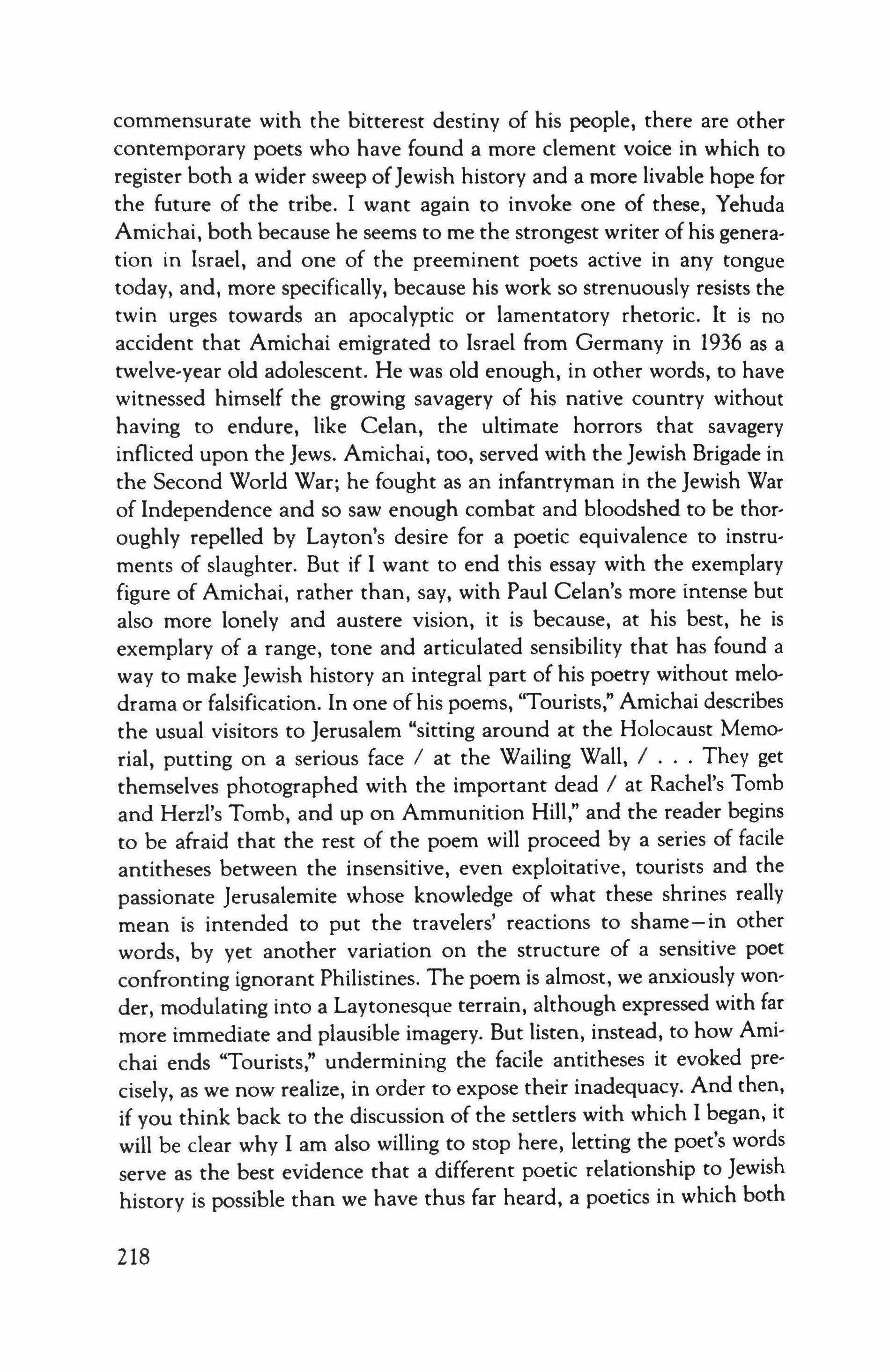
commensurate with the bitterest destiny of his people, there are other contemporary poets who have found a more clement voice in which to register both a wider sweep ofJewish history and a more livable hope for the future of the tribe. I want again to invoke one of these, Yehuda Amichai, both because he seems to me the strongest writer of his generation in Israel, and one of the preeminent poets active in any tongue today, and, more specifically, because his work so strenuously resists the twin urges towards an apocalyptic or lamentatory rhetoric. It is no accident that Amichai emigrated to Israel from Germany in 1936 as a twelve-year old adolescent. He was old enough, in other words, to have witnessed himself the growing savagery of his native country without having to endure, like Celan, the ultimate horrors that savagery inflicted upon the Jews. Amichai, too, served with the Jewish Brigade in the Second World War; he fought as an infantryman in the Jewish War of Independence and so saw enough combat and bloodshed to be thoroughly repelled by Layton's desire for a poetic equivalence to instruments of slaughter. But if I want to end this essay with the exemplary figure of Amichai, rather than, say, with Paul Celan's more intense but also more lonely and austere vision, it is because, at his best, he is exemplary of a range, tone and articulated sensibility that has found a way to make Jewish history an integral part of his poetry without melodrama or falsification. In one of his poems, "Tourists," Amichai describes the usual visitors to Jerusalem "sitting around at the Holocaust Memorial, putting on a serious face I at the Wailing Wall, I They get themselves photographed with the important dead I at Rachel's Tomb and Herzl's Tomb, and up on Ammunition Hill," and the reader begins to be afraid that the rest of the poem will proceed by a series of facile antitheses between the insensitive, even exploitative, tourists and the passionate [erusalernite whose knowledge of what these shrines really mean is intended to put the travelers' reactions to shame-in other words, by yet another variation on the structure of a sensitive poet confronting ignorant Philistines. The poem is almost, we anxiously wonder, modulating into a Laytonesque terrain, although expressed with far more immediate and plausible imagery. But listen, instead, to how Amichai ends "Tourists," undermining the facile antitheses it evoked precisely, as we now realize, in order to expose their inadequacy. And then, if you think back to the discussion of the settlers with which I began, it will be clear why I am also willing to stop here, letting the poet's words serve as the best evidence that a different poetic relationship to Jewish history is possible than we have thus far heard, a poetics in which both
218

the legacy and the hope for a different future find their rightful measures:
Once I was sitting on the steps near the gate at David's Citadel and I put down mv two heavy baskets beside me. A group of tourists stood there around their guide, and I became their point of reference. "You see that man over there with the baskets? A little to the right of his head there's an arch from the Roman period. A little to the right of his head." "But he's moving, he's moving!" I said to myself: Redemption will come only when they are told, "Do you see that arch over there from the Roman period? It doesn't matter, but near it, a little to the left and then down a bit, there's a man who has just bought fruit and vegetables for his family,"
(from The Selected Poetry of Yehuda Amichai, translated bv Chana Bloch and Stephen Mitchell. New York: Harper & Row, 1986.)
219
The Calling of Poetry: The Constitution of Poetic Vocation,
the Recognition of the Maker
in the Twentieth Century, and the Work of the Poet in Our Time
Allen Grossman
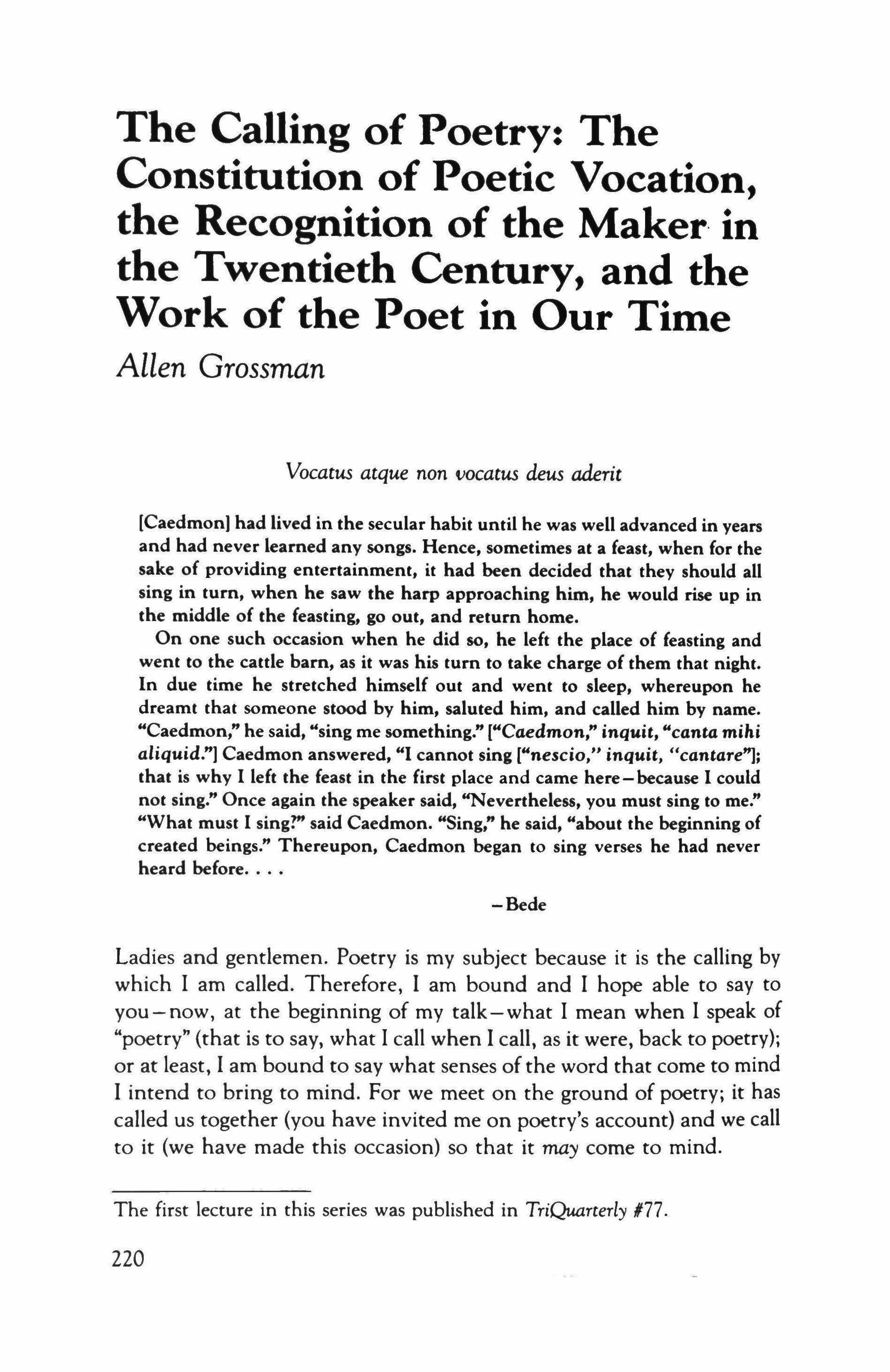
Vocatus atque non oocatus deus aderit
[CaedmonJ had lived in the secular habit until he was well advanced in years and had never learned any songs. Hence, sometimes at a feast, when for the sake of providing entertainment, it had been decided that they should all sing in tum, when he saw the harp approaching him, he would rise up in the middle of the feasting, go out, and return home.
On one such occasion when he did so, he left the place of feasting and went to the cattle bam, as it was his turn to take charge of them that night. In due time he stretched himself out and went to sleep, whereupon he dreamt that someone stood by him, saluted him, and called him by name. "Caedmon," he said, "sing me something."["Caedmon," inquit, "canta mihi aliquid."J Caedmon answered, "I cannot sing ["nescio," inquit, "cantare,,]; that is why I left the feast in the first place and came here - because I could not sing." Once again the speaker said, "Nevertheless, you must sing to me." "What must I sing?" said Caedmon. "Sing," he said, "about the beginning of created beings." Thereupon, Caedmon began to sing verses he had never heard before
Ladies and gentlemen. Poetry is my subject because it is the calling by which I am called. Therefore, I am bound and I hope able to say to younow, at the beginning of my talk - what I mean when I speak of "poetry" (that is to say, what I call when I call, as it were, back to poetry); or at least, I am bound to say what senses of the word that come to mind I intend to bring to mind. For we meet on the ground of poetry; it has called us together (you have invited me on poetry's account) and we call to it (we have made this occasion) so that it may come to mind.
The first lecture in this series was published in TriQuarterly #77.
-Bede
220

For what reason? Note (to begin with) that poetry comes to pass in a moment which is constituted of four callings or vocations-from the four cardinal points of human reference. First, there is "poetry"-which somehow calls to us from above, the "outside." We feel it, everybody feels it always calling. Sometimes (perhaps at all times) it is an affliction. Remember Yeats, "0 sweet everlasting voices be still." Remember, also, that the calling or vocation of poetry commits the person to the logic of the founding stories ofpoetic practice-the Orpheus story and the Philomela story, which I laid before you in the preceding lecture. But-as Rilke would say-why else are we here? Second, there are the "poets" who call back to, or invoke, poetry from the beneath, or they "go up." "Sing in me, muse!" they say, or "Let us go then," or "Who if I cry will hear me?" There are also (thirdly) "poems." Poems point to poetry. Poems call out to the human community (horizontally, as it were) and point (Whitman would say "indicate," Wordsworth says "Behold!"), always in any case saying that poetry is something like this, but not this. And there are (fourthly) what we name "readers," who are ourselves, the final callers and summoners and also the destination of the calling. But why should we call to poetry or to the poets whom poetry has called - and even if poetry is always calling, why should we reply? Let us say (preliminarily) it is because "poetry" (like all representations whatsoever) intends to bring the world to mind, and finally intends to bring the Mind to mind, like the face which makes all faces recognizable-the smile which dignifies and explains and regulates the world of persons.
Because there is trouble at the moment of the calling in our time, I want to direct my attention also toward the trouble. Consider the following Orphic sentences, characteristic of "modernist" poetics, by Wallace Stevens ("Adagia"):
If the mind is the most terrible force in the world, it is also the only force that defends us against terror. Or, the mind is the most terrible force in the world principally in this, that it is the only force which can defend us against itself. The modern world is based on this pensee The poet represents the mind in the act of defending us against itself.
From the point of view of the presentation of "poetic mind," with which I am concerned, Stevens's sentences mean the following: The calling of poetry to the world is a figure of the urgency of Mind to make itself manifest (the god in search of a people to make it "actual"), in the interest of the maintenance of the human world. But this urgency of Great Mind to show itself (as in poetry and stories we make the mind manifest as world) violates fundamental world constructive differences
221
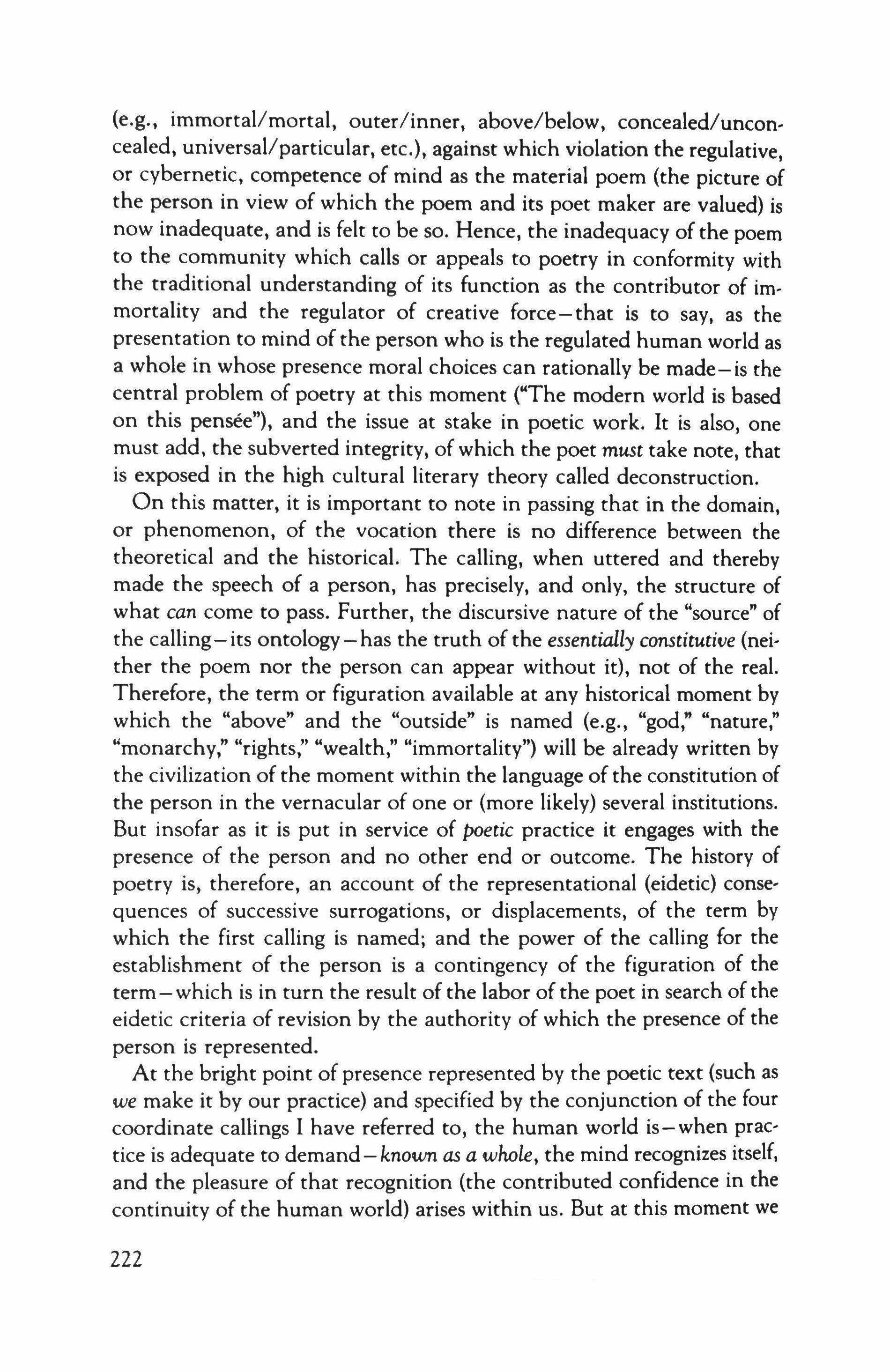
(e.g., immortal/mortal, outer/inner, above/below, concealed/unconcealed, universal/particular, etc.), against which violation the regulative, or cybernetic, competence of mind as the material poem (the picture of the person in view of which the poem and its poet maker are valued) is now inadequate, and is felt to be so. Hence, the inadequacy of the poem to the community which calls or appeals to poetry in conformity with the traditional understanding of its function as the contributor of immortality and the regulator of creative force-that is to say, as the presentation to mind of the person who is the regulated human world as a whole in whose presence moral choices can rationally be made-is the central problem of poetry at this moment ("The modern world is based on this pensee"), and the issue at stake in poetic work. It is also, one must add. the subverted integrity, of which the poet must take note, that is exposed in the high cultural literary theory called deconstruction.
On this matter, it is important to note in passing that in the domain, or phenomenon, of the vocation there is no difference between the theoretical and the historical. The calling, when uttered and thereby made the speech of a person, has precisely, and only, the structure of what can come to pass. Further, the discursive nature of the "source" of the calling - its ontology - has the truth of the essentially constitutive (neither the poem nor the person can appear without it), not of the real. Therefore, the term or figuration available at any historical moment by which the "above" and the "outside" is named (e.g., "god," "nature," "monarchy," "rights," "wealth," "immortality") will be already written by the civilization of the moment within the language of the constitution of the person in the vernacular of one or (more likely) several institutions. But insofar as it is put in service of poetic practice it engages with the presence of the person and no other end or outcome. The history of poetry is, therefore, an account of the representational (eidetic) consequences of successive surrogations, or displacements, of the term by which the first calling is named; and the power of the calling for the establishment of the person is a contingency of the figuration of the term-which is in turn the result of the labor of the poet in search of the eidetic criteria of revision by the authority of which the presence of the person is represented.
At the bright point of presence represented by the poetic text (such as we make it by our practice) and specified by the conjunction of the four coordinate callings I have referred to, the human world is-when practice is adequate to demand-known as a whole, the mind recognizes itself, and the pleasure of that recognition (the contributed confidence in the continuity of the human world) arises within us. But at this moment we
222

are brought together by poetry, which has called us here and now to investigate (as I have said) trouble in this scene of poetic calling. For this reason, because the relationship between the institution of "creative writing" and the health, or felicity, or adequacy of poetic production has recently been, as it should always be (as a matter of course in any case), put in question, I wish to point to one moment in the institutionalization of American poetic practice. In 1931, Norman Foerster, a "humanist" scholar and critic, student of Irving Babbitt, of whom Ivor Winters spoke in his time as the "arch-professor," assumed the directorship of the University of Iowa's School of Letters. There he established a graduate program in creative writing from which evolved the Iowa Writers' Workshop (the Adamic ancestor of the nearly four hundred such programs now in place in the U.S. and Canada).
The program of the arch-professor intended a reunification in the university of the production of literature ("creative" writing) with the history of literature and its criticism, against the background of the alienating reduction of graduate study in literature, in his time the result of the predominance of Germanic philology and positivist history. Obviously, the split civilization which Foerster addressed confronts us at this moment (though in other forms), and the writing program as he inaugurated it has become (against his intention) the product in its bureaucratic and intellectual isolation of a maze of fault lines in the knowledge institution of our civilization. As a result, the poets who must know everything in order to present the person constituted by the whole world have been authorized (illegitimately) to separate themselves from the means of their own practice, and to accept the epistemic marginalization imposed by the prestige of the secular university organized in such a way as to segment practices and delegitimize transcendental world descriptions (whether philosophical or religious) which contribute the cultural forms fundamental to poetic production. Of these the structure of"vocation" is one.
What this professor wants is to show how to situate our practice in the great self-revising openness of all poetic practice (which is not distinguishable from all practice of mind whatsoever), constrained by the universal and constant principles (or logics) of the calling which are (though universal) infinite in their manifestations, as persons are infinite in their natures and difference-in which principles (or logics) the synergy ofthe vocational quadrature that is my subject is fundamental. The result, I think, should be the amplification and de-routinizarion of poetic practice-such that the routines of production and revision (production by revision) come to be governed, not in accord with the principles
223

of coherence alone, but within the regulated openness of the calling. The de-routinization of writing and revision will result when revision is seen to be the checking of composition, not against one model or another of "form" or outcome, but against the figure of the calling, the eidos or "source."
Because, as I have said, I think that there is trouble at the present time on the building site of the calling, the result - the work - I am looking for must enable the poets themselves to address the questions which have been raised by their own practice (as well as by the practitioners of many theoretical discourses) about the complicity (as in Stevens's radically ambivalent sentences on mind) of creative power with the very forces which block the intention of the calling to construct and "keep" the person. It is at the point of poetic practice (practice which is the domain of the poet and only the poet, in the moment of the intersection of the above and the beneath, the self and the other, where the person is made) that these matters will be moved and changed. But the poet must be ready.
One of the fault lines which alienate our scene and workspace of practice from its moral rationality runs between this moment after modernism and the poets who constituted modernism (for example, Rilke, Yeats, Valery, Crane). Indeed, our principal (deferred) task as members of a poetic culture is, in my view, to come to terms with modernism, which is our predecessor poetic culture and to which our poetry does not in general make productive reference-in the matter of what remains its most important finding. The "trouble in the calling" was a central recognition-in the language of Aristotle's tragic theater, an anagnorisis-of poetic modernism insofar as it saw, in the language of Yeats, with "dream-awakened" eyes. Together with Stevens's sentence quoted above, consider Valery's question (Outlook for Intelligence [1935]): "Can the human mind master what the human mind has made?"
The poem, the literary text in general, is as I have said, the making of the person, the human mind as the voice constructs it, on the site of the calling of creative Mind in search of self-recognition. The repression of what was seen in the earlier twentieth century - modernism's cultural insight with respect to the violence of creative Mind and the difficulty of making it human, and also the dangerously imperfect stategies of the civilization thus disclosed for confronting that insight - are heard in Ibsen's The Master Builder, one of the starkest of premodern narratives on the site of, and in recognition of, the call. Ibsen's hero-builder (Solness) addresses the divine source of his vocation, his calling, in words which, in his effort to reinterpret the terms of the vocation from above,
224

anticipate our postmodern accommodation, what I take to be our way of work:
And when 1 stood right up on top there and hung the wreath over the weather-vane, then 1 said to him: Hear me now, Thou Almighty! In future 1 too will be a free master builder. In my own sphere. As thou in thine. 1 will never build churches for Thee again. Only homes for human beings.
The strategy of"the master builder," Solness, was to separate the domain of the calling of the above and the outside ("Thou almighty") from the domain of human work ("my own sphere") with the intent of building "only homes for human beings"; but that, it appears, cannot be done.
Insofar as the poet, as such, is the builder of "homes for human beings," the poet works by means of the poetic instrument, the gift (the scepter) of the calling. What, then, is the poet? The poet is the person who, by reason of the calling, is committed to do his or her human work within the structure of the calling and the particular power which is his or hers by reason of that structure which may be received in a moment such as that in which Whitman hears the music "Out of the cradle endlessly rocking" and comes to know what he is for, and awakes. I refer to the occasion in Whitman's poem when his speaker says:
For I, that was a child, my tongue's use sleeping, now 1 have heard you,
Now in a moment 1 know what 1 am for, 1 awake,
And already a thousand singers, a thousand songs, clearer and louder and more sorrowful than yours, A thousand warbling echoes have started to life within me, never to die.
Such a moment (the Orphic moment, the Philomelan moment) is recorded by Dickinson when she reads "the foreign lady" and the dark "grows beautiful." Such also is the moment (Prelude, Book IV) when Wordsworth becomes a "dedicated spirit," the moment also at the beginning of the Western literary system when Hesiod (our first-named poet of Theogony) is greeted by the muses descending toward him from higher up on Mount Helicon as he climbs toward them. Such is the moment when Pound's poet sees the heroic unnamed violent monsters of "The Return" ("See, they return Gods of the winged shoe the keenscented the souls of blood"), the moment, also, implied in the first and inaugural poem of Sappho's collection which remembers her "original" encounter with Aphrodite (to which I will return). All these moments of inaugural calling are repetitions (themselves events or entail-
225

ments within a sequence of callings or positings which transmit the primary recognition of the social person at the punctual instant of establishment), a continuity precisely as old as the human world (hence, Milton's "Yet once more 0 ye laurels," or Yeats's "Once more the wind is rising"), by which the separated and provisional self is summoned by the calling out of the time of personal life into the transpersonal time of the poetic vocation, which is the ground of that life.
In brief, the poet intends the cure of the world by the poem and his knowledge-poetic knowledge, knowledge by reason of the calling-is of the rules and entailments of his making (what Caedmon obtains in his dream is a vernacular meter, not the Christian story). It is this way of work with "poetic knowledge" as such that every predecessor generation contributes to its successors and that structures the successor's response to the perpetual calling. Thus, poetic knowledge is the specific kind of knowledge which the poet possesses by reason of her practice or his practice as a maker of poems, and is known to possess in proportion as the practice is excellent. It is part of the "burden" of this talk that our predecessor culture-modernism-was authentically called, but that there is inside poetic knowledge in the modernist form - at the precise moment of the calling-a recognitional "lament for the maker" and for the making which constrains our (mine and your) response to the wandering voice we hear.
The moderns saw (and we see it in the otherwise unaccountably broken worlds of Eliot, Crane, Pound)-saw as a kind of tragic recognition, an anagnorisis which is the source of our anxiety in the theater of their presence - that the worlds they projected in the advocacy of their art were structured like the vocation of their art, and that their vocation as artists was (somehow) complicit with the violence of history. As a result, their successors (consistent with the fatal vow of Solness) withdrew to the construction of "houses for human beings only"-the personallyric and the novel- as if such houses were made only of "human" stuff. In effect, the moderns knew something of what they did and why they did it, but came only late and imperfectly to the knowledge of what what they did brought to pass. Hence (as it seems to me) we must in our generation (having inherited a certain blindness precisely in the region of our need) enter into the analysis of the calling in order to recover our power in the civilization as poets, and thereby (productively) surpass our predecessors. That is the question of practice, the fundamental workshop problem. Eliot, in a famous sentence, remarked that we know more than the past and that that additional, characterizing knowledge of our modernity is the past which (by contrast to the past which could not
226
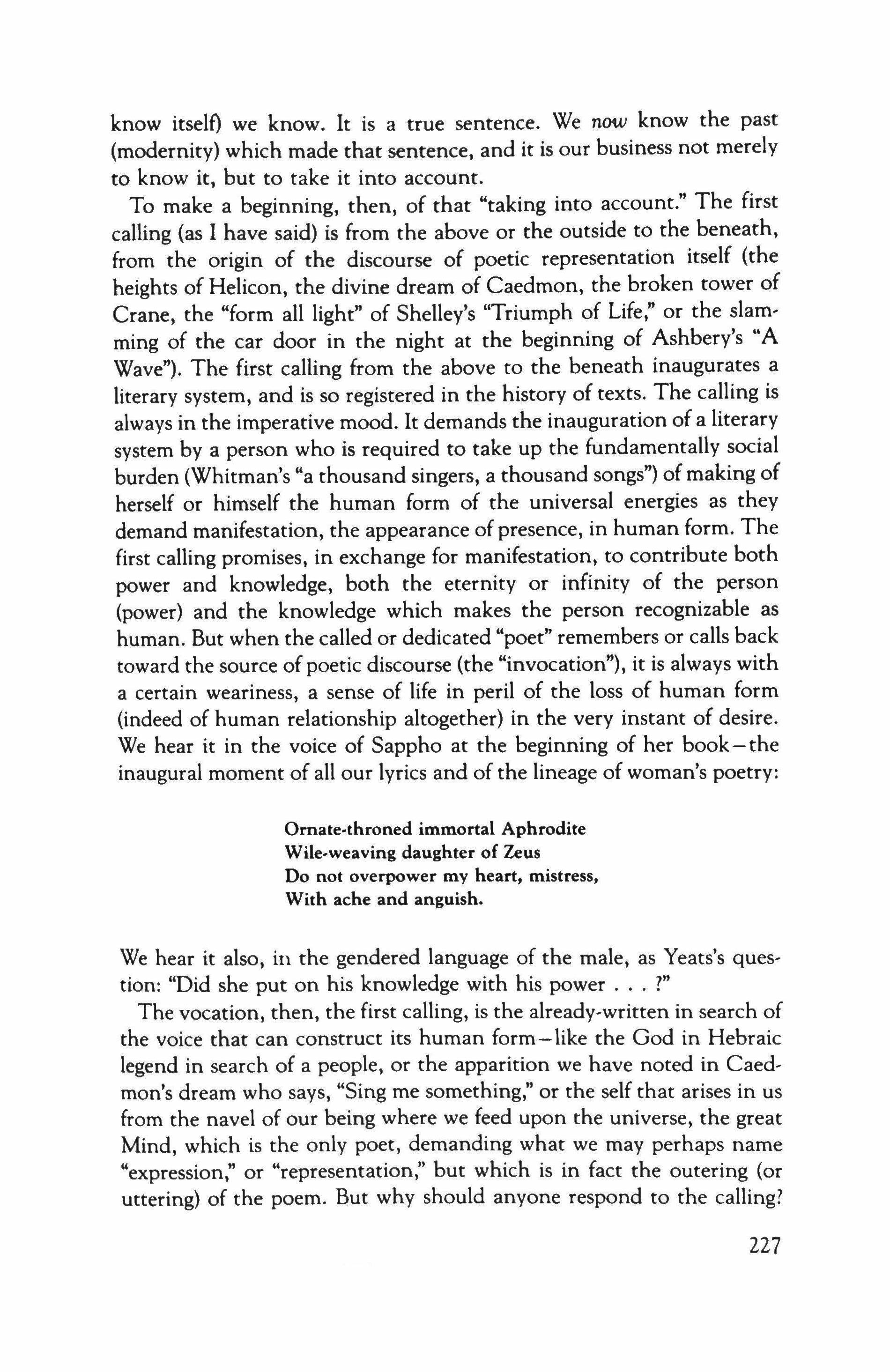
know itself) we know. It is a true sentence. We now know the past (modernity) which made that sentence, and it is our business not merely to know it, but to take it into account.
To make a beginning, then, of that "taking into account." The first calling (as I have said) is from the above or the outside to the beneath, from the origin of the discourse of poetic representation itself (the heights of Helicon, the divine dream of Caedmon, the broken tower of Crane, the "form all light" of Shelley's "Triumph of Life," or the slamming of the car door in the night at the beginning of Ashbery's "A Wave"). The first calling from the above to the beneath inaugurates a literary system, and is so registered in the history of texts. The calling is always in the imperative mood. It demands the inauguration of a literary system by a person who is required to take up the fundamentally social burden (Whitman's "a thousand singers, a thousand songs") of making of herself or himself the human form of the universal energies as they demand manifestation, the appearance of presence, in human form. The first calling promises, in exchange for manifestation, to contribute both power and knowledge, both the eternity or infinity of the person (power) and the knowledge which makes the person recognizable as human. But when the called or dedicated "poet" remembers or calls back toward the source of poetic discourse (the "invocation"), it is always with a certain weariness, a sense of life in peril of the loss of human form (indeed of human relationship altogether) in the very instant of desire. We hear it in the voice of Sappho at the beginning of her book - the inaugural moment of all our lyrics and of the lineage of woman's poetry:
Ornate-throned immortal Aphrodite
Wile-weaving daughter of Zeus
Do not overpower my heart, mistress, With ache and anguish.
We hear it also, in the gendered language of the male, as Yeats's question: "Did she put on his knowledge with his power I"
The vocation, then, the first calling, is the already-written in search of the voice that can construct its human form -like the God in Hebraic legend in search of a people, or the apparition we have noted in Caedmon's dream who says, "Sing me something," or the self that arises in us from the navel of our being where we feed upon the universe, the great Mind, which is the only poet, demanding what we may perhaps name "expression," or "representation," but which is in fact the outering (or uttering) of the poem. But why should anyone respond to the calling?
227

Why should the calling of the great Mind seeking to see itself in human form ever find a person to do the work of the poem, its manifestation? Why should anyone ever choose to say with Whitman "Now I know what I am for," and suffer the alienation of the "thousand songs started to life within me never to die"?
The first (or let us call it, the original) calling, the imperative from the above and the outside, is of the utmost importance to the history that follows-the literary system and the poetic life which it authorizesbecause it contributes, by its outsideness to history, the power to speak to history words other than history can speak, to speak to time from the point of view of the timeless, to supply the benefit of poetic knowledge as other knowledge to the inventory of human knowledge. Timelessness, immortality, universality, permanence, the terms of tradition which differentiate instances of poetic language from instances of natural language, imply the intention to situate poetic discourse in a relationship of independence to history. The assumption of tradition, that no mortal can speak immortal speech except in the position of the poet or the god, is correlative to the assumption (if we care to make it) that there is no account which we can give (or, if you insist, that we can care to give) of the person which is the sum or simple totality of material and social causes. The presence of poetry promises (before it contracts any other thing) the infinity of the person and, insofar as it embodies the originary calling, places the "reader" at the origin of human being as in itself it is. "Poetry" signifies, to put it crudely, the context-independence of the person whose right of presence is not a dependency of history. This strangely guarded and endangering empowerment is narrated, as I have observed, in the founding stories of poetic practice.
The paradoxicality inherent in those stories, the figuring in them of the loss of personal love and recognition at the moment of the inheritance, as it were, of the vocation of song (the Orpheus story), refigures in turn that insight into the violence of representation which was the peculiar theme of modern poetry, our predecessor culture, and is at the present time a characteristic preoccupation of literary theory. It is also a problem, as I have insisted, which our practice must take into account.
Consider questions of the following sort which bear upon what every writer does every day: "What criteria or models govern our revisions and corrections of our own text? In view of what idea or paradigm or rule or predisposition to structure do we continually modify and reconstruct our poem until it is right, or true, or good?" Fundamentally, these questions are the same as the question put earlier in the face of the cost of the calling: "What human interest does poetic knowledge serve? What
228
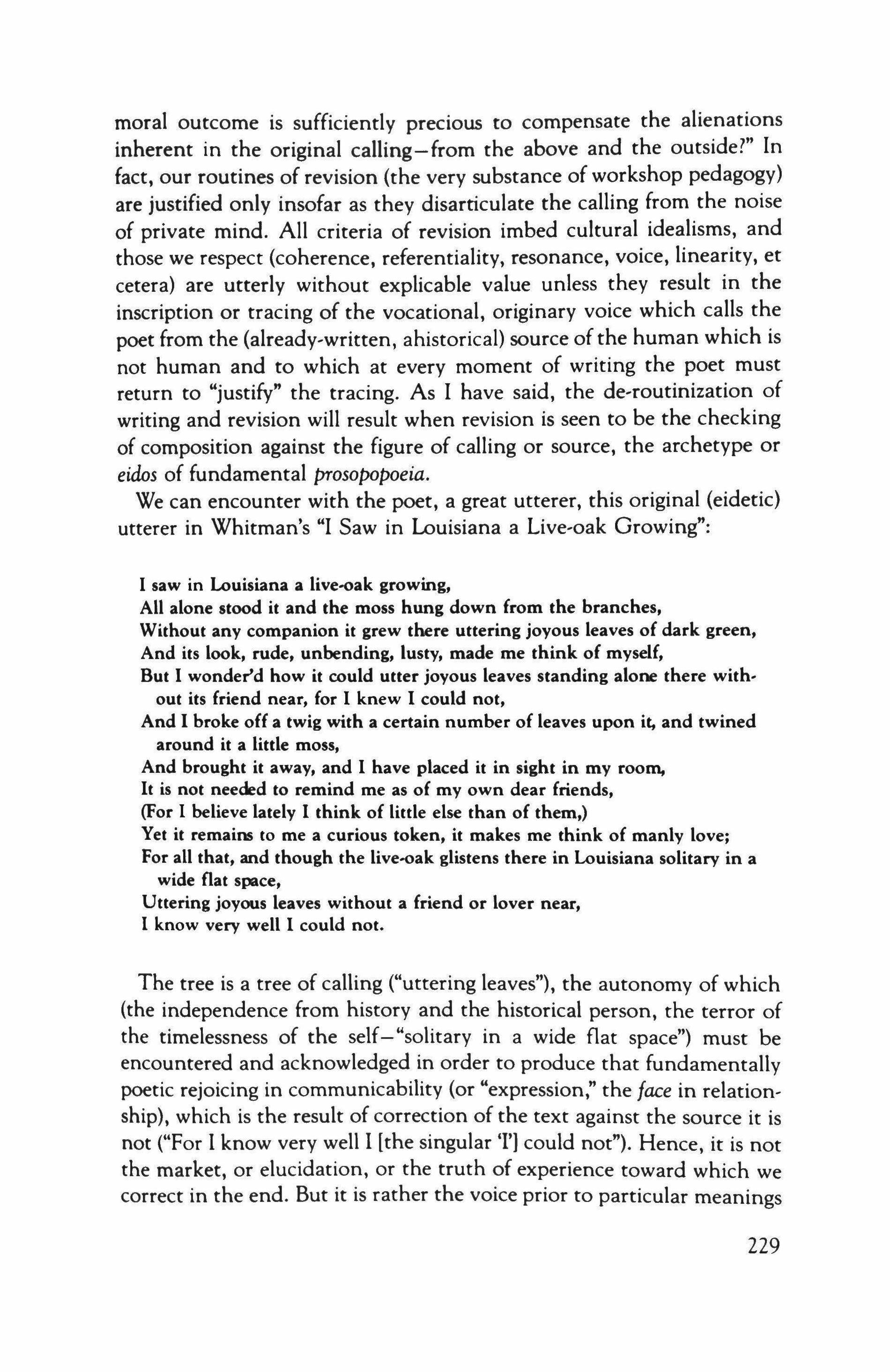
moral outcome is sufficiently precious to compensate the alienations inherent in the original calling-from the above and the outside?" In fact, our routines of revision (the very substance of workshop pedagogy) are justified only insofar as they disarticulate the calling from the noise of private mind. All criteria of revision imbed cultural idealisms, and those we respect (coherence, referentialitv, resonance, voice, linearity, et cetera) are utterly without explicable value unless they result in the inscription or tracing of the vocational, originary voice which calls the poet from the (already-written, ahistorical) source of the human which is not human and to which at every moment of writing the poet must return to "justify" the tracing. As I have said, the de-routinization of writing and revision will result when revision is seen to be the checking of composition against the figure of calling or source, the archetype or eidos of fundamental prosopopoeia.
We can encounter with the poet, a great utterer, this original (eidetic) utterer in Whitman's "I Saw in Louisiana a Live-oak Growing":
I saw in Louisiana a live-oak growing,
All alone stood it and the moss hung down from the branches, Without any companion it grew there uttering joyous leaves of dark green, And its look, rude, unbending, lusty, made me think of myself, But I wonder'd how it could utter joyous leaves standing alone there without its friend near, for I knew I could not, And I broke off a twig with a certain number of leaves upon it, and twined around it a little moss, And brought it away, and I have placed it in sight in my room, It is not needed to remind me as of my own dear friends, (For I believe lately I think of little else than of them,) Yet it remains to me a curious token, it makes me think of manly love; For all that, and though the live-oak glistens there in Louisiana solitary in a wide flat space, Uttering joyous leaves without a friend or lover near, I know very well I could not.
The tree is a tree of calling ("uttering leaves"), the autonomy of which (the independence from history and the historical person, the terror of the timelessness of the self - "solitary in a wide flat space") must be encountered and acknowledged in order to produce that fundamentally poetic rejoicing in communicability (or "expression," the face in relationship), which is the result of correction of the text against the source it is not ("For 1 know very welll [the singular 'I'J could not"). Hence, it is not the market, or elucidation, or the truth of experience toward which we correct in the end. But it is rather the voice prior to particular meanings
229
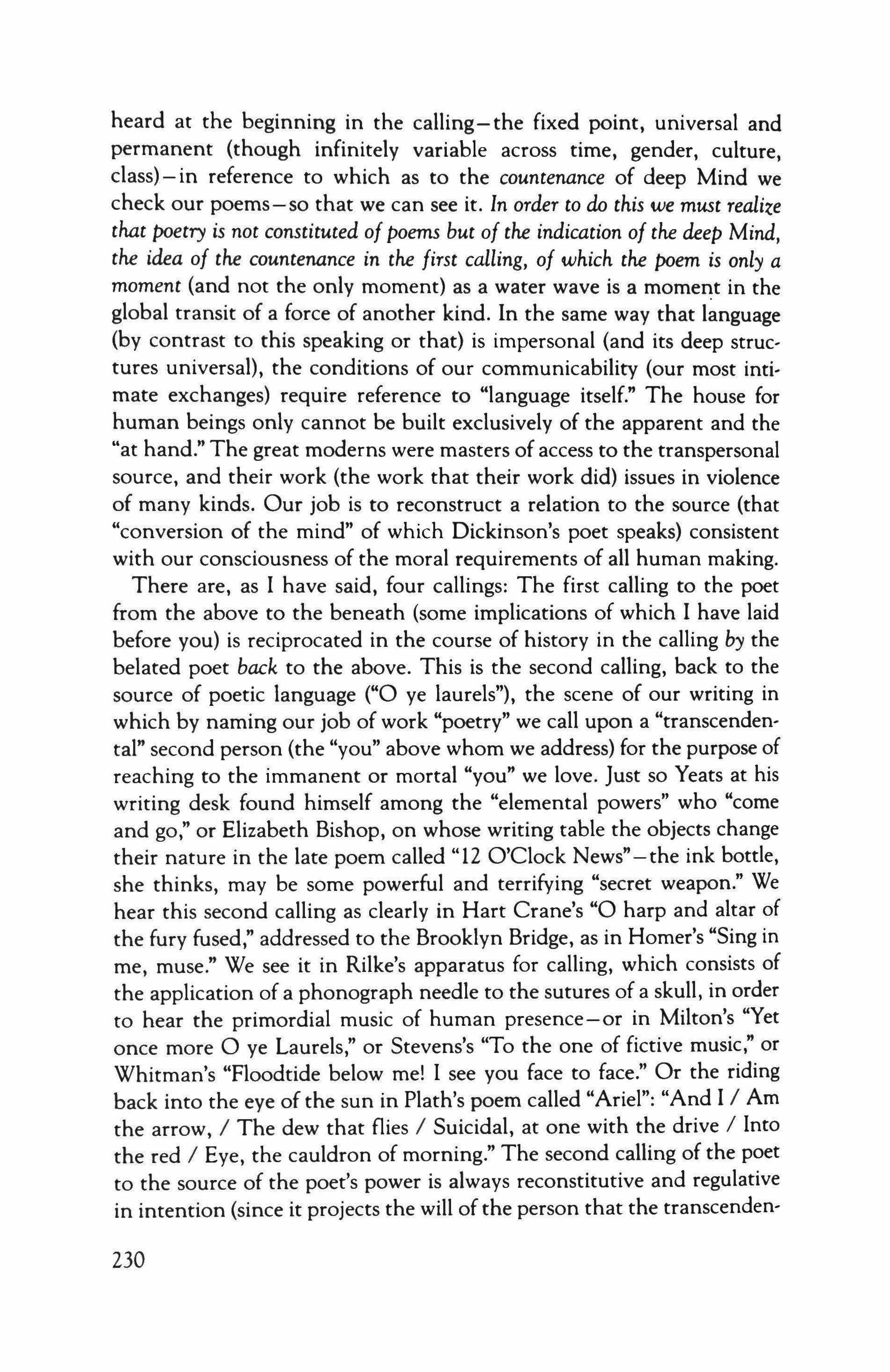
heard at the beginning in the calling-the fixed point, universal and permanent (though infinitely variable across time, gender, culture, class) - in reference to which as to the countenance of deep Mind we check our poems-so that we can see it. In order to do this we must realize that poetry is not constituted of poems but of the indication of the deep Mind, the idea of the countenance in the first calling, of which the poem is only a moment (and not the only moment) as a water wave is a moment in the global transit of a force of another kind. In the same way that language (by contrast to this speaking or that) is impersonal (and its deep structures universal), the conditions of our communicability (our most intimate exchanges) require reference to "language itself." The house for human beings only cannot be built exclusively of the apparent and the "at hand." The great moderns were masters of access to the transpersonal source, and their work (the work that their work did) issues in violence of many kinds. Our job is to reconstruct a relation to the source (that "conversion of the mind" of which Dickinson's poet speaks) consistent with our consciousness of the moral requirements of all human making. There are, as I have said, four callings: The first calling to the poet from the above to the beneath (some implications of which 1 have laid before you) is reciprocated in the course of history in the calling by the belated poet back to the above. This is the second calling, back to the source of poetic language ("0 ye laurels"), the scene of our writing in which by naming our job of work "poetry" we call upon a "transcendental" second person (the "you" above whom we address) for the purpose of reaching to the immanent or mortal "you" we love. Just so Yeats at his writing desk found himself among the "elemental powers" who "come and go," or Elizabeth Bishop, on whose writing table the objects change their nature in the late poem called "12 O'Clock News"-the ink bottle, she thinks, may be some powerful and terrifying "secret weapon." We hear this second calling as clearly in Hart Crane's "0 harp and altar of the fury fused," addressed to the Brooklyn Bridge, as in Homer's "Sing in me, muse." We see it in Rilke's apparatus for calling, which consists of the application of a phonograph needle to the sutures of a skull, in order to hear the primordial music of human presence-or in Milton's "Yet once more 0 ye Laurels," or Stevens's "To the one of fictive music," or Whitman's "Floodtide below me! I see you face to face." Or the riding back into the eye of the sun in Plath's poem called"Ariel": "And I / Am the arrow, / The dew that flies / Suicidal, at one with the drive / Into the red / Eye, the cauldron of morning." The second calling of the poet to the source of the poet's power is always reconstitutive and regulative in intention (since it projects the will of the person that the transcenden-
230
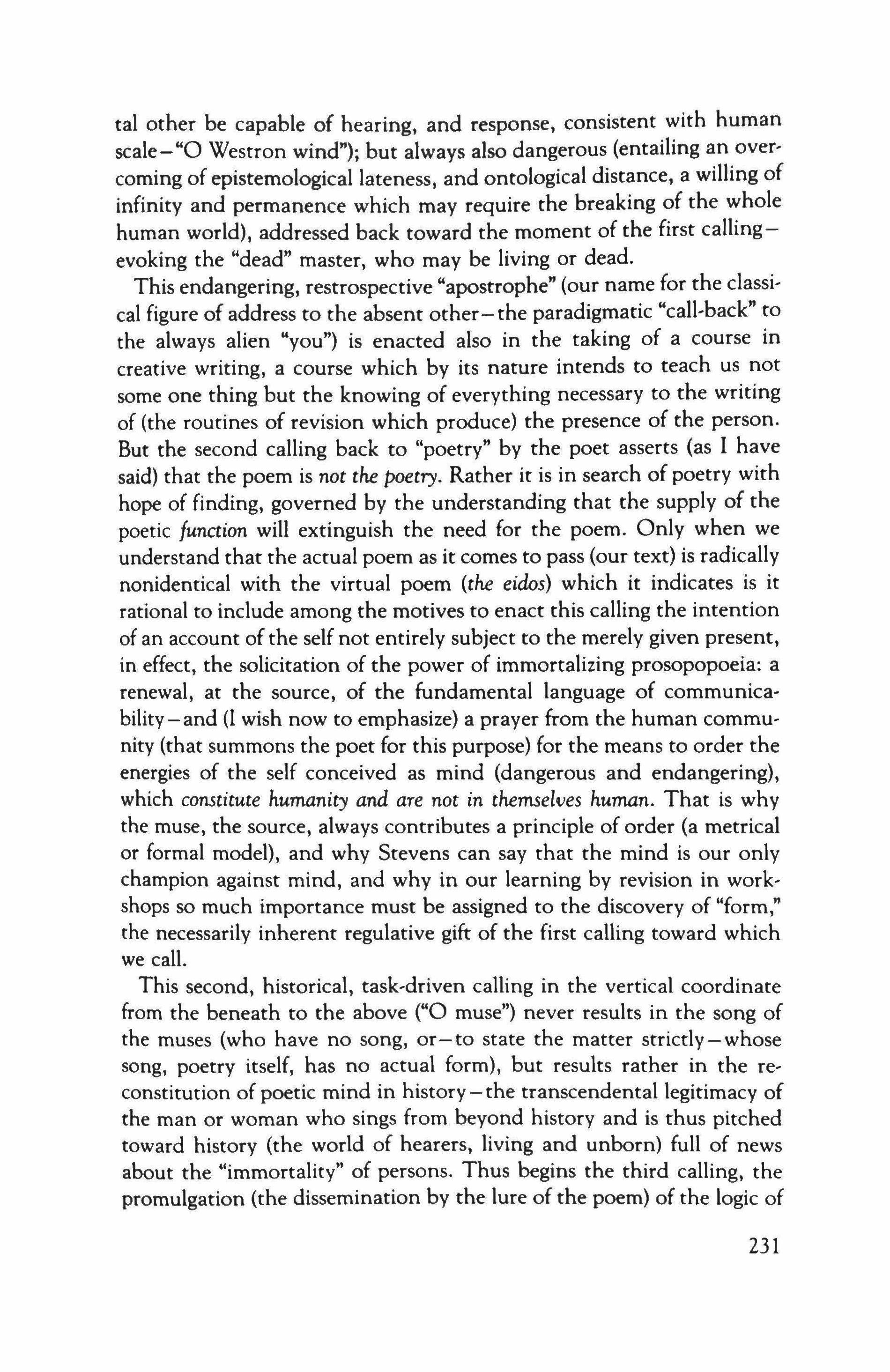
tal other be capable of hearing, and response, consistent with human scale-"O Westron wind"); but always also dangerous (entailing an overcoming of epistemological lateness, and ontological distance, a willing of infinity and permanence which may require the breaking of the whole human world), addressed back toward the moment of the first callingevoking the "dead" master, who may be living or dead.
This endangering, restrospective "apostrophe" (our name for the classical figure of address to the absent other-the paradigmatic "call-back" to the always alien "you") is enacted also in the taking of a course in creative writing, a course which by its nature intends to teach us not some one thing but the knowing of everything necessary to the writing of (the routines of revision which produce) the presence of the person. But the second calling back to "poetry" by the poet asserts (as I have said) that the poem is not the poetry. Rather it is in search of poetry with hope of finding, governed by the understanding that the supply of the poetic function will extinguish the need for the poem. Only when we understand that the actual poem as it comes to pass (our text) is radically nonidentical with the virtual poem (the eidos) which it indicates is it rational to include among the motives to enact this calling the intention of an account of the self not entirely subject to the merely given present, in effect, the solicitation of the power of immortalizing prosopopoeia: a renewal, at the source, of the fundamental language of communicability-and (1 wish now to emphasize) a prayer from the human community (that summons the poet for this purpose) for the means to order the energies of the self conceived as mind (dangerous and endangering), which constitute humanity and are not in themselves human. That is why the muse, the source, always contributes a principle of order (a metrical or formal model), and why Stevens can say that the mind is our only champion against mind, and why in our learning by revision in workshops so much importance must be assigned to the discovery of "form," the necessarily inherent regulative gift of the first calling toward which we call.
This second, historical, task-driven calling in the vertical coordinate from the beneath to the above ("0 muse") never results in the song of the muses (who have no song, or-to state the matter strictly-whose song, poetry itself, has no actual form), but results rather in the reconstitution of poetic mind in history-the transcendental legitimacy of the man or woman who sings from beyond history and is thus pitched toward history (the world of hearers, living and unborn) full of news about the "immortality" of persons. Thus begins the third calling, the promulgation (the dissemination by the lure of the poem) of the logic of
231
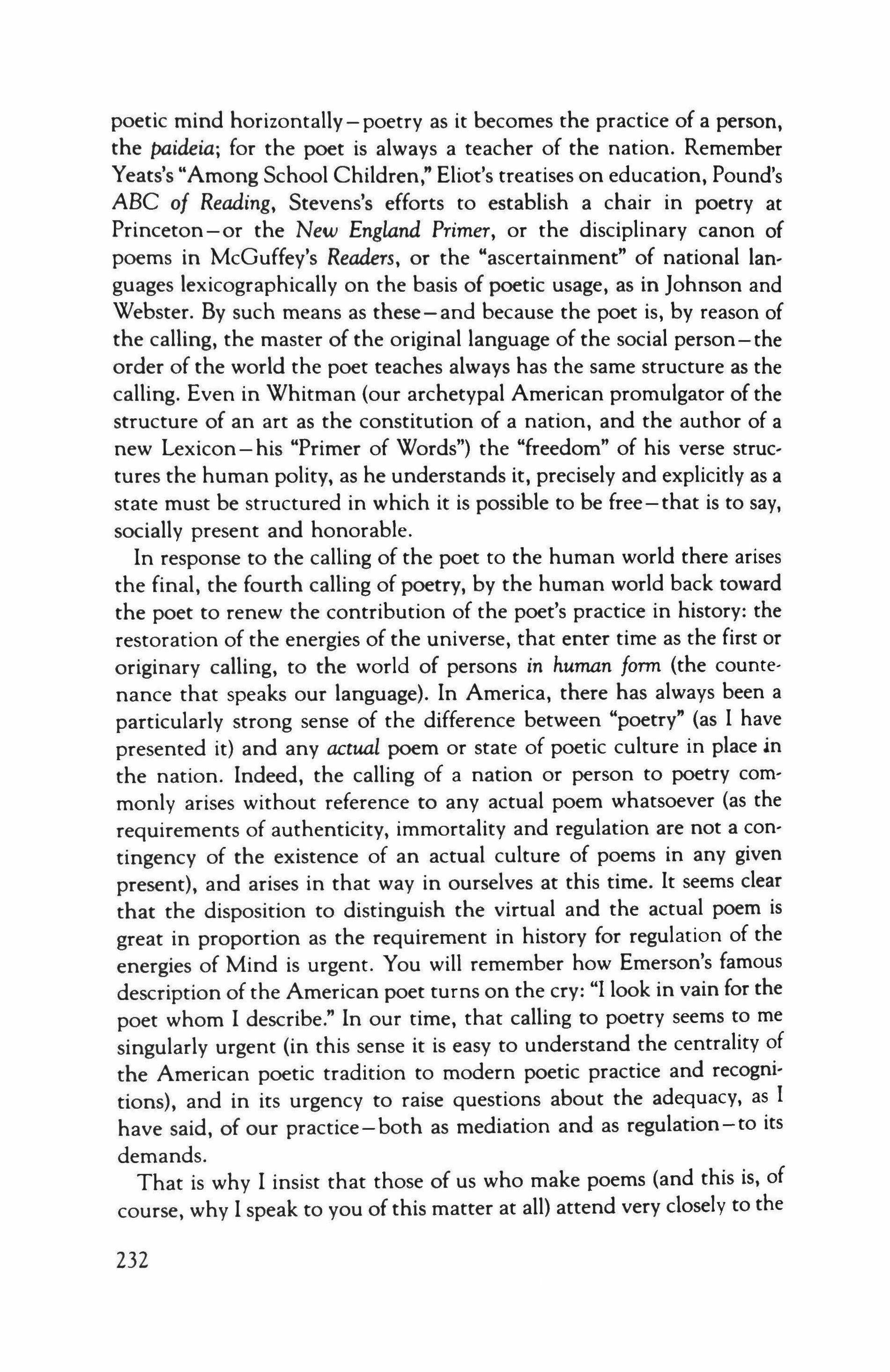
poetic mind horizontally - poetry as it becomes the practice of a person, the paideia; for the poet is always a teacher of the nation. Remember Yeats's "Among School Children," Eliot's treatises on education, Pound's ABC of Reading, Stevens's efforts to establish a chair in poetry at Princeton-or the New England Primer, or the disciplinary canon of poems in McGuffey's Readers, or the "ascertainment" of national languages lexicographically on the basis of poetic usage, as in Johnson and Webster. By such means as these-and because the poet is, by reason of the calling, the master of the original language of the social person - the order of the world the poet teaches always has the same structure as the calling. Even in Whitman (our archetypal American promulgator of the structure of an art as the constitution of a nation, and the author of a new Lexicon-his "Primer of Words") the "freedom" of his verse structures the human polity, as he understands it, precisely and explicitly as a state must be structured in which it is possible to be free-that is to say, socially present and honorable.
In response to the calling of the poet to the human world there arises the final, the fourth calling of poetry, by the human world back toward the poet to renew the contribution of the poet's practice in history: the restoration of the energies of the universe, that enter time as the first or originary calling, to the world of persons in human form (the countenance that speaks our language). In America, there has always been a particularly strong sense of the difference between "poetry" (as I have presented it) and any actual poem or state of poetic culture in place in the nation. Indeed, the calling of a nation or person to poetry commonly arises without reference to any actual poem whatsoever (as the requirements of authenticity, immortality and regulation are not a contingency of the existence of an actual culture of poems in any given present), and arises in that way in ourselves at this time. It seems clear that the disposition to distinguish the virtual and the actual poem is great in proportion as the requirement in history for regulation of the energies of Mind is urgent. You will remember how Emerson's famous description of the American poet turns on the cry: "I look in vain for the poet whom I describe." In our time, that calling to poetry seems to me singularly urgent (in this sense it is easy to understand the centrality of the American poetic tradition to modern poetic practice and recognitions), and in its urgency to raise questions about the adequacy, as I have said, of our practice - both as mediation and as regulation - to its demands.
That is why I insist that those of us who make poems (and this is, of course, why I speak to you of this matter at all) attend very closely to the
232

calling of poetry in its abstract and universal nature as it presents the eidos. For such is the criterion (deep and regulative) in the light of which we revise. In order to do so, we must understand and tolerate the signifiers of its presence-the doggerel of our likeness, the (in)human presence of presence in the text-indistiguishable from folly, uninterpretable, declarative of the essentially contested terms of its manifestation. In the dominant Western tradition, the criterion of personal presence is registered in the poem as an enigmatic signifier of that source of signifiersthe navel of the dream as Freud calls it-figured, for example, as the voice of the god, or the muse who never speaks, or in Horace as the speaking stream (lymphae loquaces), or by Ezekiel as the sound of many waters, or by Wordsworth as the speech of the Leech Gatherer (a mighty stream), or in Whitman as the "hum of the valved voice," or in Yeats as the "emotion of Multitude"-the oceanic murmur, Jakobson's "phatic function." By its nature the signifier of the enigma of the face "deconstructs" itself because only in the presence of the insoluble aporias of difference and no difference, life and death, speech and silence, only in the inherent contradiction of the calling, is Mind brought to mind. From this power flows the claim of history (the fourth calling) upon this criteriological cultural resource of the poetic principle, which descends to us most recently in the genealogy of our postmodern state of affairs from Vico, Hegel and Shelley, through Emerson, Whitman, Rilke, Yeats and Heidegger, Hart Crane ("the white machine that sings," the head of Orpheus), Wallace Stevens ("It Must Be Abstract"), and Paul de Man. The power of the enigmatic figure lies in the structure of the calling. The trouble of which I speak is displayed in the enormous civilizational difficulty of distinguishing, in the practice of representation, between the overcoming of the paradoxes of construction through poetry as it presents the person and the reproduction of the violence of those paradoxes by the same means.
I will conclude by giving you one example of the demand of our postnuclear civilization on the poet-one example of the "fourth calling" in this present to stand for many which require a kind of poetry different from that which we write - a demand, in effect, incommensurate with our practice. In a series of lectures at Princeton in 1985 entitled "Thinking about Extinction" (Raritan, Vol. 6, Nos. 2 and 3 [Fall 1986, Winter 1987)), the political philosopher George Kateb responds to Jonathan Schell's call (in The Fate of Earth [New York: Knopf, 1982)) for "a change of heart if mankind is to avoid its nuclear doom." Kateb, having rooted postmodern conflict (and therefore the "nuclear problem") in statism and possessive individualism, turns for the reconstruction of the
233

person to the American tradition of poetry which offers, as he sees it, the only "conversion of the mind" (Dickinson's phrase) commensurate with the regulative challenge inherent in nuclear empowerment. In effect, Kateb reads Schell's demand for civilizational change as a call, out of fundamental need, to poetry in the interest of the solution of a fundamental civilizational problem. Kateb writes:
To attain impersonal individuality is to become attached to existence in a new way. It is to become attached with unreserved love. [Then Kateb turns to the poet.] Whitman says, "The known universe has one complete lover and that is the greatest poet." Every man and woman can become his or her own poet. The attachment of love is a poetical relation to reality, to human and natural existence on earth. Being loved as a poet loves is being seen as for the first time; it is being seen as beautiful. But in being seen as beautiful, existence is being seen accurately and honestly. The will to see beauty is the will to see accurately and honestly. The will to see beauty is the will to see truthfully. Thus, in Nature, Emerson says that though the poet proposes beauty as his main end, and the philosopher proposes truth, "the philosopher, no less than the poet, postpones the apparent order and relations of things to the empire of thought [my underlining) The true philosopher and the true poet are one, and a beauty, which is truth, and a truth which is beauty, is the aim of both.
A few sentences farther on, Kateb says: "The locus of ultimacy [he means in any social policy, such as democracy] cannot be social relations. I place greatest emphasis on this systemic lesson. When laws and authoritative individuals lose their mystique, people cannot honestly enter any determined relation as if it were inevitable or natural, much less as if it were sacred. There must be relations; there must be conventions; indeed many conventions in a democratic culture are undeniably good ones; but there is something above and underneath them, or off to one side of them. Supreme are individuals who can make and unmake their arrangements and make them again" (Raritan, Vol. 6, No.3, pp. 16-17).
Kateb calls to the poet as the maker, in accord with the calling of poetry inherent in which is a transcendent principle constructing the criterion of which I speak - the principle of the countenance (prior to the inscription of any culture or person, prior to "conventions," prior to "relations," and establishing their legitimacy) with respect to which poets in history make and unmake and make again, age after age, the great poetic monument (in a strict infinity of forms) of human recognition. But what Kateb does not observe is that the poetic record of modernism
234
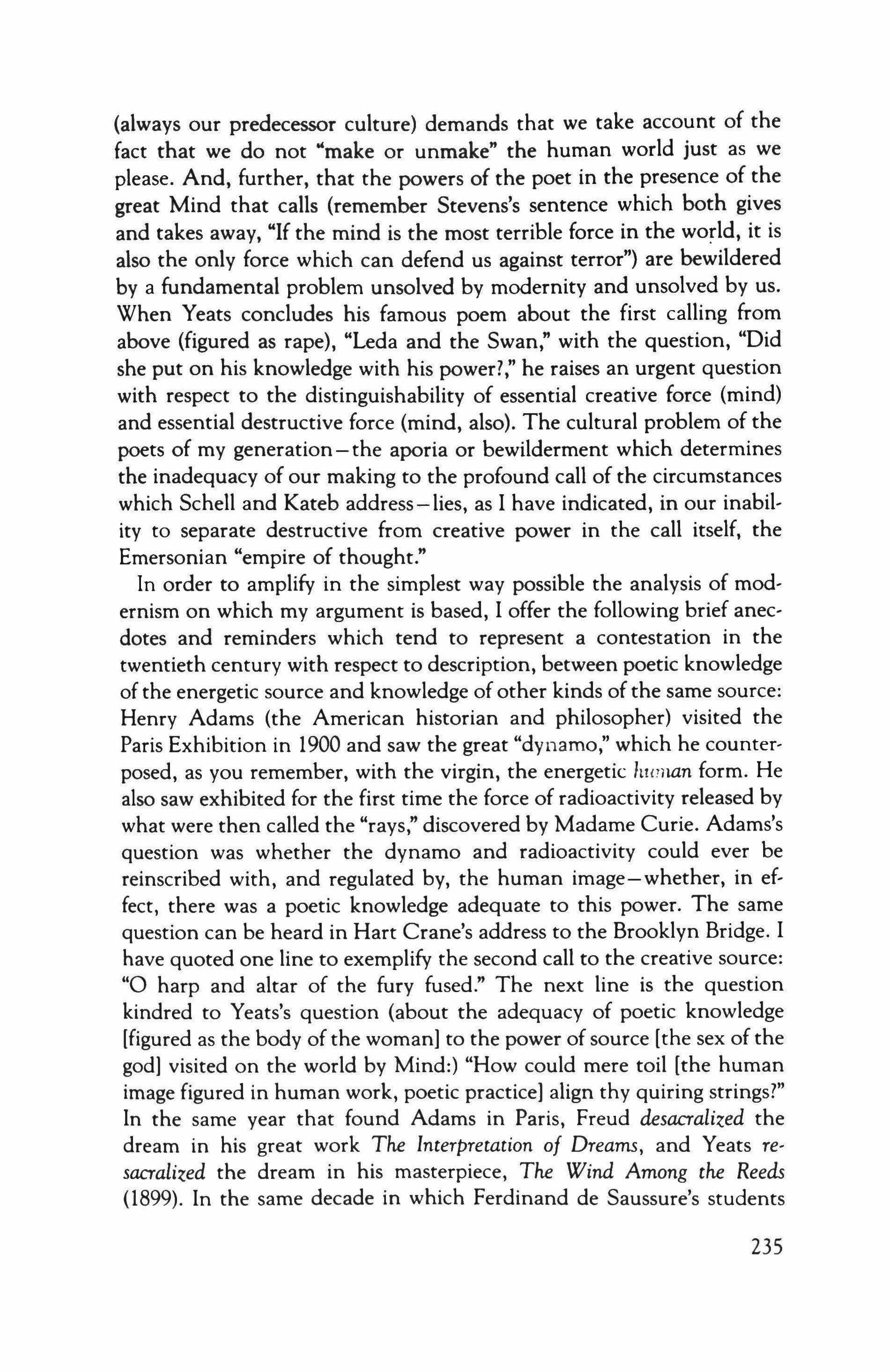
(always our predecessor culture) demands that we take account of the fact that we do not "make or unmake" the human world just as we please. And, further, that the powers of the poet in the presence of the great Mind that calls (remember Stevens's sentence which both gives and takes away, "If the mind is the most terrible force in the world, it is also the only force which can defend us against terror") are bewildered by a fundamental problem unsolved by modernity and unsolved by us. When Yeats concludes his famous poem about the first calling from above (figured as rape), "Leda and the Swan," with the question, "Did she put on his knowledge with his power?," he raises an urgent question with respect to the distinguishability of essential creative force (mind) and essential destructive force (mind, also). The cultural problem of the poets of my generation - the aporia or bewilderment which determines the inadequacy of our making to the profound call of the circumstances which Schell and Kateb address-lies, as I have indicated, in our inability to separate destructive from creative power in the call itself, the Emersonian "empire of thought."
In order to amplify in the simplest way possible the analysis of modernism on which my argument is based, I offer the following brief anecdotes and reminders which tend to represent a contestation in the twentieth century with respect to description, between poetic knowledge ofthe energetic source and knowledge ofother kinds ofthe same source: Henry Adams (the American historian and philosopher) visited the Paris Exhibition in 1900 and saw the great "dynamo," which he counterposed, as you remember, with the virgin, the energetic hwnan form. He also saw exhibited for the first time the force of radioactivity released by what were then called the "rays," discovered by Madame Curie. Adams's question was whether the dynamo and radioactivity could ever be reinscribed with, and regulated by, the human image-whether, in effect, there was a poetic knowledge adequate to this power. The same question can be heard in Hart Crane's address to the Brooklyn Bridge. I have quoted one line to exemplify the second call to the creative source: "0 harp and altar of the fury fused." The next line is the question kindred to Yeats's question (about the adequacy of poetic knowledge [figured as the body of the woman] to the power of source [the sex of the god] visited on the world by Mind:) "How could mere toil [the human image figured in human work, poetic practice] align thy quiring strings?" In the same year that found Adams in Paris, Freud desacralized the dream in his great work The Interpretation of Dreams, and Yeats tesacraLized the dream in his masterpiece, The Wind Among the Reeds (1899). In the same decade in which Ferdinand de Saussure's students
235

published his theory of language on which the secular and deconstructive post-structuralism of the universities bases its linguistics, Pound published Fenollosa's notes on the Chinese written character in an effort to establish a poetic counter-linguistics by means of language of signs integral with the image of the world as the person knows the world. In 1926, Rilke wrote to Lou Andreas-Salome an explanation of his refusal to enter psychoanalysis, which, he felt, would have relieved him of the severe psychosomatic pain he suffered from: "Can you understand, my friend, that I am afraid of disturbing by any classification or survey, be it ever so relieving, a much higher order [he means, the poetic order) whose right, after all that has happened, I would have to acknowledge, even if it were to destroy me."
We inherit from modernism the rediscovery of the crisis of relation between the mind in history and the creative source. This insight and crisis have befallen us at the intense moment where the four callings intersect: the first calling from the above to the beneath which announces the endangering passion of the universe for human form ("Eternity," Blake said, "is in love with the productions of time"); the second calling of the poet from the beneath to the above, which is the mortal intention to see the mind as a human image-the only form capable of regulating the energies of the world not human, which are its substance; the third calling of the poet to the people full of news, the disseminative or didactic calling, to the dwelling in language, which keeps them; the fourth calling, which is the appeal from history to the ambivalent principle of humanity in history, which calls the poet. In this moment where the four callings intersect (the moment of the poet's workshop) everything is known because the image of the person is known, and everything is at stake because that image is known, here and now, as a contingency of human making.
In order to think about our relation to that making it is necessary to bring its structure to mind. That seems to me the first obligation of the person who intends poetry at the present time and that is what I have attempted to make a beginning with here. This "bringing to mind" and "taking into account" of which I speak was practiced by the moderns (Yeats, Eliot, Pound, Williams) in the sense that their principle thought was effectively directed toward considerations of structure-the moment in the poem when the calling is invested with the form capable of presenting the human image. But I must also note that the great moderns characteristically failed in the crucial matter of distinguishing between the constructed image and the mortal body of the poet and contributed to our moment of practice the unsolved problem of the
236

predation of the immortal image (the "empire of thought") upon the mortal life which it proposed to "keep," the problem inherent but only partially realized in Kateb's appeal. For example: Rilke writes to his Salome that his art was
from the beginning a kind of self-treatment; but in proportion as it has developed and become something independent it is losing more and more of its therapeutic and considerate character and is making demands; a soul that has no alternative but to find its harmonies in the immense exaggerations of art ought to be able to count on a body that does not ape it in any way and is precise and nowhere exaggerates itself. My physical being runs the risk of becoming the caricature of my spritual being.
Much of the poetry of my generation (and perhaps yours) falls into a mirror reversal of same error, for insofar as we have withdrawn from the Rilkean openness (let us say) to the angelic otherness-the universal, permanent, morally powerful and vitally endangering abstractness of the source to which Kateb (for example) summons us-and insofar as we have invested our attention in the body of this world, then the disastrous "modernist" convergence of life and art is attested equally in the occasional lyric, personal and secular, such as we write (which conforms art to life and thus removes from the civilization the necessary force of art's radical alterity), as in the high modernist cosmic elegy (which conforms life to art). The constructive process-calling-requires a relationship of regulated difference to powers that originate us but are not ourselves. In principle, the realization of this makes it possible to distinguish between the mind that builds and the mind that destroys, and accomplishes the regulative abstraction to which the political philosopher appeals. In practice, it is the work at hand.
The "calling" specifies the kind of knowledge the poet possesses, by the nature of the poet's art, which confers (strictly speaking) nothing on the world by reason of the poem, for the poem is no more identical with "poetry" than is the historical person of the poet. The question of the poem-its success or goodness-decides itself as a consequence of the relationship of the poet to her or his vocation which is in its intrinsic abstractness the same in every place and time, and which regulates and manifests, not itself (the poem) but the human world of persons. Certainly, in this place and time, the practice (the "making" on which so much depends) can no longer be guided by a routinized inventory of (post)modernist issues and criteria of revision such as: strict or open form, insistence or equivocation of closure, poetic languages of difference or no difference from natural language, problernarizarions of inten-
237

tion and reception, et cetera. What the calling wants of us is that we open the whole book of poetry and read it without aversion to its nature and with the intention of finding its human form-thereby painting (as Dante says) the forces of being, including mind with "our likeness" (nostra effige) moved thereto by the confident expectation that it is the failure of the recognition which the calling constructs that endangers us.
238
Inquiry into the Vocation of Sir William Topaz Mc Gonagall, Poet and Tragedian: The Poetics of Derision and the Epistemic Nobility of Doggerel
Allen Grossman
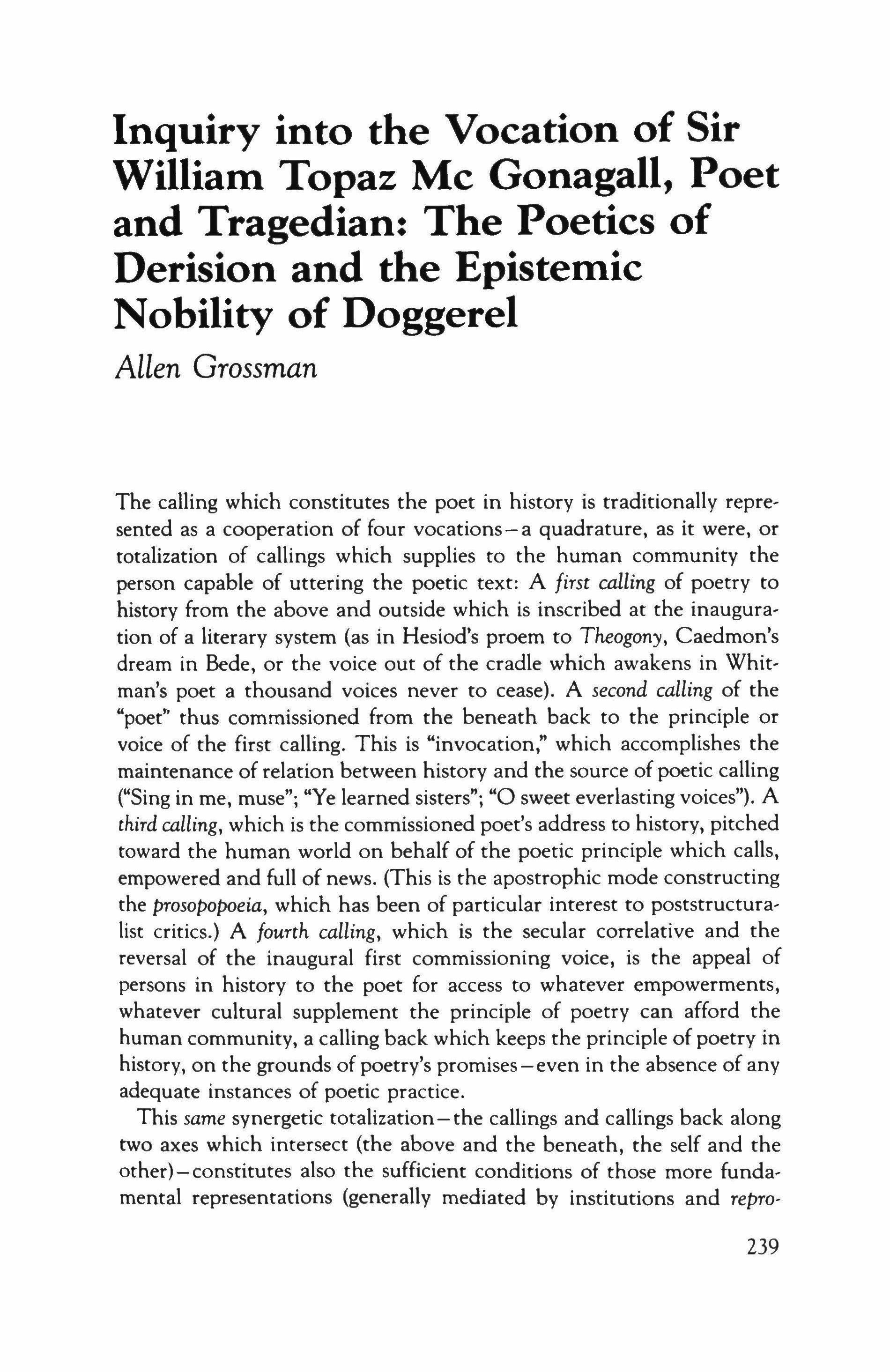
The calling which constitutes the poet in history is traditionally represented as a cooperation of four vocations-a quadrature, as it were, or totalization of callings which supplies to the human community the person capable of uttering the poetic text: A first calling of poetry to history from the above and outside which is inscribed at the inauguration of a literary system (as in Hesiod's proem to Theogony, Caedmon's dream in Bede, or the voice out of the cradle which awakens in Whitman's poet a thousand voices never to cease). A second calling of the "poet" thus commissioned from the beneath back to the principle or voice of the first calling. This is "invocation," which accomplishes the maintenance of relation between history and the source of poetic calling ("Sing in me, muse"; "Ye learned sisters"; "0 sweet everlasting voices"). A third calling, which is the commissioned poet's address to history, pitched toward the human world on behalf of the poetic principle which calls, empowered and full of news. (This is the apostrophic mode constructing the prosopopoeia, which has been of particular interest to poststructuralist critics.) A fourth calling, which is the secular correlative and the reversal of the inaugural first commissioning voice, is the appeal of persons in history to the poet for access to whatever empowerments, whatever cultural supplement the principle of poetry can afford the human community, a calling back which keeps the principle of poetry in history, on the grounds of poetry's promises-even in the absence of any adequate instances of poetic practice.
This same synergetic totalization - the callings and callings back along two axes which intersect (the above and the beneath, the self and the other}-constitutes also the sufficient conditions of those more fundamental representations (generally mediated by institutions and repro-
239
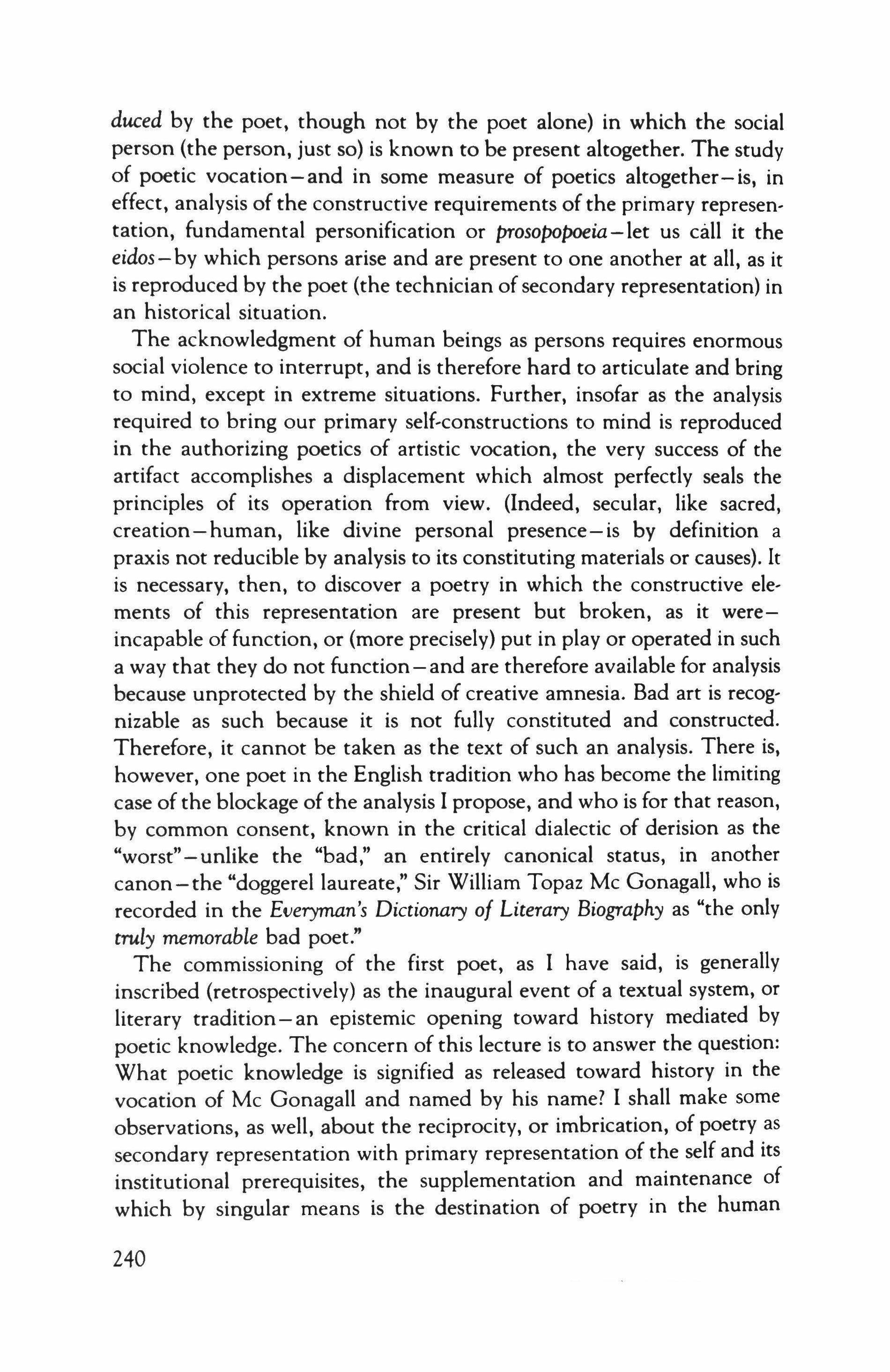
duced by the poet, though not by the poet alone) in which the social person (the person, just so) is known to be present altogether. The study of poetic vocation-and in some measure of poetics altogether-is, in effect, analysis of the constructive requirements of the primary representation, fundamental personification or prosopopoeia-let us call it the eidos - by which persons arise and are present to one another at all, as it is reproduced by the poet (the technician of secondary representation) in an historical situation.
The acknowledgment of human beings as persons requires enormous social violence to interrupt, and is therefore hard to articulate and bring to mind, except in extreme situations. Further, insofar as the analysis required to bring our primary self-constructions to mind is reproduced in the authorizing poetics of artistic vocation, the very success of the artifact accomplishes a displacement which almost perfectly seals the principles of its operation from view. (Indeed, secular, like sacred, creation - human, like divine personal presence - is by definition a praxis not reducible by analysis to its constituting materials or causes). It is necessary, then, to discover a poetry in which the constructive elements of this representation are present but broken, as it wereincapable of function, or (more precisely) put in play or operated in such a way that they do not function - and are therefore available for analysis because unprotected by the shield of creative amnesia. Bad art is recognizable as such because it is not fully constituted and constructed. Therefore, it cannot be taken as the text of such an analysis. There is, however, one poet in the English tradition who has become the limiting case of the blockage of the analysis I propose, and who is for that reason, by common consent, known in the critical dialectic of derision as the "worst" - unlike the "bad," an entirely canonical status, in another canon-the "doggerel laureate," Sir William Topaz Mc Gonagall, who is recorded in the Everyman's Dictionary of Literary Biography as "the only truly memorable bad poet."
The commissioning of the first poet, as I have said, is generally inscribed (retrospectively) as the inaugural event of a textual system, or literary tradition - an epistemic opening toward history mediated by poetic knowledge. The concern of this lecture is to answer the question: What poetic knowledge is signified as released toward history in the vocation of Mc Gonagall and named by his name? I shall make some observations, as well, about the reciprocity, or imbrication, of poetry as secondary representation with primary representation of the self and its institutional prerequisites, the supplementation and maintenance of which by singular means is the destination of poetry in the human
240

world-observations made possible by the Mc Gonagall agon and relevant, as I understand the matter, to the critique of poetic practice in this historical moment which awaits its inaugural event.
In brief, Sir William Topaz Me Gonagall, Poet and Tragedian, received two commissionings or vocations-two roles (poet and Tragedian) by which, as strategies toward the representation of the person, he undertook (hopelessly) to compensate fundamental erasures of primary representation, that is to say, erasures of his nature as a social person. The vocation of William Mc Gonagall (an unemployed Scottish handloom weaver) as Poet, which came to him in middle age, was a calling by the principle of poetry in accord with the millennial conventions of such calling. The text which tells of it is devised to repeat not only the vocational moments of the English Romantic poets, but most particularly the narrative of the calling of the secular herdsman Caedrnou, the first poet of England, in whose dream was inaugurated the vernacular poetic tradition in English. Consequently, it constitutes an affiliation with the very abstract principle of poetry as historically inscribed. The requirement of its abstractness was, of course, the reciprocal of the hypothetical universality which made it available to Mc Gonagall in the first place and which opens up a difference between the role and the natural person of the kind figured, for example, in terrorism, and enhanced (though by no means entirely expressed) by distinctions of chronology, class and nation. That difference (as both discrepancy and incongruity) was enacted in a theater of derision in which it was Mc Gonagall's destiny to perform for the rest of his life.
The very concrete social person, William Mc Gonagall, was subject to the double erasure of technological unemployment (the erasure of artisanal identity which the role of "poet" replaced) and also to the even more fundamental cultural erasure of an exacerbated and unresolved colonial situation (the problematization of a reliable national identity, primary representation of the kind which flows from origins in the profoundest sense) to which his role as Tragedian (an actor of Shakespearean characters) was addressed. Scottish civilization in the nineteenth century was subject to the immense (hypothetically supreme) eidetic domination of English representational hegemony, of which two names were Shakespeare and the Anglican Church. (Indeed, the date of Mc Gonagall's poetic vocation corresponds to a crisis in the long history of the enforced submission of Scottish Presbyterianism to the metropolitan religion, Anglicanism.)
As I have observed, Mc Gonagall early in life attempted to compensate this primary and deeper erasure (preceding the poetic vocation and
241

determining its strangely radical form and entailments) by acting the roles of Shakespearean characters (initially Macbeth). In effect, Mc Gonagall (as tragedian) attempted to supply by the Shakespearean character, and (later) by the other secondary representation of the poetic role, the objective absence of an account of himself as a social person, which is the primary representational accommodation supplied by institutions such as church, state and language, heterogeneous to selvesand the just requirement of all human beings as persons.
Thus, the role of poet (as a play within a play) was added by Mc Gonagall to the role of tragedian, and both were enacted in the social meta-theater of eidetic poverty of Dundee. As a true tragedian of the postindustrial, colonial world, Mc Gonagall presents (at the very least) the unmistakable tragedy of eidetic poverty-bad but memorable: the spectacle of the artist who does not compensate his audience by esthetic success, since the esthetic difference (the katharsis) requires for its existence affirmation of an intact social reality.
The singular nature of the person signified by the name Mc Gonagall is that, in a strong sense which elucidates the idea of the person and the cultural logic of eidetic privilege, he does not exist and therefore should not appear. Hence, he is "indescribable." Precisely by means of the systemic contradiction of two predicates-artistic nullity and memorability - he persists (per impossibile) in the vacancy which is the uncanny residue of the failure of secondary representations to construct the form or figure of the person, the primary eidos. In the name "Me Gonagall," poetry displays with relentless rationality, not absence, but a fundamental nonexistence which has no other name and nonetheless requires to be known. Such is the dynamic, not of the bad but of the "worst." The entry on Mc Gonagall in Kurt Wittig's The Scottish Tradition in Literature (1958) is typical of the cultural phenomenology of Mc Gonagall's vocation: "The Poetic Gems of the Great William Mc Gonagall, Poet and Tragedian, are still reprinted almost every year; and their continuing popularity would indeed be an interesting problem for the psychiatrist to study. It is not rock-bottom that we touch here, that would suggest something solid; with him, poetry is irretrievably sunk in mire." When the Mc Gonagall of the music halls did his turn-singing his own poems and enacting Shakespearean roles-he was (I repeat) performing a play within a play in the theater of derision and poverty which constructed a tragedy of a poverty (eidetic, or representational, poverty) not otherwise seen. That his audience demands that it be seen is a measure of the violence with which the high culture devises the repression of which Mc Gonagall is the tragedian.
242

As I have suggested, the calling ofpoetry to the world is never without historical rationality. The business of the critic is to penetrate that rationality. The failures of poetry are (also) rational where they are enacted - as in the case of Mc Gonagall-by poetry with the intention of displaying the nature of the reality which the poetic function constructs, and the limits of its empowerment. As the inaugural moment in a tradition (which mayor may not have come to pass) the vocation of Mc Gonagall signifies a fundamental inadequacy of poetry to experience which, in my view, underlies modernism and also the poetry of our time. The failures of poetry are among its purposes and reinscribe its truth, and are also the problematic of its truth. The poetic knowledge signified as released toward history by the vocation of Sir William is particularly exacting-displaying a failure of primary resource which underlies poetic practice (and determines its problematicity as eidetic empowerment - the inadequacy to experience of which I speak), at least since Milton's sonnet, "On the late massacre in Piemont,"
Structurally, the quadrature of the calling elides the social person who is called, and yet depends entirely on the existence of the social personboth for its grounding and its destination. When the subject of vocation calls back, he or she is already the poet. Mc Gonagall enforces the consideration of that state of affairs in a world in which there is no other claim to personhood than poetry, the state of affairs of the beggar poet, who seeks no counter-historical ideality, but rather from the poverty of mere secondary representation "projects his hat," as Whitman says, for the small coin of ordinary life. Such is the sense of Keats's "This living hand," or Crane's "Distinctly praise the years," or Crazy Jane's lament for Jack. As Mc Gonagall puts it:
Ah! pity the sorrows of a poor poet, when unable to pay his rent And help him to pay it, and he will feel content.
Sir William Topaz Mc Gonagall, Poet and Tragedian, was a handloom weaver born of Irish parents in 1825 or 1830, and resident for most of his life in Dundee-a city on the Tay estuary notable for the manufacture from imported jute of cheap linen goods-for example, sails for Napoleon's navy, ammunition bags and shirts ("sarksacking") for the army in the Crimea. A city famous for coarse manufacture. (See, for example, The Dundee Textile Industry, 1790-1885, ed. Enid Gauldie [Edinburgh: Scottish Historical Society, 1969].) Handloom weavers, as I have noted, were a class of artisans singularly vulnerable to unemployment as a result of the mechanization of weaving. At the time of Mc Gonagall's
243

commissioning as a poet, the handloom weaver had become a conventional archetype of the skilled unemployed, for whom poetry and literary culture in general were understood to be (as Martha Vicinus has pointed out) a displacement or alternative career for the impoverished but literate craftsman-of which distinguished and unproblematic examples are afforded by the careers of Joseph Skipsey, John Dixon (to whom Ruskin addressed Time and Tide) and others, primarily in the industrial north of England.
The following narrative (conformed as I have observed to the story of Caedmon's vocation in Bede's Ecclesiastical History and further grounded in the typology of Romantic example) occurs in all of the three autobiographical memoirs attributed to Mc Gonagall:
The most startling incident in my life was the time I discovered myself to be a poet, which was the year 1877. [He was, perhaps, 52 years old.] During the Dundee holiday week, in the bright and balmy month of June, when trees and flowers were in full bloom, while lonely and sad in my room, I sal thinking about the thousands of people who were away by rail and steamboat, perhaps to the land of Burns, or poor ill-treated Tannahill, or to gaze upon the Trossachs in Rob Roy's country, or elsewhere wherever their minds led them. Well, while pondering so, I seemed to feel as it were a strange kind of feeling stealing over me, and remained so for about five minutes. A flame, as Lord Byron has said, seemed to kindle up my entire frame, along with a strong desire to write poetry; and I felt so happy, so happy, that I was inclined to dance, then I began to pace backwards and forwards in the room, trying to shake off all thought of writing poetry; but the more I tried the more strong the sensation became. It was so strong, I imagined that a pen was in my right hand, and a voice crying, "Write Write!" So I said to myself, ruminating, let me see; what shall I write? then all at once a bright idea struck me to write about my best friend, the late reverend George Gilfillan; in my opinion I could not have chosen a better subject, therefore I immediately found paper, pen, and ink, and set myself down to immortalize the great preacher, poet and orator. These are the lines I penned, which I dropped into the box of the Weekly News office surreptitiously, which appeared in that paper as follows:
Rev. George Gilfillan of Dundee, There is none can you excel; You have boldly rejected the Confession of Faith, And defended your cause right well.
The first time I heard him speak, 'Twas in Kinnaird Hall, Lecturing on the Garibaldi movement, As loud as he could bawl.
244

He is a liberal gentleman
To the poor while in distress, And for his kindness unto them
The Lord will surely bless.
My blessings on his noble form, And on his lofty head, Mayall good angels guard him while living, And hereafter when he's dead.
P.s. - This is the first poem that I composed under the divine inspiration, and is true (!], as I have to give an account to God at the day ofjudgment for all the sins I have committed.
(Poetic Gems Selected from the Works of William Mc Gonagall Poet and Tragedian with Biographical Sketch and Reminiscences by the Author, and Portrait. Dundee and London, 1954 (seventh impression). Pp.6-7.)
Beginning with his first poem on Reverend Gilfillan, Mc Gonagal1's subsequent production-some three hundred poems-is predominantly engaged with "immortalization"-either in the rhetoric ofdiscours, which puts in play the tropology of apostrophe, or in the bal1adic histoire of heroic narrative. Indeed, Mc Gonagal1's signature trope is prosopopoeiaimmortalization, because person-making (making the dead thing live) is his work, the commissioned weaving of his hand. The singularity of "Mc Gonagal1" poetics derives from the spectacle he sponsors-his representational meta-tragedy: the operation of the tropologies of anthropomorphic construction ("This is the first poem I composed while under divine inspiration, and is true ") in such a way as to produce the "person effect" with the result, not ofmaking the person present, but ofdisrupting the processes of doing so-leaving behind as residue his poem, the uncanny human real which is terrible. Not the "bad" but the ungrounded, the bottomless "worst." George Gilfillan (the first beneficiary of Mc Gonagal1's epideixis) devoted his life, in fact, and more than a hundred volurnes to the establishment of Scottish culture and religion-precisely, that is, to the constitution of that primary representability, the justice of which I speak. He died the year after Mc Gonagal1's encomium was published, as the Tay Bridge, which was the subject of Mc Gonagal1's second and most famous poem, fell down shortly after the poem was written.
245

The "poet" is one creation produced by the text which bears, and bears up, his name. And the poetic text of which the poet is a creation signifies only because there is a sociocultural understanding about "poetry" (an abstract and universal principle) which is prior to any text, and also a sociocultural understanding (which functions as a primary representational system, prior to any text) about the person whom poetry calls. The Mc Gonagall "phenomenon" is independent and in the end indifferent (but not irrelevant) to the text of Mc Gonagall (it is in fact not clear who wrote the Mc Gonagall text) because Mc Gonagall is (precisely) not signified by his text. "Me Gonagall" is the name for something which has no other name in a way different from the way in which the name of any poet signifies something which has no other name -let us say the person who constructs the likenesses of persons. In effect, Mc Gonagall is an abstract, speculative construction built in search of a term for the failure of primary representation - the grounding of the person prior to the role of "poet," "Macbeth," or any other. Mc Gonagall is the name ofwhat does not mean - the name of a lack (not an absence), a "singularity" in the astronomic sense (not a catastrophe)-at most (for the purposes of articulation) an ash or unanalyzable residue that is the product of the performance of that primary constructive process (the process which produces the recognizability of the person, let us say) when that process is conducted entirely by poetic (that is to say, by secondary means)-hence, in such a way as to bring to pass its failure.
Mc Gonagall was a specialist, as I have indicated, in apostrophic address (witness a random set of his opening lines: "Rev. George Gilfillan of Dundee," "All hail to the Empress of India and Great Britain's Queen," "Beautiful Railway Bridge of the Silvery Tay," "Ye sons of Great Britain," "Oh, thou demon Drink, thou fell destroyer," "Beautiful and ancient city of Perth," "Beautiful moon with thy Silvery Light," "Beautiful Sun with thy Golden Rays," et cetera). As Jonathan Culler has pointed out, apostrophe gives rise in our time to embarrassment and embarrassment to the disuse of the trope of address. Inside that embarrassment is the anagnorisis or (in the Mc Gonagallian sense) the tragic recognition of a fundamental lack and the shame of the inappropriateness of poetic means to deeply desired ends- in effect, fear of derision. Inside that embarrassment (as Mc Gonagall requires the experience ofit) is the terror of the non-tropic real which stops the play of signifiers. Thus Mc Gonagall becomes the historian of collapsing structures-falling bridges, railroad disaster, fires-and especially theater fires-shipwrecks, floods in China, et cetera. In the dialectic of Mc Gonagallian apostrophe no
246
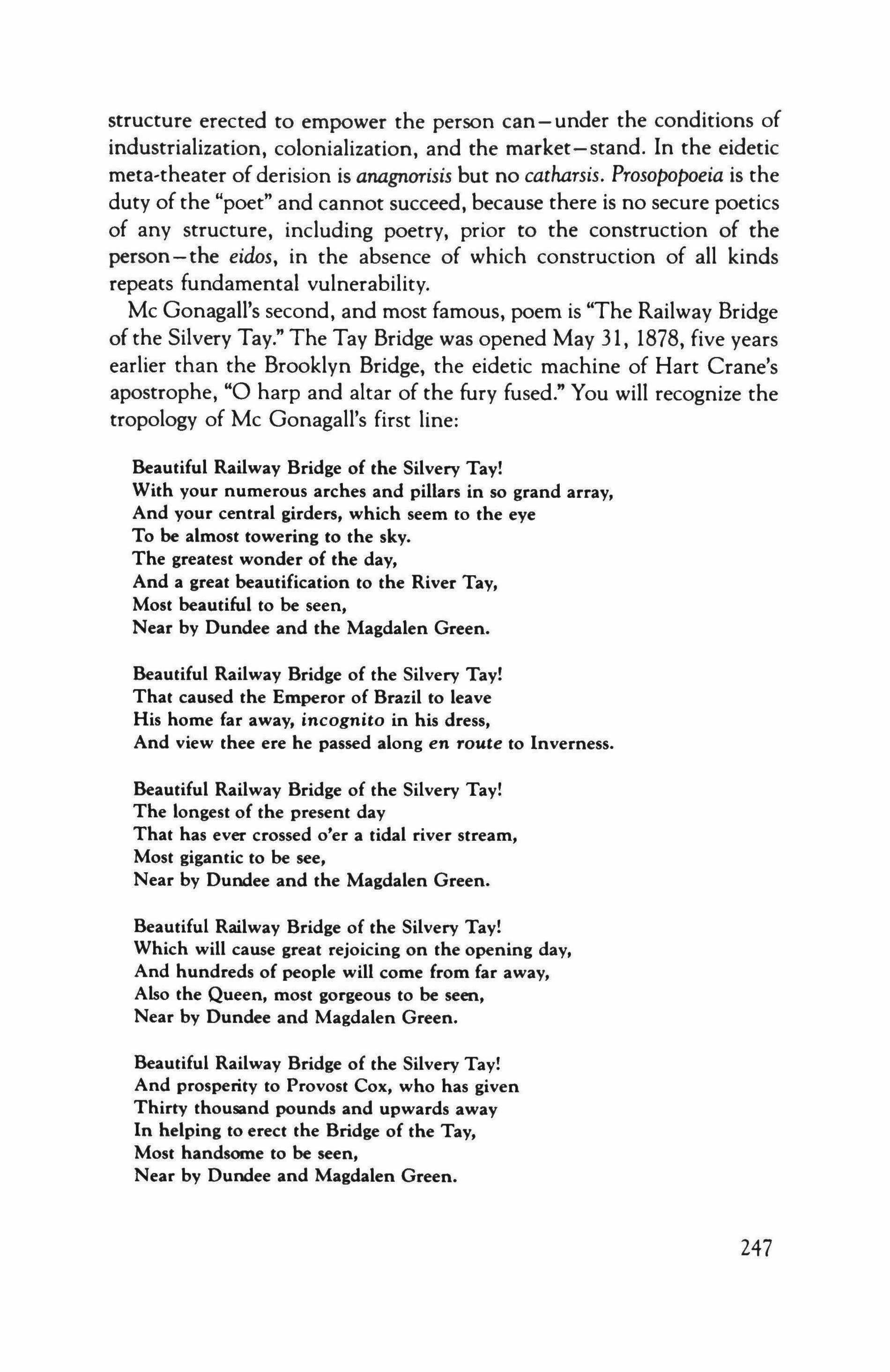
structure erected to empower the person can - under the conditions of industrialization, colonialization, and the market-stand. In the eidetic meta-theater of derision is anagnorisis but no catharsis. Prosopopoeia is the duty of the "poet" and cannot succeed, because there is no secure poetics of any structure, including poetry, prior to the construction of the person-the eidos, in the absence of which construction of all kinds repeats fundamental vulnerability.
Me Gonagall's second, and most famous, poem is "The Railway Bridge of the Silvery Tay." The Tay Bridge was opened May 31, 1878, five years earlier than the Brooklyn Bridge, the eidetic machine of Hart Crane's apostrophe, "0 harp and altar of the fury fused." You will recognize the tropology of Mc Gonagall's first line:
Beautiful Railway Bridge of the Silvery Tay!
With your numerous arches and pillars in so grand array, And your central girders, which seem to the eye
To be almost towering to the sky.
The greatest wonder of the day, And a great beautification to the River Tay, Most beautiful to be seen, Near by Dundee and the Magdalen Green.
Beautiful Railway Bridge of the Silvery Tay!
That caused the Emperor of Brazil to leave His home far away, incognito in his dress, And view thee ere he passed along en route to Inverness.
Beautiful Railway Bridge of the Silvery Tay!
The longest of the present day
That has ever crossed o'er a tidal river stream, Most gigantic to be see, Near by Dundee and the Magdalen Green.
Beautiful Railway Bridge of the Silvery Tay!
Which will cause great rejoicing on the opening day, And hundreds of people will come from far away, Also the Queen, most gorgeous to be seen, Near by Dundee and Magdalen Green.
Beautiful Railway Bridge of the Silvery Tay!
And prosperity to Provost Cox, who has given Thirty thousand pounds and upwards away In helping to erect the Bridge of the Tay, Most handsome to be seen, Near by Dundee and Magdalen Green.
247
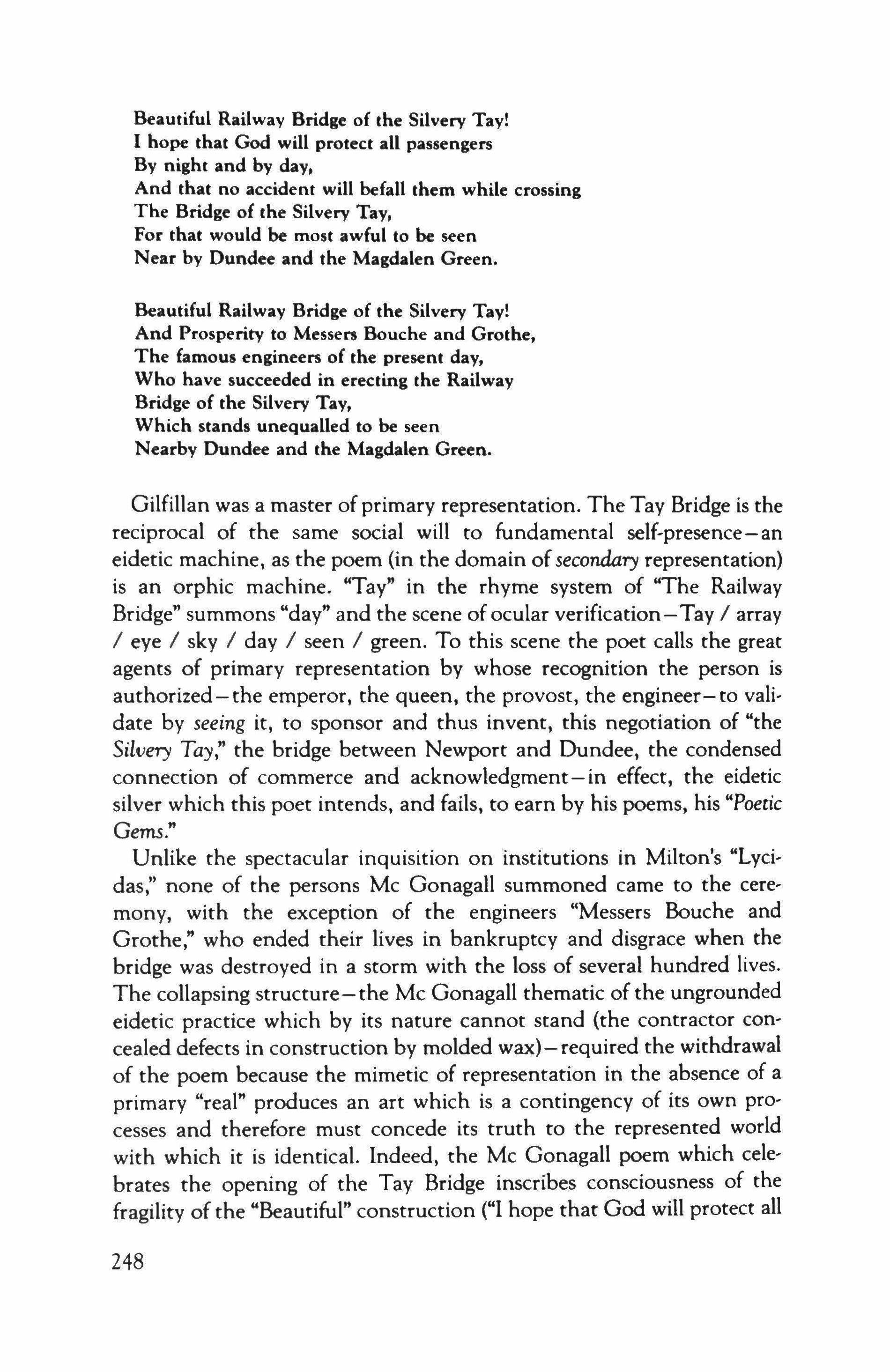
Beautiful Railway Bridge of the Silvery Tay!
I hope that God will protect all passengers By night and by day.
And that no accident will befall them while crossing The Bridge of the Silvery TaV.
For that would be most awful to be seen Near bv Dundee and the Magdalen Green.
Beautiful Railwav Bridge of the Silvery Tav!
And Prosperity to Messers Bouche and Grothe. The famous engineers of the present day.
Who have succeeded in erecting the Railwav Bridge of the Silvery Tav, Which stands unequalled to be seen Nearby Dundee and the Magdalen Green.
Gilfillan was a master of primary representation. The Tay Bridge is the reciprocal of the same social will to fundamental self-presence-van eidetic machine, as the poem (in the domain ofsecondary representation) is an orphic machine. "Tay" in the rhyme system of "The Railway Bridge" summons "day" and the scene of ocular verification-Tay / array / eye / sky / day / seen / green. To this scene the poet calls the great agents of primary representation by whose recognition the person is authorized-the emperor, the queen, the provost, the engineer-to validate by seeing it, to sponsor and thus invent, this negotiation of "the Silvery Tay," the bridge between Newport and Dundee, the condensed connection of commerce and acknowledgment - in effect, the eidetic silver which this poet intends, and fails, to earn by his poems. his "Poetic Gems."
Unlike the spectacular inquisition on institutions in Milton's "Lvcidas," none of the persons Mc Gonagall summoned came to the ceremony, with the exception of the engineers "Messers Bouche and Grothe," who ended their lives in bankruptcy and disgrace when the bridge was destroyed in a storm with the loss of several hundred lives. The collapsing structure-the Mc Gonagall thematic of the ungrounded eidetic practice which by its nature cannot stand (the contractor concealed defects in construction by molded wax)-required the withdrawal of the poem because the mimetic of representation in the absence of a primary "real" produces an art which is a contingency of its own processes and therefore must concede its truth to the represented world with which it is identical. Indeed, the Mc Gonagall poem which celebrates the opening of the Tay Bridge inscribes consciousness of the fragility of the "Beautiful" construction ("I hope that God will protect all
248
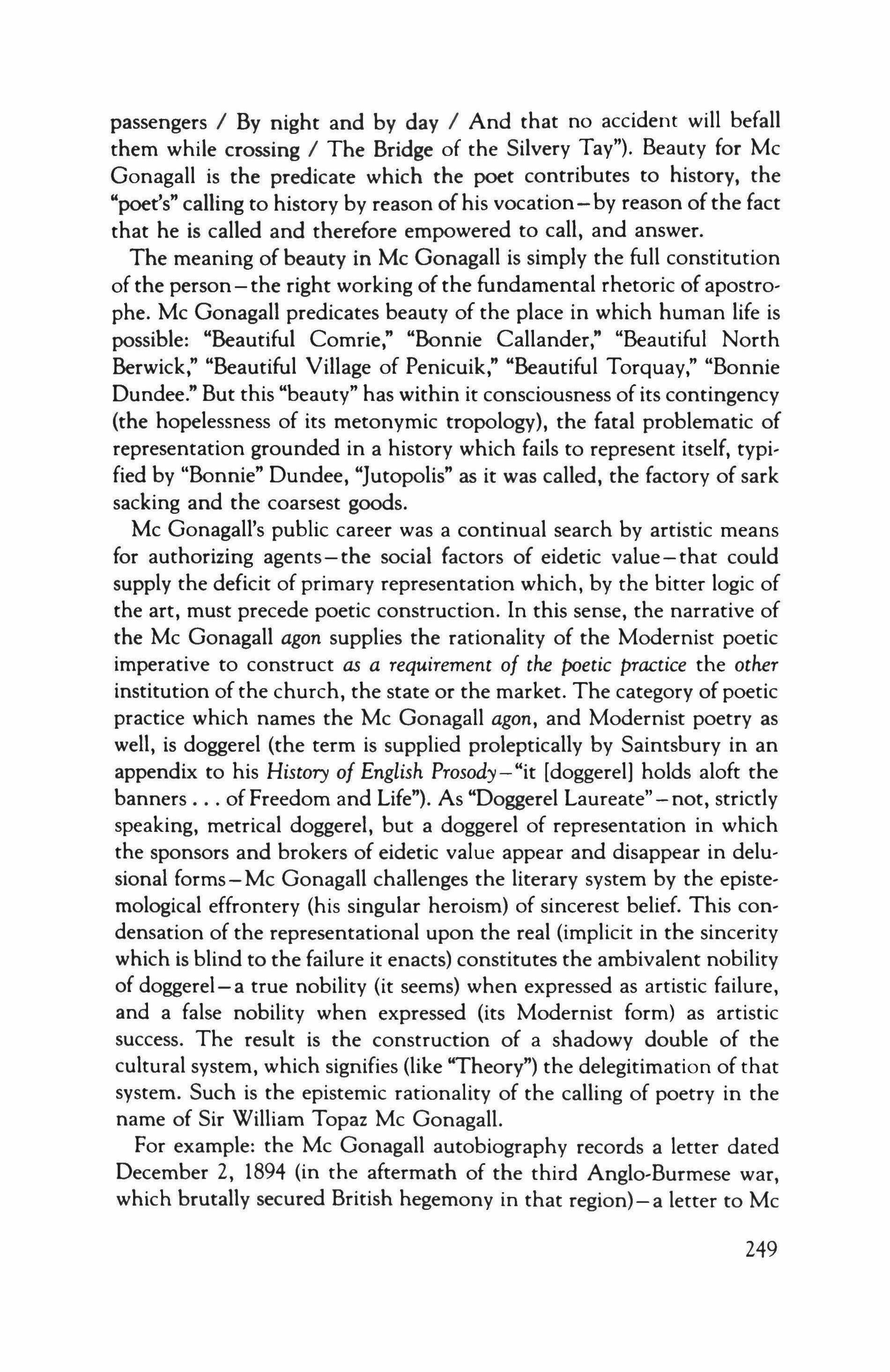
passengers / By night and by day / And that no accident will befall them while crossing / The Bridge of the Silvery Tay"). Beauty for Mc Gonagall is the predicate which the poet contributes to history, the "poet's" calling to history by reason of his vocation - by reason of the fact that he is called and therefore empowered to call, and answer.
The meaning of beauty in Me Gonagall is simply the full constitution of the person-the right working of the fundamental rhetoric of apostrophe. Me Gonagall predicates beauty of the place in which human life is possible: "Beautiful Comrie," "Bonnie Callander," "Beautiful North Berwick," "Beautiful Village of Penicuik," "Beautiful Torquay," "Bonnie Dundee." But this "beauty" has within it consciousness of its contingency (the hopelessness of its metonymic tropology), the fatal problematic of representation grounded in a history which fails to represent itself, typified by "Bonnie" Dundee, "[utopolis" as it was called, the factory of sark sacking and the coarsest goods.
Mc Gonagall's public career was a continual search by artistic means for authorizing agents-the social factors of eidetic value-that could supply the deficit of primary representation which, by the bitter logic of the art, must precede poetic construction. In this sense, the narrative of the Mc Gonagall agon supplies the rationality of the Modernist poetic imperative to construct as a requirement 0/ the poetic practice the other institution of the church, the state or the market. The category of poetic practice which names the Mc Gonagall agon, and Modernist poetry as well, is doggerel (the term is supplied proleptically by Saintsbury in an appendix to his History 0/ English Prosody-"it [doggerel] holds aloft the banners of Freedom and Life"). As "Doggerel Laureate" - not, strictly speaking, metrical doggerel, but a doggerel of representation in which the sponsors and brokers of eidetic value appear and disappear in delusional forms - Mc Gonagall challenges the literary system by the epistemological effrontery (his singular heroism) of sincerest belief. This condensation of the representational upon the real (implicit in the sincerity which is blind to the failure it enacts) constitutes the ambivalent nobility of doggerel-a true nobility (it seems) when expressed as artistic failure, and a false nobility when expressed (its Modernist form) as artistic success. The result is the construction of a shadowy double of the cultural system, which signifies (like "Theory") the delegitimation of that system. Such is the epistemic rationality of the calling of poetry in the name of Sir William Topaz Mc Gonagall.
For example: the Mc Gonagall autobiography records a letter dated December 2, 1894 (in the aftermath of the third Anglo-Burmese war, which brutally secured British hegemony in that region)-a letter to Mc 249

Gonagall from C. MacDonald, K.O.W.E.B., poet laureate of Burma, informing Me Gonagall that he was "lately appointed a Grand Knight of the Holy Order of the White Elephant, Burmah, by his Royal Highness upon representation being made to him by your fellow countrymen out here." The letter continues:
King Theebaw, who ia just now holding his Court in the Andaman Islands, expressed himself as being only too pleased to confer the highest honor possible upon merit, if that merit were found worthy by his Grand Topaz General. As the latter gentleman has long been impressed by the injustice with which you have been treated by Lord Roseberv in his position as chief adviser of Her Majesty, and since your great modesty on several occasions has been noticed by His Royal Highness the King of Burmah, it gives him great pleasure to assure Theebaw, the King, that none more worthy of this high honour has ever lived in the East (sic), whereat His Royal Highness called his Court together, and with much eclat and esteem caused it to be proclaimed throughout his present palace and kingdom that you were to be known henceforth as Sir Topaz Mc Gonnagal, G.K.H.O.W.E.B.
Should you ever visit the Adaman Islands
The author of this letter makes reference to Mc Gonagall's disappointment, upon the death of Tennyson, with respect to the laureateship which Mc Gonagall had endeavored to obtain, before the fact, in 1878 by making a famous journey, three times recorded in his autobiographies, to Balmoral Castle (a journey modeled on the mock voyages of exploration by the Renaissance waterman poet, John Taylor) for the purpose of obtaining that honor from the Monarch. Me Gonagall had solicited laureateship by a poem called "A Requisition to the Queen":
1. Most August! Empress of India, and of Great Britain the Queen
I most humbly beg your pardon, hoping you will not think it mean
That a poor poet that lives in Dundee, Would be so presumptuous to write unto Thee •...
3. Beautiful Empress, of India, and Englands Gracious Queen
I send you a Shakespearian address written by me. And I think if your Majesty reads it, right pleased will you be
And my heart will leap with joy, if it is patronized by Thee.
4. Most Mighty Empress, of India, and Englands beloved Queen,
250

Most handsome to be Seen. I wish you every Success. And that heaven may you bless.
For your Kindness to the poor while they are in distress.
I hope the Lord will protect you while living And hereafter when your Majesty is dead.
I hope Thee Lord above will place an eternal Crown! upon your Head.
I am your gracious Majesty ever Faithful to Thee, William Mc Gonagall, The Poor Poet, That lives in Dundee.
Mc Gonagall's journey to Balmoral ended in a dispute, on a dark rainy night, with the gatekeeper of the castle as to whether Mc Gonagall or Tennyson was in fact the poet laureate of England. In the end, Mc Gonagall conceded that some mistake had been made, and the gatekeeper bought a copy of Mc Gonagall's book for a penny. Mc Gonagall's address to the Queen ("Most handsome to be seen"-like the Tay railroad bridge) is of the same order as the summoning of the emperor of Brazil and the knighthood in Burma - an appeal to an abstract (literally distant) historical center ofprimary eidetic construction for validation of the poetic commission, to which he paradoxically commits his name by the writing of his self-incorporation in text.
Mc Gonagall's journey, and his hagiography in general, reproduces the literary system in the form of its negation, by reason of Mc Gonagallian fidelity to the precise contours of that system. The vocation of Mc Gonagall is the doggerel ("doggerel" considered as the identification of the voice with the mechanisms of representation) which constructs the civilization in place, with the result of supplying the spectacle of its failure. The mechanism ofthat construction is, as I have said, sinceritythat is to say, the commitment of life itself to artifice, a doggerel of the moral life-giving rise to a horror of sincerity (as a sort of cultural terrorism). The reflex of that horror is fundamental to Modernist impersonality, which both defers identification of life with art and acknowledges the dependent reciprocity of secondary and primary representation. In the early twentieth century, nineteenth-century American poetry was rewritten as a doggerel culture by the centralization of the doggerel masters Whitman and Dickinson. Whitman forecasts "the greatest poet"; Dickinson would not be the poet. Both register the horror of discrepancy ("the little mother with the big child"); and Emerson announces "the Poet," for whom he "looks in vain." But Mc Gonagall, arch-doggerelist, is the poet "who lives in Dundee."
251

The idea of doggerel was first secured in English by a term in the response of Chaucer's host to Chaucer's "Tale of Sir Thopas." Mc Gonagall's Burmese knighthood - Sir William Topaz - derives from the enounced Sir Thopas of Chaucer, subject not agent of representation. Thus, the battlefield of Sir Thopas's nobility is the contested interior domain of the represented. In this mise en abime (which is the phenomenological specificity oflithe worst"), there erupts the theatrics ofderision. The host interrupts Chaucer's tale with the following words:
"Namoore of this, for Goddes dignitee,"
Quod our Hooste, "for thou makest me
So wery of thy verray lewednesse
That, also wislv God my soule blesse, Mvne eres aken of thy drasty speche, Now swich a rym the devil I biteche!
This may wei be rym dogerel," quod he.
"Why so?" quod I, "why wiltow lette me
Moore of my tale than another man, Svn that it is the beste rvrn I kan?"
"By God," quod he, "For plevnlv, at a word, Thy drasty rhyming is nat worth a toord!
In the system of the Canterbury Tales stability of the Chaucerian agent of poetic production is obtained internal to the representation through the maintenance function of multiple contexts-for example, the prologue, the link, the title page. The above exchange marks a limit of stylistic variation and also of sincerity. It thereby specifies the Mc Gonagallian limitless confidence in secondary representation - unstable because without any context but itself-("But sir Thopas, he bereth the flour / Of roial chivalry"}: the doggerel laureate Sir William, tragedian of representation, who plays the role but is not an actor. In the host's language "rym doggerel" is the devil's due ("Now swich a rym the devil I biteche")-is excremental ("drasty"), but of less value than shit ("nat worth a toord"). This doggerel performance, expressible only by subtractive evaluation, hurts the ears and leaves a residue that is less than nothing and more than unheimlich-more than ghostly absence. In short, the literary system in its esthetic form cannot by its nature encounter its own decreative double, which is, I think, the idea of poetry itself, always present in the fourth calling of my quadrature-the calling of history to the poetic principle.
The theater of derision (inaugurated by Chaucer's host), in which Mc Gonagall throughout his life performed-(in the event it is his singular composition}-is constituted of the appeal to the principle of poetry, and
252

the rejection of any actual practice of poetry in the interest of another outcome, which neither the attack on art, nor the criticism of it, nor its theoretizarion (which nonetheless always has derision inside it) can disclose.
An account of Mc Gonagall's performance in old age as remembered by an observer (William Power, in My Scotland, cited by Hugh MacDiarmid in 1926) concludes with the phrase, "[A]s the Ossian of the ineffably absurd, he has entered into immortality." Power's narrative (by comparison to dozens like it in newspapers) is benign, but the language of exception ("ineffably absurd"), which drives the rationality of Mc Gonagall's immortality claim, and the analogy of Macpherson (the poet deligitimated by his poem) specifies the social congruity and the cultural singularity of Mc Gonagall's performance:
He was an old man, but, with his athletic though slightly stooping figure and his dark hair, he did not look more than forty-five; and he appeared to have been shaved the night before. He wore a Highland dress of Rob Roy tartan and boy's size. After reciting some of his own poems, to an accompaniment of whistles and cat calls, the Bard armed himself with a most dangerous-looking broadsword, and strode up and down the platform, declaiming "Clarence's Dream" and "Give me another horse - Bind up my wounds." His voice rose to a howl. He thrust and slashed at imaginary foes. A shower of apples and oranges fell on the platform. Almost before they touched it, they were met by the fell edge of Mc Gonagall's claymore and cut to pieces. The Bard was beaded with perspiration and orange juice. The audience yelled with delight; Mc Gonagall yelled louder still, with a fury which I fancy was not wholly feigned. It was like a squalid travesty of the wildest scenes of Don Quixote and Orlando Furioso. I left the hall early saddened and disgusted. The mental condition of the Melancholy Dane is not more debatable than that of Mc Gonagall. Was his madness real or feigned?
The travesty of travesty is either a criticism of travesty or a reproduction of travesty as representation unregulated by reference to any real state of affairs. In exchanges of derision (by contrast to satiric theater) the audience comments on the discrepancy between the performance and its expectation, and is thus engaged, both in the registration of the inadequacy of the actor to its conception of the role, and in the maintenance of its conception of the role. Exchanges of derision, and (explicitly) the derision arising in consequence of discrepant powers, are inherent in the constitution of poetry in history and motivate the violence of its founding stories (the slaying of Orpheus, for example, or the rape of Philomela). It is not that the practice of poetry gives rise to derision, but
253
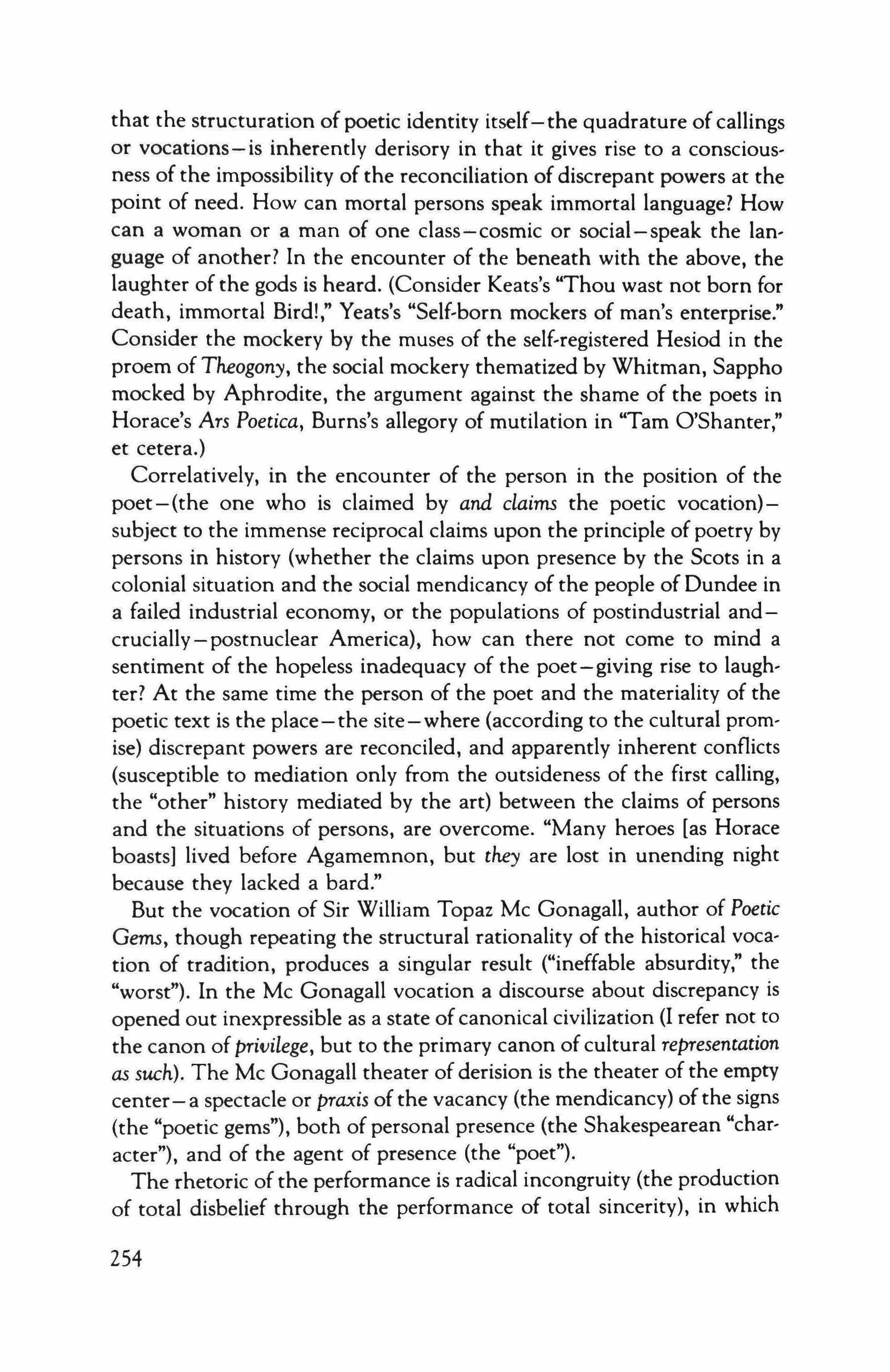
that the structuration of poetic identity itself-the quadrature of callings or vocations-is inherently derisory in that it gives rise to a consciousness of the impossibility of the reconciliation of discrepant powers at the point of need. How can mortal persons speak immortal language? How can a woman or a man of one class - cosmic or social-speak the language of another? In the encounter of the beneath with the above, the laughter of the gods is heard. (Consider Keats's "Thou wast not born for death, immortal Bird!," Yeats's "Self-born mockers of man's enterprise." Consider the mockery by the muses of the self-registered Hesiod in the proem of Theogony, the social mockery thematized by Whitman, Sappho mocked by Aphrodite, the argument against the shame of the poets in Horace's Ars Poetica, Burns's allegory of mutilation in "Tam O'Shanter," et cetera.)
Correlatively, in the encounter of the person in the position of the poet-(the one who is claimed by and claims the poetic vocation}subject to the immense reciprocal claims upon the principle of poetry by persons in history (whether the claims upon presence by the Scots in a colonial situation and the social mendicancy of the people of Dundee in a failed industrial economy, or the populations of postindustrial andcrucially - postnuclear America), how can there not come to mind a sentiment of the hopeless inadequacy of the poet-giving rise to laughter? At the same time the person of the poet and the materiality of the poetic text is the place-the site-where (according to the cultural promise) discrepant powers are reconciled, and apparently inherent conflicts (susceptible to mediation only from the outsideness of the first calling, the "other" history mediated by the art) between the claims of persons and the situations of persons, are overcome. "Many heroes [as Horace boasts] lived before Agamemnon, but they are lost in unending night because they lacked a bard."
But the vocation of Sir William Topaz Mc Gonagall, author of Poetic Gems, though repeating the structural rationality of the historical vocation of tradition, produces a singular result ("ineffable absurdity," the "worst"). In the Mc Gonagall vocation a discourse about discrepancy is opened out inexpressible as a state ofcanonical civilization (I refer not to the canon of privilege, but to the primary canon of cultural representation as such). The Mc Gonagall theater of derision is the theater of the empty center- a spectacle or praxis of the vacancy (the mendicancy) ofthe signs (the "poetic gems"), both of personal presence (the Shakespearean "character"), and of the agent of presence (the "poet").
The rhetoric of the performance is radical incongruity (the production of total disbelief through the performance of total sincerity), in which
254
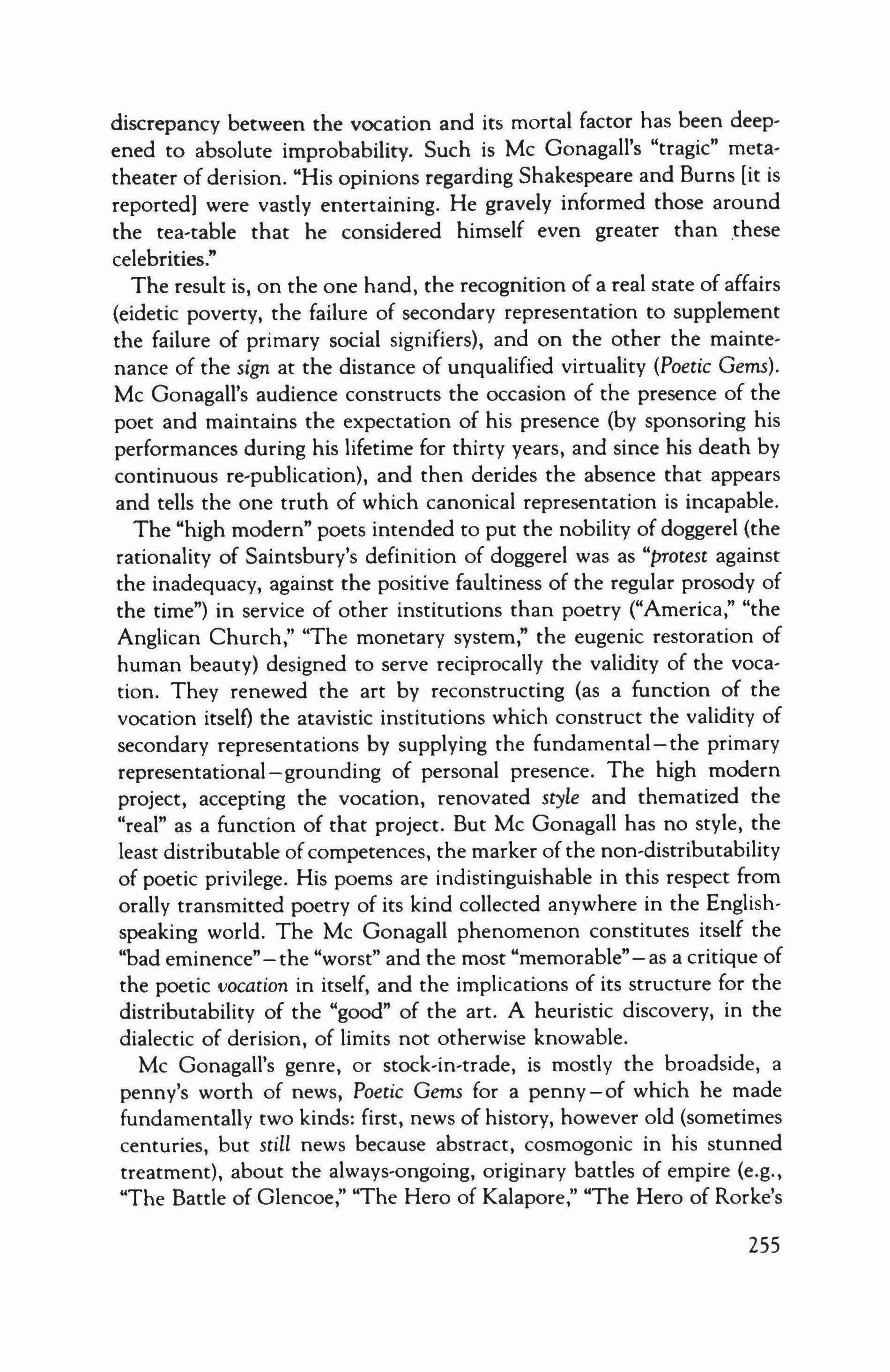
discrepancy between the vocation and its mortal factor has been deepened to absolute improbability. Such is Mc Gonagall's "tragic" metatheater of derision. "His opinions regarding Shakespeare and Burns [it is reported] were vastly entertaining. He gravely informed those around the tea-table that he considered himself even greater than these celebrities."
The result is, on the one hand, the recognition of a real state of affairs (eidetic poverty, the failure of secondary representation to supplement the failure of primary social signifiers), and on the other the maintenance of the sign at the distance of unqualified virtuality (Poetic Gems).
Mc Gonagall's audience constructs the occasion of the presence of the poet and maintains the expectation of his presence (by sponsoring his performances during his lifetime for thirty years, and since his death by continuous re-publication), and then derides the absence that appears and tells the one truth of which canonical representation is incapable.
The "high modern" poets intended to put the nobility of doggerel (the rationality of Saintsbury's definition of doggerel was as "protest against the inadequacy, against the positive faultiness of the regular prosody of the time") in service of other institutions than poetry ("America," "the Anglican Church," "The monetary system," the eugenic restoration of human beauty) designed to serve reciprocally the validity of the vocation. They renewed the art by reconstructing (as a function of the vocation itself) the atavistic institutions which construct the validity of secondary representations by supplying the fundamental-the primary representational-grounding of personal presence. The high modern project, accepting the vocation, renovated style and thematized the "real" as a function of that project. But Mc Gonagall has no style, the least distributable of competences, the marker of the non-distributabilitv of poetic privilege. His poems are indistinguishable in this respect from orally transmitted poetry of its kind collected anywhere in the Englishspeaking world. The Mc Gonagall phenomenon constitutes itself the "bad eminence" - the "worst" and the most "memorable" - as a critique of the poetic vocation in itself, and the implications of its structure for the distributabilitv of the "good" of the art. A heuristic discovery, in the dialectic of derision, of limits not otherwise knowable.
Mc Gonagall's genre, or stock-in-trade, is mostly the broadside, a penny's worth of news, Poetic Gems for a penny-of which he made fundamentally two kinds: first, news of history, however old (sometimes centuries, but still news because abstract, cosmogonic in his stunned treatment), about the always-ongoing, originary battles of empire (e.g., "The Battle of Glencoe," "The Hero of Kalapore," "The Hero of Rorke's
255
Drift," "The Battle of Flodden Field," "The Battle of EI Teb," "The Battle of Waterloo," "George Gordon the Hero of Khartoum," et cetera). The heroism - his interest was always heroism - produced by these conflicts is of the kind Mc Gonagall enacted in his Shakespearean roles ("Give me another horse - Bind up my wounds!"). In his theater of derision, the old man is doing cosmogonic work, particularly in his Shakespearean character (his first role): the reenactment (spectacularizing failure) of the institutional foundation of the primary representations of eidetic civilization-obsessive, blind, violent, the captive of an estheticism which his performance decreates by reproduction.
The second kind of news he sold (More Poetic Gems for a penny) was news about the collapse of communicative systems, of which I have already made mention: bridge disasters, railroad disasters, shipwrecks, fires, the Johnstown Flood, et cetera). These poems are the obverse of news about the beauty of the world and persons ("Beautiful Sun," "Beautiful Moon," "Beautiful Gilfillan"), and are related to the first kind of news as secondary representation (poetry) is to primary representational systems (institutions in history). This second kind of news-news of the beauty of persons, the world that maintains them, and the fragility (the internal contradictoriness) of the systems that construct the intelligibility of the world - is the central Mc Gonagall discourse, the prosopopoeia.
Among poems of this type are two about theater fires: "The Burning of the Exeter Theater" in 1887 at Act Four, scene iii, of Romany Rye, and "The Burning of the People's Variety Theatre in Aberdeen." In both cases the fire broke out on the stage, a frequent occurrence in the nineteenth-century melodramatic theater. The scene of representation became the scene of life (as it happened with Shakespeare's Globe), and horror ensued. Mc Gonagall's attention in these poems is addressed to accidentally realized (and named) persons who become "heroic" rescuers, persons (also realized accidentally) who escape, and persons who are accidentally destroyed.
Detective Innes, who was passing at the time of the fire
Rendered help in every way the audience could desire, By helping many of them for to get out, Which was a heroic action without any doubt

A lady and gentleman of the Music Hall company, Monti & Spry
Managed to make their escape by climbing up very high, To an advertisement board, and smashing the glass of the fanlight
256
And squeezed themselves through with a great fight

For there was Mrs Brookes stretched dead on the floor, Who had fallen in trying her escape to procure. She was lying with one arm over her ten months child, And her cries for help, no doubt, were frantic and wild; And part of her arm was burned 0(( as it lay above The child she was trying to shield, which shows a mother's love.
For the baby's flesh was partly uninjured by the flames, Which shows that the loving mother had endured great pains; It, however, met its death by suffocation
[The last is from "The Disastrous Fire At Scarborough.")
The representational significance of these persons is the same as the .ignificance for representation of "Me Gonagall." These are persons realzed by accident in the mendicant poetics of doggerel, as was their poet. [hey mean nothing, except insofar as they are victims or heroes in the icene of representation (the "theater") which has betrayed them, by fire :rom the stage. But the poetic vocation that intends their inclusion narks thereby the limits of its own representational means. The Mc 30nagall broadside differs from the report on which it is based in that it frames the knowledge of these persons within the obligation of poetic �pideixis. Invoking that power in such a way as to make it fail, Mc Gonagall's poem displays an epistemic nobility, as no bad poem canonly the "worst" - by displaying the human fact that the art cannot include, and maintaining that fact as part of the project of the poetic vocation. Thus "poetry" remains in its abstraction awaiting the conditions of primary representation (contingent on the eidetic histories of class, religion and nation) for its actualization. Mc Gonagall's vocation began with a fire ("A flame, as Lord Byron has said, seemed to kindle my entire frame, along with a strong desire to write poetry H). The fire that arose in Mc Gonagall in 1877 is repeated in the burning of the theaters (the collapse of the primary structures which maintain the power of the imaginary, as it were, by making difference from the real) and becomes at the end of his life-in a poem called "The Destroying Angel or the Poet's Dream" - an avenging flame visited on the public houses of the city of Dundee. Mc Gonagall was a temperance man, and considered (as did many others) the market in "drink" a genocidal
257

assault on the worker and artisan, which the destroying angel of the poet's dream avenges-fire on behalf of the person. The destroying angel is "clothed in white" ("Oh! it was a beautiful sight") and has a sweet voice (the voice which announces the person), and a "flaming brand"!
What does Poetry intend in the vocation of William Mc Gonagall? The acknowledgment of the abstractness of the poetic principle which requires of the poet the endurance of the discrepancy (radical incongruence) between the person and the task greater than art (merely good or merely bad) now has power to say. The inauguration of tradition intended in Mc Gonagall's vocation comes to this: There will arise some moment in the theater of derision if we can endure it, some opening toward poetic knowledge in the epistemic nobility of the doggerel, in which the eidos can appear in history-the "worst" thing that ever happened to art and the end toward which it is directed.
In the conclusion of the Mc Gonagall story his daughter became an alcoholic, his son changed his name, and he himself turned his hand to advertising the distributability of light:
You can use it with great pleasure and ease Without wasting any elbow grease
And when washing the most dirty clothes
The sweat won't be dripping from your nose
You can wash your clothes with little rubbing And without scarcely any scrubbing; And I tell you once more without any joke There's no soap can surpass Sunlight Soap; And believe me, charwomen one and all, I remain yours truly, the Poet Mc Gonagall.
258
Contributors

Robert Day is the author of a novel, The Last Cattle Drive (Putnam, 1977; reprinted by the University Press of Kansas, 1983), and a collection of stories, Speaking French in Kansas (Cottonwood Press, 1989). He is the director of the O'Neil Literary House at Washington College, in Chestertown, Maryland. * * * E. S. Goldman's collection of stories, Earthly Justice, published by TriQuarterly Books in fall 1990, is the first winner ofthe William Goyen Prize for Fiction. His other books include a volume of poems, Going Back to Sea (Hearne, 1977), and a novel, Big Chocolate Cookies (john Daniel, 1988). His stories have appeared in the Atlantic and other magazines and in The Best American Short Stories 1988. He lives in South Orleans, on Cape Cod. * * * Ken Smith, a teacher in the creative writing program at the University of Tennessee at Chat' tanooga, is the author of Decoys and Other Stories (Confluence Press, 1985). In 1986 he was the John Gardner Fellow at the Bread Loaf Writers' Conference. His fiction has appeared in the Atlantic, the Florida Review, Puerto Del Sol and TQ #53.
Julia Willis, who has been a performance artist, is the author of a book of humor, Who Wears the Tux? (Banned Books, 1990). Her short stories have appeared in Bostonia Magazine and the Roberts Writing Awards Annual. * * * Theodore Weiss's most recent book, From Princeton One Autumn Afternoon: Collected Poems (Macmillan, 1988), received the Shelley Memorial Award in 1989. He is completing a new volume of poems, at present titled A Sum of Destructions. With his wife Renee, he recently published the fortv-fifth anniversary issue of the Quarterly Review of Literature. Poems by Weiss appeared in TQ #55 and an essay appeared in TQ #73. * * * Pattiann Rogers's fourth book of poems, Splitting and Binding, was published by Wesleyan University Press
259
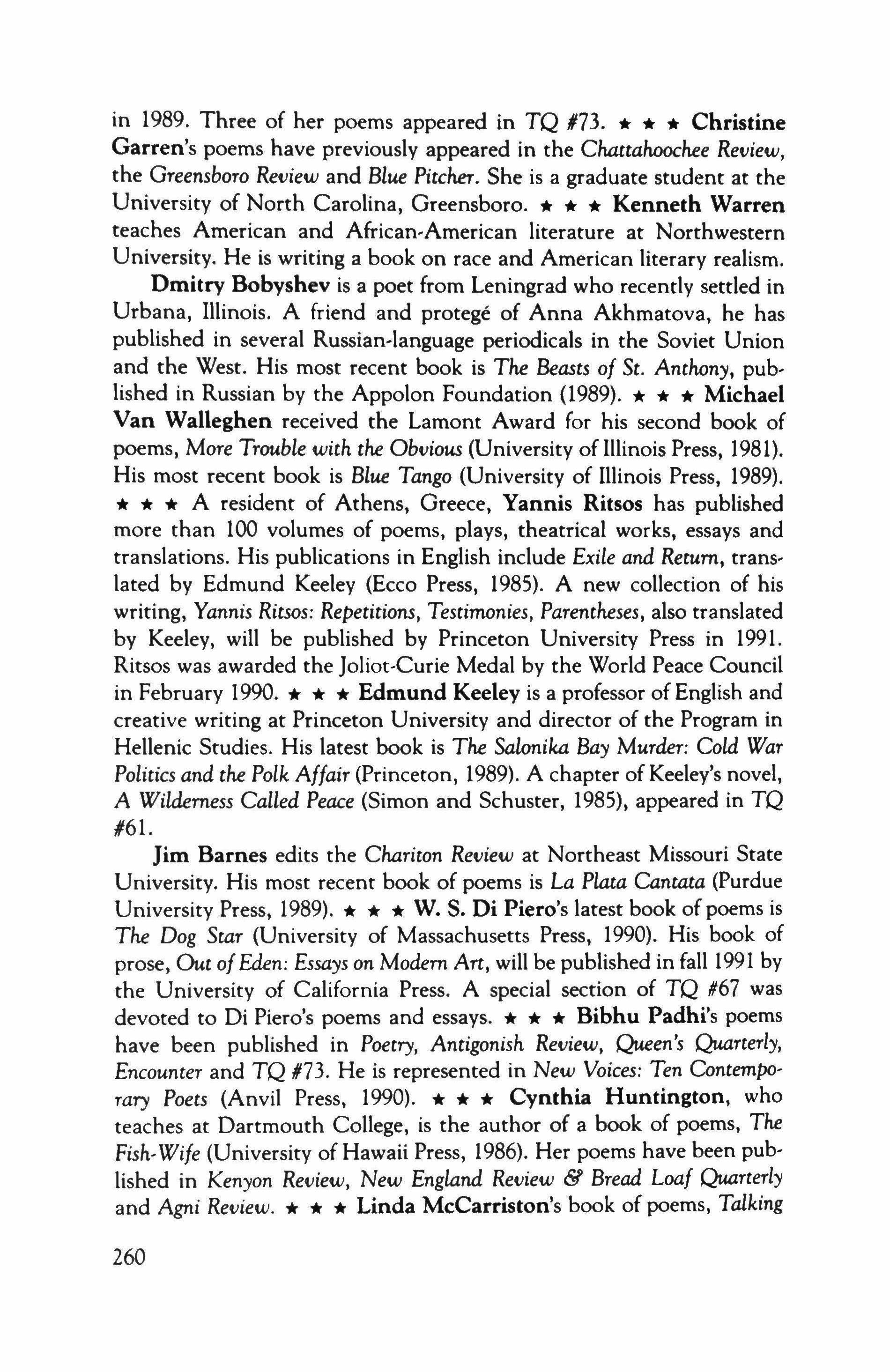
in 1989. Three of her poems appeared in TQ #73. * * * Christine Garren's poems have previously appeared in the Chattahoochee Review, the Greensboro Review and Blue Pitcher. She is a graduate student at the University of North Carolina, Greensboro. * * * Kenneth Warren teaches American and African-American literature at Northwestern University. He is writing a book on race and American literary realism.
Dmitry Bobvshev is a poet from Leningrad who recently settled in Urbana, Illinois. A friend and protege of Anna Akhmatova, he has published in several Russian-language periodicals in the Soviet Union and the West. His most recent book is The Beasts of St. Anthony, pub, lished in Russian by the Appolon Foundation (l989). * * * Michael Van Walleghen received the Lamont Award for his second book of poems, More Trouble with the Obvious (University of Illinois Press, 1981). His most recent book is Blue Tango (University of Illinois Press, 1989).
*
* * A resident of Athens, Greece, Yannis Ritsos has published more than 100 volumes of poems, plays, theatrical works, essays and translations. His publications in English include Exile and Return, trans' lated by Edmund Keeley (Ecco Press, 1985). A new collection of his writing, Yannis Ritsos: Repetitions, Testimonies, Parentheses, also translated by Keeley, will be published by Princeton University Press in 1991. Ritsos was awarded the joliot-Curie Medal by the World Peace Council in February 1990. * * * Edmund Keeley is a professor of English and creative writing at Princeton University and director of the Program in Hellenic Studies. His latest book is The Salonika Bay Murder: Cold War Politics and the Polk Affair (Princeton, 1989). A chapter of Keeley's novel, A Wilderness Called Peace (Simon and Schuster, 1985), appeared in TQ #61.
Jim Barnes edits the Chariton Review at Northeast Missouri State University. His most recent book of poems is La Plata Cantata (Purdue University Press, 1989). * * * W. S. Di Piero's latest book of poems is The Dog Star (University of Massachusetts Press, 1990). His book of prose, Out ofEden: Essays on Modem Art, will be published in fall 1991 by the University of California Press. A special section of TQ #67 was devoted to Di Piero's poems and essays.
* * * Bibhu Padhi's poems have been published in Poetry, Antigonish Review, Queen's Quarterly, Encounter and TQ #73. He is represented in New Voices: Ten Contemporary Poets (Anvil Press, 1990). * * * Cynthia Huntington, who teaches at Dartmouth College, is the author of a book of poems, The Fish,Wife (University of Hawaii Press, 1986). Her poems have been pub, lished in Kenyon Review, New England Review & Bread Loaf Quarterly and Agni Review.
* * * Linda McCarriston's book of poems, Talking
260

Soft Dutch, was published by Texas Tech University Press in 1984. Her work has appeared in Poetry, Ploughshares and other journals. She is a part-time instructor in the Adult Degree Program at Vermont College.
Eleanor Ross Taylor's fourth book of poems, tentatively titled Day Going/Day Coming Back and Other Poems, will be published by the University of Utah Press in spring 1991. * * * Debra Nystrom's book of poems, A Quarter Tum, is being published by the Sheep Meadow Press in fall 1990. She teaches at the University of Virginia. * * * Ruth Molloy's poems, stories and articles have appeared in magazines and journals for several decades. A long-time resident of St. Mark's Square in Philadelphia, about which she has written historical articles, she was a prizewinner in a contest sponsored by Modem Maturity in 1987, and a story of hers was selected by Martha Foley for The Best American Short Stories in 1956. * * * The distinguished British social historian E. P. Thompson is the author of The Making of the English Working Class (Vintage, 1963) and of many other books, including a novel, The Sykaos Papers (Pantheon, 1988). He has been a leader in the Campaign for Nuclear Disarmament (CND) and the Committee for European Nuclear Disarmament (END). His essay, "Homage to Thomas McGrath," appeared in TQ #70, a special issue of the magazine titled Thomas McGrath: Life and the Poem, which will be reissued in augmented form by the University of Illinois Press in 1991.
Gary Snyder is the author of many collections of poems and books of essays on the environment, Eastern religions and the beliefs and customs of American Indians, among other subjects. His most recent works include Passage Through India (Grey Fox, 1984), Axe Handles (North Point Press, 1983) and The Real Work: Interviews and Talks, edited by Scott McLean (New Directions, 1980). He lives in the Sierra Madre Mountains in California. * * * Julia Martin is an English professor at the Unviersity of the Western Cape, in Capetown, South Africa. She has published articles on eco-feminism and the history of religions and, with her husband, Michael Cope, is a founder of the Cape Ecology Group, an organization dedicated to the political analysis of environmental issues in South Africa. * * * Jay Cantor's essay, "Death and the Image," will be included in his book, On Giving Birth to One's Own Mother: Essays on Art and Society, which will be published by Knopf in 1991. The title-essay of that collection appeared in TQ #75 (Writing and Well-Being). A MacArthur Prize Fellow, Cantor teaches at Tufts University.
Arthur Nestrovski has translated works by Samuel Beckett and James Joyce into Portuguese, and his book, Debussy and Poe, was
261
awarded the Jabuti Prize by the Brazilian Chamber of Letters in 1987. He is presently a teaching fellow in Rio de Janeiro. * * * Peter Schwendener is a jazz pianist and writer who lives in San Francisco. Formerly a staff writer for the Chicago Reader, he has published articles and reviews in the American Scholar and TQ #68 and 74. * * * Michael Andre Bernstein teaches English and comparative literature at the University of California, Berkeley. He is the author of The Tale of the Tribe (Princeton University Press, 1980), Prima Della Rivoluzione (National Poetry Foundation, 1984) and the forthcoming When the Carnival Turns Bitter: Ressentiment and the Abject Hero. As a recipient of the Koret Israel Prize, he spent part of fall 1989 at the Mishkenot Sha'anannim, in Jerusalem. * * * Allen Grossman's most recent book of poems is The Bright Nails Scattered on the Ground (New Directions, 1986). The first lecture in Grossman's series on the present state of affairs in poetry appeared in TQ #77. The issues covered in these lectures are also discussed in the book, Against Our Vanishing Winter: Conversations with Allen Grossman on the Theory and Practice of Poetry (Rowan Tree Press, 1981).

The name of the original publisher of "Meeting Beckett" by Charles Juliet (translated by Suzanne Chamier and published in TQ #77) was inadvertently omitted. The publisher was Fata Morgana (1986). Juliet's other published works include many volumes of poetry as well as literary journals and criticism.
262

The Voices of Black America
Announcill!l the first majoranthology of Black writers in more than 15 years
Breaking Ice is a brilliant, thought-provoking portrait of life in America today-as seen through the eyes of established and ;::::; emerging African-American writers. Editor Terry McMillan, author of the critically acclaimed DisappearingActs, has compiled the works of more than 50 writers, including Alice Walker, Gloria Naylor, John Edgar Wideman, Ishmael Reed, Ntozake Shange, and Charles Johnson. The result is a collection of dazzling and diverse short fiction.

On The Suppression of Writing, And Writers Who Because Of Gender, Race, Class Or Sexual Preference Prejudices Have Been Suppressed, Censored Or Otherwise Silenced, By Society, Family, The Government, Etc
THE AMERICAN
A Special Issue Winter, 1990
VOICE SILENCING
available at bookstores
by subscription S 12 one I S20 tWO I S26 three years Nmx ��--------------------City State/Zip to 332 W Broadway Louisville, KY 40202 USA
or
Ca{{aIoo
A Journal ofAfro-American and AfricanArts and Letters
PubUshed by the Johns Hopkins University Press
Callaloo publishes original works by and critical studies of black writers in the Americas, Mrica, the Caribbean, and Europe. Thejournal offers a rich medley offiction, poetry, plays, critical essays, cultural studies, interviews, and visual art. Callaloo publishes the only annotated bibliography of criticism and scholarship on black literature.
"Callaloo has occupied a central role in encouraging black writers and in promoting the best in Afro-American poetry, fiction, and criticism. It has been and remains the liveliest and most exciting publication in this liveliest ofliteratures."
-James Olney, Editor
The Southern Review
CALLALOO is published quarterly in February, May, August, and November.
Please enter my IRlb.cription:
o $20.00 individual 0 $41.00 institution
Subscriptions begin with the current issue. Prepayment required. Subscribers in Canada and Mexico add $3.50 postage; outside North America, add $14.00. Payment must be drawn on aU. S. bank or be by international money order. Maryland residents add 5% sale. tax. Charge orders only: B00-537.JHUP.
Payment Options:
o Check or money order enclosed, payable to John. Hopkins Univ. Press
o VISA 0 MasterCard Card II
Signature
Name
Addre
City/Stat&'Zip

Exp. Date
Send order with payment to: The Johns Hopkins University Press, Journals Publishing Division, 701 W. 40th Street, Suite 275, Baltimore, MD 21211-2190. EAO
" THE JOHNS HOPKINS UNIVERSITY PRESS

POETRY EAST
is pleased to announce the publication of our fall issue Poetry East Number 28
POETRY
Tom Crawford Linda Gregg Albert Goldbarth Gary Metras Maxine Scates Harvey Shapiro
Marge Piercy Jane Miller and 45 others
TRANSI.AnONS
Halina Poswiatowska Antonia Pozzi Pablo Fernanado Hernandez and 31 others
'6 per copy $10 yearly subscription (2 issues)
"Poetry East should be considered one of the best current journals in the country today." -Choice
"Anyone accustomed with Richard Jones's Poetry East comes in time to expect excellence with every issue." -Literary Magazine Reyiew
TO ORDER: Check or money order enclosed for _'6 $10
Name Street Ciey, S�re, np
Mail to: Poetry Ea'it, DePaul University, English Department, 802 w. Belden Ave., Chicago, Illinois 60614
liTERATURE ofTRAVE�_
A Sense OJPlace �
JANUARY 10-13. 1991
Join Peter Matthiessen, Jan Morris, Robert Stone, William Styron, Calvin Trillin and other distinguished travel writers, editors and scholars. Enjoy panel discussions, readings, receptions, exhibits, and literary walking tours.
Write or call for details. Key West Uterary Seminar. Box 391-K, Sugarloaf Shores, FL 33044 (305) 745-3640.
ON'llrnIslAND
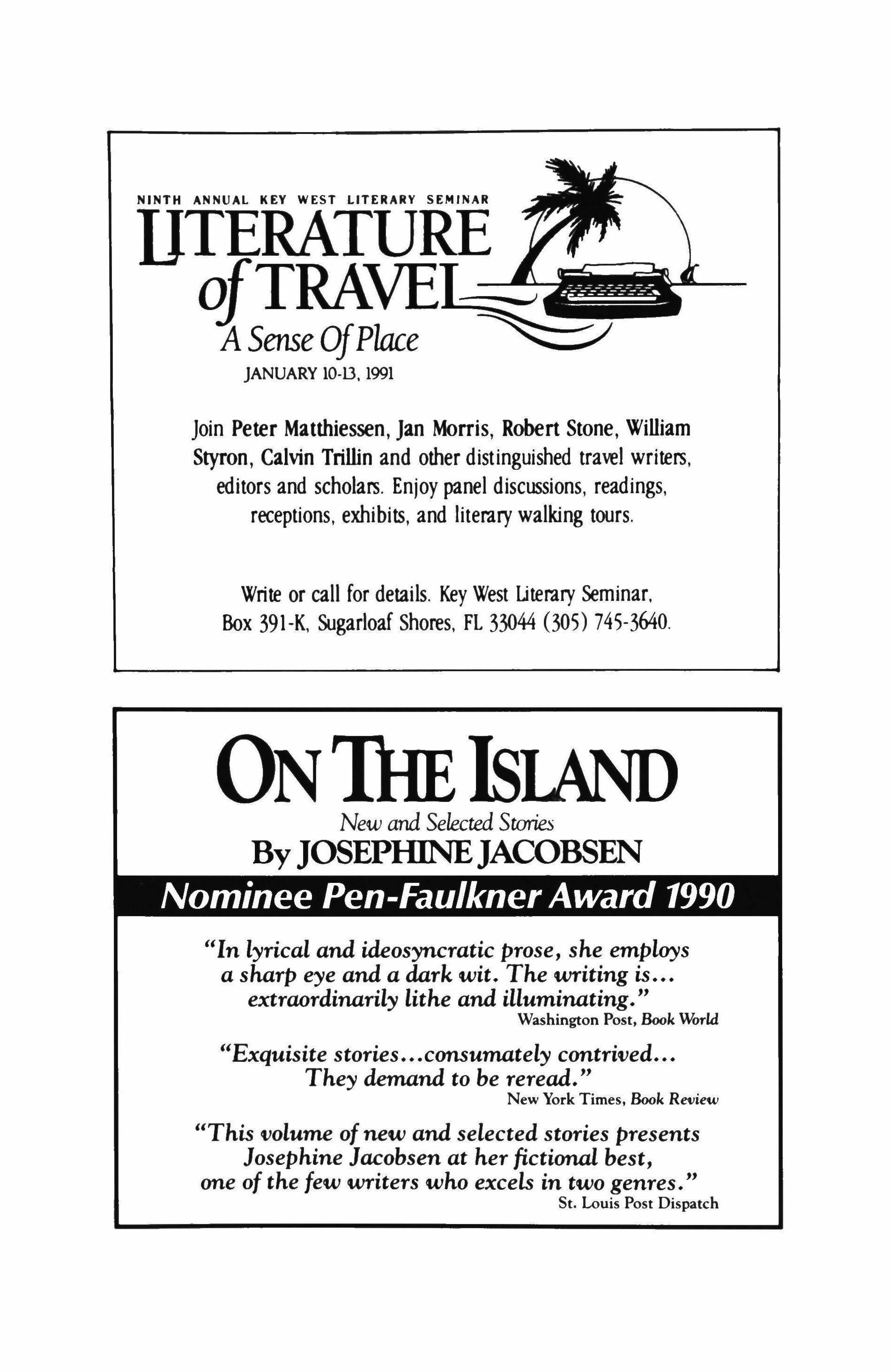
"In lyrical and ideosyncratic prose, she employs a sharp eye and a
"This volume of new and selected stories presents Josephine Jacobsen at her fictional best, one of the few writers who excels in two genres. " St. Louis Post Dispatch
NINTH ANNUAL KEY WEST LITERARY SEMINAR
New and Selected Stories ByJOSEPHINEJACOBSEN Nominee Pen-Faulkner Award 1990
writing
••.
lithe
illuminating." Washington Post, Book World
consumately contrived •.•
demand to be reread."
York
Book
dark wit. The
is
extraordinarily
and
"Exquisite stories ••.
They
New
Times.
Ret/iew

Available Now from TriQuarterly Books. • •
Fiction of the Eighties: A Decade of Stories from TriQuarterly
To commemorate the twenty-fifth anniversary of TriQuarterly magazine, editor Reginald Gibbons and associate editor Susan Hahn have selected forty-seven of the best short stories to have appeared in its pages during the past decaderesulting in a rich harvest of some of the most moving and exciting examples of the form, by such writers as William Goyen, Grace Paley, Raymond Carver, Amy Hempel, Tobias Wolff, Robert Coover and Joyce Carol Oates. A generous volume of nearly 600 pages, it shows an amazing diversity of subject matter and writing styles, but a common high level of artistry and an unmistakable atmosphere of the 1980's. 592 pp. $26.95, cloth; $16.95, paper. ISBN 0-916384-05-5 (cloth); ISBN 0-916384-06-3 (paper).
Earthly Justice
By E. S. Goldman
E. S. Goldman's book, Earthly Justice, is the first winner of the William Goyen Prize for Fiction, awarded by TriQuarterly Books. The brilliantly crafted stories in this collection are filled with surprise, delight, devastation and poignancy: the triumphs and defeats of his characters expose the complexities of their passions and secrets. Earthly Justice is the first collection of stories for the 77year-old Goldman, whose credits include publication in the Atlantic, Story and Best American Short Stories, 1988. 208 pp. $17.95, cloth. $9.95, paper. ISBN 0-929968-13-1 (cloth); ISBN 0-929968-14-X (paper).
Selected Poems: The Weight of the Body
By Stanislaw Baranctak
Translated from the Polish by several distinguished translators and the author, this is the first full-length poetry collection to be published in the U.S. by Stanislaw Baranczak, the brilliant poet, essayist and translator who has lived here in exile since 1981. Baranczak's is a distinctive voice of great range - from satire to elegy, from farce to lyric. First winner ofthe Terrence Des Pres Prize for Poetry. 96 pp. $16.95, cloth; $8.95, paper. ISBN 0-929968-02-6 (cloth); ISBN 0-929968-01-8 (paper).
Stephen Deutch, Photographer
This long overdue collection of more than a half-century of the work of photographer Stephen Deutch - the first full record of his multifaceted achievement to be published - is a companion volume to his recent retrospective exhibition at the Chicago Cultural Center. Like the show, the book covers the full range of Deutch's vast body of work, including photojournalism, portraiture, nudes and advertising. With a preface by Studs Terkel and a critical essay by Abigail Foerstner. 192 pp., with plates both in duotone and color. $45.00, cloth; $23.50, paper. ISBN 0-929968-05-0 (cloth); ISBN 0-929968-06-9 (paper).
The Collected Poems of Sterling A. Brown
Selected by Michael S. Harper
Arguably the greatest black poet of our time, Sterling A. Brown, who died in 1989, is a legend among writers, teachers and readers-an extraordinary poet, the founder of African-American literary criticism and a great teacher and scholar. His poems have brought neglected but essential and precious subjects, tones of voice, and poetic techniques into American poetry. His Collected Poems, winner of the Lenore Marshall Prize when first published in 1984, has now been returned to print by TriQuarterly Books/Another Chicago Press. 282 pp. $9.95, paper. ISBN 0-929968-07-7.
Writers from South Africa
Based on the proceedings of a literary conference hosted by TriQuarterly magazine and Northwestern University in autumn 1987, this book presents the speeches and dialogues of fourteen leading South African writers, poets and intellectuals. Bridging the barriers of exile, race and gender, these participants open up the world of current South African literary culture to U.S. readers, outlining such concerns as writing and censorship, worker poetry, the tradition of the praise-singer, and the place of poetry in society. 128 pp. $6.50 paper. ISBN 0-916384-03-9.

TriQuarterly Books are published by Another Chicago Press and distributed by ILPA. To order, call or write ILPA, P.O. Box 816, Oak Park, IL 60303. Phone: 1.800.242·4572.
• • •
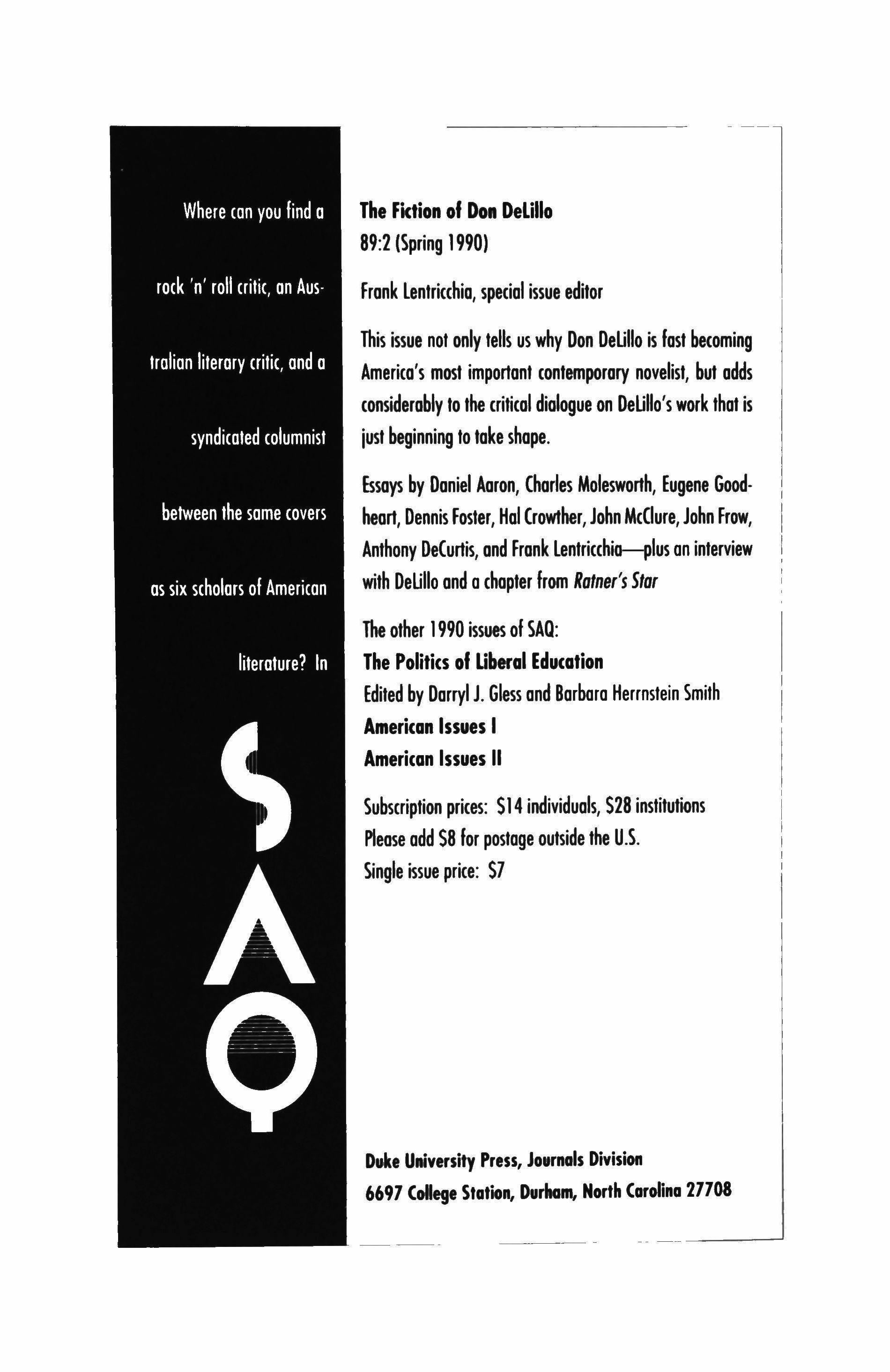
The Fiction of DOli Delillo 89:2 (Spring 1990)
Frank lentricchia, spedal issue editor
This issue not only tells us why Don Delillo is fast becoming America's most important contemporary novelist, but adds considerably to the critical dialogue on Delillo's work that is just beginning to toke shope.
Essays by Daniel Aaron, Charles Molesworth, Eugene Goodheart, Dennis Foster, Hal Crowther, John McClure,John Frow, Anthony DeCurtis, and Fronk lentricchio--plus on interview with Delillo and a chapter from Ratner's Star
The other 1990 issues of SAQ: The Politics of liberal Education
Edited by Darryl J. Gless and Barbora Herrnstein Smith
American Issues I
American Issues II
Subscription prices: S14 individuals, S2B institutions
Please odd S8 for postage outside the U.S.
Single issue price: S7
Duke Ulliversity Press, Jotrnals Division 6697 Colege Station, Durllam, North Carolina 21708
TriQ1rorterly thanks the following life subscribers:
David C. Abercrombie
Amin Alimard
Lois Ames
Richard H. Anderson
Roger Anderson
Sandy Anderson
University of Arizona Poetry Center
Gayle Arnzen
Michael Attas
Asa Baber
Tom G. Bell
Carol Blv
Kay Bonetti
Robert Boruch
Van K. Brock
Gwendolyn Brooks
Timothy Browne
Paul Bundy
Eric O. Cahn
David Cassak
Stephen Chapman
Anthony Chase
Freda Check
Michael Chwe
Andrew Cvr
Doreen Davie
Kenneth Day
Mark W. DeBree
Alan Distler
Anstiss Drake
John B. Elliott
Christopher English
Carol Erickson
Steven Finch
David R. Fine
Paul Fjelstad
Torrence Fossland
Jeffrey Franklin
Peter S. Fritz
Mrs. Angela M. Gannon
Kathy M. Garness
Lawrence J. Gorman
Maxine Groffsky
Rev. Dr. Elliott Hagle
Jack Hagstrom
Ross B. Heath
Charles Hedde
Donald Hey
Donald A. Hillel
Craig V. Hodson
Irwin L. Hoffman
Irwin T. Holtzman
P. Hosier
Charles Huss

Curtis Imrie
Helen Jacob
Del Ivan Janik
Gary Michael Katz
Dr. Alfred D. Klinger
Loy E. Knapp
Sydney Knowlton
Mr. and Mrs. Carl A. Krech
Judy Kunz
Conrad A. Langenberg
John Larroquette
Isaac Lassiter
Dorothy Latiak
Patricia W. Linton
Philip Lister
Mr. and Mrs. W. J. Lorentz de Haas
Prof. Kubet Luchterhand
Ellen L. Marks
Richard Marmulstein
James Marquardt
Kevin McCanna
Robert D. McChesney
Charles Gene McDaniel
Robert McMillan
Michael Meaney
George Meredith
Lois Adele Meyer
C. R. Michel
University of Michigan Hopwood Room
Ralph Miller
Kenneth Monroe
James E. Morrison IV
Max Nathan
Dean Neprud
Catherine Ohs
Paul Peters and Rosemarie Kozdron
Scott Peters
Jane Petro
Evelyn Pine
Doyle Pitman
Barbara Polikoff
Alex T. Primm
Richard Prinz, M.D.
Honora Rankine-Galloway
Anne Katheryn Ream
J. M. Reese
Peter Reich
Susan Reiners
Don Reynolds
Christopher Richter
Diane Rider
Rivier College
Sam Rosenthal
David Roth, M.D.
Jim Rowe
Patricia Ruby
Joan Rybka
Joel Schilling, D.D.S.
Paul and June Schlueter, Ph.Dis
Mrs. H. C. Schmidt
Robert I. Schneideman
Koji Seki
David A. Selby
Herbert Shore
Martin Silverman
Gregory F. Smolarek
Dr. Wanda Sorgente
Laurel Speer
Jane M. Starkey
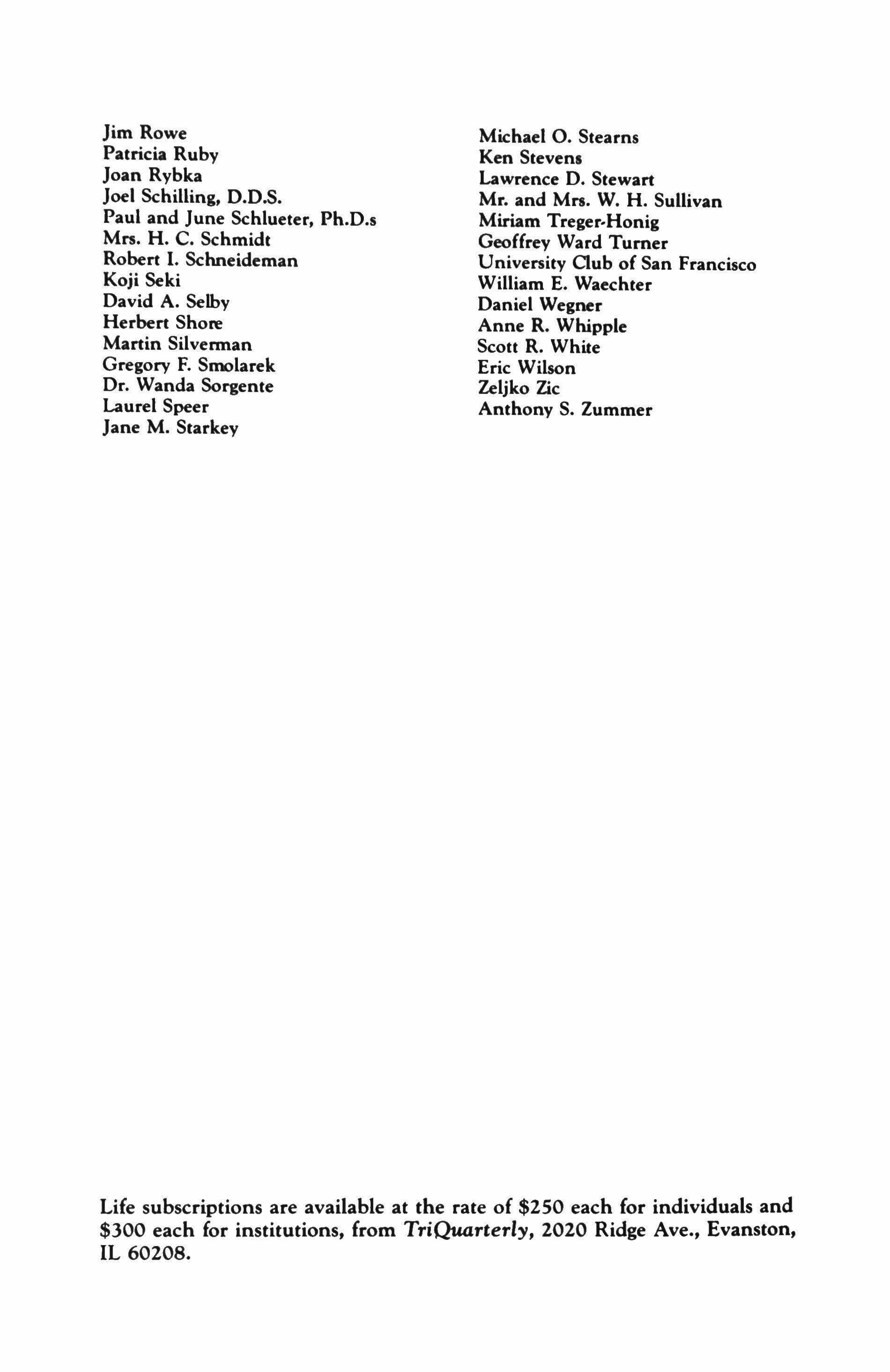
Michael O. Stearns
Ken Stevens
Lawrence D. Stewart
Mr. and Mrs. W. H. Sullivan
Miriam Treger-Honig
Geoffrey Ward Turner
University Club of San Francisco
William E. Waechter
Daniel Wegner
Anne R. Whipple
Scott R. White
Eric Wilson
Zeljko lic
Anthony S. Zummer
Life subscriptions are available at the rate of $250 each for individuals and $300 each for institutions, from TriQuarterly, 2020 Ridge Ave., Evanston, IL 60208.
We wish to express our thanks to the following supporters of TriQuarterly:
TriQuarterly Council
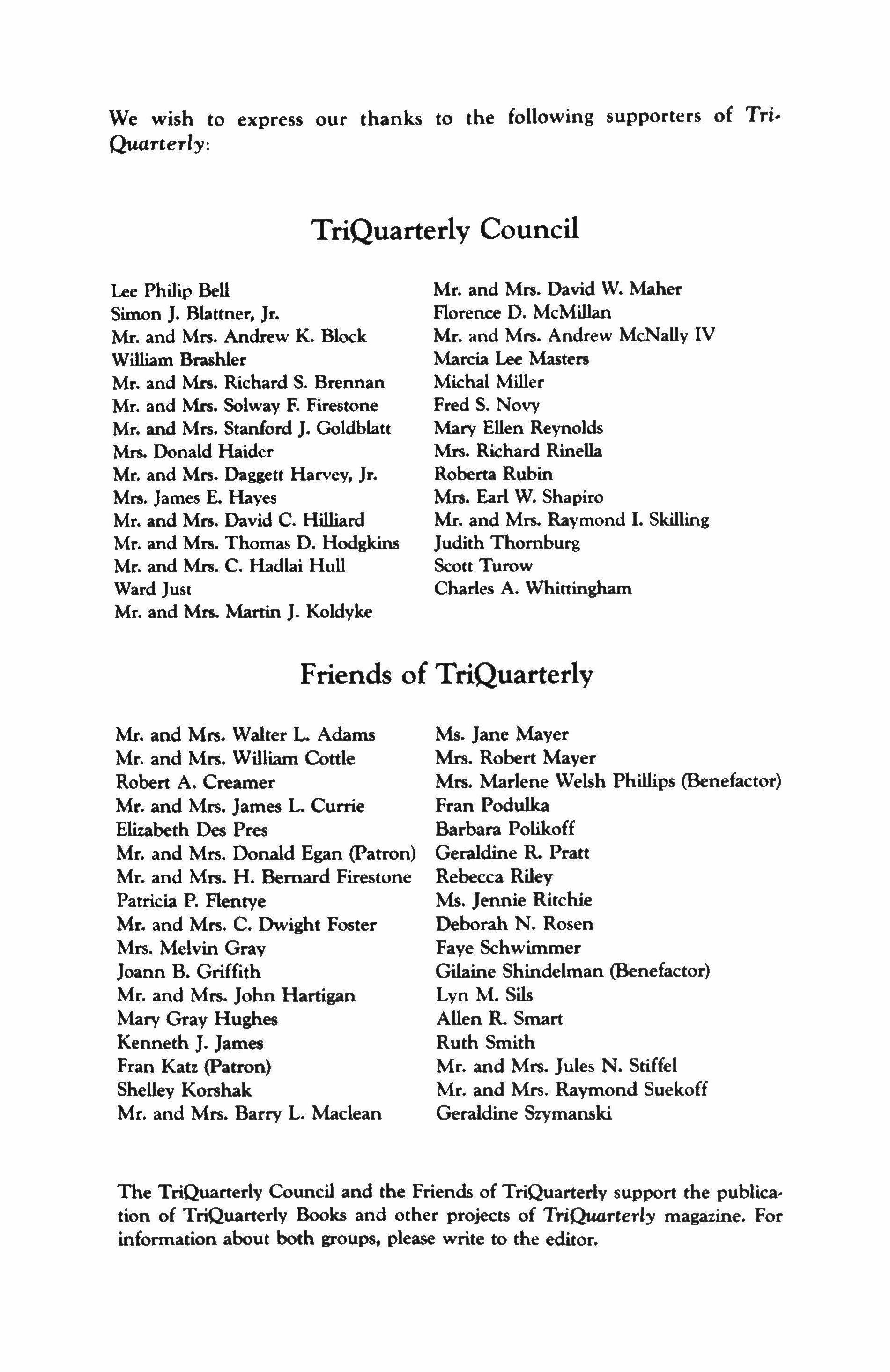
Lee Philip Bell
Simon J. Blattner, Jr.
Mr. and Mrs. Andrew K. Block
William Brashier
Mr. and Mrs. Richard S. Brennan
Mr. and Mrs. Solway F. Firestone
Mr. and Mrs. Stanford J. Goldblatt
Mrs. Donald Haider
Mr. and Mrs. Daggett Harvey, Jr.
Mrs. James E. Hayes
Mr. and Mrs. David C. Hilliard
Mr. and Mrs. Thomas D. Hodgkins
Mr. and Mrs. C. Hadlai Hull
Ward Just
Mr. and Mrs. Martin J. Koldvke
Mr. and Mrs. David W. Maher
Florence D. McMillan
Mr. and Mrs. Andrew McNally IV
Marcia Lee Masters
Michal Miller
Fred S. Novy
Mary Ellen Reynolds
Mrs. Richard Rinella
Roberta Rubin
Mrs. Earl W. Shapiro
Mr. and Mrs. Raymond I. Skilling
Judith Thornburg
Scott Turow
Charles A. Whittingham
Friends of TriQuarterly
Mr. and Mrs. Walter L Adams
Mr. and Mrs. William Cottle
Robert A. Creamer
Mr. and Mrs. James L Currie
Elizabeth Des Pres
Mr. and Mrs. Donald Egan (patron)
Mr. and Mrs. H. Bernard Firestone
Patricia P. Flentye
Mr. and Mrs. C. Dwight Foster
Mrs. Melvin Gray
Joann B. Griffith
Mr. and Mrs. John Hartigan
Mary Gray Hughes
Kenneth J. James
Fran Katz (patron)
Shelley Korshak
Mr. and Mrs. Barry L Maclean
Ms. Jane Mayer
Mrs. Robert Mayer
Mrs. Marlene Welsh Phillips (Benefactor)
Fran Podulka
Barbara Polikoff
Geraldine R. Pratt
Rebecca Riley
Ms. Jennie Ritchie
Deborah N. Rosen
Faye Schwimmer
Gilaine Shindelman (Benefactor)
Lvn M. Sits
Allen R. Smart
Ruth Smith
Mr. and Mrs. Jules N. Stiffel
Mr. and Mrs. Raymond Suekoff
Geraldine Szymanski
The TriQuarterly Council and the Friends of TriQuarterly support the publication of TriQuarterly Books and other projects of TriQuarterly magazine. For information about both groups, please write to the editor.
















































































































































































 for Stanley Cavell
for Stanley Cavell




































































































